Divine Grace swami
 His
Founder-Acarya of the International
His
Founder-Acarya of the International
His Divine Grace
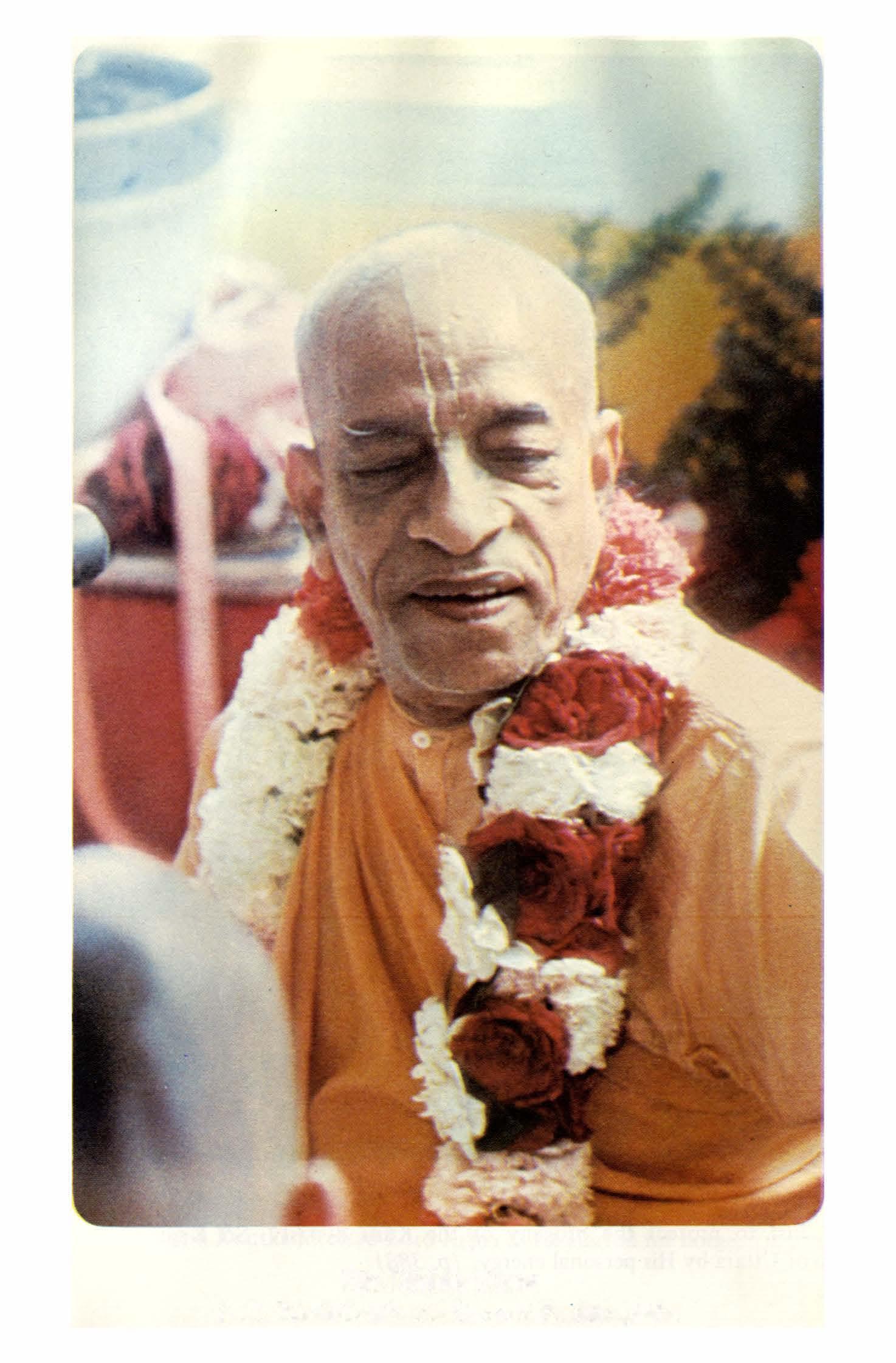
A.C.
Pnibhupada
Bhaktivedanta Swami

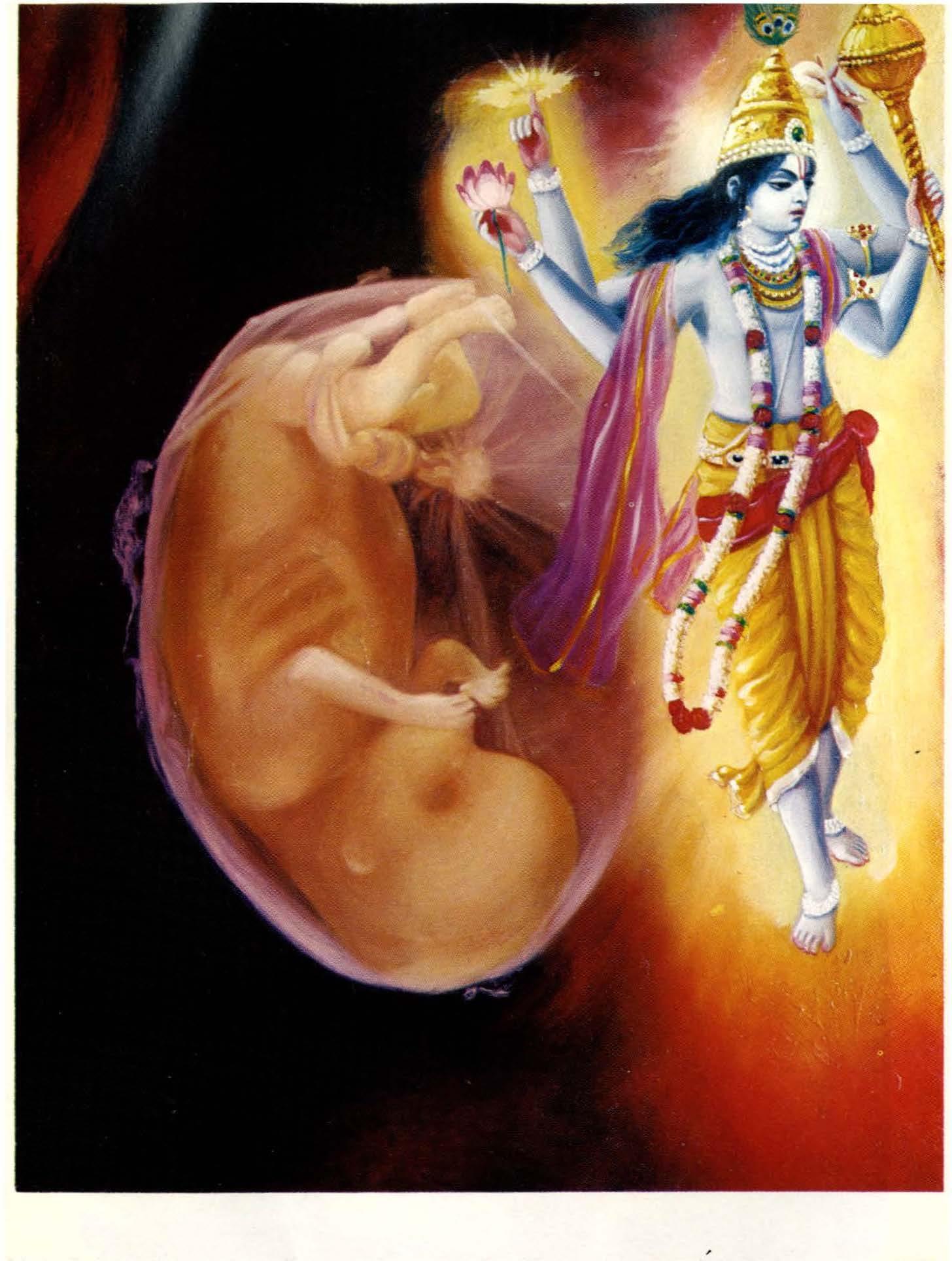 Plate 1 Just to protect the progeny of the Kuru dynasty, Sri Kr�Qa covered the embryo of Uttara by His personal energy. (p. 388)
Plate 1 Just to protect the progeny of the Kuru dynasty, Sri Kr�Qa covered the embryo of Uttara by His personal energy. (p. 388)
Plate 2 Queen Kunti addressed Lord ��Qa as He started for home. (p. 390)

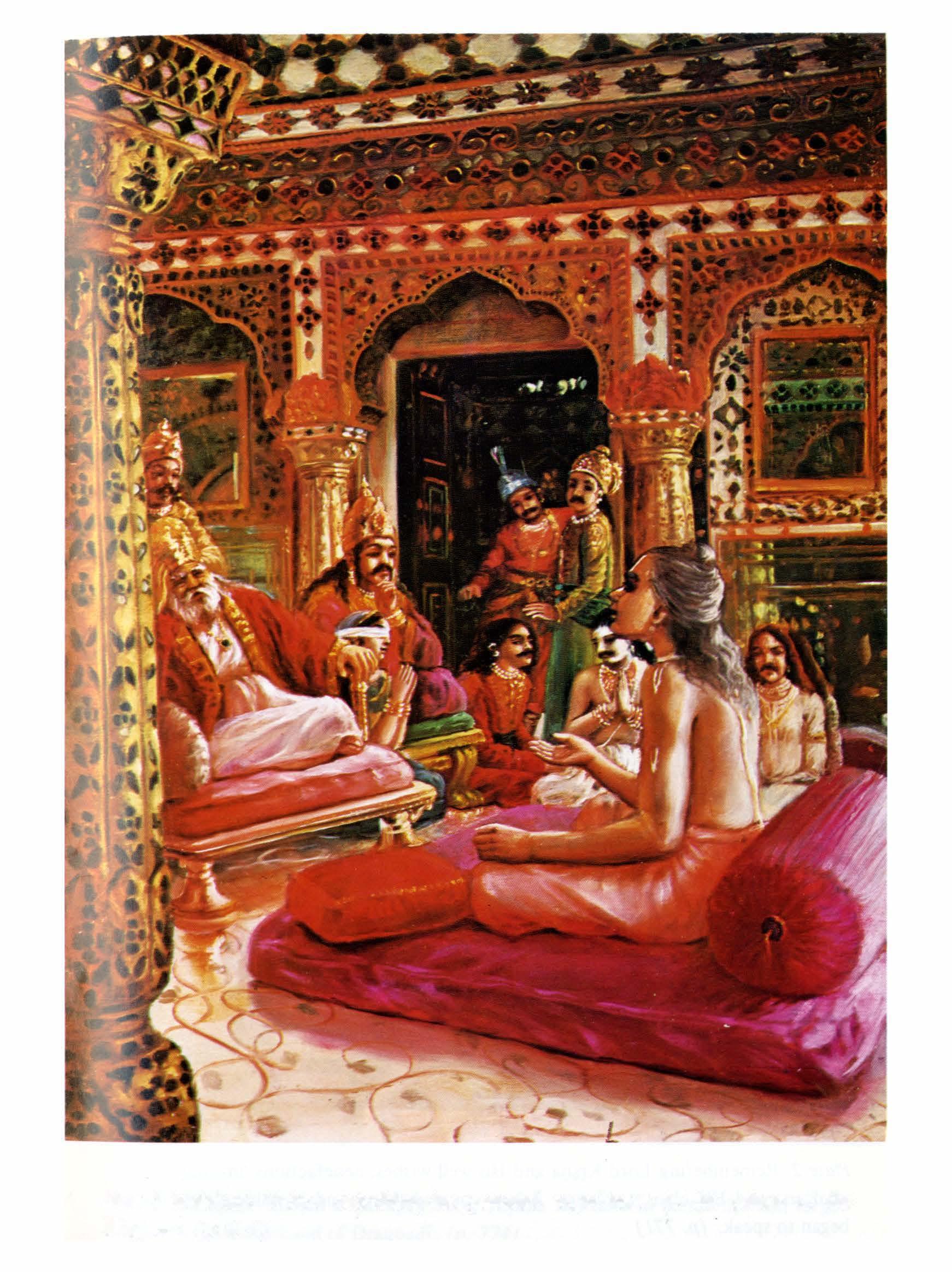 Plate 1 Mahatma Vidura describing his personal experiences in the palace of the PaQc;!avas. (p. 676)
Plate 1 Mahatma Vidura describing his personal experiences in the palace of the PaQc;!avas. (p. 676)
Plate 2 Remembering Lord Km1a and His well wishes, benefactions, intimate familial relations and His chariot driving, Aijuna, overwhelmed and breathing very heavily, began to speak. (p. 771)


able to pierce the fish target and thereby gain the hand

 Plate 3 By Kl;�I)a's merciful strengtij only, Arjuna was
of Draupadl. (p. 774)
Plate 3 By Kl;�I)a's merciful strengtij only, Arjuna was
of Draupadl. (p. 774)
 Plate 4 By His grace only, Bhlmasena was able to kill the demon Jarasandha. (p. 777)
Plate 4 By His grace only, Bhlmasena was able to kill the demon Jarasandha. (p. 777)
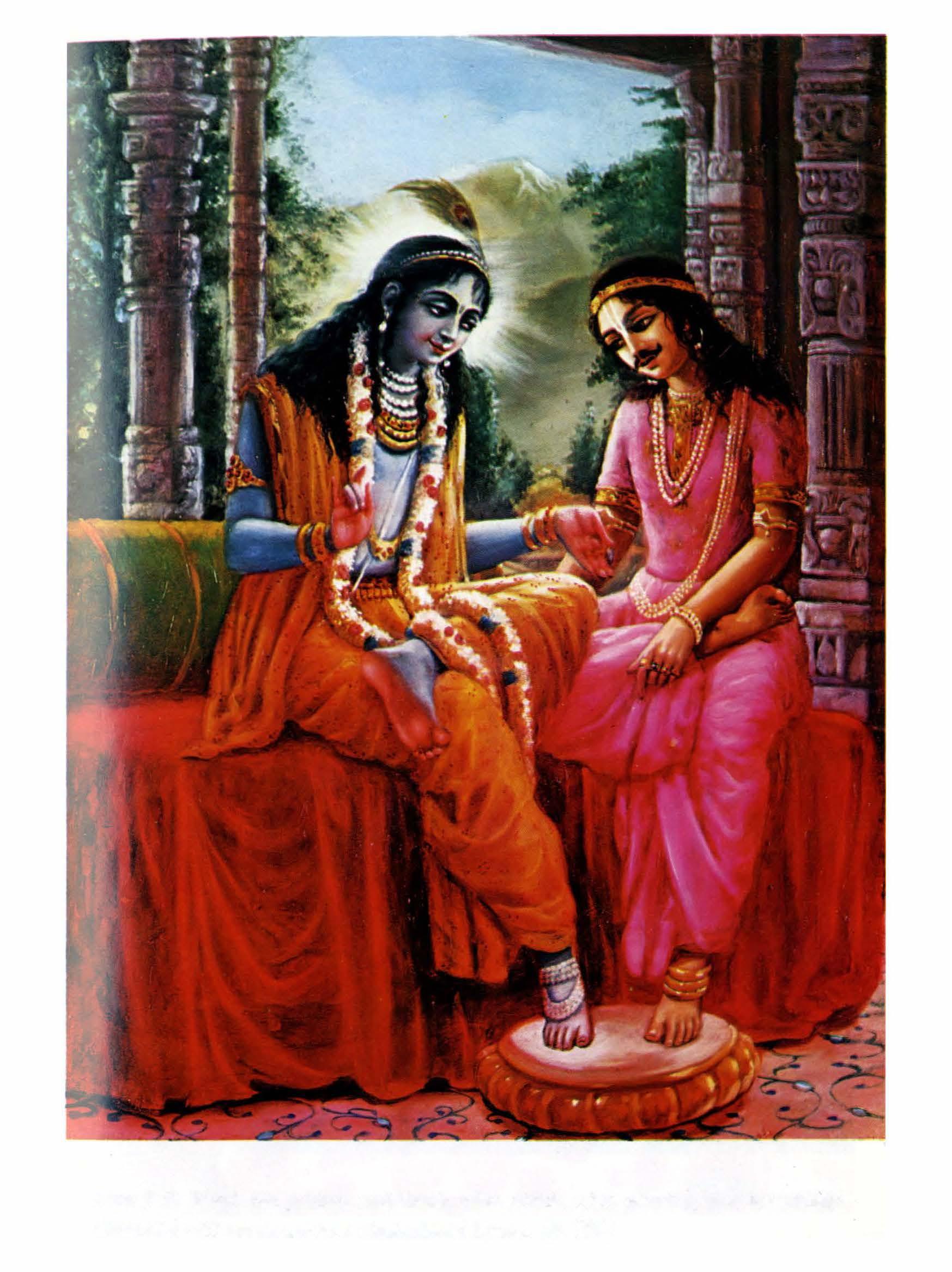 Plate 5 0 King! His jokings and frank talks which were pleasing and beautifully decorated with smiles are now remembered by me. (p. 794)
Plate 5 0 King! His jokings and frank talks which were pleasing and beautifully decorated with smiles are now remembered by me. (p. 794)
Plate 6 The Lord's abode andtheVaikucy�haplanets in the spiritual skyare far beyond these mundane universes. (p. 812)

Plate 7 Maharaja Yudhi��hira started towards the North, treading the path which was accepted by his forefathers. (p. 825)
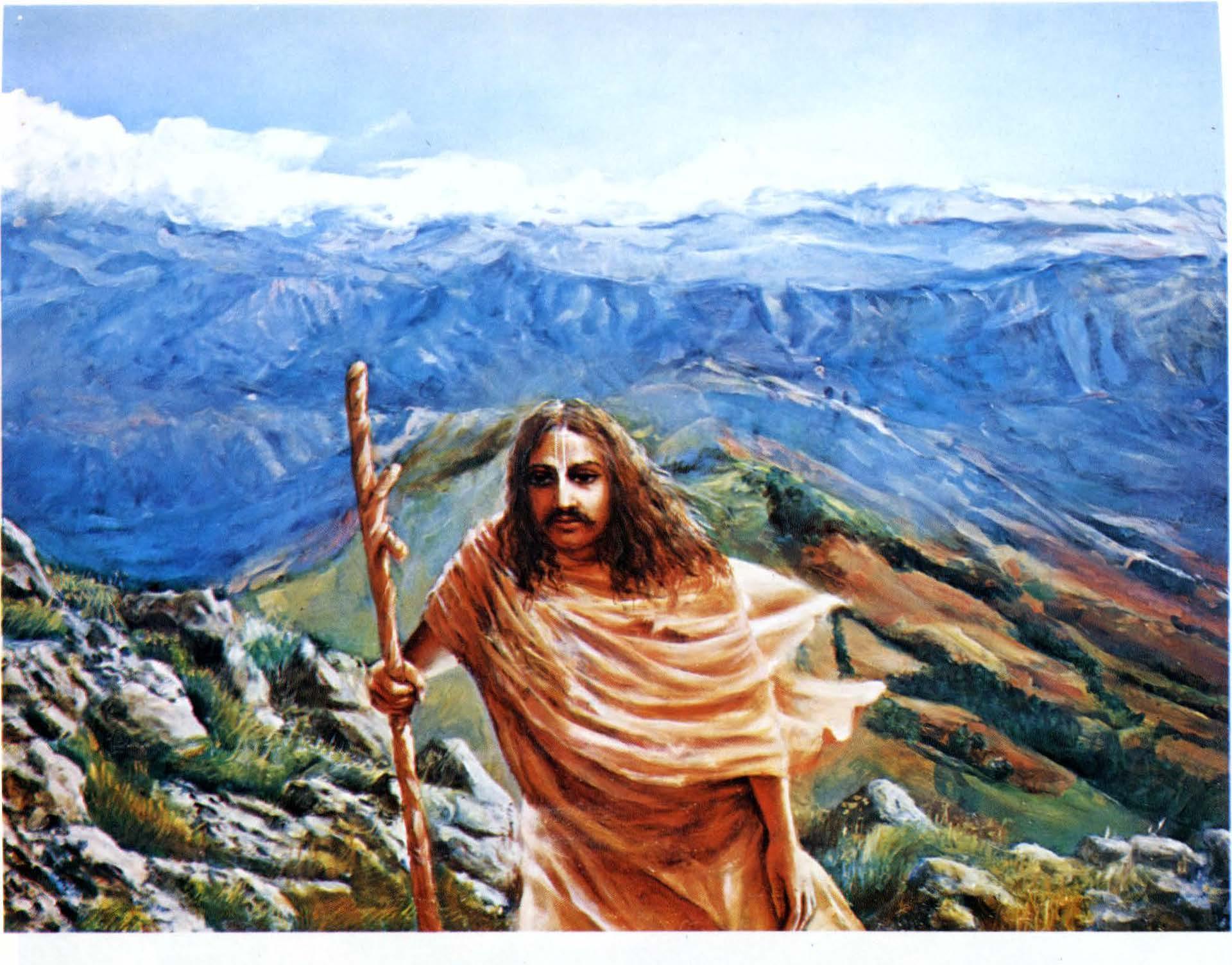

Plate 8 Maharaja Parik�it, being petitioned by the personality of Kali, gave him permission to reside in places where gambling, drinking, prostitution and animal slaughter were performed. (p. 919)

Plate 9
Those who are desirous of achieving complete perfection in life must submissively hear all topics that are connected with the transcendental activities and qualities of the Personality of Godhead, who acts wonderfully. (p. 938)


Plate 10 King Pariksit rewarded the sage coldly by offering him a garland of a dead snake. (p. 963)

Pfate 11 After hearing from his son that the King had been cursed, the sage repented his son's sinful act. (p. 973)

Plate 12
All the demigods living in the higher planets praised the action ofthe King, and in pleasurethey continually scattered flowersover the earth. (p. 1168)
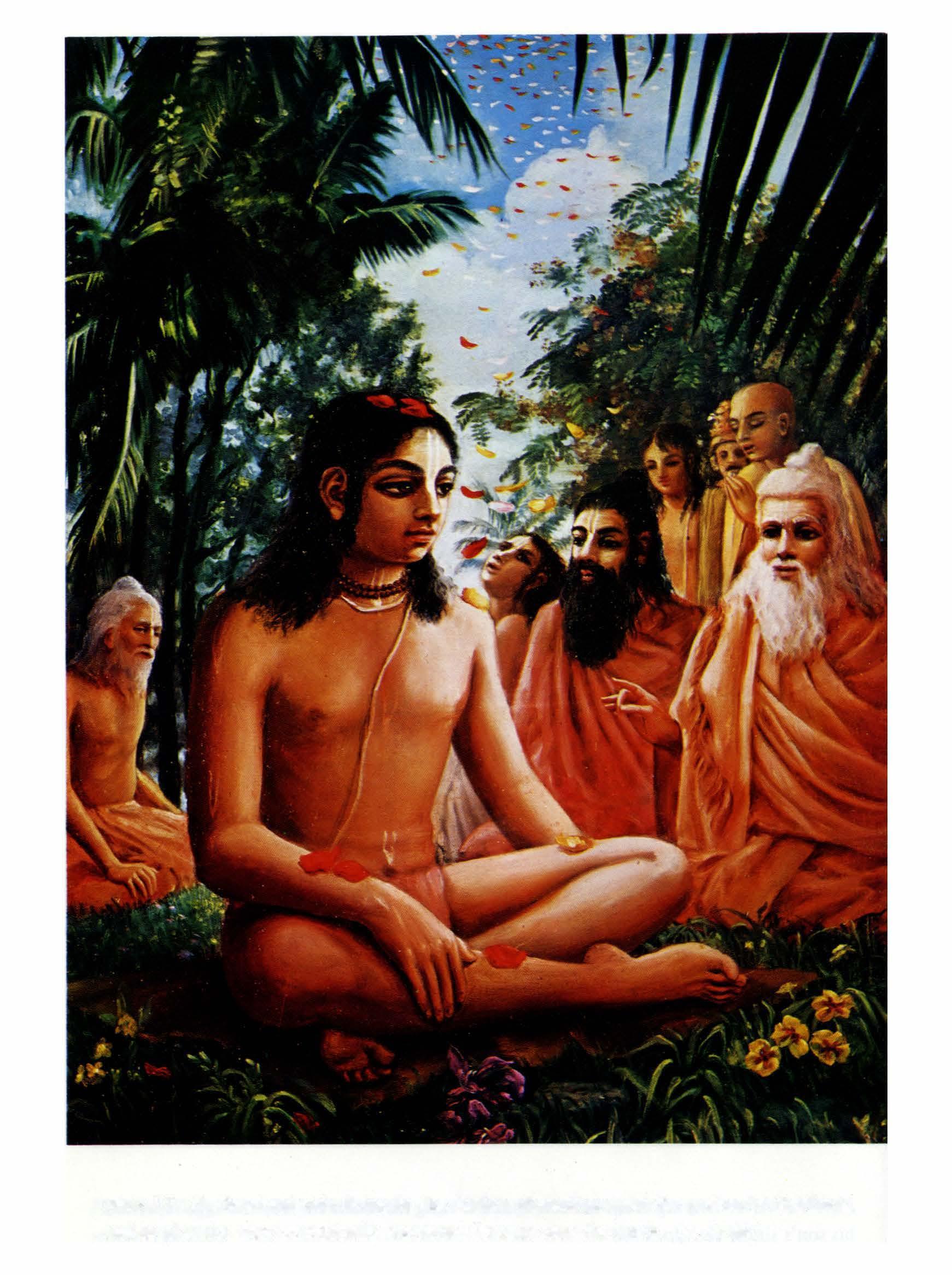
Srimad-Bhagavatam

Srlmad-Bhagavatam of K�SNA-DVAIPAYANAVYAsA

���:iji4l�����fii�M: I
� � it��kt���ilffl:II� o'll

� �q-U � �iijliti+URlM�ii: I
3Rt � �� l{<i!ii'lfl*l¥1'(II��Il
yasya rO.fl.fre prajiifl. saroiis trasyante siidhvy asiidhubhifl.
tasya mattasya nl1Syanti kirtir iiyur bhago gatifl.
e�a riijiiiirh paro dharmo hy iirtiiniim iirti-nigrahafl.
ata enarh vadhi�yiimi bhiita-druham assattamam (p. 888)
ALL GLORY TO 5RlGURU AND GAURANGA
OTHER BOOKS by His Divine Grace A.C. Bhaktivedanta swami Prabhupada
Bhagavad-gitii As It Is

Teachings of Lord Caitanya
Krfor.a, the Supreme Personality of Godhead (2 volumes)

Easy Journey to Other Planets
Kr�rw Consciousness: The Topmost Yoga System
The ectar of Devotion
The Krfor.a Consciousness Movement is the Genuine Vedic Way
Back to Godhead Magazine (Founder)
Srimad-Bhagavatam
First Canto
"Creation"
<Part Three-Chapters 13-19>
With the Original Sanskrit Text, Its Roman Transliteration, Synonyms, Translation and Elaborate Purports by His Divine Grace


A.C. Bhaktivedanta swami Prabhupada
Founder-Acarya of the International Society for Krishna Consciousness
New York· Los Angeles· London . Bombay
Copyright © 1972 by the Bhaktivedanta Book Trust
Library of Congress Catalogue Card Number: 70-127183
International Standard Book umber: 0-912776-34-X

ALL RIGHTS RESERVED
Readers interested in the subject matter of this book are invited by the International Society for Krishna Consciousness to correspond with its Secretary.
International Society for Krishna Consciousness
3764 Watseka Ave. Los Angeles, Calif. 90034

The Bhaktivedanta Book Trust
32 Tiffany Place 3764 Watseka Avenue Brooklyn, �e" York 11231 Los Angeles. California 90034 7 Bury Place Gandhi Gram Road Bloomsbury, W.C. I .luhu, Bombay-5-� London Printed by Dai ippon Printing Co., Ltd., Tokyo, Japan

CHAPTER THIRTEEN Dhrtara$tra Quits Home Vidura Returns Home The Supreme Knowledge The Reception of Vidura The Sanctity of a Pure Devotee The Past History of Vidura The Happy King Yudhi�thira The Ignorant Conditioned Soul Vidura's Instructions to Dh{tara��ra The Influence of Time TheWarning of Old Age The Undisturbed Person The First-class Ian Dhrtara�tra Quits Home Maharaja Yudhi��hira, the Pious King The Supreme Will Illusory Affection
Living Being Is Food for Another The Mission of Lord Sri Kr�11a The Sati Rite
FOURTEEN Disappearance of Lord Kr$Qa Yudhi��hira's Anxiety v 661 663 664 674 679 681 682 683 686 688 693 694 696 700 709 713 716 720 729 731
TABLE OF CONTENTS
One
CHAPTER

He Observes Irregularities Everything Disturbed VL Indications of the Lord's Disappearance The Lord Is the Source of Everything Bad Omens Dejected Arjuna Yudhif?thira's Anxious Inquiries Lord Sr1 K{eyqa's Departure Apprehended CHAPTER FIFTEEN The Paoc;javas Retire Timely 733 734 737 739 743 748 750 766 Feelings of Separation by Arjuna 769 The Lord's Disappearance Admitted 772 Thoughts on Lord Sr1 Kreyqa 774 How Arjuna Was Successful in Gaining Draupadi: 775 How Bhlma Was Able to Conquer Jarasandha 777 How the Pat:��avas Were Saved from Durvasa's Wrath 780 How Arjuna Obtained Different Weapons 783 How He Fought the Battle of Kurukf?etra 788 The Law of Struggle for Existence 801 A Summary of Bhagavad-gitii 802 Liberation by Bhagavad-gitii 808 The Piil)�avas' Timely Retirement 810 The Mystery of the Lord's Disappearance 814 How Society Is Affected by Kali 817 Maharaja Par1kf?it Enthroned 818 Maharaja Yudhif?thira Liberated 821
SIXTEEN How Parik�it Recei:ved the Age of Kali The Reign of Maharaja Par!kf?it 837
CHAPTER




Vll His World Tour 839 His Attempt of Exterminate Kali 846 The King's Reception All Over the World 851 The Principle of Cow Protection 855 The King' Anxieties over the Principle 856 Cow-killing a Great Drawback 858 Degradation in the Age of Kali 861 Lord Krfil)a's Transcendental Attributes 868 The Age of Kali Incompatible with Everything Noble 869 Lord Krfit!a Attractive Even for the Goddess of ForhtnP. The Delightful Earth During the Lord's Presence CHAPTER SEVENTEEN Punishment and Reward of Kali 873 876 Maharaja Parik,it l\Ieets the Pretender Kali 879 The Bull, Symbol of Religion 880 Cow the Source of Religious Principle 881 Cow-killing Astonishing to l\lahiiriija Parik�it 883 The King's Bereavement 886 His Assurance for Cow Protection 887 Cow-killing Government Condemned 889 The Cow Is an Offenseless and Honest Species 892 Offender to the Offenseless 893 The State's Duty Towards the Offenseless and the Offender, 894 The Philosophy of the Wrongdoer 898 The Lord's Inconceivable Energy 903 The Pillars and the Killers of Religiosity 904 Earth's Bereavement 905 A Strong King Can Adjust Earthly Disorders 910
Consequences of an Impious Government
The Verdict of the Pious Government


Clearing Sinners from Sanctified Places
Specified Spots for Sinful Activities

Ideal Leade_rs of Social Welfare
Diplomacy in Fighting Evil Spiritual Movements and State Support
VLLL
Maharaja Parfk$it cursed by a srahmaoa soy Accepting the Spiritual Master Checking the Evil A Special Concession For the Fallen Age A Feasible Sacrifice in the Age of Kali The Association of a Devotee Sr1 Kr�l}a, the Unlimited Practical Salvation Significance of the Unlimited The Glorious Lord
Renounced
of Life
Par!k�it Trance of Bhaktiyoga Formalities
Reception
Mercy Caste ')alice The Puffed-up Bn:ihma!la Boy Cursing Not Approved The Result of Destroying Monarchy 913 914 914 917 923 924 927 931 934 935 940 942 943 948 950 953 954 957 958 960 962 964 966 968 973 975
CHAPTER EIGHTEEN
The
Order
The Story of 'laharaja
of
The Angry King The Lord's Special


tX
Appearance of Sukadeva Gosvaml The King Repents The Rivers Ganges and Yamuna The Arrival of Great Sages and Kings The Briihmar-as and the K§atriyas The Lord's Special Favor to a Devotee Appreciation of the Acts of the PiiQ.Q.avas Attributes of the Sages Man's Duty The Appearance of Sukadeva Gosvami The King's Reception Sukadeva Gosvami an Authority The Devotee's Family Members Questions by the King Appendixes References Glossary Sanskrit Pronunciation Guide Index of Sanskrit Verses General Index 985 992 995 1001 1003 1010 1013 1014 1015 1019 1020 1025 1027 1033 1035 1045 1047 1067
CHAPTER NINETEEN
CHAPTER THIRTEEN DhrtarastraQuits Home TEXT I

siita uviica viduras tTrtha-yiitriiyiim maitreyiid iitmano gatim jiiiitviigiidd hiistina-purom tayiiviipta vivitsitafr
sri siitafr uviica-Sri Siita Gosvam1 said; vidurafr-Vidura; tirthayiitriiyiim-while traveling to different places of pilgrimage; maitreyiitfrom the great sage Maitreya; iitmanafr-of the self; gatim-destination; jiiiitvii-by knowing it; i.igiit-went back; hiistina-purom-the city of Hastinapura; taya-bythat knowledge; aviipta-sufficiently gainer; vivitsitafr -being well versed in everything knowable.

TRANSLATION
Sri Siita Gosvami said: While traveling on a pilgrimage, Vidura received knowledge of the destination of the self from the great sage Maitreya and then returned to Hastinapura. He became as well versed in the subject as he desired.
PURPORT
Vidura: One of the prominent figures in the history of the Mahiibhiirata. He was conceived by Vyasadeva in the womb of the maidservant of Am-


�� A\(���l"'l�i
\II�I•II(IMwt�( ij�li418�fitfffl�t:
�II
�I.
II
661
bika, mother of Maharaja Par:u.fu. He is the incarnation of Yamaraja. Being cursed by Mar:u.fuka Muni, he was to become a sudra. The story is narrated as follows. Once upon a time the state police caught some thieves who concealed themselves in the hermitage of Mai)Quka Muni. The police constables, as usual, arrested all the thieves and Mai)Quka Muni along with them. The Magistrate specifically punished the muni to death by being pierced with a lance. When he was just to be pierced, the news reached the king, and he at once stopped the act on consideration of his being a great muni. The king personally begged the muni's pardon for the mistake of his men, and the saint at once went to Yamaraja, who prescribes the destiny of living beings. Yamaraja, being questioned by the muni, replied that the muni in his childhood pierced an ant with a sharpened straw, and for that reason he was put into difficulty. The muni thought it unwise on the part of Yamaraja that he was punished for his childish innocence, and thus the muni cursed yamaraja to become a sudra, and this sudra incarnation of Yamaraja was known as Vidura, the sudra brother of Dhrtara�tra and Maharaja Pai)QU. But this sudra son of the Kuru dynasty was equally treated by Bhi�madeva, along with his other nephews, and in due course Vidura was married with a girl who was also born in the womb of a sudriir.i by a briihmar.a. Although Vidura did not inherit the property of his father (the brother of Bhi�madeva), still he was given sufficient state property by Dhrtara�tra, the elder brother of Vidura. Vidura was very much attached to his elder brother, and all along he tried to guide him in the right path. During the fratricidal war of Kuruk�etra, Vidura repeatedly implored his elder brother to do justice to the sons of Pai)QU, but Duryodhana did not like such interference by his uncle, and thus he practically insulted Vidura. This resulted in Vidura's leaving home for pilgrimage and taking instructions from Maitreya.
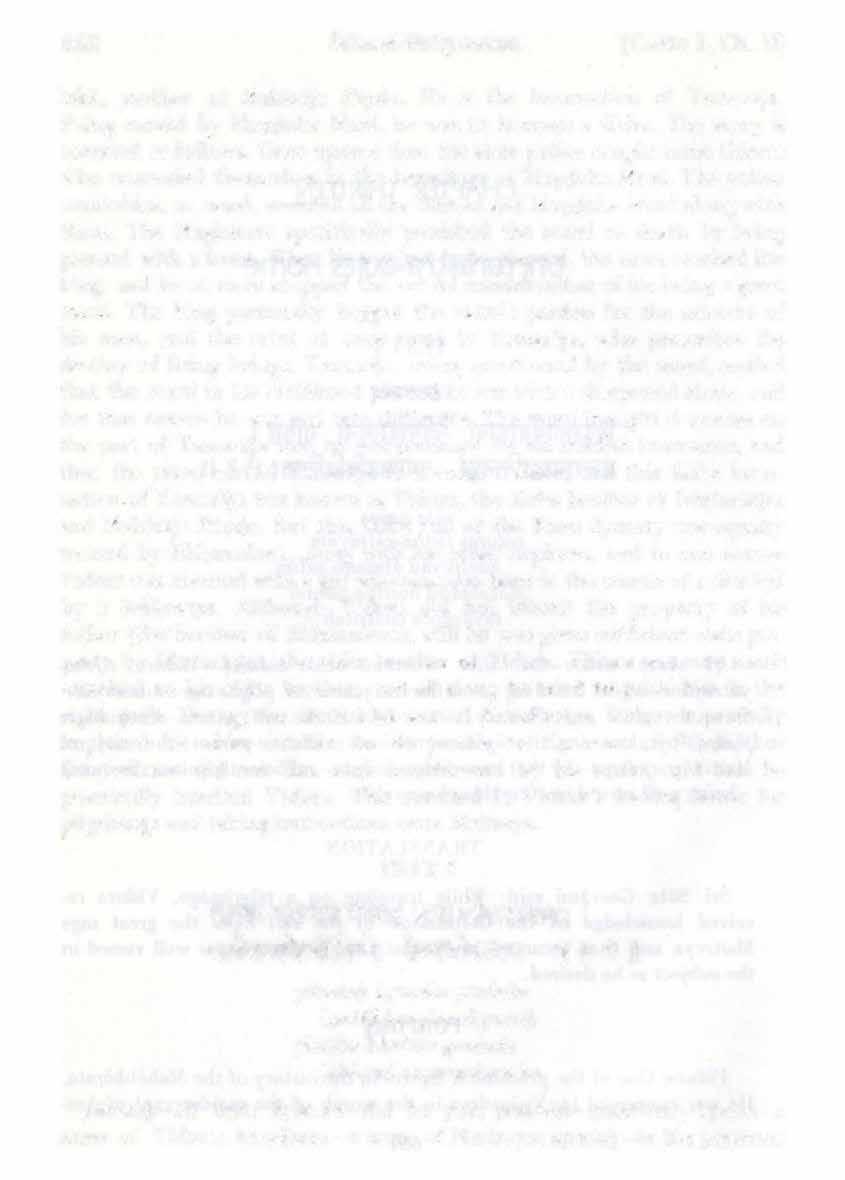
662 Srimad-Bhagavatam [Canto 1, Ch . 13
qmr: i6�U�31� ��'41<t41'1tt: I ii1Mcti¥tRtiin�� ��i)q((l+t � II � II yiivata� krtaviin prasniin k�attii kau�iiraviigrata� jiitaika-bhaktir govinde tebhyas coparariima ha yiivata�-all that; krtaviin-did he put; prasniin-questions ; k�attii-a name of Vidura; kau�iirava -a name of Maitreya; agrata� -in the presence
TEXT2
of; jata-having grown up; eka-one; bhakti�-transcendental loving service; govinde-unto Lord Kr�JJa; tebhya�-regarding further questions; ca-and; upararama-retired from; ha-in the past.

TRANSLATION
After asking various questions and becoming established in the transcendental loving service of Lord Kr�!ia, Vidura retired from putting questions to Maitreya Muni.
PURPORT
Vidura retired from putting questions before Maitreya Muni when he was convinced by Maitreya ��i that the summun bonum of life is to be finally situated in the transcendental loving service of Lord Sri Kr�JJa, who is Govinda or one who satisfies His devotees in all respects. The conditioned soul or living being in material existence seeks happiness by employing his senses in the modes of materialism, but that cannot give him satisfaction. He then searches after the Supreme Truth by the empiric philosophical speculative method and intellectual feats. But if he does not find the ultimate goal, he again goes down to material activities and engages himself in various philanthrophic and altruistic works, which all fail to give him satisfaction. So neither fruitive activities nor dry philosophical speculation can give one satisfaction because by nature a living being is the eternal servitor ofthe Supreme Lord Sri Kr�Da, and all the Vedic literatures give him direction towards that ultimate end. The Bhagavad-gzta confirms this statement (Bg.l5.15).
Like Vidura, an inquisitive conditioned soul must approach a bona fide spiritual master like Maitreya and by intelligent inquiries must try to know everything about karma (fruitive activities), jiiiina (philosophical research for the Supreme Truth)and yoga (the linking process of spiritual realization). One who is not seriously inclined to put questions before a spiritual master need not accommodate a show bottle spiritual master, nor should a person who may be a spiritual master for others pose to be so if he is unable to engage his disciple ultimatelyin the transcendental loving service of Lord Sri Krt>l)a. Vidura was successful in approaching a spiritual master like Maitreya, and he got the ultimate goal of life: bhakti unto Govinda. Thus there was nothing to be known further about spiritual progress.
Text 2] Dhftarli.!}!ra Quits Home 663
TEXTS 3-4
6 � qt �: 6(1�}it: I
t6(ift �� wr: �: 'P-IT II � II
ac;q•��: ��:«�:f�:mm
tam bandhum ii.gatarh dr§tvii dharma-putra� sahii.nuja� dhrtarii§tro yuyutsus ca siita� sii.radvata� prthii.

gii.ndhii.n draupadl brahman subhadra cottarii. krp"i anyii.S ca jii.maya� pii.r-!Jor
jnii.taya� sasutii.� striya�
tam-him; bandhum-relative; iigatam-having arrived there;dr§tvii-by seeingit;dharma-putra�- Yudhi��hira; sahii anuja[l-along with hisyounger brothers; dhrtarii§tra�-Dhrtara��ra; yuyutsu�-Satyaki; ca-and; siita�Saiijaya; sii.radvata�-Krpacarya; prthii.-Kunti; gii.ndhii.rl:-Gandhari; draupadl-Draupadi; brahman-0 brii.hmar-as; subhadrii-Subhadra; caand; uttarii-Uttara; krpi-Krpi;anyii�-others;ca-and;jiimayaft-wives of other family members; pii.r-!Jo�-of the Pal)<).avas;jnii.taya�-family members;sasutiift-along with their sons; striya�-the ladies.
TRANSLATION
When they saw Vidura return to the palace, all the inhabitants, Maharaja Yu<lhi!}thira, his younger brothers, Dhrtar�tra, Satyaki, Saiijaya, 1\.rpacarya, Kunti, Gandhari, Draupadi, Subhadra, Uttara, 1\.rpi, and many others, who were wives of the Kauravas, and other ladies with children, all hurried to him in great delight. It so appeared that they had regained their consciousness after a long period.
PURPORT
Giindhiiri: The ideal chastelady in the history of the world. She was the daughter of Maharaja Subala, the King of Gandhara (now Kanda�ar in Kabul), and in her maiden state she worshiped Lord Siva. Lord Siva is worshiped generally by the Hindu maidens to get a good husband.
664 Srimad-Bhagavatam [Canto l, Ch. 13
�������
Gandhari satisfied Lord Siva, and by his benediction to obtain one hundred sons, she was betrothed to Dhrtara�tra, despite his being blind forever. When Gandhari came to know that her would-be husband was a blind man, to follow her life companion she decided to become voluntarily blind. So she wrapped up her eyes with many silk linens, and she was married to Dhftara�tra under the guidance of her elder brother Sakuni. She was the most beautiful girl of her time, and she was equally qualified by her womanly qualities, which endeared every member of the Kaurava court. But despite all her good qualities, she had the natural frailties of a woman, and she was envious of Kunti when the latter gave birth to a male child. Both the queens were pregnant, but Kunti first gave birth to a male child. Thus Gandhari became angry and gave a blow to her own abdomen. As a result, she gave birth to a lump of flesh only, but since she was a devotee of Vyasadeva, by instruction of Vyasadeva the lump was divided into one hundred parts, and each part gradually developed to become a male child. Thus her ambition to become the mother of one hundred sons was fulfilled, and she began to nourish all the children according to her exalted position. When the intrigue of the battlefield of Kuruk�etra was going on, she was not in favor of fighting with the Pai)Q.avas; rather, she blamed Dhrtara�tra, her husband, for such a fratricidal war. She desired that the state be divided into two parts, for the sons of Piii)Q.u and her own. She was very affected when all her sons died in the Battle of Kuruk�etra, and she wanted to curse Bhimasena and Yudhi�thira, but she was checked by Vyasadeva. Her mourning over the death of Duryodhana and Dul).sasana before Lord Kr�l)a is very pitiful, and Lord Kr�l)a pacified her by transcendental messages. She was equally aggrieved on the death of Karl)a, and she described to Lord Kr�l)a the lamentation of Karl)a's wife. She was pacified by Srila Vyasadeva when he showed her dead sons, then promoted to the heavenly kingdoms. She died along with her husband in the jungles of the Himalayas near the mouth of the Ganges; she burned in a forest fire. Maharaja Yudhi�thira performed the death ceremony of his uncle and aunt.
Prthii: Daughter of Maharaja Surasena and sister of Vasudeva, Lord Kr�l)a's father. Later she was adopted by Maharaja Kuntibhoja, and hence she is known as Kunti. She is the incarnation of the success potency of the Personality of Godhead. The heavenly denizens from the upper planets used to visit the palace of the King Kuntibhoja, and Kunti was engaged for their reception. She also served the great mystic sage Durvasa, and being satisfied by her faithful service, Durvasa Muni gave her a mantra by which it was possible for her to call for any demigod she pleased. As a matter of inquisitiveness,she at oncecalled for the sun-god, who desired couplement

Texts 3-4] Dhftara�tra Quits Home 665
with her, but she declined. But the sun-god assured her immunity from virgin adulteration, and so she agreed to his proposal. As a result of this couplement, she became pregnant, and Karl).a was born by her. By the grace of the sun, she again turned into a virgin girl, but being afraid of her parents, she quitted the newly born child Karl).a. After that, when she actually selected her own husband, she preferred Pai).�U to be her husband. Maharaja Pai).�U later on wanted to retire from family life and adopt the renounced order of life. Kunti refused to allow her husband to adopt such life, but at last Maharaja Piil).�u gave her permission to become a mother of sons by calling some other suitable personalities. Kunti did not accept this proposal at first, but when vivid examples were set by Pai).�U she agreed_ Thus by dint of the mantra awarded by Durvasa Muni she called for Dharmaraja, and thus Yudhi�thira was born: She called for demigod Vayu (air), and thus Bhima was born. She called for lndra, the King of heaven, and thus Arjuna was born. The other two sons, namely Nakula and Sahadeva, were begotten by Pai).�U himself in the womb of Madri. Later on, Maharaja Pai).�U died at an early age, for which Kunti was so aggrieved that she fainted. Two cowives, namely Kunti and Madri, decided that Kunti should live for the maintenance of the five minor children, the Pa��avas, and Madri should accept the sat"i rituals by meeting voluntary death along with her husband. This agreement was endorsed by great sages like Satasrriga and others present on the occasion.
Later on, when the Pa��avas were banished from the kingdom by the intrigues of Duryodhana, Kunti followed her sons, and she equally faced all sorts of difficulties during those days, During the forest life one demon girl, HiQ.imbi, wanted Bhima as her husband, which was refused by Bhima, but when the girl approached Kunti and Yudhi�thira, they ordered Bhima to accept her proposal and give her a son. As a result of this combination, Ghatotkach was born, and he fought very valiantly with his father against the Kauravas. In their forest life they lived with a brahmarta family that was in trouble because of one Bakasura demon, and Kunti ordered Bhima to kill the Bakasura to protect the brahmap.a family against troubles created by the demon. She advised Yudhi�thira to start for the Paficaladesa. Draupadi was gained in this Paficala-de8a by Arjuna, but by order of Kunti all the five brothers of the Pa��avas became equallythe husbands of Paficali or Draupadi. She was married with five Pa��avas in the presence of Vyasadeva. Kuntidevi never forgot her first child, Karl).a, and after Kar�a's death in the Battle of Kuruk�etra she lamented and admitted before her other sons that Karl).a was her eldest son prior to her marriage with Maharaja Pa�Q.u. After the Battle of Kuruk�etra, when Lord Kr�l).a was going back home, her prayers for the Lord are excellently explained. Later

666 Srimad-Bhagavatam [Canto l, Ch. 13
she went to the forest with Gandhari for severe penance. She used to take meals after each thirty days. She finally sat down in profound meditation and later burned to ashes in a forest fire.
Draupadi: The most ch,aste daughter of Maharaja Drupada and partly an incarnation of goddess Saci, the wife of Indra. Maharaja Drupada performed a great sacrifice under the superintendence of the sage Yaja. By his first offering, Dhr�tadyumna was born, and by the second offering, Draupadi was born. She is therefore the sister of Dhr�tadyumna, and she is also named Pancali. The five Pal)«;lavas married her as a common wife, and each of them begot a son in her. Maharaja Yudhi�thira begot a son named Pratibindh, Bhimasena begot a son named Sutasome, Arjuna begot Srutakirti, Nakula begot Satanika, and Sahadeva begot Srutakama. She is described as a most beautiful lady, equal to her mother-in-law Kunti. During her birth there was an aero-message that she should be called Kr�qa. The same message also declared that she is born to kill many a k§atriya. By dint of her blessings from Sankara, she was awarded five husbands,equallyqualified.When she preferred to select her own husband, princes and kings were invited from all the countries of the world. She was married with the Pal)«;lavas during their exile in the forest, but when they went back home Maharaja Drupada gave them immense wealth as a dowry. She was well received by all the daughters-in-law of Dhrtara�tra. When she was lost in a gambling game, she was forcibly dragged into the assembly hall, and an attempt was made to see her naked beauty by DuJ:tsasana, even though there were elderly persons like Bhi�ma and Drol)a present. She was a great devotee of Lord Kr�l)a, and by her praying, the Lord Himself became an unlimited garment to save her from the insult. A demon of the name Jatasura kidnapped her, but her second husband Bhimasena killed the demon and saved her. She saved the Pal)«;iavas from the curse of Mahar�i Durvasa by the grace of Lord Kr�J)a. When the Pal)«;lavas lived incognito in the palace of Virata, Kicaka was attracted by her exquisite beauty, and by arrangement with Bhima the devil waskilled and she was saved. She was very much aggrieved when her five sons were killed by Asvatthama. At the last stage, she accompanied her husband Yudhi�thira and others and fell on the way. The cause of her falling was explained by Yudhi�thira, but when Yudhi�thira entered the heavenly planet he saw Draupadi gloriously present there as the goddess of fortune in the heavenly planet.
Subhadrii: Daughter of Vasudeva and sister of Lord Sri Kr�J)a. She was not only a very dear daughter of Vasudeva, but also a very dear sister to both Kr�l)a and Baladeva. The two brothers and sister are represented in

T�xts 3-4) Dhftar�!ra Quits Home 667
the famous JagannathaTempleof Pun, andthetemple is stillvisitedby thousandsofpilgrimsdaily. This templeisinremembranceoftheLord's visitatKuruk!}etraduringanoccasionofsolareclipseand His subsequent meetingwiththeresidentsofVrndavana.ThemeetingofRadhaandKr�pa duringthisoccasionis-averypatheticstory,andLord Sri Caitanyainthe ecstasyofRadhara!llalwayspinedforLord Sri Kmtaat Jagannatha Pun. WhileAtjunawasatDvaraka,hewantedtohaveSuhhadraashisqueen,.and he expressed his desire to Lord Kr�!la. Sri Kr�pa knew that Hiselder brother,LordBaladeva,wasarranginghermarriageelsewhere,andsinceHe didnotdaretogoagainstthearrangementofBaladeva,HeadvisedArjuna tokidnapSuhhadra.Sowhen all ofthemwereonapleasuretriponthe Raivata Hill, ArjunamanagedtokidnapSuhhadraaccordingtotheplanof Sri Kr�!la- Sri BaladevawasveryangryatArjuna,andHewantedto kill him, hut Lord �pa implored His brother to excuse Arjuna. Then Suhhadra was duly married with Arjuna, and Ahhimanyuwashorn of Suhhadra. At the premature death of Ahhimanyu, Suhhadra was very mortified,hutonthebirthofParik�itshewashappyandsolaced.
TEXTS
pmtyujjagmu[l. prahaf1epa
praflarh tanva ivagatam
abhisangamya vidhivat

pari§vangabhivadanaifl.

prati-towards; ujjagmufl.-went; prahar�e!la-with greatdelight; priipam -life; tanva[l.-of thebody;iva-like;iigatam-returnedhack; abhisangamya -approaching; vidhivat-indueform; pari.§uanga-emhracing; abhivadanai[l. -byoheisanc�.
TRANSLATION
Withgreatdelightthey all approachedhim,asiflifereturnedtotheir bodies. They exchanged obeisances and welcomed each other with embraces.
668
Ch. 13
Srimad-Bhagavatam [Canto I,
In the absence of consciousness, the limbs of the body remain inactive. But when consciousness returns, the limbs and senses become active, and existem;e itself becomes delightful. Vidura was so dear to the members of the Kaurava family that his long absence from the palace was comparable to inactivity. All of them were feeling acute separation from Vidura, and therefore his return to the palace wasjoyful for all.
TEXT6 m: f'CI(il���·6(t: 1 00

mumucu[l prema-bii�paugharh
virahautkarzfhya-katara[l raja tam arhayaii cakre
krtiisana-parigraham
mumucu[l-emanated; prema-affectionate; bii�paugham-emotional tears; viraha-separation; autkarzfhya-anxiousness; katarii[l-being aggrieved; riijii-King Yud�thira; tam-unto him (Vidura); arhayan-reception; cakre-offered; krta-performance of; iisana-sitting accommodations;parigraham-arrangement of.


TRANSLATION
Due to anxieties and long separation, they all cried out of affection. King Yu�thira then arranged to offer sitting accommodations and a reception.
TEXT7 d "!!4� R�lk1'41(1l;f Wct'lteitI

spj��lii4-«�(m sm: � � 'R�II \9 II
tam bhuktavantarh vi.Srantam
iisinarh sukham-iisane
prasrayavanato raja
praha te�arh ca srrzvatam
Text7] Dhftar�traQuits Home 669
PURPORT
��
t�le-«qf(st(¥(II� II
tam-him (Vidura); bhuktavantam-after feeding him sumptuously; visriintam-and having taken rest;iisina�-being seated;sukham iisane-on a comfortable seat; prasraya-avanata[l.-naturally very gentle and meek; nzja-King Yudhi�thira; praha-began to speak; te§iim ca-and by them; srr-vatiim-being heard.
TRANSLATION
After Vidura ate sumptuously and took sufficient rest, he was comfortably seated. Then the King began to speak to him, and all who were present there listened.
PURPORT
King Yudhi�thira was expert in reception also, even in the case of his family members. Vidura was well received by all the family members by exchange of embraces and obeisances.Afterthat,bathingandarrangements for a sumptuous dinner were made, and then he was given sufficient rest. Mter finishing his rest, he was offered a comfortable place to sit, and then the King began to talk about all happenings, both family and otherwise. That is the proper way to receive a beloved friend, or even an enemy. According to Indian moral codes, even an enemy received at home should be so well received that he will not feel any fearful situation. An enemy is always afraid of his enemy, but this should not be so when he is received at home by his enemy. This means that a person, when received at home, should be treated as a relative, so what to speak of a family member like Vidura, who was a well-wisher for all the members of the family. Thus Yudhi�thira Maharaja began to speak in the presence of all other members.

670 Srimad-Bhagavatam [Canto l, Ch_ 13
TEXTS �'!CITU 3IA � ;ft�4¥{�qas'b0l�R1�N<�l'll AqAUiifl'ti;W411«iM61�€(1+tld}fii:II � II yudh�thira uviica api smaratha no yu§matpak§ac-chiiyii-samedhitiin vipad-gar-iid v�iignyiider mocitii yat sa-miitrkii[l.
yudh�thira[l uvaca-Maharaja Yudhi�thira said;api-whether;smarothayou remember;na[l- us;yu§mat-from you;pak§at-partiality towards us like the wings of a bird;saya-protection; samedhitan-we who were brought up by you;vipat-gartiit-from various types of calamities;vi.§aby administration of poison; agnyiide[l-by setting on fire; mocita[lreleased from;yat-what you have done;sa-along with;miitrkiifl.-our mother.
TRANSLATION
Maharaja Yu�1hira said: My uncle, do you remember how you always protected us, along with our mother, from all sorts of calamities? Your partiality, like wings of a bird, saved us from poisoning and arson.
PURPORT
Due to Pandu's death at an early age, his minor children and widowwere the object of special care by all the elderly members of the family, especially Blu�madeva and Mahatma Vidura. Vidura was more or less partial to the Pap.�avas due to their political position. Although Dhrtara�tra was equally careful for the minor children of Maharaja Pap.�u, he was one of the intriguing parties who wanted to wash away the descendants of Pap.�u and replace them by raising his own sons to become the rulers of the kingdom. Mahatma Vidura could follow this intrigue of Dhftara�tra and company, and therefore, even though he was a faithful servitor of his eldest brother Dhftara�!fa, he did not like his political ambition for the sake of his own sons. He was therefore very careful about the protection of the Pap.�avas and their widow mother. Thus he was, so to speak, partial to the Pap.�avas, preferring them to the sons of Dhftara�tra, although both of them were equally affectionate in his ordinary eyes. He was equally affectionate to both the camps of nephews in the sense that he always chastised Duryodhana for his intriguing policy against his cousins. He always criticized his elder brother for his policy of encouragement to his sons, and at the same time he was always alert in giving special protection to the Pap.�avas. All these different activities of Vidura within the palace politics made him well·known as partial to the Pap.�avas. Maharaja Yudhi�thira has referred to the past history of Vidura before his going away from home for a prolonged pilgrim's journey. Maharaja Yudhi�thira reminded him that he was equally kind and partial to his grown-up nephews, even after the Battle of Kuruk�etra, a great family disaster.

Text 8] Dhrtar�p-a Quits Home 671
Before the Battle of Kuruk�etra, Dhp:ara�tra's policy was peaceful annihilation of his nephews, and therefore he ordered Purocana to build a house at Vara!lavat, and when thebuilding was finished Dhftara�tra desired that his brother's family live there for some time. When the Pa!l�avas were going there in the presence of all the members of the royal family, Vidura tactfully gave instructions to the Pa!l�avas about the future plan of Dhftara�tra. This is specifically described in the Mahiibhiirata (Ch.l44Adiparva). He indirectly hinted, "A weapon not made of steel or any other material element can be more than sharp to kill an enemy, and he who knows this is never killed." That is to say, he hinted that the party of the Pa!l�avas was_ being sent to Vara!lavat to be killed, and thus he warned Yudhi�thira to be very careful in their new residential palace. He also gave indications of fire and said that fire cannot extinguish the soul, but it can annihilate the material body. But one who protects the soul can live. Kunti could not follow such indirect conversations between Maharaja Yudhi�thira and Vidura, and thus when she inquired from her son about the purport of the conversation, Yudhi�thira replied that from the talks of Vidura it was understood that there was a hint of fire in the house where they were proceeding. Later on, Vidura came in disguise to the Pa!l�avas and informed them that the housekeeper was going to set fire to the house on the fourteenth night of the waning moon. It was an intrigue of Dhftara�tra that the P3.!1�avas might die all together with their mother. And by his warning the Pa!l�avas escaped through a tunnel underneath the earth so that their escape was also unknown to Dhftara�tra, so much so that after setting the fire, the Kauravas were so certain of the death of the Pa!l�avas that Dhrtara(ltra performed the last rites of death with great cheerfulness. And during the mourning period all the members of the palace became overwhelmed with lamentation, but Vidura did not become so, because of his knowledge that the Pa1;1�avas were alive somewhere. There are many such instances of calamities, and in each of them Vidura gave protection to the Pa!l�avas on one hand, and on the other he tried torestrain his brother Dhftara�tra from such intriguing policies. Therefore, he was always partial to the Pa!l�avas, just as a bird protects its eggs by his wing.

672 Srimad-Bhagavatam [Canto l, Ch . 13
TEXT9 � �erlW��:r���, �if.l�fF'�IM �NijlWfl$0 � II Q.. II
Quits Home
kayii vrttyii vartitam vas caradbhifl k�iti-map!falam
tirthiini k�etra-mukhyiini sevitiiniha bhiitale
kayii-by which; v . rttyii-means; vartitam-maintained your livelihood; va[l-your good self; caradbhi[l-while traveling; k�iti-miip!falam-on the surface of the earth; tirthiini -places of pilgrimage; k�etra-mukhyiini-the principal holy places; sevitiini- served by you; iha- in this world; bhiitaleon this planet.
TRANSLATION
While traveling on the surface of the earth, how did you maintain your livelihood? At which holy places and pilgrimages did you render service?
PURPORT
Vidura went out from the palace to detach himself from household affairs, especially political intrigues. As referred to hereinbefore, he was practically insulted by Duryodhana's calling him a son of a siidriipi, although it was not out of place to talk loosely in the case of one's grandmother. Vidura's mother,although a siidriip� was the grandmother of Duryodhana, andfunny talks are sometimes allowed betweengrandmother and grandchildren. But because the remark was an actual fact, it was unpalatable talk for Vidura, and it was accepted as a direct insult. He therefore decided toquit his paternal house and prepare forthe renounced order of life. This preparatory stage is called viinaprastha-iisrama, or retired life for traveling and visiting the holy places on the surface of the earth. In the holy places of India, like Vrndavana, Hardvar, Jagannatha Puri, Prayaga, etc., there are many great devotees, and there are still free kitchen houses for persons who desire to advance spiritually. Maharaja Yudhi�thira was inquisitive to learn whether Vidura maintained himself by the mercy of the free kitchen houses (chhatras).

Text 10) Dhftar�a
673
10 �(1:1T llt•tcHtl���n � Rit I ffitftt���if.� �:����II� o II
TEXT
Srimad-Bhagavatam

bhavad-vidhii bhiigavatiis
tirtha-bhutii[l svayarh vibho
tirthikurvanti tirthiini
sviinta[l-sthena gadiibhrtii
bhavat-your good self; vidhii[l-like; bhiigavatii[l- devotees; tirtha -the holy places of pilgrimage; bhutii[l-converted into; svayam-personally; bibho-0 powerful one;tirthikurvanti-make into aholy place of pilgrimage; tirthiini-the holy places; sviinta[l-sthena-having been situated in the heart; gadiibhrtii-the Personality of Godhead.
TRANSLATION
My Lord, devotees like your good self are verily holy places personified. Because you carry the Personality of Godhead within your heart, you turn all places into places of pilgrimage.
PURPORT
The Personality of Godhead is omnipresent by His diverse potencies everywhere, just as electricity power is distributed everywhere within space. Similarly, the Lord's omnipresence is perceived and manifested by His unalloyed devotees like Vidura, just as electricity is manifested in an electric bulb. A pure devotee like Vidura always feels the presence of the Lord everywhere. He sees everything in the potency of the Lord and the Lord in everything. The holy places all over the earth are meant for purifying the polluted consciousness of the human being by an atmosphere surcharged with the presence of the Lord's unalloyed devotees. If anyone visits a holy place, he must search out the pure devotees residing in such holy places, take lessons from them, try to apply such instructions in practical life and thus gradually prepare oneself for the ultimate salvation, going back to Godhead. To go to some holy place of pilgrimage does not mean only to take a bath in the Ganges or Yamuna or to visit the temples situated in those places. One should also find out representatives of Vidura who have no other desire in life save and except to serve the Personality of Godhead. The Personality of Godhead is always with such pure devotees because of their unalloyed service which is without any tinge of fruitive action. They are in the actual service of the Lord specifically by the process of hearing and chanting. The pure devotees hear from the authorities and chant, sing and write of the glories of the Lord. Mahamuni Vyasadeva heard from Narada, and then he chanted in writing; Sukadeva
674
[Canto l, Ch. 13
Gosvami studied from his father, and he described it to Parik�it; that is the way of Srimad-Bhiigavatam. So by their actions the pure devotees of the Lord can render any place into a place of pilgrimage, and the holy places are worth the name only on their account. Such pure devotees are able to rectify the polluted atmosphere of any place, and what to speak of a holy place rendered unholy by the questionable actions of interested persons who try to adopt a professional life at the cost of the reputation of a holy place.
TEXT 11

atfq 91: ij((((ijiii �: �: I
-at: �qf �: � ij(CI+tl«� II��II
api na[l suhrdas tiita
biindhavii[lknTJa-devatii[l dn!iib- srutii viiyadava[l sva-puryiim sukham iisate
api-whether; na[l-our; suhrdafi.-well-wishers; tiita-0 my uncle; biindhavii[l-friends; kr.sr-a-devatii[l-those who are always rapt in the service of Lord Sri Kr�IJ.a; dr�!ii[l-by seeing them; srutii[l-or by hearing about them; vii-either; yadava[l-the descendants of Yadu; sva-puryiimalong with their residential place; sukham iisate-if they are all happy.
TRANSLATION
My uncle, you must have visited Dvaraka. In that holy place there are our friends and well-wishers, the descendants of Yadu, who are always rapt in the service of the Lord Sri l<f�J.la. You might have seen them or heardabout them. Are they all living happily in their abodes?
PURPORT
The particular word Kr�!la-devatii[l, i.e., those who are always rapt in the service of Lord Kr�!J.a, is significant. The Yadavas and the Pa!l�avas, who were always rapt in the thought of the Lord Kr�l)a and His different transcendental activities; were all pure devotees of the Lord like Vidura. Vidura left home in order to devote himself completely to the service of the Lord, but the Piil)�avas and the Yadavas were always rapt in the thought of Lord Kr�!J.a. Thus there is nodifference in their pure devotional
Text 11) Dhftar�p-a Quits Home 675
qualities. Either remaining at home or leaving home, the realqualification of a pure devotee is to become rapt in the thought of Kw;ta favorably, i.e., knowingwell that Lord Kr�!!a is the Absolute Personality of Godhead. Kamsa, Jarasandha, Sisupala and other demons like them were also always rapt in the thought of Lord Kr�Qa, but they were absorbed_in adifferent way, namely unfavorably, or thinking Him to be a powerful man only. Therefore, Kamsa and SiSupala are not on the same levelof puredevotees like Vidura, the Pa!!�avas or the Yadavas.
Maharaja Yudhi�thira was also always rapt in the thought of Lord Kr�!!a and His associates at Dvaraka. Otherwise he would not have asked all about them from Vidura. Maharaja Yudhi�thira is, therefore, on the same level of devotion as Vidura, although engaged in the state affairsof thekingdom ofthe world.
TEXT 12

ityukto dharma-riijena saroam tat samavarrtayat yathiinubhutam kramaso vinii yadu-kulak§ayam
iti-thus; ukta[t-being asked; dharmariijena-by King Yudhi�hira; saroam-all;tat-that;samavaJ1layat-properlydescribed;yathii-anubhutam -as he experienced;. kramasa[t-one after another; vina-without; yadukulak§ayam-annihilationof the Yadu dynasty.



TRANSLATION
Thus being questioned by Maharaja Yudhi�ra, Mahatma Vidura gradually described everything that he personally experienced, except news of the annihilation of the Yadu dynasty.
TEXT 13

676 Srimad-Bhagavatam [Canto 1, Ch. 13
� \if�(·�� � �Q¥(€CUl�� I � � fCRT �����II
�� � I �·�a:��Q'i� �:��¥(�¥(: ������
nanv apriyam duroi1aham
n.rpiim svayam upasthitam
niivedayat sakaruro
duflkhitiin dra§tum ak�amafl
nanu-as a matter of fact; apriyam-unpalatahle; duro�aham-unhearahle; n .rpiim-of humankind; svayam-in its own way; upasthitamappearance; na-did not; iivedayat-expressed; sakaruzwfl-compassionate; duflkhitiin-distressed; dra�tum-to see; ak�amafl-unahle.
TRANSLATION
Compassionate Mahatma Vidura could not stand to see the p-ll!l�avas distressed at any time. Therefore he did not disclose this unpalatable and unbearable incidence because calamities come of their own accord.
PURPORT
AccordingtoNiti-siistra (civic laws) one should not speak an unpalatable truth to cause distress to others. Distress comes upon us in its own way by the laws of nature, so one should not aggravate it by propaganda. For a compassionate soul like Vidura, especially in his dealings with the beloved Pap�avas, it was almost impossible to disclose an unpalatable pieceofnews like the annihilation of the Yadudynasty.Thereforepurposelyhe refrained from it.
TEXT 14

�-�l�¥i�l�l«ft«"t€tdl <1!4€t�(ili(I !lii�S� �ttftiffi';fqi «�� II�\lll
kancit kiilam athiiviitsit satkrto devavat sukham
bhriitur jye�thasya sreyas-krt
saroe�iim sukham iivahan
kaiicit-for a few days; kiilam-time; atha-thus; aviitsit-resided; satkrtafl-being well treated; devavat-just like a godly personality; sukham -amenities; bhriitu[l.-of the brother; jye§thasya-of the elder; sreyaskrtfor doing good to him; saroe�iim-all others; sukham-happiness; iivahanmade it possible.
Text 14] Dhftari!tra
Quits Home
677
Thus Mahatma Vidura, being treated just like a godly person by his kinsmen, remained there for a certain period just to pacify the mentality of his eldest brother and in this way bring happiness to all the others.
PURPORT

Saintly persons like Vidura must he treated as well as a denizen from heaven. In those days denizens of heavenly planets used to visit homes like that of Maharaja Yu�thira, and sometimes persons like Arjuna and others used to visit higher planets. Narada is a spaceman who can travel unrestrictedly, not only within the material universes but also in the spiritual universes. Even Narada used to visit the palace of Maharaja Yudhi.J?thira and what to speak of other celestial demigods. It is only the spiritual culture of.the people concerned that makes interplanetary travel possible, even in the present body. Maharaja Yudhi�thira therefore received Vidura in the manner of a reception offered to the demigods.
Mahatma Vidura had already adopted the renounced order of life, and therefore he did not return to his paternal palace to enjoy some material comforts. He accepted out of his own mercy what was offered to him by Maharaja Yudhi�thira, but the purpose of living in the palacewas to deliver his too much materially attached elder brother Dhftara�tra. Dhrtara�tra lost all his state and descendants in the fight with Maharaja Yudhi�thira, and still, due to his senseof helplessness,he did not feel ashamed to accept the charity and hospitality of Maharaja Yudhi�thira. On the part of Maharaja Yudhi�thira, it was quite in order to maintain his uncle in a befitting manner, but acceptance of such magnanimous hospitality by Dhftara�tra was not at all desirable. He accepted it because he thought that there was no other alternative. Vidura particularly came to enlighten Dhftara�tra and to give him a lift to the higher status of spiritual cognition. It is the duty of enlightened souls to deliver the fallen ones, and Vidura came for that reason. But talks of spiritual enlightenment are so refreshing that while instructing Dhftara�tra, Vidura attracted the attention of all the members of the family, and all of them took pleasure in hearing him patiently. This is the way of spiritual realization. The message should be heard attentively, and if spoken QY a realized soul, it will act on the dormant heart of the conditioned soul. And by continuously hearing, one can attain the perfect stage of self-realization.

678 Srimad-Bhagavatam [Canto I, Ch. 13
TRANSLATION
TEXT 15

� � �qNC(f44il� I
�Nt\iEffi U,� 4114ui\titda �: ����II
abibhrad aryamii daruJam yathiivad aghakiiri§u yiivad dadhiira sudratvam siipiid va�a5atam yama�
abibhrat-administered; aryamii-Aryama; da{l{Iam-punishment; yathiiv at- as it was suitable; aghakiiri§u-unto the persons who committed sins; yavat-as long as; dadhara-accepted; sudratvam-the tabernacle of a sudra; siipiit-as the result of a curse; var§asatam-for one hundred years; yama�-Yamaraja.
TRANSLATION
As long as Vidura played the part of a siidra, being cursed by Mru;u,luka Muni, Aryama officiated at the post of Yamaraja to punish those who committed sinful acts.
PURPORT
Vidura, born in the womb of a siidra woman, was forbidden even to a party of royal heritage along with his brothers Dhftara�tra and Pa!l!lu. Then how could he occupy the post of a preacher to instruct such learned kings and k�atriyas as Dhftara�tra and Maharaja Yudhi�thira? The first answer is that even though it is accepted that he was siidra by birth, because he renounced the world for spiritualenlightenment by the authority of :{t�i Maitreya and was thoroughly educated by him in transcendental knowledge, he was quite competent to occupy the post of an iiciirya or spiritual preceptor. According to Sri Caitanya Mahaprabhu, anyone who is conversant in the transcendental knowledge or the science of Godhead, be he a briihmar-a or a siidra, a householder or a sannyiis� is eligible to become a spiritual master. Even in the ordinary moral codes (maintained by Ca!lakya Pa!l!iit, the great politician and moralist) there is no harm in taking lessons from a person who may be by birth less than a siidra. This is one part of the answer. The other is that Vidura was not actually a
Text 15) Dhrtar�va Quits Home
679
sudra. He was to play the part of a so-called sudra for one hundred years, being cursed by Ma!J.�uka Muni. He was the incarnation of Yamaraja, one of the twelve Mahajanas on the level with such exalted personalities as Brahma, Narada, Siva, Kapila, Bln�ma, Prahlada, etc. Being a Mahajana, it is the duty of Yamaraja to preach the cult of devotion to the people of the world, as Narada, Brahma, and other Mahajanas do. But Yamaraja is always busy in his plutonic kingdom, punishing the doers of sinful acts. Yamaraja is deputed by the Lord to a particular planet, some hundreds of thousands of miles away from the planet of earth, to take away the corrupt souls after death and convict them in accordance withtheirrespective sinful activities. Thus Yamaraja has very little time to take leave from his responsible office of punishing the wrongdoers. There are more wrongdoers than righteous men. Therefore, Yamaraja has to do more work than other demigods who are also authorized agents of the Supreme Lord. But he wanted to preach the glories of the Lord, and therefore by the will of the Lord he was cursed by Ma!J.�uka Muni to come into the world in the incarnation of Vidura and work very hard as a great devotee. Such a devotee is neither a sudra nor a briihmar-a. He is transcendental to such divisions of mundane society, just as the Personality of Godhead assumes His incarnation as a hog, but He is neither a hog nor a Brahma. He is above all mundane creatures. The Lord and His different authorized devotees sometimes have to play the role of many lower creatures to claim the conditioned souls, but both the Lord and His pure devotees are always in the transcendental position. When Yamaraja thus incarnated himself as Vidura, his post was officiated by Aryama, one of the many sons of Ka8yapa and Aditi. The Adityas are sons of Aditi, and there are twelve Adityas. Aryama is one of the twelve Adityas, and therefore it was quite possible for him to take charge of the office of Yamaraja during his one hundred years' absence in the form of Vidura. The conclusion is that Vidura was never a sudra, but was greater than the purest type of briihmar-a.

680 Srimad-Bhagavatam [Canto 1, Ch. 13
TEXT 16 �ro �qr tfutte\:1((' - �f�ll��ll yudh�thiro Iabdha-riijyo d.�tva pautram kulandharam bhratrbhir loka-piilabhair mumude parayii sriyii
yudh�thira�- Yud�thira; labdha-riijya�-possessing his paternal kingdom; dr�tvii-by seeing; pautram-the grandson; kulandharam-just suitable for the dynasty; bhriitrbh�-by the brothers; loka-piilabhai�-who were allexpertadministrators; mumude-enjoyedlife;parayii-uncommon; sriyii-opulence.

TRANSLATION
Having won his kingdom and observed the birth of one grandson competent to continue the noble tradition of his family, Maharaja Yudhi�hira reigned peacefully and enjoyed uncommon opulence in cooperation with his younger brothers, who were all expert administrators to the common people.
PURPORT
Both Maharaja Yudhi�thira and Arjuna were unhappy from the beginning of the Battle of Kuruk�etra, but even though they were unwilling to killtheirownmenin thefight, ithadtobedone as a matter of duty, for it was planned by the supreme will of Lord Sri Kr�!la. After the battle, Maharaja Yu�thira was unhappy over such mass killings. Practically there were none to continue the Kuru dynasty after them, the Pii!i�avas. Theonlyremaining hope was thechildin thewomb of his daughter-in-law, Uttara, and he was also attacked by A.Svatthama, but by the grace of the Lord the child was saved. So after the settlement of all disturbing conditions and reestablishment of the peaceful order of the state, and after seeing the surviving child Parik�it well satisfied, Maharaja felt some relief as a human being, although he had very little attraction for material happiness, which is always illusory andtemporary.


TEXT 17

�m�
Sl'i"E'II;wf I
�: q(+{§;(ij(t II �\911
evarh grhe§u saktiiniirh
pramattiiniirh tadihayii
atyakriimad avijniita�
kiila�parama-dustara�
evam-thus;grhe§u-in the family affairs; saktiiniim-of personswho are too attached; pramattiiniim-insanely attached; tadihayii-engrossed in
Text 17] Dhrtar�p-a Quits Home 681
such thoughts; atyakriimat-surpassed; avijniita[l-imperceptihly; kiila[l.eternal time;parama-supremely; dustara[l-insurmountahle.
TRANSLATION
Insurmountable, eternal time imperceptibly overcomes those who are too much attached to family affairs and are always engrossed in their thought.
PURPORT

"I am now happy; I have everything in order; my hank balance is quite enough; I can now give my children enough estate; I am now successful; the poor beggar sannyiis"is depend on God, but they come to beg from me; therefore I am more than the Supreme God, etc." are some of the thoughts which engross the insanely attached householder who is blind to the passingof eternaltime. Our duration of life ismeasured, and no one is able to enhance it even by a second against the scheduled time ordained by the supreme will. Such valuable time, especially for the human being, should be cautiously spent because even a second passed away imperceptibly cannot he replaced, even in exchange of thousands of golden coins amassed by hard labor. Every second of human life is meant for making an ultimate solution to the problems of life, i.e. repetition of birth and death and revolving in the cycle of 8,400,000 different species of life. The material hQdy, which is subject to birth and death, diseases and old age, is the cause of all sufferings of the living being, otherwise the living being is eternal: he is never horn, nor does he ever die. Foolish persons forget this problem. They do not know at all how to solve the problems of life, but become engrossed in temporary family affairs without knowing that the eternal time is passing away imperceptibly, and their measured duration of life is diminishing every second without any solution of the big problem, namely repetition of birth and death, disease and old age. This is called illusion.
But such illusion cannot work on one who is awake in devotionalservice of the Lord. Yudhi�thira Maharaja, or his brothers the Pappavas, were all engaged in the service of the Lord Sri Kf�pa, and they had very little attraction for the illusory happiness of this material world. 1\.s we have discussed previously, Maharaja Yudhi�thira was fixed up in the service of the Lord Mukunda (the Lord who can award salvation), and therefore he had no attraction even for such comforts of life as are available in the kingdom of heaven, because even the happiness obtained in the planet of Brahmaloka is also temporary and illusory. Because the living being is
682 Srimad-Bhagavatam [Canto l, Ch. 13
eternal, he can be happy only in the eternal abode of the kingdom of God (Paravyoma) from which no one returns to this region of repeated birth and death, disease and old age. Therefore, any comforts of life or any material happiness, which does not warrant an eternal life, are but illusion for the eternal living being. One who understands this factually is learned, and such a learned person can sacrifice any amount of material happiness to achieve the desired goal known as brahma-sukham or absolute happiness. Real transcendentalists are hungry for this happiness, and as a hungry man cannot be made happy by all comforts of life minus foodstuff, so the hungry man for eternal absolute happiness cannot be satisfied by any amount of material happiness. Therefore, the instruction described in this verse cannot be applied to Maharaja Yudhi�thira or his brothers and mother. It was meant for persons like Dhftara�!fa, for whom Vidura came especially to impart lessons.
TEXT 18
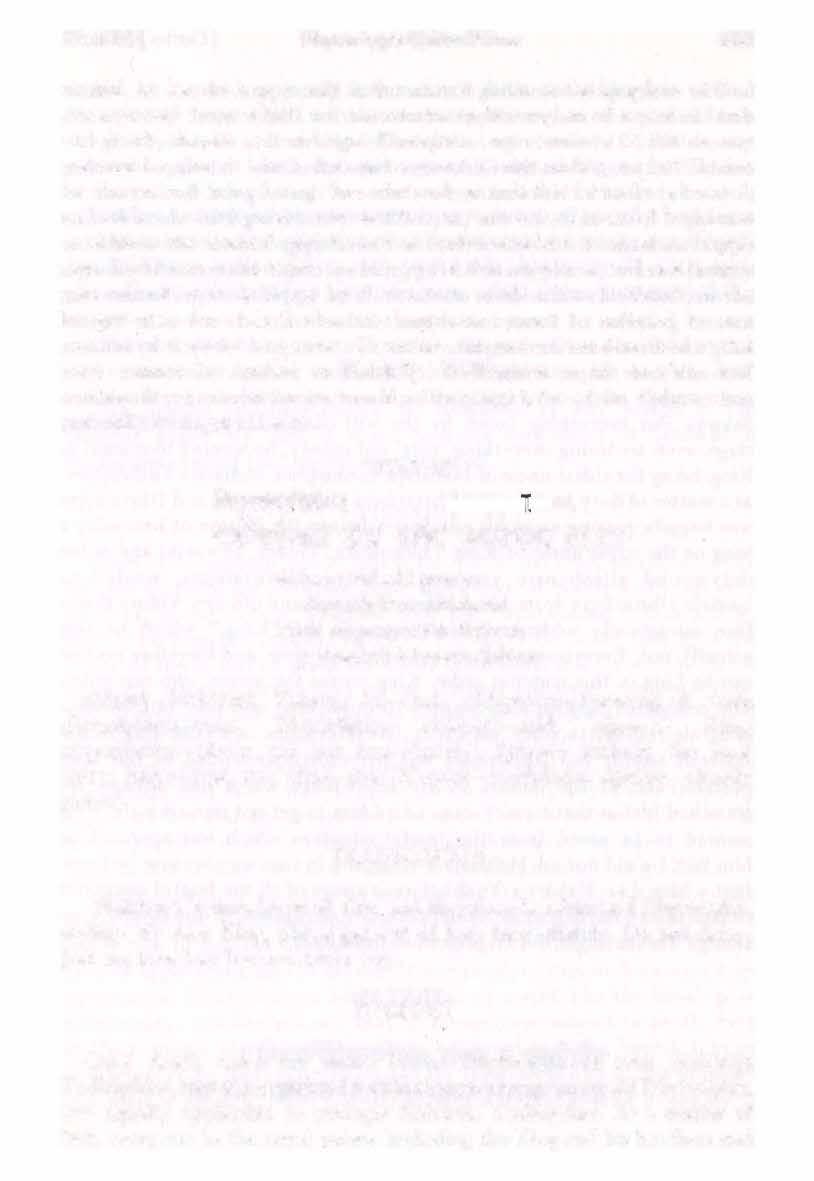
N§)«ad11�ffl
UJtfo$1•lRt<tf
viduras tad abhipretya
dhrtarf4tram abhii§ata riijan nirgamyatiirh sighrarh
pa5yedarh bhayam iigatam
vidura[t- Mahatma Vidura; tat-that; abhipretya-knowing it well; dhrtarii§tram-unto Dhrtara�tra; abhii§ata-said; riijan-0 King; nirgamyatiim-please get out immediately; sighram-without the least delay; pasya-just see; idam-this; bhayam-fearfulness; iigcitam-already arrived.


TRANSLATION
Mahatma Vidura knew all this, and therefore he addressed Dhftar�!fa, saying: My dear King, please get out of here immediately. Do not delay. Just see how fear has overtaken you.
PURPORT
Cruel death cares for none, be he Dhftara�tra or even Maharaja Yudhi�thira;therefore spiritual instruction, as was given to old Dhrtara�tra, was equally applicable to younger Maharaja Yudhi�thira. As a matter of fact, everyone in the royal palace including the King and his brothers and
Text 18] Dhrtara�a Quits Home 683
�d I � ¥tti•U•I<t'(II��II
mother was raptly attending the lectures. But it was known to Vidura that his instructions were especially meant for Dhrtara�tra, who was too materialistic. The word riijan is especially addressed to Dhftara�tra significantly.Dhrtar�tra was the eldest sonof his father,and thereforeaccording to law he was to be installed on the throne of Hastinapura. But because he was blind from birth, he was disqualified from his rightful claim. But he could not forget the bereavement, and his disappointment was somewhat compensated after the death of P3.J;l�u, his younger brother. His younger brother left behind him some minor children, and Dhrtara�tra became the natural guardian of them, but at heart he wanted to become the factual King and hand over the kingdom to his own sons, headed by Duryodhana. With all these imperial ambitions, Dhrtara�tra wanted to become a king and contrive all sorts of intrigues in consultation with his brother-in-law Sakuni. But everything failed by the will of the Lord, and at the last stage, even by losing everything, men and money, he wanted to remain as King,being theeldest uncleof Maharaja Yudhi�thira. MaharajaYudhi�thira, as a matter ofduty,maintained Dhrtara�tra inroyal honor,and Dhrtara�tra was happily passing away his numbered days in the illusion of becoming a king or the royal uncle of King Yudhi�thira. Vidura, as a saint and as the duty-bound affectionate youngest brother of Dhrtara�tra, wanted to awaken Dhrtara�tra from his slumber of disease and old age. Vidura therefore sarcastically addressed Dhrtara�tra as the "King," which he was actually not..Everyone is the servant of eternal time, and therefore no one can be king in this material order. King means the person who can order. The celebrated English King wanted to order time and tide, but the time and tide refused to obey his order. Therefore one is a false king in the material world, and Dhrtara�tra was particularly reminded of this false position and of the factual fearful happenings which had already approached him at that time. Vidura asked him to get out immediately, if he wanted to be saved from the fearful situation which was approaching him fast. He did not ask
MaharajaYudhi�thira in that waybecause he knew that a king like Maharaja Yudhi�thira is aware of all the fearful situations of this flimsy world,and he would take care of himself,in due course,even though Vidura might not be present at that time.
TEXT 19

684 Srimad-Bhigavatam [Canto 1, Ch. 13
saRtfsti�uWI��f14�fiN<:SI� I u� +«•1sn'l.�:�'It;r: e+u•l<t: 11��11
pratikriyii na yasyeha kutaicit karhicit prabho sa e�a bhagaviin kiilafl ·
sarve§iirit na/;1 samiigata/;1

pratikriyii-remedial measure; na-there is none; yasya-of which; ihain this material world; kutascit-by any means; karhicit-or by anyone; prabho-0 my lord; sa-that; e�afl- positively; bhagaviin-the Personality of Godhead; kiila/;1-eternal time; sarve§iim-of all; na[l.-of us; samiigata/;1arrived.
TRANSLATION
This rightful situation cannot be remedied by any person in this material world. My lord, it is the Supreme Personality of Godhead as eternal time [kala] that has approached us all.
PURPORT
There is no superior power which can check the cruel hands of death. No one wants to die, however acute the source of bodily sufferings may be. Even in the days of so-called scientific advancement of knowledge, there is no remedial measure either for old age or for death. Old age is the notice of the arrival of death served by cruel time, and no one can refuse to accept either summon calls or the supreme judgment of eternal time. This is explained before Dhrtara�tra because he might ask Vidura to find out some remedial measure for the imminent fearful situation, as he hadordered manytimesbefore.Beforeordering, however, Vidura informed Dhrtara�tra that there was no remedial measure by anyone or from any source in this material world. And because there is no such thing in the material world, death is identical with the Supreme Personality of Godhead, as it is said by the Lord Himself in the Bhagavad-gitii (Bg.l2.32).
Death cannot be checked by anyone or from any source within this material world. Hiral)yakasipu wanted to be immortal and underwent a severe type of penance by which the whole universe trembled, and Brahma himself approached him to disuade Hiral)yakasipu from such a severe type of penance. Hiral)yakasipu asked Brahma to award him the blessings of immortality, but Brahma said that he himself was subject to death, even in the topmost planet, so how could he award him the benediction of immortality? So there is death even in the topmost planet of this universe, and what to speak of other planets, which are far, far inferior in quality to
Text 19] Dhftar�p-a
Quits Home
685
Brahmaloka, the residing planet of Brahma. Wherever there is the influence of eternal time, there is this set of tribulations, namely birth, disease, old age and death, and all of them are invincible.
TEXT 20

� :Q;:u�q'llSlf �: fii4Mdfl 1
\i�Wl: � W9l�6fitia61��;ufa.fll: ll�oll
yena caiviibhipanno 'yam priir-ail;t priyatamair api jana� sadyo viyujyeta kimutanyair dhanadibhifl
yena- pulled by such time; ca-and; eva-certainly; abhipanna�-overtaken; ayam- this; prartaifl- with life; priyatamai[l-which is most dear to everyone; api-even though; jana/1-person; sadyafl-forthwith; viyujyetado give up; kimuta anyaifl-what to speak of any other thing; dhana-iidibhifl -such as wealth, honor, children, land and house.
TRANSLATION
Whoever is under the influence of supreme kala [eternal time] must surrender his most dear life, and what to speak of other things, such as wealth, honor, children, land and home.
PURPORT
A great Indian scientist, busy in the planmaking business, was suddenly called by invincible eternal time while going to attend a very important meeting of the planning commission, and he had to surrender his life, wife, children, house, land, wealth, etc. During the political upsurge in India and its division into Pakistan and Hindusthan, so many rich and influential Indians had to surrender life, property and honor due to the influence of time, and there are hundreds and thousands of examples like that all over the world, all over the universe, which are all effects of the influence of time. Therefore, the conclusion is that there is no powerful living being within the universe who can overcome the influence of time. Many poets have written verses on the influence of time, many devastations have taken place over the universes due to the influence of time, and no one could check them by any means. Even in our daily life, so many things
686 Srimad-Bhagavatam [Canto I, Ch. 13
come and go in which we have no hand, but we have to suffer or tolerate them without remedial measure. That is the result of time.
fqqoWI({ij(�SII
TEXT 21

� R1Rf �� I
� 'q' i51� m: q(i\,JtiRie II��II
pitr-bhriitr-suhrt-putrii
hatiis te vigatarh vayam
iitmii ca jarayii grastaf:t para-geham upiisase
pitr-father; bh riitr-brother; suhrt-well-wishers; putrii�-sons; hatii�all dead; te-yours; vigatam-expended; vayam-age; iitmii-the body; caalso;jarayii- byinvalidity;grastaf:t-overcome; para-geham- another's home; upiisase- you do live.
TRANSLATION
Your father, brother, well-wishers and sons are all dead and passed away. You yourself have expended the major portion of your life, your body is now overtaken by invalidity, and you are living in the home of another.
PURPORT
The King is reminded of his precarious condition, influenced by cruel time, and by his past experience he should have been more intelligent to see what was going to happen to his own life. His father Vicitravirya died long ago, when he and his younger brothers were all little children, and it was due to the care and kindness of Blii�madeva that they were properly brought up. Then again his brother Piil)gu died also. Then in the Battlefield of Kuruk�etra his one hundred sons and his grandsons all died, along with all other well-wishers like Blii�madeva, Drol)iicarya, Karl)a and many other kings and friends. So he hadlost all men and money,and now he was living at the mercy of his nephew, whom ·he had put into troubles of various types. And despite all these reverses, he thought that he would prolong his life more and more. Vidura wanted to point out to Dhrtara�tra that everyone has to protect himself by his action and the grace of the Lord. One has to execute his duty faithfully depending for the result on the
Text 21] Dhrtar�tra Quits Home 687
supreme authority. No friend, no children, no father, no brother, no state and no one else can protect a person who is not protected by the Supreme Lord. One should, therefore, seek the protection of the Supreme Lord, for thehuman form of life is meant for seeking that protection. Hewaswarned of his precarious conditions more and more by the following words.
TEXT22

3P'I: st� �)
�'CSI'*Ifl'l( tU"SSd I
tmlf: �11'! ������
andha� puraiva vadhiro manda-prajniiS ca siimpratam viiirr-a danto mandiign0 sariiga� kapham udvahan
andha�-blind; pura- from the beginning; eva-certainly; vadhira�-hard of hearing; manda-prajniib - memory shortened; ca-and ; siimpratamrecently; viiirr-a�-loosened; danta�- teeth; manda-agn* - liver action decreased; sariiga�-with sound; kapham-coughing with mucus; udvahancoming out.
TRANSLATION
You have been blind from your very birth, and recently you have become hard of hearing. Your mmemmory is shortened, and your intelligence is disturbed. Your teeth are loose, your liver is defective, and you are coughing up mmucus.
PURPORT
The symptoms of old age, which had already developed in Dhrtara�tra, were all one after another pointed out to him as warning that death was nearing very quickly, and still he was foolishly carefree about his future. The signs pointed out by Vidura in the body of Dhrtara�tra were signs of apak�aya, or dwindling of the material body before the last stroke of death. The body is born, it develops, stays, creates other bodies, dwindles and then vanishes. But foolish men want to make a permanent settlement of the perishable body and think that their estate, children, society,
688 Snmmad-Bhigavatun [Canto 1,Ch.13
fit� •.m q;(tfi;J:
country, etc., will give them protection. With such foolish ideas, they become overtaken by such temporary engagements and forget altogether that they must give up this temporary body and take a new one again to arrange for another term of society, friendship and love, again to be perished ultimately. They forget their permanent identity and become foolishlyactive for non-permanent occupations, forgetting altogether their prime duty. Saints and sages like Vidura approach such foolish men to awaken them to the real situation, but they take such siidhus and saints as parasites ofsociety,and almostall of them refuse to hear thewords ofsuch siidhus and saints,although theywelcome show bottle siidhus and so-called saintswho can satisfytheir senses.Vidura isnot a siidhu who satisfies theillgotten sentiment of Dhrtara�tra. He was correctly pointing out the real situation of life, and how one can save oneself from such catastrophies.
TEXT 23

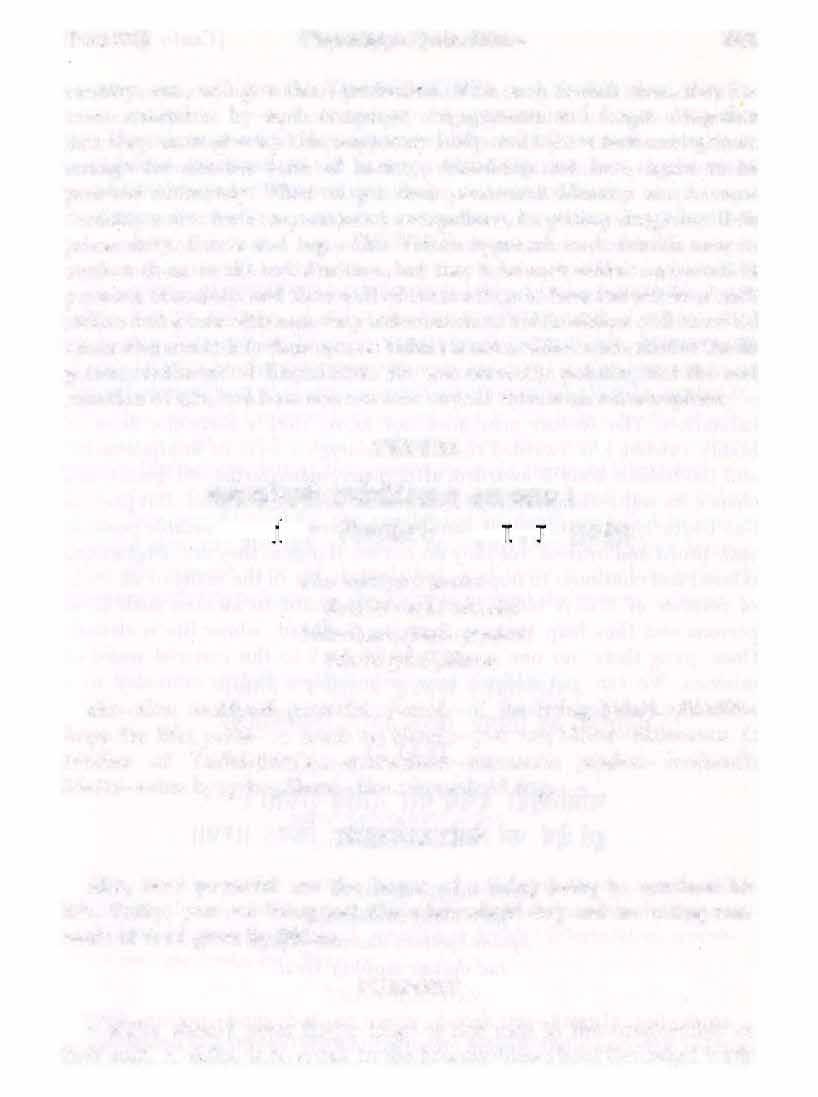
Qhli\444\\ififflliif�ijlijl�� I
Aoc+ua:-El 11� �11
aho mahiyasi jantor fivitiiSii yathii bhaviin
bhimiipavarjitarit pir.t;lam iidatte grha-piilavat
aho-alas; mahiyasi-powerful; janto�-of the living beings; jivitiisiihope for life; yathii-as much as; bhaviin-you are; bhima-Bmmasena (a brother of Yudhi�thira's); apavarjitam- remnants; pir-t;lam- foodstuff; iidatte- eaten by;grha-piilavat- like a household dog.




TRANSLATION
Alas, how powerful are the hopes of a living being to continue his life. Verily, you are living just like a household dog and are eating remnants of food given by Bhima.
PURPORT
A siidhu should never flatter kings or rich men to live comfortably at their cost. A siidhu is to speak to the householders about the naked truth
Text 23] Dhftara�tra Quits Home 689
of life so that they may come to their senses about the precarious life in material existence. Dhftara�tra is a typical example of an attached old man in household life. He had become a pauper in the true sense, yet he wanted to live comfortably in the house of the Pa!l�avas, of whom Bhi:ma especially is mentioned because personally he killed two prominent sons of Dhftara�tra, namely Duryodhana and Dupsasana. These two sons were very much dear to him for their notorious and nefarious activities, and Bhima is particularly pointed out because he killed these two pet sons. Why was Dhrtariit>tra living there at the house of the Pal)«;lavas? Because he wanted to continue his life comfortably, even at the risk of all humiliation. Vidura, therefore, was astonished how powerful is the urge to continue life. This sense of continuing one's life indicates that a living being is �ternally a living entity, and he does not want to change his bodily habitation. The foolish man does not know that a particular term of bodily existence is awarded to him to·undergo a term of imprisonment, and the human body is awarded, after many, many births and d�aths, as a chance for self-realization to go back home, back to Godhead. But persons like Dhftara�tra try to make plans to live there in a comfortable position with profit and interest, for they do not see things as they are. Dhftara�tra is blind and continues to hope to live comfortably in the midst of all kinds of reverses of life. A sadhu like Vidura is meant to awaken such blind persons and thus help them go back to Godhead, where life is eternal. Once going there, no one wants to come back to this material world of miseries. We can just imagine how responsible a task is entrusted to a sadhu like Mahatma Vidura.
TEXT 24

aaRif.1qil ��� tRI � �: 1 � � � 1m ij�(tJf4n � 11�'clll
agnir ni�.11to dattaS ca garo dariiS ca dii�itafl hrtarit k�etrarit dhanarit ye§am tad-dattair asubhifl kiyat
agni[l-fire; nisr§tafl-set; datta[l-given; ca-and; garaft-poison; daraftmarried wife; ca-and; du�itii(l-insulted; hrtam- usurped; k�e tram -kingdom; dhanam-wealth; ye�iim-of those; tat-their; dattai[l-given by; asubhift- subsisting; kiyat-is unnecessary.
690 Srimad-Bhagavatam [Canto 1, Ch. 13
TRANSLATION
There is no needto live a degraded lifeandsubsistonthecharityof those whom you tried to kill by arson andpoisoning. You also insulted oneoftheirwivesandusurpedtheirkingdomandwealth.
PURPORT
The system of var[liisrama religion sets asidea part ofone's life completely for the purpose of self-realizationand attainment of salvation in the human form of life. That is a routine division of life, but persons likeDhrtara�tra,evenattheirwearyripenedage,wanttostayhome,evenin adegradedconditionofacceptingcharityfromenemies. Vidurawantedto point this out and impressed uponhim that it was better to dielike his sons than accept such humiliating charity. Five thousand years ago there was one Dhrtara�tra, but at the present moment thereareDhrtara�trasin every home. Politicians especially do not retire fr.om political activities unless they are dragged by the cruel hand of death or killed by some opposing element. To stick to familylife up to the end of one's human life is the grossest type of degradation, and there is absolute need of educatingsuchDhftara�trasbytheViduras, evenatthepresentmoment.
TEXT 25

� � w� ,qUI4A m�: , ciW4Pwt•d1 iitluit � com� ������

tasyiipi tava deho'yam
k.rpapasya jijiv�o[l paraity anicchato fi'llo jarayii viisasi iva
tasya-of this; api-in spite of; tava-your; deha[l-body; ayam-this ; krpa[lasya-of one who is miserly; jijiv�o[l-of youwhodesirelife;paraiti -will dwindle; anicchata[l-even unwilling;ji'[la[l-deteriorated; jarayaold;viisasz-garments;iva-like.
TRANSLATION
Despite yourunwillingness todie andyour desire toliveevenatthe cost of honor andprestige, yourmiserly body will certainlydwindleand deterioratelike an oldgarment.
Text 25] Dhrtar3{!traQuitsHome 691
PURPORT
The words krparasya jifivi�ofl are significant. There are two classes of men. One is called the krpara, and the other is called the briihmara. The krpa'}a, orthe miserly man, has noestimation of his materialbody, hut the briihmara has a true estimation of himself and the material body. The krpara, having a wrong estimation of his material body, wants to enjoy sense gratification with his utmost strength, and even in old age he wants to become a young man by medical treatment or otherwise. Dhftara�p-a is addressed herein as a krpara because without any estimation of his material body he wants to live at any cost, and Vidura is trying to open his eyes to see that he cannot live more than his term and that he must prepare for death. Since death is inevitable, why should he accept such a humiliating position for living? It is better to take the right path, even at the risk of death. Human life is meant for finishing all kinds of miseries of material existence, and life should he so regulated that one can achieve the desired goal. Dhftara�tra, due to his wrong conception of life, had already spoiled eighty percent of his achieved energy, so it behooved him to utilize the remaining days of his miserly life for the ultimate good. Such a life is called miserly because one cannot properly utilize the assets of the human form of life. Such a miserly man, by good luck only, meets a selfrealized soul like Vidura and by his instruction gets rid of the nescience of material existence.
TEXT 26

gata-sviirtham imam deham
virakto ·mukta-bandhanafl

avijiiiita-gatir jahyiit
sa vai dhira udiihrtafl
gata-sviirtham -without being properly utilized; imam - this; dehammaterial body; viraktalt-indifferently; mukta-being freed; bandhanaltfrom all obligations; avijfiiita-gatilt - unknown destination; jahyiit - one should give up this body; salt - such a person; vai-certainly;dhiralt-undisturhed; udiihrtap-is said to he so.
692 Srimad-Bhigavatam [Canto l, Ch. 13
He is called undisturbed who goes to an unknown, remote place and, freed from all obligations, quits his material body when it has become useless.
PURPORT
Narottama Dasa 'fhakur, a great devotee and iiciirya of the Gausfiya Vai�l)ava sect, has sung: "My Lord, I have simply wasted my life. Having obtained the human body, I have neglected to worship Your Lordship, and therefore willingly I have drunk poison." In other words, the human body is especially meant for cultivating knowledge of devotional service of the Lord, without which life becomes full of anxieties and miserable conditions_ Therefore, one who has spoiled his life without such cultural activities is advised to leave home without knowledge of friends and relatives and, being thus freed from all obligations of family, society, country, etc_, give up the body at some unknown destination so that others may not know where and how he has met his death. Dhira means one who is not disturbed, even when there is sufficient provocation. One cannot give up a comfortable family life due to his affectionate relation with wife and children. Self-realization is obstructed by such undue affection for family, and if anyone is at all able to forget such a relation, he is called the undisturbed, or dhira. This is, however, the path of renunciation based on a frustrated life, but stabilization of such renunciation is possible only by association with bona fide saints and self-realized souls by which one can be engaged in the loving devotional service of the Lord. Sincere surrender unto the lotus feet of the Lord is possibleby awakening the transcendental sense of service, made possible by association of pure devotees of the Lord_ Dhrtara�tra waslucky enough to have abrother whose very association was a source of liberation for his frustrated life.
TEXT
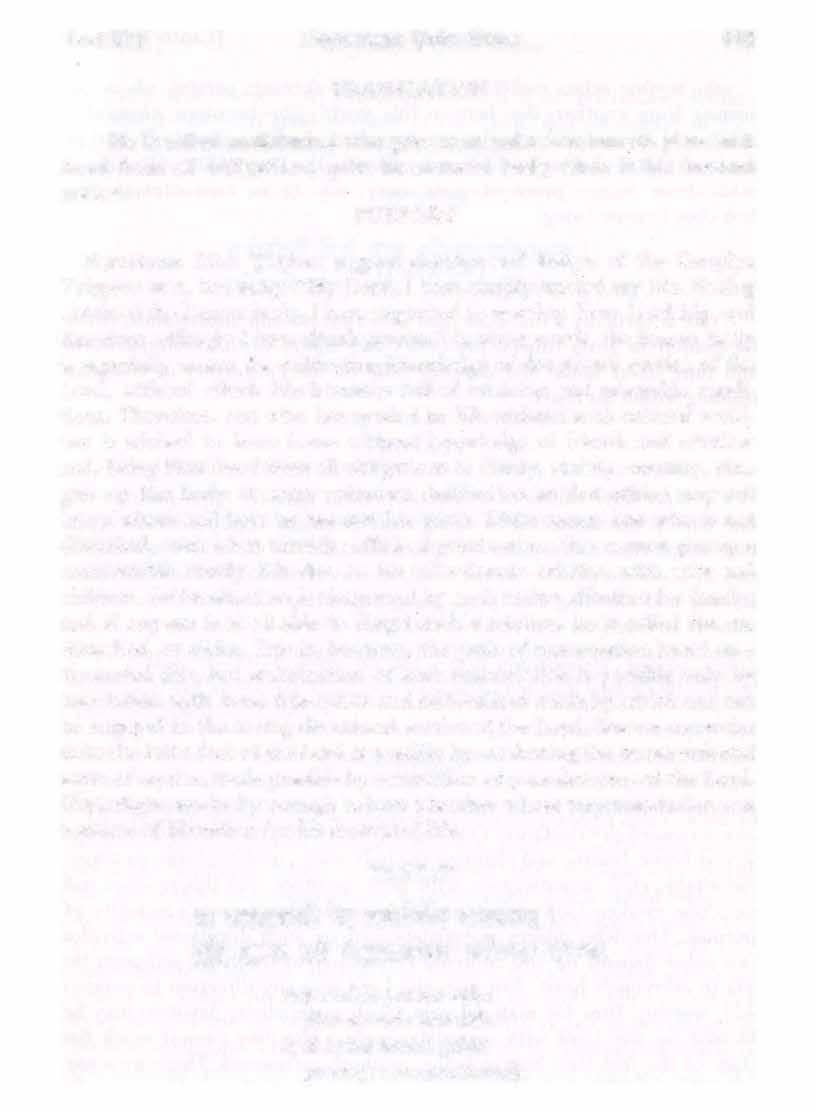
Text 27] Dhrtarawa Quits Home 693 TRANSLATION
27 �= weii�'Jt�\illaf-t:;fa: 311€¥4f!Ui{1 � im � it{JdiA�at �: ������ ya[l. svakiit parato veha jiita-nirveda iitmaviin hrdi k.rtvii harirh gehiit pravrajet sa narottama[l.
ya{t-anyone who; svakiit-by his own awakening; parata[l. vii-or by hearing from anotlier; iha-here in this world; jiita-becomes; niroeda[l.indifferent to material attachment; atmaviin-consciousness; hrdi-within the heart; krtvii-having beentaken by; harim-the Personalityof Godhead; gehiit-from home; pravrajet-goes away; sa[l.-he Is; nara-uttama[l.-the first-class human being.
TRANSLATION
He is certainly a first-class man who awakens and understands, either by himself or from others, the falsity and misery of this material world and thus leaves home and depends fully on the Personality of Godhead residing within his heart.
PURPORT
There are three classes of transcendentalists, namely, 1)the dhira, or the one who is not disturbed by being away from the family association, 2) one in the renounced order of life, a sannyasi by frustrated sentiment, and 3) a sincere devotee of the Lord, who awakens God consciousness by hearing and chanting and leaves home depending completely on the Personality of Godhead whoresides in his heart. The idea is thatthe renounced order of life, after a frustrated life of sentiment in the material world, may be the stepping stone on the path of self-realization, but real perfection of the path of liberation is attained when one is practiced to depend fully on the Supreme Personality of Godhead, who lives in everyone's heart as Paramatma. One may live in the darkest jungle alone out of home, but a steadfast devotee knows very well that he is not alone. The Supreme Personality of Godhead is with him, and He can protect His smcere devotee in any awkward circumstance. One should therefore practice devotional service at home, hearing and chanting the holy name, quality, form, pastimes, entourage, etc., in association with pure devotees, and this practice will help one awaken God consciousness in proportion to one's sincerity of purpose. One who desires material benefit by such devotional activities can never depend on the Supreme Personality of Godhead, although He sits in everyone's heart. Nor does the Lord give any direction to persons who worship Him for material gain. Such materialistic devotees may be blessed by the Lord with material benefits, but they cannot reach the stage of the first-class human beil}g, as above mentioned. There are many examples of such sincere devotees in the history of the world, especially

694 Srimad-Bhagavatam [Canto 1, Ch. 13
in India, and they are our guides onthepath ofself-realization. Mahatma Vidura is one such great devotee of the Lord, and we should all try to followinhis lotus footsteps forself-realization.
TEXT 28 �������

�Sii4ksfl4�t:�:���:����II
athodicim diSam yiitu
svair ajiiiita-gatir bhaviin ito 'rviik priiyasafl kiilafl
purhsiim gu!la-vikar§a!lafl
atha-therefore; udicim-northern side; diSam-direction; yiitu-please go away; svaifl-by your relatives; ajiiiita-without knowledge; gatiflmovements; bhaviin-of yourself; itaf!-after this; arviik-will usher in; prayasafl-generally; kalafl-time; purhsam-of men; gu!Ja-qualities; vikarwcwfl- diminishing.
TRANSLATION
Please, therefore, leave for the North immediately, without letting your relatives know, for soon that time will approach which will diminish the good qualities of men.
PURPORT
A lifeof frustration can becompensated by becoming a dhira, orleaving home for good without communicating withrelatives, and Vidura advised his eldest brother to adopt this way without delay, because very quickly the age of Kali was approaching. A conditioned soul is already degraded by the material association, andstillinthe Kali-yuga thegoodqualitiesof a man will deteriorate to the lowest standard. He was advised to leave home before Kali-yuga approached because the atmosphere which was createdby Vidura,hisvaluableinstructions on thefactsof life, would fade away due to the influence of the age which was fast approaching. To become narottama, or a first-class human being dependingcompletely on the Supreme Lord Sri �pa, is not possible for any ordinary man. It is stated in the Bhagavad-gitii (Bg. 7.28) that a person who is completely
Text 28] Dhrtar�tra Quits Home 695
relieved of all taints of sinful acts can alone depend on the Supreme Lord Sri Kr�!la, the Personality of Godhead. Dhftara�tra was advised by Vidura at least to become a dhira in the beginning if it were impossible for him to become a sannyiisi or a narottama. Persistently endeavoring on the line of self-realization helps a person to rise to the conditions of a narottama from the stage of a dhira. The dhira stage is attained after prolonged practice of the yoga system, but by the grace of Vidura one can attain the stage immediately simply by willing to adopt the means of the dhira stage, which is the preparatory stage for sannyiisa. The sannyiisa stage is the preparatory stage of paramahamsa, or the first-grade devotee of the Lord.
TEXT 29

evam riijii vidurepiinujena prajiiii-cak'�ur bodhita iijami!Jhafl. chittvii sve§u sneha-piisiin draphimno niScakriima bhriitr-sandarsitiidhvii
evam-thus; riijii-King Dhrtara�tra; vidurerta anujena-by his younger brother Vidura; prajl'iii-introspective knowledge; cak� u�-eyes; bodhitabeing understood; iijami!Jha[l.-Dhrtara¥.ra, scion of the family ofAjami�ha; chittvii-by breaking; sve�u- regarding kinsmen; sneha-piisiin-strong network of affection; dra{lhimna[l.- because of steadfastness; niscakriimagot out; bhriitr-brother; sandarsita-direction to; adhvii-the path of liberation.
TRANSLATION
Thus Maharaja Dhftar�tra, the scion of the family of Ajami�ha, firmly convinced by introspective knowledge [prajfia] , broke at once the strong network of familial affection by his resolute determination. Thus . he im-
696 Srimad-Bhagavatam [Canto 1, Ch. 13
fql�ll�"'
�
I � � <il'tl�u�Qwl
00
•
SUlll"4i.aNd 311\if+fh::
������
f.r.lt.qaq iillct4"a:RM•'41
mediately left home to set out on the path of liberation, as directed by his younger brother Vidura.
PURPORT
Lord Sri Caitanya Mahaprabhu, the great preacher of the principles of $rimad-Bhiigavatam, has stressed the importanceof associating with siidhus or pure devotees of the Lord. He said that even by a moment's association with a pure devotee, one can achieve all perfection. We are not ashamed to admit that this fact was experienced in our practical life. Were we not favored by His Divine Grace Srimad Bhaktisiddhiinta Sarasvati Gosviimi Mahiiriija, by our first meeting for a few minutes only, it would have been impossible for us to accept this mighty task of describing $rimadBhiigavatam in English. Without seeing him at that opportune moment, we could have become a very great business magnate, but never would we have been able to walk the path of liberation and be engaged in the factual service of the Lord under instructions of His Divine Grace. And here is another practical example by the action of Vidura's association with Dhftara�tra. Maharaja Dhftara�tra was tightly bound in a network of material affinitiesrelated topolitics,economy and family attachment, and he did everything in his power to achieve so-called success in his planned projects, hut he was frustrated from the beginning to the end so far as his material activities were concerned. And yet, despite his life of failure, he achieved the greatest of all success in self-realization by the forceful instructions of a pure devotee of the Lord, who is the typical emblem of a siidhu. The scriptures enjoin, therefore, that one should associate with siidhus only, rejecting all other kinds of association, and by doing so one will have ample opportunity to hear the siidhus who can cut to pieces the bonds of illusory affection in the material world. It is a fact that the material world is a great illusion because everything appears to be a tangible reality, but the next moment everything is evaporated like the dashing foam of the sea or a cloud in the sky. A cloud in the sky undoubtedly appears to be a reality because it rains, and due to rains so many temporary green things appear, but in the ultimate issue, everything disappears, namely the cloud, rain and green vegetation, all in due course. But the sky remains, and the varieties of sky or luminaries also remain forever. Similarly the Absolute Truth, which is compared to the sky, remains eternally, and the temporary cloudlike illusion comes and goes away. Foolish living beings are attracted by the temporary cloud, but

Text 29] Dhrtarawa Quits Home 697
intelligent men are more concerned with the eternal sky with all its variegatedness.
TEXT 30

.mt � WRJS� � qRI?H'II :qa�•nq � 1
fto¥1ttJS4 ril(ije(06Sic:cl
¥1wtf(q;uf14q 6ffl'SI(I(: II� oil
patirh prayiintam subalasya putri pati-vratii ciinujagiima siidhvi himiilayarh nyasta-dar�a-prahar§arh manasviniim iva sat samprahiirafl
patim-her husband; prayiintam-while leaving home; subalasya-of King Suhala; putri-worthy daughter; pati-vratii-devoted to her husband; caalso; anujagiima-followed; siidhvi-the chaste; himiilayam-towards the Himalayan mountains; nyasta-dar�a-one who has accepted the rod of the renounced order; praha r�am-object of delight; manasviniim-of the great fighters; iva-like; sat-legitimate ; samprahiirafl-good lashing.
TRANSLATION
Gindhari, who was the daughter of King Suhala of Kandahara [or Gandhara], followed her husband, seeing that he was going to the Himalayan mountains, which are the delight of those who have accepted the staff of the renounced order like fighters who have accepted a good lashing from the enemy.
PURPORT
Saubaliru or Gandhar1, daughter of King Subala and wife of King Dhrtaral)tra, was ideal as a devoted wife to her husband. The Vedic civilization especially prepares chaste and devoted wives, of whom Gandhari is one amongst many mentioned in history. Lak�miji Sitadevi was also a daughter of a great king, hut she followed her husband Lord Ramacandra into the forest. Similarly, as a woman she could remain at home or at her father's house, hut as a chaste and gentle lady she followed her husband
698 Srimad-Bhagavatam [Canto 1, Ch. 13
without consideration. Instructions for the renounced order of life were imparted to Dhftar�tra by Vidura, and Gandhari was by the side of her husband. But he did not ask her to follow him because he was at that time fully determined, like a great warrior who faces all kinds of dangers in the battlefield. He was no longer attracted to so-called wife or relatives, and he decided to start alone,but as a chaste lady Gandhari decided to follow her husband till the last moment. Maharaja Dhftara�tra accepted the order of viinaprastha, and at this stage the wife is allowed to remain as a voluntary servitor, but in the sannyiisa stage no wife can stay with her former husband. A sannyiisi is considered to be a dead man civilly, and therefore the wife becomes a civil widow without connection with her former husband. Maharaja Dhftara�tra did not deny his faithful wife, and she followed her husband at her own risk.
The sannyiisis accept a rod as the sign of the renounced order of life. There are two types of sannyiisis. Those who follow the Mayavadi philosophy, headed by Sripada Sailkaracarya, accept only one rod (eka-darpa), but those who follow the Vai�!lavite philosophy accept three combined rods (tri-dar{la). The Mayavadi sannyiisis are ekadarpi-sviimis, whereas the Vai�!lava sannyiisis are known as tridarpi-sviimis, or more distinctly, tridar4i gosviimis, in order to be distinguished from the Miiyiiviidi philosophers. The ehadarpi sviimis are mostly fond of the Himalayas, but the Vai�!lava sannyiisis are fond of Vrndavana and Puri. TheVai�!lava sannyiisis are narottamas, whereas the Mayavadi sannyiisis are dhiras. Maharaja DJ.rtara�tra was advised to follow the dhiras because at that stage it was difficult for him to become a narottama.

TEXT 31

ajiita-satro[l. k.rta-maitro hutiignir
vipriin natvii tila-go-bhiimi-rokma*
grham pravi§toguro-vandaniiya na ciipasyat pitarau saubalim ca
Text 31] Dhrfarawa Quits Home 699
ajiita-never born; satrup-enemy; krta-having performed; maitmpworshiping the demigods; huta-agni[l-and offering fuel in the fire; vipriin -the briihmapas; natvii-offering obeisances; tila-go-bhumi-rokmai[l-along with grains, cows, land and gold; grham-within the palace; prav�taflhaving entered into; guru-vandaniiya-for offering respect to the elderly members; na-did not; ca-also; apasyat pitarau-his uncle; saubalimGandhari; ca-also.
TRANSLATION

Maharaja Yu�hira, whose enemy was never hom, perfonned his daily morning duties by praying, offering fire sacrifice to_the sun-god, and offering obeisances, grains, cows, land and gold to the hrihm�s. He then entered the palace to pay respects to the elderly. However, he could not find his uncle and aunt, the daughter of King Subala.
PURPORT
Maharaja Yudhi�thira was the most pious king because he personally practiced daily the pious duties for the householders._The householders are required to rise early in the morning, and after bathing, they should offer respe<;ts to the Deities at home by prayers, by offering fuel in the.sacred fire, by giving the briihmaruu in charity land, cows, grains, gold, etc., and at last offering to the elderly members due respects and obeisances. Unless one is prepared to practice injunctions which are prescribed in the siistras, one cannot be a good man simply by book knowledge. Modern householders are practiced to different modes of life, namely to rise late and then take bed tea without any sort of cleanliness and without any purificatory practices as mentioned above. The household children are taken to practice that which the parents practice, and therefore the whole generation glides towards hell. Nothing good can be expected from them unless they associate with siidhus. Like Dbrtar�tra, the materialistic person may take lessons from a siidhu like Vidura and thus be cleansed of the effects of modern life.
Maharaja Yudhil?thira, however, could not find in the palace his two uncles, namely Dbrtar�tra and Vidura, along with Gandhiri, the daughter of King Subala. He was anxious to see them and, therefore, asked Saiijaya, the private secretary of Dbrtara�tra.
700 Srimad-Bhigavatam [Canto l, Ch. 13
TEXT 32
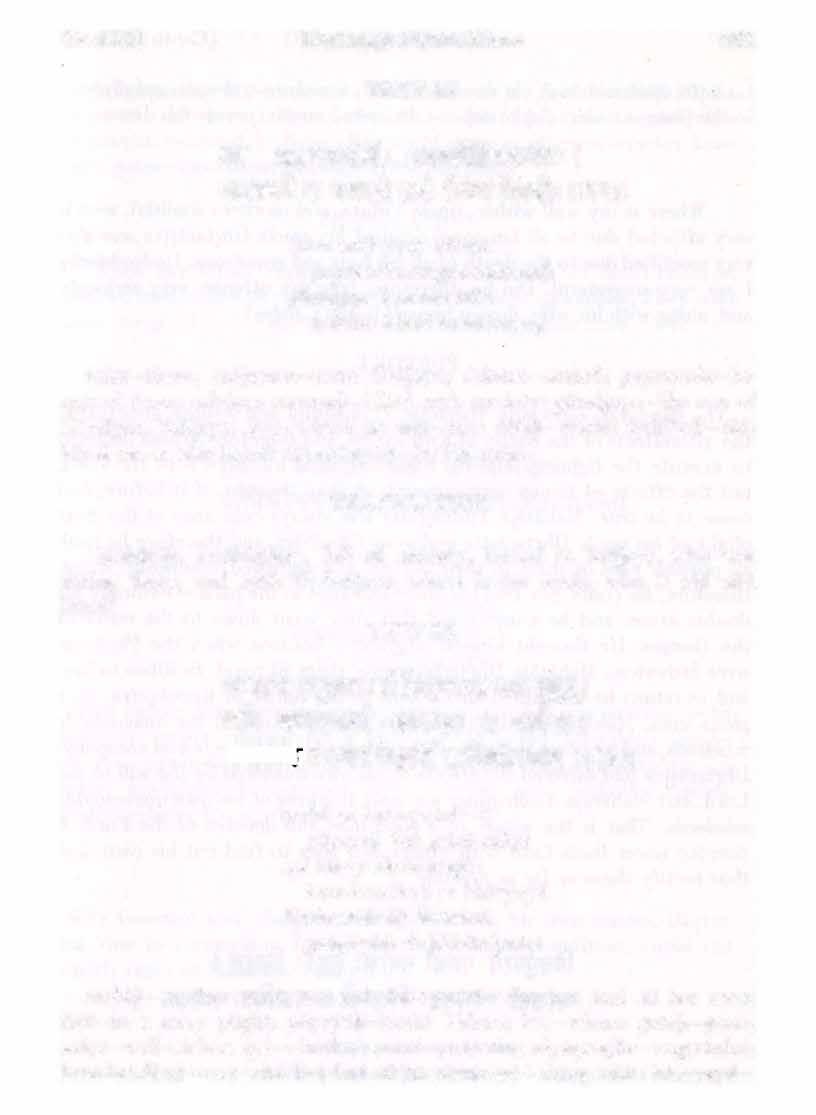
ft 6$:q+t1m;f qSI4itfl«+tiWI9:I

ill4ctil� 'li �fi)�;{���:����II
tatra sanjayam iisinam

paprocchodvigna-miinasap giivalgape kva nas tiito
v[ddho hina.S ca netrayop
tatra-there; sanjayam-unto Saiijaya; iisinam-seated; papraccha-inquired from; udvigna-manasa[l-filled with anxiety; giivalga!le-the son of Gavalgan, Saiijaya; kva-where is; nap-our; tiitap-uncle; v,rddha[l-old; hina[lca-as also bereft of; netrayop-by the eyes.
TRANSLATION
Maharaja Yu�!hira, full of anxiety, turned to Saiijaya, who was sitting there, and said: 0 Saiijaya, where is our uncle, who is old and blind?
TEXT 33
31"11"1�i�:t�•RY:mI
1IA' ii'AlidSif �: « •I
ambii ca hata-putrii.'rtii
pitrvya[l kva gata[l suhrt
api mayy akrta-prajne
hata-bandhupsa bhiiryayii.
iiSamsamiinapsamalam
gangiiyii.mdu[lkhito'patat
ambii.[l-mother aunt; ca-and; hata-putrii.-who had lost all her sons; ii.rtii.-in a sorry plight; pit.royap-uncle Vidura; kva-where; gatap-gone; suhrt-well-wisher; api-whether; mayi-unto me; akrtaprajne-ungrateful; hata-bandhu[l-one who has lost all his sons; sap-along with; bhii.ryayii.-
Text 33) Dhrtari!tra Quits Home
701
:�tJWNf
%:�dtsqa<(II��II
his wife;iisamsa-miina[l.-in doubtful mind;samalam-offenses;gahgiiyiimin the Ganges water; du[l.khita[l.-in distressed mind; apatat-fell down.
TRANSLATION
Where is my well-wisher, uncle Vidura, and mother Gandhari, who is very afflicted due to all her sons' demise? My uncle Dh.ttara�ra was also verymortified due to the death of all his sons and grandsons. Undoubtedly I am very ungratefuL Did he, therefore, take my offenses very seriously and, along with his wife, drown himself in the Ganges?

PURPORT
The Pa!J.slavas, especially Maharaja Yudhi�thira and Arjuna, anticipated the aftereffects of the Battle of Kuruk�etra, and therefore Arjuna declined to execute the fighting. The fight was executed by the will of the Lord, hut the effects of family aggrievement, as they thought of it before, had come to he true. Maharaja Yudhi�thira was always conscious of the great plight of his uncle Dh.ttara�tra and aunt Gandhari, and therefore he took all possible care of them in their old age and aggrieved conditions. When, therefore, he could not find his uncle and aunt in the palace, naturally his doubts arose, and he conjectured that they went down to the water of the Ganges. He thought himself ungrateful because when the Pa!lslavas were fatherless, Maharaja Dh.ttar�tra gave them all royal facilities to live, and in return he had killed all his sons in the Battle of Kuruk�etra. As a pious man, Maharaja Yudhi�thira took into account all his unavoidable misdeeds, and he never thought of the misdeeds of his uncle and company. Dh.ttara�tra had suffered the effects of his own misdeeds by the will of the Lord, hut Maharaja Yudhi�thira was only thinking of his own unavoidable misdeeds. That is the nature of a good man and devotee of the Lord. A devotee never finds fault with others, but tries to find out his own, and thus rectify them as far as possible.
702 Srimad-Bhagavatam [Canto l, Ch. 13
TEXT 34 Aa+td ��: w:: ftl'ul � oqe;ca: Actwil••tad4a: u�vu pitary uparate piicr9au saroiin na[l. suhrda{l si.Sun ara��atiim vyasanata{l pit_royau kva gatiivita[l.
pitari-upon myfather; uparate-falling down; pa[l{iau- Maharaja Pap�u; saroan-all; na[l-us; suhrdafl-well-wisher; siSun-small children; arak�atiim -protected; vyasanata[l-from all kinds of dangers;pit.rvyau-uncles; kvawhere; gatau-have departed; ita[l-from this place.
TRANSLATION
When my father Pap�u fell down and we were all small children, thesetwo uncles gave us protection from all kinds of calamities. They were always our good well-wishers. Alas, where have they gone from here?
TEXT 35

I1At �«�li'*Q(f.l<tl Ptuctiftla:1
311t:�'ll(¥t::qqluft ;r Sl€441eJfacftfCa:11�'-\11
suta uviica k[payii sneha-vaiklavyiit suto viraha-kar5ita[l iitmesvaram acak�iirto na pratyiihiitipi!]ita[l
suta[l uviica-Siita Gosvami said; k.rpayii-out of full compassion; snehavaiklavyiit-mental derangement due to profound affection; suta[lSaiijaya; viraha-karsita[l-distressed by separation; iitma-iSvaram-his master; acak�iirtafl-having not seen; na-did not; pratyiiha- replied; atipi!]ita[l-being too aggrieved.
TRANSLATION
Siita Gosvami said: Saiijaya, having not seen his own master, Dhftar�tra, due to compassion for his grief and mental condition, could not properly reply to Maharaja Yud�hira.
PURPORT
Saiijaya was the personal assistant of Maharaja Yudhi�thira for a very long time, and thus he had the opportunity to study thelife of Dhftara�tra. And when he saw at last that Dhftara�tra had left home without his know-
Text 35] Dhrtar�tra Quits Home 703
��
ledge, even his sorrows had no bound. He was fully compassionate toward Dhftara�tra because in the game of the Battle of Kuruk�etra, King Dhftara�tra had lost everything, men and money, and at last the King and the Queen had to leave home in utter frustration. He studied the situation in his own way because he did not know that the inner vision of Dhftara�ra was awakened by Vidura and that therefore he had left home in enthusiastic cheerfulness for a better life after departure from the dark well of home. Unless one is convinced of a better life after renunciation of the present life, one cannot stick to the renounced order of life simply by artificial dress or staying out of the home.
TEXT36
f4'l$111{fUIqlfOI�fAt�l<:'ll-will<:'l-wlI

3hUa;a! � !Pit: ql&>l'll�"(i{����II
vim.rjyiiSrnpi papibhyiim vi§tabhyiitmiinam iitmanii ajiita-satrum pratyuce prabho[l piidiivanusmaran
vim .rjya-smearing; asrupi-tears of the eyes; piipibhyiim-with his hands; vi§tabhya-situated; iitmaniim-the mind; iitmanii-by intelligence; ajiita-satrum-unto Maharaja Yudhi�thira; pratyilce-began to reply; prabho{l-of his master;padau-feet; anusmaran-thinking after.



TRANSLATION
First he slowly pacified his mind by intelligence, and wiping away his tears and thinking of the feet of his master Dhftar�!fa, he began to reply to Maharaja Yu�thira.
TEXT 37


�p� ;h(�oq'llmd �: te-w�-. 1
en uAal��'lU:'lfll: ''�"''
saii.jaya uviica
niiham veda vyavasitam pitror va[l kula-nandana giindhiiryii vii mahii-biiho mu§ito•smi mahiitmabhifi.
704 Srimad-Bhigavatarn [Canto 1, Ch. 13
sanjayap uviica-Safijaya said; na-not; aham-myself; veda-in knowledge; vyavasitam-determination;pitro"{l-of your uncles; vafi.-your; kulanandana-0 descendant of the Kuru dynasty; giindhiiryii"{l-by Gandhari; vii-or: mahii-biiho-0 great King; mu§itap-cheated; asmi-I have been; mahiitmabhi"{l-great souls.
TRANSLATION
Saiij aya said: My dear descendant of the Kuru dynasty, I have no information of the determination of your two uncles and' Gandhliri. 0 King, I have been cheated by those great souls.
PURPORT
That great souls cheat others may be astonishing to know,but it is a fact that great souls cheat others for a great cause. It is said that Lord K.fj>pa also advised Yudlu�thira to tell a lie before Dropacarya, and it was also for a great cause. The Lord wanted it, and therefore it was a great cause. Satisfaction of the Lord is the criterion of the bona fides, and the highest perfection of life is to satisfy the Lord by one's occupational duty. That is the verdict of Gitii and Bhiigavatam. * Dhftara�tra and Vidura, followed by Gandhii.ri, did not disclose their determination to Safijaya, although he was constantly with Dhftara�tra as his personal assistant. Safijaya never thought that Dhrtara�tra could perform any act without consulting him. But Dhftara�tra's going away from home was so confidential that it could not even be disclosed to Safijaya. Sanatana Gosvami also cheated the keeper of the prison house while going away to see Sri Caitanya Mahaprabhu, and similarly Raghunatha Dii.sa Gosvami also cheated his priest and left home for good to satisfy the Lord. To satisfy the Lord, anything is good, for it is in relation with the Absolute Truth. We also had the same opportunity to cheat the family members and leave home to engage in the necessary for a great cause, and there is no loss for any party in such transcendental fraud.
*_yataft pravrttir bhiltiiniim yena sarvam idam tatam svakarma[lii tam abhyarcya siddhim vindati miinavaft. (Bg. 18.46)

ataft pumbhir dvija-sre§[hii var[liisrama-vibhiigasaft
.wanus[hitasya dharmasya saril.siddhir hari-to§a[lam (Bhiig. 1.2.13)
Text 37] Dhrtar�tfa Quits Home 705
TEXT 38

3ltll�•llit ¥4•1'=11( �: (1ld1': I (11�&�)s.-q$("fJMt( ����II
athiijagiima bhagaviin niirada� saha-tumburu� protyutthiiyiibhiviidyiiha siinujo'bhyarcayan munim
atha-thereafter; ajagiima-arrived ; bhagaviin-the godly personality; nii rada�-Narada; saha tumburu�-along with his tumbu'ru (musical instrument); pratyutthaya- having gotten up from their seats; abhiviidyaoffering their due obeisances; aha-said; sa-anuja�- along with younger brothers; abhyarcayan- thus while receiving in a proper mood; munimthe sage.


TRANSLATION
While Safijaya was thus speaking, Sri Narada, the powerful devotee of the Lord, appeared on the scene. Maharaja Yuc;lhi�hira and his brothers received him properly by getting up from their seats and offering obeisances.

PURPORT
Devar�i Narada is described herein as bhagaviin due to his being the most confidential devotee of the Lord. The Lord and His very confidential devotees are treated on the same level by those who are actually engaged iii the loving service of the Lord. Such confidential devotees of the Lord are very much dear to the Lord because they travel everywhere to preach the glories of the Lord in different capacities and try their utmost to convert the nondevotees of the Lord into devotees in order-to bring them to the platform of sanity. Actually a living being cannot be a nondevotee of the Lord because of his constitutional position, but when one becomes a nondevotee or nonbeliever, it is tobe understoodthat the person concerned is not in a sound condition of life. The confidential devotees of the Lord treat such illusioned living beings, and therefore they are most pleasing in the eyes of the Lord. The Lord says in the Bhagavad-gitii that no one is dearer to Him than one who actually preaches the glories of the Lord to convert the nonbelievers and nondevotees. Such personalities as Narada must be offered all due respects, like those offered to the Personality of Godhead Himself, and Maharaja Yudhi�thira, along with his noble brothers, were examples for others in receiving a pure devotee of the Lord like Narada, who had no other business save and except singing the glories of the Lord along with his vi[tii, a musical stringed instrument..
706 Srimad-Bhagavatam [Canto l, Ch. 13
TEXT 39


;nt� '1Mfq=it�ltti • •r<nfiHu 1
PRCIT«<t�SII�tli'RII � <Jqftcl;t1ll�'ll
yudh�thira uviica
niiharh veda gatirh pitror
bhagavan kva gatiiv ita�
ambii vii hata-putriirtii
kva gatii ca tapasvini
yudh�thira� uviica-Maharaja Yudhi�thira said; na-do not; ahammyself;veda-know it;gatim-departure;pitro�-of the uncles;bhagavan0 godly personality;kva-where;gatau-gone;ita�-from this place; ambiimother aunt; vii-either; hata-putrii-bereft of her sons;iirtii-aggrieved; kva-where;gata-gone;ca-also;tapasvini-ascetic.
TRANSLATION
Maharaja Yudhi�thira said: 0 godly personality, I do not know where my two uncles have gone. Nor can I find my ascetic aunt who is griefstricken by the loss of all her sons.
PURPORT
Maharaja Yudhi�thira, as a good soul and devotee of the Lord, was always conscious of the great loss of his aunt and her sufferings as an ascetic. An ascetic is never disturbed by all kinds of sufferings, and that makes him strong and determined on the path of spiritual progress. Queen Gandhari is a typical example of an ascetic by her marvelous character in many trying situations. She was an ideal woman as mother, wife and ascetic, and in the history of theworld such character in a woman is rarely found. TEXT40
Text 40] Dhrtarawa Quits Home
��..
707
• � � ql(f(�'l: I 31'-IM¥111 � wn00 lf.tQ"CI¥1: ll\loII kaJ?la-dharo iviipare
para-dar5aka�
bhagavan narado muni-sattama�
bhagavan
athababhafle
ka1'fllldhiiro-captain of the ship; iva-like; apiire-in the extensive oceans; bhagaviin-representative of the Lord; parodarsakap-one who can give directions to the other end; atha-thus; ababhiiJe-began to say; bhagavan-the godly personality; niirodap-the great sage Narada; munisattamap-the greatest among the devotee-philosophers.


TRANSLATION
You are likea captain ofa shipin a greatocean and you can direct us toour destination. Thus addressed, the godly personality, Devar�Narada, greatestofthe philosopher devotees,begantospeak.


PURPORT

There aredifferent types of philosophers,and the greatest of all of them are those who have seen the Personality of Godhead and have surrendered themselves in the transcendental loving service of the Lord. Among all such pure devotees of the Lord, Devar�i Narada is the chief, and therefore he has been described herein as the greatest of all philosopher devotees. Unless one is a sufficiently learned philosopher by hearing the Vedanta philosophy from a bona fide spiritual master, one cannot be a learned philosopher devotee. One must be very faithful, learned and renounced, otherwise one cannot be a pure devotee. A pure devotee of the Lord can give us direction towards the other end of nescience. Devar�i Narada used to visit the palace of Maharaja Yudhi�thira because the Pap.�avas were all pure devotees of the Lord, and the Devar�i was always ready to give them good counselwhenever needed.

niirada uviica mii kaiicana suco riijan yad iSvara-va5am jagat
lokiip sapalii yasyeme vahanti balim iSitup sa sarhyunakti bhii.tiini sa eva viyunakti ca
708 Srimad-Bhagavatam [Canto 1,Ch. 13
TEXT41 �� "' m � � 44<l'l(ct� � 1 �:��� 1 B �Ria� B � IIV�II
niiradafl uviica-Narada said; mii-never; kaiicana-by all means; sucafldo you lament; riijan-0 King; yat-because; iSvaro-vasam-under the control of the Supreme Lord; jagat-world; lokiifl-all living beings; sapiiliifl-including their leaders; yasya-whose; ime-all these; vahanti-do bear; balim-means of worship; iSitufl-for being protected; safl-he; samyunakti-gets together; bhutiini-all living beings; safl-he; eva-also; viyunakti-disperses; ca-and.
TRANSLATION
Sri Narada said: 0 pious King, do not lament for anyone, for everyone is under the control of the Supreme Lord. Therefore all living beings and their leaders carry on worship to be well protected. It is He only who brings them together and disperses them.
PURPORT
Every living being, either in this material world or in the spiritual world, is under the control of the Supreme Lord, the Personality of Godhead. Beginning from Brahmaji, the leader of this universe, down to the insignificant ant, all are abiding by the order of the Supreme Lord. Thus the constitutional position of the living being is subordination under the control of the Lord. The foolish living being, especially man, artificially rebels against the law of the Supreme and thus becomes chastised as an iisura or lawbreaker. A living being is placed in a particular position by the order of the Supreme Lord, and he is again shifted from that place by the order of the Supreme Lord or His authorized agents. Brahma, Siva, lndra, Candra, Maharaja Yu�tliira or, in modern history, Napoleon, Akbar, Alexander, Gandhi,Subhas or Nehru, all are servants of the Lord, and they are placed in and removed from their respective positions by the supreme will of the Lord. None of them is independent. Even though such men or leaders rebel so as not to recognize the supremacy of the Lord, they are put under still more rigorous laws of the material world by different miseries. Only the foolish man, therefore, says that there is no God.
Maharaja Yudhi�thira was being convinced of this naked truth because he was greatly overwhelmed by the sudden departure of his old uncles and aunt. Maharaja Dlqtara�tra was placed in that position according to his past deeds; he had already suffered or enjoyed the benefits accrued to him in the past, but due to his good luck, somehow or other he got a good younger brother, Viduta, and by his instruction he had left to achieve salvation by closing all accounts in the material world.

Text 41] Dhrtar�va Quits Home 709
Ordinarily no one can change the course of one's due happiness and distress by plan. Everyone has to accept them as they come under the subtle arrangement of kiila, or invincible time. There is no use trying to counteract them. The best thing is, therefore, that one should endeavor to achieve salvation, and this prerogative is given only to man because of his developed condition of mental activities and intelligence. Only for man are there different Vedic instructions for attainment of salvation during the human form of existence. One who misuses this opportunity of advanced intelligence is verily condemned and put into different types of miseries, either in this present life or in the future. That is the way the Supreme controls everyone.
TEXT42
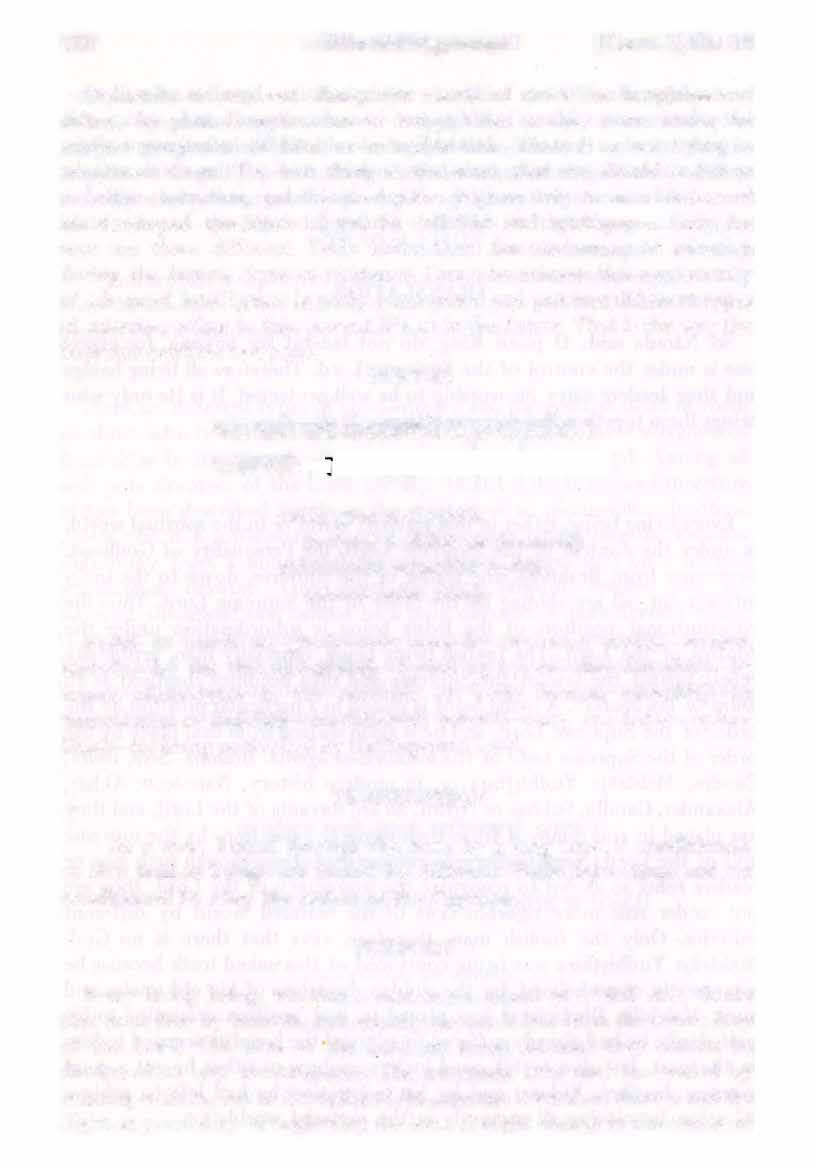
�rnitilftfsil<tl�fqw:"ii44Jqfiu 1 ttlifi�f :u����
yathii giivo nasi protiis tantyiim baddhiis ca diimabhifi. viiktantyiim niimabhir baddhii vahanti balim iSitu[l
yathii-as much as; giivafl.-cow; nasi-by the nose; protiifl.-women; tantyiim-by the thread; baddhii[l.-bound up by; ca-also; diimabhi[l.- by ropes; viiktantyiim-in the network of Vedic hymns; niimabhi[l.-by nomenclatures; baddhiifl.- conditioned; vahan ti- carry on; balim-orders; iSitu[l.-for being controlled by the Supreme Lord.


TRANSLATION
As a cow, bound through the nose by a long rope, is conditioned, so also htllllan beings are bound by different Vedic injunctions and ar.e conditioned to obey the orders of the Supreme.
PURPORT
Every living being, whether a man or an animal or a bird, etc., thinks that he is free by himself, but actually no one is free from the severe laws of the Lord. The laws of the Lord are severe because they cannot be disobeyed in any circumstance. The manmade laws may be evaded by cunning outlaws, but in the codes ofthe supreme lawmaker, there is not the slightest possibility of neglecting the laws. A slight change in the course of
710 Srimad-Bhigavatam [Canto I, Ch. 13
God-made law can bring about a massive danger to be faced by the lawbreaker- Such laws of the Supreme are generally known as the codes of religion underdifferent conditions, but theprinciple ofreligion everywhere is one and the same, namely, obey the orders of the Supreme God. (Codes of Religion) That is the condition of material existence. All living beings in the material world have taken up the risk of conditioned life by their own selection and are thus entrapped by the laws of material nature. The only way to get out of the entanglement is to agree to obey the Supreme. But instead of becoming free from the clutches of miiyii or illusion, foolish human beings become bound up by different nomenclatures, being designated as briihma!laS, k§atriyas, vai.Syas, sudras, Hindus, Mussulmans, Indians, Europeans, Americans, Chinese, and many others, and thus they carry out the orders of the Supreme Lord under the influence of respective scriptural or legislative injunctions. The statutory laws of the state are imperfect imitation replicas or Religious Codes. The secular state, or the godless state, allows the citizens to break the laws of God, but restricts them from disobeying the laws of the state; the result is that the people in general suffer more by breaking the laws of God than by obeying the imperfect laws made by man. Every man is imperfect by constitution under conditions of material existence, and there is not theleast possibility of enacting a perfect legislation by the most materially advanced man. On the other hand, there is no such imperfection in the laws of God. If they are educated in the laws of God, there is no necessity of a makeshift legislative council vf aimless men. There is necessity of change in the makeshift laws of man, but there is no change in the God-made laws because they are made perfect by the all-perfect Personality of Godhead. (Codes of Religion) Scriptural injunctions are made by liberated representatives of God in consideration of different conditions of living, and by carrying on the orders of the Lord gradually, the conditioned living beings become free from the clutches of material existence. The factual position of the living being is, however, that he is the eternal servitor of the Supreme Lord. In his liberated state he renders service to the Lord in transcendental love and thus enjoys a life of full freedom, even sometimes on the equal level with the Lord or sometimes more than the Lord. But in the conditioned material world, every living being wants to be the Lord of other living beings, and thus by the illusion of miiyii such mentality of lording it becomes a cause of further extension of conditional life. So in the material world the living being is still more conditioned, until he surrenders unto the Lord by revjving his original state of eternal servitorship. That is the last instruction of the Bhagavad-gitii and all other recognized scriptures of the world.

Text 42) Dhrtar3{!tra Quits Home 711
TEXT43

� st\Clqmaolf 4lU•af4•a+UAi 1
�-:-��iJ�•�ll\1�11
yathii kri!lopaskariipam samyoga-vigamiiv iha icchayii kri!'itu{l. syatiim tathaivesecchayii n{!liim
yathii.-as much as; kri!l a -paskaravam- playthings; samyoga-union; vigamau-disunion; iha-as much as; icchaya-by the will of; kri!litu{l.-just to play a part; syatam-takes place; tatha-so also; eva- certainly; iSa-the Supreme Lord; icchaya-by the will of; nrvam-of the human being.
TRANSLATION
As a player sets up and disperses his playthings according to his own sweet will, so the supreme will of the Lord brings men together and separates them.
PURPORT
We must know for certain that the particular position in which we are now set up is an arrangement of the supreme will in terms of our own acts in the past. The Supreme Lord is present as the localized Paramatma in the heart of every living being, as it is said in the Bhagavad-gita (Bg. 13.22), and therefore He knows everything of our activities in every stage of our lives. The reactions of our actions are rewarded by Him by placing us in some particular place. A rich man gets his son born with a silver spoon in his mouth, but the child who came as the rich man's son deserved such a place, and therefore he is placed there by the will of the Lord. And at a particular moment when the child has to be removed from that place, he is also carried by the will of the Supreme, even if the child or the father does not wish to be separated from the happy relation. The same thing happens in the case of a poor man also. Neither rich man nor poor man has any control over such meetings or separations of living beings. The example of a player and his playthings should not be misunderstood. One may argue that the Lord is bound to award the reactionary results of our own actions, and thus the example of a player cannot be applied. But it is not so. We
712 Srimad-Bhigavatam [Canto 1, Ch. 13
must always remember that the Lord is the supreme will, and He is not bound by any law. Generally the law of karma is that one is awarded the result of one's own actions, but in special cases, by the will of the Lord; such resultant actions are changed also. But this change can be effected by the will of the Lord only, and no other. Therefore, the example of the player cited in this verse is quite appropriate, for the Supreme Will is absolutely free to do whatever He likes; and because He is all-perfect, there is no mistake in any of His actions or reactions. These changes of resultant actions are especially rendered by the Lord when a pure devotee is involved. It is assured in the Bhagavad-gitii (Bg. 9.30-31) that the Lord saves a pure devotee who has surrendered unto Him without reservation from all sorts of reactions of sins, and there is no doubt about thi�. There are hundreds of examples vf this by the Lord in the history of the world. If the Lord is able to change the resultant reactions of one's past deeds, then certainly He is not Himself bound up by any action or reaction of His own deeds. He is perfect and transcendental to all laws.
TEXT44

yan manyase dhrnvam lokam

adhrnvam vii na cobhayam
sarvathii na hi socyiis te snehiid anyatra mohajiit
yat-even though; manyase-you think; dhrnvam-Absolute Truth; lokam-persons; adhrnvam- nonreality; vii- either; na-or not; ca-also; ubhayam-or bothwise; sarvathii-in all circumstances; na-never; hi-certainly; socyii[l-subject for lamentation; snehiit-due to affection; anyatra-or otherwise; mohajiit-due to bewilderment.
TRANSLATION
0 King, in all circumstances, whether you consider the soul to be an eternal principle, or the material body to be perishable, or everything to exist in the impersonal Absolute Truth, or everything to be an inexplicable combination of matter and spirit, feelings of separation are due only to illusory affection and nothing more.
Text44) Dhr1ar�tra Quits Home 713
PURPORT
The actual fact is that every living being is an individual part and parcel of the Supreme Being, and his constitutional position is subordinate cooperative service. Either in his conditional material existence or in his liberated position of full knowledge and eternity, the living entity is eternally under the control of the Supreme Lord. But those who are not conversant with factual kn()wledge put forward many speculative propositions about the real position of the living entity. It is admitted, however, by all schools of philosophy, that the livmg being is eternal and that the covering body of five material elements is perishable and temporary. The eternal living entity transmigrates from one materialbody to another by the law of karma, and material bodies are perishable by their fundamental structures. Therefore thereis nothing to be lamented in the case of the soul's being transferred into another body, or the material body perishing at a certain stage. There are others also who believe in the merging of the spirit soul in the Supreme Spirit when it is uncovered by the material encagement, and there are others also who do not believe in the existence of spirit or soul, but believe in tangible matter. In our daily experience we find so many transformations of matter from one form to another, but we do not lament such changing features. In either of the above cases, the force of divine energy is uncheckable; no one has any hand in it, and thus there is no cause of grief.
TEXT45

tasmiij jahy anga vaiklavyam
ajiiiina-krtam iitmana[l. katham tvaniithii[l. k[papii
varterams te ca miim vinii
tasmiit-therefore; jahi-give up; ail.ga-0 King; vaiklaivyam-disparity of the mind; ajiiiina- ignorance; k . rtam-dueto; iitmana[l.-of yourself; katham -how; tu-but; aniithii[l. -helpless; krpafliifi.-poor creatures; varteran-be able to survive; te-they; ca-also; miim-me; vinii-without.

TRANSLATION
Therefore give up your anxiety dueto ignorance of the self. You are now thinking of how they, who are helpless, poor creatures, will exist with()Ut you.
714 Srimad-Bhigavatam [Canto 1, Ch. 13
PURPORT
When we think of our kith and kin being helpless and dependent on us, it is all due to ignorance. Every living creature is allowed all protection by the order of the Supreme Lord in terms of each one's acquired position in the world. The Lord is known as bhiita-bhrt, one who gives protection to all living beings. One should discharge his duties only; only the Supreme Lord can give protection to anyone else. This is explained more clearly in the following verse.
TEXT46

kiila-karma.gupiidhino deho'yam piinca-bhautika[l katham anyiims tu gopiiyet sarpa-grasto yathiiparam
kiila[l-eternal time; karma-action; gupa-modes of nature; iidhina[lunder the control of; deha[l-material body and mind; ayam-this; piiiicafive; bhautika[l-made of the five elements; katham-how; anyiin-others; tu-but; gopiiyet-give protection; sarpa-grasta[l-one who is bitten by the snake; yathii-as much as;param-others.
TRANSLATION
This gross material body made of five elements is already under the control of eternal time [kala] , action [karma] and the modes of material nature [ guQa] . How, then, can it, being already in the jaws of the serpent, protect others?
PURPORT
The freedom movements of the world and political, economic, social, and cultural propaganda can do no benefit to anyone due to their being controlled by superior power. A conditioned living being is under the full control of material nature represented by eternal time and activities under the dictation of different modes of nature. There are three material modes of nature, namely goodness, passion and ignorance. Unless one is situated in the mode of goodness, one cannot see things as they are. The passionate and the ignorant cannot even see things as they are. Therefore a person who is passionate and ignorant cannot direct his activities on the right path. Only the man in the quality of goodness can help to a certain extent. Most persons are passionate and ignorant, and therefore, their plans and projects can hardly do any good to others. Above the modes of nature
Text46] Dhrtar3{11J"a Quits Home 715
••�4iligun�;il�'IPI.aRI•: 1 *fiq+t;4;tf�
•fNI�tt14SI<Ji � � 11\l�ll
there is eternal time, which is called kiila because it changes the shape of everything in the material world. Even if we are able to do something temporarily beneficial, time will seethatthegood project is frustrated in course of time. The only thing which is possible to be done is to get rid of the eternal time, kiila, which is compared to kiila-sarpa, or the cobra snake whose bite is always lethal. No one can be saved from the bite of a cobra. The best remedy for getting out of the clutches of the cobralike kiila or its integrity, the modes of nature, is bhakti-yoga, as it is recommended in the Bhagavad-gitii (Bg. 14.26). The highestperfectionalproject of philanthropic activities is to engage everyone in the act of preaching bhakti-yoga all over the worldbecause that alone can save the people -from the control of miiyii or the material nature represented by kiila, karma and gura, as described above. The Bhagavad-gitii (Bg. 14.26) confirms this definitely.
ahadiini sa-hastiiniim apadiini catu�-padiim phalgii.ni tatm mahatiim jivo jivasya jivanam
ahastiini-those who are devoid of hands; sa-hastiiniim-of those who are endowed with hands; apadiini-those who are endowed with legs; catu[l-padiim-of those who have four legs ; phalguni-those who are weak; tat ra-there; mahatiim-of the powerful; jiva[l-the living being; jivasyaof the living being;jivanam-subsistence.



TRANSLATION
Those who are devoid of hands are prey for those who have hands; those devoid of legs are prey for the four-legged. The weak are the subsistence of the strong, and the general rule holds that one living being is food for another.
PURPORT
A systematic law of subsistence in the struggle for existence is there by the supreme will, and there is no escape for anyone by any amount of planning. The living beings who have come to the material world against the will of the Supreme Being are under the control of a supreme power called miiyii-sakti, the deputed agent of the Lord, and this daivi miiyii is

716 Srimad-Bhigavatam [Canto 1, Ch. 13
TEXT47 31C(ijlr.t (C((ijl-.l'tq(IM "4d"ti\li( I CMt[f.lft Q�'R)� II\l\911
meant to pinch the conditioned souls by threefold miseries, one of which is explained here in this verse: the weak is the subsistence of the strong. No one is strong enough to protect himself from the onslaught of a stronger, and by the will of the Lord there are systematic categories of the weak, th� stronger and the strongest. There is nothing to be lamented if a tiger eats a weaker animal, including a man, because that is the law of the Supreme Lord. But although the law states that a human being must subsist on another living being, there is the law of good sense also, for the human being is meant to obey the laws of the scriptures also. This is impossible for other animals. The human being is meant for self-realization, and for that purpose he is not to eat anything which is not first offered to the Lord. The Lord accepts from His devotee all kinds of food preparations madeof vegetable, namely fruits and leaves and grains. Fruits, leaves and milk in different varieties can be offered to the Lord, and after the Lord accepts the foodstuff, the devotee can partake of the prasiidam by which all sufferings in the struggle for existence will be gradually mitigated. This is confirmed in the Bhagavad-gitii (Bg. 9.22). Even those who are accustomed to eat animals can offer foodstuff, not to the Lord directly, but to an agent of the Lord, under certain conditions of religious rites. Injunctions of the scriptures are not meant to encourage the eaters of animals, hut to restrict them by regulated principles.

The living being is the source of subsistence for other stronger living beings. No one should he very anxious for his subsistence in any circumstances because there are living beings everywhere, and no living being starves for want of food at any place. Maharaja Yudhi�thira is advised by Narada not to worry about his uncles' suffering for want of food, for they could live on vegetables available in the jungles as prasiidam of the Supreme Lord and thus realize the path of salvation.
Exploitation of the weaker living being by the stronger is the natural law of existence;there is always an attempt to devour the weak in different kingdoms of the living being. There is no possibility of checking this tendency by any artificial means under material conditions, but it can only be checked by awakening the spiritual sense of the human being by practice of spiritual regulations. The spiritual regulative principles, however, do not allow a man to slaughter weaker animals on one side and teach others peaceful coexistence. If man does not allow the animals peaceful coexistence, how can he expect peaceful existence in human society? The blind leaders must therefore understand the Supreme Being and then try to implement the kingdom of God. The kingdom of God or Riimariijya is impossible without the awakening of God consciousness in the mass mind of the people of the world.
Text 47] Dhrtar�a Quits Home 717
TEXT48
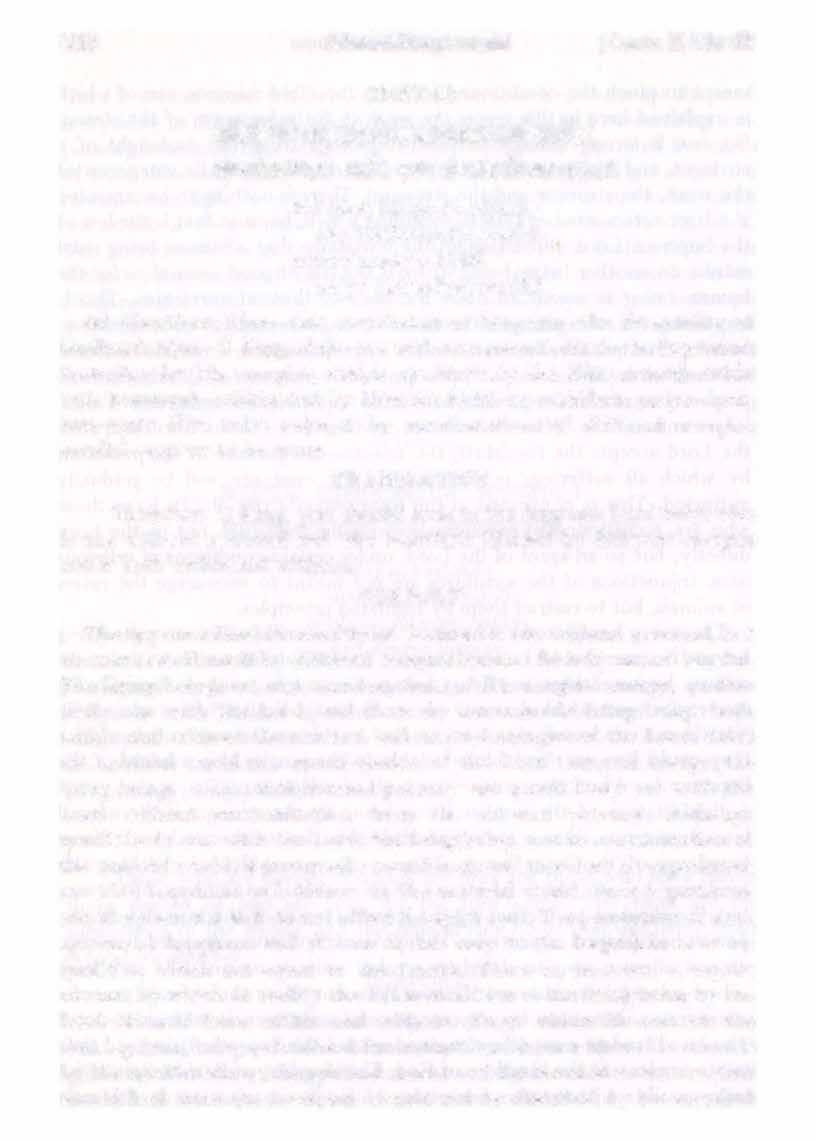
���NI-"'4iiR+iiSRtMI�I �uswt;iijfl� m �'ilqql'lfl H\l�ll
tad idarh bhagaviin riijann
eka iitmiitmaniirh svadrkantaro'nantaro bhiiti
pasya tam miiyayorudhii
tat-therefore; idam-this manifestation; bhaga van-the Personality of Godhead; rajan-0 King; eka{l-one withouta second;atmii-theSupersoul; atmanam-by His energies; svadrk-qualitatively like Him; antara{l-without; ananta ra{l-within and by Himself; bhati-so manifests; pasya- look; tam-unto Him only; mayaya-by manifestations of different energies; urudha-appears to be many.
TRA NSLATION
Therefore, 0 King, you should look to the Supreme Lord only, who is one without a second and who manifests Himself by different energies and is both within and without.
PURPORT
The Supreme Lord Personality of Godhead is one without a second, but He manifests Himself by different energies because He is by nature blissful. The living beings are also manifestations of His marginal energy, qualitatively one with the Lord, and there are innumerable living beings both within and without the external and internal energies of the Lord. Since the spiritual world is a manifestation of the Lord's internal energy, the living beings within that internal potency are qualitatively one with the Lord without contamination from the external potency. Although qualitatively one with the Lord, the living being, due to contamination of the material world, is pervertedly manifested, and therefore he experiences so-called happiness and distress in the material world. Such experiences are all ephemeral and do not affect the spirit soul. The perception of such ephemeral happiness and distress is due only to the forgetfulness of his qualities, which are equal to the Lord's. There is, however, a regular current by which to rectify the fallen condition of the living being by the Lord Himself from within and without. From within H� corrects the desiring living being as localized Paramatma, and from without He corrects by His manifestations, the spiritual master and the revealed scriptures. One should look unto the Lord; one should not be disturbed by the so-called
718 Srimad-Bhigavatam [Canto 1, Ch. 13
manifestations of happiness or distress, but he should try to cooperate with the Lord in His outward activities for correcting the fallen souls. By His order only one should become a spiritual master and cooperate with the Lord. One should not become a spiritual master for one's personal benefit or for some material gain or as an avenue ofbusiness or occupation for earning livelihood. Bona fide spiritual masters who look unto the Supreme Lord to cooperate with Him are actually qualitatively one with the Lord,and theforgetful ones are perverted reflections only. Yudhi�thira
Maharaja is advised, therefore, by Narada not to be disturbed with the affairs of so·called happiness and distress, but to look only unto the Lord to execute the mission for which the Lord has descended. That was his prime duty.
TEXT49

m� �ll1m'l :, 4fila"itsctfflcirts�nq+u:u� t\(fA\11( ll\l�ll

so'yam adya mahiiriija
bhagaviin bhiita-bhiivanafl
kiila-riipo'vatirro'syiim abhiiviiya sura-dv�iim
sap-that Supreme Lord; ayam-the Lord Sri Kr�l}a; adya- at present; mahiiriija-0 King; bhagaviin-the Personality of Godhead; bhuta-bhiivanafl -the creator orthe father of everything created; kiila-riipafl- in thedisguise of devouringtime;avatirrafl-descended;asyiim-upon the world; abhiiviiya -for eliminating; sura-dvi§iim-those who are against the will of the Lord.

TRANSLATION
That Supreme Personality of Godhead Lord Sri Kr�!la in the guise of all devouring time [kala-riipa] has now descended on earth to eliminate the envious from the world.
PURPORT
There are two classes of human beings, namely the envious and the obedient. Since the Supreme Lord is one and the father of all living beings, the envious living beings are also His sons, but they are known as the asums. But the living beings who are obedient to the Supreme Father are called devatiis, or demigods, because they are not contaminated by the material conception of life. The asums are not only envious of the Lord in even denying the existence of the Lord, but they are also envious of all otherlivmgbeings. Thepredominance of asums in the world is occasionally
Text49] Dhrtarii{ltra Quits Home 719
rectified by the Lord when He eliminates them from the world and establishes a rule of devatiis like the Part9avas. His designation as kiila in disguise is significant. He is not at all dangerous, but He is the transcendental form of eternity, knowledge and bliss. For the devotees His factual form is disclosed, and for the nondevotees He appears like kiila-rilpa which is causal form. This causal form of the Lord is not at all pleasing to the.asuras, and therefore they think of the Lord as formless in order to feel secure that they will not be vanquished by the Lord.

TEXT 50 �ti�¥ti!4�4 �I
lAt�n�R�: ll�oll mt 4{tt¥t��
n4paditam deva-krtyam
avllSe§am pratik§ate tiivad yuyam avek§adhvam bhaved yiivad ihesvara[l

n4piiditam-performed; deva-krtyam-what was to be done on behalf of the demigods; avase§am-the rest; pratik§ate-being awaited; tiivat-up to that time; yuyam-all of you Part9avas; avek§adhvam-observe and wait; bhavet-may; yiivat-as long as; iha-in this world; iSvara[l,-the Supreme Lord.


TRANSLATION
The Lord has already performed His duties to help the demigods, and He is awaiting the rest. You Part9avas may wait as long as the Lord is here on earth.
PURPORT
The Lord descends from His abode (Kf�rtaloka), the topmost planet in the spiritual sky, in order to help the demigod administrators of this material world when they are greatly vexed by the asuras, who are not only envious of the Lord but also of His devotees. As referred to above, the conditioned living beings contact material association by their own choice, dictated by a strong desire to lord it over the resources of the material world and become imitation lords of all they survey. Everyone is trying to become an imitation God; there is keen competition amongst such imitation gods, and such competitors are generally known as asuras. When there are too many asuras in the world, then it becomes a hell for those who are devotees of the Lord. Due to thegrowth of theasuras, the mass of people who are generally devoted to the Lord by nature and the
720 Srimad-Bhagavatam [Canto 1, Ch. 13
pure devotees of the Lord, including the demigods in higher planets, pray to the Lord for relief, and the Lord either descends personally from His abode or deputes some of his devotees to remodel the fallen condition of human society, or even animal society. Such disruptions take place not only in the human society but also amongst animals, birds or other living beings, including the demigods in the higher planets. Lord Sri �!la descended personally to vanquish asuras like Kamsa, Jarasandha, Si8upala, etc., and during the reign of Maharaja Yudhi�thira almost all these asuras were killed by the Lord. Now he was awaiting the annihilation of His own dynasty, called the Yaduvamsa, who appeared by His will in this world. He wanted to take them away before His own departure to His eternal abode. Narada, like Vidura, did not disclose the imminent annihilation of the Yadu dynasty, but indirectly gave a hint to the King and his brothers to wait till the incident happens and the Lord departs.
TEXT 51
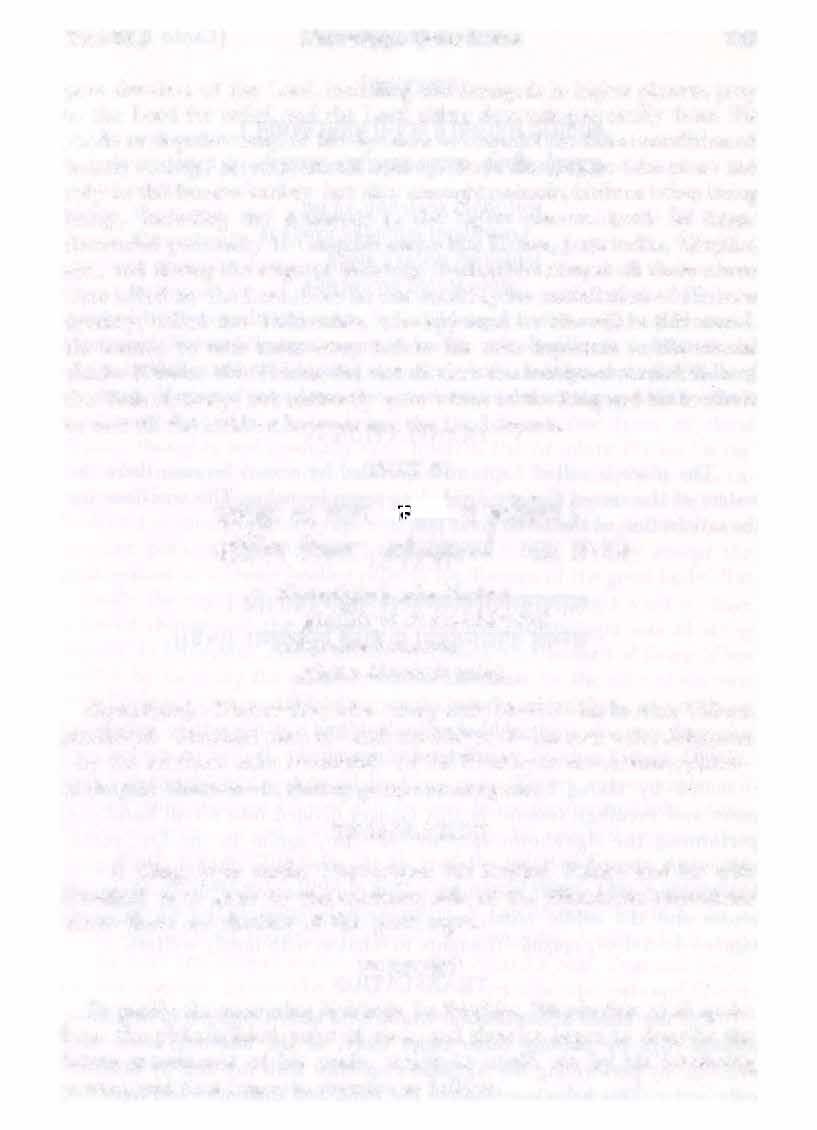
�: {{( 1imn �
dhrtar�trafi. saha bhriitrii giindhiiryii ca sva-bhiiryayii dak§i!lena himavata .�i!liim iisramam gatafi.
11�
dhrtarii�frafi.- Dhrtarastra; saha- alongwith; bhriitrii-his brother Vidura; giindhiiryii-Gandhari also; ca- and; sva-bhiiryayii-his own wife; dak�i!lena -by the southern side; himavata[l.-of the Himalayan mountains; ni!liimof the nis; iisramam-in shelter; gatafi.-he hasgone.

TRANSLATION
0 King, your uncle, Dhftar�ra, his brother Vidura and his wife Gandhari have gone to the southern side of the Himalayan mountains where there are shelters of the great sages.

PURPORT
To pacify the mourning Maharaja Yudhi�thira, Narada first of all spoke from the philosophical point of view, and then he began to describe the future movements of his uncle, which he could see by his foreseeing powers, and thus began to describe as follows.
Text 51] Dhrtar�lfa Quits Home 721
� I
� Sll'ftun•u»JPi mr:
�
C\f�
11
TEXT 52
�initf1r.eafil�����1
«8r--fsffitit ;n;tt (18\itl6: � ����II
srotobhifl. saptabhir yii vai svardhuni saptadhii vyadhiit saptiiniim pritaye niima sapta-srotafl. pracak1ate
srotobhi[l.-by currents; saptabhifi.-by seven (divisions); yii-the river; vai-certainly; svardhuni-the sacred Ganges; saptadhii-seven branches; vyadhiit-created; saptiiniim-of the seven; p ritaye-for the satisfaction of; nama-various; sapta-srotafl.-seven sources;pracak�ate-known by name.

TRANSLATION
The place is called Saptasrota (divided by seven) because there the waters of the sacred Ganges divide into seven branches. This was done for the satisfaction of the seven great �is.

TEXT 53

1
�'�Nijlw:(fl�lij'�Ntl3ttat: ������
sniitviinusavanam tasmin hutvii ciignin yathiividhi abbhak� upa.Siintiitma sa iiste vigata4af1afl.
sniitvii-by taking bath; anusavanam-regularly three times (morning, noon and evening); tasmin-in that Ganges divided into seven; hutvii- by performing the Agni-hotra sacrifice; ca-also; agnin- in the fire; yathiividhi-just according to the tenets of the scripture; abbhak§a[l.-fasting by drinking only water; upasiinta-completely controlled;iitmii-the gross senses and the subtle mind; sa[i.-Dhrtarii.�tra; iiste-would be situated; vigata -devoid of; e§apa[i.-thoughts in relation with family welfare.
TRANSLATION
On the banks at Saptasrota, Dhftarfu:!tra is now engaged in beginning �tariga-yoga by bathing three times daily, in the morning, noon and evening, by performing the Agnihotra sacrifice with fire and by drinking only water. This helps one control the mind and the senses and frees one completely from thoughts of familial affection.
722 Srimad-Bhigavatam [Canto 1, Ch. 13
:qasll;:qvnPd\t
PURPORT
The yoga system is a mechanical way to control the senses and the mind and divert them from matter to spirit. The preliminary processes are the sitting posture, meditation, spiritual thoughts, manipulation of air passing within the body, and gradual situation in trance, facing the Absolute Person Paramatma. Such mechanical ways of rising up to the spiritual platform prescribe some regulative principles of taking bath daily three times, fasting as far as possible, sitting and concentrating the mind on spiritual matters and thus gradually becoming free from vi§aya or material objectives. Material existence means to be absorbed in the material objective, which is simplyillusory. House, country, family, society, children, property, business, etc., are some of the material coverings of the spirit iitmii, and the yoga system helps one to become free from all these illusory thoughts and gradually turn towards the Absolute Person Paramatma. By material association and education, we learn simply to concentrate onflimsy things,but yoga is the process offorgetting thein altogether. Modern so-called yogis and yoga systems ·manifest some magical feats, and ignorant persons are attracted by such false things. or they accept the yoga system as a cheap healing process for diseases of the gross body. But factually the yoga system is the process of learning to forget what we have acquired throughout the struggle for existence. Dhrtara�tra was all along engaged in improving family affairs by raising the standard of living of his sons or by usurping the property of the Pap!lavas for the sake of his own sons. These are common affairs for a man grossly materialistic and without knowledge of the spiritual force. He does not see how this can drag one from heaven to hell. By the grace of his younger brother Vidura, Dhftara�tra was enlightened and could see his grossly illusory engagements, and by such enlightenment he was able to leave home for spiritual relaization. Sri Naradadeva was just foretelling the way of his spiritual progress in a place which was sanctified by the flow of the celestial Ganges. Drinking water only without solid food is also considered fasting. This is necessary for advanceme11t of spiritual knowledge. A foolish man wants to be a cheap yogi without observing the regulative principles. A man who has no control over the tongue at first can hardly become a yogi. Yogi and bhogi are two opposite terms. The bhogi or the merryman who eats and drinks cannot bea yogi, fm:.ayogi is neverallowed toeat and drinkunrestrictedly. We may note with profit how Dhftara�tra began his yoga system by drinking water only and sitting calmly in a place with a spiritual atmosphere, deeply absorbed in the thoughts of the Lord Hari, the Personality of Godhead.

Text 53] Dhrtarii{lva Quits Home 723
TEXT 54

falaaQ;it�6JWIQ: Sl�lt61RPI\41: I
lR¥tl:twt�l lit(ij(liiltQ"fCC64it¥M: II�\111
jitiisano jitaSviisa[l pratyii-hrta-�al}-indriya[l hari-bhiivanayii dhvastaraja[l sattva-tamomalalz.
jita-iisana[l-one who has controlled the sitting posture;jita-sviisa[l-one who has controlled the breathing process;pratyii-hrta-turning hack; �tsix;indriya[l-senses;hari-the Absolute Personality of Godhead; bhiivanayii -absorbed in; dhvasta- conquered; raja"{l-passion; sattva-goodness; tamap -ignorance; mala"{l-contaminations.
TRANSLATION
One who has controlled the sitting postures [the yogic iisana) and the breathing process can tum the senses toward the Absolute Personality of Godhead and thus become immuned from the contaminations of the modes of material nature, namely mundane goodness, passion and ignorance.
PURPORT
The preliminary ·activities of the way of yoga are iisana, prii[liiyiima, pratyiihiira, dhyiina, dhiirarii, etc. Maharaja Dhftara�tra was to attain success in those preliminary actions because he was seated in a sanctified place and was concentrating upon one objective, namely the Supreme Personality of Godhead (Hari). Thus all his senses were being engaged in the service of the Lord. This process directly helps the devotee to get freedom from the contaminations of the three material modes of nature. Even the highest mode, the material mode of goodness, is also a cause of material bondage, and what to speak of the other qualities, namely passion and ignorance. Passion and ignorance increase the material propensities of hankering for material enjoyment, and a strong sense of lust provokes the accumulation of wealthand power. One who has conquered these two base mentalities and has raised himself on the platform of goodness, which is full of knowledge and morality, cannot also control the senses, namely the eyes, the tongue, the nose, the ear and touch. But one who has surrendered himself unto the lotus feet of Lord Hari, as above mentioned, can transcend all influences of the modes of material nature and he fixed in the service of the Lord. The bhakti-yoga process, therefme, directly applies senses to the loving service of the Lord. This prohibits the performer from
724 Srimad-Bhigavatam [Canto 1, Ch. 13
engaging in material activities. This process of turning the senses from material attachment to the loving transcendental service of the Lord is called pratyiihiira, and the very process is called priip.iiyiima, ultimately ending in samiidhi, or absorption in pleasing the Supreme Lord Hari by all means.
TEXT 55

N(llwtl�¥tr.t��smeM� I
i1QIIH4l�lwt'41� EltiMI(f'HIMI' ����II
vijii.iiniitmani samyojya k�etraftie praviliipya tam brahmap.yiitmiinam iidhiire ghafiimbaram iviimbare
vijniina-purified identity; iitmani-of intelligence; samyojya-perfectly fixing up;k�etrajne-in the matter of the living being;praviLlpya-merging; tam-hiin; brahmaczi-in the Supreme;atmanam-pure living being;adhare -in the reservoir; ghatiimbaram-sky within the block;iva-like;ambarein the supreme sky.
TRANSLATION
Dhrtar�a willhaveto amalgamate hispure identity withintelligence and then merge into the Supreme Being with knowledge of his qualitative oneness, as a living entity, with the Supreme Brahman. Being freed from the blocked sky, he will have to rise to the spiritual sky.
PURPORT
The living being, by his desiring to lord it over the material world and declining to cooperate with the Supreme Lord, contacts the sum total of the material world, namely the mahat-tattva, and from the mahat-tattva his false identity, with the material world, intelligence, mind, and the senses, is developed. This covers his pure spiritual identity. By the yogic process, when his pure identity is realized, which is known as self-realization, then one has to revert to the original position by amalgamating the five gross elements and the subtle elements, mind and intelligence into the mahat-tattva again. Thus getting freed from the clutches of the mahattattva, he has to merge in the existence of the Supersoul. In other words, he has to realize that qualitatively he is non-different from the Supersoul, and thus he transcends the material sky by his pure identical intelligence and thusbecomes engaged in the transcendental loving service of the Lord. This is the highest perfectional development of spiritual identity, which was attained by Dhrtara�tra by the grace of Vidura and the Lord. The
Text 55] Dhrtarawa Quits Home 725
Lord's mercy was bestowedupon him by his personal contactwith Vidura, and when he was actually practicing the instructions of Vidura, the Lord helped him to attain the highest perfectional stage.
A pure devotee of the Lord does not live in any planet of the material sky, nor does he feel any contact with material elements. His so-called material body does not exist, being surcharged with the spiritual current of the Lord's identical interest, and thus he is permanently freed from all contaminations of the sum total of the mahat-tattva. He is always in the spiritual sky, which he attains by being transcendental to the sevenfold material coverings by the effect of his devotional service. The conditioned souls are within the coverings, whereas the liberated soul is far beyond the cover.
TEXT 56

dhvasta-miiyii-gurtodarko niruddha-karartii.Sayafl nivartitiikhiliihiira iiste sthiirtur iviicalafl tasyiintariiyo maiviibhufl sannyastiikhila-karmartafl
dhvasta-being destroyed; miiya-gu11a -the modes of material nature; udarkafl-aftereffects; niruddha-being suspended; kararta-iisayafl-the senses and the mind; nivartita-stopped; akhila-all; iihiira{l-food for the senses; aste-is sitting; sthiif1up-immovable; ioo-like; adhuni-acalaflfixedup; tasya-his; antariiyafl-hindrances; mii iva-never like that; abhii[tbe; sannyasta-renounced; akhila-all sorts; karmartafl-material duties.
TRANSLATION
He will have to suspend all the actions of the senses, even from the outside, and will have to be impervious to interactions of the senses, which are influenced by the modes of material nature. After renouncing all material duties, he mustbecome immovably established, beyond all sources of hindrances on the path.
PURPORT
Dhftar�tra had attained, by the yogic process, the stage of negation of all sorts of material reaction. The effects of the material modes of nature
726 Srimad-Bhigavatam [Canto l, Ch. 13
<tq(ij+(l41gtJO<(� f.lqCfi(UII\14: I f.li!lki61Rf4el�l(31M�lt!Ri!ii4R�: 1 6�1;:ij(li(t�:Q;:tt(ij1Rf4e4i4uu H�� 11
draw the victim to the indefatigable desires of enjoying matter, but one can escape such false enjoyment by the yogic process. Every sense is always busy in searching for its food, and thus the conditioned soul is assaulted from all sides and has no chanceto become steady in anypursuit.
Maharaja Yudhi�thira was advised by Narada not to disturb his uncle by attempting to bring him back home. He was now beyond the attraction of anything material. The material modes of nature (the gup.as) have their different modes of activities, but above the material modes of nature there is a spiritual mode also which is absolute. Nirgup.a means without reaction. The spiritual mode and its effect are identical; therefore the spiritual quality is distinguished from its material counterpart by the word nirgup.a. After complete suspension of the material modes of nature, oneis admitted to the spiritual sphere, and action dictated by the spiritual modes is called devotional service or bhakti. Bhakti is therefore nirgup.a attained by direct contact with the Absolute.
TEXT 57

q� atQ(twtli!�m:qirit� 1 mt�� � •Rifhtfci""''RI
sa vii adya.taniid rii.jan parata[l paiicame'hani kalevaram hii.syati svam tac ca bhasmibhavi§yati
sa[!,-he; vii-in all probability; adya-today; taniit-from; rii.jan-0 King; parata[l-ahead; paiicame-on the fifth; ahani-day; kalevaram-body; hii.syati-shall quit; svam-his own; tat- that; ca-also; bhasmi-ashes; bhavi§yati-will turn into.
TRANSLATION
0 King, he will quit his body, most probably, on the fifth day from today. And his body will turn to ashes.
PURPORT
Narada Muni's prophecy prohibited Yudhi�!hira Maharaja to go to the place where his uncle was staying because even after quitting the body by his own mystic power, Dhftara�tra would not be in need of any funeral ceremony because Narada Muni indicated that his body by itself would burn to ashes. The perfection ofthe yoga systemis attained by such mystic power: the yogi is able to quit his body by his own choice of time and can
Text57] Dhrtar�tra Quits Home 727
����II
attain any planet he desires by turning the present body into ashes by self-made fire.
TEXT 58

((�+tl�sfitf�
�: tRfi � I
41ft:�'fffl'm�fhl+tM+tij� ����II
dahyamiine'gnibhir dehe patyufl patni sahotaje bahifl sthitapatim siidhvi tam agnim anu vek�yati
dahyamiine-while it is burning;agnibhi[l-by the fire; dehe-the body; patyufl-of the husband; patni-the wife; saha-utaje-along with the thatched cottage;bahifl-outside;sthitii-situated;patim-unto the husband; siiddvi-the chaste lady; tam-that; agnim-fire; anu vek§yati-looking with great attention shall enter the fire.
TRANSLATION
While outside observing her husband who will burn in the fire of mystic power along with his thatched cottage, his chaste wife will enter the fire with rapt attention.
PURPORT
Gandhari was an ideal chaste lady, a life companion of her husband, and therefore when she saw her husband burning in the fire of mystic yoga along with his cottage of leaves, she despaired. She left home after losing her one hundred sons, and in the forest she saw that her most beloved husband was also burning. Now she actually felt alone, and therefore entered the fire of her husband and followed her husband to death. This entering of a chaste lady into the fire of her dead husband is called the sati rite, and the action is considered to be most perfect for a woman. In a later age,this sati ritebecame an obnoxious criminal affairbecause the ceremony was forced upon even an unwilling woman. In this fallen age it is not possible for any lady to follow the sati rite as chastely as it was done by Gandhliii and others in past ages. A chaste wife like Gandhari would feel the separation of her husband to be more burning than actual fire. Such a lady can observe the sati rite voluntarily, and there is no criminal force by anyone. When the rite became a formality only and force was applied upon a lady to follow the principle, actually it became criminal, and therefore the ceremony was to be stopped by state law. This prophecy of Narada Muni to Maharaja Yudhi�thira forbade him to go to his widow aunt.
728 Srimad-Bhigavatam [Canto l, Ch. 13
TEXT 59

<ldJII� fwt�IQ4 I tR1 �: ����II
viduras tu tad iiScaryam
niSiimya kuru-nandana har�a-soka-yutas tasmiid
gantii tirtha-n�evakafl
vidurafl-Vidura also;tu-but; tat-thatincidence; iiScaryam-wonderful; n iSiimya- seeing; kuru-nandana-0 son of the Kuru dynasty; har§adelight; soka-grief; yutap-affected by; tasmiit-from that place; gantiiwent away; tirtha- place of pilgrimage; n�evakap-for being enlivened.

TRANSLATION
Vidura, being affected with delight and grief, will then leave that place of sacred pilgrimage.


PURPORT
Vidura was astonished to see the marvelous departure of his brother Dh:ftar�tra as a liberated yogi, for in his past life he was much attached to materialism. Of course it was only due to Vidura that his brother attained the desirable goal of life. He was therefore glad to learn about it. But he was sorry that he could not make his brother turn into a pure devotee. This was not done by Vidura because of Dh:ftar�p-a's being inimicalto the Pappavas, who were all devotees of the Lord. An offense at the feet of a Vai�pava is more dangerous than an offense at the lotus feet of the Lord. Vidura was certainly very liberal to bestow mercy upon his brother Dh:ftara�tra, whose past life was very materialistic. But ultimately the result of such mercy certainly depended on the will of the Supreme Lord in the present life; therefore Dh:ftara�p-a attained liberation only, and after many such liberated states of life one can attain to the stage of devotional service. Vidura was certainly very mortified by the death of his brother and sister-in-law, and the only remedy to mitigate such lamentation was to go out to pilgrimage. Thus Maharaja Yudhi�thira had no chance to call back Vidura, his surviving uncle.

Text60] Dhrtarawa Quits Home
729
TEXT60 �� ifRG:: ij�: I Fttfkil it"i!!� ��I'JI(Iii"iii:
ity uktviitharuhat svargam naradah saha-tumburuh . . yudhi§thiro vacas tasya hrdi krtviijahiic chuca[l.
iti-thus; uktvii-having addressed; atha-thereafter; arnhat-ascended; svargam-outer space; niiroda[l.-the great sage Narada; saha-along with; tumburu[l.-his stringed instrument; yudh�thira[l.-Maharaja Yudhi�thira; vaca[l.-instructions; tasya-of his; hrdi krtvii-keeping in the heart; ajahatgave up; suca[l.-all lamentations.
TRANSLATION
Having spoken thus, the great sage Narada, along with his vin.ii, ascended into outer space. Yudhi�thira kept his instruction in his heart and so was able to get rid of all lamentations.
PURPORT
SriNaradaji is an eternalspaceman, having been endowedwith a spiritual body by the grace of the Lord. He can travel in the outer spaces of both the material and spiritual worlds without restriction and can approach any planets by mechanical means. Maharaja Yudhi�thira was a pious king, and his previous life as the son of a maidservant. Because of his association with pure devotees, he was elevated to the position of an eternal spaceman and thus had freedom of movement. One should therefore try to follow in the footsteps of Narada Muni and not make a futile effort to reach other planets by mechanical means. Maharaja Yudhi�thira was a pious king, and therefore he could see Narada Muni occasionally; anyone who desires to see Narada Muni must first be pious and follow in the footsteps of Niirada Muni.
Thus end the Bhaktivedanta purports of the First Canto, Thirteenth Chapter, of Srimad-Bhiigavatam, entitled ..Dhrtarii§/TU Quits Home.,

730
Srimad-Bhigavatam
[Canto 1, Ch. 13
Disappearance of Lord Kf$1Ja
TEXT I


f[!f
suta uviica samprasthite dvarakayam
j4rwu bandhu-didrk�aya jnatum ca pur'-ya-slokasya
k�r'-asya ca viceHitam
sri suta� uvaca-Sri Siita Gosvami said; samprasthite-having gone to; dviirakayam-the city of Dvaraka; j4zwu-Arjuna; bandhu-friends and relatives; didrk�aya-for meeting them;jnatum-toknow; ca-also; puflyaslokasya-of onewhose glories are.sungbyVedichymns;kn1Jasya-ofLord Kr�qa;ca-and;vice�titam-further programs of work.


TRANSLATION
Sri Suta Gosvami said: Arjuna went to Dviraki to see Lord Sri K.r!!�a and other friends and also to learnfrom theLord of Hisnext activities.
PURPORT
As stated in the Bhagavad-gita, the Lord descended on earth for the protection of the faithful and annihilation of the impious, so after the Battle of Kuruk�etra and establishment of Maharaja Yudhisthira, the mission of the Lord was complete. The Pap�avas, especially Sri Arjuna, were eternal companions of the Lord, and therefore Arjuna went to Dvaraka to hear from the Lord of His next program ofwork.
CHAPTER FOURTEEN
�'fR ij..,.�a ftiam�r:a.aa�• 1 q t;(�� �=iffcl�f!6¥(11 � II
731
TEXT2

'"f�dt:Efi�MriiiQHMJ•wu�Jtst.J: I � '"w;qafUt Rf� �:II�II
vyatita[l. katicin mii.sas tada nayat tato 'rjuna[l. dadarsa ghora-riipiir&i nimittiini kuriidvaha[l.
vyatitii[l.-after passing away; katicit-a few; miisii[l.-months; tadii-at that time; na iiyiit- did not return; tata[l.-from there; aljuna[l.-Arjuna ; dadar5a-observed; ghom- fearful; riipiir&i-appearances; nimittiini-various causes; kuriidvaha[l.-Maharaja Yudhi�hira.
TRANSLATION
A few months passed, and Arjuna did not return. Maharaja Yu�hira then began to observe some inauspicious omens, which were fearful in themselves.
PURPORT
Lord Sri �pa the Supreme Personality of Godhead is ad infinitum, more powerful than the most powerful sun of our experience. Millions and billions of suns are created by Him and annihilated by Him within His one breathing period. In the material world the sun is considered to be the source of all productivity and material energy, and due to the sun only w� can have the necessities of life. Therefore, during the personal presence of the Lord on the earth, all paraphernalia of our peace and prosperity, especially religion and knowledge, were in full display because of the Lord's presence, just as there is a full flood of light in the presence of the glowing sun. Maharaja Yudhi�thira observed some discrepancies in his kingdom, and therefore he became very anxious about Arjuna, who was long absent, and there was also no news about Dvaraka's well-being. He suspected the disappearance of Lord Kr�a, otherwise there would have been no possibility of fearful omens.
732 Srimad-Bhagavatam [Canto 1, Ch. 14
TEXT3 � � � mJ�q4e�fifar: 1 -qawft44'f��itfNJhU'ldlt:'lwtlt;QI�II
kiilasya cagatim raudrom viparyastar tu dharmi!wb
piipiyasim nr!J.iim viirtiim
krodha-lobhiinrtatmaniim
kiilasya-of the eternal time; ca-also;gatim-direction; raudriim-fearful; viparyastab--discrepancies; tu-but; dharmi!J.ab--specific function; piipiyasim-sinful; nrr-iim-of the human being; viirtiim-means of livelihood; krodha-anger; lobha-greed; anrta-falsehood; iitmaniim-of the people.

TRANSLATION
He saw that the direction of eternal time had changed, and this was very fearful. There were disruptions in the seasonal regularities. The people in general had become very greedy, angry and deceitful. And he saw that they were adopting foul means of livelihood.
PURPORT
Whencivilizationisdisconnectedfromthelovingrelationof the Supreme Personality of Godhead, symptoms like changes of seasonal regulations, foul means of livelihood, greed, anger and fraudulence become rampant. The change of seasonal regulationsrefers to the atmosphere of one season becoming manifest in another season, for example the rainy season being transferred to autumn, or the fruits and flowers ofone season fructifying in another season. A godless manisinvariablygreedy,angry and fraudulent. Such a man can earn his livelihood by any means, black or white. During the reign of Maharaja Yudhi�thira, all the above symptoms were conspicuous by their absence. But Maharaja Yudh�thira was astonished toexperience even a slight change in the godly atmosphere of his kingdom, and at oncehesuspected thedisappearance of the Lord. Foul means of livelihood impliesdeviationfromone'soccupational duty. There are prescribed duties for everyone, such as the briihmap.a, k�atriya, vaiSya and sudra, but any one of them who deviates from his prescribed duty and declares another's duty to be his ownisfollowinga foul and improper duty. A man becomes too greedy for wealth and power when he has no higher objective in life and when he thinks that this earthly life of a few years is all in all. Ignorance is the cause for all these anomalies in human society, and to remove this ignorance, especially in this age of degradation, the powerful sunis there to distribute lightin the shape ofSrimad-Bhiigavatam.
Text 3)
Disappearance of Lord .Kr�a
733
�PFI ���='f�l f14q}U((«({WI((C("i6'Rf='f�--'(II\lII
jihmaprayam vyavahrtam
sathya-miSram ca sauhrdam
pitr-matr-suhrd-bhratr
dampatiniim ca kalkanam
jihma-prayam-cheating; vyavahrtam-in all ordinary transactions; sathya-duplicity; miSram ca-adulterated in and; sauhrdam-regarding friendly well-wishers;pitr-father;matr-regarding the mother; suhrt-wellwishers; bhratr- one ' s own brother; dampatinam-regarding husband and wife3 ca-also; kalkanam-mutual quarrel.
TRANSLATION
All ordinary transactions and dealings became polluted with cheating, even between friends. And in familial affairs, there was always misunderstanding between fathers and mothers and sons, and between well-wishers and between brothers. Even between husband and wife there was always strain and quarrel.

PURPORT
A conditioned living being is endowed with four principles of malpractice, namely errors, insanity, inability and cheating. These are signs of imperfection, and out of the four the propensity to cheat others is most prominent. And this cheating practice is there in the conditioned souls because the conditioned souls are primarily in the material world imbued with an unnatural desire to lord it over the material world. A living being in his pure state is not conditioned by the laws because in his pure state he is conscious that a living being is eternally subservient to the Supreme Being, and thus it is always good for him to remain subservient, instead of falsely trying to lord it over the property of the Supreme Lord. In the conditioned state the living being is not satisfied even if he actually becomes the lord of all that he surveys, which he never becomes, and therefore he becomes the victim of all kinds of cheating, even with his nearest and most intimate relations. In such an unsatisfactory state of
734 Srimad-Bhigavatam [Canto 1, Ch. 14
TEXT4
affairs, there is no harmony, even between father and sons or between husband and wife. But all these contending difficulties can he mitigated by one process, and that is devotional service of the Lord. The world of hypocrisy can he checked only by counteraction of devotional service of the Lord and nothing else. Maharaja Yu�thira, having observed the disparities, conjectured the disappearance of the Lord from the earth.
TEXT5
�: 11�11
nimittanyatyar4fani kale tv anugate nrrzam lobhady-adharma-pmkrtim dr�fvoviicanujam nrpa�
nimittiini-causes;ati-very serious;ari§fiini-bad omens;kiile-in course of time; tu-hut; anugate-passing away; n,rrziim-of humanity at large; labhiidi-agreed, etc.;adharma-irreligious;prakrtim-hahits;d,r�fvii-having observed;uviica-said;anujam-younger brother;n,rpa�-the King.
TRANSLATION
In course of time it came to pass that people in general became accustomed to greed, anger, pride, etc. Maharaja Yudhi�thira, observing all these omens, spoke to his younger brother.
PURPORT
A pious king like Maharaja Yudhi�thira at once becameperturbed when there were such inhuman symptoms as greed, anger, irreligiosity and hypocrisy rampant in society. And it appears from this statement that all these symptoms of degraded society were unknown to the people of the time, and it was astonishing for them to have experienced them with the advent of the Kali-yuga or the age of quarrel.
TEXT6

Text 6] Disappearance of Lord Kf�a 735
�tl�
P-rll\'11t401�R!IM�f4atM�I �l¥11Q��SI�
���en�
�� 1
�II
eaoqAa'l i\l(ifil4i
�cq���cqf?f�d(ll
Srimad-Bhagavatam
yudh�fhira uviica sampre�ito dvarakiiyam
j�!lur bandhu-didrk�aya jiiatum ca puf1ya-slokasya
kr�f1Usya ca vice�titam
yudh�thira� uvaca-Maharaja Yudhi�thira said;sampre�ita�-has gone to; dvarokayam-Dvarak a; j�r-u�-Arjuna; bandhu-friends; didrk�ayafor the sake ofmeeting;jiiiitum-to know;ca-also;pur-ya-s'lokasya-ofthe Personalityof Godhead;krgwsya-of Lord Sri Kr�l}a;ca-and;vice�titamprogram ofwork.
TRANSLATION
Maharaja Yu�thira said to his younger brother Bhimasena: Bhimasena, I sent Arjuna to Dvaraka to meet his friends and to learn from the Personality of Godhead ��!la of His program of work.
TEXT7

�R�t: (4811wtl '11mlftq(\;w �: I
•U41RI � en �1( �G:'4t51(11 II \9 II
gata� saptadhuna miisii bhimasena taviinuja"fl
niiyati kasya va hetornaham vededam aiijasa
gatii"f!--has gone; sapta-seven; adhunii-to date; miisii�-months; bhimasena-0 Bhimasena;tava-your;anuja�-younger brother;na-does not; ayati-come back; kasya-fo r what;va-or;heto�-reason;na-not; aham-I;veda-know;idam-this;anjasa-factually.
TRANSLATION
Since hedeparted, seven months have passed, yet he has not returned. I do not know factually how things are going there.
736
(Canto 1, Ch. 14
TEXTS
3{fqloctMunss�e: � I �ctt�fffi� II � II
api deva�irtad4talz. sa kalo 'yam upasthitalz. yadatmano ,ngam akrit)arit bhagavan utsisrk¥Jti
api-whether; devar�irtii- by the demigod-saint (Narada); adi§talz.instructed; salz.-that; kala(t-eternal time; ayam-this; upasthita(t-arrived; yada-when; iitmana(t-of His own self; angam-plenary portion; iikripammanifestation; bhagaviin- the Personality of Godhead; utsisrk§ati-is going to quit.





TRANSLATION
Is He going to quit His earthly pastimes, as Dev�i Narada indicated? Has that time already
arrived?
PURPORT
As we have discussed many times, the Supreme Personality of Godhead Lord Sri 1\.r�tta has many plenary expansions, and each and every one of them, although equally powerful, executes different functions. In the Bhagavad-gitii there are different statements by the Lord, and each of these statements is meant for different plenary portions or portions of the plenary portions. For example, Sri Kr�tta the Lord saysin theBhagavad-gitii: "Whenever and wherever there is a decline in religious practice, 0 descendant of Bharata, and a predominant rise of irreligion-at that time I descend Myself." (Bg. 4.7)
''0 son of Kunfi [Arjuna] , I am the taste of water, the light of the sun and the moon, the syllable om in the Vedic mantras; I am the sound in ether and ability in man." (Bg. 7.8)
"If I should cease to work, then all these worlds would he put to ruination. I would also he the cause of creating unwanted population, and I would thereby destroy thepeace of all sentient beings." (Bg. 3.24)
Text 8] Disappearance of Lord 1\.r�qa
737
"Whatever actionis performed by a great man, common men will follow in his footsteps. And whatever standards he sets by exemplary acts, all the world pursues." (Bg. 3.21)
All the above statementsof the Lord apply to different plenary portions of the Lord, namely His expansions of Satikar�apa, Vasudeva, Pradyumna, Aniruddha, Narayapa, etc. All these expansions are He Himself by different transcendental expansions, and still the Lord as Sri Kr�pa functions in a different sphere of transcendental exchange with different grades of devotees. And yet Lord Kf�pa as He is appears once in the day of Brahma (or after a lapse of 864 trillion solar years) in each and every universe, and all His transcendental pastimes are displayed in each and every universe in a routine spool. But in that routine spool the functions of Lord Kr�pa, Lord Vasudeva, etc., are complex problems for the layman. There is no difference between the Lord's Self and the Lord's transcendental body. The expansions execute differential activities. When the Lord, however, appears in His person as Lord Sri Kf�pa, His other plenary portions also join in Him by His inconceivable potency called yogamiiyii, and thus the Lord �pa of Vrndavana is different from the Lord Kr�pa of Mathura or the Lord Kr�pa of Dviirakii. The viriita ropa of Lord Kr�pa is also different from Him, by His inconceivable potency. The viriita riipa exhibited on the Battlefield of Kuruk�etra is the material conception of His form. Therefore when Lord Kf�pa was apparently killed by the bow and arrow of the hunter, it should be understood that the Lord left His so-called material body in the material world. The Lord is kaivalya, and for Him there is no difference between matter and spirit because everything is created from Him. Therefore His quitting one sort of body or accepting another body does not mean that He is like the ordinary living being. All such activities are simultaneously one and different by His inconceivable potency. When Maharaja Yudhi�!hira was lamenting the possibility of His disappearance, it was just in pursuance of a custom of lamenting the disappearance of a great friend, but factually the Lord never quits His transcendental body, as is misconceived by less intelligent persons. Such less intelligent persons have been condemned by the Lord Himself in the Bhagavad-gitii, and they are known as the muphas. That the Lord left His body means that He left again His plenary portions in the respective dhiimas (transcendental abodes), as He left His viriita ropa in the material world.

738 Srimad-Bhagavatam [Canto 1, Ch. 14
TEXT9 �:�)��:mun:��n 1 31Rr.1��� �� ���II� II
yasmiin naft sampado riijyam diiriift priir-iift kulam prajiift iisan sapatna-vijayo
lokiis ca yad-anugrahiit
yasmat-from whom; nafl-our; sampadafl-opulence; rajyam-kingdom; dara[1-good wives; prar-afl-existence of life; kulam-dynasty ; praja[1subjects; asan-have become possible; sapatna-competitors; vijaya[1conquering; lokaft-future accomodation in higher planets; ca-and; yatby whose; anugrahat-by the mercy of.
TRANSLATION
From Him only, all our kingly opulence, our good wives, lives, progeny, our control over our subjects, victory over our enemies and future accomodations in higher planets, have become possible. All this is due to His causeless mercy upon us.
PURPORT
Material prosperity consists of a good wife, good home, sufficient land, good children, aristocratic family relations, victory over competitors and, by pious work, attainment of accomodations in the higher celestial planets for better facilities of material amenities. These facilities are earned not only by one's hard manual labor or by unfair means, but by the mercy of the Supreme Lord. Prosperity earned by one's personal endeavor also depends on the mercy of the Lord. Personal labor must be there in addition to the Lord's benediction, but without the Lord's benediction no one is successful simply by personal labor. The modernized man of Kali-yuga believes in personal endeavor and denies the benediction of the Supreme Lord. Even a great sannyasi of India delivered speeches in Chicago pro· testing the benedictions of the Supreme Lord. But as far as Vedic sastras are concerned, as we find in the pages of Srimad-Bhagavatam, the ultimate sanction for all success rests in the hands of the Supreme Lord. Maharaja Yudhi�thira admits this truth in his personal success, and it behooves one to follow in the footsteps of a great king and devotee of the Lord to make life a full success. If one could achieve success without the sanction of the Lord then no medical practitioner would fail to cure a patient. Despite the most advanced treatment of a suffering patient by the most up-to-date medical practitioner, there is death, and even in the most hopeless case, without medical treatment, a patient is cured astonishingly. Therefore the

Text 9] Disappearance of
Lord ((r�qa
739
conclusionis thatGod's sanction is theimmediate cause for all happenings, good or had. Any successful man should feel grateful to the Lord for all he has achieved.
TEXT 10
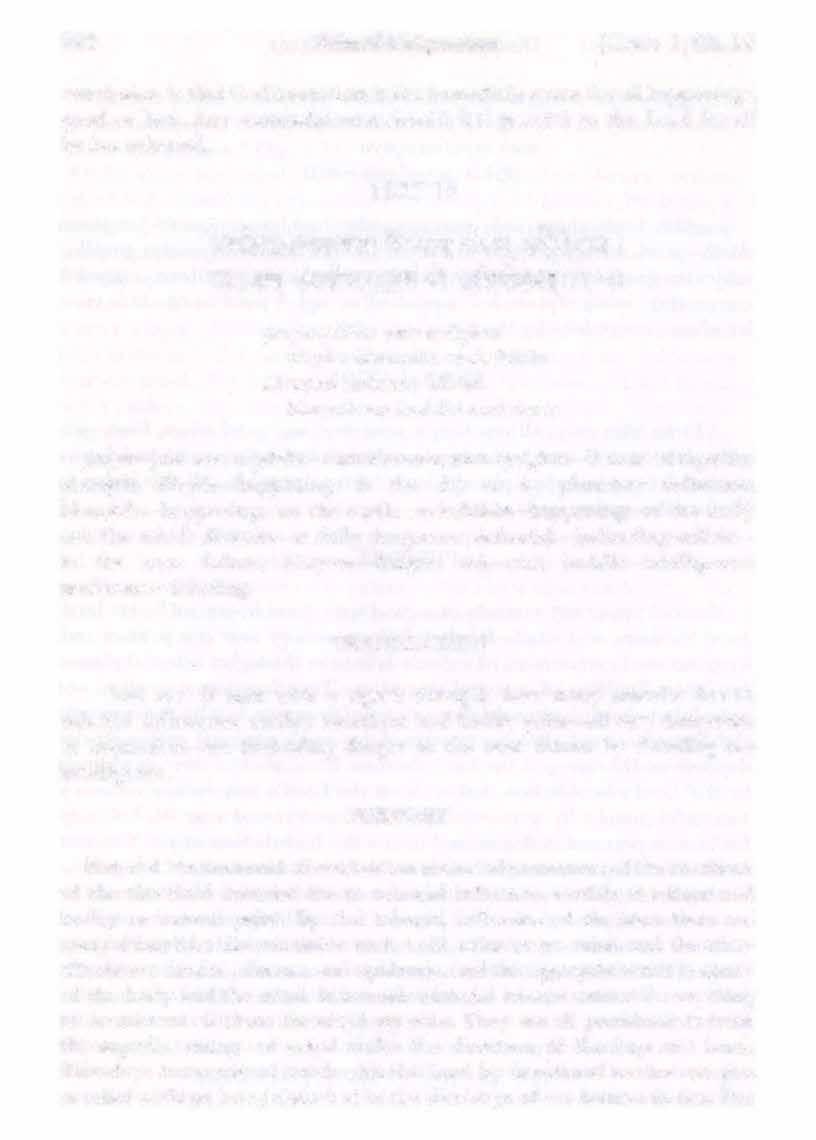
qW\�Idi'I(QOIIWfd\oql't�l'l('l�f(4il't
pasyotpiitan nara-vyaghra
divyan bhaumiin sa-daihikan
daruflan sarhsato 'diirad
bhayarh no buddhi-mohanam
pasya-just see; utpatiin-disturhances; nara-vyiighra-0 man of tigerlike strength; divyan-happenings in the sky or by planetary influence; bhauman-happenings on the earth; sa-daihikan-happenings of the body and the mind; daruf1an- awfully dangerous; .Sarhsata�-indicating; adiiratin the near future; bhayam-danger; na�-our; buddhi-intelligence; mohanam-deluding.
TRANSLATION
Just see, 0 man with a tiger's strength, how many miseries due to celestial influences, earthly reactions and bodily pains-all very dangerous in themselves-are forboding danger in the near future by deluding our intelligence.
PURPORT
Materialadvancement of civilizationmeans advancementof the reactions of the threefold miseries due to celestial influence, earthly reactions and bodily or mental pains. By the celestial influence of the stars there are many calamities like excessive heat, cold, rains or no rains, and the aftereffects are famine, disease, and epidemic, and the aggregate result is agony of the body and the mind. Man-made material science cannot do anything to counteract all these threefold miseries. They are all punishments from the superior energy of maya under the direction of the Supreme Lord. Therefore our constant touch with the Lord by devotional service can give us relief without being disturbed in the discharge ofour human duties. The
740 Srimad-Bhigavatam [Canto 1, Ch. 14
I ���ms�I"A4;if!f''l'illwt(II� oII
asuras, however, do not believe in the existence of God, and they make their ownplans tocounteract all thesethreefold miseries, andso theymeet with failures every time.The Bhagavad-gitii clearlystates that thereaction of material energy is nevertobeconqueredbecauseof the binding effects of the three modes. They can simply beovercome byone who surrenders fully indevotionunderthelotus feet ofthe Lord.(Bg. 7.14)
TEXT 11

�f?4'11cql 'IV \:$(�f �: i-1: I
cq�wufil �311<1\I�MtPffil�(II��II
uro-ak�i-biihavo mahyam sphuranty anga punaJ:i. punaJ:i. vepathus ciipi hrdaye iiriid diisyanti vipriyam
urn-thighs; ak§i-eyes; biihava�- the arms; mahyam-in my; sphurantiquivering; ahga-left side of the body; puna� puna�-again and again; vepathu�-palpitations; ca-also ; api-certainly; hrdaye-inthe heart; iiriitdue to fearfulness;diisyanti-indicating; vipriyam- undesirables.
TRANSLATION
The left side of my body, my thighs, arms and eyes are all quivering again and again. I am11aving heart palpitations due to fear. All this indicates undesirable happenings.
PURPORT
Material existence is full of undesirables. Things we do not want are forced upon us by some superior energy, and we do not see that these undesirables are under the grip of the three modes of material nature. When a man's eyes, arms and thighs all quiver constantly,one mustknow that somethingis going to happen whichisundesirable.These undesirables are compared with firein a forest.No one goesintheforestto set fire, but fire automatically takes place in the forest, creating inconceivable calami· ties for the living beings of the forest.Such fire cannot beextinguished by any human efforts. The firecanonlybe extinguished bythemercy.of the Lord, who sends clouds topourwateronthe forest. Similarly, undesirable
Text ll) Disappearance of Lord K{�qa 741
happenings jn life cannot be checked by any number of plans. Such miseries canbe removedonly by the mercy of the Lord,who sends His bona fide representatives to erilighten human beings and thus save them from all calamities.
TEXT 12
ftl�.fiq;Qq(�ff4ilflr�fi4"k�l'1'11 I
llliiW . (1l(il���II��II
siva�odyantam iidityam abhirauty analiinanii miim anga siirameyo 'yam abhirebhaty abhiruvat
siva-jackal; e§li-this; udyantam-rising; adityam-unto the sun; abhitowards; rauti-crying; anala-fire; anana-face; mam-unto me; ahga-0 Bhima; sarameya[t- dog; ayam-this ; abhirebhati- barking; abhiruvatwithout fear.

TRANSLATION
Just see, 0 Bhima, how the she-jackel cries at the rising sun and vomits fire and how the dog barks at me fearlessly.

PURPORT
These are some bad omens indicating something undesirable in the near future.
TEXT 13

fill:��'It���1m: 1
ii1Uif � � '4'4 II��II
sastii[t kurvanti miim savyam
dak�irwm pasavo 'pare
viihiims ca puru�-vyiighra
lak�ye rudato mama
742 Srimad-Bhagavatam [Canto 1, Ch. 14
sasta[t-useful animals like the cow; kuroanti-are keeping; miim-me; savyam-on the- left; dak�irwm-circumambulating; pasava[t apare-other lower animals like asses;- vahan-the horses (carriers); ca_:also; puru�avyaghra-0 tiger among men; lak�aye-are seen; rudata[t-weeping; mamaof mine.


TRANSLATION
0 Bhimasena, tiger amongst men, nolf useful animals like cows are passing me on my left side, and lower animals like the asses are circumambulating me. My horses appear to weep upon seeing me.
TEXT 14

�:'fi11RnS4fF!•: cp:q:q(l('W(: I
Skttfiii tlt�A� � u.�fil�: 11�\lll
mrtyu-duta[t kapoto yam uluka[t kampayan mana[t pratyulukas ca kuhviinair viSvam vai sunyam icchata[t
mrtyu-death; diita[t-messenger of; kapota[t-pigeon; ayam-this; uluka[t-owl; - kampayan-trembling; mana[t-mind; pratyuluka[t-the rivals of owls (crows); ca-and; kuhviinai[t-shrieking scream; viSvamthe cosmos; vai-either; siinyam-void; icchata[t-wishing.
TRANSLATION
Just see! This pigeon is like a messenger of death. The shrieks of the owls and their rival crows make my heart tremble. It appears that they want to make a void of the whole universe.
TEXT 15
Text 15] Disappearance of Lord Kr!!f!.a 743
'{Ill�:�:�lfoe(1&f¥r: r f.N�'l(ftaldeFt � N<:�rlr:ll��II
dhumra diSa� paridhaya� kampate bhu� sahadribhi�

nirghatas ca mahams tiita sakam ca stanayitnubh�
dhumrn[t- smoky; diSa[t-all directions; paridhaya[l,-encirclement; kampate-throbbing; bhu[t- the earth; saha adribhi[t-along with the hills and mountains; nirghata�- bolt from the blue; ca-also; mahan-very great; tata-that; sakam-lightning; ca-also; stanayitnubhi[t- thundering soundwithoutanycloud.
TRANSLATION
Just see how the smoke encircles the sky. It appears that the earth and mountains are throbbing. Just hear the cioudless thunder and see the bolts from the blue.
TEXT 16
3lfl1t
vayur vati khara-sparso
rajasa visrjams tama�
asrg var�anti jalada
bibhatsam iva sarvata�
vayu[t-wind; vati-blowing; khara-sparsa�-sharply; rq,jasa- bythedust; vis.rjan-creating; tama[l,-darkness;asrk-blood; var§anti-is raining; jalada[l. -thecloud;bibhatsam-disastrous;iva-like;sarvata[t-everywhere.
TRANSLATION
The wind blows violently, blasting dust everywhere and creating darkness. Clouds are raining everywhere with bloody disasters.
TEXT 17

744
Srimad-Bhagavatam
[Canto 1, Ch. 14
Aq::sf{6¥U
*U9;'!tikl (CIWI� �
I
� � •fht€ijflH �: II��II "'
suryam hata-prabham pasya graha-mardam mitho divi sasamkulair bhuta-ga!J.air jvalite iva rodasi
siiryam-the sun; hata-prabham-its rays declining; pasya-just see; graha-mardam-clashes of the stars;mithab--among one another;divi-in the sky; sasamkulaib--being mixed with; bhiita-ga!J.aib--by the living entities;jvalite-being ignited;iva-as if;rodasi-crying.
TRANSLATION
The rays of the sun are declining,andthestarsappeartohefighting amongst themselves. Confused living entities appear to be ablaze and weeping.
TEXT 18

nadyo nadiiS ca k�ubhitabsaromsi ca manamsi ca na jvalaty agnir ajyena kalo 'yam kim vidhasyati
nadya�-rivers;nadii� ca-and the tributaries;k§ubhitii�-all perturbed; sariimsi-reservoirs of water; ca-and; maniimsi-the mind; ca-also;nadoes not;jvalati-ignite;agni[l-fire;iijyena-with the help of butter;kiila[l -the time; ayam-extraordinary it is; kim-what; vidhiisyati-going to happen.
TRANSLATION
Rivers, tributaries, ponds, reservoirs and the mind are all perturbed. Butter nolongerignitesfire.What is thisextraordinarytime?Whatisgoing tohappen?
TEXT
Text 19) Disappearanceof LordKr!!Qa
745
WIii'4#qftl(�;w�{$�II��II
W(Q)��:����I
�'lffiWIfW44't¥11�II��II
19 WI���WI�"f�:I
Srimad-Bhigavatam
na pibanti stanam vatsii na duhyanti ca miitarafl. rudanty asru-mukhii giivo na hr�yanty �abhii vraje
na-does not; pibanti-suck; stanam-breast; vatsiifl-the calf; na-does not;duhyanti-allow milking;ca-also;miitarafl-the cow; rudanti-crying; asru-mukhiifl-with a fearful face;gavafl-the cow; na-does not;h,r§yantitake pleasure; nabhiifl-the bull;vraje-in the pasturing ground.
TRANSLATION
The calves do not suck the teats of the cows, nor do the cows give milk. They are standing, crying, tears in their eyes, and the bulls take no pleasure in the pasturing grounds.
TEXT 20

nf�M(I��I:�((4i44MWI: ll�oll
daivatiini rudantiva svidyanti hy uccalanti ca ime jana-padii griimiifl purodyiiniikariisramiifl. bhr�ta-sriyo niriinandiifl. kim agham dar5ayanti nafl.
daivatiini-the Deities in the temples; rudanti-seem to be crying;iva -like that; svidyanti-lamenting; hi-certainly ;uccalanti-as if going out; ca-also; ime-this;jana-padiifl.-city;griimiifl-villages;pura-towns;udyiina -gardens; iikara-mines; iisramiifl-hermitages, etc.; bhra§ta-devoid of; sriyafl.-beauties; niriinandiifl-bereft of all happiness; kim-what sort of; agham-calamities; darsayanti-shall manifest; nafl-to us.
TRANSLATION
The Deities seem to be crying in the temple,lamenting and perspiring. They seem about to leave. All the cities, villages., towns, gardens, mines
746
[Canto 1, Ch. 14
� Gt�q�l Jmn: ,;(\QI�IEMI'l1111: I
��HUM �ct �Mt u-.eP<t l'f I
and hermitages are now devoid of beauty and bereft of all happiness. I do not know what sort of calamities are now awaiting us.
TEXT 21
� �it�M.twi·
31wtril�'l'mitfwtl
�: 11t: I 4((6�41111II��II
manya etair mahotpii.tair nunam bhagavatafl padaifl ananya-puru�a-sribhirhinii bhur hata-saubhagii
manye-you may take it for granted; etaifl-by all these; maha-great; utpiitaifl-upsurges ; niinam-for want of; bhaw�vatafl-of the Personality of Godhead; padaifl-the marks on the sole of the foot; ananya- extraordinary; puru�a-of the Supreme Personality; sribhifl-by the auspicious signs; hinii-dispossessed; bhii�-the earth; hata-saubhagii-without the fortune.
TRANSLATION
I think that all these earthly disturbances preclude some greater loss to the good fortune of the world. The world was fortunate to have been marked with the footprints of the lotus feet of the Lord. These signs indicate that this will no longer be.
TEXT 22

� M�46(ij� llliR!Wf � I
U\f:SWUtl&ii{iR1iJ�:'liftqQf:����II
iti cintayatas tasya dr�fiir4fena cetasii riijiial;l pratyiigamad brahman yadu-puryiil;l kapi-dhvajal;l
iti-thus; cintayata�-while thinking to himself; tasya-of him; dntiiby observing; ar4tena-bad omens; cetasii-by the mind; riipia[l-of the king; prati-back; iigamat-came ; brahman-0 briihmap.as; yadu-puryii�from the kingdom of the Yadus; kapi-dhvaja�-Arjuna_
Text 22) Disappearance of Lord Kr!!f!a 747
TRANSLATION
0 BrihmC!!la Saunaka, while Maharaja Yu�hira, observing the inauspicious signs on the earth at that time, wasthus thinking tohimself, Arjunacame back from thecity of the Yados [Dvaraka].

TEXT 23
� ql(�)f.\qRtail���1
3fitlil(wtil���;dwt�wtl��: ����II
tam piidayor nipatitam
ayatha-purvam aturam
adhovadanam abbindun
srjantam nayaniibjayofl
tam-him (Arjuna); piidayofl-at the feet; nipatitam-bowing down; ayathii-piirvam-unprecedented; iitumm-dejected; adhovadanam-downward face;abbindun-drops of water;s.rjantam-creating; nayana-abjayo[lfrom the lotuslike eyes.

TRANSLATION
When he bowed at his feet, the King saw that his dejection was unprecedented. His head was down, and tears glided from hislotus eyes.
TEXT 24

fccJ1¥tlf9\\lii;(til R�u•�t�sl!i -r�: 1
� � �('11(\Ra(11�\lll
vilokyodvigna-hfdayo
vicchayam anujam nrpafl
prcchati sma suhrn madhye
samsmaran namderitam
vilokya-by seeing; uduigna-anxious; hrdaya[l-heart; vicchayam-pale appearance;anujam-Arjuna;nrpafi.-the King;prcchati-asked;sma-in the past; suhrt-friends; madhye-amongst;samsmamn-remembering; '!iirada
-Sage Narada;iritam-indicated by.

748
[Canto I, Ch. 14
Srimad-Bhagavatam
TRANSLATION
Seeing Arjuna pale due to heartfelt anxieties, the King, remembering the indications of the sage Narada, questioned him in the midst of friends.
TEXT 25 �:s�
;r: �;n: t\(Cf'lk1�I ����II
yudh�thira uvaca kaccid anartapuryam nafi, sva-janafi, sukham asate madhu-bhoja-daiarharhasatvatandhaka-vr�rzayafi,

yudhi�thira� uvaca- Yudhi�thira said; kaccit- whether ; anartapuryamof Dviiraka; na[l-our; sva-jana[l-relatives; sukham-happily; asate-are passing their days; madhu-Madhu; bhoja-Bhoja; dasarha-Dasarha; arha -Arha; satvata-Satvata; andhaka-Andhaka; V[§r.wya[l-of the family of Vp,?J].i.

TRANSLATION
Maharaja Yudhi��hira said: My dear brother, please tell me whether our friends and relatives, such as Madhu, Bhoja, Dasarha, Arha, Satvata, Andhaka and the members of the Yadu family, are all passing their days in happiness.
TEXT 26


�¥1R11¥t�:.�«.q@ll���:I
�:�:Efi�1�CAIIwt��fil:11�,11
suro miitiimaha"{l kaccit
svasty aste ootha ma�a"{l miitula"{l sanuja"{l kaccit
kusaly anaka-dundubhi"{l
Text 26] Disappearance of Lord Kr�a 749
-
siimfl-Surasena; m1Wimaha[l-maternal grandfather; kaccit-whether; svasti-all good;aste-passing his days; va-or; atha-therefore; ma�a[lrespectful;matula[l-maternaluncle;sa-anuja{l-withhisyoungerbrothers; kaccit-whether;kusali-allwell;anaka-dundubhi[l- Vasudeva.
TRANSLATION
Ismyrespectable grandfatherSiirasena in ahappymood?And aremy maternaluncleand his youngerbrothers all doingwell?
TEXT 27

{QI(<I«I&k4Hl��:«�l€+11:1t:I
311d�:��t7hlfl(cU:�11�\911
sapta sva-siiras tat-patnyo miituliinya{l sahiitmajii[l iiste sasnu§ii[l k§emam devaki-pramukhii{l svayam
sapta-seven;sva-sara[l-own sisters; tat-patnya[l-his wives;miituliinya[l -maternal aunts;saha-along with;iitmajii{l-sons andgrandsons; asateareall;sasnu§a{l-withtheirdaughters-in-law;k§emam-happiness;devakiDevaki;pramukha[l-headedby;svayam-personally.
TRANSLATION
His seven wives, headed by Devaki, are all sisters.Aretheyandtheir sonsanddaughters-in-law all happy?
TEXTS 28-29
kaccid riijii "huko jlvaty asat-putro 'sya ciinuja{l hrdika{l sasuto 'kruro
jayanta-gada-sara!la{l
750 Srimad-Bhigavatam [Canto 1, Ch. 14
"������lH�e�:;(l��iiJ:I �: �� il1qr(141(«1(UU:II�Gll � - id'� � �3�(1�q: I �N(I�wcimi't�ei<:�Hdq:������
Disappearance of Lord Kf�q.a
asate kusalam kaccidye ca satrujid iidaya"fl kaccid iiste sukharh riimo bhagaviin siitvatiirhprabhu['

kaccit-whether; riijii-the King; iihuka"f!.-another name of Ugrasena; jivati-stillliving;asat-mischievous;putra"fl-son;asya-his;ca-also;anujafl -younger brother; hrdika"fl-Hrdika; sa-sutafl-along with sons such as; akrii.ra"fl-Akrura; jayanta-J ayanta; gada-Gada; siirallii"fl-Sarapa; iisate� are they ,all; kusalam-in happiness; kaccit-whether; ye-they;ca-.also; 5atrujit-Satrujit; iidayafl-headed by; kaccit-whether; iiste-are they; sukham-all right; riima"f!.-Balarama; bhagaviin-the Personality of Godhead;siitvatiim-of the devotees;prabhu"f!.-protector.
TRANSLATION
Ugrasena's sons, Kamsa and his younger brother Devaka, are still living. Is Ugrasena happy? Are Hrdika and sons, Krtavarma, Akriira, Jayanta, Gada, Sirapa and Satrujit, all happy? How is Balarama, the Personality of Godhead and the protector of devotees?
PURPORT
Hastinapura, the capital of the Pa!l�avas, was situated somewhere near present New Delhi, and the kingdom of Ugrasena was situated in Mathura. While returning to Delhi from Dvaraka, Arjuna must have visited the city of Mathura, and therefore the inquiry about the King of Mathura is valid. Amongst various names of the relatives, the name of Rama or Balarama, eldest brother of Lor·d Kr�!la, is added with the word Personality of Godhead because Lord Balarama is the immediate expansion of Vi�rutattva as prakiisa-vigraha of Lord Kr�pa. The Supreme Lord, although one without a second,expands Himself as manyother Jiving beings. The Vi�rutattvalivingbeings are expansions ofthe SupremeLord,and all ofthem are qualitatively and quantitatively equal with the Lord. But expansions of thejiva-sakti,the category of the ordinary living beings,are not at all equal with the Lord. One who considers the jiva-sakti and the Vi�ru-tattva to be on an equal level is considered a condemned soul of the world. Sri Rama or Balarama is the protector of the devotees of the Lord. Baladeva acts as the spiritual master of all devotees, and by His causeless mercy the fallen souls are delivered. Sri Baladeva appeared as Sri Nityananda Prabhu during the advent of Lord Caitanya, and the great Lord Nityananda Prabhu exhibited His causeless mercy by delivering a pair of extremely fallen
Texts
28-29]
751
souls, namely Jagai and Madhai. Therefore it is particularly mentioned herein that Balarama is the protector of the devotees of the Lord. By His divine grace only one can approach the Supreme Lord Sri K�tta, and thus Sri Balarama is the mercy incarnation of the Lord, manifested as the spiritual master, the savior of the pure devotees.
TEXT 30
�: �¥Ufhd ij(ctltl� �: I
'fRI�sf.lw) � ¥t4(q(�ij ll�oll
pradyumna"f!. saroa-vmtiniim sukham iiste mahii-ratha"f!.
gambhira-rayo 'niruddho vardhate bhagaviin uta
pradyumna"f!.-Pradyumna (a son of Lord Kn>Qa); sarva-all; Vf§pin.iimof the members ofthe Vr�qi family; sukham- happiness;aste-are in; maharatha"f!.-the great general; gambhira-deeply; raya"f!.-dexterity; aniruddha"f!.
-Aniruddha (another grandson of Lord Kr�I)a); vardhate-flourishing; bhagaviin-the Personality of Godhead; uta-must.


TRANSLATION
How is Pradyumna, the great general of the Vr�!li family? Is He happy? And is Aniruddha, the plenary expansion of the Personality of Godhead, faring well?
PURPORT
Pradyumna and Aniruddha are also expansions of the Personality of Godhead, and thus They are also Vi§rtu-tattva.. At Dvaraka Lord Vasudeva is engaged in His transcendental pastimes along with His plenary expansions, namely Sailkar�atta, Pradyumna and Aniruddha, and therefore each and every one of Them can be addressed as the Personality of Godhead, as it is mentioned in connection with the name Aniruddha.
TEXT 31

752 Srimad-Bhagavatam [Canto 1, Ch. 14
ti1UIJICI�III � iiiiM14<i\WJ: I � � f'uOcq((: � '4l't¥tl(�: ������
Disapearance of Lord Kr�r;�a
su�ertas carude�rtas ca siimbo jiimbavat"i-sutal;l. anye ca kar�rti-pravaral;l. sa-putra �abhadayal;l.
su�ertal;l.-Su�epa; ciirude§ rtal;l.-Carude�pa; ca-and; siimba[t -Siimba; jiimbavati-sutal;l.-the son of Jamhavati; anye-other�; · ca-also; kiir§rti-the sons of Lord J<r�l).a; pravarii[t-all chieftains; sa-putrii[t- along with their sons; !§abha- �abha; iidayal;l.-etc.

TRANSLATION
Are all the chieftain sons of Lord Kr�!la, such as Su�pa, Carude�!la, Samba the son of Jambavati, �bha and all others, along with their sons, all doing well?
PURPORT
As already mentioned, Lord J<r�pa had married 16,108 wives, and each of them had ten sons. Therefore 16,108 x lO = 161,080 sons. They all grew up, and each of them had as many sons as their father, and the whole aggregate was something near 1,610,800 family members of the Lord. The Lord is the father of all living beings, who are countless in number; therefore only a few of them are called to associate with the Lord in His transcendental pastimes as the Lord of Dvaraka on this earth. It is not astonishing if the Lord maintained a visible family consisting of so many members. It is better to refrain from comparing the Lord's position with ours, and it becomes a simple truth as soon as we understand at least a partial calculation of the Lord's transcendental position. King Yudhi�thira, while inquiring about the Lord's sons and grandsons at Dvaraka, mentioned only the chieftains amongst them, otherwise it was impossible for him to remember all the names of the Lord's family members.
Texts 32-33]
753
TEXTS 32-33 Ml�"4(1: �: ¥!d�it(41(q:I tj'i;:((�;:((ijlqu�ult�Qlf:idwt'la:II��II 3lfit ��qma«l�: 1 3Ift� •��'14u;t il'i«i((a:������
Srimad-Bhagavatam
tathaiviinucara� saure�
srutadevoddhaviidaya�
sunanda-nanda-Sir�a!'ya
ye canye satvatar�abha�
api svasty asate sarve
rama-k�!Ja-bhujasraya�
api smaranti kusalam
asmakam baddha-sauhrda�
tathii eva-similarly; anucara{l-constant companions; 5aure�-of Lord Sri Kr�IJa such as; srutadeva-Srutadeva; uddhava-iidaya�- Uddhava and others; sunanda-Sunanda; nanda-Nanda; sir�arya�-other leaders; yeall of them; ca-and; anye-others; satvata-liberated souls;nabhii[l.-the best men; api-if;svasti-doing well; asate-are; sarve-all of them;ramaBalarama; kr��a- Lord Kr�IJa; bhujasraya[l.-under the protection of; apiif also; smaranti-do remember; kusalam-welfare; asmakam-about ourselves;baddha-sauhrda[l.-bound by eternal friendship.

TRANSLATION
Also, are Uddhava and others, Nanda, Sunand.a and other leaders of liberated souls who are constant companions of the Lord, who are protected by Lord Balarama and Kr¥.1a, all doing well in their respective functions? Do they, who are all eternally bound in friendship with us, remember our welfare?
PURPORT
The constant companions of Lord Kr�!J.a, such as Uddhava, etc., are all liberated souls, and they had descended along with Lord Kr�pa on this material world to fulfill the mission of the Lord. The Pap�avas are also liberated souls who descended along with Lord Kr�pa to serve Him in His transcendental pastimes on this earth. As stated in the Bhagavad-gita (Bg. 4.5), the Lord and His eternal associates, who are also liberated souls like the Lord, come down on this earth at certain intervals. The Lord remembers them all, but His associates, although liberated souls, forget due to their being tatasthii-sakti, or marginal potency of the Lord. That is the difference between the Vi§ru-tattva and jiva-tattvas. The jiva-tattvas are infinitesimal potential particles of the Lord, and therefore they require the protection of the Lord at all times. And to the eternal servitors of the Lord, the Lord is pleased to give all protection at all times. The liberated souls never, therefore, think themselves as free as the Lord or as powerful
754
[Canto I, Ch. 14
as the Lord, but they always seek the protection-of the Lord in all circumstances, both in the material world and in the spiritual world. This dependence of the liberated soul is constitutional, just as sparks of a fire can exhibit the glow of fire along with the fire and not independently. Independently the glow of the sparks is extinguished, although the quality of fire or the glowing is there. Thus those who give up the protection of the Lord and become so-called lords themselves, out of spiritual ignorance, come back again to this material world, even after prolonged tapasya of the severest type. That is the verdict of all Vedic literature.
TEXT 34
�AN tftf� � ¥1iM«t<?S: I
bhagaviin api govindo brahmartyo bhakta-vatsala� kaccit pure sudharmiiyiim sukham iiste suhrd-vrta�

bhagaviin-the Personality of Godhead, Kr�t:J.a; api-also;govinda[l- one who enlivens the cows and the senses; brahmaczya[l-devoted to the devotees or the briihmaczas; bhakta-vatsala[l-affectionate to the devotees; kaccit-whether; pure-in Dvaraka Puri; sudharmiiyiim-pious assembly; sukham- happiness;iiste-does enjoy; suhrt-vrta[l-surrounded by friends.
TRANSLATION
Is Lord .Kf�pa, the Supreme Personality of Godhead, who gives pleasure to the cows, senses and the brahmapas, who is very affectionate towards His devotees, enjoying the pious assembly at Dvaraka Puri surrounded by friends?
PURPORT
Here in this particular verse the Lordis describedas Bhagaviin, Govinda, Brahmaczya and Bhaktavatsala. He is Bhagaviin svayam, or the original Supreme Personality of Godhead full with all opulences, all power, all knowledge, all beauty, all fame and all renunciation. No one is equal to or greater than Him. He is Govinda because He is the pleasure of the cows and the senses. Those who have purified their senses by devotional service of the Lord can render unto Him real service and thereby derive transcen-
Text 34] Disappearanceof Lord Kt�t11a 755
'���"( � ij(CI+U� ti(ftij: 11�\lll
dental pleasure out of such purified senses. Only the impure conditioned living being cannot derive any pleasure from the senses, but being illusioned by false pleasures of the senses, he becomes servant of the senses. Therefore, we need His protection for our own interest. The Lord is the protector of cows and the brahminical culture. A society which is devoid of cow protection and brahminical culture is not under the direct protection of the Lord, just as the prisoners in the jails are not under the protection of the king but under the protection of a severe agent of the king. Without cow protection and cultivation of the brahminical qualities in human society, at least for a section of members of the society, no human civilization can prosper at any length. By brahminical culture or by developing the dormant qualities of goodness, namely truthfulness, equanimity, sense control, forbearance, simplicity, general knowledge, transcendental knowledge, and firm faith in the Vedic wisdom, one can become a briihmara and thus see the Lord as He is. And after surpassing the brahminical perfection, one has to become a devotee of the Lord so that His loving affection in the form of proprietor, master, friend, son and lover can be transcendentally achieved. The stage of a devotee, which attracts the transcendental affection of the Lord, does not develop unless one has developed the qualities of a briihmara as above mentioned. The Lord is inclined to a briihmara of quality and not of false prestige. Those who are less than a briihmara by qualification cannotestablish any relation with the Lord, just as fire cannot be kindled from the raw earth unless there is wood, although there is a relation between wood and the earth. Since the Lord is all-perfect in Himself, there could not be any question of His welfare, and Maharaja Yudhi�thira refrained from asking this question. He simply inquired about His residential place, Dvaraka Puri, where pious men assemble. The Lord stays only where pious men assemble and takes pleasure in their glorifying the Supreme Truth. Maharaja Yudhi�thira was anxious to know about the pious men and their pious acts in the city of Dvaraka.

TEXTS 35-36

756 Srimad-Bhagavatam [Canto 1, Ch. 14
Disappearance of Lord Kr�Qll
mangaliija ca lo kiiniim k�emiiya ca bhaviiya ca iiste yadu-kuliimbhodhiiv iidyo 'nanta-sakhafl pumiin yad biihu-da"(l�a-guptiiyiim sva-puryiim yadavo 'rcitiifl ki4fanti paramiinandam mahii-pauru�ika iva

mangaliiya-for all good;ca- also;lokiiniim- of all the planets; k�emiiyafor protection; ca-and; bhaviiya -for elevation; ca-also; iiste-is there; yadu-kula-ambhodhau-in the ocean of the Yadu dynasty; adyafl - the original; ananta.-sakhafl-in the company of Ananta (Balarama); pumiinthe supreme enjoyer; yat-whose; biihu-da"(l�a guptiiyiim- being protected by His arms; sva-puryiim-in His own city; yadavafl-the members of the Yadu family; arcitiifl-as they deserve; ki4fanti-are relishing; paramiinandam-transcendental pleasure; mahii-pauru�ikafl-the residents of the SP.iritual sky;iva-like_
TRANSLATION
The original Personality of Godhead, the enjoyer, and Balarama, the primeval Lord Ananta, are staying in the ocean of the Yadu dynasty for the welfare, protection and general progress of the entire universe. And the members of the Yadu dynasty, being protected by the arms of the Lord, are enjoying life like the residents of the spiritual sky.
PURPORT
As we have discussed many times, the Personality of Godhead V�!lu resides within each and every universe in two capacities, namely as the Garbhodakasayi Vi�!lu and the �irodakasayi Vi�!lu. The �irodakasayi Vi�pu has His own planet on the northern top of the universe, and there is a great ocean of milk where the Lord resides on the bed of the Ananta incarnation of Baladeva. Thus Maharaja Yudhi�thira has compared the Yadu dynasty to the ocean of milk and Sri Balarama to the Ananta where Lord �!la resides. He has comparedthe citizensof Dviirakatotheliberated inhabitants of the Vaiku!lthalokas. Beyond the material sky, further than we can see with our eyes and beyond the sevenfold coverings of the universe, there is the Causal Ocean in which all the universes are floating like footballs, and beyond the Causal Ocean there is an unlimited span of
Texts 35-36 J
757
spiritual sky generally known as the effulgence of Brahman. Within this effulgence there are innumerable spiritual planets, and they are known as the Vaiku!ltha planets. Each and every Vaiku!ltha planet is many, many times bigger than the biggest universe within the material world, and in each of them there are innumerable prototypes of V�!lu inhabitants who look exactly like Lord V�!lu. These inhabitants are known as the Mahapauru�ikas, or persons directly engaged in the service of the Lord. They are happy in those planets and are without any kind of misery, and they liveperpetually in full youthfulness, enjoying life in full bliss and knowledge without fear of birth, death, old age or disease, and without the influence of kiila, eternal time. Maharaja Yu�thira has compared the inhabitants of Dvaraka to the Mahapauru�ikas of Vaiku!lthaloka because they are so happy with the Lord. In the Bhagavad-gitii there are many references to the Vaiku!lthalokas, and they are mentioned there as Mad-dhiima, or the kingdom of the Lord.
yat-pada-susrii�a!!a-mukhya-karma!!a satyadayo dvy�fa-sahasra-yo�ita� nirjitya sankhye tridasams tad-ii.s4o haranti vajriiyudha-vallabhocitii�

yat-whose; piida-feet; susriL§apa-administration of comforts; mukhya -the most important; karmaczii-by the acts of; satyii-iidayalt-queens headed by Satyabhama; dvya�Ja-twice eight; sahasra-thousand; yo�ita�the fair sex; nirjitya-by subduing; sankhye-in the battle; tridaian-of the denizens of heaven; tat-iis4a�-what is enjoyed by the demigods; harantido take away; vajra-iiyudha-vallabha-the wives of the personality who controls the thunderbolt; ucitii�-deser ving.
TRANSLATION
The queens at Dvaraka, headed by Satyabhama, simply by administering comforts at the lotus feet of the Lord, which is the most important of
758 Srimad-Bh�avatam [Canto 1, Ch. 14
TEXT 37 ��{�Oifl\.Olldun (1(411{� lNtG«ll�Aa: 1 fit��mf5il{ijf(d((r�il � �:11��1
all services, induced the Lord to conquer the demigods. Thus the queens enjoy things which are prerogatives of the wives of the controller of thunderbolts.
PURPORT

Satyabhiimii: One of the principal queens of Lord Sri K�!la at Dvaraka. After killing Narakasura, Lord �!la visited the palace of Narakasura accompaniedby Satyabhama. He went to Indraloka also with Satyabhiimii, andshe was received by Sacidevi, who introduced her to the mother of the demigods, Aditi. Aditi was very much pleased with Satyabliama, and she benedicted her with the blessings of permanent youth as long as Lord Kr�!la remained on the earth. Aditi also took her with her to show her the special prerogatives of the demigods in the heavenlyplanets. When she saw the piirijiita flower, she desired to have it in her palace at Dvarakii. Afterthat,shecamebacktoDvaraka along with her husband and expressed her willingness to have the piirijiita flower at her palace. Satyabhiimii's palace was especially bedecked with valuable jewels, and even in the hottest season of summer the inside of the palace remained cool, as if air-conditioned. She decorated her palace with various flags, heralding the news of her great husband's presence there. Once, along with her husband, she met Draupadi, and she was anxious to be instructed by Draupadi in the ways and means of pleasing her husband. Draupadi was expert in this affair because she kept five husbands, the Pii!J.pavas, and all were very much pleased with her. On receipt of Draupadi's instructions, she was very much pleased and offered her good wishes and returned back to Dviiraka. She was the daughter of Satrujit. After the departure of Lord Kr�!J.a, when Arjuna visited Dvaraka, all the queens, including Satyabhama and Rukmipi, lamented for the Lord with great feelings. At the last stage of her life, she left for the forest to undergo severe penances.
Satyabhama instigated her husband to get the piirijata flower from the heavenly planets, and the Lord got it even by force from the demigods, as a common husband secures things to please his wife. As already explained, the Lord had very little to do with so many wives to carry out their orders like an ordinary man. But because the queens accepted the high quality of devotional service, namely administering the Lord all comforts, the Lord played the part of a faithful complete husband. No earthly creature can expect to have things from the heavenly kingdom, especially the parijiita flowers which are simply to be used by the demigods. But due to theirbecoming the Lord's faithful wives, all of them enjoyed the special
Text 37) Disappearance of Lord Kr�a 759
prerogatives of the great wives of the denizens of heaven. In other words, since the Lord is the proprietor of everything within His creation, it is not very astonishing for the queens of Dvaraka to have any rare thing from any part of the universe.
yad biihu-da{l{liibhyudayiinufivino yadu-pravirii hy akuto-bhayii muhu� adhikramanty anghribhir iihrtiim baliit sabhiim sudharmiim sura-sattamocitiim

yat-whose; biihu-dar.pa- arms ; abhyudaya-influenced by; anujivinaftalways living; yadu-the members of the Yadu dynasty; pravirii[l-great heroes; akuta[l-bhayii[l-fearless in every respect; muhu�-constantly; adhikramanti-traversing ; anghribhi[l-by foot; iihrtiim-hrought about; baliit-by force; sabhiim-assemhly house; sudharmam- Sudharma; surasattama-the best among the demigods; ucitiim-deserving.


TRANSLATION
The great heroes of the Yadu dynasty, being protected by the arms of Lord Sri Kr��a, always remain fearless in every respect. And therefore their feet trample over the Sudharma assembly house, which the best demigods deserved but which was taken away from them.
PURPORT
Those who are directly servitors of the Lord are not only protected by the Lord from all fearfulness, hut also enjoy the best of things, even if they are·forcibly accumulated. The Lord is equal in behavior to all living beings, hut He is partial to His pure devotees, being very affectionate toward them. The city of Dvaraka was flourishing, being enriched with
760 Srimad-Bhigavatam [Canto l, Ch. 14
Ui6lW Q: I
II�Gil
TEXT 38 ���··9;�ql3\if� �Tu
� t\(6'El&itM61'(
the best of things in the material world. The state assembly house is constructedaccording tothe dignity of the particular state. In the heavenly planet, the state assembly house called Sudharma was deserving of the dignity of the best of the demigods. Such an assembly house is never meant for any state on the globe because the human being on the earth is unable to construct it, however far a particular state may be materially advanced. But during the time of Lord Kr�!la's presence on the earth, the members of the Yadu family forcibly brought the celestial assembly house to earth and placed it at Dvaraka. They were able to use such force becausetheywerecertain of the indulgence and protection of the Supreme Lprd �!J.a. In other words, the Lord is provided with the best things in the universe by His puredevotees� Lord Kr�!la was provided with all kinds of comforts and facilities available within the universe by the members of the Yadu dynasty, and in return such servitors of the Lord were protected and fearless.
A forgetful conditioned soul is fearful. But a liberated soul is never fearful, just as a small child completely dependent on the mercy of his father is never fearful of anyone. Fearfulness is a sort of illusion for the living being when he is in slumber and forgetting his eternal relation with the Lord. Since the living being is never to die by his constitution, as statedinthe Bhagavad-gitii (Bg. 2.20), thenwhat is the cause of fearfulness? A person may be fearful of a tiger in dream, but another man who is awake by his side sees no tiger there. The tiger is a myth for both of them, namely the person dreaming and the person awake, because actually there is no tiger; but the man forgetful of his awakened life is fearful, whereas the man who has not forgotten his position is not at all fearful. Thus the members of Yadu dynasty were fully awake in their service of the Lord, and therefore there was no tiger for them to be afraid of at any time. Even if there were a real tiger, the Lord was there to protect them.
kaccit te 'niimayam tiita bhra�fa-tejii vibhiisi me alnbdha-mano 'vajiiiita[l, kim vii tiita ciro�ita[l,

Text 39) Disappearance of Lord .Kf��a 761
�� m �ifflfcuum11 1 st(JS�'4'lt;i\�:ft�m�<lfila: ������
TEXT 39
kaccit-whether;te-your;amimayam-health is all right;tiita-my dear brother; bhra�ta-bereft of; tejii[l-luster; vibhiisi-appear; me-to me; alabdha-miina[l-without respect;avajiiiita[l-neglected;kim-whether;viior;tiita-my dear brother;ciro§ita[l-because of long residence.
TRANSLATION
My brother Arjuna, please tell me whether your health is all right. You appear to have lost your bodily luster. Is this due to others disrespecting and neglecting you because of your long stay at Dvaraki?
PURPORT
From all angles of vision, the Maharaja inquired from Arjuna about the welfare of Dviraka, but he concluded at last that as long as Lord Sri Kf�pa Himself was there, nothing inauspicious could happen. But at the same time, Arjuna appeared to be bereft of his bodily luster, and thus he inquired of his personal welfare and asked so many vital questions.

TEXT 40 �flRq�:' if� � ����oll
kaccin nabhihato 'bhavai[l
Sa.bdadibhir amangalai[l
na dattam uktam arthibhya
asaya yat pratiSrutam
kaccit-whether;na-could not;abhihata[l-addresses by; abhavai[l-unfriendly;sabda-adibhil;l-by sounds;amangalail;l-inauspicious;na-did not; dattam-give in charity;uktam-is said;arthibhyal;l-unto one who asked; asaya-with hope;yat-what;pratiSrutam-promised to be paid.



TRANSLATION
Has someone addressed you with unfriendly words or threatened you? Could you not give charity to one who asked, or could you not keep your promise to someone?
762 Srimad-Bhigavatam (Canto I, Ch. 14
PURPORT
A k�triya or a rich man is sometimes visited by persons who are in need of money. When they are asked for a donation, it is the duty of the possessor of wealth to give in charity in consideration of the person, place and time. If a k�atriya or a rich man fails to comply with this obligation, he must be very sorry for this discrepancy. Similarly, one should not fail to keep his promise to give incharity. These discrepancies are sometimes causes of despondency, and thus failing, a person becomes subjected tocriticism, which might also be the cause of Arjuna's plight.
TEXT 41

�QIOf�qj
ti itf1lui� I
tQ(Ci(lqqti � wtl�lit: 1Q(UIS14.:: 11\l�ll
kaccit tvam brohma�Jam biilam giim VT;ddham rogi�Jam striyam 5ara�Jopasrtam sattvam niityiik�lfr. sara�Ja-prada�
kaccit-whether; tvam-yourself; brohma�Jam-the briihma�Jas; biilamthe child; giim-the cow; vrddham-old; rogizwm-the diseased; striyamthe woman; 8arana-upsrtam-having approached for protection; sattvamany living being; na-whether; atyiik§ifl-not given shelter; 8ampa-pradafi.deserving protection.
TRANSLATION
You are always the protector of the deserving living beings, such as brihm�, children, cows, women and the diseased. Could you not give them protection when they approached you for shelter?
PURPORT
The briihmaras, who are always engaged in researching knowledge for the society's welfare work, both materially and spiritually, deserve the protection of the king in all respects. Similarly, the children of the state, the cow, the diseased person, the woman and the old man specifically
Text 41) Disappearance of Lord Kr� 763
require the protection of the state or a k§atriya king. If such living beings do not get protection by the k§atriya, or the royal order, or by the state, it is certainly shameful for the k§atriya or the state. Maharaja Yu�thira was anxious to know about this discrepancy on the part of Arjuna, if such things had actually happened.

TEXT 42
�wntOO��iiil6€tidi�I
q(a�<n ifN ¥1iiil,ih,awtma: C�N 11\l�ll
kaccit tvam nagamo 'gamyam
gamyam vasat-krtam striyam
parojito vatha bhavan
nottamair nasamai� pathi
kaccit-whether; tvam-yourself; na-not; agama[l-did contact; agamyiim-impeachable; gamyiim-acceptable; vii-either; asat-krtiimimproperly treated; striyam-a woman; pariijita[l-defeated by; vii-either; atha-after all; bhaviin-your good self; na-not; uttamaift-by superior power; na-nor; asamaift-by equals; pathi-on the road.
TRANSLATION
Have you contacted a woman of impeachable character, or have you not properly treated a deserving woman? Or have you been defeated on the way by someone who is inferior or equal to you?
PURPORT
It appears from this verse that during the time of the Pap�avas free contact between man and woman was allowed in certain conditions only. The higher caste men, namely the briihmaras and k§atriyas, could accept a woman of the vai.Sya or the sudra community, but a man from the lower castes could not contact a woman of the higher caste. Even a k§atriya could not contact a woman ofthe briihmara caste. Thewife of a briihmara is considered one of the seven mothers (namely one's own ·mother, the wife of the spiritual master or teacher, the wife of a briihmara, the wife of a king, the cow, the nurse, and the earth). Such contact between man and woman was known as uttama and adhama Contact of a briihmara with a
764 Srimad-Bhigavatam (Canto 1, Ch. 14
k§atriya woman is uttama, but the contact of a k§atriya with a woman of a briihma[la is adhama and therefore condemned. A woman approaching a man for contact should never be refused, but at the same time the dis· cretion as above mentioned may also be considered. Bhima wasapproached by Hi!llmbi from a community lower than the sildras, and Yayati refused to marry the daughter of Sukracarya because of his being a briihma[la. Vyasadeva, a briihma[la, was called to beget Pap�u and Dhftara�tra. Satyavati belonged to a family of fishermen, but Para8ara, a great briihma[la, begot in her Vyasadeva. So there are so many examples of such contacts with woman, but in all cases the contacts were not abominable nor were the results of such contacts bad. Contact between man and woman is natural, but that also must be carried out under regulated principles so that social consecration may not be disturbed nor unwanted worthless population be increased for the unrest of the world.

It is abominable for a k§atriya to be defeated by one who is inferior in strength or equal in strength. If one is defeated at all, he should be defeated by some superior power. Arjuna was defeated by Bhi�madeva, and Lord Kr�l).a saved him from the danger. This was not insult for Arjuna because Bhi�madeva was far superior to Arjuna in all ways, namely age, respect and strength. But Karpa was eqtial to Arjuna, and therefore Arjuna was in crisis whenfighting with Karpa. It was felt by Arjuna, and therefore Karpa was killed even by crooked means. Such are the engagements of the k§atriyas, and Maharaja Yudhi�thira inquired from his brother whether anything undesirable happened on the way home from Dvarakii.
TEXT 43
31fif�?.���mt�l
ijgf<{tdd ftRcd)d�l'l �ll'd�ll
apisvit parya-bhunkthiis tvarh
sambhojyiin vrddha-biilakiin
jugupsitarh karma kincit
krtaviin na yad ak�amam
apisvit-if it were so that; parya-by leaving aside; bhunkthiifl.-have dined; tvam-yourself; sambhojyiin-deserving to dine together; v.rddhathe old men;. biilakiin-boys; jugupsitam-abominable; karma-action; kiiicit-something; krtaviin-you must have done;na-not;yat-that which; ak�amam-unpardonable.
Text 43) Disappearance of Lord Kr�11a 765
TRANSLATION
Have you not taken care of old men and boys who deserve to dine with you? Have you left them and taken your meals alone? Have you committed some unpardonable mistake which is considered to be abominable?
PURPORT
It is the duty of a householder to feed first of all the children and old members of the family, the briihmaetas and the invalids. Besides that, an ideal householderisrequiredto call for anyunknownhungryman to come and dine before he himself goes to take his meals. He is required to call for such a hungry man thrice on the road. The neglect of this prescribed duty of a householder, especially in the matter of the old men and children, is unpardonable.
TEXT 44

kaccit pre�fhatamenatha hrdayenatma-bandhuna
sunyo 'smi rahito nityam
manyase te'nyatha na ruk
kaccit-whether; p re�thatamena-unto the most dear one; atha-my brother Atjuna; hrdayena-most intimate; iitma-bandhuna-own friend Lord Kfl}l].a; sunya{l-void; asmi-I am; rahita{l-having lost; nityam- for all time; manyase-you think; te- your; anyathii-otherwise; na-never; rukmentaldistress.
TRANSLATION
Or is it that you are feeling empty all the time because you might have lost your most intimate friend Lord Kf�a? 0 my brother Arjuna, I can think of no other reason for you becoming so dejected.
PURPORT
All the inquisitiveness of Maharaja Yudhilzthira about the world situation was already conjectured by Maharaja Yudhilzthira on the basis of Lord �pa's disappearancefromthevision of theworld, andthis was now
766 Srimad-Bhagavatam [Canto 1, Ch. 14
� ��Jij�ir{l'l �m\'1"� I U"tlsf41oon��M�IWl�l\l\ll "
disclosed by him because of the acute dejection of Arjuna, which could not have been possible otherwise. So even though he was doubtful about it, he was obliged to inquire frankly frorn Arjuna on the basis of Sri Narada's indication.
Thus end the Bhaktivedanta purports to the First Canto, Fourteenth Chapter, of the Srimad-Bhagavatam, entitled "Disappearance of Lord K[§[la."

Text 44) Disappearance of Lord Kr�q.a 767
CHAPTER FIFTEEN
The Paoc;1avas RetireTimely TEXT I

�*I)UII(1(CI:���SSN*fi(i;qil: I Wllwtl\ltiW�
suta uvaca evam kmw-sakhafi, kmw bhriitrii riijiiii 'vikalpitafi, niinii-sankaspadam riipam k�rw-viSle§a-karsitafi,
siita[l uviica-Suta Gosvami said; evam-thus; 1q§1Ja-sahhafi,-the celebrated friend of Kr�I].a; knTJafi.-Arjuna; bhriitrii-by his elder brother; riijiia-King Yudhi�thira; iivikalpitafi, -speculated; niina-various; sankaiispadam-based on many doubts; riipam-forms; knTJa-Lord Sri Kr�I].a; viSle§a-feelings of separation; ka rsita{l-became greatly bereaved.
TRANSLATION
Suta Gosvami said: Arjuna, the celebrated friend of Lord Kr�J;ta, was griefstricken because of his strong feeling of separation from K�!la, over and above all Maharaja Yudhi�!hira's speculative inquiries.
PURPORT
Being too much aggrieved, Arjuna practically became choked up, and therefore it was not possible for him to reply properly to the various speculative inquiries of Maharaja Yu�thira.
·�
�
�W;,��ia: II � ll
769
TEXT 2

UIW.Id\G\wt(«1Uii11



Will: 1
ttili!41?J�«<Iiji\etftlli1Ad( It � It
sokena su�yadvadanahrt-sarojo hata-prabha�

vibhum tameviinusmaranniisaknot pratibhii�itum
sokena-due to bereavement; su�yat-vadana-drying up of the mouth; hrt-saroja�- lotuslike heart; hata-lost; prabha�-bodily luster; vibhumthe Supreme; tam-unto Lord Kr�l)a; eva-certainly ; anusmaran- thinking within; na-could not; asaknot-be able; pratibha§ itum- properly replying.
TRANSLATION
Due to grief, Arjuna's mouth and lotuslike heart had become dried up. Therefore his body lost all luster. Now, remembering the Supreme Lord, he could hardly utter a word in reply.
TEXT3


���:q'lfUiwtiS��: I �
f.'IJ!'iliSIUI�€\fiU(N'filtt(:
krcchreT)a samstabhya suca� piiT)inii ,mrjya netrayo� parok�eT)a samunnaddhapral)ayautkaT)thya-kiitara�
II � II
krcchrel)a-with great difficulty; samstabhya-by checking the force; suca�-of bereavement;pa!1ina-with his hands; am .rjya-smearing;netrayo� -the eyes; parok§ena-due to being out of sight; samunnaddha-increasingly; pra!'laya-autka!'lthya-eagerly thinking of the affection; katara�distressed.
770 Srimad-Bhagavatam [Canto I, Ch. 15
TRANSLATION
With great difficulty he checked the tears of grief that smeared his eyes. He was very distressed because Lord Kr�wasout of his sight, and he increasingly feltaffection for Him.
TEXT4 ���l'f��l


sakhyam maitrim sauhrdam ca siirathyiid�u samsmaran nrpam agrajam ity iiha bii�pa-gadgadayii giro
sakhyam-well- wishing; maitrim-benediction; sauhrdam-intimately related; ca-also; siirathi-iidi§u-in becoming the chariot driver; samsmaran -remembering all these; n.rpam-unto the King; agrajam-the eldest brother; iti-thus; iiha-said; bf¥pa-heavily breathing; gadgadayii-overwhelmingly; girii-by speeches.

TRANSLATION

Remembering Lord Kr�!la and His well wishes, benefactions, intimate familial relations and His chariot driving, Arjuna, overwhelmed and breathing very heavily, began to speak.
PURPORT
. The Su reme Living Being is perfect in all relations with His pure devotee. Arjuna is one of the typical pure devotees of the Lord reciprocating in the fraternal relationship, and the Lord's dealings with Arjuna are displays of friendship of the highest perfect order. He was not only a well-wisher of Arjuna, but also He was actually a benefactor, and to make it still more perfect the Lord tied him into a family relationship by arranging Subhadra's marriage with him. And above all, the Lord agreed to become a chariot driver of Arjuna in order to protect His friend from warfare risks, and the Lord became actually happy when He established
Text4) The P�avas Retire Timely 771
WJ0qt(tli$1fli€441C ftm II \l II
the Pa!J.�avas to rule over the world. Arjuna remembered all these one after another, and thus he became overwhelmed with such thoughts.
TEXTS
arjuna uvaca vancito 'ham maharaja haril)a bandhu-rupil)a yena me ,pahrtam tejo deva-vismiipanam mahat


arjunaf!. uvaca- Arj una said; vaiicitaf!.-left by Him; aham-myself ; maharaja-0 King; haril)a-by the Personality of Godhead; bandhuriipir-a-as if an intimate friend; yena- by whom; me- my ; apahrtam-1 have been bereft; tejaf!.-power; deva-the demigods; vismapanam-astonishing; mahat-astounding.
TRANSLATION
Arjuna said: 0 King! The Supreme Personality of Godhead Hari, who treated me exactly like an intimate friend, has left me alone. Thus my astounding power, which astonished even the demigods, is no longer with me.
PURPORT
In the Bhagavad-gita (Bg. 10.41) the Lord says, "Anyone specifically powerful and opulent in wealth, strength, beauty, knowledge and all that is materially desirable is to be consideredbut a product of an insignificant portion of the complete whole of My energy." No one, therefore, can be independently powerful in any measure without being endowed by the Lord. When the Lord descends on the earth along with His eternal ever liberated associates, He not only displays the divine energy possessed by Himself, but He also empowers His associate devotees with the required
772 Srimad-Bhagavatam [Canto 1, Ch. 15
energy to execute His mission of incarnation. It is also stated in the Bhagavad-gitii, Fourth Chapter, that the Lord and His eternal associates descend on the earth many times, but the Lord remembers all the different roles of incarnations, whereas the associates, by His supreme will, forget them. Similarly, the Lord takes away with Him all His associates when He disappears from the earth. The power and energy which were bestowed upon Arjuna were required for fulfillment of the mission of the Lord, but when His mission was fulfilled, the emergency powers were withdrawn from Arjuna because the astounding powers of Arjuna, which were astonishing even to the denizens of heaven, were no longer required, and they were now meant for going back home, back to Godhead. If endowment of powers and withdrawal of powers by the Lord are possible even for a great devotee like Arjuna, or even the demigods in heaven, then what to speak of the ordinary living beings who are but figs compared to such great souls. The lesson is, therefore, that no one should be puffed up for his borrowed powers from the Lord. The sane man should rather feel obliged to the Lord for such benefaction and must utilize such power for the service of the Lord. Such power can be withdrawn at any time by the Lord, so the best use of such power and opulence is to engage them in the service of the Lord.
TEXT6
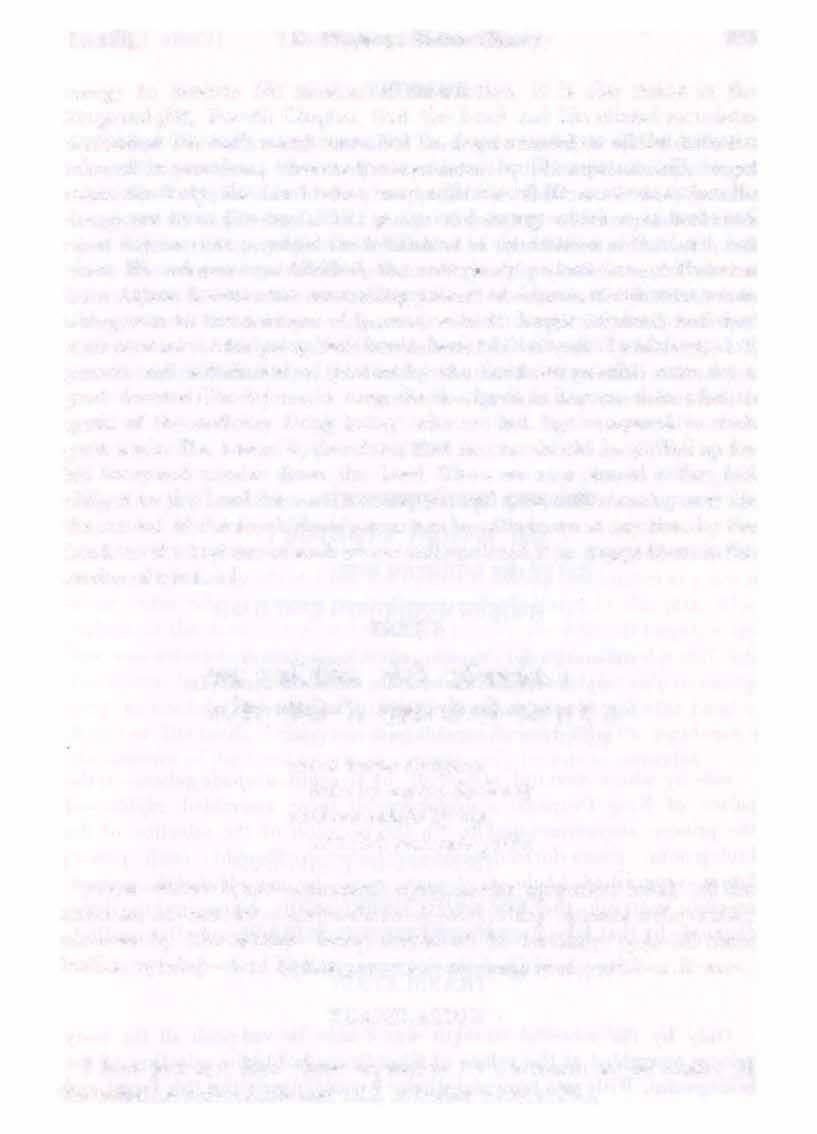
� ?401Attli\wt � GfSPot«o�i;w: I � oon� �:��������
yasya k�a!la-viyogena loko hy apriya-darSo.nal;t
ukthena rahito hy e�a mrtakal;t procyate yathii
yasya-whose; lc�a[la-a moment; viyogena-by separation; lolca�-all the universe; hi-certainly; apriya-darsana�-everything appears unfavorable; ukthena-by life; rahita�-being devoid of; hi-certainly; e��-all these bodies; mrtaka�-dead bodies; pro cyate-are designated; yathii-as it were.
TRANSLATION
I have just lost Him whose separation for a moment would render all the universes unfavorable and void, as bodies without life.
Text6) The P��avas Retire Timely 773
Factually for a living being there is no one dearer than the Lord. The Lord expands Himself by innumerable parts and parcels as sviimsa and vibhinniimsa. Paramatma is the sviimsa part of the Lord, whereas the vibhinniirhsa parts are the living beings.As the living being is the important factor in the material body, or without the living being the material body has no value, similarly without Paramatma the living being has no status quo. Similarly, Brahman or Paramatma has no locus standi without the Supreme Lord Sri Kr�!la. This is thoroughly explained in the Bhagavadgitii (Bg. 15.18). They are all interlinked with one another or interdependent factors; thus in the ultimate issue the Lord is the summum bonum and therefore the vital principle of everything.



TEXT 7




yat-samsrayiid drupada-geham upiigatiiniim rojiiiim svayariwara-mukhe smara-durmadiiniim tejo hrtam khalu mayiibhihatas ca matsya"ft
sajfikrtena dhanu�iidhigatii ca kr�r-ii
yat-by whose merciful; samsmyiit-by strength; drupada-geham-in the palace of King Drupada; upiigatiiniim-all those assembled; riijniim-of the princes; svayamvara-mukhe-on the occasion of the selection of the bridegroom; smara-durmadiiniim-all lusty in thought; tejafl-power; hrtam-vanquished; khalu-as it were; maya-by me; abhihatafl-pierced; ca-also; matsyafl- the fish target; sajjilqtena-by equipping the bow; dhanufiii-by that bow also; adhigatii-gained; ca-also; lcrfirtii-Draupadi.


TRANSLATION
Only by His merciful strength was I able to vanquish all the lusty princes assembled at the palace of King Drupada for the selection of the bridegroom. With my bow and arrow I could pierce the fish target and thereby gain the hand of Draupadi.
774 Srimad-Bhagavatam [Canto 1, Ch. 15
PURPORT
��»JJ�IC( .. • (qttiiHfJ(ct �(�1..11( I ����fit�: ��� ll\911
Draupadi was the most beautiful daughter of King Drupada, and when she was a young girl almost all the princes desired her hand. But Drupada Maharaja decided to hand over his daughter to Arjuna only and therefore contrived a peculiar way. There was a fish hanging on the inner roof of the house under the protection of a wheel. The condition was that out of the princely order,one mustbe able to pierce the fish's eyes through the wheel of protection, and no one would be allowed to look up at the target. On the ground there was a water pot in which the target and wheel were reflected, and one had to fix his aim towards the target by looking at the trembling water in the pot. Maharaja Drupada well knew that only Arjuna or alternately Karpa could successfully carry out the plan. But still he· wanted to hand his daughter to Arjuna. And in the assembly of the princely order, when Dhr�tadyumna, the brother of Draupadi, introduced all the princes to his grown-up sister, Karpa was also present in the game. But Draupadi tactfully avoided Karpa as the rival of Arjuna, and she expressed her desire through her brother Dhr�tadyumna that she was unable to accept anyone who was less than a k§atriya. The vaiiyas and the siidras are less important than the k§atriyas. Karpa was known as a son of a carpenter, who is a siidra. So Draupadi avoided Karpa by this plea. When Arjuna,in the dress of a poor briihmapa, pierced the difficult target, everyone was astonished, and all of them, especially Karpa, offered a stiff fight to Arjuna, but as usual by the grace of Lord Kr�pa he was able to emerge very successful in the princely fight and thus gain the valuable hand of Kr�l)a,or Draupadi. Arjuna was lamentingly remembering the incidence in the absence of the Lord by whose strength only he was so powerful.

Text 8] The P��avas Retire Timely 775
PURPORT
TEXTS �(cUvsi!4+i\l���=ifijl+i(•loi�AA� I � ijl11 +i"''fillf)(t�(!q+\M �S(('I&qij�iffe+\&4�� II G II e yat-sannidhav aham ukha�t}avam agnaye 'dam indram ca samara-ga�m tarasa vijitya labdha sabha maya-kr;tadbhuta-silpa-miiya digbhyo 'haran nr;patayo balim adhvare te
yat-whose; sannidhau-being nearby; aham-myself; u-note of astonishment; khiir.{lavam-the protected forest of lndra, King of heaven; agnaye-unto the fire-god; adam-delivered; indram-Indra; ca-also; saalong with; amara-gar.am-the demigods; tarasii-with all dexterity; vijitya -having conquered; labdhii-having obtained; sabhii-assembly house; maya-krtii-built by Maya; adbhuta-very wonderful; silpa-art and workmanship; maya-potency; digbhyaft-from all directions; aharan-collecting; nrpatayaft-all princes; balim-presentations; adhvare-brought; teunto you.
TRANSLATION
Because He was near me, it was possible for me to conquer with great dexterity the powerful King of heaven, Indradeva, along with his demigod associates and thus enable the fire-god to devastate the Khap�ava forest. And by His grace only the demon named Maya was saved from the blazing Khap�ava forest, and thus we could build our assembly house of wonderful architectural workmanship where all the princes assembled during the performance of Rajasiiya-yajfia and paid you tributes.
PURPORT
The demon Mayadanava was an inhabitant of the forest Khat;�.�ava, and when the Khat;�.gava forestwas seton fire,he askedprotection fromArjuna. Arjuna saved his life, and as a result of this the demon felt obliged. He reciprocated by building a wonderful assembly house for the Pap�avas, which attracted the extraordinary attention of all state princes. They felt the supernatural power of the Pap�avas, and thus without grudge all of them submitted and paid tributes to the Emperor. The demons possess wonderful and supernatural powers to create material wonders. But they are always disturbing elements of the society. The modern demons are the harmful material scientists who create some material wonders for disturbance in the society. For example, the creation of the nuclear weapons has caused some panic in the human society. Maya was also a materialist like that, and he knew the art of creating wonderful things. And yet Lord Kr�!la wanted to kill him. When he was chased both by the fire and the wheel of Lord Kf�pa, he took shelter of a devotee like Arjuna, who saved him from the wrath of the fire of Lord Sri Kf�pa. Devotees are therefore more merciful than the Lord, and in devotional service the mercy of a devotee is more valuable than the mercy of the Lord. Both the fire and
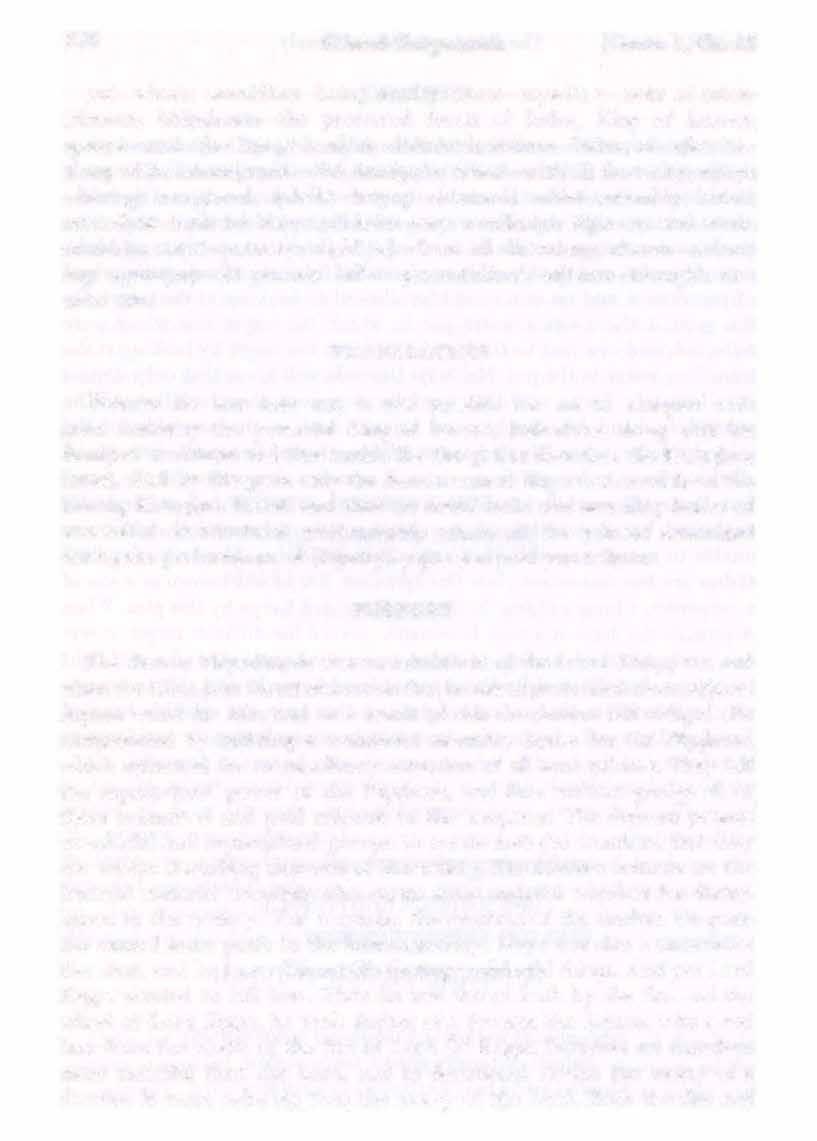
776 Srirnad-Bhagavatam [Canto l, Ch. 15
the Lord ceased from chasing the demon as soon as both of them saw that the demon was given shelter by a devotee like Arjuna. The demon, feeling obliged to Arjuna,wanted to do him some service to show his gratefulness, but Arjuna declined to accept anything from him in exchange. Lord Sri �!!a, however, being pleased with Maya for his taking shelter of a devotee, asked him to render service unto King Yudhi�thira by building a wonderful assembly house. The process is that by thegrace of the devotee the mercy of the Lord is obtained, and by the mercy of the Lord a chance to serve the Lord's devotee is obtained. The club of Bhimasena was also a gift of Mayadanava.
TEXT9
yat-tejasii m;pa-siro 'nghrim ahan makhiirtham iiryo 'nujas tava gajiiyuta-sattva-viryafl teniihr;tiifl pramatha-niitha-makhiiya bhiipii yan mocitiis tad anayan balim-adhvare te

yat-whose; tejasii-by influence; nrpa- sirafl-anghrim-one whose feet are adored by the heads of kings; ahan-the great; makhiirtham-for the sacrifice; iiryafl-respectable; anujafl-younger brother; tava- your; gajaayuta-tenthousand elephants; sattva-viryafl-powerful existence; tena-by him; iihrtiifl-collected; pramatha-niitha-the lord of the ghosts (Mahabhairava); makhiiya-for sacrifice; bhilpiifl- kings; yat mocitiifl-by whom they were released; tat a nayan-all of them brought; balim-taxes; adhvare- presented; te- your.
TRANSLATION
Your respectable younger broiher, who possesses the strength of ten thousand elephants, killed, by His grace, Jarasandha, whose feet were worshiped by many kings. These kings had been brought for sacrifice in Jarasandha's Mahabhairava-yajfia, but they were thus released. Later they paid tribute to Your Majesty.

Text9J The P��avas Retire Timely 777
'1�1®e::cq4Ff: 1
ilks+t\4�it II �II
��:ste11qNI(tsft;+t(fli{ctl� ris�\if�
�wtl(ijl:Slii�wtl�+({qi1J lf'1 �flitRdiMG\wt�'{
Jarasandha was a very powerful king of Magadha, and the history of his birth and activities is also very interesting. His father, King Brhadratha, was also a very prosperous and powerful King of Magadha, but he had no son, although he married two daughters of the King of Kasi. Being disappointed in not getting a son from either of the two queens, the King, along with his wives, left home to live in the forest for austerities, but in the foresthe wasbenedictedby one great r�i to have a son,and he gave him one mango to be eaten by the queens. The queens did so and were very soon pregnant. The King was very happy to see the queens bearing children, but when the ripe time approached, the queens delivered one child in two parts, one from each of the queens' wombs. The two parts were thrown in the forest, where a great she-demon used to live, and she was glad to have some delicate flesh and blood from the newly born child. Out of curiosity she joined the two parts, and the child became complete and regained life. The she-demon was known as Jara, and being compassionate on the childless King, she went to the King and pre�ented him with the nice child. The King was very pleased with the she-demon and wanted to reward her according to her desire. The she-demon expressed her desire that the child be named after her, and thus the child was surnamed Jarasandha, or one who was joined by Jara the she-demon. In fact, this Jarasandha was born as one of the parts and parcels of the demon Viprachitti. The saint by whosebenediction the queensbore the child was called Candra Kousik, who foretold of the child before his father Brhadratha.
Since he possessed demoniacal qualities from birth, naturally he became a great devotee of Lord Siva, who is the lord of all ghostly and demonic men. Rava!la was agreat devotee ofLord Siva, and so also King Jarasa13dha. He used to sacrifice all arrested kings before Lord Mahabhairava (Siva), and by his military power he defeated many small kings and arrested them to butcher before Mahabhairava. There are many devotees of Lord Mahabhairava or Kalabhairava inthe province of Bihar, formerlycalled Magadha. Jarasandha was a relative of Kamsa, the maternal uncle of Kr�!J.a, and therefore after Kamsa's death King Jarasandha became a great enemy of �!J.a, and there were many fights between Jarasandha and Kr�!la. Lord �!la wanted to kill him, but He also wanted that those who served as military men for Jarasandha might not be killed. Therefore a plan was adopted to kill him. Kr�!J.a, Bhima and Arjuna together went to Jarasandha in the dress of poor briihmar-as and begged charity from King Jarasandha.

778 Srimad-Bhagavatam [Canto l, Ch. 15
PURPORT
Jarasandha never refused charity to any briihmafla, and he performed many sacrifices also, yet he was not on a par with devotional service. Lord Kr�pa, Bhima and Arjuna asked Jarasandha the facility of combating him, and it was settled that Jarasandha would fight with Bhima only. So all of them were both guests and combatants of Jarasandha, and Bhima and Jarasandha fought every day for several days. Bhima became disappointed, but Kr�pa gave him hints about Jarasandha's being joined together as an infant, and thus Bruma dissected him again and so killed him. All the kings who were detained in the concentration camp to be killed before Mahabhairava were thus released by Bhima. Feeling thus obliged to the Piip�avas, they paid tribute to King Yudh�thira.


TEXT 10

oil
patnyiis taviidhimakha-kJpta-mahii-bh4ekasliigh4tha-ciiru-kabaram kitavail;l sabhiiyiim
spr�tam vikirya padayol;l patitiisrumukhyii
yas tat-striyo 'krta hatesa-vimukta-kesiil;l
patnyiift-of the wife; tava-your; adhimakha-during the great sacrificial ceremony; kJpta--dressed; m ahii-bh4eka-greatly sanctified; sliighi§tha -thus glorified; cam-beautiful; kabaram-clustered hair; kitavaift-by the miscreants; sabhiiyiim-in the great assembly; sp!§tam-being caught; vikirya-beingloosened;padayoft-on the feet; patita-asru-mukhyiil;l-of the one who fell down with tears in the eyes; yaft-He; tat-their; striya[lwives; akrta-became; hatesa-bereft of husbands; vimukta-kesiil;l-loosened hair.


TRANSLATION
It was He only who loosened the hair of all the wives of the miscreants who dared open the cluster of your Queen's hair when she was nicely dressed and sanctified for the great Rajasiiya sacrificial ceremony. At that time she fell down at the feet of Lord Kr��a with tears in her eyes.
Text 10) The P�cJavas Retire Timely 779
«'lltlli( I tl«t�tft�t:'d:tif?lfl"ffiQt:ll�
PURPORT
Queen Draupadi had a beautiful bunch of hair which was sanctified in the ceremonial function of Rajasiiya-yajfia. But when she was lost in the bet, Du!t5asana touched her glorified hair to insult her. Draupadi then fell down at the lotus feet of Lord Kr�!!a, and Lord Kr�!!a decided that all the wives of Du!t5asana and company should have their hair loosened as a result of the Battle of Kuruk�etra. Thus after the Battle of Kuruk�etra, after all the sons and grandsons of Dhftar�tra died in battle, all the wives of the family were obliged to loosen their hair as widows. In other words, all the wives of the Kuru family became widows because of Du!t5asana's insulting a great devotee of the Lord. The Lord can tolerate insults upon Himself by any miscreant because the father tolerates even insults from the son. But He never tolerates insults upon His devotees. By insulting a great soul, one has to forego all the results of pious acts and benediction also.
TEXT II



q-: 1
EuU114ffl
yo no fugopa vana etya duranta-krcchriid duroiisaso 'ri-racitiid ayutiigrabhug yal; Siikiinna-s4fam upayujya yatas tri-lokirit trptiim amamsta salile vinimagna-sanghal;
ya{l-one who; na{l-us; jugopa-gave protection; vana- forest; etyagetting in; duranta-dangerously; krcchrat-trouble; durviisasa{l-of Durvasa Muni; ari-enemy; racitiit-fabricated by; ayuta-ten thousand; agrabhukone who eats before; ya{t-that person; siika-ann a-s4tam-remnants of foodstuff; upayujya-having accepted; yatal;l.- because; tri-lokim-all the three worlds; t_rptiim-satisfied; amamsta- thought within the mind; salile -while in the water; vinimagna-sanghal;-all merged into the water.
TRANSLATION
During our exile, Durvasa Muni, who eats with his ten thousand disciples, intrigued with our enemies to put us in dangerous trouble. At
780 Srimad-Bhagavatam [Canto I, Ch. IS
�;it���
''t<toscfteaq����
�f4MII�Hit: littil
that time He [Lord Kr��a], simply by accepting the remnants of food, saved us. By His accepting food thus,the assembly of munis, while bathing in the river, felt sumptuously fed. And all the three worlds were also satisfied.

PURPORT
Duroiisii Muni: A powerful mystic briihmacw determined to observe the principles of religion with great vows and under strict austerities. His name is associated with many historical events, and it appears that the great mystic could be both easily satisfied and easily annoyed like Lord Siva. When he was satisfied, h(; could do tremendous good to the servitor, but if he was dissatisfied he could bring about the greatest calamity. Kumari Kunti, at her father's house, used to minister all kinds of services to all great briihmaf1as, and being satisfied with her good reception Durvasa Muni benedicted her with a power to call any demigod she desired. It is understood that he was a plenary incarnation of Lord Siva, and thus he could easily be either satisfied or annoyed. He was a great devotee of Lord Siva, and by his order he accepted the priesthood of King Svetaketu because of the King's performance of sacrifice for one hundred years. Sometimes he used to visit the parliamentary assembly of the heavenly kingdom of lndradeva. He could travel in spaceby his great mystic powers, and it is understood that he travelled a great distance through space, even up to the Vaiku�tha planets beyond material space. He travelled all these long distances within one year, during his quarrel with King Ambari�a, the great devotee and Emperor of the world. He had about ten thousand disciples, and wherever he visited and became a guest of the great k�atriya kings, he used to be accompanied by a number of followers. Once he visited the house of Duryodhana, the enemy cousin of Maharaja Yu�thira. Duryodhana was intelligent enough to satisfy the briihma"[la by all means, and the great ni wanted to give some benediction to Duryodhana. Duryodhana knew his mystic powers, and he knew also that the mystic briihma"[la, if dissatisfied, could cause some havoc also, and thus he designed to engage the briihma"[la to show his wrath upon his enemy cousins the p-ap�avas. When the ni wanted toaward some benediction to Duryodhana,the latter wished that he should visit the house of Maharaja Yudhi�hira, who was the eldest and chief among all his cousins. But by his request he would go to him after he had finished his meals with his Queen, Draupadi. Duryodhana knew that after Draupadi's dinner it would be impossible for Maharaja Yudhi�hira to receive such a large number of briihma"[la guests, and thus the ni would be annoyed and
Text ll) The P��avas Retire Timely 781
would create some trouble for his cousin Maharaja Yudhi�thira. That was the plan of Duryodhana. Durviisii Muni agreed to this proposal, and he approached the King in exile according to the plan of Duryodhana after the King and Draupadi had finished their meals.

On his arrival at the door of Mahiiriija Yudhi�thira, he was at once well received, and the King requested him to finish his noontime religious rites in the river and by that time the foodstuff would be prepared. Durviisii Muni, along with his large number of disciples, went to take a bath in the river, and Mahiiriija Yudhi�thira was in great anxiety for the guests. As long as Draupadi had not taken her meals, food could be served to any number of guests, but the ni, by the plan of Duryodhana, reached there after Draupadi had finished her meals.
When the devotees are put into difficulty, they have an opportunity to recollect the Lord with rapt attention. So Draupadi was thinking of Lord Kr�!la in that dangerous position, and the all-pervading Lord could at once know the dangerous position of His devotees. He therefore came there on the scene and asked Draupadi to give whatever food she might have in her stock. On her being so requested by the Lord, Draupadi was sorrowful because the Supreme Lord asked her for some food and she was unable to supply it at that time. She said to the Lord that the mysterious dish which she had received from the sun-god could supply any amount of food if she herself had not eaten. But on that day she had already taken her meals, and thus they were in danger. By expressing her difficulties she began to cry before the Lord as only a woman would do in such a position. The Lord, however, asked Draupadi to bring up the cooking pots to see if there was any particle of foodstuff left, and on Draupadi's doing so, the Lord found some particle of vegetable sticking to the pot. The Lord at once picked it up and ate it. After doing so, the Lord asked Draupadi to call for her guests, the company of Durvasa.
Bhima was sent to call them from the river. Bhima said, "Why are you delaying, sirs? Come on, the food is ready for you." But the briihmaflas, because of Lord K�!la's accepting a little particle of food, felt sumptuously fed, even while they were in the water. They thought that since Maharaja Yudhi�thira must have prepared many valuable dishes for them and since they were not hungry and could not eat, the King would feel sorry, so it was better not to go there. Thus they decided to go away.
This incidence proves that the Lord is the greatest mystic, and therefore He is known as yogesvara. Another instruction is that every householder must offer food to the Lord, and the result will be that everyone, even a company of guests numbering ten thousand, will be satisfied because of the Lord's being satisfied. That is the way of devotional service.
782 Srimad-Bhigavatam [Canto I, Ch. 15
ct�iilijltl��'f�GJfchRifq(J:mttf00s«¥4G>111i\dir I

�sftr 'i41l¥4�� q.8o:clur � ¥4((1Q-ca${������
yat-tejasiitha bhagaviin yudhi sula-piil)-irvismiipita� sa-girijo 'stram adiin nijam me anye 'pi ciiham amunaiva kalevare�Ja priipto mahendra-bhavane mahad iisaniirdham
yat-by whose; tejasii.-by influence; atha-at one time;bhagavii.n-the Personality of God (Lord Siva);yudhi-in thebattle;siila-pii.rifz-one who has a trident in hand; vismii.pitafl-astonished; sa-girijafl-along with the daughter of the Himalayan Mountains; astrom-weapon; adii.t-awarded; nijam-of his own;me-unto me;anye api-so also others;ca-and; ahammyself;amunii.-by this;eva-definitely; kalevarerw-by the body;prii.ptafl -obtained; mahii.-indra-bhavane-in the house of lndradeva;mahat-great; iisana-ardham-half-elevated seat.


TRANSLATION
It was by His influence only that in a fight I was able to astonish the Personality of God Lord Siva and his wife, the daughter of Mount Himalaya. Thus he [Lord Siva] became pleased with me and awarded me his own weapon. Other demigods also delivered their respective weapons to me, and in addition I wasable to reach the heavenly planets in this present body and was allowed a half-elevated seat.
PURPORT
Bythe grace of the Supreme Personality of Godhead Sri Kr��Ja, all other demigods, including Lord Siva, were pleased with Arjuna. The idea is that one who isfavored by Lord Siva or any other demigod may not necessarily he favored by the Supreme Lord Sri �l}a (Godhead). Raval}a was certainly a great devotee of Lord Siva, hut he could not he saved from the wrath of the Supreme Personality of Godhead Lord Ramacandra. And there are many instances like that in the histories of the Purii.ras. But here is an instance where we can see that Lord Siva became pleased even in the
Text 12) The P��avas Retire Timely
TEXT 12
783
fight with Atjuna.The devotees of the Supreme Lord know how to respect the demigods, but the devotees of the demigods sometimes foolishly think that the Supreme Personality of Godhead is no greater than the demigods. By such a conception, one becomes an offender and ultimately meets with the same end as Ravarta and others. The instances described byAtjuna during his friendly dealings with Lord Sri Kr�!la are instructive for all who may be convinced by the lessons that one can achieve all favors simply by pleasing the Supreme Lord Sri Kr�!la while the devotees or the worshipers of other demigods may achieve only partial benefits of life, which are also perishable, just as the demigods themselves are.
Another significance of the present verse is that Arjuna, by the grace of Lord Sri Kr�!J.a, was able to reach the heavenly planet even with the selfsame body and was honored by the heavenly demigod lndradeva, being seated with him half elevated. One can reach the heavenly planets by the pious acts recommended in the siistras in the category of fruitive activities. And as stated in the Bhagavad-gitii (Bg. 9.21), when the reactions of such pious acts are spent, the enjoyer is again degraded to this earthly planet. The moon is also on the level with the heavenly planets, and only persons who have performed virtues only, namely performing sacrifices, giving in charity and undergoing severe austerities, etc., can be allowed to enter into the heavenly planets after the duration of life of the body. Arjuna was allowed to enter into the heavenly planets in the selfsame body simply by the grace of the Lord, otherwise it is not possible to do so. The present attempts to enter into the heavenly planets by the modern scientists will certainly prove futile because such scientists are not on the level of Arjuna. They are ordinary human beings without any assets of sacrifice, charity or austerities. The material body is influenced by the three modes of material nature, namely goodness, passion and ignorance. The present population is more or less influenced by the modes of passion and ignorance, and the symptoms for such influence are exhibited in their becoming very lusty and greedy. Such degraded fellows can hardly approach the higher planetary systems. Above the heavenly planets there are many other planets also, which only those who are influenced by goodness can reach. In heavenly and other planets within the universe, the inhabitants are all highly intelligent, many more times than the human beings, and they are all pious in the higher and the highest mode of goodness. They are all devotees of the Lord, and although their goodness is not unadulterated, still they arc known as demigods possessing the maximum amount of good qualities possible within the material world.

784 Srimad-Bhagavatam [Canto I, Ch. 15
tatraiva me viharato bhuja-da!J.lja-yugmarh gii"!ltfiva-lak�a"!lam ariiti-vadhiiya devii[l. sendrii[l. sritii yad-anubhiivitam iijamU}ha teniiham adya mu�ita[l. puru�e"!la bhu.mnii

tatra-in that heavenly planet; eva-certainly; me-myself; viharata[l.while staying as a guest;bhuja-dap.t}.a-yugman-both of my arms; giip.t}.ivathe bow named Ga!l!fiva; lak§ap.am-mark; ariiti-a demon named Nivatakavaca;vadhiiya-for killing;deva[l.-all thedemigods;sa-along with; indra[l.-the heavenly King, Indra;srita[l-taken shelter of;yat-by whose; anubhavitam-made it possible to be powerful; ajamipha-of the descendant of King Ajami�ha;tena-by Him;aham-myself;adya-at the present moment; mu§itaft-bereft of; puru§ep.a- the Personality; bh iimnii- the Supreme.
TRANSLATION
When I stayed for some days as a guest in the heavenly planets, all the heavenly demigods, including KingIndradeva, took shelter of my arms, which were marked with the Gi!lPiva bow, to kill the demon named Nivatakavaca. 0 King, descendant of Ajami«Jha, at the present moment I am bereft of the Supreme Personality of Godhead by whose influence I was so powerful.
PURPORT
The heavenly demigods are certainly more intelligent, powerful and beautiful, and yet they had to take help from Arjuna because of his Gi!lPiva bow, which was empowered by the grace of Lord Sri K�!J.a. The Lord is all-powerful, and by His grace His pure devotee also can be as
Text 13] The Pa!l�avas Retire Timely
TEXT 13 mitm.m�'5lt:ucso"' •nul\cte?JOI'I(IRf�\lN�:l �:�tta:�·�ij'll:t414 Q;ci('IQaffir:�\'{mll��ll
785
powerful as He may desire, and thereis nolimit toit. Andwhen theLord withdraws His powerfromanyone,heis powerless bythe will of the Lord.
yad-bandhava� kuru-baliibdhim ananta-piirameko rathena tatare 'ham atirya-sattvam
pratyahrtarh bahu dhanarh ca mayii pare�iirh tejiis-padarh mar-imayarh ca hrtarh sirobhya[l

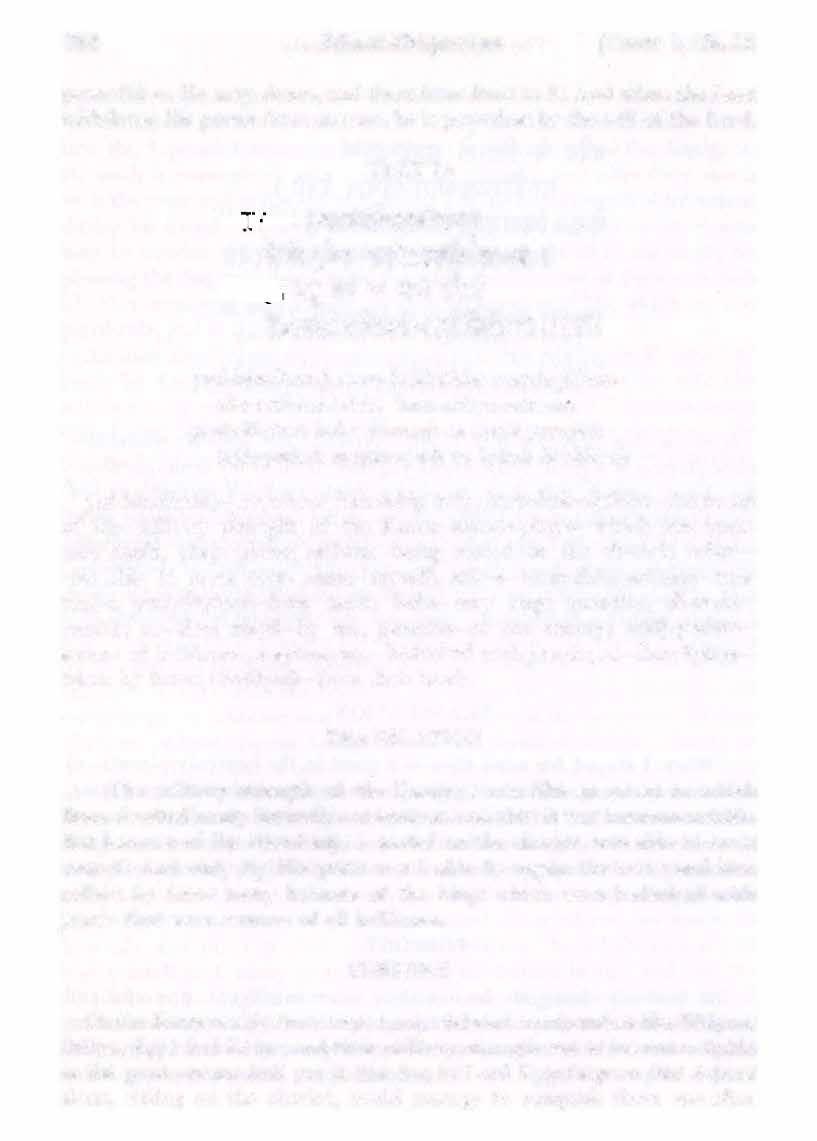
yat-biindhava[l-by whosefriendshiponly; kuru-bala-abdhim-the ocean of the military strength of the Kurus; ananta-piiram-which was insurmountable; eka[l-alone; rathena- being seated on the chariot; tatarewas able to cross over; aham-myself; atirya- invincible; sattvam-exis· tence; pratyiihrtam-drew back; bahu-very large quantity; dhanamwealth; ca-also; mayii-by me; pare�iim-of the enemy; tejii�-padamsource of brilliance; ma11imayam-bedecked withjewels; ca-also ; hrtamtaken by force; sirobhya[l- from theirheads.



TRANSLATION
The military strength of the Kauravas was like an ocean in which there dwelled many invincible existences, and thus it was insurmountable. But because of His friendship, I, seated on the chariot, was able to cross over it. And only by His grace was I able to regain the cows and also collect by force many helmets of the kings which were bedecked with jewels that were sources of all brilliance.
PURPORT
OntheKauravaside thereweremanystalwart commanderslike Bhi�ma, Dropa, Kfpa and Karpa, and their militarystrength wasasinsurmountable as the great ocean. And yet it was due to Lord �pa's grace that Arjuna alone, sitting on the chariot, could manage to vanquish them one after

786 Srimad-Bhagavatam [Canto 1, Ch. 15
� � ms&¥tdh{t1'*4i( I
q'4wf � 'AT �
�fuuc4��Rl<t¥4:ntvu
TEXT 14 -�;il(�lf.\ilit'itr:aql(-
sr(:qa((i
���(
another without difficulty. There were many changes of commanders on the other side, but on the Pal)<Javas' side Arjuna alone on the chariot driven by Lord �pa could manage the whole responsibility of the great war. Similarly, when the Pap�avas were living at the palace of Virata incognito, the Kauravas picked a quarrel with King Virata and decided to take away his large number of cows. Thus while taking away the cows, Arjuna fought with them incognito and was able to regain the cows along with some booty taken by force, the jewels set on the turbans of the royal order. Arjuna remembered that all this was possible by the grace of the Lord.
TEXT 15
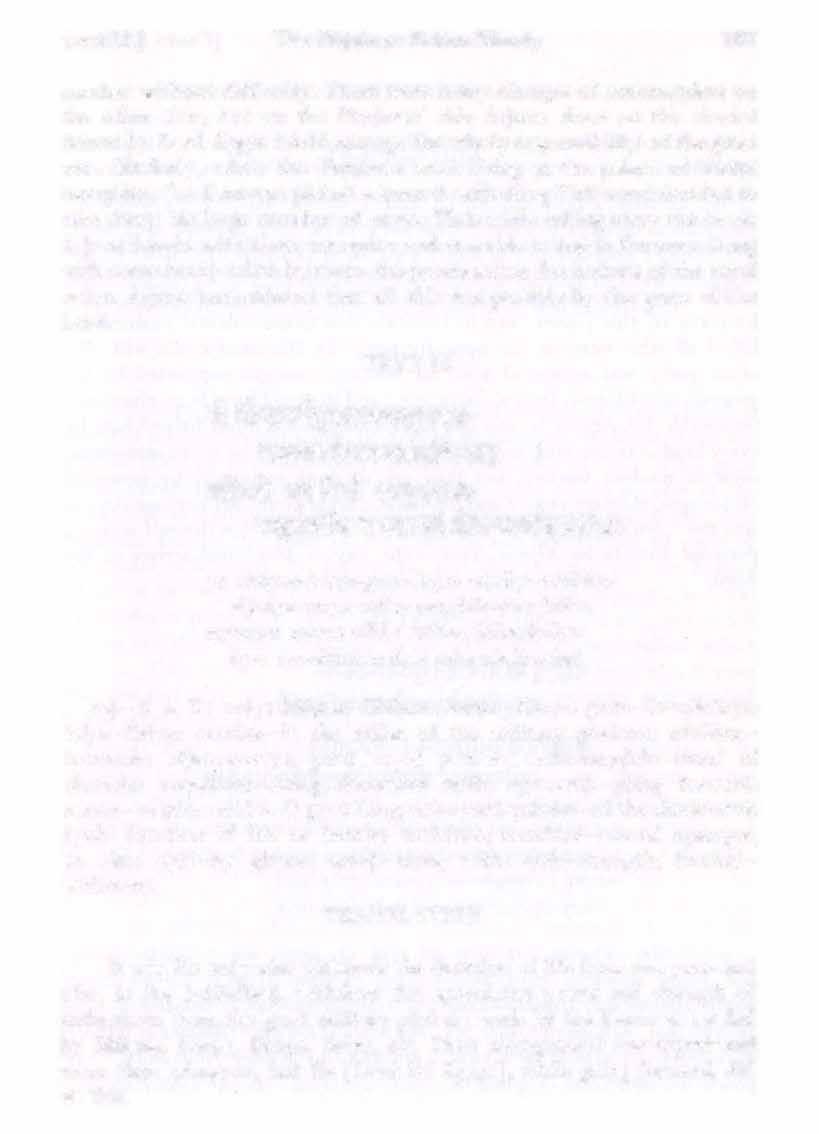
yo bh4ma-kaf1la-guru-salya-camu�v adabhrarojanya-varya-ratha-ma!'cJ.ala-mal)lj.itiisu
agrecaro mama vibho ratha-yuthapiiniimiiyur maniimsi ca drsa saha oja iircchat
ya[l-it is He only; bhi§ma-Bh�ma; kaf1la-Karpa; guru-Dropacarya; salya-Salya; camu§u-in the midst of the military phalanx; adabhraimmense; rojanya-varya-great royal princes; ratha-mar{lala-chain of chariots; mar{litiisu-being decorated with; agreca ra[l-going forward; mama-ofmine; vibho-0 great King; ratha-yuthapiiniim-all the charioteers; iiyu[l-duration of life or fruitive activities; maniimsi-mental upsurges; ca-also; drsa-by glance; saha[l-along with; oja[l-strength; iircchatwithdrew.
TRANSLATION
It was He only who withdrewtheduration of life from everyone and who, in the battlefield, withdrew the speculative power and strength of enthusiasm from the great military phalanx made by the Kauravas headed by B�ma, Karpa, Dropa, Satya, etc. Their arrangement was expert and more than adequate, but He [Lord Sri Kf�pa J , while going forward, did all this.
Text 15) The Pita!favas Retire Timely 787
�¥fi"l¥igw<A4�'J.'4G>A-
t �II'(�� �;rtf{� 'if qtU(��IIt'-\11
(M�?4tRq¥toca¥ifOca•u
The Absolute Personality of Godhead Lord Sri �pa by His plenary Paramatma portion expands Himself in everyone's heart, and thus He directs everyone in the matter of recollection, forgetfulness, knowledge, the absence of intelligence and allpsychologicalactivities (Bg. 15.15). As the Supreme Lord, He can increase or decrease the duration of life of a living being. Thus the Lord conductedtheBattleof Kuru�etra according to His own plan. He wanted that battle to establish Yudhi�thira as the Emperor of this planet, and to facilitate this transcendental business He killed all who were on the opposite party by His omnipotent will. The other party was equipped with all military strength supported by big generals like Bln�ma, Dropa, Salya, etc., andit wouldhave beenphysically impossible for Arjuna to win the battle had the Lord not helped him by everykindoftactic.Suchtacticsare generally followedbyevery statesman, even in modern warfare, hut they are all done materially by powerful espionages, military tacticsanddiplomaticmaneuvers.Butbecause Aijuna was the Lord's affectionate devotee, the Lord did allthis Himself without personal anxiety by Arjuna. That is the way of devotional service of the Lord.
16
;flqm&�R<a«IW.nuofV•11����
yad-dol;l�u mii prartihitam guru-bh4ma-karfw
naptr-trigarta-5alya-saindhava-bahlikadyail;l astriirty amogha-mahimiini niriipitiini
nopasprsur nrhari-diisam iviisur�ri
yat-under whose; dop§u-protection of arms; mii prarihitam-myself being situated; guru-Dropaciirya; bh'4ma-Bhi�ma; karra-Karpa; naptr-Bhiir:iSrava; trigarta-King Susarma; salya- Salya; saindhava-King Jayadratha; biihlika-brother of Maharaja Santanu (Bhi�ma's father); iidyai/;l-etc.; astriiri-weapons; amogha-invincihle; mahimiini-very powerful; nirilpitiini-applied; na-not; upaprsul;l-touch; nrhari�diisam-



788 Srimad-Bhagavatam [Canto 1, Ch. 15
PURPORT
TEXT
�m�g�"'..Mst(la04aitq¥tm•uf.lr.t�A<nf-w
servitor of N rsimhadeva (Prahlada); iva-like;asura!li-weapons applied by the demons.
TRANSLATION
Great generals like B�ma, Dro!la, Kar!la, BhiiriSrava, Su8armii, Salya, Jayadratha, Bahh""ka, etc., all directed their invincible weapons against me. But by His [Lord �!�-a's] grace they could not even touch a hair of my head. Similarly, Prahlada Maharaja, the supreme devotee of Lord Nrsinnadeva, was unaffected by the weapons the demons used against him.
PURPORT

The history of Prahlada Maharaja, the great devotee of Nrsimhadeva, is narrated in the Seventh Canto of Srimad-Bhiigavatam. Prahlada Maharaja, a small child of five years only, became the object of envy of his great father Hira!lyakaSipu only for his son's becoming a pure devotee of the Lord. The demon father applied all his weapons to kill the devotee son Prahlada, but by the grace of the Lord he was saved from all sorts of dangerous actions by his father. He was thrown in a fire, in boiling oil, from the top of a hill, underneath the legs of an elephant, and was administered poison. At last the father himself took up a chopper to kill his son,andthus Nrsimhadevaappearedand killed the heinous father before the son. Thus no one can kill the devotee of the Lord. Similarly, Arjuna was also saved by the Lord, although all dangerous weapons were applied by his great opponents like Bhi�ma.
Karra: Born of Kunti by the sun-god prior to her marriage with Maharaja Pii!l�U. Kar!ia took his birth with bangles and earrings, extraordinary signs for an undaunted hero. In the beginning his name was Vasusena, but when he grew up he presented his natural bangles and earrings to Indradeva, and thenceforward he became known as Vaikartan. After his birth from maiden Kunti, he was thrown in the Ganges. Later he was picked up by Adhirat, and he and his wife Radha brought him up as their own offspring. Kar!la was very charitable, especially toward the brohmaflas. There was nothing which he could not spare for a briihmara. In the same charitable spirit he gave in charity his natural bangles and earrings to Indradeva, who, being very much satisfied with him, gave him in return a great weapon called Sakti. He was admitted as one of the students of Drop.acarya, and from the very beginning there was some rivalry between him and Arjuna. Seeing his constant rivalry with Arjuna,
Text 16] The P��avas Retire Timely 789
Duryodhana picked him up as his companion, and this gradually grew into greater intimacy. He was also present in the great assembly of Draupadi's svayamvara function, and when he attempted to exhibit his talent in that meeting, Draupadi's brother declared that Kaqta could not take part in the competition because of his being the son of a sudra carpenter. Although he was refused in the competition, still when Arjuna was successful in piercing the fish target on the ceiling and Draupadi bestowed her garland to Arjuna, Kan;w and other disappointed princes offered an unusual stumbling block to Arjuna while he was leaving with Draupadi. Specifically Kar!J.a fought with him very valiantly, but all of them were defeated by Arjuna. Duryodhana was very much pleased with Kar!J.a because of his constant rivalry with Arjuna, and when he was in power, he enthroned Kar!J.a in the state of Anga. Being baffled in his attempt to win Draupadi, he advised Duryodhana to attack King Drupada, for after defeating him both Arjuna and Draupadi could be arrested. But Dro!J.acarya rebuked them for this conspiracy, and they refrained from the action. Kar!J.a was defeated many times, not only by Arjuna but also by Bhimasena. He was the King of the kingdom of Bengal, Orissa and Madras combined. Later on he took an active part in the Rajasiiya sacrifice of Maharaja Yudhi�thira, and when there was gambling between the rival brothers, designed by Sakuni, Kar!J.a took part in the game, and he was very pleased when Dr.aupadi was offered as a bet in the gambling. This fed his old grudge. When Draupadi was in the game he was very enthusiastic to declare the news, and it is he who ordered Du!J.sasana to take away the garments of both the Pii!J.�avas and Draupadi. He asked Draupadi to select another husband because, being lost by the Pa!J.�avas, she was rendered a slave ofthe Kurus. He was always an enemy of the Pa!J.�avas, and whenever there was an opportunity, he tried to curb them by all means. During the Battle of Kuru�etra, he foresaw the conclusive result, and he expressed his opinion that due to Lord Kr�!ia's being the chariot driver of Arjuna, the battle should be won by him. He always differed with B�ma, and sometimes he was proud enough to say that within five days he could finish up the Pa!J.�avas, if B�ma would not interfere with his plan of action. But he wasmuch mortified when Bhisma died. He killed Ghatotkach with the Sakti weapon obtained from In<kadeva. His son, Brisasena, �as killed by Arjuna. He killed the largest number of Pa!J.�ava soldiers. At last there was a severe fight with Arjuna, and it is he only who was able to knock off the helmet of Arjuna. But it so happened that the wheel of his chariot got stuck in the battlefield mud, and when he got down to set the wheel right Arjuna took the opportunity and killed him, although he requested Arjuna not to do so.

790 Srimad-Bhagavatam [Canto 1, Ch. 15
Naptri or Bhuri.Sravii: Bhurisrava was the son of Somadutta, a member of the Kuru family. His other brother was Salya. Both the brothers and the father also attended the svayarhvara ceremony of Draupadi. All of them appreciated the wonderful strength of Arjuna due to his being the devotee friendof the Lord, and thus BhUrisrava advised the sons of Dhftar�tra not to pick any quarrel nor to fight with them. All of them also attended the Rajasuya yajna of Maharaja Yudhi�thira. He possessed one ak�auhiri regiment of army, cavalry, elephants and chariots, and all these were employed in the Battle of Kuru�etra on behalf of Duryodhana's party. He was counted by Bhima as one of the Yuthapatis. In the Battle of Kuruk�etra he was especially engaged in a fightwith Satyaki, and he killed ten sons of Satyaki. Later on, Arjuna cut off his hands, and he was ultimately killed by Satyaki. After his death he merged into the existence of Visvadeva.

Trigarta or Susarmii: Son of Maharaja Vrddhak�etra and the King of Trigarta Desa, and he was also present in the svayarhvara ceremony of Draupadi. He was one of the allies of Duryodhana, and he advised Duryodhana to attack the l\iatsyadesa (Darbhanga). During the time of cow·stealing in Viratnagar, he was able to arrest Maharaja Virata,but later on 1aharaja Virata was released by Bhima,and inthe Battle of Kurukeyetra he also fought very valiantly, but at the end he was killed by Arjuna.
Jayadratha: Another son of Maharaja Vrddhak�etra. He was the King of Sindhu (modern Sind Pakistan) De8a. His wife's name was Du�ala. He was also present in the svayarhvara ceremony of Draupadi, and he desired very strongly to have her hand, but he failed in the competition. But since then he sought always the opportu�ty to get in touch with Draupadi. When he was going to marry in the Salya Desa,on the way to Kamyavan he happened to see Draupadi again and was too much attracted to her. The Pa!l�avas and Draupadi werethen in exile, after losing their empire in gambling, and jayadratha thought it wise to send news to Draupadi in an illicit manner through Kotisa�ya, one of his associates. Draupadi at once refused vehemently the proposal of jayadratha,but being so much attracted by the beauty of Draupadi,he tried again and again. Every time he was refused by Draupadi he tried to take her away forcibly on his chariot,and at first Draupadi gave him a good dashing,andhe fell like a cut-root tree. But he was not discouraged,and he was able to force Draupadi to sit on the chariot. This incidence was seen by Dhaumya Muni, and he strongly protested the action of jayadratha. He also followed the chariot, and through Dhatreyak the matter was brought to the notice of Maharaja Yudhi�thira. The Pa!l�avas then attacked the soldiers of Jayadratha and killed them all, and at last Bhima caught hold of Jayadratha and beat him

Text 16) The P��avas Retire Timely 791
very severely, almost dead. Then all but five hairs were cut off his head and he was taken to all the kings and introduced as the slave of Maharaja Yudhi�thira. He was forced to admit himself to be the slave of Maharaja Yudhi�thira before all the princely order, and in the same condition he was brought before Maharaja Yudhi�thira. Maharaja Yudhi�thira was kind enough to order him released, and when he admitted to become a tributary prince under Maharaja Yudhi�thira, Queen Draupadialso desired his release. After this incidence, he was allowed to return to his country. Being so insulted, he went to Gongotri in the Himalayas and undertook a severe type of penance to please Lord Siva. He asked his benediction to defeat all the Pa!l�avas, at least one at a time. Then the Battle of Kuruk�etra began, and he took sides with Duryodhana. In the first day's fight he was engaged with Maharaja Drupada, then with Virata and then with Abhimanyu. While Abhimanyu was being killed, mercilessly surrounded by seven great generals, the Pa!l�avas came to his help, but Jayadratha, by the mercy of Lord Siva, repulsed them with great ability. At this, Arjuna took a vow to kill him, and on hearing this, Jayadratha wanted to leave the warfield and asked permission from the Kauravas for this cowardly action. But he was not allowed to do so. On the contrary, he was obliged to fight with Arjuna, and while the fight was going on Lord Kr�!la reminded Arjuna that the benediction of Siva upon Jayadratha was that whoever would cause his head to fall to the ground would die at once. He therefore advised Arjuna to throw the head of Jayadratha directly onto the lap of his father, who was engaged in penances at the Samanta Paficaka pilgrimage. This was actually done by Arjuna. Jayadratha's father was surprised to see a severed head on his lap, and he at once threw it to the ground. The father immediately died, his forehead being cracked in seven pieces.
TEXT

792 Srimad-Bhagavatam [Canto 1, Ch. 15
17 ��:illf���ir ��lFln:l ���Rt�l&+t(�w.At� WIS�m'{�:11�"11 sautye vrtaft kumatina 'tmada isvaro me yat-pii.da-padmam abhaviiya bhajanti bhavyiift miirh sriinta-viiham arayo rathino bhuv4tham na priiharan yad-anubhiiva-nirasta-cittiift
sautye-regarding a chariot driver; vrta�-engaged; kumatinii-by bad consciousness; iitmada-one who delivers;iSvara�-the Supreme Lord;memy; yat-whose; piida-padmam-lotus feet; abhaviiya-in the matter of salvation; bhajanti-do render service; bhavyii�-the intelligent class of men; miim-unto me; sriinta-thirsty; viiham-my horses; arayo�-the enemies; rathina� -a great general; bhuvi§tham-while standing on the ground; na-did not; priiharan-attack; yat-whose; anubhiiva-mercy; nirasta-being absent; cittii�-mind.
TRANSLATION
It was by His mercy only that my enemies neglected to kill me when I descended from my chariot to get water for my thirsty horses. And it was due to my lack of esteem for my Lord that I dared engage Him as my chariot driver, for He is worshiped and offered services by the best men to attain salvation.
PURPORT

The Supreme Lord Personality of Godhead Sri Kr�!la is the object of worship both by impersonalists and by the devotees of the Lord. The impersonalists worship His glowing effulgence, emanating from His transcendental body of eternal form, bliss and knowledge, and the devotees worship Him as the Supreme Personality of Godhead. Those who are below even the impersonalists consider Him to be one of the great historical personalities. The Lord, however, descends to attract all by his specific transcendental pastimes, and thus He plays the part of the most perfect master, friend, son and lover. His transcendental relation with Arjuna was in friendship, and the Lord therefore played the part perfectly, as He did with His parents, lovers and wives. While playing in such a perfect transcendental relation, the devotee forgets, by the internal potency of the Lord, that his friend or son is the Supreme Personality of Godhead, although sometimes the devotee is bewildered by the acts of the Lord. After the departure of the Lord, Arjuna is conscious of his great friend, but there is no mistake on the part of Arjuna, nor any ill-estimation of the Lord. Intelligent men are attracted by the transcendental acting of the Lord with a pure unalloyed devotee like Arjuna.
In the warfield, scarcity of water is a well-known fact. Water is very rare there, and both the animals and men, working strenuously in the war-
Text 17] The P��avas Retire Timely 793
field, constantly require water to quench their thrist. Especially wounded soldiers and generals feel very thirsty at the time of death, and it sometimes so happens that simply for want of water one has to die unavoidably. But such scarcity of water was solved in the Battle of Kuruk�etra by means of boring the ground. By God's grace, water can be easily obtained from any place if there is facility for boring the ground. The modern system works on the same principle of boring the ground, hut modern engineers are still unable to dig immediately wherever necessary. It appears, however, from the history as far hack as the days of the Pa!l�avas, that big generals like Arjuna could at once supply water even to the horses, and what to speak of men, by drawing water from underneath the hard ground simply by penetrating the stratum with a sharp arrow, a method still unknown to the modern scientists.
TEXT 18

narma'{ly udara-rucira-smita-sobhitani
he piirtha he ,rjuna sakhe kuru-nandaneti
sanjalpitani nara-deva hrdi-sprsani smartur lufhanti hrdayam mama madhavasya
narmiirri-conversation in jokes; udiira-talked very frankly; rucirapleasing; smita-sobhitiini-decorated with a smiling face; he-note of address; piirtha-0 son of Prtha; he-note of address; arjuna[l.-Arjuna; sakhe-friend; kuru-nandana-son of the Kuru dynasty; iti-and so on; saiijalpitiini-such conversations; nara-deva-0 King; h . rdi-heart; sp_rsiinitouching; smartufl,-by remembering them; lu thanti-overwhelms; hrdayam -heartand soul; mama- my; miidhavasya-of Madhava (Kr�Da).
TRANSLATION
0 King! His jokings and frank talks were pleasing and beautifully decorated with smiles. And His addresses unto me as "0 son of Pflha, 0 friend, 0 son of the Kuru dynasty," and all such heartiness are now remembered by me, and thus I am overwhelmed.
794 Srimad-Bhagavatam [Canto 1, Ch. 15
;fl{�G:I<(iM<f(qij�iHlRnr.r t qpl�'I«t(iWI�itftl I �R� � �wo�nfwr �ti&HIw.f � �11:14� ''�G
TEXT 19
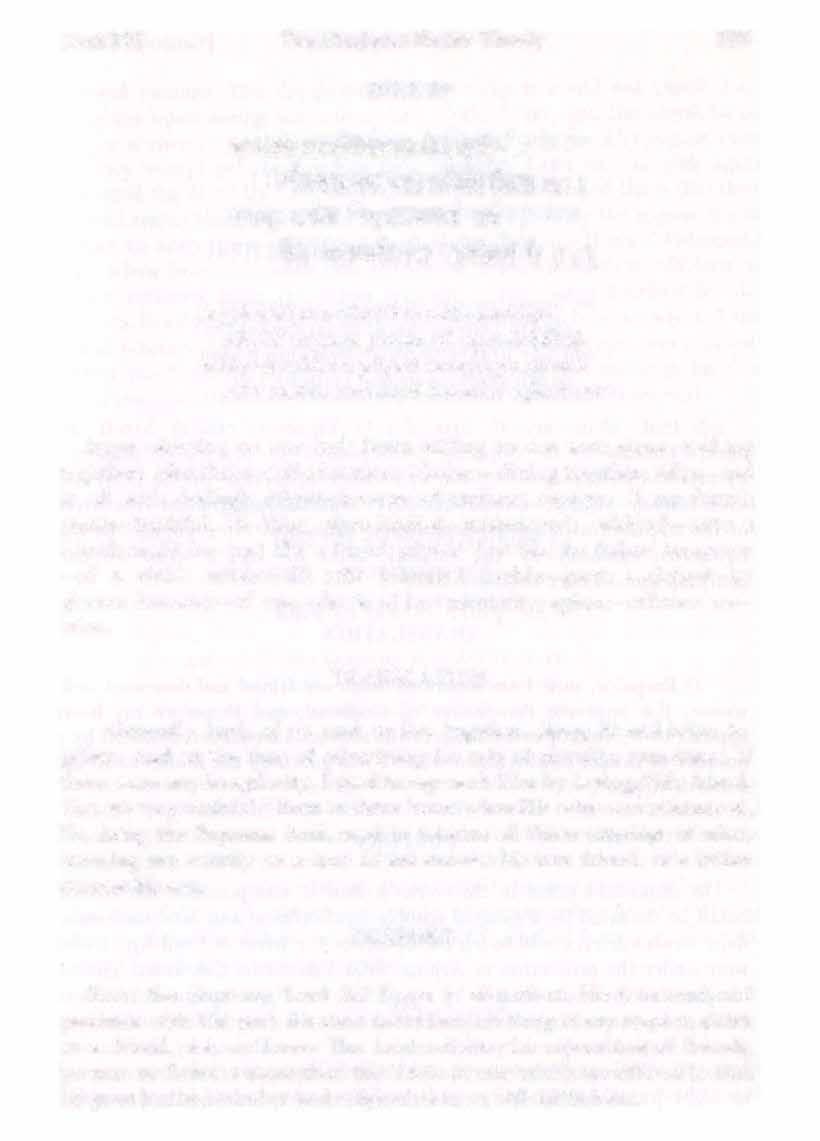
�t:qR'fwtll>wtN���wc+tl�wnft:
'"�fll�4�Slliji!llf;cf«�: I
�:�trfcHtct:qwt4�ri ��m.!11\�it����
sayyiisaniifana-vikatthana-bhojaniid4vaikyad vayasya rtavan iti vipra-labdha{l sakhyu� sakheva pitrvat tanayasya sarvam sehe mahan mahitayii kumater agham me
sayya-sleeping on one bed; asana-sitting on one seat; afana-walking together; vikatthana-self-adoration; bhojana-dining together; adi�u-and in all such dealings; aikyat-because of oneness; vayasya-0 my friend; . rtavan-truthful; iti-thus; vipra-labdha[l- misbehaved; sakhyu{l- unto a friend; sakha iva-just like a friend; pit.rvat-just like the father; tanayasya -of a child; sarvam-all; sehe-tolerated; mahan- great; mahitaya-by glories; kumate[l- of one who is of low mentality; agham- offense; memine.
TRANSLATION
Generally both of us used to live together, sleep, sit and loiter together. And at the time of advertising for acts of chivalry, sometimes, if there were any irregularity, I used to reproach Him by saying, "My friend, You are very truthful." Even in those hours when His value was minimized, He, being the Supreme Soul, used to tolerate all those utterings of mine, excusing me exactly as a true friend excuses his true friend, or a father excuses his son.
PURPORT
Since the Supreme Lord Sri Kr�!la is all-perfect, His transcendental pastimes with His pure devotees never lack anything in any respect, either as a friend, son or lover. The Lord relishes the reproaches of friends, parents or fiancees more than the Vedic hymns which are offered to Him· by great learned scholars and religionists in an official fashion.
Text 19] The r-ap�avas Retire Timely
795
31l4'"91�Sfi'iqTut�'fi· �
mq��{����msm 11�o1
so 'harh nrpendra rahital;. puru�ottamena sakhya priyer.a suhrda hrdayena sunyal;. adhvany urukrama-parigraham anga rak�an gopair asadbhir abaleva vinirjito 'smi

sal;.-that; aham-myself; nrpendra-0 Emperor; rahital;.-bereft of; puru§ottamena-by the Supreme Lord; sakhyii-by my friend; priye[laby my dearmost; suhrdii-by the well-wisher; hrdayena-by the heartand soul; siinya[l-vacant; adhvani-recently; urukrama-parigraham-the wives of the all-powerful;anga-bodies; rak§an-while protecting; gopail).-by the .cowherds; asadbhi[l.-by the infidels; abalii iva- like a weak woman; vinirjital;. asmi-I havebeen defeated.
TRANSLATION
0 Emperor, now I am separated from my friend anddearmostwellwisher, the Supreme Personality of Godhead, and therefore my heart appears to be voidof everything. In His absenceI havebeen defeated bya number of infidel cowherdmen while I was guarding the bodies of all the wivesof Kr�!la.
PURPORT
The important point in this verse is how it was possible that Arjuna could be defeated by a gang of ignoble cowherdmen and how such mundane cowherdmen could touch the bodies of the wives of Lord Krsna who were under the protection of Arjuna. Srila Vi8vanatha Cakravarti.Thakur has justifiedthe contradictionby researchinthe Vi§flU Puriifla and Brahma Puriifla. In these Puriiflas it is said that once the fair denizens of heaven pleased A�tavakra Muni by their service and were blessed by the Munito have the Supreme Lord as their husband. �tavakra Muni was curved in eight joints of his body, and thus he used to move in a peculiarly
796
Srimad-Bhagavatam
.....
TEXT 20 mst��:�()tt·h,fi-. �����:I
[Canto 1, Ch. 15
curved manner. The daughters of the demigods could not check their laughter upon seeing the movements of the Muni, and the Muni, being angry at them, cursed them that they would be kidnapped by rogues, even if they would get the Lord as their husband. Later on, the girls again satisfied the Muni by their prayers, and the Muni blessed them that they would regain their husband even after being robbed by the rogues. So, in order to keep the words of the great Muni, the Lord Himself kidnapped His wives from the protection of Arjuna, otherwise they would have at once vanished from the scene as soon as they were touched by the rogues. Besides that, some of the gopis who prayed to become wives of the Lord returned to their respective positions after their desire was fulfilled. After the departure of Lord Kr�!J.a, He wanted all His entourage back to Godhead, and they were called back under different conditions only.
TEXT 21

tad vai dhanus ta �avafi. sa ratho hayiis te so 'ham rathi nrpatayo yata iinamanti
sarvam k�a!lena tad abhud asad iSa-riktam
bhasman hutam kuhaka-raddham ivoptam uuam
tat-the same; vai-certainly; dhanu[l. te-the same bow; i§ava[l.-arrows; sa-the very same; ratha[l.- chariot; hayii[l. te-the very same horses; sa� aham-I am the same Arjuna; rathi-the chariot-fighter; n .rpataya[l.-all the kings; yata[l.-whom; iinamanti-offered their respects; sarvam-all; k�apena -at a moment's notice; tat-all those; abhiit-became; asat-useless; iSabecause of the Lord; riktam-being void; bhasmam-ashes; hutam-offering butter; kuhaka-riiddham-money created by magical feats; iva-like that; uptam-seed; ii�yiim-in barren land.
TRANSLATION
I have the very same Gii!J.�Va bow, the same arrows, the same chariot drawn by the same horses, and I use them as the same Arjuna to whom all

Text 21) The P�«Javas Retire Timely 797
the kings offered their due respects. But in the absence of Lord Kf�a, all of them, at a moment's notice, have become null and void. It is exactly like offering clarified butter on ashes , accumulating money with a magic wand or sowing seeds on barren land.
PURPORT
As we have discussed more than once, one should not be puffed up by borrowed plumes. All energies and powers are derived from the supreme source, Lord Kr�!la, and they act as long as He desires and cease to function as soon as He withdraws. All electrical energies are received from the powerhouse, and as soon as the powerhouse stops supplying energy, the bulbs are of no use. In a moment's time such energies can be generated or withdrawn by the supreme will of the Lord. Material civilization without the blessing of the Lord is child's play only. As long as the parents allow the child to play, it is all right. As soon as the parents withdraw, the child has to stop. Human civilization and all activities thereof must be dovetailedwith the supreme blessing of the Lord, and without this blessing all advancement of human civilization is like decoration on a dead body. It is said here that a dead civilization and its activities are something like clarified butter on ashes, the accumulation of money by a magic wand and the sowing of seeds in barren land.
rajarhs tvayanupr§tanarh


suhrdarh nab- suhrtpure
vipra-siipa-vimutjhanarh
nighnatarh mu��ibhir mithafi.
vam'!'-irh madirarh pitva
madonmathita-cetasam
ajanatam ivanyonyarh
catufi. paiicavaie�itafi.
798 Srimad-Bhagavatam [Canto 1, Ch. 15
riijan-0 King; tvayii-by you; anupr�tiiniim-as you inquired; suh,rdiimof friends and relatives; na�-our; suhrtpure-in the city of Dvaraka; vipra -the briihmaras; siipa-by the curse of; vimii!lhiiniim-of the befooled; nighnatiim-of the killed; mu�tibhifl-with bunches of sticks; mitha�among themselves; viirurim-fermented rice; madiriim-wine; pitvii-having drunk; madonmathita-being intoxicated; cetasiim-of that mental situation; ajiinatiim-of the unrecognized; iva-like; anyonyam-one another; catu�-four; panca-five; avase�itii�- now remaining.
TRANSLATION
0 King, since you have asked me about our friends and relatives in the city of Dvaraka, I will inform you that all of them were cursed by the brahm�as, and as a result they all became intoxicated with wine made of purifiedrice and fought<tmong themselves with sticks,not even recognizing one another. Now all but four or five of them are dead and gone. TEXT
priiyertaitad bhagavata

iSvarasya vice�titam
mitho nighnanti bhutiini
bhiivayanti ca yan mitha/;1
priiyerta etat-it is almost by; bhagavata�-of the Personality of Godhead; iSvarasya-of the Lord; vice�titam-by the will of; mitha�- one another; nighnanti-do kill; bhiitiini-the living beings; bhiivayanti-as also protect; ca-also; yat-of whom; mitha/;1-one another.
TRANSLATION
Factually this is all due to the supreme will of the Lord Personality of Godhead. Sometimes people kill one another, and at other times they protect one another.
Text 24) The P��avas Retire Timely 799
su��ij!{
{� f.f�� 1
24
lllffif
�f.n�Ht�¥W44H:qtrfflN:JJ�\lll
PURPORT
According to the anthropologists, there is nature's law of struggle for existence and survival of the fittest. But they do not know that behind the law of nature there is the supreme direction of the Supreme Lord Personality of Godhead. In the Bhagavad-gitii it is confirmed that the law of nature is executedunder thedirection of the Lord. Whenever, therefore, there is peace in the world it must be known that it is due to the good will of the Lord. And whenever there is upheaval in the world, it is also due to the supreme will of the Lord. Not a blade of grass moves without the will of the Lord. Whenever, therefore, there is disobedience of the established rules enacted by the Lord, there is war between men and nations. The surest way to the path of peace is, therefore, dovetailing everything to the established rule of the Lord. The established rule is that whatever we do, whatever we eat, whatever we sacrifice or whatever we give in charity must be done to the full satisfaction of the Lord. No one should do anything, eat anything, sacrifice anything or give anything in charity against the will of the Lord. Discretion is the better part of valor, and one must learn how to discriminate between actions which may be pleasing to the Lord and those which may not be pleasing to the Lord. An action is thus judged by the Lord's pleasure or displeasure. There is no·room for personal whims; we must always be guided by the pleasure of the Lord. Such action is called yoga-karmasya kausalam, or actions performed which are linked with the Supreme Lord. That is the art of doing a thing perfectly.
TEXTS 25-26

\11<-'Sl�iji� �u:.-Jt�Jrijt�ut'hm: 1
�f�m;:�wffi;r�;ft f4N: 11'<'-\11
�� ���(�f(ij(l( fq: I
��\'{4110( � tIL'<�II
jalaukasiirh jale yadvan
mahiinto 'danty artiyasafi, durbaliin balino rajan
mahanto balino mithafi, evarh bal�thair yadubhir
mahadbhir itaran vibhufi, yadiin yadubhir anyonyam
bhii.bharan saiijahara ha
800 Srimad-Bhiigavatam [Canto 1, Ch. 15
jalaukasiim-of the aquatics; jale-in the water; yadvat-as it is; mahiintafl.-the larger one; adanti-swallows; a11iyasaZ,.-smaller ones; durbaliin-the weak; balinaZ,.-the stronger; riijan-0 King; mahiinta[t- the strongest; balinafl.-less strong; mithaZ,.-in a duel; evam-thus; bali.§tha�by the strongest; yadubhiZ,.-by the descendants of Yadu; mahadbh�-one who has greater strength; itariin-the common ones; vibhuZ,.-the Supreme Personality of Godhead; yadun-all the Yadus; yadubhiZ,.-by the Yadus; anyonyam-among one another; bhubhiiriin-the burden of the world; saiijahiira-has unloaded; ha-in the past.
TRANSLATION
0 King, as in the ocean the bigger and stronger aquatics swallow up the smaller and weaker ones, so also the Supreme Personality of Godhead, to lighten the burden of the earth, has engaged the stronger Yadu to kill the weaker and the bigger Yadu to kill the smaller.
PURPORT
In the material world the struggle for existence and survival of the fittest are laws because in the material world there is disparity between conditioned souls due to everyone's desire to lord it over the material resources. This very mentality of lording it over the material nature is the root cause of conditioned life. And to give facility to such imitation lords, the illusory energy of the Lord has created adisparity between conditioned living beings by creating the stronger and the weaker in every species of life. The mentality of lording it over the material nature and the creation has naturally created a disparity and therefore the law of struggle for existence.In the spiritual world there is no suchdisparity,nor is there such a struggle for existence. In the spiritual world there is no struggle for existence because everyone there exists eternally. There is no disparity because everyone wants to render service to the Supreme Lord, and no one wants to imitate the Lord in becoming the beneficiary. The Lord, being creator of everything including the living beings, factually is the proprietor and enjoyer of everything that be, but in the material world, by the spell of miiyii or illusion, this eternal relation with the Supreme Personality of Godhead is forgotten, and so the living being is conditioned under the law of struggle for existence and survival of the fittest.
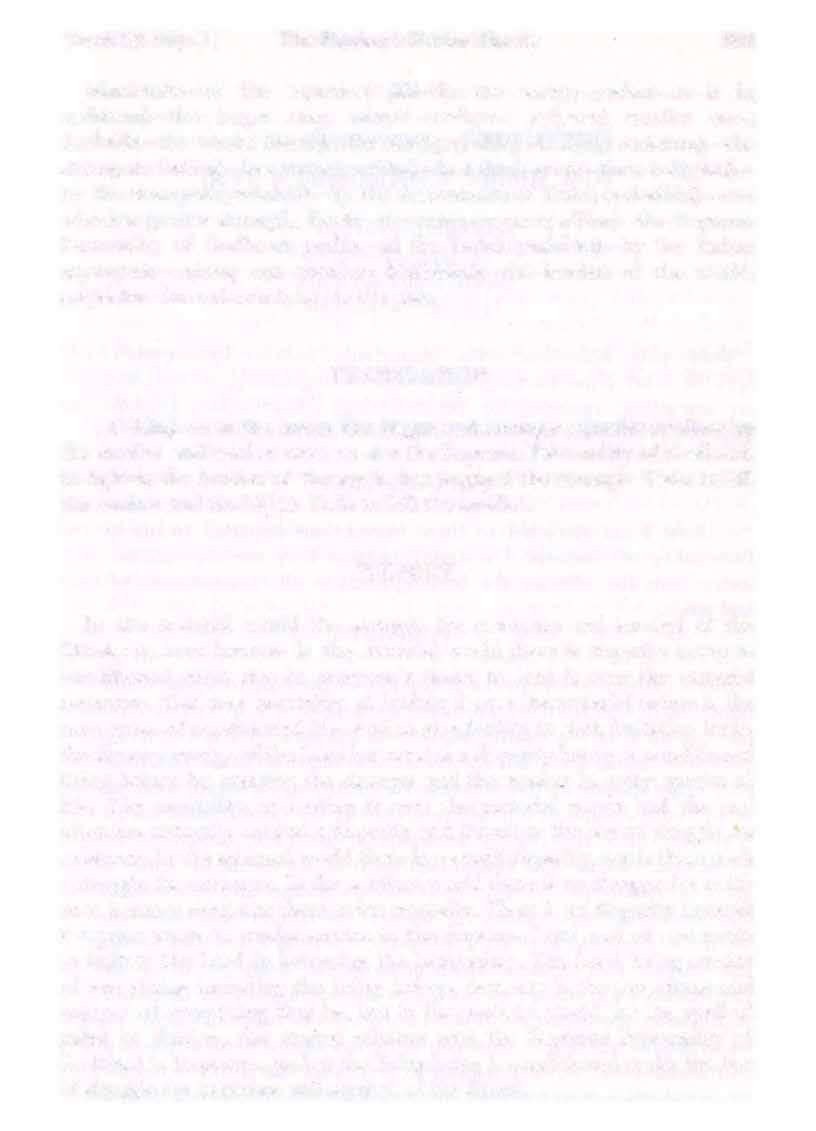
Texts 25-26] The P��avas Retire Timely 801
TEXT 27

�'••�•q$1iaf.t c�uilq,.m;r � 1 ��fl'nfil;;:::•fitoour.tit ���'-'II
desa-kOlartha-yuktani hrt-tapopasamani ca haranti smaratas cittam govindabhihitani me
desa- space; kala-time; artha-importance; yuktani-impregnated with; hrt-the heart; tapa-burning; upa8amani-extinguishing; ca-and; harantiare attracting; smarata�-by remembering; cittam-mind; govinda-the Supreme Personality of pleasure; abhihitiini-narrated by;me-unto me.
TRANSLATION
Now I am attracted to those instructions imparted to me by the Personality of Godhead [Govinda] because they are impregnated with instructions for relieving the burning heart in all circumstances of time and spac e.
PURPORT
Herein Arjuna refers to the instruction of the Bhagavad-gitii, which was imparted to him by the Lord in the Battlefield of Kuruk�etra. The Lord left behind Him the instructions of the Bhagavad-gita not only for the benefitof Arjunaalone, butalso for all time and in all lands. The Bhagavadgitii, being spoken by the Supreme Personality of Godhead, is the essence of all Vedic wisdom. It is nicely presented by the Lord Himself for all who have very little time to go through the vast Vedic literatures like the Upani.§ads, Puriiras and Vedanta-sutras. It is put within the study of the great historical epic Mahabharata, which was especially prepared for the less intelligent class, namely the women, the laborers and those who are worthless descendants of the brahmaras, k�atriyas and higher sections of the vaiSyas. The problem which arose in the heart of Arjuna on the Battlefield of Kuruk�etra was solved by theteachings of the Bhagavad-gita. Again, after the departure of the Lord from the vision of earthly people, when Arjuna was face to face with being vanquished in his acquired power and prominence, he wanted again to remember the great teachings of the Bhagavad-gita just to teach all concerned that the Bhagavad-gita could be consulted in all critical times, not only for solace from all kinds of mental
802 Srimad-Bhagavatam [Canto l, Ch. 15
agonies, but also for the way out of great entanglements which may embarrass one in some critical hour.
The merciful Lord left behind Him the great teachings of the Bhagavadgitii so that one can take the instructions of the Lord even when He is not visible to material eyesight. Material senses cannot have any estimation of the Supreme Lord, 'but by His inconceivable power, the Lord can incarnate Himself to the sense perception of the conditioned souls in a suitable manner through the agency of matter, which is also another form of the Lord's manifested energy. Thus the Bhagavad-gitii, or any authentic scriptural sound representation of the Lord, is also the incarnation of the Lord. There is no difference between the sound representation of the Lord and the Lord Himself. One can derive the same benefit from the Bhagavad-gitii as Arjuna did in the personal presence of the Lord.
The faithful human being who is desirous of being liberated from the clutches of material existence can very easily take advantage of the Bhagavad-gitii, and with this in view, the Lord instructed Arjuna as if Arjuna were in need of it. In the Bhagavad-gitii, five important factors of knowledge have been delineated pertaining to l) the Supreme Lord, 2) the living being, 3) nature, 4) time and space, and 5) the process of activity. Out of these, the Supreme Lord and the living being are qualitatively one. The difference between the two has been analyzed as the difference between the whole and the part and parcel. Nature is inert matter displaying the interaction of three different modes, and eternal time and unlimited space are considered to be beyond the existence of the material nature. Activities of the living being are different varieties of aptitudes which can entrap or liberate the living being within and without material nature. All these subject matters are concisely discussed in the Bhagavadgitii, and later the subject matters are elaborated in theSrimad-Bhiigavatam for further enlightenment. Out of the five subjects, the Supreme Lord, the living entity, nature and time and space are eternal, but the living entity, nature and time are under the direction of the Supreme Lord, who is absolute and completely independent of any other control. The Supreme Lord is the supreme controller. The material activity of the living being is beginningless, but it can be rectified by transferral into the spiritual quality. Thus it can cease its material qualitative reactions. Both the Lord and the living entity are cognizant, and both have the sense of identification, of being conscious as a living force. But the living being under the condition of material nature, called mahat-tattva, misidentifies himself as being different from the Lord. The whole scheme of Vedic wisdom is targetted to the aim of eradicating such a misconception and thus liberating the living being from the illusion of material identification. When such an illusion is eradicated by knowledge and renunciation, the living

Text 27] The P��avas Retire Timely 803
beings are responsible actors and enjoyers also. The sense of enjoyment in the Lord is real, but such sense in the living being is a sort of wishful desire only. This difference in consciousness is the distinction of the two identities, namely the Lord and the living being. Otherwise there is no difference between the Lord and the living being. The living being is therefore eternally one and different simultaneously. The whole instruction of the Bhagavad-gitii stands on this principle.
In the Bhagavad-gitii the Lord and the living beings are both described as saniitana, or eternal, and the Lord's abode far beyond the material sky is also described as saniitana. The living being is invited to live in the saniitana existence of the Lord, and the process which can help a living being to approach the Lord's abode, where the liberated activity of the soul is exhibited, is called saniitana-dharma. One cannot, however, reach the eternal abode of the Lord without being free from the misconception of material identification, and the Bhagavad-gitii gives us the clue how to achieve this stage of perfection. The process of being liberated from the misconception of material identification is called, in different stages, fruitive activity, empiric philosophy and devotional service, up to transcendental realization. Such transcendental realization is made possible by dovetailing all the above items in relation with the Lord. Prescribed duties of the human being, as directed in the Vedas, can gradually purify the sinful mind of the conditioned soul and raise him to the stage of knowledge. The purified stage of acquiring knowledge becomes the basis of devotional service of the Lord. As long as one is engaged in researching the solution of the problems of life, it is called jiiiina, or purified knowledge, but on realizing the actual solution of life, one becomes situated in the devotional service of the Lord. The Bhagavad-gitii begins with the problems of life by discriminating the soul from the elements of matter and proves by all reason and argument that the soul is indestructiblein all circumstances and that the outer covering of matter, the body and the mind, change for another term of material existence "hich is full of miseries. The Bhagavad-gitii is therefore meant for terminating all different types of miseries, and Arjuna took shelter of this great knowledge which was imparted to him before, during the Kuruk�etra battle.

804 Srimad-Bhagavatam [Canto 1, Ch. 15
28 �� � f\Mttt«t �:t)UI(QI4_(1(l(i(( I Qt(K•uRI•ni'1�s���:ll�'ll
TEXT
sii.ta uvaca evam cintayato i4rwl;l k�rta-piida-saroruham sauhardenatigat)hena santlis'id vimala matil;l

sutal;l uvtica-Siita Gosvami said; evam-thus; cintayata�-while thinking of the instructions; j�rw�-of the Supreme Personality of Godhead; knTJa-piida-the feet of Kr�I]a; saroruham-resembling lotuses; sauhiirdena -by deep friendship; atigii!lhena-in great intimacy; siintii-pacified; iisit- it so became; vimalil-without any tinge of material contamination; matil;lmind.
TRANSLATION
Siita Gosvami said: Thus being deeply absorbed in thinking of the instructions of the Lord, which were imparted in the great intimacy of friendship, and in thinking of His lotus feet, Arjuna's mind became pacified and free from all material contamination.
PURPORT
Since· the Lord is absolute, deep meditation upon Him is as good as yogic trance. The Lord is nondifferent from His name, form, quality, pastimes, entourage and specific actions. Arjuna began to think of the Lord's instructions to Him on the Battlefield of Kuruk�etra. Those instructions only began to eliminate the tinges of material contamination in the mind of Arjuna. The Lord is like the sun; the sun's appearance means immediate dissipation of darkness, or ignorance, and the Lord's appearance within the mind of the devotee can at once drive away the miserable material effects. Lord Caitanya has therefore recommended constant chanting of the name of the Lord for protection from all contamination of the material world. The feeling of separation from the Lordis undoubtedly painful to the devotee, but because it is in connection with the Lord, it has a specific transcendental effect which pacifies the heart. Feelings of separation are also sources of transcendental bliss, and they are never comparable to contaminated material feelings of separation.

Text 29) The P�«Javas
Retire Timely
805
I � f.r4f'HII�'t4NI*tN'tufl$r: �����
TEXT 29
Srimad-Bhagavatam
viisudeviinghry anudhyiina paribphhita-ramhasii bhaktya nirmathitiise�ak�iiya-dh4arto 'rjunal)
vasudeva-anghri-the lotus feet of the Lord; anudhyiina-by constant remembrance; parib . rrhhita-expanded; ramhasa-with great velocity; bhaktya- in devotion; nirmathita-subsided; a5e§a-unlimited; k�aya-dint; dh4acw�-conception; arjuna�-Arjuna.
TRANSLATION
Arjuna's constant remembrance of the lotus feet of Lord Sri Krsna rapidly increased his devotion, and as a result all the trash in his thoughts subsided.
PURPORT
Material desires in the mind are the trash of material contamination. By such contamination, the living being is faced with so many compatible and incompatible things that discourage the very existence of spiritual identity. Birth after birth the conditioned soul is entrapped with so many pleasing and displeasing elements which are all false and temporary. They accumulate due to our reaction to material desires, but when we get into touch with the transcendental Lord in His variegated energies by devotion:il service, the naked forms of all material desires become manifest, and the intelligence of the living being is pacified in its true color. As soon as Arjuna turned his attention towards the instructions of the Lord, as they are inculcated in the Bhagavad-gita, his true color of eternal association with the Lord became manifest, and thus he felt freed from all material contaminations.
TEXT 30

'f*.�ii+fu.tl�
gitam bhagavata jiianam
yat tat sangrama-miirdhani
kiila-karma-tamo-ruddham
punar adhyagamat prabhu�
806
[Canto I, Ch. 15
lfui 1Pf.m ..-f q_6({t«tUi'{lif.r I
�(Qitl'i€( q: II� o II
gitam-instructed; bhagavatii-by the Personality of Godhead;jniinamtranscendental knowledge; yat-which; tat-that; sahgriima-murdhani-in the midst of battle; kala-karma-time and actions; tama[l.-ruddhamenwrapped by such darkness; puna[!. adhyagamat-revived them again; prabhu[l.-the lord of his senses.
TRANSLATION
Because of the Lord's pastimes and activities and because of His absence, it appeared that Arjuna forgot the instructions left by the Personality of Godhead. But factually this was not the case, and again he became lord of his senses.
PURPORT
A conditioned soul is enwrapped in his fruitive activities by the force of eternal time. But the Supreme Lord, when He incarnates on the earth, is not influenced by kiila, or the material conception of past, present and future. The activities of the Lord are eternal, and they are manifestations of His iitma-miiyii, or internal potency. All pastimes or activities of the Lord are spiritual in nature, but to the laymen they appear to be on the same level with material activities. It so appeared that Arjuna and the Lord were engaged on the Battle of Kuruk�etra as the other party was also engaged, but factually the Lord was executing His mission of incarnation in association with His eternal friend Arjuna. Therefore such apparent material activities of Arjuna did not drive him away from his transcendental position, but on the contrary revived his consciousness of the songs of the Lord, as He sang them personally. This revival of consciousness is assured by the Lord in the Bhagavad-gitii as follows:
manmanii bhava mad-bhakto madyiiji miim namaskuru miim evainasi satyam te pratijiine priyo'si me.

(Bg.
18:65)
One should think of the Lord always;the mind should not forget Him. One should become a devotee of the Lord and offer obeisances unto Him. One who lives in that fashion becomes undoubtedly endowed with the blessing of the Lord by achieving the shelter of His lotus feet. There is nothing to· doubt about this eternal truth. Because Arjuna was His confidential friend, the secret was disclosed to him.
Arjuna had no desire to fight with his relatives, but he fought for the mission of the Lord. He was always engaged in the execution of His
Text 30) The P��avas Retire Timely 807
mission only, and therefore after His departure he remained in the same transcendental position, even though it appeared that he forgot all the instructions of the Bhagavad-gitii. One should, therefore, adjust the activities of life in pace with the mission of the Lord, and by doing this one is sure to return back home, back to Godhead. This is the highest perfection of life.
TEXT 31

f� illl(ii4:atl 6f5tti6d��: I
��ij�o·�ud����(iWW: II�tII
vi.Soko brahma-sampattyii sanchinna-dvaita-samsayafi. una-prakr:ti-nairgu1)yiid alingatviid asambhavafi.
viSokafl.- free from bereavement; brahma-sampattyii-by possession of spiritual assets; sanchinna- being completely cut off; dvaita-samsayafi.from the doubts of relativity; lina-merged in; prakrti- material nature; nairgu11yiit- due to being in transcendence; alingatviit- because of being devoid of a material body; asambhavafl. - free from birth and death.
TRANSLATION
Because of his possessing spiritual assets, the·doubts of duality were completely cut off. Thus he was freed from the three modes of material nature and placed in transcendence. There was no longer any chance of his becoming entangled in birth and death, for he was freed from material form.
PURPORT
Doubts of duality begin from the misconception of the material body, which is accepted as the self by less intelligent persons. The most foolish part of our ignorance is our identifying this material body with the self. Everything in relation with the body is ignorantly accepted as our own. Doubts due to misconceptions of myself and mine, in other words, my body, my relatives, my property, my wife, my children, my wealth, my country, my communitY, and hundreds and thousands of similar illusory contemplations, cause bewilderment for the conditioned soul. By assimi-
808 Srimad-Bhagavatam [Canto 1, Ch. 15
lating the instructions of the Bhagavad-gitii, one is sure to become released from such bewilderment because real knowledge is to know that the Supreme Personality of Godhead, Vasudeva, Lord Kf�-p.a, is everything, including one's self. Everything is a manifestation of His potency as part and parcel. The potency and the potent are nondifferent, so the conception of duality is at once mitigated by attainment of perfect knowledge.
As soon as Arjuna took up the instructions of the Bhagavad-gitii, expert as he was, he could at once eradicate the material conception of Lord Kr�!la, his eternal friend. He could realize that the Lord was still present before him by His instruction, by His form, by His pastimes, by His qualities and everything else related to Him. He could realize that Lord Kr�!la, his friend, was still present before him by His transcendental presence in different nondual energies, and there was no question of attainment of the association of the Lord by another change of body under the influence of time and space. By attainment of absolute knowledge, one can be in association with the Lord constantly, even in this present life, simply byhearing,chanting, thinking of andworshipingthe Supreme Lord. One can see Him, one can feel His presence even in this present life simply by understanding the advaya-jniina Lord, or the Absolute Lord, through the process of devotional service, which begins with hearing about Him. Lord Caitanya says that simply by chanting the holy name of the Lord one can at once wash off the dust on the mirror of pure consciousness, and as soon as the dust is removed, one is at once freed from all material conditions. To become free from material conditions means to liberate the soul. As soon as one is, therefore, situated in absolute knowledge, his material conception of life is removed or emerges from a false conception of life. Thus the function of the pure soul is revived in spiritual realization. This practical realization of the living being is made possible due to his becoming free from the reaction of the three modes of material nature, namely goodness, passion and ignorance. By the grace of the Lord, a pure devotee is at once raised to the place of the Absolute, and there is no chance of the devotee becoming materially entangled again in conditioned life. One is not able to feel the presence of the Lord in all circumstances until one is endowed with the required transcendental vision made possible by devotional service prescribed in the revealed scriptures. Arjuna attained this stage long before on the Battlefield of Kuruk�etra, and when he apparently felt the absence of the Lord, he at once took shelter of the instructions of the Bhagavad-gitii, and thus again he was placed in his original position. This is the position of vi5oka, or the stage of being freed from all grief and anxieties.

Text 31] The P��avas Retire Timely 809
TEXT 32
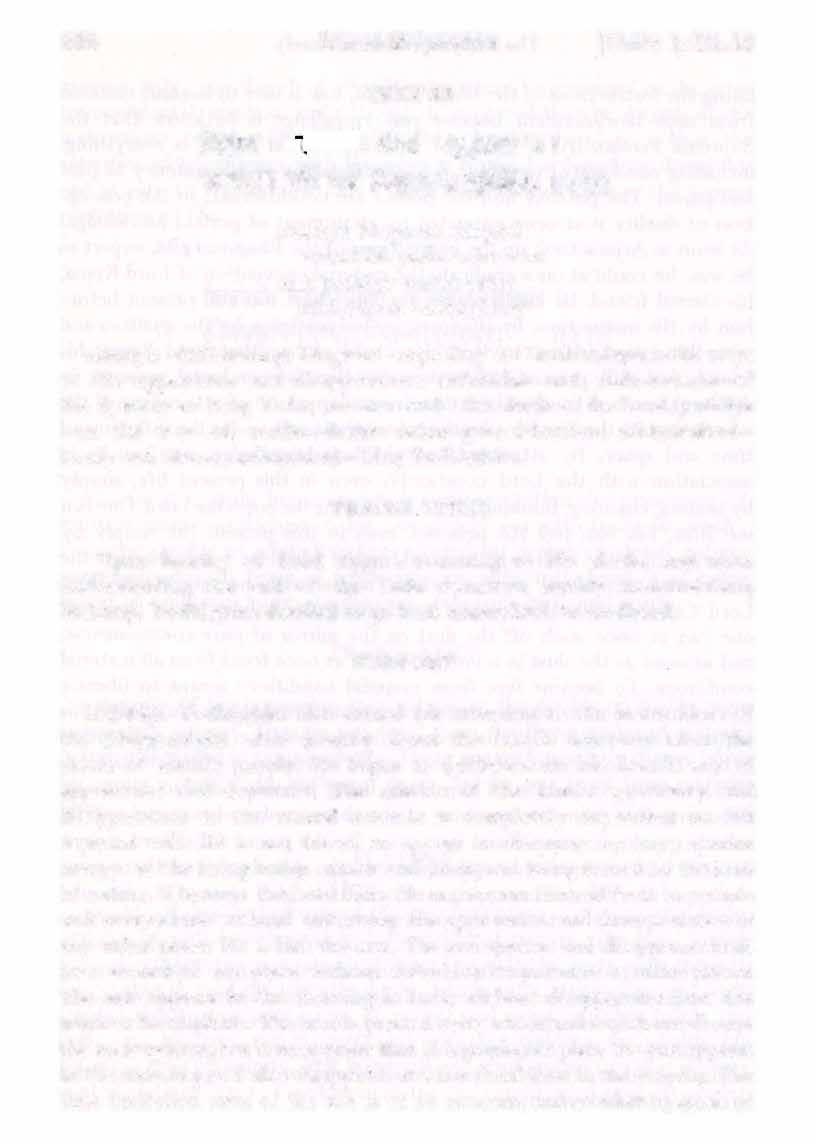
� m �l�� 'lEI 1
�:'mlf mff����: ����II
niSamya bhagavan margam samstham yadu-kulasya ca sva� pathiiya matim cakre nibhrtiitmii yudh4thira�
niSamya- deliberating; bhagavat-regarding the Lord; mii11l'am- the ways of His appearance and disappearance; samstham-end; yadu-kulasya-of the dynasty of King Yadu; ca-also;sva�-the abode of the Lord; pathaya -on the way of; matim-desire; cakre-gave attention; nibhrta-atmiilonely and alone; yudh4thira�-King Yudhi�thira.


TRANSLATION
Upon hearing of Lord Kr�!ia's returning to His abode, and upon understanding the end of the Yadu dynasty's earthly manifestation, Maharaja Yudhi�thira decided to go back home, back to Godhead.
PURPORT
Maharaja Yudhi�thira also turned his attention to the instructions of the Bhagavad-gitii after hearing about the Lord's departure from the vision of earthly people. He began to deliberate on the Lord's way of appearance and departure. The mission of the Lord's appearance and disappearance in the mortal universe is completely dependent on His supreme will. He is not forced to appear or disappear by any superior energy, as the living beings appear and disappear, being forced bythe laws of nature. Whenever the Lordlikes, He can appear Himselffrom anywhere and everywhere without disturbing His appearance and disappearance in any other place. He is like the sun. The sun appears and disappears on its own accord at any place without disturbing its presence in other places. The sun appears in the morning in India without disappearing from the western hemisphere. The sun is present everywhere and anywhere all over the solar system,but it so appears that in aparticularplace the sunappears in the morning and also disappears at some fixed time in the evening. The time limitation even of the sun is of no concern, and so what to speak of
810 Srimad-Bhagavatam [Canto 1, Ch. 15
the Supreme Lord who is the creator and controller of the sun. Therefore, in the Bhagavad-gitii it is stated that anyone who factually understands the transcendental appearance and disappearance of the Lord by His inconceivable energy becomes liberated from the laws of birth and death and is placed in the eternal spiritual sky where the Vaikuptha planets are. There such liberated persons can eternally live without the pangs of birth, death, old age and disease. In the spiritual sky the Lord and those who are eternally engaged in the transcendental loving service of the Lord are all eternally young because there is no old age and disease, and there is no death. Because there is no death there is no birth. It is concluded therefore that simply by understanding the Lord's appearance and disappearance in truth, one can attain the perfectional stage of eternal life. Therefore, Maharaja Yudhi�thira also began to consider going back to Godhead. The Lord appears on the earth or any other mortal planet along with His associates who live with Him eternally, and the members of the Yadu family who were engaged in supplementing the pastimesof the Lord are no other than His eternal associates and so also Maharaja Yudh�thira and his brothers and mother, etc. Since the appearance and disappearance of the Lord and His eternal associates are transcendental, one should not be bewildered by the external features of appearance and disappearance. ·
TEXT 33

prthiipy anusrutya dhanaiijayoditam
nasam yaduniim bhagavad gatim ca tam

ekiinta-bhaktyii bhagavaty adhok�aje
nivesitiitmoparariima samsrte/;1.
prthii-Kunti; api-also; anusrutya- overhearing; dhanaiijaya-Arjuna; uditam-uttered by; nii5am-end; yaduniim-of the Yadudynasty; bhagavat -of the Personality of Godhead; gatim-disappearance; ca-also; tam-all those; eka-anta- unalloyed; bhaktyii-devotion; bhagavati-unto the Supreme Lord, Sri Kreyqa; adhok�aje-transcendence; nivesita-iitmii-with full attention; uparariima -became released from; samsrte[l-material existence.
Text 33] The P��avas Retire Timely 811
TRANSLATION
Kunti, after overhearing Arjuna's telling of the end of the Yadu dynasty and disappearance of Lord Kr�tta, engaged in the devotional service of the transcendental Personality of Godhead with full attention and thus gained release from the course of material existence.
PURPORT
The setting of the sun does not mean the end of the sun. It means that the sun is out of our sight. Similarly, the end of the mission of the Lord on a particular planet or universe only means that He is out of our sight. The end of the Yadu dynasty also does not mean that it is annihilated. It disappears, along with the Lord, out of our sight. As Maharaja Yudh�thira decided to prepare to go back to Godhead, so also Kunti decided, and thus she fully engaged herself in the transcendental devotional service of the Lord, which guarantees one passport for going back to Godhead after quitting this present material body. The beginning of devotional service of the Lord is the beginning of spiritualizing the present body, and thus an unalloyed devotee of the Lord loses all material contact in the present body. The abode of the Lord is not a myth, as is thought by the unbelievers or ignorant people, but one cannot reach there by any material means like a sputnik or space capsule. But one can certainly reach there after leaving this present body, and one must prepare himself to go back to Godhead by practicing devotional service. That guarantees a passport for going back to Godhead, and Kunti adopted it.
TEXT 34

�441((\wftlilt � ag m�: I
� «t�ill Ff :qalftRln: ����\ll
yayaharad bhuvo bharam
tam tanurh vijahavajafr.
ka{ltakarh ka{lfakeneva
dvayarh capiSitufr. samam
yaya-that by which; aharat-took away; bhuvafr.-of the world; bhiiram -burden; tiim-that; tanum-body; vijahau-relinquished; aja�-the unborn; ka!lfakam-thorn; ka{lfakena-by the thorn; iva-like that; dvayamboth; ca-also; api-although; iSitu�-controlling; samam-equal.
812 Srimad-Bhagavatam [Canto 1, Ch. 15
The Supreme Unborn Lord Sri Kr��a caused the members of theYadu dynasty to relinquish their bodies, and thus He relieved the burden of the world. This action was like picking out a thorn with a thorn, though both are the same to the controller.
PURPORT
Srila Visvanatha Cakravarti Thakur suggests that the [§is like Saunaka and others who were hearing Srimad-Bhiigavatam from Suta Gosvami at Naimi�ara�ya were not happy to hear about the Yadus' dying in the madness of intoxication. To give them relief from this mental agony, Suta Gosvami assured them that the Lord caused the members of the Yadu dynasty to relinquish their bodies by which they had to take away the burden of the world. The Lord and His eternal associates appeared on earth to help the administrative demigods in eradicating the burden of the world. He therefore called for some of the confidential demigods to appear in the Yadu family and serve Him in His great mission. After the mission was fulfilled, the demigods, by the will of the Lord, relinquished their corporeal bodies by fighting amongst themselves in the madness of intoxication. The demigods are accustomed to drinking soma-rasa beverage, and therefore the drinking of wine and intoxication are not unknown to them. Sometimes they were put into trouble for indulging in intoxication. Once the sons of Kuvera fell in the wrath of Narada for being intoxicated, but afterwards they regained their original forms by the grace of the Lord Sri Kr��a. We shall find this story in the Tenth Canto. For the Supreme Lord, both the asuras and the demigods are equal, but the demigods are obedient to the Lord, whereas the asuras are not. Therefore, the example of picking out a thorn by another thorn is quite befitting. One thorn, which causes pinpricks on the l�g of the Lord, is certainly disturbing to the Lord, and the other thorn, which takes out the disturbing elements, certainly gives service to the Lord. So although every living being is a part and parcel of the Lord, still one who is a pinprick of the Lord is called an asura, and one who is a voluntary servitor of the Lord is called a devatii or demigod. In the material world the devatiis and asuras are always contending, and the devatiis are always saved from the hands of the asuras by the Lord. Both of them are under the control of the Lord. The world is full of two kinds of living beings, and the Lord's mission is always to protect the devatiis and destroy the asuros, whenever there is such need in the world, and to do good to both of them.

Text 34] The P��avas Retire Timely 813
TRANSLATION
TEXT 35

���qlfUT�G\Iflt�;roI �:� it-1 iil(l � W=:t((����II
yatha matsyadi-riipiirti
dhatte jahyad yatha natafl. bhubharafl. k�apito yena
jahau tac ca kalevaram
yathii-as much as; matsya-iidi-incarnation as a fish, etc.; rupiirti-forms; dhatte-eternally accepts; jahyiit-apparently relinquishes; yathii-exactly like; natalz.-magician;bhubhiirafl.-burden of the world; k§apitaft-relieved; yena-by which;jahau-let go;tat-that; ca-also; kalev aram-body .
TRANSLATION
The Supreme Lord relinquished the body which He manifested to diminish the burden of the earth. Just like a magician, He relinquishes one body to accept different ones, like the fish incarnation, etc.
PURPORT
The ,Supreme Lord Personality of Godhead is neither impersonal nor formless, but His body is nondifferent from Him, and therefore He is known as the embodiment of eternity, knowledge and bliss. In the Brhad-vai§rwva Tantra it is clearly mentioned that anyone who considers the form of the Lord Kr�!la to be made of material energy must be ostracized by all means. And if by chance the face of such an infidel is seen, one must clean himself by jumping in the river with his clothing. The Lord is described as amrta, or deathless, because He has no material body. Under the circumstances, the Lord's dying or quitting His body is like the jugglery of a magician. The magician shows by his tricks that he is cut into pieces, burnt into ashes or made unconscious by hypnotic influences, etc., but all are false shows only. Factually the magician himself is neither burnt into ashes nor is he cut into pieces nor is he dead or unconscious at any stage of his magical demonstration. Similarly, the Lord has His eternal forms of unlimited variety of which the fish incarnation, as was exhibited within this universe, is also one. Because there are innumerable universes, somewhere or other the fish incarnation must be manifesting His pastimes without cessation. In this verse, the particular
814 Srimad-Bhagavatam [Canto 1, Ch. 15
word dhatte, eternally accepted, (and not the word dhatva, accepted for the occasion) is used. The idea is that the Lord does not create the incarnation of fish; He has eternally such a form, and the appearance and disappearance of such an incarnation serve particular purposes. In the Bhagavad-gitii the Lord says (Bg. 7.24-25), "The impersonalists think that I have no form and that I am formless, but that at present I have accepted a form to serve a purpose, and now I am manifested. But such speculators are factually without sharp intelligence. Though they may be good scholars in the Vedic literatures, they are practically ignorant of My inconceivable energies and My eternal forms of Personality. The reason is that I reserve the power of not being exposed to the nondevotees by My mystic curtain. The less intelligent fools are therefore unaware of My eternal form, which is never to be vanquished and is unborn." In th� Padma Puriirw it is said that those who are envious and always angry at the Lord are unfit to know the actual and eternal form of the Lord. In the Bhiigavatam also it is said that the Lord appeared like a thunderbolt to those who were wrestlers. Sisupala, at the time of being killed by the Lord, could not see Him as Kr�!J.a, being dazzled by the glare of the brahmajyoti. Therefore, the temporary manifestation of the Lord as a thunderbolt to the wrestlers appointed by Kamsa, or the glaring appearance of the Lord before Sisupala, etc., were relinquished by the Lord, but the Lord as a magician is eternally existent and is never vanquished in any circumstance. Such forms are temporarily shown to the asuras only, and when such exhibitions are withdrawn, the asuros think that the Lord is no more existent, just as the foolish audience thinks the magician to be burnt to ashes or cut into pieces. The conclusion is that the Lord has no material body, and therefore He is never to be killed or changed by His transcendental body.


TEXT


fext 36] The P�c:lavas Retire Timely 815
36 � � lltF{Tf.prt 'lit � � �ceoft:qe�: 1 �: •m(;qqJa u ���� yada mukundo bhagavan imam mahzrh jahau sva tanva sraval)tya-satkathaft tadaharevaprati-buddha-cetasam abhadra-hetuft kalir anvavartata
yada-when; mukunda�-Lord Kr�IJa; bhagavan-the Personality of Godhead; imam-this; mahim-ea rth; jahau-left; sva tanva-with His selfsame body; sraviiriya-satkatha�- hearing about Him is worthwhile; tadaat that time; ahareva-from the very day; aproti-buddha-cetasam-of those whose minds are not sufficiently developed; abhadra-hetu�-cause of all ill fortune; kali� anvavartata-Kali fully manifested.
TRANSLATION
When the Personality of Godhead Lord Kr�!la left this earthly planet in His selfsame form, from that very day Kali, who had appeared partially before, became fully manifest to create inauspicious conditions for tho8e who are endowed with a poor fund of knowledge.
PURPORT
The influence of Kali can be enforced only upon those who are not fully developed in God consciousness. One can neutralize the effects of Kali by keeping oneself fully under the supreme care of the Personality of Godhead. The age of Kali ensued just after the Battle of Kuruk�etra, but it could not exert its influence because of the presence of the Lord. The Lord, however, left this earthly planet in His own transcendental body, and as soon as He left, the symptoms of the Kali-yuga, as were envisioned by Maharaja Yudhi�thira prior to Arjuna's arrival from Dvaraka, began to manifest, and Maharaja Yudhi�thira rightly conjectured on the departure of the Lord from earth. As we have already explained, the Lord left our sight just as when the sun sets it is out of our sight.
TEXT 37

�mm�qf«14ot � �
R'llott �'11®��=;rst tl+l�lq �"�"''
yudhi�thiras tat parisarparam budha� pure ca r�tre ca grhe tathiitmani
vibhiivya lobhiinrta-jihma-himsaniidy
m/hnrmn-rnkrnm. tmmn.niivn nnrvndh.iit
816 Srimad-Bhagavatam [Canto 1, Ch. 15
liJI
liJI
6tiiSS�+tfwll
�
�
yudh4thira[l-MaharajaYudhi�thira;tat-that;parisarpa!l-am-expansion; budha[t-thoroughly experienced;pure-in the capital;ca-as also;rii§frein the state; ca-and; grhe-at home; tathii-as also; iitmani-in person; vibhiivya-in creating; lobha-avarice; anrta-untruth; jihma-diplomacy; hirhsaniidi-violence, envy; adharma-irreligion; cakram-a vicious circle; gamaniiya-for departure;paryadhiit-dressed himself accordingly.
TRANSLATION
Maharaja Yudhi�hira was intelligent enough to understand the influence of the age of Kali (characterized by increasing avarice, falsehood, cheating and violence throughout the capital, state and home and among individuals). So he wisely prepared himself to leave home, and he dressed accordingly.
PURPORT
The present age is influenced by the specific qualities of Kali, and since the days of the Battle of Kuruk�etra, about five thousand years ago, the influence of the age of Kali began manifesting, and from authentic scriptures it is learned that the age of Kali is still to run on for 427,000 years. The symptoms of the Kali-yuga, as mentioned above, namely avarice, falsehood, diplomacy, cheating, nepotism, violence and all such things, are already in vogue, and no one can imagine what is going to· happen gradually with further increase of the influence of Kali till the day of annihilation. We have already come to know that the influence of the age of Kali is meant for godless so-called civilized man, otherwise those who are under the protection of the Lord have nothing to fear from this horrible age. Maharaja Yudhi�thira was a great devotee of the Lord, and there was no necessity of his being afraid of the age of Kali, but he preferred to retire from active household life and prepare himself to go back home, back to Godhead. The Part�avas are eternal companions of the Lord, and therefore they are more interested in the company of the Lord than anything else. Besides that, being an ideal king, Maharaja Yudhi�thira wanted to retire just to set an example for others. As soon as there is some young fellow to look after the household affairs, one should at once retire from family life to uplift oneself to spiritual realization. No one should rot in the dark well of household life till one is dragged by the will of Yamaraja. Modern politicians should take lessons from Maharaja Yudhi�thira about voluntary retirement from active life and should make room for the voun�Yer �Yeneration. Also retired old !!entlemen should take a

Text 37) The P��avas Retire Timely 817
lesson from him and leave home for spiritual realization before forcefully dragged away to meet death.
TEXT 38

�qW A;rPoiww+u€+1;u �gal: 1 \ft�;ftoq1: qB \�<��� ll�lU
svariit pautram vinayinam atmana� susamam gu"{la* toyanivyiifl. patim bhiimer abhya�incad gajahvaye
svariit-theemperor;pautram--untothegrandson;vinayinam--properly trained; iitmanafl-his own self; susamam-equal in all respects;gurzai�-by the qualities; toyanivyii� - outskirted bythe seas;pat im- master; bhiime�of the land; abhya§iiicat-enthroned; gajiihvaye-in the capital of Hastinapura.
TRANSLATION
Thereafter, in the capital of Hastinapura, he enthroned his grandson, who was trained and equally qualified, as the emperor and master of all land bordered by the seas.
PURPORT
The total land on the earth bordered by the seas was under the subjugation of the King of Hastinapura. Maharaja Yudhi�thira trained his grandson Maharaja Parik�it, who was equally qualified, in state administra� tion in terms of the king's obligation to the citizens. Thus Parik�it was enthroned on the seat of Maharaja Yudhi�thira prior to his departure back to Godhead. Concerning Maharaja Parik;;it, the specific word used, vinayinam, is significant. Why was the King of Hastinapura, at least till the time of Maharaja Pan"k�it, accepted as the Emperor of the world? The onlyreasonisthat the people of the world were happy because of the good administration of the Emperor. The happiness of the citizens was due to the ample production of natural produce such as grains, fruits, milk, herbs, valuable stones, minerals and everything that the people needed. They
818 Srimad-Bhagavatam [Canto 1, Ch. 15
wereeven free from all bodily miseries, anxieties of mind, and disturbances caused by natural phenomena and other living beings. Because everyone was happy in all respects, there was no resentment, although there were sometimesbattles between the state kings for political reasons and supremacy. Everyone was trained to attain the highest goal of life, and therefore the people were also enlightened enough not to quarrel over trivialities. The influence of the age of Kali gradually infiltrated the good qualities ofboth the kingsandthe citizens, and therefore a tense situation developed between the ruler and the ruled, but still even in this age of disparity between theruler and the ruled, there can be spiritual emolument and God consciousness. That is a special prerogative.
TEXT 39

mathurayam tatha vajram surasena-patim tatab, prafopatyam nirnpye�tim agnin apibat iSvara[l
mathurayam-at Mathura; tatha-also; vajram-Vajra; surasena-patimKingof the Surasenas; tatab,-thereafter;priijapatyiim-Prajapatya sacrifice; niriipya-having performed; �tim-goal; agnin- fire; apibat-placed in himself; iSvara[l-capable.
TRANSLATION
Then he posted Vajra, the son of Aniruddha (grandson of Lord l(r�Q.a), at Mathura as the King of Surasena. Afterwards Maharaja Yudhi��hira performed a Prajapati sacrifice and placed in himself the fire for quitting household life.
PURPORT
Maharaja Yudhi��hira, after placing Maharaja Parik�it on the imperial throne of Hastinapura, and after posting Vajra, the great-grandson of Lord Kr��a, as the King of Mathura, accepted the renounced order of life. The
Text 39] The P��avas Retire Timely 819
�:
II�Q..Il
il'(lqf � ��Wfqfit
I smt..m fwt�f!'l'11Wifq4ta}q(:
system of four orders of life and four castes in terms of quality and work known as va'Tliisrama-dharma, is the beginning of real human life, and Maharaja Yudhi�thira, as the protector of this system of human activities, timely retired from active life as a sannyiisi, handing over the charge of the administration to a trained prince, Maharaja Parik�it. The scientific system of va'Tliisrama-dharma divides the human life in four divisions of occupation and four orders of life. The four orders of life as brahmaciiri, grhastha, viinaprastha and sannyiisa are to be followed by all, irrespective of the occupational division. Modern politicians do not wish to retire from active life, even if they are old enough, but Yudhi�thira Maharaja, as an ideal king, voluntarily retired from active administrative life to prepare himself for the next life. Everyone's life must be so arrangedthat the last stage of life, say at least the last fifteen to twenty years prior to death, can be absolutely devoted to devotional service of the Lord to attain the highest perfection of life. It is really foolishness to engage oneself all the days of one's life in material enjoyment and fruitive activities, because as long as the mind remains absorbed in fruitive work for material enjoyment, there is no chance of getting out from conditioned life or material bondage. No one should follow the suicidal policy of neglecting one's supreme task of attaining the highest perfection of life, namely going back home, back to Godhead.


TEXT 40
visrjya tatra tat sarvam dukiila-valayiidikam nirmamo nirahankaral). saiichinniisefla-bandhanal).

vis.rfya-relinquishing; tatra-all those; tat-that; sarvam-everything; duku la-belt; valayiidikam-and bangles; ninnama[l-uninterested; nirahankiira[l-unattached ; saiichinna-perfectly cut off; aSe�a-bandhana[l -unlimited attachment.
TRANSLATION
Maharaja Yudhi�hira at once relinquished all his garments, belt and ornaments of the royal order and became completely disinterested and unattached to everything.
820 Srimad-Bhligavatarn (Canto 1, Ch. 15
� � ffil.ri{'@'R��Ita.W( I � f.\((�1(: lf�oll
To become purified of material contamination is the necessary qualification for becoming one of the associates of the Lord. No one can become an associate of the Lord or can go back to Godhead without such purification. Maharaja Yudhi�thira, therefore, to become spiritually pure, at once gave up his royal opulence by dress and garments. The kasaya or saffron loincloth of a sannyiisi indicates freedom from all attractive material garments, and thus he changed his dress accordingly. He became disinterested in his kingdom and family and thusbecame freefrom all material contamination_or material designation. People are generally attached to various kinds of designations, namely the designations of family, society, country, occupation, wealth, position and many others. As long as one is attached to such designations, he is considered materially impure. The socalled leaders of men in the modern age are attached by national consciousness, but they do not know that such false consciousness is also another designation of the materially conditioned soul, and one has· to relinquish such designations before one can become eligible to go back to Godhead. Foolish people, however, adore such men who die in national consciousness, but here is an example of Maharaja Yudhi�thira, a royal king who prepared himself toleave this world without such national consciousness. And yet he is remembered even today because he was a great pious king, almost on the same level with the Personality of Godhead Sri Rama. And because people of the world were dominated by such pious ·kings, they were happy in all respects, and it was quite possible for such great emperors to rule the world.
TEXT 41

ilflf � 'Rfu � � l'f (11{ I 't€ql:tqlwf � dq�� mHII
viicam juhiiva manasi
tat priirta itare ca tam rru;tyiiv apiinam sotsargam
tam pancatve hy ajohavit
vacam-speeches;juhiiva-relinquished;manasi-into the mind;tatprape -mind into breathing;itare ca-other senses also;tam-into that;m[tyauintodeath;apiinam-breathing;sa-utsa�gam-withall dedication;tam-that; paiicatve-into the body made of five elements;hi-certainly;ajohavitamalgamated it.
Text 41] The P��avas Retire Timely 821
PURPORT
Then he amalgamated all the sense organs into the mind,then the mind into life, life into breathing, his total existence into the embodiments of the five elements and his body into death. Then as pure self, he became free from the material conception of life.
PURPORT
Maharaja YU<lhi�hira, like his brother Arjuna, began to concentrate and gradually became freed from all material bondage. First of all he concentrated all the actions of the senses amalgamated in the mind, or in other words he turned his mind �owards transcendental service of the Lord. He prayed that all material activities were performed by the mind, actions and reactions of the material senses, and since he was going back to Godhead,the mind would wind up its material activities and be turned towards the transcendental service of the Lord. There was no longer need for material activities. Actually the activities of the mind cannot be stopped because they are the reflection of the eternal soul, but the quality of the activities can be changed from matter to the transcendental service of the Lord. The material color of the mind is changed by washing it from contaminations of life-breathing and thereby getting it freed from the contamination of repeated births and deaths and getting it situated in pure spiritual life. All is manifested by the temporary embodiment of the material body, which is a production of mind at the time of death, and if the mind is purified by practice of transcendental loving service of the Lord, and the same is constantly engaged in the service of the lotus feet of the Lord, there is no more chance of the mind's producing another material body after death. It will be freed from the absorption of material contamination. The pure soul will be able to return back home, back to Godhead. TEXT

822 Snmad-Bhigavatun [Canto 1, Ch. 15
TRANSLATION
42 ��q���S'i�"'f.tt: I 64¥tk4fi'�HJ441VflAIAII�� 11��11 tritve hutvii ca paiicatvam tac caikatve }uhon muni� saroam atmany ajuhavid brahmaCJy atmiinam avyaye
tritve-into the three qualities; hutvii-having offered; ca-also; paiicatvam-five elements; tat-that; ca-also; ekatve-in one nescience; ajuhot-amalgamated; muni[l-the thoughtful; saroam-the sum total; iitmani-in the soul; ajuhavit-fixed; brahmap.i-unto the spirit; iitmiinamthe soul; avyaye-unto the inexhaustible.
TRANSLATION
Thus annihilating the gross body of five elements into the three qualitative modes of material nature, he merged them in one nescience and then absorbed that nescience in the self, Brahman, which is inexhaustible in all circumstances.
PURPORT
All that is manifested in the material world is the product of the mahattattva avyakta, and things that are visible in our material vision are nothing but combinations and permutations of such variegated material products. But the living entity is different from such material products. It is due to the living entity's forgetfulness of his eternal nature as eternal servitor of the Lord, and his false conception of becoming a so-called lord of the material nature, that he is obliged to enter into the existence of false sense enjoyment. Thus a concomitant generation of material energies is the principal cause of the mind's being materially affected. Thus the gross body of five elements is produced. Maharaja Yudhi�thira reversed the action and merged the five elements of the body in the three modes of material nature. The qualitative distinction of the body as being good, bad or mediocre is extinguished, and again the qualitative manifestations become merged in material energy, which is produced from a false sense of the pure living being. When one is thus inclined to become an associate of the Supreme Lord, the Personality of Godhead, in one of the innumerable planets of the spiritual sky, especially in Goloka Vrndavana, one has to think always that he is different from the material energy; he has nothing to do with it, and he has to realize himself as pure spirit or Brahman, qualitatively equal with the Supreme Brahman (Paramesvara). Maharaja Yudhi�thira, after distributing his kingdom to Pan""k�it and Vajra, did not think himself Emperor of the world nor head of the Kuru dynasty. This sense of freedom from material relations, as well as freedom from material encagement of the gross and subtle encirclement, makes one free to act as the servitor of the Lord, even though one is in the material world. This stage is called jivanmukta stage, or the liberated stage, even in the

Text 42) The Piif.t�avas Retire Timely 823
material world. Thatis the process of ending material existence. One must not only thinkthat he is Brahman, but he must act like Brahman. One who only thinks himself Brahman is an impersonalist. And one who acts like Brahman is the pure devotee.
TEXT 43 M(I�IU ...iffi�: 1
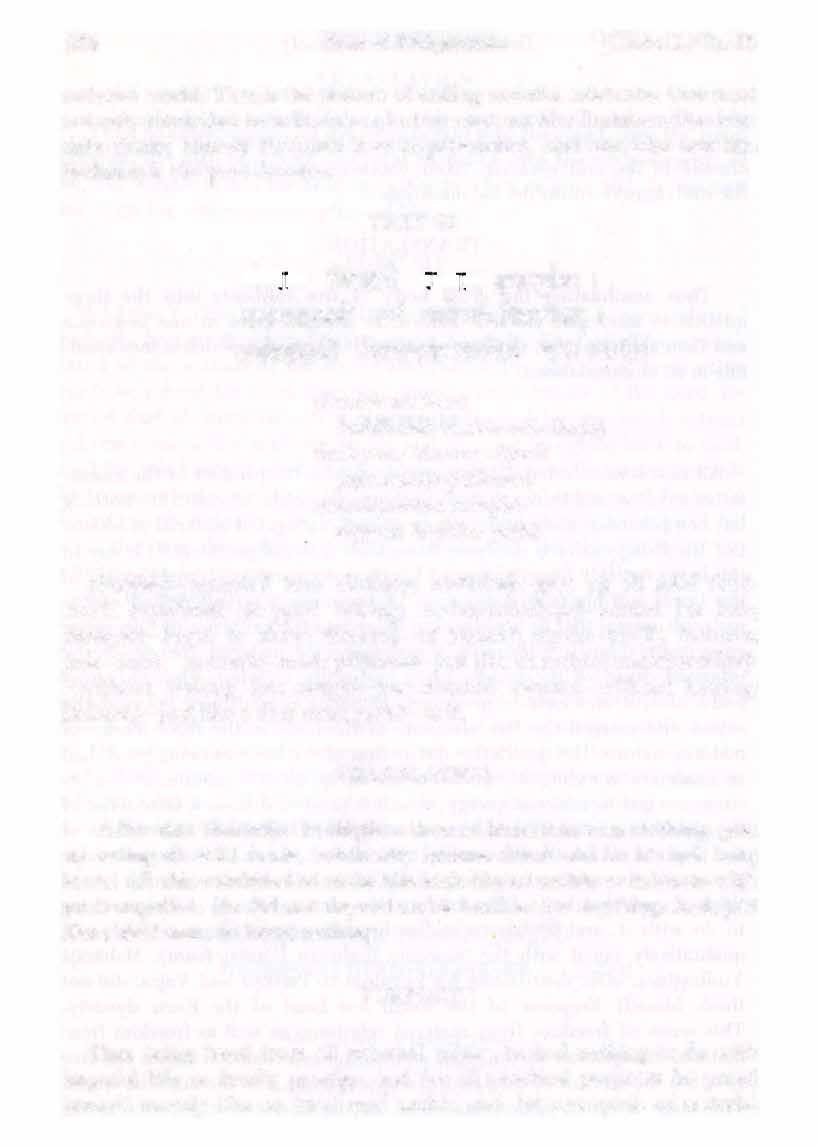
� iftl��l'qCI<( I � M(411�iiluf4+1NU :q'1f1 ������
c'iravasii nirohiiro baddhaviin mukta-miirdhaja!J darsayann iitmano riipam jafjonmatta-piSacavat anavek�amiir-o niragiid asnwan badhiro yathii
ciravasa[l-accepted torn clothing; nirahiiraft-gave up all solid foodstuff; baddhavak-stopped talking; mukta-miirdhaja[l-untied his hair; darsayan-began to show; atmana[l-of himself; riipam-bodily features; jafja-inert; unmatta-mad; piSacavat-justlike an urchin; anavek�amarw[l -without waiting for; niragat-was situated; asnwan-without hearing; badhira[l-just like a deaf man; yatha-as if.





TRANSLATION
After that Maharaja Yud�!hira dressed himself in torn clothing, gave up eating all solid foods, voluntarily became dumb and let his hair hang loose. All this combined to make him look like an urchin or madman with no occupation. He did not depend on his brothers for anything. And, just like a deaf man, he heard nothing.
PURPORT
Thus being freed from all external affairs, he had nothing to do with imperial life or family prestige, and for all practical purposes· he posed himself exactly like an inert mad urchin and did not speak of material
824 Srimad-Bhagavatam [Canto l, Ch. 15
(�4tkil;ft
affairs. He had no dependence on his brothers who had all along been helping him. This stage of complete independence from everything is also called the purified stage of fearlessness.
� q -R \q1�4ll'4iij� rm: lt\l\lll
udicirh pravivesasarh gata-puroarh mahatmabhi"(l
hrdi brahma param dhyiiyan niivarteta yato gata�
udicim-the northern side; pravivesasam-those who wanted to enter there;gata-purotim-the path accepted by his forefathers; maha-atmabhifi.by the broad-minded; hrdi-within the heart; brahma-the Supreme; param -Godhead; dhyayan-constantly thinking of;na avarteta- passed his days; yatafl-wherever;gatafl-went.
TRANSLATION
He then started towards the North, treading the path which was accepted by his forefathers and great men, to devote himself completely to the thought of the Supreme Personality of Godhead. And he lived in that way wherever he went.
PURPORT
It is understood from this verse that Maharaja Yudhi�thira followed in the footsteps of his forefathers and the great devotees of the Lord. We have discussed many times before that the system of varrJisrama-dharma, as it was strictly followed by the inhabitants of the world, specifically by those who inhabited the Aryavarta province of the world, emphasizes the importance of leaving all household connections at a certain stage of life. The training and education was so imparted, and thus a respectable person like Maharaja Yudhi�thira must leave .all family connection for selfrealization and going back to Godhead. No king or respectable gentleman would continue family life till the end because that was considered suicidal

Text44] The Piil)..,avas Retire Timely 825
TEXT44 � stfct����li � ¥1(1�¥1111: I
and against the interest of the perfection of human life. In order to be free from all family encumbrances and devote oneself cent percent in the devotional service of Lord Krllqa, this system is always recommended for everyone because it is the path of authority. The Lord instructs in the Bhagavad-gitii (Bg. 18.62) that one must become a devotee of the Lord at least at the last stage of one's life. A sincere soul of the Lord like Maharaja Yu�thira mustabide by thisinstruction of the Lord for his owninterest. The specific words Brahman Param indicate Lord Sri Kr�!J.a. This is corroborated inthe Bhagavad-gitii (Bg. 10.12) by Arjuna with reference to great authorities like Asita, Devala, Narada, Vyasa, etc. Thus Maharaja Yudhi�thira, while leaving home for the North, constantly remembered Lord Sri Kr�Qa within himself, following in the footsteps of his forefathers as well as the great devotees of all times.
TEXT 45


saroe tam anunirjagmur
bhriitarafl krta-niScayiifl kaliniidharma mitrerta
d�tvii spr�tiifl prajii bhuvi
san,e-all his younger brothers; tam-him; anunirjagmu[l.-left home by following the elder; bhratara[l.-brothers; krta-niScaya[l.-decidedly; kalinaby the age of Kali; adharma-principle of irreligion; mitrep.a-by the friend; dntva-observing; sprfltii[i.-having overtaken; praja[l.-all citizens; bhuvi- on the earth.


TRANSLATION
The younger brothers of Maharaja Yud�thira observed that the age of Kali had already arrived throughout the world·and that the citizens of the kingdom were already affected by irreligious practice. Therefore they decided to follow in the footsteps of their elder brother.
PURPORT
The younger brothers of Maharaja Yudhi�thira were already obedient followers of the great Emperor, and they had sufficiently been trained to know the ultimate goal of life. They therefore decidedly followed their eldest brother in rendering devotional service to Lord Sri Kr�!la. According
826 Srimad-Bhagavatam [Canto I, Ch. 15
� ���RR: f){'IMJAJ:
� �'W: �� � u�J�u
I
to the principles of saniitana-dharma, one must retire from family life after half the duration of life is finished and must engage himself in selfrealization. But the question of engaging oneself is not always decided. Sometimes retired men arebewildered about how to engage themselves for the last days of life. Here is a decision by authorities like the Pa1,19avas. All of them engaged themselves in culturing favorably the devotional service of Lord Sri Kr�1,1a, the Supreme Personality of Godhead. According to Svanii Sridhara, dharma, artha, kiima and mok�a, or fruitive activities, philosophical speculations or salvation, as conceived by several persons, are not the ultimate goal of life. They are more or less practiced by persons who have no information of the ultimate goal of life. The ultimate goal of life is already indicated by the Lord Himself in the Bhagavad-gitii (Bg. 18.64), and the Pa!l9avas were intelligent enough to follow it without hesitation.
TEXT 46

te siidhu-krta-sarviirthii
jniitviityantikam iitmanafi. manasii dharayamiisur vaiku!ltha-cara!lambujam
te-all of them; siidhu-krta-having performed everything worthy of a saint;sarva-arthiifi.-that which includes everything worthy;jiiiitvii-knowing it well; iityantikam-the ultimate; iitmanafi.-of the living being; manasii-within the mind;dhiirayiimiisufi.-sustained;vaikufltha-the Lord of the spiritual sky;cara{la-ambujam-lotus feet.
TRANSLATION
They all had performed all the principles of religion and as a result rightly decided that the lotus feet of the Lord Sri Kr�� are the supreme goal of all. Therefore they meditated upon His feet without interruption.
PURPORT
In the Bhagavad-gitii the Lord says (Bg. 7.28) that only those who have done pious deeds in previous lives and have become freed from the results
Text 46] The PiiJ.tcJavas Retire Timely 827
���t�sS�MEIAI€¥1WJ:
� \:CI(tll'll!!4"�116+.f(UII&1\ll� ll\l�ll
I
of all impious acts can concentrate upon the lotus feet of the Supreme Lord Sri l(p}!la. The Pii!l�avas, not only in this life but also in their previous lives, had always performed the supreme pious work, and thus they are ever free from all the reactions of impious work. It is quite reasonable, therefore, that they concentrated their minds unto the lotus feet of the Supreme Lord Sri l(p}!la. According to Sri VisvanathaCakravarti, dharma, artha, kiima and mok§a principles are accepted by persons who are not free from the results of impious action. Such persons affected with the contaminations of the above four principles cannot at once accept the lotus feet of the Lord in the spiritual sky. The Vaiku!ltha world is situated far beyond the material sky. The material sky is under the management of Durga Devi, or the material enetgy of the Lord, but the Vaiku!ltha world is managed by the personal energy of the Lord.
TEXTS 47-48
tad-dhyanod riktaya bhaktya viSuddha-dh�a1.1:al!. pare tasmin naroya"{la-pade ekanta-matayogatim avapur duravapam te asadbhir v�ayatmabhil!. vidhiita-kalma§a-sthiillam virajenatmanaiva hi

tat-that; dhyiinot-positive meditation; riktayii-being freed from; bhaktyii-by a devotional attitude; viSuddha-purified; dhi§ap.ii�- by intelligence; pare-unto the transcendence; tasmin-in that; niiriiyazta-the Personality of Godhead Sri Kr�JJa; pade-unto the lotus feet; ekiintamataya�-of those who are fixed in the Supreme, who is one; gatimdestination; aviipu�-attained; duraviipiim-very difficult to obtain; te-by them; asadbhif!.-by the materialists; vi§aya-iitmabhif!.-absorbed in material needs; vidhuta-washed off; kalmU§ii-material contaminations; sthiinamabode; virajena-without material passion; iitmanii eva-by the selfsame body; hi-certainly.




828 Srimad-Bhagavatam [Canto 1, Ch. 15
�� ��:1f( I �wt'Rif�Ojq��(f'ij'iijtlf � ll\i\911
� 3tef4J�ttttl�'if¥r: 1 ��
ft 11��11
ij:{'lliwtt&'ffitti
3fqa�{�qaqi
�
Thus by pure consciousness dueto constant devotionalremembrance, they attained the spiritual sky which is ruled over by the Supreme Naraya!la Lord Kr�!la. This is attained only by those who meditate upon the one Supreme Lord without deviation. This abode of the Lord Sri 1\.r�!la, known as Goloka Vrndavana, cannot be attained by persons who are absorbed in the material conception of life. But the Pa!l�avas, being completely washed of all material contamination, attained that abode in their very same bodies.
PURPORT


According to Srila jlva Gosvami, a person freed from the three modes of material qualities,namelygoodness, passion andignorance,andsituated in transcendence can reach the highest perfection of life without change of body. Srila Sanatana Gosvami in his Hari-bhakti-viliisa says that a person, whatever he may be, can attain the perfection of a twice-born briihma[La by undergoing the spiritual disciplinary actions under the guidance of a bonafide spiritualmaster,exactlyasa chemist can turngun metal into gold by chemical manipulation. It is, therefore, the actual guidance that matters in the process of becoming a briihma[La, evenwith· out change ofbody, or in going back to Godheadwithout change of body.
Srila Jiva Gosviimi remarks that the word ''hi" used in this connection positively affirms this truth, and there is no doubt about this factual position. The Bhagavad-gitii also affirms this statement of Srila jlva Gosvami when the Lord says (Bg. 14.26) thatanyonewhoexecutesdevo· tional service systematically without deviation can attain the perfection of Brahman by surpassing the contamination ofthethreemodes ofmaterial nature, and when the Brahman perfection is still more advanced by the selfsame execution of devotional service, there is no doubtatallthat one can attain the supreme spiritual planet Goloka Vrndavana without change of body, as we have already discussed in connection with the Lord'sreturningto His abodewithoutachangeofbody.


Text49] TheP . u.favas Retire Timely 829
TRANSLATION
TEXT49 qfhtt� � ���¥4'1: I �: f�:�� ����II
Srimad-Bhagavatam
viduro 'pi parityajya
prabhiise deham iitmanap
kmtiiveserta tac-cittap
pitrbhipsva-k�ayam yayau
vidurafi.-Vidura (the uncle of Maharaja Yudhi�thira); api-also; parityajya-after quitting the body; prabhiise-in the place of pilgrimage atPrabhasa; deham iitmanap-his body;knJ]a-the Personalityof Godhead; aveserta-being absorbed in that thought; tat-his; cittap-thoughts and actions; pitrbhifi.-along with the residents of Pitrloka; sva-k�ayam-his own abode; yayau-departed.
TRANSLATION
Vidura, while on pilgrimage, left his body at Prabhasa. Because he was absorbed in thought of Lord Kr�!ia, he was received by the denizens of the Pitrloka planet where he returned to his original post.
PURPORT
The difference between the Pa!i�avas and Vidura is that the Pa!i�avas are eternal associates of the Lord Personality of Godhead, whereas Vidura is one of the administrative demigods in charge of the Pitrloka planet and is knownas Yamaraja. Men are afraidof Yamarajabecause it ishe only who awards punishment to the miscreants of the material world, but those who are devotees of the Lord have nothing to fear from him. To the devotees he is a cordial friend, but to the nondevotees he is fear personified. As we have already discussed, it is understood that Yamaraja was cursed by Manduka Muni to be degraded as a sudra, and therefore Vidura was an incarnation of Yamaraja. As eternal servitor of the Lord, he displayed his devotional activities very ardently and lived a life of a pious man, so much so that a materialistic man like Dhftara�tra also got salvation by his instruction. So by his pious activities in devotional service of the Lord he was able to remember always the lotus feet of the Lord, and thus he became washed of all contamination of a sudra-born life. At the end he was again received by the denizens of Piqloka and posted in his original position. The demigods are also associates of the Lord without personal touch, whereas the direct associates of the Lord are in constant personal touch with Him. The Lord and His personal associates incarnate in many universes without cessation. The Lord remembers them all, whereas the

830
[Canto l, Ch. 15
associates forget due to their being very minute parts and parcels of the Lord; they are apt to forget such incidences due to being infinitesimal. This is corroborated in the Bhagavad-gitii (Bg. 4.5).
TEXT 50
� � �� q�(hU'IWiq�ijl( I
�� llif.ff'� U�I9'(1'1RH1q �ll�oll
draupadi ca tadiijiiiiya patlniim anapek�atiim viisudeve bhagavati hy ekiinta-matir iipa tam

draupadi-Draupadi (the wife of the Pappavas); ca-and; tadii-at that time; iijniiya-knowing Lord :Kn;l}a fully well; patiniim-of the husbands; anapek�atiim-who did not care for her; vasudeve-unto Lord Vasudeva (:Kn;l}a); bhagavati-the Personality of Godhead; hi-exactly; eka-antaabsolutely; matift-concentration; iipa-got; tam-Him (the Lord).

TRANSLATION
Draupadi also saw that her husbands, without caring for her, were leaving home. She knew well about Lord Vasudeva, Kf�pa, the Personality of Godhead. Both she and Subhadra became absorbed in thoughts of Kf�pa and attained the same results as their husbands.
PURPORT
When flying an airplane in outer space, one cannot take care of other planes. Everyone has to take care of his own plane, and if there is any danger,no other plane can help another in that condition. Similarly, at the end of life when one has to go back to home, back to Godhead, everyone has to take care of himself without help rendered to another. The help is, however, offered on ground before flying in space. Similarly, the spiritual master, the father, the mother, the relatives, the husband, etc., can all render help during one's lifetime, but while crossing the sea one has to takecare of himselfand utilize the instructions formerlyreceived. Draupadi: had five husbands, and no one asked Draupadi to come, but Draupadi had totakecareof h6rself without waiting for her great husbands. And because
Text 50] The Pir,u,lavas Retire Timely 831
she was already trained up, she at once took to the concentration of the lotus feet of Lord Vasudeva, Kp�qa, the Personality of Godhead. The wives also got the same result as their husbands in the same manner, that is to say that without changing the body they reached the destination of back to Godhead. Srila Visvanatha Cakravarti Thakur suggests that both Draupadi and Subhadra, although her name is not mentioned herein, got the same result. None of them had to quit the body.
TEXT 51

�: 5Si4?:fij�
�: �lffir {1+Sl41Ui'(I
�tJtW:r� ((1+<:44� ttl«

�ro lifuiQqfir fttft'( II'-\�II
ya� sraddhayaitad bhagavat-priyiipam piirt!lo� sutanam iti samprayiirtam
srooty alam svastyayanam pavitram
labdhva harau bhaktim upaiti siddhim
ya[l-anyone; sraddhaya-with devotion; etat-this; bhagavat-priyapamof those who are very dear to the Personality of Godhead; pappo[l-of Pa!J.!fu; sutanam-of the sons; iti-thus; samprayartam-departure for the ultimate goal; snzoti-hears; alam-only; svastyayanam-good fortune; pavitram-perfectly pure; labdhva-by obtaining; harau-unto the Supreme Lord;bhaktim-devotional service;upaiti-gains; siddhim-perfection.


TRANSLATION
The subject of thedeparture of the sons of Pa��u for the ultimate goal of life, back to Godhead, is fully auspicious and is perfectly pure. Therefore anyone who hears this narrationwith devotional faith certainly gains devotional service of the Lord, the highest perfection of life.
PURPORT
Srimad-Bhagavatam is a narration about the Personality of Godheadand of the devotees of the Lord like the Pa!J.!favas and others. The narration of the Personality of Godhead and His devotees is absolute in itself, and
832 Srimad-Bhagavatam [Canto 1, Ch. 15
� .
..... . . ,.......
thus to hear it with a devotional attitude is to associate with the Lord and constant companions of the Lord. By the hearing process of Srimad
Bhiigavatam one can attain the highest perfection of life, namely going back home, back to Godhead, without failure.
Thus end the Bhaktivedanta purports of the Fifteenth Chapter, First Canto, of the Srimad-Bhagavatam, entitled "The Piir4avas Retire Timely."

Text 51] The PiiJ:tc.favas Retire Timely 833
suta uviica tata�pan"k§iddvija-varya-sik§ayii mahimmahii-bhiigavata� saiiisaha yathiihisiityiim abhijiita-kovidiift samiidiSanvipramahad-gurzastathii
siitaft uvti ca-Siita Gosvami said; tataft-thereafter; pan"k§it-Maharaja Parik�it; dvija-varya-the great twice-born brahmarzas; sik§ayti-by their instructions; mahim-the earth; mahti-bhiigavataft-the great devotee; sastisa-ruled; ha-in the past; yathti-as they told it; hi-certainly; siitytim -at the time of his birth; abhijtita-kovidiift-expert astrologers at the time of birth; samiidiSan- gave their opinions; vipra-0briihmarzas;mahat-gu[la[l -great qualities; tathii-true to that.

TRANSLATION
Suta Gosvami said: 0 learned brahm�as, Maharaja Pan�it then began to rule over the world as a great devotee of the Lord under the instructions of the best of the twice-born brahma�as. He ruled by those great qualities which were foretold by expert astrologers at the time of his birth.
�a'� �: ���r4'Nw '1(1 ¥ttlfii•I�Ht: � tI 1P-R ftti�l'lntiiliaciiR!(I: ij¥Ufa.�etmr'll'!}}utmtII� II
CHAPTER SIXTEEN HowParik$itReceived theAgeofKali TEXT 1
835
PURPORT
At the time of Maharaja Parik�it's birth, the expert astrologer briihmap.as foretold some of his qualities. Maharaja Parik�it developed all those qualities, being a great devotee of the Lord. The real qualification is to become a devotee of the Lord, and gradually all the good qualities worthy of possession develop. Maharaja Parik�it was a mahiibhiigavata, or a first-class devotee, who was not only well versed in the science of devotion but also able to convert others to become devotees by his transcendental instructions. Maharaja Panlqit was, therefore, a devotee of the first order, and thus he used to consult great sages andlearned briihmaras who could advise him by the siistras how to execute the state administration. Such great kings were more responsible than modern elected executive heads because they obliged the great authorities by following their instructions left in Vedic literatures. There was no need to enact daily a new legislative bill by impractical fools and to alter it again and again conveniently to serve some purpose. The rules and regulations were already set forth by great sages like Manu, Yajfiavalkya, Parasara and other liberated sages, and the enactments were all suitable for all ages in all places. Therefore the rules and regulations were standard and without flaw or defect. Kings like Maharaja Parik�it had their council of advisers, and all the members of that council were either great sages or briihmap.as of the first order. They did not accept any salary, nor had they any necessity for such salaries. The state would get the best advice without expenditure. They were themselves samadarsi, equal to everyone, both man and animal. They would not advise theking to give protection to man and instruct him to kill the poor animals. Such council members were not fools or representatives to compose a fool's paradise. They were all self-realized souls, and they knew perfectly well how all living beings in the state would be happy, both in this life and the next.They were not concerned with the hedonisticphilosophy of eat, drink, be merry and enjoy. They were philosophers in the real.sense, and they knew well what is the mission of human life. Under all these obligations, the advisory council of the king would give correct directions, and the king or executive head, being himself a qualified devotee of the Lord, would scrutinizingly follow them for the welfare of the state. The state in the days of Maharaja Yudhi�thira or Maharaja Parik.�it was a welfare state in the real sense of the term because no one was unhappy in that state, be he man or animal. Maharaja Parik�it was an ideal king for a welfare state of the world.

836 Srimad-Bhigavatam [Canto 1, Ch. 16
sa uttarasya tanayam
upayenta iriivatim
janamejayadims caturas
tasyam utpiidayat sutiin
salJ,-he; uttarasya-of King Uttara; tanayiim-daughter; upayeme-married; iriivatim-lravati; janamejaya-iidin-headed by Maharaja Janamejaya; caturalJ,-four in number;tasyam-her;utpadayat-married;sutiin-sons.





TRANSLATION
King Pa�it married the daughter of King Uttara and begot four sons headed by Maharaja Janamejaya.
PURPORT
Maharaja Uttara was the son of Virata and maternal uncle of Maharaja PanK.�it. lravati, being the daughter of Maharaja Uttara, was the cousin sister of Maharaja Parik�it, but cousin brothers and sisters were allowed to get married if they did not belong to the same gotra or family. In the Vedic system of marriage, the importance of the gotra or family was stressed. Arjuna also married Subhadra, although she was his maternal cousin sister.
]anamejaya. One of the rajar�i kings and the famous son of Maharaja Parik�it. His mother's name is lravati, or according to some, Madravati. Maharaja Janamejaya begot two sons of the names Jnatanika and Sankukar!J.a. He celebrated several sacrifices in the Kuruk�tra pilgrimage, and he had three younger brothers named Srutasena, Ugrasena and Bhimasena II. He invaded Taxsila (Ajanta), and he decided to avenge the unlawful curse upon his great father Maharaja Parik�it. He performed a great sacrifice called Sarpa yajiia to kill the race of serpents, including the Ta�aka, which had bitten his father to death. On request from many influential demigodsandsages,hehad to change his decision to kill the race of snakes, but despite stopping the sacrifice, he satisfied everyone concerned in the

Text2] How P�it Received the Ageof Kali TEXT2
� � �Utffl'( I � �II�II
837
sacrificebyrewardingthemproperlyandstoppingfurtherprocedureofthe sacrifice. In the ceremony, Mahamuni Vyasadevaalsowaspresent, andhe personally narrated the history of the Battle of Kuruk�etra before the King. Later on by the order of Vyasadeva, his disciple Vaisampayana narrated beforetheKing thesubjectmatterofMahiibharata. Hewasmuch affected by his great father's untimely death and was veryanxious tosee him again, and he expressed his desire before the great sage Vyasadeva. Vyasadeva also fulfilled his desire. His fatherwaspresent before him, and he worshiped both hisfatherand Vyasadevawithgreatrespectandpomp. Beingfullysatisfied,hemadecharitiesmostmunificentlyto thebriihmar-as presentinthesacrifice.

iijahiimsva-medhamstrin gangiiyiim bhiiri-dak�i!lan . saradvatamgurum krtva deviiyatrok�i-gocarii�
iijahiira-performed;t1Sva-medhiin-horsesacrifices;trin-three;gangiiyiim -the hank of the Ganges; bhuri-sufficiently; dak§ir-iin-rewards; siiradvatam-unto Krpacarya; gurum-spiritual master; krtvii-having selected; devii�-the demigods; yatra-wherein; ak§i-eyes;gocarii�-within thepurview.
TRANSLATION
Maharaja Parilq;it, after having selected Kfpacarya for guidance as his spiritual master, performed three horse sacrifices on the hanks of the Ganges. These were executed with sufficient rewards for the attendants. And at these sacrifices, even the common man could see demigods.
PURPORT
It appears from this verse that interplanetary travel by the denizens of higher planets is easy. In many statements in Bhiigavatam, we have observed that the demigods from heaven used tovisitthisearth toattend
838 Srimad-Bhigavatam [Canto 1, Ch. 16
� � pn� 4t'Jitfil•it""t(t:II�II
TEXT3 3111;1f(R141ffi!tf41ft;{�Qt'At�I
sacrificesperformed by influentiaJ kings and emperors. Herein aJso we find that during the time of the horse sacrifice ceremony of Maharaja Parik�it, the demigods from other planets were visible even for the common man due to the sacrificiaJ ceremony. The demigods are not generally visible to common men, as the Lord is not visible. But as the Lord also, by His causeless mercy, descends to be visible to the common man, similarly the demigods aJso become visible to the common man by their own grace. AJthough celestiaJbeings are notvisible to the naked eyes of the inhabitants of this earth, it was due to the influence of Maharaja Pan'"k�it that the demigods aJso agreed to be visible. The kings used to spend lavishly during such sacrifices, as a . cloud distributes rains. A cloud is nothing but another form of water, or, in other words, the waters of the earth transform into clouds. Similarly, the charity made by the kings in such sacrifices are but another form of the taxes collected from the citizens. But, as the rains fall down very lavishly and appear to be more than necessary, the charity made by such kings also seems to be more than what the citizen needs. Satisfied citizens will never organize agitation against the king, and thus there was no need in changing the monarchiaJ state.
Even for a king like Maharaja Yudhi;;thira there was need of a spiritual master for guidance. Without such guidance one cannot make progress in spirituaJ life. The spirituaJ master must be bona fide, and one who wants to have self-reaJization must approach and take shelter of a bona fide spiritual master to achieve real success.

TEXT4
f.li5UIMij(61if«:�f(f"At'lt-� I
i"Rlt� Sl.( � •nfict4 � II \l II
nijagriihaujasii virab.
kalim digvijaye kvacit
m:pa-linga-dharam sii.drarh
ghnantam go-mithunam padii
nijagraha -sufficiently punished; ojasa-by prowess;vira[l-valiant hero; kalim-unto Kali, the master of the age; digvijaye-on his way to conque1 the world; kvacit-once upon a time; nrpa-linga-dharam-one who passes in the dress of a king; siidram-the lower class; ghnantam.-hurting; gomithunam-a cow and bull;padii-on the leg.
Text4] How Parilq;it Received the Age of Kali 839
TRANSLATION
Once, when Maharaja Par�it was on his way to conquer the world, he saw the master of Kali-yuga, who was lower than a Siidra, disguised as a king and hurting the legs of a cow and bull. The King at once caught hold of him to deal sufficient punishment.
PURPORT
The purpose of a king's . going out to conquer the world is not for self-aggrandizement. Maharaja Panlqit went out to conquer the world after his ascendance on the throne, but this was not for the purpose of aggression on other states. He was the Emperor of the world, and all small states were already under his regime. His purpose in going out was to see how things were going on in terms of the godly state. The king, being the representative of the Lord, has to execute the will of the Lord duly. There is no question of self-aggrandizement. Thus as soon as Maharaja Parik�it saw that a lower class man in the dress of a king was hurting the legs of a cow and a bull, at once he arrested and punished him. The king cannot tolerate insults to the most important animal, the cow, nor can he tolerate disrespect for the most important man, the briihmar.a. Human civilization means to advance the cause of brahminical culture, and to maintain it, cow protection is essential. There is a miracle in milk, for it contains all the necessary vitamins to sustain human physiological conditions for higher achievements. Brahminical culture can only be advanced when man is educated to develop the quality of goodness, and for this there is prime necessity of food prepared with milk, fruits and grains. Maharaja PanK.�it was astonished to see that a black sudra, dressed like a ruler, was mistreating a cow, the mostimportantanimal inhuman society. The age of Kali means mismanagement and quarrel. And the root cause of all mismanagement and quarrel is that worthless men with the modes of lower class men, who have no higher ambition in life, come to the helm of the state management. Such men at the post of a king are sure to hurt first the cow and the brahminical culture and thereby to push all society towards hell. Maharaja PanK.�it, trained as he was, got the scent of this root cause of all quarrel in the world. Thus he wanted to stop it in the very beginning.

840 Srimad-Bhagavatam [Canto 1, Ch. 16
TEXTS �� � (Jtf4�Jnt � �flEC\it� �: I
I
ij�UHtf ¥tCI¥tftl�� lilt II
saunaka uvaca
kasya hetor nijagraha
kalim digvijaye nrpa[l
m:deva-cihna-dhrk sudrako
,sau gam ya[l pada-hanat
tatkathyatarh mahii-bhaga ·
yadi krrrw-kathasrayam
5aunaka[l uviica-Saunaka J112i said; kasya-for what; heto�-reason; nijagriiha-sufficiently punished; kalim-the master of the age of Kali; digvijaye-during the time of his world tour; nrpa[l-a king; nrdevaroyal person; cihna-dhrk-decorated like; sudraka�-lowest of the sudras; asau-he; gam-cow; ya�-one who; padii-hanat-struck on the leg;tat-all that; kathyatiim-please describe; mahii-bhiiga-0 greatly fortunate one; yadi-if, however; krgw-about Kr12J.la; kathii-iisrayam-related with His topics.


TRANSLATION
Saunaka �i inquired: Why did Maharaja Pan�it simply punish him, since he was the lowest of the Siidras, having dressed as a king and harmed the legs of a cow? Please describe all these incidences as they relate to the topics of Lord Kr��a.
PURPORT
Saunaka and the [§is were astonished to hear that the pious Maharaja Parik!]it simply punished the culprit and did not kill him. This suggests that a pious king like Maharaja Parik!]it should have at once killed an offender who wanted to cheat the public, being dressed like a king and at the same time daring to insult the purest of the animals, a cow! The r�is in those days, however, could not even imagine that in the advanced days of the age of Kali the lowest of the sudras will be elected as administrators and will openorganized slaughteroousesforkilling cows. Anyway, although hearing about a sudraka who was a cheat and insulter of a cow was not very interesting to the great [§is, they nevertheless wanted to hear about it to see if the event had any connection with Lord Kr12p.a. They were simply interested in the topics of Lord Krl2!J.a, for anything that is dove-

Text 5] How Pa�it Received the Age of Kali �·�
qf1(:ql(ht9t((
841
tailed with the narration of Kmta is worth hearing. There are many topics in the Bhiigavatam about sociology, politics, economy, cultural affairs, etc., but all of them are in relation with Kr�!J.a, and therefore all of them are worth hearing. Kr�!la is the purifying ingredient in all matters, regardless of what they are. In the mundane world, everything is impure due to its being a product of the three mundane qualities. The purifying agent is, however, Kr�!J.a.
TEXT6

ac�«U(l4 qc:aail::stii�fecf�I
flti'I�((1G\I�I�(Iffl 44G\(1!M44: II�II
athaviisya padiim-bhoja
makaranda-lihiim satiim kimanyair asad-iiliipair
iiyu�o yad asadvyaya�
athava-otherwise; asya-of His (Lord Kr�Qa's); padam-bhoja-lotus feet; makaranda-lihiim-of those who lick the honey from such a lotus flower;satam-of those who are to exist eternally; kimanyaifl-what is the use of anything else;asat-illusory;iiliipaifl-topics;ayu§afl-of the duration of life;yat-that which is; asadvyayafl-unm�cessary waste of life.
TRANSLATION
The devotees of the Lord are accustomed to licking up the honey available from the lotus feet of the Lord. What isthe use of topicswhich simply waste one's valuable life?
PURPORT
Lord Kr�!la and His devotees are both on the transcendental plane; therefore the topics of Lord Kr§lQa or of His pure devotees are equally good. The Battle of Kuruk�etra is full of politics and diplomacy, but because the topics are related with Lord l<f�!J.a, the Bhagavad-gita is therefore adored all over the world. There is no need to eradicate politics, economics, sociology, etc., which are mundane to the mundaners. To a pure devotee who is actually related with the Lord, such mundane things are transcendental if dovetailed with the Lord or with His pure devotee.
842 Srimad-Bhagavatam [Canto l, Ch. 16
We have so far heard and talked about the activities of the Pap.�avas, and we are dealing with the topics of Maharaja Parik�it, hut because all these topics are related with the Lord Sri Kr�p.a, they are all transcendental, and pure devotees have great interest in hearing them. We have already discussed this matter in connection with the prayers of Bhi�madeva.
Our duration of life is not very long, and there is no certainty when we shall he ordered to leave everything for the next stage. Thus it is our duty to see that not a moment of our life is wasted in topics which are not related with Lord Kf�p.a. Any topic, however pleasant, is not worth hearing if it is devoid of its relation of Kr�p.a.
The spiritual planet, Goloka Vrndavana, eternal abode of Lord Kr�p.a, is shaped like the whorl of a lotus flower. Even when the Lord descends on any one of the mundane planets, He does so by manifesting His own abode as it is. Thus His feet remain always on the same big whorl of lotus flower. His feet are also as beautiful as the lotus fl0wer. Therefore it is said that Lord Kr�p.a has lotus feet.
A living being is eternal by constitution. He is, so to speak, in the whirlpool of birth and death due to his contact with material energy. Freed from such material energy, a living entity is liberated and is eligible to return hack home, hack to Godhead. Those who want to live forever without changing their material body should not waste valuable time with topics other than those relating to Lord Kr�p.a and His devotees.
TEXT7

� 1_•114tW 'f�iwtPFtfit;;Mii( I
((lq({fl
k�udrayu�am nf[llim anga martyanam rtam icchatam ihopahuto bhagavlin mrtyu"{l. Siimitra-karma�i
k�udra-very small; iiyu§iim-of the duration of life; nrpiim-of the human being; anga-0 Siita Gosvami; martyiiniim-of those who are sure to meet death; .rtam-eternal life; icchatiim-of those who desire it; ihaherein; upahuta"{l.-called for being present; bhagaviin-representing the Lord; mrtyu�-the controller of death, Yamaraja; siimitra-supressing; karmapi-performances.

Text7) How Par�it Received the Age of Kali 843
� " : �� II\9II
0 Siita Gosvami, there are those amongst men who desire freedom from death and get eternal life. They escape the slaughtering process by calling the controller of death, Yamaraja.
PURPORT

The living entity, as he develops from lower animal life to a higher human being and gradually to higher intelligence, becomes anxious to get freed from the clutches of death. Modern scientists try to avoid death by physiochemical advancement of knowledge, but alas the controller of death, Yamaraja, is so cruel that he does not spare even the very life of the scientist himself. The scientist, who puts forward the theory of stopping death by advancement of scientific knowledge, becomes himself a victim of death when he is called by Yamaraja. What to speak of stopping death, no one can even enhance the short period of life even by a fraction of a moment. The only hope of suspending the cruel slaughtering process of Yamaraja is to call him to hear and chant the holy name of the Lord. Yamaraja is a great devotee of the Lord, and he likes to be invited to kirtanas and sacrifices by the pure devotees who are constantly engaged in the devotional service of the Lord. Thus the great sages, headed by Saunaka and others, invited Yamaraja to attend the sacrifice performed at Naim�lira!lya. This was good for those who did not want to die.
TEXTS
;f ���PiN� � ._lqfl:M(tl;(tih: I
� ft ll&fqte,l(?t: �: I �� � ��PM ": II � II
na ka5cin mriyate tii.vad yii.vad ii.sta ihii.ntakafl etad-artham hi bhagavii.n
iihutafl paramar�ibhifl aho nrloke piyeta
hari-lilii.mrtam vacafl
na-not; ka5cit-anyone; mriyate-will die; tiivat-so long;yiivat-as long as; iiste-is present; iha-herein; antaka[l-one who causes the end of life;
844 Srimad-Bhagavatam [Canto l, Ch. 16
TRANSLATION
etat-this; artham-reason; hi-certainly; bhagavan-the representative of the Lord; ahutafl-invited; parama-r�ibhifl-by the great sages; aho-alas; nrloke-in human society; piyeta-let them drink; han-lila-transcendental pastimes of the Lord;amrtam-nectar for eternal life; vacafl-narrations.
TRANSLATION
As long as Yamaraja, who causes everyone's death, is present here, no one shall meet with death. The great sages have invited the controller of death, Yamaraja, who is the representative of the Lord. Living beings who are under his grip should take advantage by hearing the deathless nectar in the form of this narration of the transcendental pastimes of the Lord.

PURPORT
Every human being does not like to meet death, but he does not know how to get rid of death. The surest remedy for avoiding death is to get oneself accustomed to hearing the nectarean pastimes of the Lord as they are systematically narrated in the text of Srimad-Bhiigavatam. It is advised herein, therefore, that any human being who desires freedom from death should take to this course of life as recommended by the nis headed by Saunaka.
TEXT9 � 'l;a:SI(I(It � I ����� mandasya manda-prajiiasya vayo manaayu�aS ca vai nidraya hriyate naktarh diva ca vyartha-karmabhil).

mandasya-of the lazy;manda-paltry; prajiiasya-of intelligence; vayafl -age; manda-short; ayu�afl-of duration of life; ca-and; vai-exactly; nidraya-by sleeping; hriyate-passes away; naktam-night; diva-daytime; ca-also; vyartha-for nothing; karmabhifl-by activities.
TRANSLATION
Lazy human beings with paltry intelligence and a short duration of life pass the night sleeping and the day performing activities that are for naught.
Text9] How Par�it Received the Age of Kali 845
PURPORT
The less intelligent do not know the real value of the human form of life. The human form is a special gift of material nature in the course of her enforcing stringent laws of miseries upon the living being. It is a chance to achieve the highest boon of life, namely to get out of the entanglement of repeated birth and death. The intelligent take care of this importa�t gift by strenuously endeavoring to get out of the entanglement. But the less intelligent are lazy and unable to evaluate the gift of the human body to achieve liberation from the material bondage; they become more interested in so-called economic development and work very hard throughout life simply for the sense enjoyment of the temporary body. Sense enjoyment is also allowed to the lower animals by the law of nature, and thus a human being is also destined to a certain amount of sense enjoyment according to his past or present life. But one should definitely try to understand that sense enjoyment is not the ultimate goal of human life. Herein it is said that during the daytime one works "for nothing" because the aim is nothing but sense enjoyment. We can particularly observe how the human being is engaged for nothing in great cities and industrial towns. There are so many things manufactured by human energy, but they are all meant for sense enjoyment, and not for getting out of the material bondage. And after working hard during the daytime, a tired man either sleeps or engages in sex habits at night. That is the program of materialistic civilized life for the less intelligent. Therefore they are designated herein as lazy, unfortunate and short-lived.

846 Srimad-Bhagavatam [Canto 1,Ch. 16
TEXT 10 �� � qu�f(iit'"SCI�ij_ • !if.�! f.t'51�¥4� I � mi+t;cRtfSiqi (RI: � 4�·1�fViu«"�oll suta uviica yada pan""k�it kuru-]angale 'vasat kalim pravi§tam nija-cakravartite ni.Samya viirtam anatipriyam tatal). sariisanam samyuga-sau!l{iir adade
suta� uvaca-SiitaGosvami said; yada- when; parik §it-Maharaja Parik�it; kuru-jiingale-in the capital of Kuru's empire;avasat-was residing; kalimthe symptoms of the age of Kali; pravi§tam-entered; nija-cakravartitewithinhisjurisdiction; niSamya-thus hearing; viirtiim-news ; anatipriyamnot very palatable; tata�-thereafter; sara-asanam-arrows and bow; sa myuga-having gotten a chance for; saurt!li�-martial activities; adadetook up.
TRANSLATION
Silta Gosvami said: While Maharaja Pa�it was residing in the capital of the Kuru empire, the symptoms of the age of Kali began to infiltrate within the jurisdiction of his state. When he learned about this, he did not think the matter very palatable. This did, however, give him a chance to fight. He took up his bow and arrows and prepared himself for military activities.
PURPORT
The state administration of Maharaja Parik�it was so perfect that he was sitting in his capital peacefully. But he got the news that the symptoms of the age of Kali had already infiltrated into the jurisdiction of his state, and he did not like this news. What are the symptoms of the age of Kali? They are 1) illicit connection with women, 2) indulgence in meat-eating, 3) intoxication,and 4) takingpleasureingambling. The age of Kali literally means the age of quarrel, and the above-mentioned four symptoms in human society are the root causes for all kinds of quarrel. Maharaja Pan1qit heard that some of the people of the state already had taken to those symptoms, and he wanted to take immediate steps against such causes of unrest. This means that at least up to the regime of Maharaja P�it, such symptoms of public life were practically unknown, and as soonas they were slightly detected, he wanted to root them out. The news was not palatable for him, but in a way it was because Maharaja Parik�it got a chance to fight. There was no need to fight with small states because everyone was peacefully under his subordination, but the Kali-yuga miscreants gave his fighting spirit a chance for exhibition. A perfect k�atriya king is always jubilant as soon as he gets a chance to fight, just as a sportsman is eager when there is a chance for a sporting match. It is no argument that in the age of Kali such symptoms were predestined. If so, then why was there preparation for fighting out such symptoms? Such arguments are offered by lazy and unfortunate men. In the rainy season,

Text 10] How Parikl]it Received the Age of Kali 847
rain is predestined, and yet people take precautions to protect themselves. Similarly, in the age of Kali the symptoms as above mentioned are sure to infiltrate into social life, but it is the duty of the state to save the citizens from the association of the agents of the age of Kali. Maharaja Parik�it wanted to punish the miscreants indulging in the symptoms of Kali, and thus save the innocent citizens who were pure in habit by culture of religion. It is the duty of the king to give such protection, and Maharaja Parilqit was perfectly right when he prepared himself to fight.

TEXT 11


�l'ld�Ntd �;�et'3i'llf�: �I
�:����II
svalankrtarh syama-turanga-yojitarh ratharh mrgendra-dhvajam asrital;l puriit vrto rathasva-dvipapatti-yuktaya svasenaya digvijayaya nirgata�
svalankrtam-very well decorated; syama-black; turanga-horses; yojitam- tackled; ratham- chariot; mrgendra-lion ; dhvajam- flagged; asrita�- under the protection; purat-from the capital; vrta�-surrounded by; ratha-charioteers; a5va-cavalry; dvipapatti-elephants; yuktayii-thus being equipped; svasenaya-along with infantry; digvijayaya-for the purpose of conquering; nirgata�-went out.
TRANSLATION

Maharaja Par�it sat on a chariot drawn by black horses. His flag was marked with the sign of a lion. Being so decorated and surrounded by charioteers, cavalry, elephants and infantry soldiers, he left the capital to conquer in all directions.
PURPORT
Maharaja Parik�it is distinguished from his grandfather Arjuna, for black horses pulled his chariot instead of white horses. He marked his flag with


848 Srimad-Bhagavatam [Canto l, Ch. 16
(q�Wf�l fijl�
the mark of a lion, and his grandfather marked his with the mark of Hanumanji. A royal procession like that of Maharaja Parik�it surrounded by well-decorated chariots, cavalry, elephants, infantry and band is not only pleasing to the eyes, but also is a sign of a civilization that is aesthetic even on the fighting front.
TEXT 12

bhadriiSvamketumiilam ca bharatamcottaran kuriin
kimpuru�adlnivar�arzi
vijityajagr:hebalim

bhadrasvam-Bhadrasva; ketumalam-Ketumala; ca-also; bharatamBharata; ca-and; uttaran-the northern countries; kuron-the kingdom of the Kuru dynasty; kimpuru�a-adini-a country beyond the northern side of the Himalayas; var�arzi-parts of the earth planet; vijitya-conquering;jagrhe-exacted; balim-strength.
TRANSLATION
Maharaja P�it then conquered all parts of the earthly planetBhadrasva, Ketumiila, Bharata, the Northern portion of Kurujaitgala, Kimpuru�, etc.-and exacted tributes from their respective rulers.
PURPORT
Bhadrasva: It is an island near Meru Parvata. There is a description of this island in the Mahiibhiirata (Bhi�ma Parva 7/16-18). The description was narrated by Saiijaya to Dhrtara�tra.
Maharaja Yudhi�thira also conquered this island, and thus the province was included within the jurisdiction of his empire. Maharaja Parilqit was formerly declared to be the emperor of all lands ruled by his grandfather, but still he had to establish his supremacy while he was out of his capital to exact tribute from such states.
Ketumiila: This earth planet is divided into seven parts, and according to others it is divided into nine parts. This earth is called Jambiidvipa, and is divided into nine var�as. Bharatavar�a is one of the above-mentioned nine
Text 12] How Pa�t Received the Age of Kali 849
var§as. Such var§as are known as continents in the modern geographical context. Ketumala is described as one of the above var§as. It is said that in this var§a, women are the most beautiful. This var�a was conquered by Arjuna also. A description of this part of the world is available in the Mahiibhiirata (Sabhii 28.6).
It is said that this part of the world is situated on the western side of the Meru Parvata, and inhabitants of this province used to live up to ten thousands of years (Bhi§ma Paroa 6.16.31-32). Human beings living in this part of the globe are of golden color, and the women resemble the angels of heaven. The inhabitants are free from all kinds of diseases and griefs.
Bhiiratavar�a: This part of the world is also one of the nine var�as of the Jamhiidvipa or earthly planet. Each planet is also sometimes called a dvipa because of its being an island in the fathomless outer space. Each planet is factually an island in the airy ocean of outer space. Jambudvipa is only one of such countless islands in this airy ocean of space. A description of Bharatavar�a is given in the Mahiibhiirata (Bhi§ma Paroa, Chapters 9 to 1 0).
Uttariin: According to Sridhara Svanli these parts of the world are called Ilavartavar!)a, or the Mediterranean countries of Europe. The description of the Ilavartavar!)a is given in the Mahiibhiirata (Sabhii 28.6-7) as follows:
nagaras ca vanarit ca vii nadiS ca vimalodaka�
puru�iin deva-kalpiirhS ca priya-darsana�
adr§ta-piirvan subhagan sa dadarsa dhanaiijaya�

sadiiniirit ca subhriirti niiriS ca apsariisam-nibha
It is twice mentioned here that the women are beautiful, and some of them are equal to the apsaras or heavenly women. Therefore the countries mentioned are round about the Mediterranean coast.
Kimpuru�avar§a: It is stated to be situated beyond the northern side of Darjelling Dhavala Giri and probably may be a country like Nepal, Bhutan, Tibet and China. These parts of the world were also conquered by Arjuna (Sabhii 28/1-2). The Kimpuru�as are descendants of the daughter of Dak�a. "hen Maharaja Yudhi�thira performed a horse sacrifice yajiia, the inhabitants of these countries were also present to take part in the festival, and they paid tributes to the emperor. This part of the world is called Kimpuru�avar�a, or sometimes the Himalayan provinces (Himavafi). It is said that Sukadeva Gosvami was born in these Himalayan provinces, and he came to Bharatavar�a after crossing the Himalayan countries.
850 Srimad-Bhigavatam [Canto I, Ch. 16
In other words, Maharaja Parik�it conquered all the world, namely all the continents adjoining all the seas and oceans in all directions, namely the eastern, western, northern and southern parts of the world.
TEXTS 13-15

tatra tatropasnwiinaft sva-puroe�iim mahiitmaniim pragiyamiirwm ca ya.Saft kr�rya-miihiitmya-sucakam
iitmiinam ca paritriitam a5vattiimno 'stra-tejasa/.l sneham ca v�!li-piirthiiniirh te�iirh bhaktim ca kesave
tebhya/.l parama-santu�!afl. pnty-ujjrmbhita-locanaft mahii-dhaniini viisiimsi dadau hiiriin mahii-manii/.l
tatra tatra-everywhere the King visited; upas.r!lvana[l,- continuously he heard; sva-puroe . sam-about his own forefathers; mahatmanam-who were all great devotees of the Lord; pragiyama!lam-unto those who were thus addressing;ca-also;yasa[l,-glories; kr§�a-Lord l(r§p.a;mahatmya-glorious acts; sucakam-indicating ; atmanam-his personal self; ca-also;paritriitam -delivered; asvatthamnal_l-of Asvatthama; astra-weapon; tejasafl,-powerful rays; sneham-affection; ca-also; vn�i-parthanam-between descendants of Vr§I].i and that of Prtha;te§iim-of all ofthem; bhaktim-devotion; ca-also; kesave-unto Lord l(r§I].a; tebhyal_l-unto them; parama-extremely; santu§!afl.-pleased ; priti-attraction; ujjrmbhita-pleasingly open; locana[l,-one who has such eyes; mahii-dhanani-valuable riches; vasiirhsi-
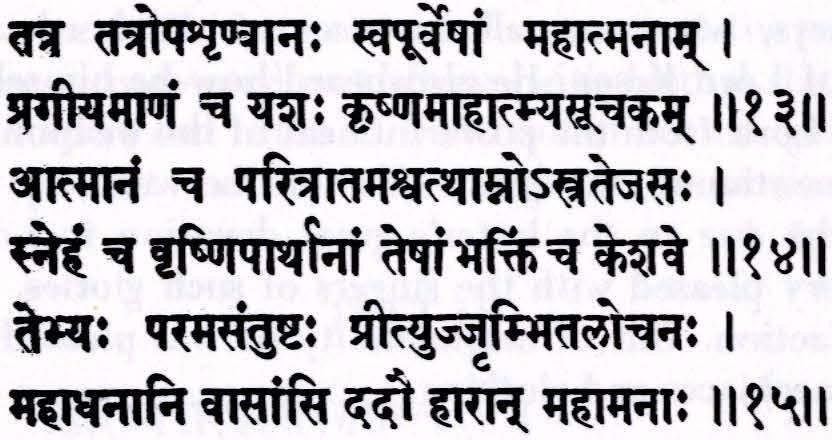
Texts 13-15] How Par�it Received the Age of Kali 851
clothing; dadau-gave in charity; haran-necklace ; maha-manii{l-one who has a broader outlook.
TRANSLATION
Wherever the King visited, he continuously heard the glories of his great forefathers, who were all devotees of the Lord, and also of the glorious acts of Lord Kr��a. He also heard how he himself had beenprotected by the Lord from the powerful heat of the weaponofASvatthama. People also mentioned the great affection between the descendants of Vr��i and Pftha due to the latter's great devotion to Lord Ke8ava. The King, being very pleased with the singers of such glories, opened his eyes in great satisfaction. Out of magnanimity he was pleased to award them very valuable necklaces andclothing.
PURPORT
Kings and great personalities of the state are presented with welcome addresses. This is a system from time immemorial, and Maharaja Parik�it, since he was one of the well-known emperors of the world, was also presented with addresses of welcome in all parts of the world as he visited those places. The subject matter of those welcome addresses was Kr�!J.a. Kr�!la means Kr�pa and His eternal devotees, as the king means the king and his confidential associates.
Kr�!la and His unalloyed devotees cannot be separated, and therefore glorifying the devotee means glorifying the Lord and vice versa. Maharaja Parik�it would not have been glad to hear about the glories of his forefathers like Maharaja Yu�thira and Arjuna, etc., had they not been connected with the acts of Lord Kr�!la. The Lord descends specifically to deliver His devotees (paritrar-aya sadhiinam). The devotees are glorified by the presence of the Lord because they cannot live for a moment without the presence of the Lord and His different energies. The Lord is present for the devotee by His acts and glories, and therefore Maharaja Parik�it felt the presence of the Lord when He was glorified by His acts, especially when he was saved by the Lord in the womb of his mother. The devotees of the Lord are never in danger, but in the material world which is full of dangers in every step, the devotees are apparently placed into dangerous positions, and when they are saved by the Lord, the Lord is glorified. Lord Kr�!la would not have been glorified as the speaker of the Bhagavadgitii had His devotees like the Pa�;u;lavas not been entangled in the Battle-
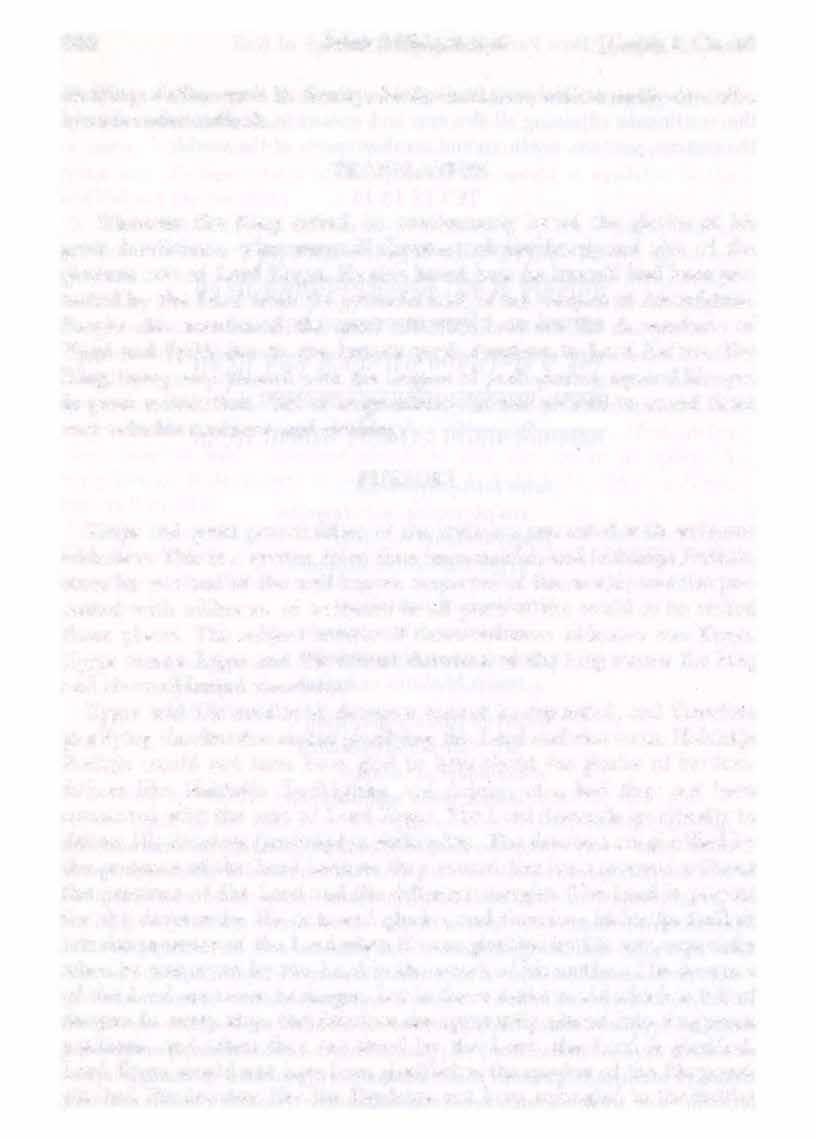
852 Srimad-Bhigavatam [Canto l, Ch. 16
field of Kuruk�etra. All such acts of the Lord were mentioned in the addresses of welcome, and Maharaja PanK.�it, in full satisfaction, rewarded those who presented such addresses. The difference between the presentation of welcome addresses today and in those days is that formerly the welcome addresses were presented to a_person like Maharaja Parlk�it. The welcome addresses were full of facts and figures, and those who presented such addresses were sufficiently rewarded, whereas in the present days the welcome address is presented not always with factual statements but to please the postholder, and often they are full of flattering lies. And rarely are those who present such welcome addresses rewarded by the poor receiver.
TEXT 16

sarathya-piira�ada-sevana-sakhya-dautya virlisananugamana-stavana-pra!lliman snigdhe�u pli!lt)�u jagat-pra!latirh ca v4r-or bhaktirh karoti nrpatis cara!liiravinde


sarathya-acceptance of the post of a chariot driver; piira�adaacceptance of the presidency in the assembly of the Rajasiiya sacrifice; sevana-engaging the mind constantly in the service of the Lord; sakhyato think of the Lord as a friend; dautya-acceptance of the post of a messenger; vira-asana- acceptance of the post of a watchman with a drawn sword at night; anugamana-following in the footsteps; stavana-offering of prayers; prapaman- offering obeisances; snigdhe�u-unto them who are malleable to the will of the Lord;piipt)u�u-unto the sons of Pap�u;jagatthe universal; prapatim-one who is obeyed; ca-and; vi§po�-of Vi�pu; bhaktim- devotion; karoti-does;n.rpat*-the King; carapa-aravinde-unto His lotus feet.
TRANSLATION
Maharaja Par�it heard that out of His causeless mercy Lord Kr��a [ Vi��u], who is universally obeyed, rendered all kinds of service to the
Text 16] How Parik{lit Received the Age of Kali 853
������\St4ld10jfij'�����lf(UII(Pi4
II�� II
malleable sons �f Pa��u by accepting posts ranging from chariot driver to president to messenger, friend, night watchman, etc., according to the will of the Pa��avas, obeying them like a servant and offering obeisances like one younger in years. When he heard this, Maharaja Pan�it became overwhelmed with devotion to the lotus feet of the Lord.
PURPORT
Lord Krwa is everything to the unalloyed devotees like the Pa��avas. The Lord was for them the Supreme Lord, the spiritual master, the worshipable Deity, the guide, the chariot driver, the friend, the servant, the messenger and everything they could conceive of. And thus the Lord also reciprocated the feeling of the Pa!l�avas. Maharaja Parik�it, as a pure devotee of the Lord, could appreciate the Lord's transcendental reciprocation of the feelings of His devotees, and thus he himself also was overwhelmed with the dealings of the Lord. Simply by appreciating the dealings of the Lord with His pure devotees, one can attain salvation. The Lord's dealings with His devotees appear to be ordinary human dealings, but one who knows them in truth becomes at once eligible to go back home, back to Godhead. The Pa!l�avas were so malleable to the will of the Lord that they could sacrifice any amount of energy for the service of the Lord, and by such unalloyed determination they could secure the Lord's mercy in any shape they desired.
TEXT 17

� 'hi¥tlwt� \i'lf 'IM¥4�'1(1
itlftti((twf� +ti(Rf'((�lr II t\911
tasyaivam vartamiinasya
piirve�am vrttim anvaham
nlitidiire kiliiScaryam
yad asit tan nibodha me
tasya-of Maharaja Parik!?it; evam- thus; vartamanasya-remaining absorbed in such thought;purve�am-of his forefathers;vrttim-good engagement; anvaham-day after day; na-not; atidure-far off; kila-verily; ascaryam-astonishing;yat-that; iisit-was; tat-which;nibodha-know it; me-from me.
854 Srimad-Bhigavatam [Canto I, Ch. 16
TRANSLATION
Now you may have heard from me of what happened while Maharaja Pan�it was passing his days hearing of the good occupations of his forefathers and being absorbed in thought of them.
TEXT

dharmal;l padaikena caran vicchiiyam upalabhya giim prcchati smasru-vadanam vivatsiim iva miitaram
dharma[l-the personality of religious principles; pada-leg; ekena-on one only; caran-wandering; vicchayam-overtaken by the shadow of grief; upalabhya-having met; gam-the cow; prcchati-asking; sma-with; asru-vadanam-with tears on the face; vivatsam-one who has lost her offspring; iva-like; miitaram-the mother.
TRANSLATION
The personality of religious principles, Dharma, was wandering about in the form of a bull. And he met the personality of earth in the form of a cow who appeared to grieve like a mother who had lost her child. She had tears in her eyes, and the beauty of her body was lost. Thus Dharma questioned the earth as follows.
PURPORT
The bull is the emblem of the moral principle, and the cow is the representative of the earth. When the bull and the cow are in a joyful mood, it is to be understood that the people of the world are also in a joyful mood. The reason is that the bull helps production of grains in the agricultural field, and the cow delivers milk, the miracle of aggregate food values. The human society, therefore, maintains these two important animals very carefully so that they can wander everywhere in cheerfulness. But at the
Text 18] How Par�it Received the Age of Kali 855
, � �·fit€4ffiii+l€4 ��
18 �:� � w�0141aq��tW{
II��u
present moment in this age of Kali both the bull and the cow are now being slaughtered and eaten up as foodstuffbya class of men who do not know the brahminical culture. The bull and the cow can be protected for the goodofall human society simplybyspreadingbrahminical culture as the topmost perfection of all cultural affairs. By advancement of such culture, the morale of society is properly maintained, and so peace and prosperity are also attained without extraneous effort. When brahminical culture deteriorates, the cow and bull are mistreated, and the resultant actionsare prominent bythe followingsymptoms.
TEXT 19


Ni:0itt1R1
dharma uviica
kaccid bhadre 'niimayam iitmanas te vicchiiyiisi mliiyate�an mukhena iilak�aye bhavat[m antariidhim dure bandhum socasi kancaniimba
dharma� uvaca- Dharma inquired; kaccit-whether; bhadre-madam; anamayam-quite hail and hearty; atmana�-self; te-unto you; vicchaya asi-appear to be covered with the shadow of grief; mlayata-which darkens; i§at-slightly ; mukhena-by theface; alak§aye-youlook; bhavatim -unto yourself; antaradhim -some disease within; dure- long distant; bandhum- friend; socasi-thinking of; kancarw- someone; amba-0 mother.
TRANSLATION
Dharma [in the form of a bull) asked: Madam, are you not hail and hearty? Why are you covered with the shadow of grief? It appears by your face that you have become black. Are you suffering from some internal disease,or are you thinkingof some relative who is away in a distantplace?

856 Srimad-Bhagavatam [Canto 1, Ch. 16
� ��
ifiM"I:�S'11'4tt¥U�'4'1�
toelttijtt"Ui§� I � �«<q�(jf\1 ���il:qfu �� ����II
The people of the world in this age of Kali are always full of anxieties. Everyone is diseased with some kind of ailment. From the very faces of the people of this age, one can find out the index of the mind. Everyone feels the absence of his relative who is awayfromhome. Theparticular symptom of the age of Kali is that no family is now blessed to live together. To earn <!. livelihood, the father lives at a place far away from the son, or the wife lives far away from the husband and so on. There are sufferings from internal diseases, separation from those near and dear, and anxieties for maintaining the status quo. These are but some important factors which make the people of this age always unhappy.
TEXT 20

piidair nyiinarh socasi maikapiidam
iitmiinarh vii vr�alair bhok�yamiiram iiho suriidin hrta-yajna-bhiigiin

prajii uta svin maghavaty avar�ati
piidai[l.- by three legs; nyunam- diminished; socasi-if you are lamenting for that; mii- my; eka-piidam-only one leg; iitmiinam-own body; vii-or; vr�ala*-by the unlawful meat-eaters; bhok�yamiiram-to be exploited; iiho-in sacrifice; suriidin-the authorized demigods; hrta-yajna-devoid of sacrificial; bhiigiin-share; prajii[l.-the living beings; uta-increasing; suitwhether; maghavati-in famine and scarcity; avar� ati-because of rainlessness.
TRANSLATION
I have lost my three legs and am now standing on one only. Are you lamenting for my state of existence? Or are you in great anxiety because henceforward the unlawful meat-eaters will exploit you? Or are you in a sorryplight because the demigods are now bereft of their share of sacrificial offerings because no sacrifices are being performed at present? Or are you
Text 20] How Pa�it Received the Age of Kali 857
PURPORT
grieving for living beings because of their sufferings due to famine and drought?
PURPORT
With the progress of the age of Kali, four things particularly, namely, the duration of life, mercy, the power of recollection, and moral or religious principles, will gradually diminish. Since Dharma, or the principles of religion, would be lost in the proportion of three out of four, the symbolic bull was standing on oneleg only. When three fourths of the population of the wholeworldbecomeirreligious,the situationis convertedinto hell for the animals. In the age of Kali, godless civilizations will create so many so-called religious societies in which the Personality of Godhead will be directly or indirectly defied. Andthus faithless societies ofman willmake the world uninhabitable for the saner section of people. There are gradations of human beings in terms of proportionate faith in the Supreme Personality of Godhead. The first-class faithful men are the Vai�!J.avas and the briihmar-as, then the k§atriyas, then the vaiSyas, then the siidras, then the mlecchas, the Yavanas and at last the car-piilas. The degradation of the human instinct begins from the mlecchas, and the car-piila state of life is the last word in human degradation. All the above terms mentioned in the Vedic literatures are never meant for any particular community or birth. They are different qualifications of human beings in general. There is no question of birthright or community. One can acquire the respective qualifications by one's own efforts, and thus the son of a Vai�!J.ava can become a mleccha, or the son of a car-piila can become more than a briihmar-a, all in terms of their association and intimate relation with the Supreme Lord.
The meat-eaters are generally called mlecchas. But all meat-eaters are not mlecchas. Those who accept meat in terms of scriptural injunctions are not mlecchas, but those who accept meat without restriction are called mlecchas. Beef is forbidden in the scriptures, and the bulls and cows are offered special protection by followers of the Vedas. But in this age of Kali, people will exploit the body of the bull and the cow as they like, and thus they will invite sufferings of various types.
The people of this age will not perform any sacrifice. The mleccha population will care very little for performances of sacrifices, although performance of sacrificeis essential for persons who are materially engaged in sense enjoyment. In the Bhagavad-gitii performance of sacrifices is strongly recommended (Bg. 3.14-16).

858 Srimad-Bhagavatam [Canto I, Ch. 16
The living beings are created by the creator Brahma, and just to maintain the created living being progressively towards the path of back to Godhead, the system of performing sacrifice is also created by him. The system is that living beings live on the produce of grains and vegetables, and by eating such foodstuff they get vital power of the body in the shape of blood and semina, and from blood and semina one living being is able to create other living beings. But the production of grains, grass, etc., becomes possible by rain, and this rain is made to shower properly by performance of recommended sacrifices. Such sacrifices are directed by the rites of the Vedas, namely Siima, Yajus, 1?-k and Atharva. In the Manusmrti it is recommended that by offering sacrifice on the altar of the fire, the sun-god is pleased. When the sun-god is pleased, he properly collects water from the sea, and thus sufficient clouds collect on the horizon and rains fall. After sufficient rains fall, there is sufficient production of grains for men and all animals, and thus there is energy in the living being for progressive activity. The mlecchas, however, make plans to install slaughterhouses forkilling bulls and cows along with other animals, thinking that they will prosper by increasing the number of factories and live on animal food without caringfor performance of sacrifices andproduction ofgrains. But they must know that even for the animals they must produce grass and vegetables, otherwise the animals cannot live. And to produce grass for the animals, they must require sufficient rains. Therefore they have to depend ultimately on the mercy of the demigods like the sun-god, Indra, Candra, etc., and such demigods must be satisfied by performances of sacrifice.
This material world is a sort of prison house, as we have several times mentioned. The demigods are servants of the Lord to see to the proper upkeep of the prison house. These demigods want to see that the rebel living beings, who want to survive faithlessly, are gradually turned towards the supreme power of the Lord. Therefore, the system of offering sacrifice is recommended in the scriptures.
The materialistic men want to work hard and enjoy fruitive results for sense enjoyment. Thus they are committing many types of sins at every step of life.Those who are,however, consciously engaged in the devotional service of the Lord are transcendental to all varieties of sin and virtue. Their activities are free from the contamination of the three modes of material nature. For the devotees there is no need for performance of prescribed sacrifices because the very life of the devotee is a symbol of sacrifice. But persons who are engaged in fruitive activities for sense enjoyment must perform the prescribed sacrifices because that is the only

How P�it Received the Age of Kali 859
means to get free from the reaction of all sins committed by the fruitive workers. Sacrifice is the means for counteracting such accumulated sins. The demigods are pleased when such sacrifices are performed, just as prison officers are satisfied when the prisoners are turned into obedient subjects. Lord Caitanya, however, has recommended only one yajiia or sacrifice, called the sankirtana-yajiia, the chanting of Hare Kr�!J.a, in which everyone can take part. Thus both devotees and fruitive workers can derive equal benefit from the performances of smikirtana-yajiia.
TEXT 21


�:�afct�
arak�yamii[liift striya uroi biiliin socasy atho puru§iidair iviirtiin viicam devzm brahma-kule kukarma[ly abrahma!lye riija-kule kuliigryiin
arak§yamiifliift-unprotected; striyaft-women; urvi-on the earth; biiliin -children;socasi- you are feeling compassion;atho-as such;puru§a-iidaift -by men;iva-likethat;iirtiin-those who are unhappy;viicam-vocabulary; devim-the goddess; brahma-kule-in the family of the briihma!la; kukarma[li-acts against the principles of religion; abrahmartye-persons against the brahminical culture; riija-kule-in the administrative family; kulaagryiin-most of all the families(the briihmartas).
TRANSLATION
Are you feeling compunction for the unhappy women and children who are left forlorn by unscrupulous persons? Or are you unhappy because the goddess of learning is being handled by brahm3!J.aS addicted to acts against the principles of religion? Or are you sorry to see that the brahma!J.aS have taken shelter of administrative families that do not respect brahminical culture?
860 Srimad-Bhagavatarn [Canto I, Ch. 16
ttft:q�$;f) �(ili�Rftliji(I ffi � � �Ckhi(fllua � teBittl(II��II
In the age of Kali, the women and the children, along with briihma[las and cows, will be grossly neglected and left unprotected. In this age, illicit connection with women will render many women and children uncared for. Circumstantially, the women will try to become independent of the protection of men, and marriage will be performed as a matter of formal agreement between man and woman. In most cases, the children will not be taken care of properly. The briihma[las are traditionally intelligent men, and thus they will be able to pick up modern education to the topmost rank, but as far as moral and religious principles are concerned, they shall be the most fallen. Education and bad character go ill together, but such things will run parallel. The administrative heads as a class will condemn the tenets of Vedic wisdom and will prefer to conduct a so-called secular state, and the so-called educated briihma[laS will be purchased by such unscrupulous administrators. Even a philosopher and writer of many books on religious principles may also accept an exalted post in a government which denies all the moral codes of the siistras. The briihma[las are specifically restricted in accepting such service. But in this age they will not only accept service, but they will do so even if it is of the meanest quality. These are some of the symptoms of the Kali age which are harmful to the general welfare of human society.
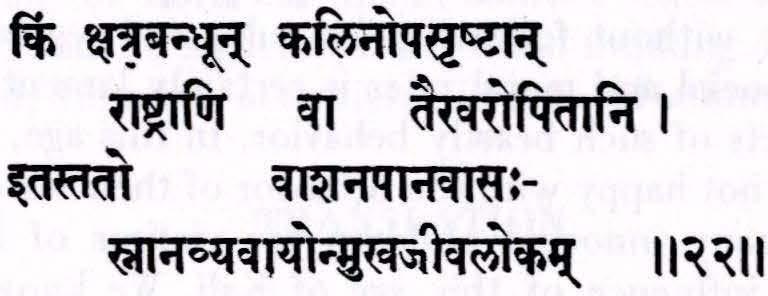
TEXT 22

kim k�atra-bandhun kalinopasr�tii.n
ro�traiJi vii. tair avaropitii.ni
itas tato vasana-pii.na-vasa�
snii.na-vyavii.yonmu.kha-jiva-lokam
kim-whether; k�atra-bandhun-the unworthy administrators; kalinaby the influence of the age of Kali; upamtan-bewildered ; ra�tra[li- state affairs; vii-or; tai�-by them; avaropitiini-put into disorder; ita�- here ;
Text 22] How P�it Received the Age of Kali 861
PURPORT
tata�-there; oo-or; asana-accepting foodstuff; pana-drink; uasa�residence; snana-bath; vyavaya-sexual intercourse; unmukha-inclined; jiva-lokam-human society.
TRANSLATION
The so-called administrators are now bewildered by the influence of this age of Kali, and thus they have put all state affairsinto disorder. Are you now lamenting this disorder? Now the general populace does not follow the rules and regulations for eating, sleeping, drinking, mating, etc., and they are inclined to perform such anywhere and everywhere. Are you unhappy because of this?
PURPORT
There are some necessities of life on a par with the lower animals, and they are eating, sleeping, fearing and mating. These bodily demands are both for the human being and the animals. But the human being has to fulfill such desires, not like animals, but like a human being. A dog can mate with a bitch before the public eyes without hesitation, but if a human being does so the act will be considered a public nuisance and the person will be criminally prosecuted. Therefore for the human being there are some rules and regulations, even for fulfilling common demands. The human society avoids such rules and regulations when it is bewildered by the influence of the age of Kali. In this age, people are indulging in such necessities of life without following the rules and regulations, and this deterioration of social and moral rules is certainly lamentable because of the harmful effects of such beastly behavior. In this age, the fathers and the guardians are not happy with the behavior of their wards. They should know that so many innocent children are victims of bad association awa�ded by the influence of this age of Kali. We know from SnmadBhagavatam that Ajamila, an innocent son of a briihmar-a, was walking down a road and saw a sudra pair sexually embraced. This attracted the boy, and later on the boy became a victim of all debaucheries. From a pure briihmar-a, he fell down to the position of a wretched urchin, and it was all due to bad association. There was but one victim like Ajamila in those days, but in this age of Kali the poor innocent students are daily victims ofcinemas which attract men onlyfor sex indulgence. Theso-called administrators are all untrained in the affairs of a k§atriya. The k§atriyas are meant for administration, as the brahmar-as are meant for knowledge

862 Srimad-Bhagavatam [Canto I, Ch. 16
and guidance. The word k§atriya-bandhu refers to the SO·called administrators or persons promoted to the post of the administrator without proper training by culture and tradition. Nowadays they are promoted to such exalted posts by the votes of people who are themselves fallen in the rules and regulations of life. How can they select a proper man when they are themselves fallen in the standard of life? Therefore,by the influence of the age of Kali, everywhere, politically, socially or religiously, everything is topsy-turvy, and therefore for the sane man it is all regrettable.
TEXT 23

yad-viimba te bhii.ri-bhariivatiirakrtiivatiirasya harer dharitri antarhitasya smarati visr�tii karmiir-i nirviir-a-vilambitiini
yat-that; vii-may be; amba-0 mother; te-your; bhuri-heavy; bharaload; avatiira-decreasing the load; krta-done; avatiirasya- one who incarnated; hare[l-of Lord Sri Kr�Qa; dharitri-0 earth; antarhitasya-of Him who is now out of sight; smarati-while thinking of; visr§tii-all that were performed; karmiir-i-activities; nirviirza-salvation; vilambitani-that which entails.
TRANSLATION
0 mother e�rth, the Supreme Personality of Godhead, Hari, incarnated Himself as Lord Sri Kr�!!a just to unload your heavy burden. All His activities here are transcendental, and they cement the path of liberation. You are now bereft of His presence. You are probably now thinking of those activities and feeling sorry in their absence.
PURPORT
The activities of the Lord included liberation, but they are more relishable than the pleasure derived from nirviirw or liberation. According to
Text 23] How Par�it Received the Age of Kali 863
� � �(Jq(IJ(i61"461(� rnru;. 1 31�flM4 � � � f.tqtuJf?4�(i:;r.6Jf.l ����II
Srila ]iva Gosvami and Visvanatha Cakravarti Thakur, the word used here is niroii"{la-vilambitiini, that which mipimizes the value of liberation. To attain nirvii"{la or liberation, one has to undergo a severe type of tapasya, austerities, but the Lord is so merciful that He incarnates to diminish the burden of the earth. Simply by remembering such activities, one can defy the pleasure derived from niroii"{la and reach the transcendental abode of the Lord to associate with Him, eternally engaged in His blissful loving serVIce.
TEXT 24

idam mamiicak�va taviidhimulam vasundhare yena vikarsitiisi
kiilena vii te baliniim baliyasii
suriircitam kim hrtam amba saubhagan
idam-this; mama-unto me; iicak§va-kindly inform; tava-your; iidhimulam-the root cause of your tribulations; vasundhare-the reservoir of all riches; ye na-by which; vikar§itii asi-reduced to much weakness; kiilena-by the influence of time; vii- or; te-your; baliniim-very powerful; baliyasii-more powerful; sura-arcitam-adored by the demigods; kimwhether; hrtam-taken away; amba-mother; saubhagam-fortune.
TRANSLATION
Mother, you are the reservoir of all riches. Please inform me of the root cause of your tribulations by which you have been reduced to such a weak state.Ithink that the powerful influence of time,which conquers the most powerful, might have forcibly taken away all your fortune, which was adored even by the demigods.
PURPORT
Bythe grace ofthe Lord,each and everyplanet is createdfully equipped. So this earth is not only fully equipped with all the riches for the main-
864 Srimad-Bhagavatam [Canto 1, Ch. 16
� � �
�WI W4if{Huftt 1
en �� 'ifel�('ti
ft; � �ll�'dll
ii4ij--�
�
ij�i�d
tenance of the inhabitants, butalsowhen the Lorddescendson theearth, the whole earthbecomes soenriched withallkinds of opulences thateven the denizens ofheaven worship it with all affection. Butby the will of the Lord, the whole earthcan at oncebe changed. Hecando andundo a thing at His sweet will. Therefore no one should consider himself to be selfsufficient or independentof the Lord.
TEXT 25

dharo{ly uvaca
bhavanhi vedatat saroam
yanmam dharmanuprcchasi
caturbhir vartaseyena
padair loka-sukhavaha*
sri dhara[li uvaca-mother earth replied; bhaviin-your good self; hicertainly;veda-know;tatsaroam-allthatyouhaveinquiredfrom me;yatthat; mam-from me; dharma-0 personality of religious principles; anuprcchasi-you have inquired one after another; caturbhi.fi,-by four; vartase-you exist; yena-by which; padai�-by the legs; loka-in each and every planet;sukha-avaha*-increasing the happiness.
TRANSLATION
The earthly deity [in the form of a cow] thus replied to the personality of religious principles [in the form of a bull] : 0 Dharma, whatever you have inquired from me shall be known to you. I shall try to reply to all those questions. Once you too were maintained by your four legs and increased happiness all over the universe by the mercy of the Lord.
PURPORT
The principles of religion are laid down by the Lord Himself, and the executor of such laws is Dharmaraja or Yamaraja. Such principles work fully in the age of Satya-yuga; in the Treta-yuga they are reduced by a fraction ofone fourth;in the Dvaparatheyarereducedtoone half, andin
Text 25) How P�it Received the Age·of Kali 865
�ft � � � '=l'fi�CZ065m I ii4dM� lR qa��ihWcUif4{: 11�'-\11
\{{Qg�
the Kali-yuga they are reduced to one fourth, gradually diminishing to the zero point, and then deva5tation takes place_ Happiness in the world depends proportionately on the maintenance of the religious principles, individually or collectively. The best part of valor is to maintain the principles despite all kinds of odds. Thus one can be happy during the span of life and ultimately return to Godhead.
TEXTS
���tffitCf4�i;fTS'1(tf<1:1�<:1

���lltffi'� � �6:tgun: I
�i+t&*lf'l�5f�FA����II
� gutqi�OI �irf.rmr.r (11"Sfij'{I

�n*4tfitu��qr:q;n��IJ�oll
satyam saucam dayii k�iintis
tyiigafi, santo�a iirjavam samo damas tapafi. siimyam titik�oparatifi. srutam
jniinam viraktir aiSvaryam
sauryam tejo balam smrtifi. sviitantryam kausalam kiintir
dhairyam miirdavam eva ca
priigalbhyam prasrayafi. s'ilam saha ojo balam bhagafi, giimbhiryam sthairyam iistikyam kirtir miino 'nahankrtifi.
ete ciinye ca bhagavan




nityii yatra mahii-gu'(liifi, priirthyii mahattvam icchadbhir
na viyanti sma karhicit
866 Srimad-Bhagavatam [Canto I, Ch 16
26-30 .... � � 311'*4'{ I ��!·M�:�������
�wd�1�iM �' if��: 1 (CfJij.-;4m� �Tfrij� ���II�\911 stt•t�Af�:���t�llll: I
piipmanii kalinek�itam
satyam-truthfulness; saucam-cleanliness; daya-intolerance of others' unhappiness; k.sant*-self-control even _if there is cause of anger;tyiiga[lmagnanimity; santo§aft-self-satisfaction; arjavam-straightforwardness; sama[t-fixing of the mind; dama[l-control of the sense organs;tapa[ltrueness to one's responsibility; samyam-indiscrimination of friend and foe; titik§ii-tolerance of the offenses of others; uparati[l-indifference to loss and gain;srutam-following scriptural injunctions;ji'ianam-knowledge (self-realization);virakt*-detachment from sense enjoyment; aisvaryamleadership;sauryam-chivalry;teja[t-influence; balam-to render possible that which is impossible; smrti[l-to find one's proper duty;svatantryamnot to depend on others; kausalam-dexterity in all activities; kiinti[!beauty; dhairyam-freedom from disturbance;mardavam-kindheartedness; eva-thus; ca-also; priigalbhyam-ingenuity;prasraya[t-gentility;suammannerliness;saha-determination;oja[t-perfect knowledge;balam-proper execution; bhaga[l-object of enjoym«:nt; giimbhi"ryam-joyfulness; sthairyam-immovability; iistikyam-faithfulness; ki"rti[l-fame; .miina[lworthy to be worshiped; anaharikrtift-pridelessness; et.e-all these; ca anye-also many others; ca-and;bhagavan-the Personality of Godhead; nitya[t-everlastingly; yatra-where;mahii-gurza[l-great qualities; prlirthyii� -worthy to possess; mahattvam-greatness; icchadbhi[l-those who desire so; na-never; viyanti-deteriorates;sma-ever; karhicit-at any tim.e; tena -by Him;aham-myself;gurza-piitrerza-the reservoir of all qualities;srigoddess of fortune; nivasena-by the resting place; sampratam-very recently; sociimi-I am thinking of; rahitam-bereft of; lokam-planets; papmanii-by the store of all sins;kalina-by Kali;ik§itam-is seen.
TRANSLATION
In Him reside I) truthfulness, 2) cleanliness, 3) intolerance of another's unhappiness, 4) the power to control anger, 5) self-satisfaction, 6) straightforwardness, 7) steadiness of mind, 8) control of the sense organs, 9) responsibility, 10) equality, II) tolerance, 12) equanimity, 13) faithfulness, 14) knowledge, 15) a�sence of sense enjoyment, 16) leadership, 17) chivalry, 18) influence, 19) the power to make everything possible, 20) the discharge of proper duty, 21) complete independence, 22) dexterity, 23) fullness of all beauty, 24) serenity, 25) kindheartedness, 26) ingenuity,

Texts 26-30] How Pa�it
Received the Age of Kali
teniiham gu!la-piitref!a sri-niviisena siimpratam
sociimi rahitam lokam
867
27) gentility, 28) magnanimity, 29) determination, 30) perfection of all knowledge, 31) proper execution, 32) possession of all objects of enjoyment, 33) joyfulness, 34) immovability, 35) fidelity, 36) fame, 37) worship, 38) pridelessness, 39) being (as the Personality of Godhead), 40) eternity, and many other transcendental qualities which are eternally present and never to be separated from Him. That Personality of Godhead, the reservoir of all goodness and beauty, Lord Sri Kr�!J.a, has now closed His transcendental pastimes on the face of the earth. In His absence the age of Kali has spread its influence everywhere, so I am sorry to see this condition of existence.
PURPORT
Even if it were possible to count the atoms after smashing the earth into powder, still it is not possible to estimate the unfathomed transcendental qualities of the Lord. It is said that Lord Anantadeva has tried to expostuiate the transcendental qualities of the Supreme Lord with his numberless tongues, and that for numberless years together it has been impossible to estimate the qualities of the Lord. The above statement of the qualities of the Lord is just to estimate His qualities as far as a human being is able to see Him. But even if it is so, the above qualities can also be divided into many subheadings. According to Sn1a ]iva Gosvami, item No. 3 can be subdivided into 1) protection of the surrendered souls, and 2) well wishes for the devotees. In the Bhagavad-gitii the Lord states that He wants every soul to surrender unto Him only, and by doing so He assures everyone that He will give protection from the reactions of all sins. Therefore unsurrendered souls are not devotees of the Lord, and thus there is no particular protection for everyone in general. For thedevotees He has all good wishes, and for those who arc actually engaged in the loving transcendental service of the Lord, He gives particular attention. He gives direction to such pure devotees to help them discharge their responsibilities on the path back to Godhead. By equality (10), the Lord is equally kind to everyone, as the sun is equal in distributing its rays over everyone. Yet there are rnany who are unable to take advantage of the sun rays. Similarly, the Lord says that surrendering unto Him is the guarantee for all protection from Him, but unfortunate persons are unable to accept this proposition, and therefore they suffer from all material miseries. So even though the Lord is equally well wishing to everyone, the unfortunate living being, due to bad association only, is unable to accept His instructions in toto, and for this the

868 Srimad-Bhagavatam [Canto 1, Ch. 16
Lord is never to be blamed_ He is called the well-wisher for the devotees only. He appears to be partial to His devotees, but factually the matter rests on the living being to accept or reject equal treatment by the Lord.
The Lord never deviates from His word of honor. When He gives assurance for protection, the promise is executed in all circumstances. It is the duty of the pure devotee to be fixed up in the discharge of duty entrusted to him by the Lord or the Lord's bona fide representative, the spiritual master. The rest is carried on by the Lord without a break.
Responsibility of theLord is also unique.TheLord has no responsibility because all His work is done by His different appointed energies. But still He accepts voluntary responsibilities in displaying different roles in His transcendental pastimes. As a boy, He was playing the part of a cowboy. As the son of Nanda Maharaja, He discharged responsibility perfectly. Similarly, when He was playing the part of a k§atriya as the son of Maharaja Vasudeva, Hedisplayedall theskillofa martially spirited k§atriya. In almost all cases, the k§atriya king has to secure a wife by fighting or kidnapping. This sort of behavior for a k§atriya is praiseworthy in the sense that a k§atriya must show his power of chivalry before his would-be wife so that the daughter of a k§atriya can see the valor of her would-be husband. Even the Personality of Godhead Sri Rama displayed such a spirit of chivalry during His marriage. He broke the strongest bow, called Haradhanu, and achieved the hand of Sita Devi, the mother of . all opulence. The k§atriya spirit is displayed during marriage festivals, and there is nothing wrong in such fighting. Lord Sri Kr�!la discharged such responsibility fully because although He had more than 16,000 wives, in each and every case He fought like a chivalrous k§atriya and thussecured a wife. To fight 16,000 times to secure 16,000 wives is certainly only possible by the Supreme Personality of Godhead. Similarly, He displayed full responsibility in every action of His different transcendental pastimes.
Item No. 14, knowledge, can be further extended into five subheadings, namely 1) intelligence, 2) gratefulness, 3) power of understanding the circumstantial environments of place, object and time, 4) perfect knowledgeofeverything,and 5) knowledge of the self. Only fools are ungrateful to their benefactors. The Lord, however, does not require benefit from anyone. besides Himself because He is full in Himself; still He feels benefited by the unalloyed services of His devotees. The Lord feels grateful to His devotees for such unsophisticated, unconditional service and tries to reciprocate it by rendering service, although the devotee also has no such desire in his heart. The transcendental service of the Lord is itself a transcendental benefit for the devotee, and therefore the devotee has nothing

Texts 26-30] How P�t Received the Age of Kali 869
to expect from the Lord. On the assertion of the Vedic aphorism, saroam khalv idam brahma, we can understand that the Lord, by the omnipresent rays of His effulgence, called brahmajyoti, is all-pervading inside or outside of everything, like the omnipresent material sky, and thus He is also omniscient.

As far as the beauty of the Lord is concerned, He has some special features distinguished from all other living beings, and over and above that He has some special attractive beautiful features by which He attracts the mind of even Radhara!Jl, the supermost beautiful creation of the Lord. He is known, therefore, as Madana-Mohana, or one who attracts the mind even of Cupid. Sn,a .Jlva Gosvami Prabhu has scrutinizingly analyzed other transcendental qualities of the Lord and affirms that Lord Sri Kr�!la is the Absolute Supreme Personality of Godhead (Param Brahman). He is omnipotent by His inconceivable energies, and therefore He is the Yogesvara or the supreme master of all mystic powers. Being the Yoge8vara, His eternal form is spiritual, a combination of eternity, bliss and knowledge. The nondevotee class cannot understand the dynamic nature of His knowledge because they are satisfied to reach up to His eternal form of knowledge. All great souls aspire to be equal in knowledge with Him. This means that all other knowledge is ever insufficient, flexible and measurable, whereas the knowledge of the Lord is ever fixed and unfathomable. Srila Siita Gosvami affirms in the Bhiigavatam that although He was observed by the citizens of Dvaraka every day, they were ever increasingly anxious to see Him again and again. The living being can appreciate the qualities of the Lord as the ultimate goal, but they cannot attain the status quo of such equality. This material world is a product of the mahat-tattva, which is a state of the Lord's dreaming condition in His Yoga-nidrii mystic slumber in the Causal Ocean, and yet the whole creation appears to be a factual presentation of His creation. This means that the Lord's dreaming conditions are also factual manifestations. He can therefore bring everything under His transcendentalcontrol, and thus whenever and wherever He does appear, He does so in His fullness.
The Lord, being all that is described above, maintains the affairs of the creation, and by His so doing He gives salvation even to His enemies who are killed by Him. He is attractive even to the topmost liberated soul, and thus He is worshipable even by Brahma and Siva, the greatest of all demigods. Even in His incarnation ofPuru�avatara He is the Lord of the creative energy. The creative material energy is working under His direction, as it is confirmed in the Bhagavad-gitii (Bg. 9.10). He is the control switch of the material energy, and to control the material energy in the innumerable
870 Srimad-Bhagavatam [Canto 1, Ch. 16
universes, He is the root cause of innumerable incarnations in all the universes. There are more than 500,000 incarnations of Manu in only one universe, besides other incarnations in different universes. In the spiritual world, however, beyond the mahat-tattva, there is no question of incarnations, but there are plenary expansions of the Lord in the different Vaiku!J.thas. The planets in thespiritual sky areat least three times the number of those within the innumerable universes in the mahat-tattva. And all the Naraya!J.a forms of the Lord are but expansions of His Vasudeva feature, and thus He is Vasudeva, Naraya!J.a and Kr�!la simultaneously. He is "srikrrrw govinda hare murii.re, he niitha niiriiya[!a viisudeva," all in one. His qualities, therefore, cannot be counted by anyone, however great one may be.
TEXT 31

iitmiinam ciinusociimi
bhavantam ciimarottamam deviin pit[n-r:�in siidhun
saroiin var[!iims tathii "sramiin
iitmanam-myself; ca-also; anusocami-lamenting; bhavantam-yourself; ca-as well as; amara-uttamam-the best amongst the demigods; deviinabout the demigods; pitfn-about the denizens of the Pitrloka planet; nin-about the sages; sadhun-about the devotees; sarvan-all of them; vaqliin-sections; tatha-as also; asraman-orders of human society.
TRANSLATION

I am thinking about myself and also, 0 best amongst the demigods, about yourself, as well as about all the demigods, sages, denizens of the Pitrloka, devotees of the Lord and all men obedient to the system of var!J.a and asrama in human society.
PURPORT
To effect the perfection of human life there is cooperation between men and demigods, sages, denizens of the Pitrloka, devotees of the Lord
Text 31] How Parilq;it Received the Age of Kali 871
and the scientific system of vaqw and iiSrama orders of life. Distinction of human life and animal life therefore begins with the scientific system of va'?la and iisrama, guided by the experience of the sages in relation with the demigods, gradually rising to the summit of reestablishing our eternal relation with the Supreme Absolute Truth Personality of Godhead Lord Sri Kr�!J.a. When God-made va'?liisrama-dharma, which is strictly meant for developing animal consciousness into human consciousness and human consciousness into godly consciousness, is broken by advancement of foolishness, the whole system of peaceful and progressive life is at once disturbed. In the age of Kali, the first attack of the venomous snake is struck against the God-made va'?liisrama-dharma, and thus a person properly qualified as a briihmar-a is called a sudra, and a sudra by qualification is passing as a briihmar-a, all on a false birthright claim. To become a briihmar-a by a birthright claim is not at all bona fide, although it may be a fulfillment of one of the conditions. But the real qualification of a briihmar-a is to control the mind and the senses, and to cultivate tolerance, simplicity, cleanliness, knowledge, truthfulness, devotion and faith in the Vedic wisdom. In the present age, consideration of the necessary qualification is being neglected, and the false birthright claim is being supported even by a popular, sophisticated poet and author of Riimacarita-manas. This is all due to the influence of the age of Kali. Thus mother earth, represented as a cow, was lamenting the regrettable condition.



TEXTS 32-33

Efil¥u(ijq:(1¥\'it{'{'ijt'(i'.4d¥qt5t�: 1

m

brahmiidayo bahutitham yad-apii:hga-mok�a

kiimiis-tapaft samacaran bhagavat-prapanniift
sii sn"?l sva-viisam aravinda-vanam vihiiya
yat-piiqa-saubhagam alam bhajate 'nuraktii
872 Srimad-Bhagavatam [Canto l,Ch. 16
illftN
�·r: f� � ¥{�ijS§('ffil 11��11 (1'4�'tlijift1 I tft;w�(\�aq�;qm� ��1lfoqqlil���{{f� II��II
tasyaham abja-kuliSankusa-ketu-ketail) srimat-padair bhagavatafi. samalank[tangi
trin aty aroca up alabhya tato vibhutim lokan sa miim vyasr;jad utsmayatzm tadante
brahmti-iidayafi.-demigods such as Brahma; bahutitham -for many days; yat-of Lak�mi, the goddess of fortune; aptinga-mok�a-glance of grace; ktimtifi.-being desirous of; tapafi.-penances; samacaran-executing; bhagavat-unto the Personality of Godhead;prapannafi.-surrendered; sashe (the goddess of fortune); sn?t-Lak�miJI; sva-vtisam-her own abode; aravinda-vanam-the forest of lotus flowers; vihtiya-leaving aside; yatwhose; ptida-feet; saubhagam-all-blissful; alam-without hesitation; bhajate-worships; anuroktti-being attached; tasya-His; aham-myself; abja-lotus flower;kuliSa-thunderbolt; ankusa-rod for driving elephants; ketu-flag;ketaifi.-impressions; srimat-the owner of all opulence;padaifi. -by the soles of the feet; bhagavata�-of the Personality of Godhead; samalankrta-angi-one whose body is so decorated;trin-three;uti-superseding; aroce-beautifully decorated;upalabhya-having obtained; tatafi.thereafter; vibhutim- specific powers;loktin-planetary systems; safi.-He; mam-me;vyasrjat-gave up; utsmayatim-while feelingproud;tadanteat the end.
TRANSLATION
La�miji, the goddess of fortune, whose glance of grace was sought by demigods like Brahma and others and for whom they surrendered many a day unto the Personality of Godhead, gave up her own abode in the forest of lotus flowers and engaged herself in the service of the lotus feet of the Lord. I was endowed with specific powers to supersede the fortune of all the three planetary systems by being decorated with the impressions of the flag, thunderbolt, elephant driving rod and lotus flower, which are signs of the lotus feet of the Lord. But at the end, when I felt I was so fortunate, the Lord left me.
PURPORT
The beauty and opulence of the world can beenhanced by the grace of the Lordand not by any manmadeplanning. When the Lord Sri Kmta was present on this earth, the impressions of the special signs of His lotus feet were stamped on the dust, and as a result of this specific grace, the whole earth was made as perfect as possible. In other words, the rivers, the seas, the forests, the hills and the mines, which are the supplying agents for the

Texts 32-33] How Pa�it Received
the Age of Kali
873
necessities of men and animals, were fully discharging their respective duties. Therefore the riches of the world surpassed all the riches of all other planets in the three planetary systems of the universe. One should, therefore, ask that the grace of the Lord always be present on earth so that we may be favored with His causeless mercy and be happy, having all necessities of life. One may ask how we can detain the Supreme Lord on this earth after His mission is fulfilled and He has left this earth for His own abode. The answer is that there is no need to detain the Lord. The Lord, being omnipresent, can be present with us if we want Him at all. By His omnipresence, He can always be with us if we are attached to His devotional service by hearing, chanting, remembering, etc.
There is nothing in the world with which the Lord is disconnected. The only thing we must learn is to excavate the source of connection and thus be linked with Him by offenselessservice. We can be connected with Him by the transcendental sound representation of the Lord. The holy name of the Lord and the Lord Himself are identical, and one who chants the holy name of the Lord in an offenseless manner can at once realize that the Lord is present before him. Even by the vibration of radio sound, we can partially realize sound relativity, and by resounding the sound of transcendence we can verily feel the presence of the Lord. In this age, when everything is polluted by the contamination of Kali, it is instructed in the scriptures and preached by Lord Sri Caitanya Mahaprabhuthat by chanting theholy name of the Lord, we can at once befree from contamination and gradually rise to the status of transcendence and go back to Godhead. The offenseless chanter of the holy name of the Lord is as auspicious as the Lord Himself, and the movement of pure devotees of the Lord all over the world can at once change the troublesome face of the world. Only by the propagation of the chanting of the holy name of the Lord can we be immune from all effects of the age of Kali.

TEXT




874 Srimad-Bhigavatam [Canto l, Ch . 16
34 � � ¥4¥41Rt¥4(¥tlij(tt�i(l(llm�:�\-.qa>�q� Qi41��1.�<+i4¥4NWG>ti( ll�'clll yo vai mamiitibharam iisura-varhsa-riijiiiim ak�auhir.i-satam apiinudad iitmatantra[l tviirh du[lstham unapadam iitmani pauru�er-a sampiidayan yadu�u ramyam abibhrad angam
ya[l-He who;uai-certainly;mama-mine;atibharam-too burdensome; asura-uarhsa-unbelievers; riijnam-of the kings; ak§auhi[li-one military division* j satam-hundreds of such divisions;apanudat-extirpated;atmatantraft-self-sufficient; tvam-unto you; duftstham-put into difficulty; unapadam-devoid of strength to stand; iitmani-internal;pauru§epa-by dint of energy;sampiidayan-for executing;yadu§u-in the Yadu dynasty; ramyam-transcendentally beautiful j abibhrat-accepted;angam-body.

TRANSLATION
0 personality of religion, I was greatly overburdened by the undue military phalanx arranged by atheistic kings, and I was relieved by the grace of the Personality of Godhead. Similarly you were also in a distressed condition, weakened by your standing strength, and thus He also incarnated by His internal energy in the family of the Yadus to relieve you.
PURPORT
The asuras want to enjoy a life of sense gratification, even at the cost of others' happiness. In order to fulfill this ambition, the asuras, especially atheistic kings or state executive heads, try to equip themselves with all kinds of deadly weapons to bring about a war in a peaceful society. They have no ambition other than personal aggrandizement, and thus mother earth feels overburdened by such undue increases of military strength. By increase of the asuric population, those who follow the principles of religion become unhappy, especially the devotees or devas.
Only in such a situation the Personality of Godhead incarnates to vanquish the unwanted asuras and to reestablish the true principles of religion. This was the mission of Lord Sri Kr�!J.a, and He fulfilled it.
�'WC�Hi�Nd�C3€f�j��: � (1'41�'4M�¥41fwtwt1•d
u.tltti€1t���eMff4;::ftC31�i: II�'-\11

ka va saheta viraham puru§Ottamasya



premavaloka-rueira-smita-valgu-jalpailt sthairyam samanam aharan madhu-manininam romotsavo mama yad anghri vitahkitayalt
* An ak�auhirti phalanx consists of 21,870 chariots, 21,870 elephants, 106,950 infantrymen, and 65,600 cavalrymen.
Text 35) How Parilq;it Received the Age of Kali 875
f(l m m{
TEXT 35 CA
"'
kii-who; txi-either; saheta-can tolerate; viraham-separation; purn§ottamasya-of the Supreme Personality of Godhead; premii-loving; avaloka-glancing; ruc ira-smita-pleasing smile; valgu-jalpaifl-hearty appeals; sthairyam-gravity; samiinam-along with passionate wrath; aharatconquered; madhu-sweethearts; miinininiim-women such as Satyahhama; roma-utsavafl-hair standing on end out of pleasure; mama-:-mine; yatwhose; anghri-feet; vitankitayafl-imprinted with.
TRANSLATION
Who can, therefore, tolerate the pangs of separation from that Supreme Personality of Godhead? He could conquer the gravity and passionate wrath of His sweethearts like Satyahhama and others by His sweet smile of love, pleasing glance and hearty appeals. When He traversed my [earth's] surface, I would he immersed in the dust of His lotus feet and thus would he sumptuously covered with grass which appeared like hairs standing on me out of pleasure.
PURPORT
There were chances of separation between the Lord and His thousands of queens because of the Lord's being absent from home, hut as far as His connection with earth was concerned, the Lord would traverse the earth with His lotus feet, and therefore there was no chance of separation. When the Lord left the surface of the earth to return to His spiritual abode, the earth's feelings of separation were therefore more acute.
TEXT 36

tayor evam kathayatofl prthivi-dharmayos tadii
pan""k�in-niima-riija11ifl priipta� priicim sarasvatim
tayoft-hetween them; evam-thus;kathayato{l-engagedinconversation; prth ivi-earth; dharmayo�-and the personality of religion; tadii-at that time; pan""k§it-King Parik�?it; nii.ma-of the name; riijar§ifl-a saint amongst

876
(Canto l, Ch. 16
Srimad-Bhagavatam
kings; priiptafl- arrived ; priicim-tlowing towards the East; sarasvatimRiver Sarasvati.
TRANSLATION
While the earth and personality of religion were thus engaged in conversation, the saintly King Maharaja Parik!zit reached the shore of the Sarasvati River, which flowed towards the East.
Thus end the Bhaktivedanta purports of the First Canto, Sixteenth Chapter, of the Srimad-Bhagavatam, entitled "How Pan""k§it Received the Age ofKali."

Text 36] How Panklzit Received the Age of Kali 877
CHAPTER SEVENTEEN

PunishmentandRewardofKali
TEXT l
� titf� 00 (944¥U•UI�I
(at(� :q � � tqeiSUwt(II�II
suta uvaca
tatrago-mithunam raja
hanyamanam anathavat
dar4a-hastam ca vr�alam
dadrse nrpa-liiiichanam
srisuta� uvaca-Sr1 Suta Gosvami said;tatra-thereupon;go-mithunama cow and a bull; rajii-the King; hanyamanam-being beaten; aniithavatappearing to be bereft of their owner; da(l{ia-hastam-with a club in hand; ca-also; vr�lam-lower caste siidra; dadrse-observed; nrpa-a king; liiiichanam-dressed like.
TRANSLATION
Suta Gosvami said: Mter reaching that place, Maharaja Pa�it observed that a lower caste Siidra, dressed like a king, was beating a cow and a bull with a club, as if they had no owner.
PURPORT
The principal sign of the age of Kali is that lower caste sudras, i.e. men without brahminical culture and spiritual initiation, will be dressed like administrators or kings, and the principal business of such non-k�atriya rulers will be to kill the innocent animals, especially the cows and the bulls
��
879
who shall be unprotected by their masters, the bona fide vai.Syas, or the mercantile community. In the Bhagavad-gitii (Bg. 18.44), it is said that the vaisyas are meant to deal in agriculture, cow protection and trade. In the age of Kali, the degraded vai.Syas, or the mercantile men, are engaged in supplying cows to slaughterhouses. The k�atriyas are meant to protect the citizens of the state, whereas the vaiSyas are meant to protect the cows and bulls and utilize them to produce grains and milk. The cow is meant to deliver milk, and the bull is meant to produce grains. But in the age of Kali, the sudra class of men are in the posts of administrators, and the cows and bulls, or the mothers and the fathers, unprotected by the vaiSyas, are subjected to the slaughterhouses organized by the sudra administrators.
TEXT 2

vr�am mrrliila-dhavalam
mehantam iva bibhyatam
vepamiinam padaikena
sidantam sii.dra-tiit;litam
vr�am- the bull; mrrtiila-dhavalam-as white as a whitelotus; mehantamurinating; iva-as if; bibhyatam-being too afraid; vepamiinam-trembling; padii ekena-standing on only one leg; sidantam- terrified; sii.dra-tiit;litambeing beaten by a sii.dra.
TRANSLATION
The bull was as white as a white lotus flower. He was terrified of the Siidra who was beating him, and he was so afraid that he was standing on one leg, trembling and urinating.
PURPORT
The next symptom of the age of Kali is that principles of religion, which are all spotlessly white, like the white lotus flower, will be attacked by the uncultured sudm population of the age. They may be descendants of briihma[la or k�atriya forefathers, but in the age of Kali, for want of sufficient education and culture of Vedic wisdom, such sudra-like popula-

880 Srimad-Bhagavatam [Canto I, Ch. 17
tion will defy the principles of religion, and persons who are religiously endowed will be terrified by such men. They will declare themselves as adhering to no religious principles, andmany 'isms' and cultswill spring up in Kali-yuga only to kill the spotless bull of religion. The state will be declared to be secular, or without any particular principle ofreligion, and as a result there will be total indifferenceto the principles of religion. The citizens will be free to act as they like, without respect for siidhu, siistra and guru. The bull standing on one leg indicates that the principles of religion are gradually diminishing. Even the fragmental existence of religious· principles will be embarrased by so many obstacles as if in the trembling condition of falling down at any time. TEXT3
giirit ca dharma-dughiirit di:niirit bhrsarit sii.dra-padiihatiim vivatsiirits iiSru-vadaniim k�iimiirit yavasam-icchati:m

giim-the cow; ca-also; dharma-dughiim-beneficial because one can draw religion from her; di:niim- now rendered poor; bhrsam- distressed; sii.dra-the lower caste; padiihatiim-beaten on the legs;vivatsiim-without any calf; iiSru-vadaniim-with tears in her eyes; k�iimiim-very weak; yavasam-grass; icchati:m-as if desiring to have some grass to eat.
TRANSLATION
Although the cow is beneficial because one can draw religious principles from her, she was now rendered poor and calfless. Her legs were being beaten by a Siidra. There were tears in her eyes, and she was distressedandweak. She was hankeringaftersome grass inthefield.
PURPORT
The next symptom of the age of Kali is the distressed condition of the cow. Milking the cow means drawing the principles of religion in a liquid form. The great nis and munis would live only on milk. Srila Sukadeva
Text3) Punishment and Reward of Kali 881
t1f l1il \t���UlqiiJC:<tiJ{ I f'l�hn���qqQfic��11�11
Gosvami would go to a householder while he was milking a cow, and he would simply take a little quantity of it for subsistence. Even fifty years ago, no one would deprive a siidhu of a quart or two of milk, and every householder would give milk like water. For a saniitanist (the follower of Vedic principles) it is the duty of every householder to have cows and bulls as household paraphernalia, not only for drinking milk, but also for deriving religious principles. The saniitanist worships cows on religious principles and respects briihmartas. The cow's milk is required for the sacrificial fire, and by performing sacrifices the householder can be happy. The cow's calf is not only beautiful to look at, but also gives satisfaction to the cow, and so she delivers as much milk as possible. But in the Kali-yuga, the calves are separated from the cow as early as possible for purposes which may not be mentioned in these pages of Srimad-Bhiigavatam. The cow stands with tears in her eyes, and the siidra milkman draws milk from the cow artificially, and when there is no milk the cow is sent to be slaughtered. These greatly sinful acts are responsible for all the troubles in present society. They do not know what they are doing in the name of economic development. The influence of Kali will keep them in the darkness of ignorance, and despite all endeavors for peace and prosperity, they must try to see the cows and the bulls happy in all respects. Foolish people do not know how happiness is earned by making the cows and bulls happy, but it is a fact by the law of nature. Let us take it from the authority of Srimad-Bhiigavatam and adopt the principles for the total happiness of humanity.
TEXT4

� �¥11�(: I
iN•awf\(�1 i1R1
papraccha ratham arii,Phal)
kartasvara-paricchadam
megha-gambhiraya vaca
samaropita-karmukal)

II �
II
papraccha- inquired; ratham-chariot; aru{lhal) - seated on; kartasvaragold; paricchadam-embossed with; megha- cloud; gambhirayii-exonerating; viicii-sound; samiiropita-well equipped; kiirmukaft-arrows and bow.

882 Srimad-Bhagavatam [Canto I, Ch. 17
Maharaja Pan�it, well equipped with arrows and bow and seated on a gold embossed chariot, spoke to him [the Siidra] with a deep voice sounding like thunder.
PURPORT

An administrative head or king like Maharaja Pan"K�it, with full majestic authority, well equipped withweapons to chastise miscreants, can challenge the agents of the age of Kali. Then only will it he possible to counteract the degraded age. And in the absence of such strong executive heads, there isalways disruptionof tranquility. The elected show bottle executive head, as representative of a degraded public, cannot be equal with a strong king like Maharaja Pan"K�it. The dress or style of royal order does not count. It is one's actions which are counted.
TEXTS
�sftr � it&ii4��anf�: II � II
kas tvarh mac-chara[le loke baliid-dharhsy-abaliin bali: naradevo sivefie[la natavat-karma[liidvija�
ka�-who are; tvam-you; mat-my; sara[le- under protection; loke-in this world; baliit-by force; harhsi- killing; abaliin-those who are helpless; bal"l-although full of strength; nara-deva�-man-god; asi-appear to be; vefie[lU- by your dress; natavat-like atheatrical player; karma[lii- by deeds; advija�-a man not twice-born by culture.
TRANSLATION
0 who are you? You appear to be strong, and yet you dare kill, within my protection, those who are helpless? By your dress you pose yourself to be a godly man [king], but by your deeds you are opposing the principles of the twice-born �atriyas.
Text 5] Punishment and Reward of Kali 883
TRANSLATION
�tt�� t�el�'l�l'(.ret 1
The brii.hmar-as, k§atriyas and vaisyas are called twice-born because for these higher classes of men there is one birth by parental conjugation and there is another birth of cultural rejuvenation by spiritual initiation from the bona fide ii.cii.rya or spiritual master. So a k§atriya is also twice-born like a brii.hmar-a, and his duty is to give protection to the helpless. The k§atriya king is considered to be the representative of God to give protection to the helpless and chastise the miscreants. Whenever there are anomalies in this routine work by the administrators, there is an incarnation of the Lord to reestablish the principles of a godly kingdom. In the age of Kali, the poor helpless animals, especially the cows, which are meant to receive all sorts of protection from the administrative heads, are killed without restriction. Thus the administrative heads, under whose nose such things happen, are so-called representatives of God. Such powerful administrators are rulers of the poor citizens by dress or office only, but factually they are worthless, lower class men without the cultural assets of the twice-born. No one can expect justice or equality of treatment from once-born (without spiritual culture) lower class men. Therefore in the age of Kali everyone is unhappy due to the maladministration of the state. The modern human society is not twice-born by spiritual culture. Therefore the people's government, by the people who are not twice-born, must be a government of Kali in which everyone is unhappy.

TEXT6 m p1 � tt � 1

tUl�S(CI\Il�l(«ftt'�� II� II

yas tvarh kr�'!e gate diirarh saha giir-tJiva-dhanvanii socyo 'sy asocyiin rahasi
praharan vadham arhasi
yafi, -on account of; tvam-you rogue; kHTJe-Lord Kr�Qa; gate-having gone away; diiram-out of sight; saha- along with;gar-t}l"va-the bow named Gal)�va; dhanvanii-the carrier; socyafi,-culprit; asi- you are considered; a5ocyan-innocent ; rahasi-in a secluded place; praharan-beating ; vadhamto be killed; arhasi-deserve.

884 Srimad-Bhagavatam [Canto l, Ch. 17
PURPORT
You rogue, do you dare beat an innocent cow because Lord Kr�!la and Arjuna, the carrier of the G��va bow, are out of sight? Since you are beating the innocent in a secluded place, you are considered a culprit and therefore deserve to be killed.
PURPORT
In a civilization where God is conspicuously banished and there is no devoteewarrior like Arjuna,theassociates of the age of Kali take advantage of this lawless kingdom and arrange to kill innocent animals like the cow in secluded slaughterhouses. Such murderers of animals stand to be condemned to death by the order of a pious king like Maharaja Parilqit. For a pious king, the culprit who kills an animal in a secluded place is punishable by the death penalty, exactly like a murderer who kills an innocent child in a secluded place.
TEXT 7


� 'f1 t"ll�lf4q�: �: ��I



11�01fit��� �: qf((41:\tfiII \9 II
tvam vii mrniila-dhavala[l piidair n yiina[l padii caran
vr§a-riipe!la kim kascid devo na[l parikhedayan
tvam-yourself; vii-either; mrniila-dhavala[l-as white as alotus; piidai[lof three legs; nyiina[l-being deprived; padii- on one leg; caran-moving; vr§a-bull; riipe!la-in theform of; kim-whether; kascit-someone; deva[tdemigod; na[l-us; parikhedayan-causing grief.
TRANSLATION
Then he [Maharaja Par�t) asked the bull: 0, who are you? Are you a bull as white as a white lotus or demigod? You have lost your three legs and are only moving on one. Are you some demigod causing us grief in the form of a bull?
Text 7) Punishment and Reward of Kali 885
TRANSLATION
PURPORT
At least up to the time of Maharaja Parik�it, no one could imagine the wretched conditions of the cow and the bull. Maharaja Par�it was, therefore, astonished to see such a horrible scene. He inquired, therefore, whether the bull was not a demigod assuming such a wretched condition to indicate the future of the cow and the bull.
TEXTS
�saccij�qRat'{f?fon�snfUiwti �:u � 11

na ja.tu karuavendraru"irit dordar-!la-parirambhite bhutale 'nupatanty asmin vinii te priir-iniim suca�
na-not; jiitu-at any time; kauravendriirtiim-of the kings in the Kuru dynasty; dordar-�a-strength of arms; parirambhite-protected by; bhutale-on the surface of the earth; anupatanti-grieving; asmin-up till now; vinii-save and except; te-you; priir-iniim-of the living being; suca�tears in the eyes.
TRANSLATION
Now for the first time in a kingdom well protected by the arms of the kings of the Kuru dynasty, I see you grieving with tears in your eyes. Up till nownoone on earth has ever shed tears because of royal negligence.
PURPORT

The protection of the lives of both the human being and the animals is the first and foremost duty of a government. A government must not discriminate in such principles. It is simply horrible for a purehearted soul to see organized animal killing by the state in this age of Kali.
Maharaja Parik�it was lamenting for the tears in the eyes of the bull, and hewasastonishedto see such an unprecedentedthing in his good kingdom. Both men and animals were equally protected as far as life was concerned. That is the way in God's kingdom.
886 Srimad-Bhagavatam [Canto 1, Ch. 17
if � Etfi(�fi:IUii �qqf{d¥:� I
� ���IPI?JI"'iil�� � �I
� (l(l(MClft� ���II� II
mii saurabheyiitra iuco vyetu te vr�aliid bhayam mii rod"ir amba bhadrarh te khaliiniirh mayi iiistari
mii-do not; saurabheya-0 son of Surabhi; atra-in my kingdom; iuca�- lamentation; vyetu-let there be no; te-your; vr�aliit-by the iudra; bhayam-cause of fear; mii-do not; rodiJ:t-cry; amba-mother cow; bhadram-all good; te-unto you; khaliiniim-of the envious; mayi-while I am living;iiistari-the ruler or subduer.

TRANSLATION
0 son of Surabhi, you need lament no longer now. There is no need to fear this low-class siidra. And, 0 mother cow, as long as I am living as the ruler and subduer of all envious men, there is no cause for you to cry. Everything will be good for you.
PURPORT
Protection of bulls and cows and all other animals can only be possible when there is a state ruled by an executive head like Maharaja Parik�it. Maharaja Pan"k�it addresses the cow as mother for he is a cultured twiceborn k�atriya king- Surabhi is the name of the cows which exist in the spiritual planets and are especially reared by Lord Sri Kr�pa Himself_ As men are made after the form and features of the Supreme Lord, so also the cows are made after the form and features of the surabhi cows in the spiritual kingdom. In the material world the human society gives all protection to the human being, but there is no law to protect the descendants of Surabhi who can give all protection to men by supplying the miracle food milk. But Maharaja Parik�it and the Pap�avas were fully conscious of the importance of the cow and bull, and they were prepared to punish the cow-killer with all chastisement, including death. There has sometimes been agitation for the protection of the cow, but for want of pious executive heads and suitable laws, the cow and the bull are not
Text9] Punishment and Reward of Kali
TEXT9
887
given protection. The human society should recognize the importance of the cow and the bull and thus give all protection to these important animals, following in the footsteps of Maharaja Parik�it . By protecting the cow and brahminical culture, the Lord, who is very kind to the cow and the briihmar-as (go-briihmar-a-hitiiya), will be pleased with us and will bestow upon us real peace.
TEXTS 10-ll

� �1fU � Glijliti+uMf9is.(: 1 �
yasya rii§tre prajii/:t sarviis trasyante siidhvy asiidhubhi/:t tasya mattasya nasyanti kzrtir iiyur bhago gati/:t
�§a riijniim paro dharmo hy iirtiiniim iirti-nigraha/:t ata enam vadhi§yiimi bhiita-druham asattamam
yasya-one whose; rii§tre- in the state; prajii/:t-living beings; sarvii/:t-one and all; trasyante-are terrified; siidhvi-0 chaste one; asiidhubhi/:t-by the miscreants; tasya-his; mattasya-of the illusioned; nasyanti- vanishes; kzrti/:t- fame; iiyu/:t-duration of life; bhaga/:t-fortune; gati/:t- good rebirth; e§a-these are; riijniim-of the kings; parab,-superior; dharmab,- occupation; hi-certainly; iirtiiniim-of the sufferers; iirti-sufferings; nigraha/:tsubdual; ata1;t-therefore; enam-this man; vadhiniimi-I shall kill; bhiitadruham-revolter against other living beings; asattamam-the most wretched.
TRANSLATION
0 chaste one, the king's good name, duration of life and good rebirth vanish when all kinds of living beings are terrified by miscreants in his kingdom. It is certainly the prime duty of the king to subdue first the
888 Srimad-Bhagavatam [Canto 1, Ch. 17
1 ��i(�tfRt��rWJ:ll�oll
���:��t���m·��-Hu�:
� � l{��(1�+t(ll��ll
sufferings of those who suffer. Therefore I must kill this most wretched man because he is violent against other living beings.
PURPORT

When there is some disturbance caused by wild animals in a village or town, the police or others take action to kill them. Similarly, it is the duty of the government to kill at once all bad social elements such as thieves, dacoits, murderers, etc. The same punishment is also due to animal-killers because the animals of the state are also the prajii. Prajii means one who has taken birth in the state and includes both men and animals. Any living being who takes birth in a state has the primary right to live under the protection of the king. The jungle animals also are subject to the king, and they have a right to live also. So what to speak of domestic animals like the cows and bulls.
Any living being, if he terrifies other living beings, is a most wretched subject, and the king should at once kill such a disturbing element. As the wild animal is killed when it creates disturbances, similarly any man who unnecessarily kills or terrifies the jungle animals or other animals must be punished at once. By the law of the Supreme Lord, all living beings, in whatsoeyer shape they may be, are the sons of the Lord, and no one has any right to kill another animal, unless it is so ordered by the codes of natural law. The tiger can kill a lower animal for his subsistence, but a man cannot kill an animal for his subsistence. That is the law of God, who has created the law that a living being subsists by eating another living being. Thus thevegetarians are also living by eating other living beings. Therefore, the law is that one should live only by eating specific living beings, as ordained by the law of God. The Isopan�ad directs that one should live by the direction of the Lord and not at one's sweet will. A man can subsist on varieties of grains, fruits and milk ordained by God, and there is no need of animal food, save and except in particular cases.
The illusioned king or the executive head, even though sometimes advertised as a great philosopher and learned scholar, will allow slaughterhouses in the state without knowing that torturing poor animals clears the way to hell for such foolish kings or executive heads. The executive head always must be alert to the safety of"the prajiis, both man and animal, and inquire whether a particular living being is harassed at any place by another living being. The harassing living being must at once be caught and put to death, as shown by Maharaja PanK�it.
Texts 10-11] Punishment and Reward of Kali 889
The people's government, or government by the people, should not allow killing innocent animals by the sweet will of foolish government men. They must know the codes of God, as mentioned in the revealed scriptures. Maharaja Pa�it quotes here that in the codes of God the irresponsible king or state executive jeopardizes his good name, duration of life, power and strength and ultimately his progressive march towards a better life or salvation after death. Such foolish men do not even believe in existence in the next life.
While commenting on this particular verse, we have in our presence the statement of a great modern politician who has recently died and left his will, which discloses his poor fund of knowledge of the codes of God mentioned by Maharaja Parik�it. The politician was so ignorant of the codes of God that he writes: "I do not believe in any such ceremonies and to submit to them, even as a matter of form would be hypocrisy and an attempt to delude ourselves and others ...I have no religious sentiment in the matter."
Contrasting these statements of a great politician in the modern age with that of Maharaja Parik�it, we find a vast difference.Maharaja Pan'"k�it was pious according to the scriptural codes, whereas the modern politician goes by his personal belief and sentiments.Any great man of the material world is after all a conditioned soul. He is bound up by his hands and feet by the ropes of material nature, and still the foolish conditioned soul thinks of himself as free to act by his whimsicalsentiments.The conclusion is that people in the time of Maharaja Parik�it were happy, and the animals were given proper protectionbecausethe executivehead was not whimsical nor ignorant of God's law. Foolish faithless creatures try to avoid the existence of the Lord and proclaim themselves secular at the cost of valuable human life. The human life is especially meant for knowing the science of God, but foolish creatures, especially in this age of Kali, instead of knowing God scientifically, make propaganda against religious belief as well as the existence of God, even though they are always bound by the laws of God by the symptoms of birth, death, old age and disease.

890 Srimad-Bhagavatam [Canto I, Ch. 17
12 �st�(R qli::i�'l� �C: I �\�%«ti��PII�'i1M'li'(II��II ko 'vrscat tava piidiims trzn saurabheya catu�-pada mii bhiivams tviidrsii rii�tre riijniim kr§7Jiinuvartiniim
TEXT
ka�- who is he; avricat-cut off; tava-your; padiin-legs; trin-three; saurabheya-0 son of Surabhi; catu[l -pada - you are four-legged; mii-never to be; bhiivan-it so happened; tviidria�-as yourself; rii�(re-in the state;riijfiiim-of the kings; kHTJa-anuvartiniim-those who follow the codes of I<{�Qa, the Supreme Personality of Godhead.
TRANSLATION
He [Maharaja Par�it] repeatedly addressed and questioned the bull thus: 0 son of Surabhi, who has cut off your three legs? In the state of the kings who are obedient to the laws of the Supreme Personality of Godhead, Kr��a, there is no one as unhappy as you.
PURPORT
The kings or the executive heads of all states must know the codes of Lord Kr�!la (generally Bhagavad-gitii and Snmad-Bhiigavatam) and must act accordingly in order to fulfill the mission 'of human life, which is to make an end to all miseries of material conditions. One who knows the codes of Lord Kr�!la can achieve this end without any difficulty. In the Bhagavad-gitii in a synopsiswe can understand the codes of Godhead, and in the Snmad-Bhiigavatam the same codes are explained further.

In a state where the codes of Kr�!la are followed, no one is unhappy. Where such codes are not followed, the first sign is that three legs of the representative of religion are cut off, and thereby all miseries follow. When �I)a was personally present, the codes of Kr11J.la were being followed without question, but in His absence such codes are presented in the pages of Snmad-Bhiigavatam for the guidance of the blind persons who happen to be at the helm of all affairs.
TEXT 13
311(&Ctlft !'I litenm'\Wfl¥1tR11•1(11( 1
31f�tM�Eikti( �;d..aMt,OI(II��II
iikhyiihi vr�a bhadram va� siidhuniim akrtiigasiim
iitma-vairiipya-kartiirarit piirthiiniim kirti-du�ar-am
iikhyiihi-just let me know; vr�a-0 bull; bhadram-good; vafz-for you; siidhuniim-of the honest; akrta-agasiim-of those who are offenseless;
Text 13) Punishment and Reward of Kali 891
iitma-vairupya-deformation of the self; kartiiram-the doer; piirthiiniimof the sons of Prtha;kirti-du�ar;wm-blackmailing the reputation.
TltANSLATION
0 bull, you are offenseless and thoroughly honest; therefore I wish all good to you. Please tell me of the perpetrator of these mutilations which blackmail the reputation of the sons of IJrtha.
PURPORT
The reputation of the reign of Maharaja Ramacandra and that of the kings who followed in the footsteps of Maharaja Ramacandra, like the Pap9avas and their descendants, are never to be forgotten because in their kingdom offenseless and honest living beings were never in trouble. The bull and the cow are the symbols of the most offenseless living beings because even the stool and urine of these animals are utilized to benefit human society. The descendants of the sons of Pftha, like Maharaja Parik�it and others, were afraid of losing their reputations, but in the modern days they are not even afraid of killing such offenseless animals. Herein lies the difference between the reign of those pious kings and the modern states ruled by irresponsible ex:ecutive heads without knowledge in the codes of God.
TEXT 14




jane 'niigasy agham yunjan
sarvato 'sya ca mad-bhayam
siidhuniim bhadram eva syiid
asiidhu-damane krte
jane-to the living beings; aniigasi-those who are offenseless; aghamsufferings; yunjan-by applying; sarvata[l-anywhere and everywhere; asya-of such offenders;ca-and;mat-bhayam-fear me;siidhuniim-of the honest persons; bhadram-good fortune; eva-certainly; syiit-will take place; asiidhu-dishonest miscreants; damane-curbed down; krte-being so done.
892 Srimad-Bhagavatam [Canto 1, Ch. 17
�s•u•r�tf�����q� 1 � � �l(ttl14>'l� PII�\lll
TRANSLATION
Whoever causes offenseless living beings to suffer must fear me anywhere and everywhere in the world. By curbing dishonest miscreants, one automaticallybenefits the offenseless.
PURPORT
Dishonest miscreants flourish because of cowardly and impotentexecutive heads of state. But when such executive heads are strong enough to curb all sorts of dishonest miscreants, in any part of the state, certainly they cannot flourish. When the miscreants are punished in an exemplary manner, automatically all good fortune follows. As said before, it is the prime duty of the king or the executive head to give protection in all respects to the peaceful offenseless citizens of the state. The devotees of the Lord are by nature peaceful and offenseless, and therefore it is the primeduty of the stateto arrangeto converteveryone tobecome a devotee of the Lord, and thus automatically there will be peaceful offenseless citizens. Then the only duty of the king will be to curb the dishonest miscreants. That will bring about peace and harmony all over human society.
TEXT 15

'3J'U� � � atl•l%f4C(pt: I
31i(ijl���l1('4�1fq QlfG:¥( ����II
aniigafl.Sv iha bhii.tefiu ya iigaskrn nirankusafi. iihartiismi bhujarh siikfiiid amartyasyiipi siingadam
aniigafi,su iha- tothe offenseless; bhii.tefiu- living beings;yaf!.-theperson; iigaskrt- commits offense; nirankusafi,- upstart; iiharta asmi-l shall bring forth; bhujam- arms;siikfiiit-dire ctly; amartyasya api-even one who is a demigod; siingadam-with decorations and armor.
TRANSLATION
An upstart livingbeing who commits offenses by torturing those who are offenseless shall be directly uprooted by me, even though he be a denizen of heaven with armor and decorations.
Text 15) Punishment and Reward of Kali 893
PURPORT
The denizens of the heavenly kingdom are called amaras, or deathless, due to their possessing a long span of life, far greater than that of the human beings. For a human being, who has only a maximum one hundred year duration of life, a span of life spreading over millions of years is certainly considered to be deathless. For example, from the Bhagavad-gitii we learn that on the Brahmaloka planet, the duration of one day is calculated to be 4,300,000 x 1,000 solar years. Similarly, in other heavenly planets one day is calculated to be six months of this planet, and they get a life of ten million of their years. Therefore, in all higher planets, since the span of life is far greater than that of the human being, the denizens are called deathless by imagination, although actually no one within the material universe is deathless.
Maharaja Pan""k�it challenges even such denizens of heaven if they torture the offenseless. This means that the state executive head must be as strong as Maharaja Pa�it so that he may be determined to punish the strongest offenders. It should be the principle of a state executive head that the offender of the codes of God is always punished.
TEXT 16

00ftq00�:
riijno hi paramo dharma[l sva-dharma-sthiinupiilanam Siisato 'nyiin yathii-siistram aniipady utpathiin iha
riijna[l.-of the king or the executive head; hi-certainly; parama[l.supreme; dharma[!.-occupational duty; sva-dharma-stha-one who is faithful to his prescribed duty; anupiilanam-giving protection always; siisata[l.while ruling over; anyiin-others; yathii-accordingly ; Siistram-rulings of scriptures; aniipadi-without danger; utpathiin-persons going astray; ihaas a matter of fact.
TRANSLATION
It is the supreme duty of the ruling king to give all protection to law-abiding persons and to chastise those who stray from the ordinances of the scriptures in ordinary times, when there is no emergency.
894 Srimad-Bhagavatam [Canto 1, Ch_ 17
��I3'4RJSWC(
I
\:I
'lijffls;:ql;s: :qql\ll(l'lwtlqQ�qqlfwt'II��II
In the scriptures there is mention of iipad-dharma, or occupational duty at times of extraordinary happenings. It is said sometimes that the great sage Visvamitra had to live on the flesh of dogs in some extraordinary dangerous position. In cases of emergency, one may he allowed to live on the flesh of animals of all description, hut that does not mean that there should he regular slaughterhouses to feed the animal eaters and that this system should he encouraged by the state. No one should try to live on flesh in ordinary times simply for the sake of the palate. If anyone does so, the king or the executive head should punish him for gross enjoyment. There are regular scriptural injunctions for different persons engaged in different occupational duties, and one who follows them is called sva-dharma-stha, or faithful in one's prescribed duties. In the Bhagavadgitii also (Bg. 18.48) it is advised that one should not give up his occupational prescribed ·duties, even if they are not always flawless. Such svadharma might he violated in cases of emergency, if one is forced by circumstances, hut they cannot he violated in the ordinary times. The state executive head is to see that such sva-dharma is not changed by the follower, whatever it may he, and he should give all protection to the follower of sva-dharma. The violater is subject to punishment in terms of the siistra, and it is the duty of the king to see that everyone strictly follows his occupational duty, as prescribed in the scripture.
TEXT 17

'l:fJ1 \ro'if
� �: q1o:g��li1i�"ffi'll�ttq ": I im�:PJlt �:II�\911
dharma uviica
etad va[t piir-t)aveyiiniim
yuktam iirtiibhayam vaca[t
ye�iim gur-a-gar-aift kr§TJ.O
dautyiidau bhagaviin krta[t
dharma[�, uviica- the personality of religion said;etat-all these; va[t-by you; piir-t)aveyiiniim-of those who are in the Parp;lava dynasty; yuktamjust befitting; iirta- the sufferer; abhayam-freedom from all fears; vaca[lspeeches; ye�iim-those; gur-a-gar-ai[t-by the qualifications; kr§TJ.aft-even


Text 17) Punishment and Reward of Kali 895
PURPORT
,.
Lord K.f�qa; dautya-iidau- the duty of a messenger, etc.; bhagaviin- the Personality of Godhead;krta�-performed.

TRANSLATION
The personality of religion said: These wordsjust spoken by you befit a person of the Pa��ava dynasty. Captivated by the devotional qualities of the Pa��avas, even Lord Kr�a, the Personality of Godhead, performed duties as a messenger.
PURPORT
The assurances and challenges made by Mahara.ja Parik�it are never exaggerations of his real power. The Maharaja said that even the denizens of heaven could not escape his stringent government if they were violators of religious principles. He was not proud falsely because a devotee of the Lord is equally or sometimes more powerful than the Lord by His grace, and any promise made by a devotee, though it may be ordinarily very difficult to fulfill, is properly executed by the grace of the Lord. The P��avas, by their unalloyed devotional service and full surrender unto the Lord, made it possible for the Lord to become a chariot driver or sometimes their letter messenger. Such duties executed by the Lord for His devotee are always very pleasing to the Lord because the Lord wants to render service to His unalloyed devotee whose life has no other engagement than to serve the Lord with full love and devotion. Maharaja Par�it, grandson of Arjuna, the celebrated friendly servitor of the Lord, was a pure devotee of the Lord like his grandfather, and therefore the Lord was always with him, even from the time when he was helplessly lying in the womb of his mother and was attacked by the blazing Brahmiistra weapon of A.Svatthama. A devotee is always under the protection of the Lord, and therefore the assurance of protection by Maharaja Pan""kl?it could never be without meaning. The personality of religion accepted this fact and thus thanked the King for his being true to his exalted position.
TEXT 18

896 Srimad-Bhigavatam [Canto 1, Ch. 17
Punishment and Reward of Kali
na vayam klesa-bljiini yatal) syul) puru§ar§abha puru§arh tam vijiinimo viikya-bheda-vimohjtiil)
na-not; vayam-we; klesa-bijiini-the root cause of sufferings; yatal)wherefrom; syufl-it so happens; puru�a-r�abha-0 greatest of all human beings; puru§am-the person; tam-that; vijiinima�-know; viikya-bhedadifference of opinion;vimohitii�-bewildered by.
TRANSLATION
0 greatest among human beings, it is very difficult to ascertain the particular miscreant who has caused our sufferings because we are bewildered by all the different opinions of theoretical philosophers.
PURPORT
There are many theoretical philosophers in the world who put forward their owntheory ofcause andeffect especially about the cause of suffering and its effect on different living beings. Generally there are six great philosophers: Ka�iida, the author of Vais�ika philosophy; Gautama, the author of logic; Pataiijali, the author of mystic yoga; Kapila, the author of Sankhya philosophy; Jaimini, the author of Karma-mimiirilsa; and Vyasadeva, the author of Vedanta Darsana.
Although the bull, or the personality of religion, and the cow, the personality of the earth, knew perfectly well that the personality of Kali was the direct cause of their sufferings, still, as devotees of the Lord, they knew well also that without the sanction of the Lord no one could inflict trouble upon them. According to the Padma Puriirw, our present trouble is due to the fructifying of seedling sins, but even those seedling sins also gradually fade away by execution of pure devotional service. Thus even if the devotees see the mischiefmongers, they do not accuse them for the sufferings inflicted. They take it for granted that the mischiefmonger is made to act by some indirect cause, and therefore they tolerate the sufferings, thinking them to be God-given in small doses only, otherwise the sufferings should have been greater.
Maharaja Parilu}it wanted to get a statement of accusation against the directmischiefmonger,but they declined to give iton the above-mentioned

Text
18]
897
grounds. Speculative philosophers, however, do not recognize the sanction of the Lord, but they try to find out the cause of sufferings in their own way, as will be described in the following verses. According to Snla Jiva Gosvii:ml, such speculators are themselves bewildered, and thus they cannot know that the ultimate cause of all causes is the Supreme Lord, the Personality of Godhead.
TEXT 19

kecid vikalpa-vasanii iihur iitmiinam iitmanal;t daivam anye pare karma svabhiivam apare prabhum
kecit-some of them; vikalpa-vasaniil;t-those who deny all kinds of duality; iihul;t-declare; iitmiinam-own self; iitmanal;t-of the self; daivamsuperhuman; anye-others; apare-someone else; karma-activity; svabhiivam- material nature; apare-many other; prabhum-authorities .
TRANSLATION
Some of the philosophers, who deny all sorts of duality, declare that one's own self is responsible for his personal happiness and distress. Others say that superhuman powers are responsible, while yet others say that activity is responsible, and the gross materialists maintain that nature is the ultimate cause.
PURPORT
As referred to above, philosophers like Jaimini and his followers establish that fruitive activity is the root cause of all distress and happiness, and even if there is a superior authority, some superhuman powerful God or gods, He or they are also under the influence of fruitive activity because they rewardresult according to one's action, and action is not independent because action is performed by some performer; therefore the performer himself is the cause of his own happiness or distress. In the Bhagavad-gitii
898 Srimad-Bhagavatam [Canto I, Ch. 17
��s� � � �������
�M$Nq('("fl311\(l�+tl"'ll'R'R! I
also it is confirmed (Bg. 6.5) that by one's mind, freed from material affection, one can deliver himself from the sufferings of material pangs. So one should not entangle oneself in matter by the mind's material affections. Thus one's own mind is one's friend or enemy in one's material happiness and distress.
Atheistic materialistic Sankhyaites conclude that material nature is the cause of all causes. According to them, combinations of material elements are the causes of material happiness and distress, and disintegration of matter is the cause of freedom from all material pangs. Gautama and Ka�ada find out that the atomic combination is the cause of everything, and impersonalists like Al!tavarkra discover that the spiritual effulgence of Brahman is the cause of all causes. But in the Bhagavad-gita the Lord Himself declares that He is the source of impersonal Brahman also, and therefore He, the Personality of Godhead, is the ultimate cause of all causes. It is also confirmed in the Brahma-sarhhita that Lord Kr��a is the ultimate cause of all causes.
TEXT 20
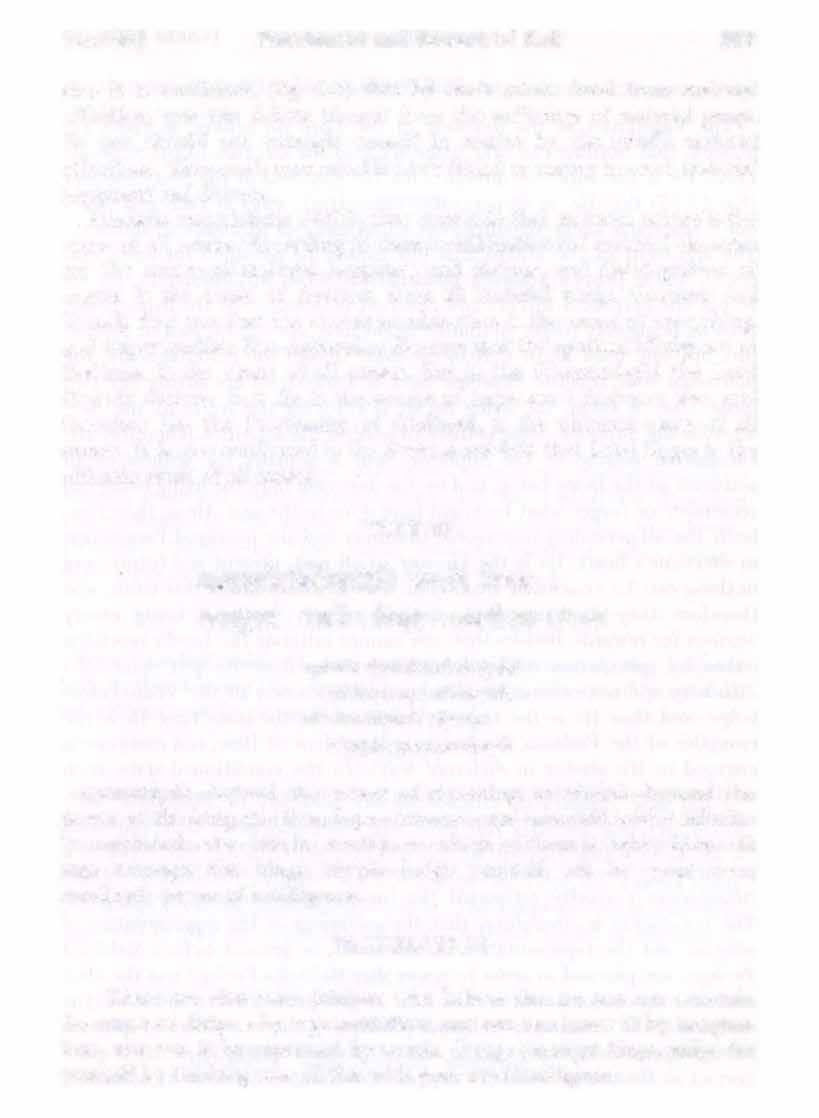
3(S\ij'Hi-G>M��·RJ� �Rf�Ft: I
31SII�� � � ((1¥4"1l't�l ll�oll
apratarkyiid anirdesyiid iti ke�v api niScaya{l. atriinuruparh riijar§e vimrsa sva-mani�ayii
apratarkyiit-beyond the power of reasoning; anirdesyiit-beyond the power of thinking; iti-thus; ke�u- someone ; api-also; niscaya{l.-definitely concluded; atra-herein; anumpam-which of them is right; riijar§e-0 sage amongst the kings; vimrsa-judge yourself; sva-by your own; manl§ayii-power of intelligence.
TRANSLATION
There are also some thinkers who believe that no one can ascertain the cause of distress by argumentation, nor can one know it by imagina· tion, nor can it be expressed by words. 0 sage amongst kings, judge for yourself by thinking over all this with your own intelligence.
Text 20) Punishment and Reward of Kali 899
The Vai�v.avites or the devotees of the Lord do believe, as above explained, that nothing can take place without the sanction of the Supreme Lord. He is the supreme director, for He confirms in the Bhagavad-gitii (Bg. 15.15) that He, as all-pervading Paramatma, stays in each and everyone's heart and keeps vigilance over all actions and witnesses all activities. The argument of the atheist that one cannot be punished for one's misdeeds, unless proved before a qualified justice, is refuted herein, for we accept the perpetual witness and constant companion of the living being. A living being may forget all that he might have done in his past or present life, but one must know that in the same tree of the material body, the individual soul and the Supreme Soul as Paramatma are sitting like two birds. One of them, the living being, is enjoying1 the fruits of the tree, whereas the Supreme Being is there to witness the activities. Therefore the Paramatma feature or the Supreme Soul is actually the witness of all activities of the living being, and by His direction only the living being can remember or forget what he might have done in the past. He is, therefore, both the all-pervading impersonal Brahman and the localized Paramatma in everyone's heart. He is the knower of all past, present and future, and nothing can be concealed from Him. The devotees know this truth, and therefore they discharge their duties sincerely, without being overly anxious for rewards. Besides that, one cannot estimate the Lord's reactions either by speculation or by scholarship. Why does He put some into difficulty and not others? He is the supreme knower of the Vedic knowledge, and thus He is the factual Vedantist. At the same time He is the compiler of the Vedanta. No one is independent of Him, and everyone is engaged in His service in different ways. In the conditioned state, such services are rendered by the living being underforce by the material nature, whereas in the liberated state the living being is helped by the spiritual nature in the voluntary loving service of the Lord. There is no incongruity or inebriety in His actions. All are on the path of Absolute Truth. Bhl�madeva correctly estimated the inconceivable actions of the Lord. The conclusion is, therefore, that the sufferings of the representative of religion and the representative of the earth, as present before Maharaja PankJ?it, are planned in order to prove that Maharaja Pa�it was the ideal executive head, for he knew well how to give protection to the cows (the earth) and the briihma!las (religious principles), the two pillars of spiritual advancement. Everyone is under the full control of the Lord_ He is quite correct in His action when He desires something to be done by someone, irrespective of the consideration of the particular case. Maharaja PankJ?it

900 Srimad-Bhagavatam [Canto l, Ch. l7
PURPORT
was thus put to test for his greatness. Now let us see how he solves it by his sagacious mind.
TEXT 21

� d � � �... ll:;ii(1'EI+mI
(1+uf'-ijwt +r.m1 �: �� �II��II
siita uviica evam dharme pravadati sa samraf} dvija-sattamiifl samiihitena manasii vikhedafl paryaca�ta tam
siitafl uviica- Suta Gosvam! said; evam- so; dharme-the personality of religion; pravadati-thus having spoken; safl-he ; samriit-the Emperor; dvija-sattamiifl-0 best among the briihmaras; samiihite na-with proper attention; manasii-by the mind; vikhedafl- without any mistake; paryaca�ta-counterreplied; tam-unto him.
TRANSLATION
Suta Gosvami said: 0 best amongst the brahmaJ)as, the Emperor P�it, thus hearing the personality of religion speak, was fully satisfied, and without mistake or regret he gave his reply.
PURPORT
The statement of the bull, the personality of religion, was full of philosophy and �nowledge, and the King was satisfied, since he could understand that the suffering bull was not an ordinary one. Unless one is perfectly conversant with the law of the Supreme Lord, one cannot speak such things touching philosophical truths. The Emperor, being also on an equal level of sagacity, replied to tlw point, without doubts or mistakes.
Text 22) Punishment and Reward of Kali 901
��
<l:fitijf'\!1 �JiiftA ���I �: � fi.-Eiif®rA �������
TEXT 22
rajoviica
dharmam brav�i dharma-jna dharmo 'si vr�a- riipa-dhrk yad adharma-krtafl sthiinam sucakasyiipi tad bhavet

riijii uviica-the King said; dharmam- religiosity;brav�i- as you speak; dharma-jna- like one who knows the codes of religion; dharmafl- the personality of religion; asi- you are; vr�a-rupa-dhrk-in the disguise of a bull;yat-whatever; adharma-krtafl-one who acts irreligiously; sthiinamplace;sucakasya-of the identifier;api-also;tat- that;bhavet- becomes.
TRANSLATION
The King said: 0 you, who are in the form of a hull! You know the truth of religion, and you are speaking on the principles that if one knows the location of irreligious acts, one will know the perpetrator. You are no other than the personality of religion.
PURPORT
A devotee's conclusion is that no one is directly responsible to become a benefactor or mischiefmonger without the sanction of the Lord; therefore he does not consider anyone to be directly responsible for such action. But in both the cases he takes it for granted that either benefit or loss is God-sent, and thus it is His grace. In case of benefit, no one will deny it is God-sent, but in case ofloss or reversesit becomes doubtful how the Lord could be so unkind to His devotee as to put him in great difficulty. Jesus Christ was seemingly put into such great difficulty, being crucified by the ignorant, but he was never angry at the mischiefmongers. That is the way of accepting a thing, either favorable or unfavorable. Thus for a devotee the identifier is equally a sinner, like the mischiefmonger. By God's grace, the devotee tolerates all reverses, and Maharaja Pa�it observed this, and therefore he could understand that the bull was no other than the personality of religion himself. In other words, a devotee has no suffering at all because so-called suffering is also God's grace for a devotee who sees God in everything. They never placed any complaint before the King for being tortured by the personality of Kali, although everyone lodges such complaints before the state authorities. The extraordinary behavior of the bull made the King conclude that the bull was
902
Srimad-Bhigavatam
[Canto I, Ch. 17
certainly the personality of religion, otherwise no one could understand the finer intricacies of the codes of religion.
TEXT 23

Sl1m \Etid�•�• � •a�(ino;cu 1
��.mq \(61wtlfitkt �: ����II
athavii deva-miiyii.yii. niinarh gatir agocarii. cetaso vacasas cii.pi bhutiiniim iti niScaya�
athavii.-alternatively; deva-the Lord; miiyiiyii�-energies; nunam- very little; gati�-movement; agocarii-inconceivable; cetasa�-either by the mind; vacasa�-by words; ca-or;api-also; bhiitiiniim-of aU living beings; iti-thus; niScaya�-concluded.
TRANSLATION
Thus it is concluded that the Lord's energies are inconceivable. No one can estimate them by mental speculation or by word jugglery.
PURPORT
A question may be raised as to why a devotee should refrain from identifying an actor, although he knows definitely that the Lord is the ultimate doer of everything. Knowing the ultimate doer, one should not pose himself as ignorant of the actual performer. To answer this doubt, thereply is thattheLord is also not directly responsible because everything is done by His deputed miiyii-sakti, or material energy. The material energy is always provoking doubts about the supreme authority of the Lord. The personality of religion knew perfectly well that nothing can take place without the sanction of the Supreme Lord, and still he was put into doubts by the deluding energy, and thus he refrained from mentioning the supreme cause. This doubtfulness was due to the contamination of both Kali and the material energy. The whole atmosphere of the age of Kali is magnified by the deluding energy, and the proportion of measurement is inexplicable.
Text 23) Punishment and Reward of Kali 903
TEXT 24
�cr.��(1�f'IMqm:�i(n: I �l��� ll«t! ��HIFIG\(64ll�'flU
tapa[!. saucarit daya satyam iti padiifl. krte krta'{l. adharmaritsais trayo bhagna[l. smaya-sanga-madais tava

tapafi,-austerity; saucam-cleanliness; daya-mercy; satyam-truthfulness; iti-thus; padafi.-legs; krte-in the age of Satya; krta[!.-established; adharma-irreligiosity; aritsai[l.-by the parts; trayafi.-three combined; bhagna[l.-broken;smaya-pride;sanga-too much association with women; madai[!.-intoxication;tava-your.
TRANSLATION
In the age of Satya [truthfulness] your four legs were established by the four principles of austerity, cleanliness, mercy and truthfulness. But it appears that three of your legs are broken due to rampant irreligion in the form of pride, lust for women, and intoxication.
PURPORT
The deluding energy, or material nature, can act upon the living beings proportionately in terms of the living beings' falling prey to the deluding attraction of miiyii. Moths are captivated by the glaring brightness of light, and thus they become a prey to the fire. Similarly, the deluding energy is always captivating the conditioned souls to become a prey to the fire of delusion, and the Vedic scriptures warn the conditioned souls not to become a prey to delusion but to get rid of it. The Vedas warn us not to go to the darkness of ignorance but to the progressive path of light. The Lord Himself also warns that the deluding power of material energy is too powerful to overcome, but one who completely surrenders unto the Lord can easily do so. But to surrender unto the lotus feet of the LO£d is also not very easy. Such surrender is possible by persons of austerity, cleanliness, mercy and truthfulness. These four principles of advanced civilization were remarkable features in the age of Satya. In that age, every human being was practically a qualified briihma[la of the
904 Srimad-Bhagavatam [Canto 1, Ch. 17
highest order, and in the social orders of life they were all paramaharhsas, or the topmost in the renounced order. By cultural standing, the human beings were not at all subjected to the deluding energy. Such strong men of character were competent enough to get away from the clutches of miiyii. But gradually, and as the basic principles of brahminical culture, namely austerity, cleanliness, mercy and truthfulness, became curtailed by proportionate development of pride, attachment for women and intoxication, the path of salvation or the path of transcendental bliss retreated far, far away from the human society. With the progression of the age of Kali, people are becoming very proud, and attached to women and intoxication. By the influence of the age of Kali, even a pauper is proud of his penny, the women are always dressed in an overly attractive fashion to victimize the minds of men, and the man is addicted to drinking wine, smoking, drinking tea and chewing tobacco, etc. All these habits, or so-called advancement of civilization, are the root causes of all irreligiosities, and therefore it is not possible to check corruption, bribery and nepotism. Man cannot check all these evils simply by statutory acts and police vigilance, but he can cure the disease of the mind by the proper medicine, namely advocating the principles of brahminical culture or the principles of austerity, cleanliness, mercy and truthfulness. Modern civilization and economic development are creating a new situation of poverty and scarcity with the result of blackmailing the consumer's commodities. If the leaders and the rich men of the society spend fifty percent of their accumulated wealth mercifully for the misled mass of people and educate them in God consciousness or in the knowledge of Bhiigavatam, certainly the age of Kali will be defeated in its attempt to entrap the conditioned souls. We must always remember that false pride, or too high an estimation of one's own values of life, undue attachment to women or association with them, and intoxication will divert the human civilization from the path of peace, however much the people clamor for peace in the world. The preaching of the Bhiigavatam principles will automatically render all men practiced to austerity, clean both inside and outside, merciful to the suffering, and truthful in daily behavior. That is the way of correcting the flaws of human society which are very prominently exhibited at the present moment.

Text 25) Punishment and Reward of Kali 905
TEXT 25 ro;ff � � � f.l��q�: I � f41t��\iftUS44¥tia�l\«r: �: ����II
Srimad-Bhagavatam
idiinim dharma piidas te satyam nirvartayed yata� tam jighrk�aty adharmo 'yam anrtenaidhita� kali�

idiinim-at the present moment; dharma-0 personality of religion; piidalt-legs; te-of you; satyam-truthfulness; nirvartayet-hobbling along somehow or other; yatalt-whereby; tam-that; jighrk�ati-trying to destroy; adharmalt-the personality of irreligion; ayam-this; anrtena-by deceit; edhitalt-flourishing; kalilt-quarrel personified.
TRANSLATION
You are now standing on one leg only, which is your truthfulness, and you are somehow or other hobbling along. But quarrel personified [Kali], flourishing by deceit, is also trying to destroy that leg.
PURPORT
The principles of religion do not stand on some dogmas or manmade formulas, but they stand on four primary regulative observances, namely austerity, cleanliness, mercy and truthfulness. The mass of people must be educated to practice these principles from childhood. Austerity means to accept voluntarily things which may not be very comfortable for the body but are conducive for spiritual realization, for example, fasting. Fasting twice or four times a month is a sort of austerity which may be voluntarily accepted for spiritual realization only, and not for any other purposes, political or otherwise. Fastings which are not meant for self-realization but for some other purposes are condemned in the Bhagavad-gitii (Bg. 17. 56). Similarly, cleanliness is necessary both for the mind and the body. Simply bodily cleanliness may help to some extent, but cleanliness of the mind is necessary, and it is effected by glorifying the Supreme Lord. No one can cleanse the accumulated mental dust without glorifying the Supreme Lord. A godless civilization cannot cleanse the mind because it has no idea of God, and for this simple .reason people under such a civilization cannothavegoodqualifications,howeverthey may be materially equipped. We have to see things by their resultant action. The resultant action of human civilization in the age of Kali is dissatisfaction, so everyone is anxiousto get peace ofmind. This peaceof mind was complete in theSatya Age because of the existence of the above-mentioned attributes of the human being. Gradually these attributes have diminished in the Treta-yuga
906
[Canto l, Ch. 17
to three fourths, in the Dviipara to half, and in this age of Kali they are diminished to one fourth, which is also gradually diminishing on account of prevailing untruthfulness. By pride, either artificial or real, the resultant action of austerityis spoiled; by too much affection for female association, cleanliness is spoiled; by too much addiction to intoxication, mercifulness is spoiled; and by too much lying propaganda, truthfulness is spoiled. The revival of Bhiigavata-dharma can save the human civilization from falling a prey to evils of all description.
TEXT 26
iyam ca bhiimir bhagavatii nyiisitoru-bharii sat!: sr"imadbhis tat-padanyiisaibsarvatab- krta-kautukii
iyam- this; ca-and; bhiimi�- surface of the earth; bhagavatii-by the Personality of Godhead; nyiisita- being performed personally as well as by others; urn-great; bharii-burden; sat!:-being so done; sr"imadbhib--by the all-auspicious; tat-that; pada nyiisaib--footprints; sarvatab--all around; krta-done; kautukii-good fortune.
TRANSLATION
The burden of the earth was certainly diminished by the Personality of Godhead and by others as well. When He was present as an incarnation, all good was performed because of His auspicious footprints.
TEXT 27
socaty asru-kalii siidhv"i durbhagevojjhitii sat!: abrahmaJJyii nrpa-vyiijiibsiidrii bhok�yanti miim iti

Text 27] Punishment and Reward of Kali 907
� � i{fll� ;::q•Ri�� m1
�:tij4i1ijctil������
.ijlij(J:�((riH�:
���i\(l�ijlijffl I
3UUAo:qltqo�'II'SU:���'ltflffifl�\91
socati-lamenting; asru-kalii--with tears in the eyes; siidhvz-the chaste; durbhagii-as if the most unfortunate;iva-like; iijjhitii-forlorn; sati- being so done; abrahma!lyii[l - devoid of brahminical culture; nrpa-vyiijii[l -posed as the ruler; siidriilz-lower class; bhok�yanti-would enjoy; miim- me; itithus.
TRANSLATION
Now she, the chaste one, being unfortunately forsaken, as it were, by the Personality of Godhead, laments her future with tears in her eyes, for now she is being ruled and enjoyed by lower class men who pose as rulers.
PURPORT
The k§atriya, or the man who is qualified to protect the sufferers, is meant to rule the state. Untrained lower class men, or men without ambition to protect the sufferers, cannot be placed on the seat of an administrator. Unfortunately, in the age of Kali the lower class men, without training, occupy the post of a ruler by strength of popular votes, and instead of protecting the sufferers, such men create a situation quite intolerable for everyone. Such rulers illegally gratify themselves at the cost of all comforts of the citizens, and thus the chaste mother earth cries to see the pitiable condition of her sons, both men and animals. That is the future of the world in the age of Kali when irreligiosity prevails most prominently. And in the absence of a suitable king to curb irreligious tendencies, educating the people systematically in the teaching of SrimadBhiigavatam will clear up the hazy atmosphere of corruption, bribery, blackmailing, etc.
TEXT28

iti dharmam mahzm caiva siintvayitvii mahii-rathalz niSiitam iidade khangarh
kalaye 'dharma-hetave
iti-thus; dharmam-the personality of religion; mahim-the earth; caalso; eva-as; siintvayitvii-after pacifying; mahii-ratha�-the general who
908 Srimad-Bhagavatam [Canto l, Ch. 17
��
'1ft �(ii�N�I �: I f;atalil'i�� u w�slilli�� ������
could fight alone with thousands of enemies; n isiitam-sharp;iidade-took up; khmigam-sword; kalaye-to kill the personified Kali; adharmairreligion;hetave-the root cause.
TRANSLATION
Maharaja Pa�it, who could fight one thousand enemies singlehandedly, thus pacified the personality of religion and the earth. Then he took up his sharp sword to kill the personality of Kali, who is the cause of all irreligion.
PURPORT
As described above, the personality of Kali is he who deliberately commits all kinds of sinful acts which are forbidden in the revealed scriptures. This age of Kali will certainly be full of all activities of Kali, but this does not mean that the leaders of society, the executive heads, the learned and intelligent men, or above all the devotees of the Lord shall sit down tight and become callous to the reactions of the age of Kali. In the rainy season certainly there will be profuse rainfalls, but that does not mean that men should not take means to protect themselves from the rains. It is the duty of the executive heads of state and others to take all necessary actions against the activities of Kali or the persons influenced by the age of Kali; and Maharaja Pan�it is the ideal executive head of the state, for he became at once ready to kill the personality of Kali with his sharp sword. The administrators should not simply pass resolutions for anticorruptional steps, but they must be ready with sharp sword to kill the persons creating corruptions from the angle of vision of therecognized Siistras. Theadministratorscannotprevent corrupt activities by allowing wine shops. They must at once close all shops of intoxicating drugs and wine and force punishment even by death for those who indulge in the habit of intoxication of all description. That is the way of stopping the activities of Kali, as exhibited herein by Maharaja Par!k�it, the mahii-ratha.

Text 29] Punishment and Reward of Kali 909
TEXT29 �filt�iij41N�� Nm iqetS{§WI'( 1 \'t�ql((if� ftmn � ¥f:qAce: ������
Srimad-Bhagavatam
tarh jighii.rhsum abhipretya


vihii.ya nrpa-liinchanam
tat-pii.da-miilam sirasii. samagii.d bhaya-vihvala�
tam- him; jighiirhsum-willing to kill; abhipretya-knowing it well; vihiiya-leaving aside; nrpa-liinchanam-the dress of a king; tat-pii.damiilam-at his feet; sirasii- by the head; samagiit-fully surrendered; bhaya- vihvala�-under pressure of fearfulness.

TRANSLATION
When the personality of Kali rmderstood that the King was willing to kill him, he at once abandoned the dress of a king, and, under pressure of fear, completely surrendered to him, bowing his head.
PURPORT
The royal dress of the personality of Kali is artificial. The royal dress is suitable for a king or k§atriya, but when a lower class man artificially dresses himself as a king, his real identity i isclosed by the challenge of abona fide k§atriya like Maharaja Parik�it. Areal k§atriya never surrenders. He accepts the challenge of his rival k§atriya, and he fights either to die or to win. Surrender is unknown to a real k§atriya. Inthe age of Kali there are so many pretenders dressed and posed like administrators or executive heads, but their real identity is disclosed when they are challenged by a real k§atriya. Therefore when the artificially dressed personality of Kali saw that to fight Maharaja Pan�it was beyond his capacity, he bowed down his head like a subordinate and gave up his royal dress.
TEXT 30

qftffl QIGA1+ft(: fJRl I

patitam piidayor v"ira�
krpayii. dlna-vatsala� sarar-yo niivadh"ic chlokya
aha cedam hasann iva
910
[Canto 1, Ch. 17
��Q�����oll "'
patitam-fallen down; piidayo�-at the feet; vira�-the hero; krpayiiout of compassion; dlna-vatsala�- kind to the poor; sara[Lya�-one who is qualified to accept surrender; na-not; avadhit-did kill; slokya�-one who is worthy of being sung; iiha-said; ca-also; idam- this; hasan-smiling; iva - like.
TRANSLATION
Maharaja Pa�it, who was qualified to accept surrender and worthy of being sung in history, did not kill the poor surrendered and fallen Kali, but smiled compassionately, for he was kind to the poor.
PURPORT

Even an ordinary k§atriya does not kill a surrendered person, and what to speak of Maharaja Parik�it, who was by nature compassionate and kind to the poor. He was smiling because the artificially dressed Kali disclosed his identity as a lower class man, and he was thinking how ironic it was that noone was saved from his sharp sword when he desired to kill, but the poor lower class Kaliwas spared byhistimely surrender. Maharaja Pa�it's glory and kindness is therefore sung in history. He was a kind and compassionate emperor, fully worthy of accepting surrender even from his enemy. Thus the personality of Kali was saved by the will of Providence.
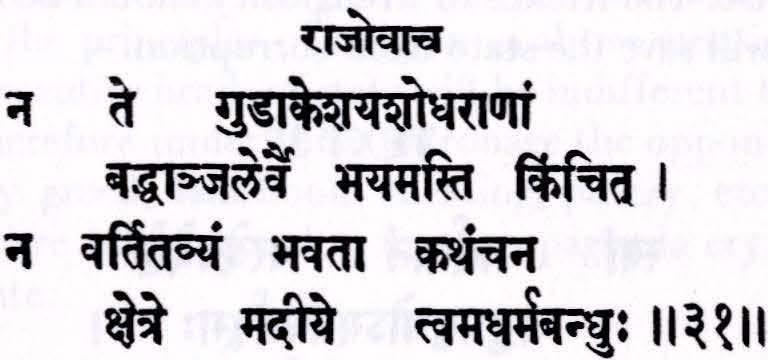
Text 31) Punishment and Reward of Kali 911
31 riijoviica na te gu!liikesa-yaio-dharii[Liim baddhiiiijaler vai bhayam asti kiiicit' na vartitavyam bhavatii kathancana k§etre madlye tvam adharma-bandhu�
TEXT
sri raja uvaca-theKingsaid;na-not; te-your ; gu�akesa-Arjuna; yaia[ldharli!l-lim-of youwhoinheritedthefame; baddhanjale[l-one withfolded hands; vai-certainly; bhayam-fear; asti-there is; kincit-even a slight; na-neither; vartitavyam-can be allowed to live; bhavata-by you; kathancana-by all means; k§etre-in the land; madiye-in my kingdom; tvam-you; adharma-bandhu[l-the friendof irreligion.


TRANSLATION

The King thus said: We have inherited the fame of Arjuna; therefore since you have surrendered yourself with folded hands you need not fear for your life. But you cannot remain in mykingdom, for you are the friend of irreligion.
PURPORT
The personality of Kali, who is the friend of all kindsofirreligiosities, may be excused if he surrenders, but in all circumstances he cannot be allowed to live as a citizen in anypart of a welfare state. The Pap9.avas were entrusted representatives of thePersonalityofGodheadLordKr�pa, who practically brought into being the Battle of Kuru�etra, but not for any personal interest. He wanted that an ideal King like Maharaja Yudhi�thira and his descendants like Maharaja Pal"ikflit should rule the world,andthereforearesponsible kinglikeMaharajaPal"ikflitcannotallow thefriendofirreligiositytoflourishinhiskingdomatthecostofthegood fameofthePap9.avas.That is thewayof wipingoutcorruptioninthestate, andnototherwise. Thefriends ofirreligiosityshouldbebanishedfromthe state,andthatwillsavethestatefromcorruption.
912 Snmad-Bhagavatam [Canto 1, Ch. 17
� wt(4>ctUtiqssttWistt+t'4�t: �'llsi\4 iiimJ � +t1ll1 � �: II��II
TEXT 32 �
tviim vartamlinam nara-deva-dehe�v anupravrtto 'yam adharma-piiga[l lobho 'nrtam cauryam anaryam arhho jye§fha ca maya kalahas ca dambha[l
tvam-you; vartamanam-while present; nara-deva-a man-god, or a king; dehe§u- in the body; anupravrtta�- beginning all over; ayam-all these; adharma- irreligious principles; piiga�- in the masses; lobha�greed; anrtam-falsity; cauryam- robbery; anaryam-incivility; arhha�treachery; jye�tha- misfortune; ca- and; maya-cheating; kalaha� - quarrel; ca-and; dambha� - vanity.

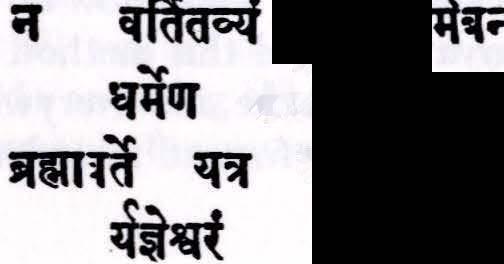
TRANSLATION
If the personality of Kali or irreligion is allowed to act as a man-god or an executive head, certainly irreligious principles like greed, falsehood, robbery, incivility, treachery, misfortune, cheating, quarrel and vanity will abound.
PURPORT
The principles of religion, namely austerity, cleanliness, mercy and truthfulness, as we have already discussed, may be followed by the follower of any faith. There is no need of turning the coat of a Hindu to Mohammedan to Christian or some other faith and thus become a renegade without following the principles of religion. The Bhiigavatamreligion urges following the principles ofreligion. The principles of religion are not the dogmas or regulativeprinciples of a certain faith. Such regulative principles may be different in terms of the time and place concerned. One has to see whether the aims of religion have been achieved. Sticking to the dogmas and formulas without attaining the real princivles is no good. A secular state may be impartial to any particular type of faith, but the state cannot be indifferent to the principles of religion as above mentioned. But in the age of Kali, the executive heads of state will be indifferent to such religious principles, and therefore under their patronage the opponents of religious principles, namely greed, falsehood, cheating, pilfery, etc., will naturally follow, and so there is no meaning in a propaganda crying to stop corruption in the state.

Text 33] Punishment and Reward of Kali 913
33 � � ._�, �R q:qillf4aawtfitqn 11 � � 11
TEXT
Srimad-Bhigavatam
na vartitavyarh tad adharma-bandho darmerta satyena ca vartitavye
brahmiivarte yatra yajanti yajiiair yajiiesvararh yajiia-vitiina-vijiiiitt
na-not; vartitavyam-deserve to remain; tat-therefore; adharmairreligiosity; bandho-friend; dharmerta-with religion; satyena-with truth; ca-also; vartitavye-being situated in; brahmiivarte-place where sacrifice is performed;yatra-where; yajanti-duly perform; yajiiaitt-by sacrifices ordevotional services;yajiiesvaram- untotheSupremeLord, the PersonalityofGodhead;yajiia-sacrifice;vitiina- spreading;vijiiiifr.-experts.
TRANSLATION
Therefore, 0 friend of irreligion, you do not deserve to remain in a place where experts perform sacrifices according to truth and religious principles for the satisfaction of the Supreme Personality of Godhead.
PURPORT
Yajiiesvara, or the SupremePersonality of Godhead, is the beneficiary of all kinds of sacrificial ceremonies. Such sacrificial ceremonies are prescribed differently in the scriptures for different ages. In other words, sacrifice means to accept thesupremacyoftheLordandtherebyperform actsbywhichtheLordmaybesatisfiedinallrespects.Theatheistsdonot believe in the existence ofGod,andtheydonotperformanysacrificefor the satisfaction of the Lord. Any place or country where the supremacy oftheLordisacceptedandthussacrificeisperformediscalled brahmiivarta. There are different countries in different parts of theworld,andeach and every country may have different types of sacrifice to please the Supreme Lord, but the central point in pleasing Him is ascertained in the Bhiigavatam, and it is truthfulness. Thebasicprincipleofreligion istruthfulness, and the ultimate goal of all religionsistosatisfytheLord. Inthis age of Kali, the greatest common formula of sacrifice is the sankirtarwyajiia. That is the opinion oftheexpertswhoknowhowtopropagatethe process of yajiia. Lord Caitanya preached this method of yajiia, and it is understood from this verse that anywhere and everywhere the sacrificial method of sankirtana-yajiia may be performed in ordertodriveawaythe

914
[Canto 1, Ch. 17
personality of Kali and save the human society from falling prey to the influence of the age.
TEXT 34
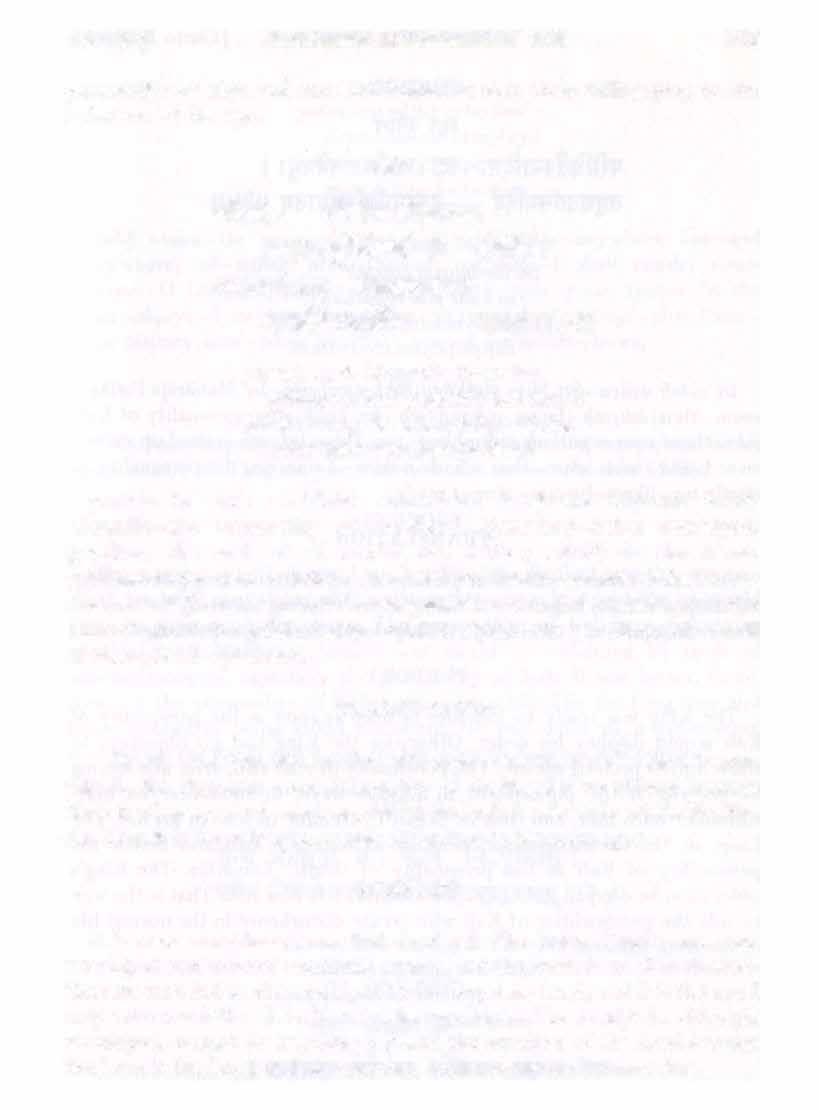
cmr-�� M(&f¥\RI"R��ftit1��" 3lmR 11�\111
yasmin harir bhagaviin ijyamiina ijyiitma-murtir yajatiim sam tanoti kiimiin amoghiin sthira-jangamiiniim antar bahir viiyur-iva�a iitmii
yasmin-in such sacrificial ceremonies; hari�- the Supreme Lord; bhagaviin-the Personality of Godhead; ijyamiina�-being worshiped; ijya-iitma- the soul of all worshipable deities; murti�-in the forms; yajatiim-those who worship; Sam-welfare; tanoti-spreads; kiimiin-desires; amoghiin-inviolable; sthira-jangamiiniim-of all the moving and the unmoving; anta�- within; bahi�-outside; viiyu�- air; iva-like; e�a�-of all of them; iitmii-spirit soul.
TRANSLATION
In all sacrificial ceremonies, although sometimes a demigod is worshiped, the Supreme Lord Personality of Godhead is worshiped because He is the Supersoul of everyone, and exists both inside and outside like the ·air. Thus it is He only who awards all welfare to the worshiper.
PURPORT
It is even sometimes seen that demigods like Indra, Candra, etc., are worshiped and offered sacrificial awards, yet the rewards of all such sacrifices areawarded to theworshiper by the Supreme Lord, and it is the Lord only who can offer all welfare to the worshiper. The demigods, although worshiped, cannot do anything without the sanction of the Lord because the Lord is the Supersoul of everyone, both moving and nonmoving.
Text 34] Punishment and Reward of Kali 915
-�•1?41f.l�'IR (Jtii�'{Rtti<lf � �I
q{\f?lfl¥td�e: 64Q611'e'llt( � m1.11ia�q1: 1 �an&WaQa(������

sri suta uviica panlc�itaivam iid�ta{l sa kalir jiita-vepathu{l tam udyatiisim iihedarh da"!lpa-pii"!lim ivodyatam
sri suta{l uviica- Sri Siita Gosvami said; pan7c�itii-by Maharaja Parik�it; evam-thus; iid�tafl-being ordered;sa{l-he; kali{l-the personality of Kali; jiita-there was; vepathu{l- trembling; tam-him; udyatii-raised up; asimsword; iiha-said; idam-thus; da[lpa-pii"!lim-Yamaraja, the personality of death; iva-like; udyatam-almost ready.
TRANSLATION
Sri Suta Gosvami said: The personality of Kali, thus being orderedby Maharaja Pa�it, began to tremble in fear. Seeing the King before him like Yamaraja, ready to kill him, Kali spoke to the King as follows.
PURPORT
The King was ready to kill him at once as soon as the personality of Kali would disobey his order. Otherwise the King had no objection to allowhim to prolong his life. The personalityof Kali also, after attempting to get rid of the punishment in various ways, decided that he must surrender unto him, and thus he began to tremble in fear of his life. The King, or the executive head, must be so strong as to stand before the personality of Kali as the personality of death, Yamaraja. The King's ordermustbe obeyed, otherwise the culprit's life is in risk. That is the way to rule the personalities of Kali who create disturbance in the normal life of the state citizens.
916 Srimad-Bhagavatam
��em;r [Canto 1, Ch. 17
TEXT 35
TEXT 36 41��€11'€1 � � � m�ihf 6ill(ltll 1 m � � �•'�•�s�w6-.,ut�u
Punishment and Reward of Kali
kalir uviica
yatra kva viitha vatsyiimi
siirva-bhauma taviijnayii
lak�aye tatra tatriipi
tviim iitte�u-sariisanam
kalifi. uviica-the personality of Kali said; yatra-anywhere; kva-and everywhere; vii-either; atha-thereof; vatsyiimi-1 shall reside; siirvabhauma-0 Lord (or Emperor) of the earth; tava-your; ajnayii-by the order;lak�aye-1 see; tatra-anywhereand everywhere; tatriipi-also; tviimyour Majesty; iitta-taken over; i�u-arrows;sariisanam-bows.
TRANSLATION
0 Your Majesty, though I may live anywhere and everywhere under your order, I shall but see you with bow and arrows wherever I look.
PURPORT
Thepersonality ofKali could see that Maharaja Parik�it was the emperor of all lands all over the world, and thus anywhere he might live he would have to meet with the same. The personality of Kali was meant for mischief, and Maharaja P�it was meant for subduing all kinds of mischiefmongers, especially the personality of Kali. It was better, therefore, for the personality of Kali to have been killed by the King then and there instead of being killed elsewhere. He was, after all, a surrendered soul before the King, and it was for the King to do what was required.
TEXT 37

R �i!� fwlq+�(m I
•fiRm � 311feia�s�ijltlwti( ����II
tan me dharma-bhrtiim sre�tha sthiinam nirde�tum arhasi
yatraiva niyato vatsya
iiti�thams te 'nusiisan6m
tat-therefore;me-me;dharma-bhrtiim-of all theprotectors of religion; sre�tha-the chief; sthiinam-place; nirde�tum-fix;arhasi-may you do so;.
Text
37]
917
yatra-where; eva-certrunly; niyata[t-always; vatsye-can reside; ati�fhanpermanently situated; te-your; anuslisanam-under your rule.
TRANSLATION
Therefore, 0 chief amongst the protectors of religion, please fix some place for me where I can live permanently under the protection of your government.
PURPORT
The personality of Kali adressed Maharaja P�it as the chief amongst the protectors of religiosity because the King refrained from killing a person who surrendered unto him. A surrendered soulshould be given all protection, even though he may be an enemy. That is the principle of religion. And we can just imagine what sort of protection is given by the Personality of Godhead to the person who surrenders unto Him, not as an enemy but as a devoted servitor. The Lord protects the surrendered soul from all sins and all resultant reactions of sinful acts. (Bg. 18.66)
TEXT 38

��CIFJ
ai��6M<(I � �f;r
.� W I
� qr.f �: Qffl ���: II��II
siita uviica
abhyarthitas tadii tasmai
sthiiniini kalaye dadau
dyiitarh piinarh striya[l siinii yatriidharma.S catur-vidha[l
siitafl uviica-Siita Gosvarrii said; abhyarthitafl-thus being petitioned; tadii-at that time; tasmai-unto him; sthiiniini-places; kalaye-to the personality of Kali; dadau- gave him permission; dyiitam- gambling; piinam-drinking; striya[t-illicit association of women; siiniip-animal slaughter; yatra-wherever; adharmap-sinful activities; catur-vidhafl-four kinds of.
918 Srimad-Bhagavatam [Canto 1,. Ch. 17
Siita Gosvimi said: Maharaja Parik.!jit, thus being petitioned by the personality of Kali, gave him permissionto reside in places where gambling, drinking, prostitution and animal slaughter were performed.
PURPORT
The basic principles of irreligiosity, such as pride, prostitution, intoxication and falsehood, counteract the four principles of religion, namely austerity, cleanliness, mercy and truthfulness. The personality of Kali was given permission to live in four places particularly mentioned by the King, namely the place of gambling, the place of prostitution, the place of drinking and the place of animal slaughter.
Srila Jiva Gosvami directs that drinking against the principles of scriptures, such as the Sautriima!li-yajii.a, etc., association with women outside marriage, and killing animals against the injunctions of scripture, are irreligious. In the Vedas two different types of injunctions are there for the pravrttas, or those who are engaged in material enjoyment, and for the nivrttas, or those who are liberated from material bondage. The Vedic injunction for the pravrttas is to gradually regulate their activities towards the path of liberation. Therefore, for those who are in the lowest stage of ignorance and indulge in wine, woman and flesh, drinking by performing Sautriimari-yajiia, association of woman by marriage and flesh-eating by sacrifices are sometimes recommended. But such recommendations in the Vedic literature are meant for a particular class of men, and not for all. But because there are injunctions of the Vedas for particular types of persons, such activities by the prav[ttas are not considered adharma. One man's food may be poison for others; similarly, what is recommended for those in the modes of ignorance may be poison for those in the modes of goodness. Srila Jiva Gosvami Prabhu, therefore, affirms that recommendations in the scriptures for a certain class of men are never to be considered adharma, or irreligious. But such activities are factually adharma, and they are never to be encouraged. The recommendations in the scriptures are not meant for encouragement of such adharmas, but for regulating the necessary adharmas gradually toward the path of dharma.
Following in the footsteps of Maharaja Pan""kl)it, it is the duty of all executive heads of states to see that the principles of religion, namely austerity, cleanliness, mercy and truthfulness, are established in the state�

Text 38) Punishment and Reward of Kali 919
TRANSLATION
and the principles of irreligion, namely pride, illicit female association or prostitution, intoxication and falsity be checked by all means. And to make the best use of a bad bargain, -the personality of Kali may be transferred to places of gambling, drinking, prostitution and slaughterhouses, if there are any places like that. Those who are addicted to these irreligious habits may be regulated by the injunctions· of the scripture. In all circum· stances they should not be encouraged by any state. In other words, the state should categorically stop all sorts of gambling, drinking, prostitution and falsity. The state which wants to eradicate corruption by majority may introduce the principles of religion in the following manner:
1. Two compulsory fasting days in a month, if not more (austerity). Even from the economic point of view, such two fasting days in a month in the state will save tons of food, and the system will also act very favorably on the general health of the citizens.
2. There must be compulsory marriage of young boys and girls attaining twenty-four years of age and sixteen years of age respectively. There is no harm in coeducation in the schools and colleges provided the boys and girls areduly married,and in casethere is any intimate connection between a male and female student, they should be married properly without illicit relation. The divorce act is encouraging prostitution, and this should be abolished.
3. The citizens of the state must give in charity up to fifty percent of their income for the purpose of creating a spiritual atmosphere in the state or in the human society, both individually and collectively. They should preach the principles of Bhiigavatam by a) karma-yoga or doing everything for the satisfaction of the Lord, b) regular hearing of the SrimadBhiigavatam from authorized persons or realized souls, c) chanting of the glories of the Lord congregationally at home or at places of worship, d) rendering allkinds of service to Bhiigavatas engagedin preaching SrimadBhiigavatam, and e) residing in a place where the atmosphere is saturated with God consciousness. If the state is regulated by the above process, naturally there will be God consciousness everywhere.
Gambling of all description, even speculative business enterprises, is considered to be degrading, and by encouraging gambling in the state, there is a complete disappearance of truthfulness. Allowing young boys and girls to remain unmarried more than the above-mentioned ages and license for animal slaughter houses of all description should be at once prohibited. The flesh-eaters may be allowed to take flesh as is mentioned in the scriptures, and not otherwise. Intoxication of all description, even the smoking of cigarettes, the chewing of tobacco or drinking of tea, must be prohibited.

920 Srimad-Bhigavatam [Canto l, Ch. 17
TEXT 39

� �l"qttl'11tt ��d�'li:OidiC: I m� � � �' �t "� �������
puna.S ca yiicamiiniiya jiita-rupam adiit prabhuft tato 'nrtam madam kiimam rajo vairam ca paiicamam
punaft-again; ca-also; yiicamiiniiya-to the beggar; jiita-riipam-gold; adiit-gave away; prabhuft-the king; tataft-whereby; anrtam-falsehood; madam-intoxication; kiimam-lust; raja"ft-on account of a passionate mood;vairam-enmity; ca-also;paiicamam-the fifth one.


TRANSLATION
The personality of Kali asked for something more, and because of his begging, the King gave him permission to live where there is gold because wherever there is gold there is also falsity, intoxication, lust, envy and enmity.
PURPORT
Although Maharaja Pan'"'kl?it gave Kali permission to live in four places, it was very difficult for him to find the places because during the reign of Maharaja P�it there were no such places. Therefore Kali asked the King to give him something practical which could be utilized for his nefarious purposes. Maharaja Pan'"'kl?it thus gave him permission to live in a place where there is gold, because wherever there is gold there are all the abovementioned four things, and over and above them there is enmity also. Sothe personality of Kali became gold standardized. According to SrimadBhiigavatam, gold encourages falsity, intoxication, prostitution, envy and enmity. Even a gold standard exchange and currency is bad. Gold standard currency is based on falsehood because currency is not on a par with the reserved gold. The basic principle is falsity because currency notes are issued more in value than the actual reserved gold. This artificialinflation of currency by the authorities encourages prostitution of state economy. The price of commodities becomes artificially inflated because of bad money or artificial currency notes. Bad money drives away good money.
Text 39] Punishment and Reward of Kali
921
Instead of paper currency, actual gold coins should be used for exchange, and this will stop prostitution of gold. Gold ornaments for women may be allowed by control, not by quality, but by quantity. This will discourage lust, envy and enmity. When there is actual gold currency in the form of coins, the influence of gold in producing falsity, prostitution; etc., will automatically cease. There will be no need of an anticorruption ministry for another term of prostitution and falsity of purpose.
TEXT40
qif �f.l alilhi¥1�: �: 1
amuni paiica sthiiniini hy adharma-prabhavaly. kalily.
auttareye[la dattiini nyavasat tan-nidesakrt
amuni-all those; panca-five; sthiiniini- places; hi-certainly; adharmairreligious principles; prabhavaly.-encouraging; kalily.-the age of Kali; auttareye[la-by the son of Uttara; dattiini- delivered; nyavasat-dwelt; tat-by him; niddakrt- directed.

TRANSLATION

Thus the personality of Kali, by the directions of Maharaja Par�it, the son of Uttara, was allowed to live in those five places.



PURPORT
Thus the age of Kali began with gold standardization, and therefore falsity,intoxication, animal slaughter and prostitution are rampant all over the world, and the saner section is eager to drive out corruption. The counteracting process is suggested above, and everyone can take advantage of this suggestion.
TEXT41

922 (Canto 1, Ch. 17
� ��Q((<�NT<�i((ll\loll
3fmf;{ifij''t� m: �: 1 fit� \IJiilit � 11\l�ll
athaitiini na seveta bubhii�ul;l puru�al;l kvacit viSe�ato dharma-suo riijii loka-patirgurul;l
atha-therefore; etani-all these; na-never; seveta- come in contact; bubhilfiu�- those who desire well-being; purufia�-person; kvacit-in any circumstances; viSefiata�- specifically; dharma-sllal;l-those who are on the progressive path of liberation; riijii-the king; loka-patil;l -public leader; gum�-the brtihmaf1-as and the sannytisis.
TRANSLATION
Therefore whoever desires progressive well-being, especially kings, religionists, public leaders, brahma!las and sannyasis, should never come in contact with the four above-mentioned irreligious principles.

PURPORT
The briihmafla is the religious preceptor for all other castes, and the sannyiisis are the spiritual masters for all the castes and orders of society. So also are the king and the public leaders who are responsible for the material welfare of all people. The progressive religionists and those who are responsible human beings or those who do not want to spoil their valuable human lives should refrain from all the principles of irreligiosity, especially from illicit connection with women. If a briihmafla is not truthful, all his claims as a brahmaf1.a at once become null and void. If a sannyasi is illicitly connected with women, all his claims as a sannyiisi at once become false. Similarly, if the king and the public le�der are unnecessarily proud or habituated to drinking and smoking, certainly they become disqualified to discharge public welfare activities. Truthfulness is the basic principle for all religions. The four leaders of the human society, namely the sannyiisi, the brtihmafla, the king and the public leader, must be tested crucially by their character and qualification. Before one can be accepted as a spiritual or material master of society, he must be tested by the above-mentioned criteria of character. Such public leaders may be less qualified in academic qualifications, but it is necessary primarily that they are free from the contamination of the four disqualifications, namely gambling, drinking, prostitution and animal slaughter.
Text 41] Punishment and Reward of Kali
923
vr�asya �tams trin padiin tapafl saucam dayam iti pratisandadha asvasya mah1m ca samavardhayat
vr§asya-of the hull (the personality of religiosity); na§tan-lost; binthree; padiin-legs; tapafl- austerity; saucam-cleanliness; dayam-mercy; iti-etc.; pratisandadhe -reestablished; asvasya- by encouraging activities; mah1m-the earth; ca- and; samavardhayat-perfectly improved.
TRANSLATION
Thereafter the King reestablished the lost legs of the personality of religion [the bull], and by encouraging activities he sufficiently improved thecondition of the earth.
PURPORT
By designating particular places for the personality of Kali, Maharaja Parik�?it practically cheated Kali. In the presence of Kali, Dharma (in the shape of a hull), and the earth (in the shape of a cow), he could actually estimate the general condition of his kingdom, and therefore he at once took proper steps to reestablish the legs of the hull, namely austerity, cleanliness and mercy. And for the general benefit of the people of the world, he saw that the gold stock might he employed for stabilization. Gold is certainly a generator of falsity, intoxication, prostitution, enmity and violence, hut under the guidance of a proper king or public leaderor a briihmar-a or sannyiis� the same gold can he properly utilized to reestablish the lost legs of the bull, the personality of religion.
Maharaja P�it, therefore, like his grandfather Arjuna, collected all illicit gold kept for the propensities of Kali and employed it in the sankirtana-yajii.a, as per instruction of the Srimad-11hiigavatam. As we have suggested before, one's accumulated wealth may be divided in three parts for distribution, namely fifty percent for the service of the Lord, twentyfive percent for the family members and twenty-five percent for personal

924 Srimad-Bhigayatam [Qmto l, Ch. 17
ml
'ltf =if e¥Htit�d\
TEXT42
Wl!i�mt'{(N:��'lftr I stRt�« 311\IIW
����U
necessities. Spending fifty percent for the service of the Lord or for propagation of spiritual knowledge in society by way of the sankirtanayajfia is the maximum display of human mercy. People of the world are generally in darkness regarding spiritual knowledge, especially in regard to devotional service of the Lord, and therefore to propagate the systematic transcendental knowledge of devotional service is the greatest mercy that one can show in this world. When everyone is taught to sacrifice fifty percent of his accumulated gold for the Lord's service, certainly austerity, cleanliness and mercy automatically ensue, and thus the lost three legs of the personality of religion are automatically established. When there is sufficient austerity, cleanliness, mercy and truthfulness, naturally mother earth is completely satisfied, and there is very little chance for Kali to infiltrate the structure of human society.
TEXTS43-44
����:i1(tt���lee'(1 11�1� ��1 u��a: ������
sa e§a etarhy adhyiista iisanam pii.rthivocitam pitiimahenopanyastam riij;iiiraryam vivik§atii
iiste 'dhunii sa riijar§*
kauravendra-sriyollasan gajiihvaye mahii-bhagas cakravarti brhac-chravii�
sa�-he; e§a�-this; etarhi-at the present; adhyiiste-is ruling over; iisanam-the throne; piirthiva-ucitam-just befitting a king; pitiimahenaby the grandfather; upanyastam-being handed over; riij fiii-by the king; araryam-forest; vivik}atii-desiring; iiste-is there; adhunii-at present; sa[l-that; riijar�ip-the sage amongst the kings; kauravendra-the chief amongst the Kuru kings; .Sriyii-glories; ullasan-spreading; gajiihvaye-in Hastinapura; mahii-bhiigap-the most fortunate; cakravarti-the Emperor; brhat-sravii[l-highly famous.

Texts43-44] Punishment and Reward of Kali 925
t1� �iwtl({l 3IR1wi qf�it� I fcmqt;flq�� (l$1(w.f
�������
TRANSLATION

The most fortunate Emperor Maharaja Pa�it , who was entrusted with thekingdom ofHastinapura by Maharaja Yu�thira when he desired to retire to the forest, is now ruling the world with great success due to his being glorified by the deeds of the kings of the Kuru dynasty.
PURPORT
The prolonged sacrificial ceremonies undertaken by the sages of Naimi�ara�ya were begun a very little after the demise of Maharaja Pan�it. The sacrifice was to continue for one thousand years, and it is understood that in the beginning some of the contemporariesof Baladeva, theelderbrother of Lord Kr��a,also visited the sacrificialplace. According to some authorities, the present tense is also used to indicate the nearest margin of time from the past. In that sense, thepresent tense is applied to the reign of Maharaja Parikl?it here. For a continuous fact, also, present tense canbe used. Theprinciples of Maharaja Pan"k�it canbe stillcontinued, and human society can still be improved if there is determination by the authorities. We can still purge out from the state all the activities of immorality introduced by the personality of Kali if we are determined to take action like Maharaja Parik�it. He alloted some place for Kali, but in fact Kali could not find such places in the world at all because Maharaja Pan�it was strictly vigilant to see that there were no places for gambling, drinking, prostitution and animal slaughter. Modern administrators want to banish corruption from the state, but fools as they are, they do not know how to do it. They want to issue licenses for gambling houses, wine and other intoxicating drug houses, brothels and hotel prostitution and cinema houses, and falsity in every dealing, even in their own, and they want at the same time to drive out corruption from the state. They want thekingdom of God without God consciousness. How canit be possible to adjust two contradictory matters?If we want to driveout corruption from the state, we must first of all organize society to accept theprinciplesof religion, namely austerity, cleanliness, mercy and truthfulness, and to make the condition favorable we must close all places of gambling, drinking, prostitution and falsity. These are some of the practical lessons from the pagesof Srimad-Bhiigavatam.
926 Srimad-Bhigavatam [Canto 1, Ch. 17
TEXT45 �dl�¥il::ttsq+tflf'l�tf� �: � q�: �Ti� <Of�: ll'd'-\11
Punishment and Reward of Kali
ittham-bhiitanubhiivo 'yam abhimanyu-suto nrpa�

yasya piilayata� k�au{lim yiiyam satriiya dik�itii�
ittham-bhiita-being thus; anubhiiva�-experience; ayam-of this; abhimanyu-suta�-son of Abhimanyu; nrpa�-the king; yasya-whose; piilayata�-on account of his ruling; k�au{lim-on the earth; yiiyam-you all;satriiya-in performing sacrifices; dik�ita�-initiated.
TRANSLATION
Maharaja Pan�t, the son of Abhimanyu, is so experienced that by dint of his expert administration and patronage, it has been possible for you to perform a sacrifice such as this.
PURPORT
The briihma{las and the sannyiisis are expert in spiritual advancement of society, whereas the k�atriyas or the administrators are expert in the material peace and prosperity of human society. Both of them are the pillars of all happiness, and therefore they are meant for full cooperation for common welfare. Maharaja Pan�it was experienced enough to drive away Kali from his field of activities and thereby make the state receptive to spiritual enlightenment. If the common people are not receptive, it is very difficult to impress upon them the necessity of spiritual enlightenment. Austerity, cleanliness,mercy and truthfulness, the basic principles of religion, prepare the ground for the reception of advancement of spiritual knowledge, and Maharaja Pan�it made this favorable condition possible. Thus the .nJis of Naimi�aral)ya were able to perform the sacrifices for a thousand years. In other words, without state support, no doctrines of philosophy or religious principles can progressively advance. There should be complete cooperation between the briihma{las and the k�atriyas for this common good. Even up to Maharaja A.Soka, the same spirit was prevailing. Lord Buddha was sufficiently supported by King Asoka, and thus his particular cult of knowledge was spread all over the world.
Thus end the Bhaktivedanta purports of the First Canto, Seventeenth Chapter, of the Srimad-Bhagavatam, entitled «Punishment and Reward of Kali."
Text
45)
927
CHAPTER EIGHTEEN
Maharaja Parfl<$it cursed by a Brahmaoa Boy


TEXT
siita uviica yo vai drau[ty-astra-viplufito na miitur udare mrta� anugrahiid bhagavata� krfirtasyiidbhuta-karmarta�
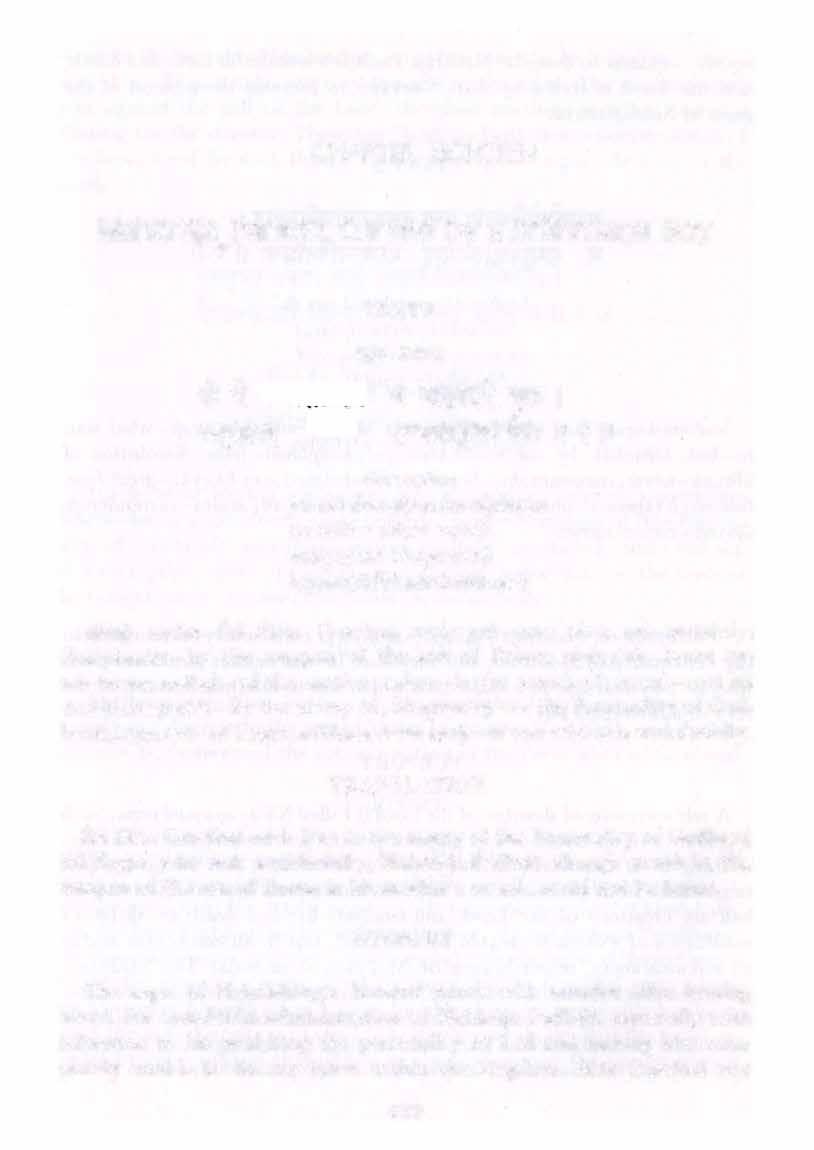
siita[l. uvaca- Sri Suta Gosvami said; ya[l.-one who; vai-certainly; draupi-astra-by the weapon of the son of Drof)a; viplu�tafl.-burnt by; na-never; matu[l.-of the mother; udare-in the womb of; mrta[l.-met his death; anugrahat-by the mercy of; bhagavata[l.-of the Personality of Godhead; kn1Jasya-of l<f�qa;adbhuta-karmartafl.-of one whoacts wonderfully.
TRANSLATION
Sri Suta Gosvami said: Due to the mercy of the Personality of Godhead Sri l<rF!�a, who acts wonderfully, Maharaja P ar�it, though struck by the weapon of the son of Dro�a in his mother's womb, could not be burnt.
PURPORT
The sages of Naimi�aral).ya became struck with wonder after hearing about the wonderful administration of Maharaja Parik�it, especially with reference to his punishing the personality of Kali and making him completely unable to do any harm within the kingdom. Suta Gosvami was
� � � 'lld¢\l � 1 q� t;WI�I&ij4iaiut: II �
I � :acr�
II
929
equally anxious to describe Maharaja Pari:'k:flit's wonderful birth and death, and this verse is stated by Siita Gosvami to increase the interest of the sages of Naimi�araJ;tya.
TEXT2


brahma-kopotthitiid yas tu tak�akiit priir-a-viplaviit na sammumohorubhayiid bhagavaty arpitiisaya�
brahma-kopa-fury of a briihmarza; utthitiit-caused by;yalt-what was; tu-but; tak§akiit-by the snake-bird; priirza-viplaviit-from dissolution of life; na-never; sammumoha- became overwhelmed; uru-bhayiit- great fearfulness; bhagavati- unto the Personality of Godhead; mpita-surrendered; iiSaya[l.-consciousness.
TRANSLATION
Furthermore, Maharaja Pa�it was always consciously surrendered to the Personality of Godhead, and therefore he was neither afraid nor overwhelmed by fear due to a snake-bird which was to bite him because of the fury of a brahm�a boy.
PURPORT
A self-surrendered devotee of theLord is called Narayat:�a-pariiyafla. Such a person is never afraid of any place or person, not even of death. For him nothing is as important as the Supreme Lord, and thus he gives equal importance both to heaven and hell. He knows well that both heaven and hell are creations of the Lord, and similarly life and death are different conditions of existence created by the Lord. But in all conditions and in all circumstances, remembrance of Narayat�a is essential. The NarayaJ;tapariiya!la practices this constantly. Maharaja Parik�it was such a pure devotee. He was wrongfully cursed by an inexperienced son of a briihma11a who was under the influence of Kali, and Maharaja Parik�it took this to be sent by Narayat:Ja. He knew that Narayat:Ja (Lord Kr�!Qa) saved him when he was
930 Srimad-Bhagavatam [Canto l, Ch_ 18
burnt in the womb of his mother, and if he were to be killed by a snake bite, it would also take place by the will of the Lord. The devotee never goes against the will of the Lord; therefore anything sent by God is a blessing for the devotee. Therefore Maharaja Pan"k�it was neither afraid of nor bewildered by such things. That is the sign of a pure devotee of the Lord.
TEXT3

utsrjya sarvatafz sangam vijiiiitiijita-samsthitifz vaiyiisaker jahau si§yo gangiiyiim svam kalevaram
uts.rjya- after leaving aside; sarvatafz-all around; sangam-association; vijiiata-being understood; ajita-one who is never conquered (the Personality of Godhead); samsthitifz-actual position; vaiyasakeft-unto the son of Vyasa; jahau-gave up; s�yafz-as a disciple; gangayam-on the bank of the Ganges; svam-his son; kalevaram-material body.
TRANSLATION
Furthermore, after leaving all his associates, the King surrendered himself as a discipletothesonof Vyasa [Sukadeva Gosvami), andthushe was able to understand theactual positionofthePersonality of Godhead.
PURPORT
The word ajita is significant here. The Personality of Godhead Sri Kr��a is known as Ajita, or unconquerable, and He is so in every respect. No one can know His actual position. He is unconquerable by knowledge also. We have heard about His dhama, or place, eternal Goloka Vrndavana, but there are many scholars who interpret this abode in different ways. But by the grace of a spiritual master like Sukadeva Gosvami, unto whom the King gave himself up as a most humble disciple, one is able to under· stand the actual position of the Lord, His eternal abode, and His transcendental paraphernalia in that dhama or abode. Knowing the transcendental
Text3) Maharaja Par�it Cursed by a Brahm�a Boy 931
��6H(
i3t(l\iilw.fu: qH!(lldl�<t4�Rt:I �4{Hi�J(i ���
II�II
position of the Lord and the transcendental method by which one can approach that transcendental dhiima,. the King was confident about his ultimate destination, and by knowing this he could leave aside everything material, even his own body, without ariy difficulty of attachment. In the Bhagavad-gitii, it is stated, param d.r�tvii nivartate, or one can give up all connection of the material attachment when one is able to see the param, or the superior quality of things. We understand the superior quality of energy of the Lord and the material quality of material energy from the Bhagavad-gitii and by thegrace of a bonafide spiritual master like Sukadeva Gosvami. It is quite possible to know everything of the superior energy of the Lord by which the Lord manifests His eternal name, quality, pastimes, paraphernalia and variegatedness. Unless one thoroughly understands this superior or eternal energy of the Lord, it is not possible to leave the material energy, however one may theoretically speculate on the true nature of the Absolute Truth. By the grace of Lord Kr�l).a, Maharaja Pari"k�it was able to receive the mercy of a personality like Sukadeva Gosvami, and thus he was able to know the actual positionof the unconquerable Lord. It is very difficult to find the Lord from the Vedic literatures, but it is very easy to know Him by the mercy of a liberated devotee like Sukadeva Gosvami.
TEXT4

�JSNicn6iitf � 1
�U;:ijHi14lsw:t¥1�sf'l�6t:qdJ"ilit'(ll'll'l
nottamasloka-viirtiiniirh ju�atiirh tat-kathiimrtam syiit sambhramo'nta-kiile'pi smaratiirh tat padambu-jam
na-never; uttama-sloka-the Personality of Godhead, who is sung of by the Vedic hymns;viirtiiniim-of those who live on them;ju�atiim-of those who are engaged in; tat-His; kathii-amrtam-transcendental topics about Him; syiit-it so happens; sambhramtJb-misconception; anta-at the end; kiile-in time;api-also;smaratiim-remembering;tat-His;pada-ambu-jamlotus feet.


TRANSLATION
This was so because those who have dedicated their lives to the transcendental topics of the Personality of Godhead, of whom the Vedic hymns
932 Srimad-Bhagavatam [Canto l, Ch. 18
sing, and who are constantly engaged in remembering the lotus feet of the Lord, do not run the risk of having misconceptions at the last moment of their lives.
PURPORT

The highest perfection of life is attained by remembering the transcendental nature of the Lord at the last moment of one's life. This perfection of life is made possible by one who has learned the actual transcendental nature of the Lord from the Vedic hymns sung by a liberated soul like Sukadeva Gosvami or someone in that line of disciplic succession. There is no gain in hearing the Vedic hymns from some mental speculator. When the same is heard from an actual self-realized soul and is properly understood by service and submission, everything becomes transparently clear. Thus a submissive disciple is able to live transcendentally and continue to the end of life. By scientific adaptation, one is able to remember the Lord even at the end of life when the power of remembrance is slackened due to derangement of bodily membranes. For a common man, it is very difficult to remember things as they are at the time of death, but by the grace of the Lord and His bona fide devotees, the spiritual masters, one can get this opportunity without difficulty. And it was done in the case of Maharaja Pan�it.
TEXTS
tiivat kalir na prabhavet pravifito 'plha sarvata(l yiivad iSo mahiin urvyiim iibhimanyava eka-riit
tiivat-so long; kalifl- the personality of Kali; na-cannot; prabhavetflourish;prav41afl-entered in; api-even though;iha-here;sarvatafl-everywhere; yiivat-as long as; iSafl-the Lord; mahan-great; urvyiim-powerful ; iibhimanyavafl-the son of Abhimanyu; eka-riit-the one emperor.
TRANSLATION
As long as the great, powerful son of Abhimanyu remains the Emperor of the world, there is no chance of the Personality of Kali flourishing.

Text 5) Maharaja P�it Cursed by a Brahm�a Boy 933
PURPORT
As we have already explained, the personality of Kali had entered the jurisdiction of this earth long ago, and he was looking for an opportunity to spread his influence all over the world. But he could not do so satisfactorily due to the presence of Mahara.ja Parilujit. That is the way of good government. The disturbing elements like the personality of Kali will always tryto extend their nefarious activities,but it is the duty of the able stateto checkthem byall means. Although Maharaja Pan�it alloted places for the personality of Kali, at the same time he gave no chance to the citizens to be swayed bythe personality of Kali.
TEXT6

yasminn ahani yarhy eva bhagaviin utsasarja giim tadaivehiinuvrtto'siiv adharma-prabhavafl kali"fl
yasmin-on that; ahani-very day; yarhi eva-in the very moment; bhagaviin-the Personality of Godhead; utsasarja-left aside; giim-the earth; tadii-at that time; eva-certainly; iha-in this world; anuvrtta[lfollowed;asuu-he;adharma-irreligion;prabhava"fl-accelerating;kali"fl-the personality of quarrel.
TRANSLATION
The very day and moment the Personality of Godhead Lord Sri Kr!?�a left this earth, the personality of Kali, who promotes all kinds of irreligious activities, came into this world.
PURPORT
The Personality of Godhead and His holy name, qualities, etc., are all identical. The personality of Kali was not able to enterthejurisdiction of the earth due to the presence of the Personality of Godhead. And similarly, if there is an arrangement for the constant chanting of the holy
934 Srimad-Bhagavatam [Canto 1, Ch. 18
�M'Itf.t qiR ¥f4MIS«1(1J �I -: �:11�11
names, qualities, etc., of the Supreme Personality of Godhead, there is no chance at all for the personality of Kali to enter. That is the technique of driving away the personality of Kali from the world. In modernized human society there are great advancements of material science, and they have invented the radio to distribute sound in the air. So instead of vibrating some nuisance sound for sense enjoyment, if the state arranges to distribute transcendental sound by resounding the holy name, fame and activities of the Lord, as they are authorized in the Bhagavad-gitii or SrimadBhiigavatam, then a favorable condition will be created, and the principles of religion in the world will be reestablished, and thus the executive heads, who are so anxious to drive away corruption from the world, will be successful. Nothing is bad if properly used for the service of the Lord. TEXT7
niinudve�ti kalim samriit siiranga ivasiira-bhuk kusaliiny iisu siddhyanti netariir-ikrtiiniyat
na-never; anudve�ti-envious; kalim-unto the personality of Kali; samrat-the Emperor; siiranga-realist, like the bees; iva-like; siira-bhuk-one who accepts the substance;kusaliini-auspicious objects;iisu-immediately; siddhyanti-become successful; na-never; itariir-i-which are inauspicious; krtiini-being performed;yat-as much as.
TRANSLATION
Maharaja P�t was a realist, like the bees who only accept the essence [of a flower]. He knew perfectly well that in this age of Kali, auspicious things produce good effects immediately, whereas inauspicious acts must be actually performed [to render effects]. So he was never envious of the personalityof Kali.
PURPORT
The age of Kali is called the fallen age. In this fallen age, because of the living beings' being in an awkward position, the Supreme Lord has given some special facilities to them. So by the will of the Lord, a living being

Text7] Maharaja P�it Cursed by a Brahm�a Boy 935
� ��"�I
R\���ij(lfVI��� \911
litl�f!
�I?J
does not become a victim of a sinful act until the act is actually performed. In other ages, simply by thinking of performing a sinful act, one used to become a victim of the act. On the contrary, a living being, in this age, is awarded with the results of pious acts simply by thinking of them. Maharaja Parik�it, being the most learned and experienced king by the grace of the Lord, was not unnecessarily envious of the personality of Kali because he did not intend to give him any chance to perform any sinful act. He protected his subjects from falling prey to the sinful acts of the age of Kali, and at the same time he gave full facility to the age of Kali by alloting him some particular places. At the end of the SrimadBhiigavatam it is said that even though all nefarious activities of the personality of Kali are present, there is a great advantage in the age of Kali. One can attain salvation simply by chanting the holy name of the Lord. Thus Maharaja Parik�it made an organized effort to propagate chanting of the Lord's holy name, and thus he saved the citizens from the clutches of Kali. It is for this advantage only that great sages sometimes wish all good for the age of Kali. In the Vedas also it is said that by discourse on Lord Kreyl).a's activities,one can get rid of all thedisadvantages of the age of Kali. In the beginning of the Srimad-Bhagavatam it is also said that by the recitation of Srimad-Bhagavatam, the Supreme Lord becomes at once arrested within one's heart. These are some of the great advantages of the age of Kali, and Maharaja Parik�it took all the advantages and did not think any ill of the age of the Kali, true to his Vaig1avite cult.
TEXTS
kim nu bale§U surer-a kalina dhira-bhirur-ii apramattafi, pramatte§U yo vrko nr§u vartate
kim-what; nu-may be; bale§u-among the less intelligent persons; surer-a-by the powerful; kalina-by the personality of Kali; dhira- selfcontrolled; bhirur-ii-by one who is afraid of; apramattafi,-one who is careful; pramatte§u-among the careless; yafi,-one who; vrkafi,-tiger ; nr�u-among men; vartate-exists.

936 Srimad-Bhagavatam [Canto l, Ch. 18
f4i� � � � �(•ft�l I
�:��'flit�������
TRANSLATION
Maharaja Pan�it considered that less intelligent men might find the personality of Kali to be very powerful, but that those who are selfcontrolled would have nothing to fear. The King was powerful like a tiger and took care for the foolish, careless persons.
PURPORT
Those who are not devotees of the Lord are careless and unintelligent. Unless one is thoroughly intelligent, one cannot be a devotee of the Lord. Those who are not devotees of the Lord fall prey to the actions of Kali. It will not be possible to bring about a saner condition in society unless we are prepared to accept the modes of action adopted by Maharaja Pan"K�it, i.e., propagation of devotional service of the Lord to the common man.
upavarrtitam etad vafi.
purtyam parlk§itam mayii
viisudeva-kathopetam
iikhyiinam yad aprcchata
upavarrtitam-almost everything described; etat-all these; vafi.-unto you; pu[tyam-pious;parlk§itam-about Maharaja Parik�it;mayii-by me; viisudeva-of Lord KpJJ)a;kathii-narrations;upetam-in connection with; iikhyiinam-statements;yat-what;aprcchata-you asked from me.

TRANSLATION
0 sages, as you did ask me, now I have almost described everything regarding the narrations about Lord Kr��a in connection with the history of the pious MaharajaPan�it.
PURPORT
Srimad-Bhiigavatam is the history of the activities of the Lord. And the activities of the Lord are performed in relation with the devotees of the
Text9] Maharaja P�it Cursed by a Brahmru;Ia Boy 937
TEXT9 aqcdft<til<i'l'H� qaftfttd INti +4GO'l"'0<i II �II ctlij�ct�q<J¥(R�t4
Lord. Therefore, the history of the devotees is not different from the history of Lord Kr��a's activities. A devotee of the Lord regards boththe activities of the Lord and those of His pure devotees on an equal level, for they are all transcendental.
TEXT 10

��: cpn l11FRJ: CfitlwU�Wqol: I
�;�;((ij�l(ijl�: ll�o)l
yii yiifl, kathii bhagavatafl, kathaniyorukarmartaft gu[La-karmiisrayiifl, pumbhifl, samsevyiis tii bubhii§ubhifl,
yii�-whatever; yiif!,-and whatsoever; kathii�-topics; bhagavatafl,about the Personality of Godhead; kathaniya-were to be spoken by me; urukarmartaft-of Him who acts wonderfully; gu[ta-transcendental qualities; karma-uncommon deeds; asrayaf!,-involving; pumbhift-by persons; samsevyiifl,-ou ght to be heard by; tii-all of them; bubhii§ubhifl,-by those who want their own welfru:e.
TRANSLATION
Those who are desirous of achieving complete perfection in life must submissively hear all topics. that are connected with the transcendental activities and qualities of the Personality of Godhead, who acts wonderfully.
PURPORT
The systematic hearing of the transcendental activities, qualities and names ofLord Sri Kr��a pushes one toward eternal life. Systematic hearing means to know Him gradually in truth and fact, and this knowing Him in truth and fact means to attain eternal life, as it is stated in the Bhagavadgita. Such transcendental glorified activities of Lord Sri Kr��a are the prescribed remedy for counteracting the process of birth, death, old age and disease, which are considered to be material awards for the conditioned living being. The culmination of such a perfectionalstage of life is the goal of human life and the attainment of transcendental bliss.
938 Srimad-Bhagavatam [Canto I, Ch. 18
Maharaja Pa�it Cursed by a Brahm�a Boy
TEXT ll ��: � iiift � ��lflRiUCfij( tN: I �wm�'k'!li..PI'ii� ;J: ������

r�aya ucufl suta fiva samiifl saumya
siisvat'ir viSadam yasafl yas tvam samsasi kr§!wsya
martyiiniim amrtam hi nafl
sr'i nayafl ucufl- the good sages said; suta-0 Suta Gosvami; fiva-we wish you life for; samiifl-many years; saumya-grave; siisvat'ifl- eternal; viSadam-particularly; ya5afl-in fame; yafl tvam-because you; samsasispeaking nicely; kr�rtasya-of Lord Sri Kreyl).a; martyiiniim-of those who die; amrtam- eternity of life;hi-certainly; nafl-our.
TRANSLATION
The good sages said: 0 grave Siita Gosvami! May you live many years and have eternal fame, for you are speaking very nicely about the activities of Lord ��a the Personality of Godhead. This is just like nectar for mortal beings like us.
PURPORT
When we hear about the transcendental qualities and activities of the Personality of Godhead, we may always remember what has been spoken by the Lord Himself in the Bhagavad-gitii (Bg. 4.9). His acts, even when He acts in human society, are all transcendental, for they are all accentuated by the spiritual energy of the Lord,which is distinguished from His material energy. As stated in the Bhagavad-gitii, such acts are called divyam. This means that He does not act or take His birth like an ordinary living being under the custody of material energy. Nor is His body material nor changeable like that of ordinary living beings. And one who understands this fact, either from the Lord or from authorized sources, is not reborn after leaving thepresent material body. Such an enlightenedsoul is
Text
ll)
939
admitted into the spiritual realm of the Lord and engages in the transcendental loving service of the Lord. Therefore, the more we hear about the transcendental activities of the Lord, as they are stated in the. Bhagavadgitii and Srimad-Bhiigavatam, the more we can know about His transcendental nature and thus make definite progress on the path back to Godhead.
TEXT 12

karmaf!y asminn aniiSviise
dhuma-dhumriitmaniim bhaviin iipiiyayati govinda
piida-padmiisavam madhu
karma!li-performance of; asmin-in this; aniisuase-without certainty; dhuma-smoke; dhum ra-iitmaniim-tinged body and mind; bhaviin- your good self; iipiiyayati-very much pleasing; govinda-the Personality of Godhead; piida-feet; padmii-iisavam-nectar of the lotus flower; madhuhoney.



TRANSLATION
We have just begun performance of this fruitive activity, a sacrificial fire, without certainty of its result due to the many imperfections in our action. Our bodies have become black from the smoke, but we are factually pleased by the nectar of the lotus feet of the Personality of Godhead Govinda, which you are distributing.
PURPORT
The sacrificial fire kindled by the sages of Nai�ar�ya was certainly full of smoke and doubts because of so many flaws. The first flaw is that there is an acute scarcity of expert briihmap.as able to carry out such performances successfully in this age of Kali. Any discrepancy in such sacrifices spoils the whole show, and the result is uncertain, like agricultural enterprises. The good result of tilling the paddy field depends on providential rain, and therefore the result is uncertain. Similarly, performance
940 Srimad-Bhiigavatam [Canto 1, Ch. 18
�
� 1 anqA44RI •n��q�q'IR1if qII��II
of any kind of sacrifice in this age of Kali is also uncertain. Unscrupulous greedy briihmarws of the age of Kali induce the innocent public to such uncertain sacrificial shows without disclosing the scriptural injunction that in the age of Kali there is no fruitful sacrificiai performance but the sacrifice of the congregational chanting of the holy name of the Lord. Siita Gosvami was narrating the transcendental activities of the Lord before the congregation of sages, and they were factually perceiving the result of hearing these transcendental activities. One can feel this practically, as one can feel the result of eating food. Spiritual realization acts in that way.
The sages of Naim�ar�ya were practically sufferers from the smoke of a sacrificial fire and were doubtful about the result, but by hearing from a realized person like Siita Gosvaml, they were fully satisfied. In the BrahmaVaivarta Purii!la, Vi�I).U tells Siva that in the age of Kali, men full of anxieties of various kinds can vainly labor in fruitive activity and philosophical speculations, but when they are engaged in devotional service, the result is sure and certain, and there is no loss of energy. In other words, nothing performed for spiritual realization or for material benefit can be successful without devotional service of the Lord.
TEXT 13
UMiil
e-•nA
;r • �I
lt4N«1flet4A�i;wl �11?1: II��II
tulayiima laveniipi
na svargam niipunar-bhavam
bhagavat-sangi-sangasya martyiiniim kim-utii.Si§afi.

tulayiima-to be balanced with; lavena-by a moment; api-even; nanever; svargam-heavenly planets; na-neither;apunafi.-bhavam-liberation from matter; bhagavat-sangi- devotee of the Lord; sangasya-of the associa· tion; martyiiniim-those who are meant fordeath; kim-what is there; utato speak of; iisi§afi.-worldly benediction.
TRANSLATION
The value of a moment's association with the devotee of the Lord cannot even be compared to the attainment of heavenly planets or Iibera-
Text 13) Maharaja Pa�it Cursed by a Brahm�a Boy 941
tion from matter, and what to speak of worldly benedictions in the form of material prosperity, which is for those who are meant for death.
PURPORT
When there are some similar points, it is possible to compare one thing to another. One cannot compare the association of a pure devotee to anything material. Men who are addicted to material happiness aspire to reach the heavenly planets like the moon, Venus, lndraloka, etc., and those who are advanced in material philosophical speculations aspire after liberation from all material bondage. When one becomes frustrated in all kinds of material advancement, one desires the opposite type of liberation, which is called apunar-bhava, or no rebirth. But the pure devotees of the Lord do not aspire after the happiness obtained in the heavenly kingdom, nor do they aspire after liberation from material bondage. In other words, for the pure devotees of the Lord, the material pleasures obtainable inthe heavenly planets are like phantasmagoria, and because they are already liberated from all material conceptions of pleasure and distress, they are factually liberated even in the material world. This means that the pure devotees of the Lord are engaged in a transcendental existence, namely, in the loving service of the Lord, both in the material world and in the spiritual world. As a government servant is always the same, either in the office or at home or at any place, so a devotee has nothing to do with anything material, for he is exclusively engaged in the transcendental service of the Lord. Since he has nothing to do with anything material, what pleasure can he derive from material benedictions like kingship or other overlordships, which are finished quickly with the end of the body? Devotional service is eternal, and it has no end because it is spiritual. Therefore, since the assets of a pure devotee are completely different from material assets, there is no comparison between the two. Siita Gosvami was a pure devotee of the Lord, and therefore his association with the r�is in the Naimi�r�ya is unique. In the material world, associationwith gross materialists is veritably condemned. The materialist is called yosit-sangi, or one who is much attached to material entanglement (women and other paraphernalia). Such attachment is conditioned because it drives away the benedictions of life and prosperity. And just the opposite is bhiigavata-sangi, or one who is always in the association with the Lord's name, form, qualities, etc. Such association is always desirable; it is worshipahle, it is praiseworthy, and one may accept it as the highest goal of life.

942 Srimad-Bhagavatam [Canto 1, Ch. 18
TEXT 14 V ;nq �
ko niima trpyed rasavit kathiiyiim mahattamaikiinta pariiyar-asya niintam gur-iiniim agur-asya jagmur yogesvarii ye bhava-piidma-mukhyii�

kafl-who ishe;nama-specifically;trpyet-getfull satisfaction;rasavitexpertinrelishing mellow nectar;kathiiyiim-inthe topicsof;mahattamathe greatest amongst the living being;ekiinta-exclusively;pariiyar-asya-of one who is the shelter of;na-never;antam-end;gur-iiniim-of attributes; agur-asya-of the Transcendence;jagmufl-could ascertain; yogesvarii�the lords of mystic power;ye-all they;bhava-Lord Siva;piidma-Lord Brahma;mukhyiifl-heads.
TRANSLATION
The Personality of Godhead Lord Kr��a [Govinda] is the exclusive shelter for all great living beings, and His transcendental attributes cannot even be measured by such masters of mystic powers as Lord Siva and Lord Brahma. Can anyone who is expert in relishing nectar [rasa] ever be fully satiated by hearing topics about Him?
PURPORT
Lord Siva and Lord Brahma are two chiefs of the demigods. They are full of mystic powers. For example, Lord Siva drank an ocean of poison of which one drop is sufficient to kill an ordinary living being. Similarly, Brahma could create many powerful demigods, including Lord Siva. So they are isvaras, or lords of the universe. But they are not the supreme powerful. The supreme powerful is Govinda, Lord Kr�Qa. He is transcendence, and His transcendental attributes cannot be measured even by such powerful iSvaras as Siva and Brahma. Therefore Lord Kr��a is the
Text 14] Maharaja P�it Cursed by a Brahm�a Boy
'l�oq�Cfil"(t4(1401@«1A(4i'-4P'If ;n;d !JOIIWII'i!J"l@ iiPU�squ it +4qt4111MUU��ll
943
exclusive shelter of the greatest of all living beings. Brahma is counted amongst the living beings, but he is the greatest of all of us. And why is the greatest of all the living beings so much attached to the transcendental topics of Lord Kr�i).a? Because He is the reservoir of all enjoyment. Everyone wants to relish some kind of taste from everything, but one who is engaged in the transcendental loving service of the Lord can derive unlimited pleasure from such engagement. The Lord is unlimited, and His name, attributes, pastimes, entourage, variegatedness, etc., are unlimited, and those who relish them can do so unlimitedly and still not feel satiated. This fact is confirmed in the Padma Puriif!.a.
There is no end of such transcendental discourses. In mundane affairs there is the law of satiation,butin transcendence there is no such satiation. Suta Gosvami desired to continue the topics of Lord Kr�l)a before the sages of Naimi�aral)ya, and the sages also expressed their readiness to hear from him continually. Since the Lord is transcendence and His attributes are transcendental, such discourses increase the receptive mood of the purified audience.
TEXT 15
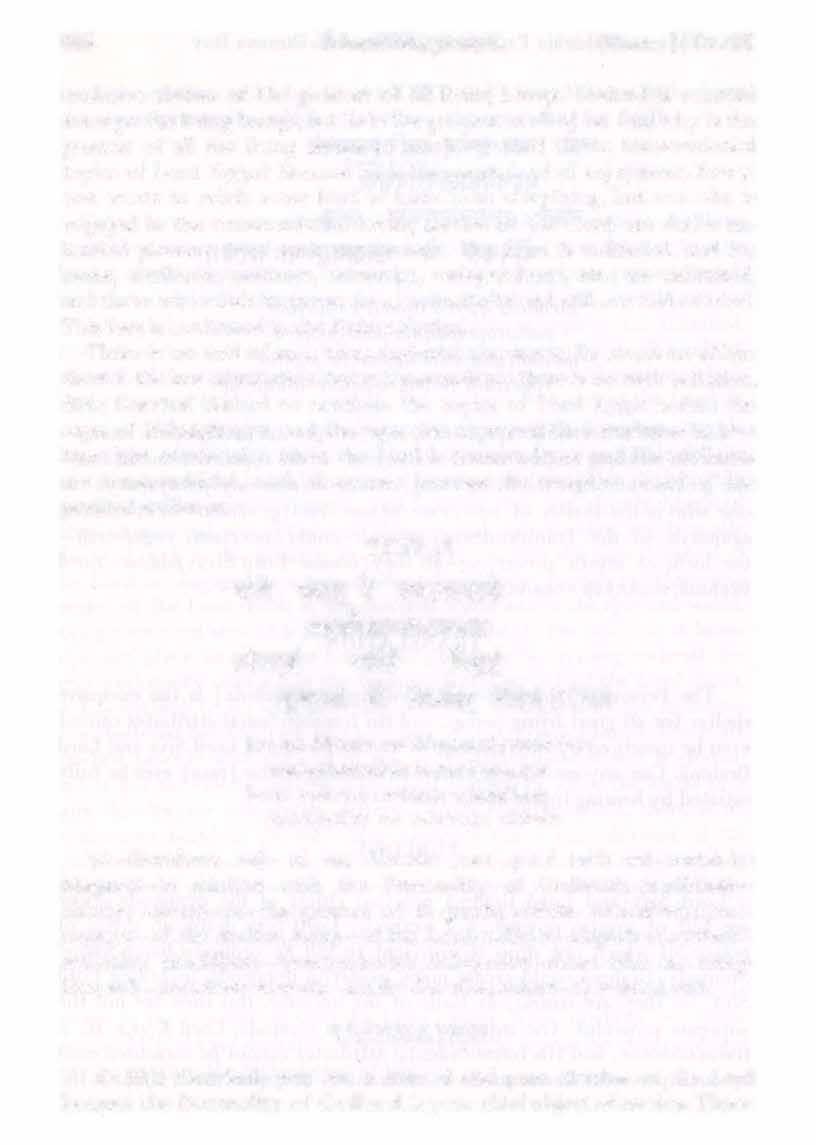
1Rf.t
tan no bhaviin vai bhagavat-pradhiino mahattamaikiinta-pariiyaf!.asya harer udiirarh caritarh viSuddharh susrii§atiirh no vitanotu vidvan
tat-therefore; naft- of us; bhaviin-your good self; vai- certainly; bhagavat-in relation with the Personality of Godhead; pradhiinaftchiefly; mahattama-the greatest of all greats; ekiinta-exclusively; pariiya�asya-of the shelter; hareft-of the Lord; udiiram-impartial; caritamactivities; viSuddham-transcendental; susrii§atiim-those who are receptive; naft-ourselves; vitanotu-kindly describe; vidvan-0 learned one.
TRANSLATION
0 Siita Gosvami, you are a learned and pure devotee of the Lord because the Personality of Godhead is your chief object of service. There-
944 Srimad-Bhagavatam [Canto 1, Ch. 18
�
� ¥f41'4dl'4twn ij('Et�EiiiW{fq(I�UI�
«l(S(R � � � .n Hijtft«ftt;t u����
fore please describe to us the pastimes of the Lord, which are above all material conception, for we are anxious to receive such messages.
PURPORT
The speaker on the transcendental activities of the Lord should have only one object of worship and service, Lord Kr�l)a, the Supreme Personality of Godhead. And the audience for such topics should be anxious to hear about Him. When such a combination is possible, namelya qualified speaker and a qualified audience, it is then ari.d there very much congenial to continue discourses on the transcendence. Professional speakers and a materially absorbed audience cannot derive real benefit from such discourses. Professional speakers make a show of Bhiigavata-saptaha for the sake of family maintenance, and the materially disposed audience hears such discourses of Bhiigavata-saptaha for some material benefit, namely religiosity, wealth, gratification of the senses, or liberation. Such Bhiigavatam discourses are not purified from the contamination of the material qualities. But the discourses between the saints of Naimi�aral)ya and Sri Suta Gosvami are on the transcendental level. There is no motive for material gain. In such discourses, unlimited transcendental pleasure is relished both by the audience and the speaker, and therefore they can continue the topics for many thousands of years. Now Bhiigavata-saptahas are held for seven days only, and after finishing the show, both the audience and the speaker become engaged in material activities as usual. They can do so because the speaker is not Bhiigavata-pradhiina, and the audience is not susrii.§atiim, as explained above.
TEXT 16 � � ¥t«l¥u•I�HJ: .mf�
�;nqf4•ikott¥tG>w�f.{:
(CtiR:iiCNfqiG>'{a( II� �11

sa vai mahii-bhiigavata/;1 parlk§id
yeniipavargiikhyam adabhra-buddhil)
jfliinena vaiyiisaki-sabditena
bheje khagendra-dhvaja-piida-mii.lam
sal)- he; vai- certainly; mahii-bhiigavata/;1-first-class devotee; panK�itthe King; yena-by which; apavarga-iikhyam-by the name of liberation;

Text 16) Maharaja Pa�it Cursed by a Brahmll!la Boy 945
� ��1(1�,�� �
adabhra-fixed; buddhifi.-intelligence; jniinena-by knowledge; vaiyiisakithe son of Vyasa; sabditena-vibrated by; bheje-taken to; khagendraGarw;la, the king of the birds; dhvaja-flag;piida-miilam-soles of the feeL
TRANSLATION
0 Siita Gosvami, please describe those topics of the Lord by which Maharaja Pa�it, whose intelligence was fixed on liberation, attained the lotus feet of the Lord, who is the shelter of Garu�a, the king of birds. Those topics were vibrated by the son of Vyasa [Sn1.a Sukadeva].
PURPORT
There is some controversyamongstthestudents on the path of liberation. Such transcendental students are known as impersonalists and devotees of the Lord. The devotee of the Lord worships the transcendental form of the Lord, whereas the impersonalist meditates upon the glaring effulgence or the bodily ray of the Lord, known as the brahmajyoti. Here in this verse it is said that Maharaja Pan�it attained the lotus feet of the Lord by instructions in knowledge delivered by the son of Vyasadeva, Sn1.a Sukadeva Gosvami. Sukadeva Gosvami was also an impersonalist in the beginning, as he has admitted himself in the Bhiigavatam (2.1.9), but later on he was attracted by the transcendental pastimes of the Lord and thus became a devotee. Such devotees with perfect knowledge are called mahiibhiigavata, or first-class devotees. There are three classes of devotees, namely the prakrta, madhyam, and mahii-bhiigavata. The prakrta or thirdclass devotees are temple worshipers without specific knowledge of the Lord and the Lord's devotees. The madhyam, or the second-class devotee, knows well the Lord, the Lord's devotee, the neophytes, and the nondevotees also. But the mahii-bhiigavata, or the first-class devotee, sees everything in relation with the Lord and the Lord present in everyone's relation. The mahii-bhiigavata, therefore, does not make any distinction, particularly betweena devotee and nondevotee. Maharaja Pan�it was such a mahii-bhiigavata devotee because he was initiated by a mahii-bhiigavata devotee, Sukadeva Gosvami. He was equally kind, even to the personality of Kali, and what to speak of others.
So there are many instances in the transcendental histories of the world of an impersonalist who has later become a devotee. But a devotee has never become an impersonalist. This very fact proves that on the transcendental steps, the step occupied by a devotee is higher than the step

946 Srimad-Bhagavatam [Canto l, Ch. 18
occupied by an impersonalist. It is also stated in the Bhagavad-gitii (Bg. 12.5) that persons stuck on the impersonal step undergo more sufferings than achievement of reality. Therefore knowledge imparted by Sukadeva Gosvami unto Maharaja Parik�it helped him attain the service of the Lord. And to attain to this stage of perfection is called apavarga, or the perfect stage of liberation. Simple knowledge of liberation is material knowledge. Actual freedom from material bondage is called liberation, but to attain the transcendental service of the Lord is called the perfect stage of liberation. Such a stage is attained by knowledge and renunciation, as we have already explained (Bhiig. 1.2.12), and perfect knowledge, as delivered by Srila Sukadeva Gosvami, results in the attainment of transcendental service of the Lord.
TEXT 17

tan nal) pararh purtyam asarhvrtiirtham
iikhyiinam aty adbhuta-yogan�tham
iikhyiihy-anantiicaritopapannarh
piirik�itarh bhiigavatiibhiriimam

tat-therefore; nal)-untQ us; param- supreme; pu[tyam-purifying; asariwrtiirtham-as it is;iikhyiinam-narration;ati-very; adbhuta-wonderful; yogan�tham-compact in bhakti-yoga; iikhyiihi-describe; ananta-the Unlimited; iicarita-activities; upapannam-full of; piin"k§itam-spoken to Maharaja Parik�it; bhiigavata-of the pure devotees; abhiriimam-particularly very dear.

TRANSLATION
Thus please narrate to us the narrations of the Unlimited, for they are purifying and supreme. They were spoken to Maharaja Pan�it, and they are very dear to the pure devotees, being full of bhakti-yoga.
PURPORT
What was spoken to Maharaja Pan�it and what is very dear to the pure devotees is Srimad-Bhiigavatam. Srimad-Bhiigavatam is mainly full of the narrations of the activities of the Supreme Unlimited, and therefore it is
Text 17) Maharaja P�it Cursed by a Brahm�a Boy 947
� � �'14'({11�'l�l;c'k4��··r.tl!( � 'lltli!461fiHI'I'( U � \911
the science of bhakti-yoga, or devotional service of the Lord. Thus it is para, or supreme, because although it is enriched with all knowledge and religion, it is specifically enriched with the devotional service of the Lord.
TEXT18

siita uviica aho vayarh janma-bhrto'dya hiisma
vrddhiinuvrttyiipi viloma-jiitii�
dau�kulyam iidhirh vidhunoti szghrarh
mahattamiiniim abhidhiina-yoga�
siitafi. uvaca- Suta Gosvam1 said; aho-how; vayam-we;janma-bhrtafi.promoted in birth; adya-today; ha-clearly; asma-have become; vrddhaanuvrttyii-by serving those who are advanced in knowledge; api-although; viloma-jiita[l.- born in a mixed caste; dau�kulyam-disqualification of birth; iidhim-sufferings; vidhunoti-purifies; szghram-very soon; mahattamcinam-of those who are great; abhidhana- conversation; yoga[l.connection.
TRANSLATION
Sri Siita Gosvami said: 0 God, although we are born in a mixed caste, we are still promoted in birthright simply by serving and following the great who are advanced in knowledge- Even by conversing with such great souls, one can without delay clean up all disqualifications resulting from lower births.
PURPORT
Suta Gosvami did not take his birth in a briihma!la family. He was born in a family of mixed caste, or an uncultured low family. But because of higher association, like Sri Sukadeva Gosvami and the great .'"§is of Naimi�rav.ya, certainly the disqualification of inferior birth was washed off.
948 Srimad-Bhagavatam [Canto l, Ch_ 18
�� am
�"'�t�SQ (R( i(ld�lfq RJl¥i�IC:U:
a:1'+N¥id\l f%�-(tRt- in�
U��II
"
I
¥i("ij¥iltr\l+tf4NI"l•iha:
Lord Sri Caitanya Mahaprabhu followed this principle in pursuance of the Vedic usages, and by His transcendental association He elevated many lowborn, or those disqualified by birth or action, to the status of devotional service and established them in the position of iiciiryas, or authorities. He clearly stated that any man, whatever he may be, whether a brahmara or sudra by birth, or a householder or mendicant in the order of society, if he is conversant with the science of Kr�l)a, he can be accepted as an iiciirya or guru, a spiritual master.
Suta �osvami learned the science of Kr�l)a from great n� and authorities like Sukadeva, Vyasadeva, etc., and he was so qualified that even the sages of Naimi�aral)ya eagerly wanted to hear from him the science of Kr�l)a intheform of Srimad-Bhiigavatam. So he had the double association: of great souls by hearing and preaching. Transcendental science or the science of Kr�l)a has to be learned from the authorities, and when one preachesthe science, hebecomes still more qualified. So Suta Gosvami had both the advantages, and thus undoubtedly he was completely freed from all disqualifications of low birth and mental agonies. This verse definitely proves that neither Srila Sukadeva Gosvamirefused to teach Suta Gosvami about thetranscendentalscience, northe sages of the Naimi�ar3l)ya refused to hear lessons from him because of his inferior birth. This means that thousands of years ago there was no bar in learning or preaching the transcendental science because of inferior birth. The rigidity of the soca!led caste system in Hindu society became prominent within only one hundred yearsor sowhenthe numberof dvija-bandhus, or disqualified men in the families of higher castes, increased. Lord Sri Caitanya revived the original Vedic system, and He elevated Thakur Haridasa to the position of namacarya, or the authority in the preaching of the glories of the holy name of the Lord, although His Holiness Srila Haridasa Thakur was pleased to appear in a family of Mohammedans.
Such is the power of pure devotees of the Lord. The Ganges water is accepted as pure, and one can become purified after taking a bath in the waters of the Ganges. But as far as the great devotees of the Lord are concerned, they can purify a degraded soul even by being seen by the lowborn, and what to speak of association. Lord Sri Caitanya Mahaprabhu wanted to purify the whole atmosphere of the polluted world by sending qualified preachers all over the world, and it remains with the Indians to take up this task scientifically and thus to do the best kind of humanitarian work. The mental diseases of the present generation are more acute than bodily diseases; it is quite fit and proper to take up the preaching of Srimad-Bhiigavatam all over the world without delay. Mahattamanam

Text 18] Maharaja Parilqit Cursed by a Brahm�a Boy 949
Abhidhiina also means dictionary of great devotees, or a book full of the words of great devotees. Such a dictionary of the words of great devotees and that of the Lord are in the Vedas and allied literatures, specifically the Snmad-Bhiigavatam. ·
TEXT 19

1(1: �4io1Jl � �
'l("EEaEfilr(lq(ltfOI� :qqwwra'llt:

kutalt punar gro-ato niima tasya mahattanwikiinta-pariiyapasya yo'nanta-saktir bhagaviin ananto mahad-gu!latviid yam anantam-iihult
kutalt-what to say; punafi.-again; g_�ataft-one who chants; namaholy name; tasya-His; mahattama-great devotees; e kiinta-exclusive; pariiyartasya-of one who is shelter of; yaft-He who; ananta-is the Unlimited; 5aktilt-potency; bhagaviin-the Personality of Godhead; anantafi.-immeasurable; mahat-great; gurtatviit-on account of such attributes; yam-whom; anantam-by the name ananta; iihult-is called.




TRANSLATION
And what to speak of those who are under the direction of the great devotees, chanting the holy name of the Unlimited who has unlimited potency? The Personality of Godhead, unlimited in potency and transcendental by attributes, is called the ananta [Unlimited].
PURPORT
The dvija-bandhu, or the less intelligent uncultured men born of higher castes, put forward many arguments against the lower caste men becoming briihmartas in this life. They argue that birth in the family of sudros or less than sudras is made possible by one's previous sinful acts, and therefore one has to complete the terms of disadvantages due to lower birth. And to answer these false logicians, Srimad-Bhiigavatam asserts that one who
950 Srimad-Bhagavatam [Canto 1, Ch. 18
chants the holy name of the Lord under the direction of a pure devotee can at once get free from the disadvantages due to lower caste birth. A pure devotee of the Lord does not commit any offense while chanting the holy name of the Lord. There are ten different offenses in the chanting of the holy name of the Lord. To chant the holy name under the direction of a pure devotee is offenseless chanting. Offenseless chanting of the holy name of the Lord is transcendental, and, therefore, such chanting can at once purify one from the effects of all kinds of previous sins. This offenseless chanting indicates that one has fully understood the transcendental nature ofthe holyname andhas thus surrendered unto the Lord. Transcendentally the holy name of the Lord and the Lord Himself are identical, being absolute. The holy name of the Lord is as powerful as the Lord. The Lord is the all-powerful Personality of Godhead, and He has innumerable names, which are all nondifferent from Him and are equally powerful also. In thelast wordof the Bhagavad-gitii the Lord asserts thatone who surrenders fully unto Him is protected from all sins by the grace of the Lord. Since His name and He Himself are identical, the holy name of the Lord can protect the devotee from all effects of sins. The chanting of the holy name of the Lord can undoubtedly deliver one from the disadvantages of a lower caste birth. The Lord's unlimited power is extended on and on by the unlimited expansion of the devotees and incarnations, and thus every devotee of the Lord and incarnations also can be equally surcharged with the potency of the Lord. Since the devotee is surcharged with the potency of the Lord, even fractionally, the disqualification due to lower birth cannot stand in the way.
TEXT 20
C(ijfHIIJ � e_Hij;w
tl��ij(l'{
etiivatiilarh nanu sucitena
guruzir asiimyiinatiSiiyanasya
hitvetariin priirthayato vibhutir
yasyiinghri rer-um ju�ate 'nabhipso�
etiivata-so far; alam-unnecessary; nanu-if at all; sucitena- by description; gurai�- by attributes; asiimya-immeasurable ; anati.Siiyanasya-of

Text 20] Maharaja Par�it Cursed by a Brahm3.!1a Boy 951
�4.(11¥0qt;wRt�II�WM
� ���·fft!J �<fswt�:
"'
lt�olt
one who is unexcelled; hitoo-leaving aside; itariin-others;priirthayataflof those who ask for; vibhiUi{l-favor of the goddess of fortune; yasyaone whose; anghri-feet; repum-dust; ju§ate-serves; anabhipso[l.-of one who is unwilling.

TRANSLATION

It is now ascertained that He [the Personality of Godhead] is unlimited . and there is none equal to Him. Consequently no one can speak of Him adequately. Great demigods cannot obtain the favor of the goddess of fortune even by prayers, but this very goddess renders service unto the Lord, although He is unwilling to have such service.




PURPORT
The Personality of Godhead, or theParamesvaraParam Brahma, according to the sriitis, has nothing to do. He has no equal. Nor does anyone excel Him. He has unlimited potencies, and His every action is carried out systematically in His natural and perfect ways. Thus the Supreme Personality of Godhead is full in Himself, and He has nothing to accept from anyone else, including the great demigods like Brahma. Others ask for the favor of the goddess of fortune, and despite suchprayers she declines to award such favors. But still she renders service unto the Supreme Personality of Godhead, although He has nothing to accept from her. The Personality of Godhead in His l\laha-Vi�J;tu feature begets Brahma, the first created person in the material world, from His naval lotus stem and not in the womb of the goddess of fortune who is eternally engaged in His service. These are some of the instances of His complete independence and perfection. That He has nothing to do does not mean that He is impersonal. He is transcendentally so full of inconceivable potencies that simply by His willing, everything is done without physical or personal endeavor. He is called, therefore, yogesvara, or the Lord of all mystic powers.
952 Srimad-Bhagavatam [Canto 1, Ch. 18
TEXT 21 � � 81�13: cit ;n;{ � ¥441'4�qa:��: II��II
Maharaja P�it Cursed by a Brahm�a Boy
athiipi yat-piidanakhiivasntam jagad virincopahrtiirhar-iimbha�
sesam puniity anyatamo mukundiit ko niima loke bhagavat-padiirtha�
atha-therefore; api-certainly; yat-whose; piida-nakha-nails of the feet; avasntam-emanating; jagat-the whole universe; virinca- Brahmaji; upahrta-collected ;arhar-a-worship; ambha�-water ;sa-along with; !.SamLord Siva; puniiti-purifie�; anyatama�-who else; mukundiit-besides the Personality of Godhead Sri Knl}a; ka�-who; niima-name; loke-within the world; bhagavat-Supreme Lord ; pada-position; artha�-worth.
TRANSLATION
Who can be worthy of the name of the Supreme Lord but the Personality of Godhead Sri Kr��a? Brahmaji collectedthe water emanating from the nails of His feet in order to award it to Lord Siva as a worshipful welcome. This very water [the Ganges] is purifying the whole universe, including Lord Siva.
PURPORT
The conception of many gods in the Vedic literatures by the ignorant is completely wrong. The Lord is one without a second, hut He expands Himself in many ways, and this is confirmed in the Vedas. Such expansions ofthe Lord arelimitless, but some of them are the living entities. The living entities are not as powerful as the Lord's plenary expansions, and therefore there are two different types of expansions. Lord Brahma is generally one of the living entities, and Lord Siva is theviamedium between the Lord and the living entities. In other words, even demigods like Lord Brahma and Lord Siva, who are the chief amongst all demigods, are never equal to or greater than Lord Vi��u the Supreme Personality of Godhead. The goddess of fortune, La4mi and all-powerful demigods like Brahma and Siva areengaged inthe worship of Vi��u or Lord Kr!!l'}a; therefore who can be more powerful than Mukunda (Lord Kr��a) to be factually called the Supreme Personality of Godhead? The goddess of fortune, Lak�rmJI, Lord Brahma and Lord Siva are not independently powerful, but they are powerful as expansions of the Supreme Lord, and all of them are engaged in the transcendental loving service of the Lord, and so also are the living entities. There are four sects of worshipful devotees of the Lord, and the

Text 21)
953
chief amongst them are the Brahma-sampradaya, Rudra-sampradaya and Sri-sampradaya, descending directly from Lord Brahma, Lord Siva and the goddess of fortune, Lak�mi, respectively. Besides the above-mentioned three sampradiiyas, there is the Kumara-sampradaya, descending from Sanatkumara. All of the four original sampradiiyas are still scrupulously engaged in the transcendental service of the Lord up to date, and they all declare that Lord Kr��a Mukunda is the Supreme Personality of Godhead, and no other personality is equal to Him or greater than Him.
TEXT 22
�'Sll3(*fir:
�f(ij(q5j4(: �: ���"'
yatriinuraktii� sahasaiva dhirii vyapohya dehiidi§u sangam ii�ham vrajanti tat piirama-harhsyam antyarh yasminn ahirhsopasama� sva-dharma�

yatra-unto whom; anuraktii[z-firmly attached;sahasii-all of a sudden; eva-certainly; dhirii!z-self-controlled;vyapohya-leaving aside;deha-the gross and subtle mind; iid�u-relating to; sangam-attachment; ii�hamtaken to; vrajanti-go away;tat-that;piirama-harhsyam-the highest stage of perfection;antyam-and beyond that;yasmin-in which;ahimsii-nonviolence; upasama�-and renunciation; sva-dharma�-consequential occupation.
TRANSLATION
Self-controlled persons who are attached to the Supreme Lord Sri Kr��a can all of a sudden give up the world of material attachment, including the gross body and subtle mind, and go away to attain the highest perfection of the renounced order of life, by which nonviolence and renunciation are consequential.
PURPORT
Only the self-controlled can gradually be attached to the Supreme Person;�lityofGodhead. Self-controlled means not indulging in sense enjoyment more than is necessary. And those who are not self-controlled are
954 Srimad-Bhagavatam [Canto l, Ch. 18
mer �
a.tlR!I ijf'{i!l( I � �ql(+ht�'l�
�
given over to sense enjoyment. Dry philosophical speculation is a subtle sense enjoyment of the mind. Sense enjoyment leads one to the path of darkness. Those who are self-controlled can make progress on the path of liberation from the conditional life of material existence. The Vedas, therefore, enjointhatoneshould not go on the path of darkness but should make a progressive march towards the path of light or liberation. Selfcontrol is actually achieved not by artificially stopping the senses from material enjoyment, but by becoming factually attached to the Supreme Lord by engaging one's unalloyed senses in the transcendental service of the Lord. The senses cannot be forcibly curbed, but they can be given proper engagement. Purified senses are, therefore, always engaged in the transcendental service of the Lord. This perfectional stage of sense engage· ment is called bhakti-yoga. So those who are attached to the means of bhakti-yoga are factually self-controlled and can all of a sudden give up theirhomelyorbodilyattachment forthe service of the Lord. This is called the paramahamsa stage. Hamsas, or swans, accept only milk out of a mix· ture of milk and water. Similarly, those who accept the service of the Lord instead of miiyii's service are called the paramahamsas. They are naturally qualified with all the good attributes, such as pridelessness, freedom from vanity,nonviolence,tolerance, simplicity, respectability, worship, devotion and sincerity. All these godly qualities exist in the devotee of the Lord spontaneously. Such paramahamsas, who are completely given up to the service of the Lord, are very rare. They are very rare even amongst the liberated souls. Real nonviolence means not to be envious. In this world everyone is envious of his fellow being. But a perfect paramahamsa, being completely given up tothe service of the Lord, is perfectly nonenvious. He loves every living being in relation with the Supreme Lord. Real renunciation means to have perfect dependence on God. Every living being is dependent on someone else because he is so made. Actually everyone is dependent on the mercy of the Supreme Lord, but when one forgets his relation with the Lord, he becomes dependent on the conditions of material nature and thus becomes completely dependent on the mercy of the Lord. Real independence means to have complete faith in the mercy of the Lord without being dependent on the conditions of matter. This paromaharhsa stage is the highest perfectional stage in bhakti-yoga, the process of devotional service to the Supreme Lord.

Text 23] Maharaja Pa�it Cursed by a Brahm�a Boy 955
TEXT 23 31( tt m- �� 31MII441'lt� � I
;rq: qaf6tar� � ���:������
aham hi pnto'ryama!lo bhavadbhir

iicak�a iitmiivagamo'tra yiiviin

nabhafl patanty iitmasamam patattri!las
tathii samam v�!lu-gatim vipa5citafl
aham-myhumbleself;hi-certainly;pf§lafl-askedby you;aryamapa[las powerful as the sun; bhavadbhi[l-by you;iicak§e-may describe;iitmaavagama[l-as far as my knowledge is concerned;atra-herein;yiiviin-so far;nabha[l-sky;patanti-flyon;iitma-samam-as farasitcan;patattripa[lthebirds;tathii-thus; samam-similarly; vi§pu-gatim-knowledge of Vi�\}u; vipa5cita[l-even though learned.

TRANSLATION
0 r�. whoare as powerfullypure as thesun, I shall try to describeto youthetranscendentalpastimesof V�I)U as far as myknowledge is concerned. As the birdsflyinthesky as far as theircapacityallows,sodo thelearneddevoteesdescribethe Lord as far as theirrealizationallows.
PURPORT
The Supreme Absolute Truth is unlimited. No living being can know about the unlimited by his limited capacity. The Lord is impersonal, personal and localized. By His impersonal feature He is all-pervading Brahman, by His localized feature He is presentin everyone's heartas the Supreme Soul, and by His ultimate personal feature He is the object of transcendental loving service byHis fortunateassociatesthe pure devotees. The pastimes of theLord indifferent featurescan only beestimatedpartly by the great learneddevotees. So Srila Siita Gosvamihas rightlytaken this position in describing the pastimes of the Lord as far as he has realized. Factually only the Lord Himself can describe Himself, and His learned devotee also can describe Him as far as the Lord gives him the power of description.
956 Srimad-Bhagavatam[Canto I, Ch. 18
TEXT 24 TEXT 25 ��� \il��'1f ft� � t(i\' I ttnww�••a: �: MNd€lf't(ft�11�\lll
��·�qij:q�: mq �N111{, � ufeff.rnl;f � 11�'-\11

ekadii dhanur udyamya

vicaran mrgayiim vane
mrgiin anugata� sriinta�
k§udhitas t�ito bhrsam
jaliisayam acak§iirw�
pravivda tam iiSramam
dadarsa munim iisinam

siintam milita-locanam
ekadii-once upon a time; dhanu�-arrows and bow; udyamya-taking firmly; vi caran-following; mrgayiim-hunting excursion; vane-in the forest; mrgiin-stags; anugata�-while following; sriinta�-fatigued; k§udhita� -hungry; tr§ita�- being thirsty; bhrsam- extremely;jaliisayam- reservoir of water; acak§iirza�- while finding out; pravivda-entered into; tamthat famous; iisramam- hermitage of �amika J;t�i; dadarsa-saw; munimthe sage; iisinam-seated; siintam-all silent; milita-closed;locanam-eyes.

TRANSLATION
Once upon a time Maharaja Par�it, while engaged in hunting in the forest with bow and arrows, became extremely fatigued, hungry and thirsty while following the stags. While searching for areservoirof water, he entered the hermitage of the well-known Samika �� and saw the sage sittingsilently with closed eyes.
PURPORT
The Supreme Lord is so kind to His pure devotees that in proper time He calls such devotees up to Him and thus creates a circumstance auspicious for the devotee. Maharaja Parik.f?it was a pure devotee of the Lord, and there was no reason for him to become extremely fatigued, hungry and thirsty because a devotee of the Lord never becomes perturbed by such bodily demands. But by the desire of the Lord, even such a devotee can become apparently fatigued and thirsty just to create a situation favorable for his renunciation of worldly activities. One has to give up all attachment for worldly relations before one is able to go back to Godhead, and thus
Maharaja Par�it Cursed by a Brahm�qta Boy
957
when a devotee is too much absorbed in worldly affairs, the Lord creates a situation to cause indifference. The Supreme Lord never forgets His pure devotee, even though he may be engaged in so-called worldly affairs. Sometimes He creates an awkward situation, and the devotee becomes obliged to renounce all worldly affairs. The devotee can understand by the signal of the Lord, but others take it to be unfavorable and frustrating.
Maharaja Pan�it was to become the medium for the revelation of SrimadBhiigavatam by Lord Sr1 Kr�tla, as his grandfather Arjuna was the medium for the Bhagavad-gitii. Had Arjuna not been taken up with an illusion of family affection by the will of the Lord, the Bhagavad-gitii would not have been spoken by the Lord Himself for the good of all concerned. Similarly, had Maharaja Pan�it not been fatigued, hungry and thirsty at this time, Srimad-Bhiigavatam would not have been spoken by Srila Sukadeva Gosviimi, the prime authority of Srimad-Bhiigavatam. So this is a prelude to the circumstances under which Srimad-Bhiigavatam was spoken for the benefit of aU concerned. The prelude, therefore, begins with the words "Once upon a time."
TEXT 26

pratiruddhendriya-prii.!lamanobuddhim upii.ratam
sthii.na-trayii.t param prii.ptam
brahma-bhiitam avikriyam


pratiruddha-restrained; indriya-the sense organs;prara-air of respiration;manafl-themind;buddhim-intelligence;upiiratam-inactive;sthiinaplaces;trayiit-from the three;param-transcendental;priiptam-achieved; brahma-bhiitam-qualitatively equal with the Supreme Absolute; avikriyam-unaffected.

TRANSLATION
The Muni's sense organs, breath, mind and intelligence were all restrained from material activities, and he was situated in a trance apart from the three [wakefulness, dream and unconsciousness], having achieved a transcendental position qualitatively equal with the Supreme Absolute.
958 Srimad-Bhagavatam [Canto l, Ch. 18
I smt Qlt1'4�fifi4'( ������
PURPORT
It appears that the Muni, in whose hermitage the King entered, was in yogic trance. The transcemlental position is attained by three processes, namely the process of jniina, or theoretical knowledge of transcendence, the process of yoga, or factual realization of trance by manipulation of the physiological and phychological functions of the body, and the most approved process of bhakti-yoga, or the engagement of senses in the devotional service of the Lord. In the Bhagavad-gitii also we have the information of the gradual development of perception from matter to a living entity. Our material mind and body develop from the living entity, the soul, and being influenced by the three qualities of matter, we forget our real identity. The jniina process theoretically speculates about the reality of the soul. But bhakti-yoga factually engages the spirit soul in activities. The perception of matter is transcended to still subtler states of the senses. The senses are transcended to the subtler mind, and then to breathing activities and gradually to intelligence. Beyond the intelligence, the living soul is realized by the mechanical activities of the yoga system, or practice of meditation restraining the senses, regulating the breathing system and applying intelligence to rise up to the transcendental position. This trance stops all material activities of the body. The King saw the Muni in that position. He also saw the Muni as follows.
TEXT 27

�ut\uf��� ��*111«4!
(1(itun�.� � 1
viprak"irr-a-jatiicchannarh
rauraver-iijinena ca vi.Su�yat-tiilur udakarh
tathii-bhiitam ayiicata
viprak i'"!la-all scattered; jata-iicchannam-covered with compressed, elongated hair; rauraver-a-by the skin of a stag; ajinena-by the skin; ca-also; vi.Su§yat-dried up; tiilu[l-palate; udakam-water; tathii-bhiitamin that state; ayiicata-asked for.
Text 27] Maharaja Pa�it Cursed by a Brahm�a Boy 959
�������
TRANSLATION
The sage, in meditation, was covered by the skin of a stag, and elongated, compressed hair was scattered all over him. The King, whose palate was dry from thirst, asked him for water.
PURPORT
The King, being thirsty, asked the sage for water. That such a great devotee and King asked for water from a sage absorbed in trance was certainly providential. Otherwise there was no chance of such a unique happening. Maharaja Pan�it was thus placed in an awkward position so that gradually Srimad-Bhagavatam could be revealed.
TEXT 28

alabdha-tnw-bhumy-iidir asampriiptiirghya-sunrta"f!. avajnii.tam ivii.tmii.nam manyamii.nas cukopa ha
alabdha-having not received; tnw-seat of straw; bhumi-place; ii.diflasampriipta- not properly received; arghya-water for reception; sunrta"f!.sweet words; avajnii.tam-thus being neglected; iva-like that; ii.tmii.nampersonally; manyamii.nafi.-thinking like that; cukopa-became angry; hain that way.


TRANSLATION
The King, not received by any formal welcome by means of being offered a seat, place, water and sweet addresses, considered himself neglected, and so thinking he became angry.
PURPORT
The law of reception in the codes of the Vedic principles states that even if an enemy is received at home, he must be received with all
960
Ch. 18
Srimad-Bhagavatam [Canto I,
':I
\fl(llafll;:n�Ff 'l94.4'llwt� ( ������
respects. He should not be given a chance to understand that he has come into the house of an enemy. When Lord K�tla, accompanied by Arjuna and Bhima, approached Jarlisandha in Magadha, the respectable enemies were given a royal reception by King Jarasandha. The guest enemy, namely Bhima, was to fight with Jarasandha, and yet they were given a grand reception. At night they used to sit down together as friends and guests, and in the day they used to fight, risking life and death. That was the law of reception. The reception law enjoins that a poor man, who has nothing to offer his guest, should be good enough to offer a straw mat for sitting, a glass of water for drinking and some sweet words. Therefore, to receive a guest, either friend or foe, there is no expense. It is only a ques· tion of good manners.
When Maharaja Parik�it entered the door of Samika :{t�i, he did not expect a royal reception by the �i because he knew that saints and nis are not materially rich men. But he never expected that a seat of straw, a glass of water and some sweet words would be denied to him. He was not an ordinary guest, nor was he an enemy of the :{t�i, and therefore the cold reception by the �i astonished the King greatly. As a matter of fact, the King was right to get angry with the :{t�i when he needed a glass of water very badly. To become angry in such a grave situation was not unnatural for the King, but because the King himself was not less than a great saint, his becoming angry and taking action were astonishing. So it must be accepted that it was so ordained by the supreme will of the Lord. The King was a great devotee of the Lord, and the saint was also as good as the King. But by the will of the Lord, the circumstances were so created that they became ways to the King's becoming unattached to family connec· tion and governmental activities and thus becoming a completely surrendered soul untothelotus feet of Lord Kr�tla. The merciful Lord sometimes creates such awkward positions for his pure devotees in order to drag them towards Himself from the mire of material existence. But outwardly the situations appear to be frustrating to the devotees. The devotees of the Lord are always under the protection of the Lord, and in any condition, frustration or success, the Lord is the supreme guide for the devotees. The pure devotees, therefore, accept all conditions of frustration as blessings from the Lord.



Text 29) Maharaja P�it Cursed by a Briihm�q1a Boy 961
TEXT 29 31lF'�: mn 1 JR1IOf � � � "�'"
Srimad-Bhagavatam
abhiita-piirval), sahasii k�ut-tnlbhyiim arditiitmanal), briihmar-am praty abhiid brahman
matsaro'manyur eva ca

abhu ta-pu roal),-unprecedented; sahasa-circumstantially; k§ut-hunger; tnlbhyam-as well as by thirst; ardita-being distressed; atmana[l-of his self; briihmartam-unto a brahmarta; prati-against; abhu t-became; brahman-0 briihmartas; matsarafl-envious; manyufl-angry; eva-thus; ca-and.


TRANSLATION
0 hrahm�as, the King's anger and envy, directed toward the brahm�a sage, were unprecedented, being that circumstances had made him hungry and thirsty.
PURPORT
For a king like Maharaja Parik�it to become angry and envious, especially at a sage and briihmarta, was undoubtedly unprecedent�d. The King knew well that briihmar-as, sages, children, women and old men are always beyond the jurisdiction of punishment. Similarly, the king, even though he commits a great mistake, is never to be considered a wrongdoer. But in this case, Maharaja Parik�it became angry and envious at the sage due to his thirst and hunger, by the will of the Lord. The King was right to punish his subject for coldly receiving him or neglecting him, but because the culprit was a sage and a brahmar-a, it was unprecedented. As the Lord is never envious of anyone, so also the Lord's devotee is never envious of anyone. The only justification for Maharaja Parik�it's behavior is that it was ordained by the Lord.

962
[Canto 1, Ch. 18
TEXT 30 � « ;m� •l(]ltl�{•i � I � �(+fttlij: Jl�oll sa tu brahma-r�er amse gatiisum uragam ru�ii vinirgacchan dhanu�kotyii nidhiiya puram iigatal}
sa�- the King; tu-however; brahma-r§e�-of the briihmaf!a sage; amseon the shoulder; gatiisum-lifeless; uragam-snake; ru§ii-in anger; vinirgacchan-while leaving; dhanu�-kotya-with the front part of the bow; nidhiiya-by placing it;puram-palace; iigata�-re turned.
TRANSLATION
While leaving, the King, being so insulted, picked up a lifeless snake with his bow and angrily placed it on the shoulder of the sage. Then he returned to his palace.
PURPORT
The King thus treated the sage tit for tat, although he was never accustomed to such silly actions. By the will of the Lord, the King, while going away, found a dead snake in front of him, and he thought that the sage, who had coldly received him, thus might be coldly rewarded by being offered a garland of a dead snake. In the ordinary course of dealing, this was not very unnatural, but in the case of Maharaja Parik�it's dealing with a briihmarta sage, this was certainly unprecedented. It so happened by the will of the Lord.
TEXT
31
� ft f;pzdi�'Ni(Uft +ftft.5m: I
'l'UQ'IINOitfulfffi?1�:11��11
e§a kim nibhrtiise�akararto militek§af!a�
mr§ii-samiidhir iiho-svit kim nu syiit k§atra-bandhubhi�
e¥tfl-this; him-whether; nibhrta -ase�a-meditative mood; harartaftsenses; milita-closed; ik§arafi.-eyes; mr§ii-false; samiidhifi.-trance; iihoremains; svit-if it is so; kim-either; nu-but ; syiit-may be; k§atra-bandhubhifi.-by the lower k§atriya.

TRANSLATION
Upon returning, he began to contemplate and argue within himself whether the sage had been actually in meditation with senses concentrated
Text 31) Maharaja Pari�it Cursed by a Brahm�a Boy 963
and eyes closed or whether he had just been feigning trance just to avoid receiving a lower �atriya.
PURPORT
The King, being a devotee of the Lord, did not approve of his own action, and thus he began to wonder whether the sage was really in a tranceor was just pretending in order to avoid receiving the King, who was k§atriya and therefore lower in rank. Repentance comes in the mind of a good soul as soon as he commits something wrong. Srila Vi.Svanatha Cakravarti Thakur, as well as Snla Jiva Gosvami, do not believe that the King's action was due to his past misdeeds. The arrangement was so made by the Lord just to call the King back home, back to Godhead.
According to Srila ViSvanatha Cakravarti, the plan was made by the will of the Lord, and by the will of the Lord the situation of frustration was created. The plan was that by his so-called misdeed, the King could be cursed by an inexperienced briihmap.a boy infected by the influence of Kali, and thus the King would leave his hearth and home for good. His connections with Srila Sukadeva Gosvanii would enable the presentation of the great Srimad-Bhiigavatam, which is con· sidered to be the book incarnation of the Lord. This book incarnation of the Lord gives much fascinating information of the transcendental pastimes of the Lord, like His riisa-b.lii with the spiritual cowherd damsels of Vrajabhiimi. This specific pastime of the Lord has a special significance because anyone who properly learns about this particular pastime of the Lord will certainly be dissu�ded from mundane sex desire and be placed on the path of sublime devotional service to the Lord. The pure devotee's mundane frustration is meant to elevate the devotee to a higher transcendental position. By placing Arjuna or the Pa!l�avas in frustration due to the intrigue of their cousin brothers, the prelude of the Battle of Kuru�etra was created by the Lord. This was to incarnate the sound representative of the Lord, Bhagavad-gitii. So by placing King Pan�it in an awkward position, the incarnation of Srimad-Bhiigavatam was created by the will of the Lord. Being distressed by hunger and thirst was only show, because the King endured much, even in the womb of his mother. He was never disturbed by the glaring heat of the Brahmastra struck by ASvatthama. The King's distressedcondition was certainly unprecedented. The devotees like Maharaja Pan�it are powerful enough to forbear such distresses, by the will of the Lord, and they are never disturbed. The situation, in this case, is therefore all planned by the . Lord.

964 Srimad-Bhagavatam [Canto I, Ch. 18
TEXT 32

� �sRr� Rrol ��: � mflfciani � 6��'111if1((����II

tasya putro'ti tejasvi
viharan biilako'rbhakaifl roj;iiigham priipitam tiitam
srutvii tatredam abravit
tasya-his (the sage's); putraft-son; uti-extremely; tejasvi- powerful; viharan-while playing; biilakaft-with boys; arbhakaift-who were all childish; riijii.ii:_by the King; agham-distress; priipitam -made to have; tiitam-the father; srutvii-by hearing; tatra-then and there; idam-all these; abravit-spoke.


TRANSLATION
The sage had a son who was very powerful, being a brahma�a's son. While he was playing with inexperienced boys, he heard of his father's distress, which was occasioned by the King. Then and there the boy spoke as follows.
PURPORT
Due to Maharaja Pan�it's good government, even a boy of tender age, who was playing with other inexperienced boys, could become as powerful as a qualified brohmarta. This boy was known as Srri.gi, and he achieved good training in brahmacarya by his father so that he couldbe as powerful as a brahmarta, even at that age. Butbecause the age of Kali was seeking an opportunity to spoil the cultural heritage of the four orders of life, the inexperienced boy gave a chance for the age of Kali to enter into the field of Vedic culture. Hatred of the lower orders of life began from this brohmarta boy, under the influence of Kali, and thus cultural life began to dwindle day after day. The first victim of brahminical injustice was Maharaja Parik�it, and thus the protection given by the King against the onslaught of Kali was slackened.
TEXT 33
Text 33) Maharaja P�it Cursed by a Brahm�a Boy
965
� �: �imf��N I ������
Srimad-Bhigavatam
aho adharma[l. piiliiniirh pivniirh bali-bhujiim iva sviiminy agharh yad diisiiniirh dviira-piiniirh suniim iva

aho-just look at; adharma[l.-irreligion; piiliiniim-of the rulers; pivniim -of one who is brought up;bali- bhujiim-like the crows; iva-like; sviimini -unto the master; agham-sin; yat-what is; diisiiniim-of the servants; dviira- piiniim-keeping watch at the door; suniim-of the dogs; iva-like.
TRANSLATION
[The brahm�a's son, Srrigi, said:] 0 just look at the sins of the rulers who, like crows and watchdogs at the door, perpetrate sins against their masters, contrary to the principles governing servants.
PURPORT
The briihmaf�-as are considered to be the head and brains of the social body, and the k�atriyas are considered to be the arms of the social body. The arms are required to protect the body from all harms, but the arms must act according to the directions of the head and brain. That is a natural arrangement made by the supreme order, for it is confirmed in the Bhagavad-gitii that four social orders or castes, namely the briihmaf�-as, the k�atriyas, the vaiSyas and the siidras are set up according to quality and work done by them. Naturally the son of a briihmaf�-a has a good chance to become a briihma� by the direction of his qualified father, as a son of a medical practitioner has very good chance to become a qualified medical practitioner. So the caste system is quite scientific. The son must take advantage of the father's qualification and thus become a briihmaf�-a or medical practitioner, and not otherwise. Without being qualified, one cannot become a briihma� or medical practitioner, and that is the verdict of all scriptures and social orders. Herein Srngi, a qualified son of a great briihmaf�-a, attained the required brahminical power both by birth and training, but he was lacking in culture because he was an inexperienced boy. By the influence of Kali, the son of a briihmaT}a became puffed up with brahminical power and thus wrongly compared Maharaja Par�it to crows and watchdogs. The King is certainly the watchdog of the state in the sense that he keeps vigilant eyes over the border of the state for its protection and defense, but to address him as a watchdog is the sign of a less cultured boy. Thus the downfall of the brahminical powers began as
966
[Canto 1, Ch. 18
they gave importance to birthright without culture. The downfall of the briihma[La caste began in the age of Kali. And since briihma[Las are the heads of the social order, all other orders of society also began to deterio· rate. This beginning of brahminical deterioration was highly deplored by the father of Sp1gi, as we will find.

TEXT 34

briihma[Lai[z k§atra-bandhur hi grha-piilo niriipita[l. sa katham tad-grhe dviifi,sthafi. sa-bhii[l!lam bhoktum arhati
briihmaraifi.-by the brahminical order; k§atra-bandhufl.-the sons of the k§atriyas; hi-certainly; grha-piilajl- the watchdog; nirupita[t- designated; safl.-he ; katham-on what grounds; tat-grhe -in the home of him (the master); dviifl.sthafl.- keeping at the door; sa-bhii[l�am-in the same pot; bhoktum-to eat;arhati-deserves.
TRANSLATION
The descendants of the kingly orders are definitely designated as watchdogs, and they must keep themselves at the door. On what grounds can dogs enter the house and claim to dine with the master on the same plate?
PURPORT
The inexperienced briihma[La boy certainly knew that the King asked for water from his father and the father did not respond. He tried to explain away his father's inhospitality in animpertinent manner befitting an uncultured boy. He was not at all sorry for the King's not being well received.Onthecontrary, hejustified the wrong act in a way characteristic of the briihma[Las of Kali-yuga. He compared the King to a watchdog, and so it was wrong for the King to enter the home of a briihma[La and ask for waterfromthe same pot. The dog is certainly reared by its master, but that does not.mean that the dog shall claim to dine and drink from the same pot. This mentality of false prestige is the cause of the downfall of the
Text 34] Maharaja Parik.!jit Cursed by a Brahma!la Boy 967
perfect social order, and we can see that in the beginning it was started by the inexperienced son of a briihmarta. As the dog is never allowed to enter within the room and hearth, although it is reared by the master, similarly, according to S!'flgi, the King had no right to enter the house of Kau�ika l_t�i. According to the boy's opinion, the King was on the wrong side and not his father, and thus he justified his silent father.
TEXT 35

kmw gate bhagavati siistary utpatha-giiminiim tad bhinna-setun adyiiham siismi pa5yata me balam
k_r�l]e-Lord Kr�qa; gate-having departed from this world; bhagavatithe Personality of Godhead; sastari-the supreme ruler; utpatha-giiminamof those who are upstarts; tat bhinna-being separated; setiin-the protector; adya-today; aham-myself; siismi-shall punish; pasyata-just see; me-my; balam-prowess.
TRANSLATION
After the departure of Lord Sri ��a the Personality of Godhead and supreme ruler of everyone, these upstarts have flourished, our protector being gone. Therefore I myself shall take up this matter and punish them. Just witness my power.
PURPORT
The inexperienced briihmarta, puffed up by a little brahma-teja, became influenced by the spell of Kali-yuga. Maharaja Pan�it gave license to Kali to live in four places as mentioned herein before, but by his very expert government the personality of Kali could hardly find the places allotted him. The personality of Kali-yuga was, therefore, seeking the opportunity to establish authority, and by the grace of the Lord he found a hole in the puffed up inexperienced son of a briihmarta. The little briihmarta wanted to show his prowess in destruction, and he had the audacity to punish a great king like Maharaja Par1k�it. He wanted to take the place of Lord

968 Srimad-Bhigavatam [Canto I, Ch. 18
Kr��a after His departure. These are the principal signs of upstarts who want to take the place of Sri Kr��a under the influence of the age of Kali. An upstart with a little power wantsto become an incarnation of the Lord. There are many false incarnations after the departure of Lord Kr��a from the face of the globe, and they are misleading the innocent public by acceptingthe spiritual obedience of the general mass of people to maintain false prestige. In other words, the personality of Kali got the opportunity to reignthrough this son of a briihmar-a, Spigi.
TEXT 36

(�CRiilt it�tatwvit ail$1i�fi: 1 etin� �� qpq"iffccijijJ ( 11�'11
ity uktvii ro�atiimriik�o vayasyiin ni-biilakafl kausiky iipa upasprsya viig vajram visasarja ha
iti-thus; uktva-saying; ro�a-tamra-ak�a[l-with red-hot eyes due to being angry; vayasyan- unto the playmates; [§i-balakaf!- the son of a [§i; kausiki-the river Kausika; iipa[l-water; upasprsya-hy touching; vakwords; vajram-thunderbolt; visasarja-threw; ha-in the past.
TRANSLATION
The son of the r�, his eyes red-hot with anger, touched the water of the River Kausika while speaking to his playmates and discharged the following thunderbolt of words.
PURPORT
The circumstances under which Maharaja Parilqit was cursed were simply childish, as it appears from this verse. Srngi was showing his impudency amongst his playmates, who were innocent. Any sane man would have prevented him from doing such great harm to all human society. By killing a king like Maharaja Parik;;it, just to make a show of acquired brahminical powers, the inexperienced son of a briihmar-a committed a great mistake.
Text 36] Maharaja Pa�it Cursed by a Brahm�a Boy 969
TEXT 37

� ���·ij+f4:it�
�: mS(i"'wr , �� � t�� :q(fa.al it�� 11�\911
iti lnnghita-maryiidam tak�akafi. saptame 'hani dank�yati sma kuliingiiram codito me tata-druham
iti-thus; langhita-surpassing; maryiidam- etiquette; tak§akaf!.-snakebird; saptame-on the seventh; ahani-day; dank§yati-will bite; smacertainly; kuln-angiiram-the wretched of the dynasty; coditafi.- having done; me-by; tata-druham-enmity towards the father.
TRANSLATION
The brahma!la's son cursed the King thus: On the seventh day from today a snake-bird will bite the most wretched one of that dynasty [Maharaja Pan�t] because of his having broken the laws of etiquette by insulting my father.
PURPORT
Thus the beginning of the misuse of brahminical power began, and gradually the briihmartas in the age of Kali became devoid of both brahminical powers and culture. The briihmarta boy considered Maharaja Pan"k�it to be kuliingiira, or the wretched of thedynasty, but factually the briihmarta boy himself was so because from him only the briihmarta caste became powerless, like the snake whose poisoned teeth are broken. The snake is fearful as long as his poison teeth are there, otherwise he is fearful only to children. The personality of Kali conquered the briihmarta boy first, andgradually theother castes. Thusthe wholescientific systemof the orders of society in this age has assumed the form of a vitiated caste system which is now being uprooted by another class of men similarly influenced by the age of Kali. One should see to the root cause of vitiation and not try to condemn the system as it is, without knowledge of its scientific value.
970 Srimad-Bhagavatam [Canto I, Ch. 18
TEXT 38

tato'bhyetyiisramam biilo gale-sarpa�kalevaram pitaram v"ik�ya dul)khiirto mukta-ka!ltho ruroda ha
tata[t- thereafter; abhyetya-after entering into; ii.Sramam- the hermitage; biilal)-boy; gale -sarpa- the snake on the shoulder; kalevaram-body; pitaram-unto the father; v"ik§ya-having seen; duflkhiirtafl-in a sorry plight; mukta-kaflthafl-loudly; ruroda-cried; ha-in the past.

TRANSLATION
Thereafter, when the boy returned to the hermitage, he saw a snake on his father's shoulder, and out of his grief he cried very loudly.
PURPORT
The boy was not happy because he committed a great mistake, and he wanted to be relieved of the burden on his heart by crying. So after entering the hermitage and seeing his father in that condition, he cried loudly so that he might be relieved. But it was too late. The father regretted the whole incidence.
TEXT 39
sa vii iingiraso brahman srutvii suta-viliipanam unmuya sanakair netre dr�tvii ciimse mrtoragam
sal)-he ; vai-also; iingirasafl- the r�i hom in the family of Angini; brahman-0 Saunaka; srutvii-on hearing; suta-his son; viliipanam- crying
Maharaja
Text 39)
Pa�it Cursed by a Brahm�a Boy
��� � � \lctctie�((1 ttm ��� �:m umm1 � ( ������
971
u �1 311�r����a:n:f€1:.-:::e"'N�;wrwl( 1 e..�t1�� �� ttl � Jl�11��11
in distress; unmilya-opening; sanakaip-gradually; netre-by the eyes; dr�lvii-by seeing; ca-also; amse-on the shoulder; mrta-dead; uragamsnake.
TRANSLATION
0 brahmaJ.las, the rt�i, who was born in the family of Arigira Muni, hearing his son crying, gradually opened his eyes and saw the dead snake around his neck.
TEXT40

vis.rjya tan ca papraccha
vatsa kasmiidd hi rod�i kena vii te'pakrtam ity ukta� sa nyavedayat
uis .rjya- throwing aside; tam-that; ca-also; papraccha-asked; vatsa....: my dear son; kasmat-what for; hi-certainly; rod�i- crying; kena-by whom; uti-otherwise; te-they; apakrtam-misbehaved; iti-thus; ukta[l.being asked; sa[!.-the boy; nyavedayat-informed of everything.
TRANSLATION
He threw the dead snake aside and asked his son why he was crying, whether anyonehad done him harm. On hearing this, the son explained to him what happened.
PURPORT
The father did not take the dead snake on his neck very seriously. He simply threw it away. Actually there was nothing seriously wrong in Maharaja Parik�it's act, but the foolish son took it very seriously, and being influenced by Kali he cursed the King and thus ended a chapter of happy history.
972 Srimad-Bhigavatam [Canto l, Ch. 18
���m�fi:UAA
1
� en aS\t'#;<I�ES�: U At�(q({ ltVoU
TEXT4l � ij8if6(( � � QlaR WIR*I�+i4WI;(((I
niSamya saptam atadarham narendram sa briihma!JO natmajam abhyanandat aho batamho mahad adya te krtam alpiyasi droha urur damo dhrta�
niSamya-after hearing; saptam-cursed; atadarham-never to be condemned; nara-indram-unto the King, best of humankind; safl- that; briihmaflalz-briihmafla [§i; na-not; iitma-jam-his own son; abhyanandatcongratulated; aho- alas; bata-distressing; amhalz-sins; mahat- great; adya-today; te-yourself; krtam-performed; alpiyasi-insignifican t; drohe-offense; urulz-very great; damafz-punishment; dhrtalz-awarded.

TRANSLATION

The father heard from his son that the King had been cursed, although he should never have been condemned for he was the best amongst all human beings. The �i did not congratulate his son but, on the contrary, began to repent, saying: Alas! What a great sinful act was performed by my son. He has awarded heavy punishment for an insignificant offense.
PURPORT
The king is the �est of all human beings. He is the representative of God, and he is never to be condemned for any of his actions. In other words, the king can do no wrong. The king may order hanging of a culprit son of a briihmap.a, but he does not become sinful for killing a briihmafla. Even if there is something wrong with the king, he is never to be condemned. A medical practitioner may kill a patient by mistaken treatment, but such a killer is never condemned to death. So what to speak of a good and pious king like Maharaja Pan"'kl?it? In the Vedic way of life, the king is trained to become a riija'§i, or a great saint, although he is ruling as king. It is the king only by whose good government the citizens can live peacefully and without any fear. The riijar§is would manage their kingdom so nicely and piously that their subjects would respect them as if they were the Lord. That is the instruction of the Vedas. The king is called narendra, or the best amongst the human beings. How then could a king like Maha-
Text 41] Maharaja
Cursed
Brahm�a
Par�it
by a
Boy
973
raJa Pa�it he condemned by an inexperienced puffed up son of a briihmarza, even though he attained the powers of a qualified briihmarza?
The Samlk J;t�i, since he was an experienced good briihmarza, did not approve of the actions of his condemned son. He began to lament for all that his son had done. The king was beyond the jurisdiction of curses as a general rule, and what to speak of a good king like Maharaja Parik�it. The offense of the King was most insignificant, and his being condemned to death was certainly a very great sin for Spi.gi. Therefore the �i Saniik regretted the whole incidence.
NW<OP6ttS::Iwoti�¥Pm sm: nv�u
na vai nrbhir nara-devam pariikhyam sammiitum arhasy avipakva-buddhe yat-tejasii durvi§aherza guptii vindanti bhadrii[ly akutobhayiifi. prajii�

na-never; vai-as a matter of fact; nrbhifl-by any man; nara-devamunto a man-god; pariikhyam-who is transcendental; sammatum-place on equal footing; arhasi-deserve; avipakva-unripe or immature; buddheintelligence; yat-by whose; tejasii-by the prowess; durv�ahe[La-unsurpassable; gupta[l-protected; vindanti-enjoys; bhadriirzi-all prosperity; akutafl-bhayii�-completely defended; prajiifl- the subjects.

TRANSLATION
0 my boy, your intelligence is immature, and therefore you have no knowledgethat theKing, who is the best amongst human beings, is as good as the Personality of Godhead. Therefore he is never to be placed on an equal footing with common men. The citizens of the state live in prosperity, being protected by his unsurpassable prowess.
974 Srimad-Bhagavatam [Canto 1, Ch. 18
•
�
TEXT42 WI
�4(�4
ea:iuQ¥�(QNqffif.i' (RtttUI gm
wc<\cc;um
TEXT43 31�\'44¥11�
('41f'UUIICC4ttf �: I
alak§yamiir-e nara-deva-niimni rathiihga-piir-iiv ayam ariga lokafi. tadii hi caura-pracuro vinahk.syaty arak§yamiir-o'vivaruthavat k§artiit

alakuamiir-e-being abolished; nara-deva-monarchical; niimni-of the name; ratha-ahga-piir-au-the representative of the Lord; ayam- this; anga-0 my boy; lokafi.-this world; tadii hi-at once; caura-thieves; pracurafi.-too much; vi nank�yati-vanquishes; arak�yamiir-afi.-being protected; avivariithavat-like lambs; k�ar-iit-at once_
TRANSLATION

My dear boy, the Lord, who carries the wheel of a chariot, is represented by the monarchical regime, and when this regime is abolished the whole world becomes filled with thieves, who then at once vanquish the unprotected subjects like scattered lambs_
PURPORT
According to Srimad-Bhiigavatam the monarchical regime represents the Supreme Lord, fhe Personality of Godhead. The king is said to be the representative ofthe Absolute Personality of Godhead because he istrained to acquire the qualities of God to protect the living beings. The Battle of Kuruk�etra was planned by the Lord to establish the real representative of the Lord, Maharaja Yudhi��hira. An ideal king thoroughly trained by culture and devotional service with the martial spirit makes a perfect king. Such a personal monarchy is far better than the so-called democracy of no training and responsibility. The thieves and rogues of modern democracy seek election by malrepresentation of votes, and the successful rogues and thieves devour the mass of population. One trained monarch is far better than hundreds of useless ministerial rogues, and it is hinted herein that by abolition of a monarchical regime like that of Maharaja Parilqit, the mass of people become open to many attacks of the age of Kali. They are never happy in an overly advertised form of democracy. The result of such a kingless administration is described in the following verses.
Text 43] Maharaja Pa�it Cursed by a Brahmat;ta Boy
975
TEXT44

� ;r: q(qfJqf101wt;q4
� q(1lf4Pt4il(I
�:II\/\/''
tad adya nafl piipam upaity ananvayam yan na§ta-niithasya vasor vilumpakiit parasparam ghnanti sapanti vrnjate pasiin -striyo'rthiin puru-dasyavo janiifl
tat-for this reason;adya-from this day;nafz-upon us;papam-reaction of sin; upaiti-will overtake; ananvayam-disruption;yat- because;na§!aabolished; nathasya-of the monarchy; vaso{z-of wealth; vilumpakatbeing plundered; parasparam-between one another; ghnanti-will kill; sapanti-will do harm; v,mjate-will steal;pasun-animals;striyafl-women; arthiin-riches;puru- greatly;dasyavafl-thieves;janiifz-the mass of people.
TRANSLATION
Due to the termination of the monarchical regimes and the plundering of the people's wealth by rogues and thieves, there will be great social disruptions. People will be killed and injured, and animals and women will be stolen. And for all these sins we shall be responsible.
PURPORT
The word nafz (we) is very significant in this verse. The sage rightly takes the responsibility of the briihmapm as a community for killing monarchical government and thus giving an opportunity to the so-called democrats, whoare generallyplunderers of thewealth of thestate subjects. The so-called democrats capture the administrative machine without assuming responsibility for the prosperous condition of the citizens. Everyone captures the post for personal gratification, and thus instead of one king, a number of irresponsible kings grow up to tax the citizens. It is foretold herein that in the absence of good monarchical government, everyone will be the cause of disturbance for others by plundering riches, animals, women, etc.
976 Srimad-Bhagavatam [Canto I, Ch. 18
���m
"Wlm����q'
tadiirya-dharmafl praviliyate nrrtiirh varflilsramiiciira-yutas trayi-mayafl tato 'rtha-kiimiibhinivesitiitmaniirh suniirh kapiniim iva varrta-sankarafl
tadii-at that time; iirya-progressive civilization; dharmafl-engagement; praviliyate-is systematically vanquished; nrrtiim-of humankind; varrtacaste;iiSrama-orders of society; iiciira-yutafl-composed in a good manner; trayi-mayafl-in terms of the Vedic injunction; tatafl-thereafter; arthaeconomic development; kiima-abhinivesita-fully absorbed in sense gratification; iitmaniim-of men; suniim-like dogs; kapiniim-like monkeys; iva-thus; varyw-sankaraft -unwanted population_

TRANSLATION
At that time the people in general will fall systematically from the path of a progressive civilization in respect to the qualitative engagements of the castes and the orders of society and the Vedic injunctions. Thus they will be more attracted to economic development for sense gratification, and as a result there will be an unwanted population on the level of dogs and monkeys.
PURPORT
It is foretold herein that in the absence of a monarchical regime, the general mass of people will be an unwanted population like dogs and monkeys. As the monkeys are too sexually inclined and dogs are shameless in sexual intercourse, the general mass of population born of illegitimate connection will systematically go astray from the Vedic way of good manners and qualitative engagements in the castes and orders of life_
The Vedic way of life is the progressive march of the civilization of the Aryans_ The Aryans are progressive in Vedic civilization_ The Vedic civili-
Text45] Maharaja P�it Cursed by a Brahm�a Boy TEXT45
������
�:srf�Wflri il'lli'4+tl"41(\ij-4ht�: �+til+tiMfwA�ijl<:+t•d wit *ticflwtlfltqqofdi!M:!
977
zation's destination is to go back to Godhead, back home, where there is no birth, no death, no old age and no disease. The Vedas direct everyone not to remain in the darkness of the material world hut to go towards the light of the spiritual kingdom far beyond the material sky. The qualitative caste system and the orders of life are scientifically planned by the Lord and His representatives, the great nis. The perfect way of life gives all sorts of instruction in the things both material and spiritual. The Vedic way oflife does not allow any man to be like the monkeys and dogs. A degraded civilization of sense gratification and economic development is the by-product of a godless or kingless government of the people, by the people, and for the people. The people should not, therefore, begrudge the poor administrations they themselves elect.

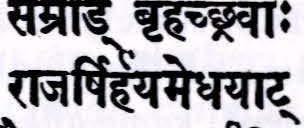
dharma-piilo nara-pati"f!.

sa tu samrii{l brhac-chraviift siik§iin mahii-bhiigavato riijar�ir haya-medhayiit k§ut-trt-srama-yuto dino naiviismac chiipam arhati

dharma-piila"f!.-the protector of religion; nara-pati"f!.-the King; sa"f!.-he; tu-but; samriit-Emperor; brhat-highly; sravii"f!.-celebrated; siik§iitdirectly; mahii-bhiigavata"f!.-the first-class devotee of the Lord; riijar#ftsaint amongst the royal order; haya-medhayiit-great performer of horse sacrifices; k§ut-hunger; trt-thirst; srama-yuta"f!.-tired and fatigued; dina"f!.stricken; na-never; eva-thus; asmat-by us; siipam-curse;arhati-deserves.
TRANSLATION
The Emperor Par�it is a pious king. He is highly celebrated and is a first-class devotee of the Personality of Godhead. He is a saint amongst royalty, and he has performed many horse sacrifices. When such a king is tired and fatigued, being stricken with hunger and thirst, he does not at all deserve to be cursed.

978 Srimad-Bhagavatam [Canto 1, Ch. 18
�--� � 'u\l�ll
TEXT46 �Ril�: U(J�'\-u�tcn: 1 �l"t(lflltliil� I
PURPORT
After explaining the general codes relating to the royal position and asserting that the king can do no wrong and therefore is never to be condemned, the sage Samik wanted to say something about Emperor Pan�it specifically. The specific qualification of Maharaja Parikfjit is summarized herein. The King, even calculated as a king only, was most celebrated as a ruler who administered the religious principles of the royal order. In the siistras the duties of all castes and orders of society are prescribed. All the qualities of a k§atriya mentioned in the Bhagavad-gitii (18.43) were present in the person of the Emperor. He was also a great devotee of the Lord and a self-realized soul. Cursing such a king, when he was tired and fatigued with hunger and thirst, was not at all proper. The Samik �i thus admitted from all sides that Maharaja Parik�it was cursed most unjustly. Although all the briihma[las were aloof fromthe incidence, still for the childish action of a briihma[La boy, the whole world situation was changed. Thus the �i Samik, a brahma[La, took responsibility for all deterioration of the good orders of the world.

TEXT47
apape�u sva-bhrtye�u
balenapakva-buddhina
paparh krtarh tad bhagavan
sarvatma k�antum arhati
apiipe�u-unto one who is completely free from all sins; sva-bhrtye�uunto one who is subordinate and deserves to be protected; biilena-by a child; apakva-who is immature; buddhina-by intelligence; piipamsinful act; krtam-has been done; tat bhagavan-therefore the Personality of Godhead; sarva-tltmii-who is all-pervading; k�antum-just to pardon; arhati-deserve.
TRANSLATION
Then the r�i prayed to the all-pervading Personality of Godhead to pardon his immature boy who had no intelligence and who committed the
Text47 ] Maharaja Pa�it Cursed by a Brahm3.!1a Boy 979
� �t�! 'l'l�;nq•9;f{;u 1 vt p�+rcu(� t4;u¥t(Rr nwu
great sin of cursing a person who was completely free from all sins, who was subordinate and who deserved to be protected.
PURPORT
Everyone is responsible for his own action, either pious or sinful. The J;t�i Samik could foresee that his son had committed a great sin by cursing Maharaja Pan�it, who deserved to be protected by the briihmaczas, for he was a pious ruler and completely free from all sins because of his being a first-class devotee of the Lord. When an offense is done unto the devotee of the Lord, it is very difficult to overcome the reaction. The briihmapas, being at the head of the social orders, are meant to give protection to their subordinates and not to curse them. There are occasions when a briihmapa may furiously curse a subordinate k§atriya or vaiSya, etc., but in the case of Maharaja Pan'"k�it there was no grounds as already explained. The foolish boy had done it out of sheer vanity in being a briihmapa's son, and thus he became liable to be punished by the law of God. The Lord never forgives a person who condemns His pure devotee. Therefore the foolish Srngi had not only committed a sin by cursing a king, but also the greatest offense. Therefore the r�i could foresee that only the Supreme Personality of Godhead could save his boy from his sinful act. He therefore directly prayed for pardon from the Supreme Lord who alone can undo a thing which is impossible to change. The appeal was made in the name of a foolish boy who had developed no intelligence at all.
A question may be raised herein that since it was the desire of the Lord that Pan�it Maharaja was putinto that awkward position so that he might be delivered from material existence, then why was a briihmacza's son made responsible for this offensive act? The answer is that the offensive act was performed by a child only so that he could be excused very easily, and thus the prayer of the father was accepted. But if the question is raised why the briihmapa community as a whole was made responsible for allowing Kali into the world affairs, the answer is given in the Variiha Purora that the demons who acted inimically toward the Personality of Godhead but were not killed by the Lord were allowed to take birth in the families of the briihmaczas to take advantage of the age of Kali. The all-merciful Lord gave them a chance to have their births in the families of the pious briihmaczas so that they could progress toward salvation. But the demons, instead of utilizing the good opportunity, misused the brahminical culture due to being puffed-up by vanity in becoming briihmaczas. The typical example is the son of Samik J;t�i, and all the foolish sons of briihmaczas are warned

980 Srimad-Bhagavatam [Canto l, Ch . 18
hereby not to become as foolish as Srrigi and be always on guard against the demoniac qualities which they had in their previous births. The foolish boy was, of course, excused by the Lord, but others, who may not have a father like Samik �i, will be put into great difficulty if they misuse the advantages obtained by birth in a brtihmarta family.

TEXT48
ftl«fjijlfitsa�u�: ftmm3rit1
=ml�stftaf4PQ�:Slllills(qft11\l�ll
tiras-krtii vipralabdhiifl saptii[t k.siptii hatii api niisya tat pratikurvanti tad-bhaktiifl prabhavo'pi hi
tirafl-krtiifl-being defamed; vipralabdhiifl-being cheated; saptiift-being cursed; k§iptiift-disturbed by negligence; hatiifl-or even being killed; api-also; na-never; asya-for all these acts; tat -them; pratikurvanticounteract; tat-the Lord's; bhaktiifl-devotees; prabhavafl-powerful; api-although;hi-certainly.
TRANSLATION
The devotees of the Lord are so.forbearing thateven thoughtheyare defamed, cheated, cursed, disturbed, neglected or even killed, they are never inclined to avenge themselves.
PURPORT
�i Sanu'"k also knew that the Lord does not forgive a person who has committed an offense at the feet of a devotee. The Lord can only give direction to take shelter of the devotee only. He thought within himself that if Maharaja Par�it would counter-curse the boy, he might be saved. But he knew also that a pure devotee is callous about worldly advantages or reverses. As such, the devotees are never inclined to counteractpersonal defamation, curses,negligences,etc. As far as such things are concerned, in personal affairs the devotees do not care for them. But in case of their being performed against the Lord and hisdevotees, then the devotee takes very strong action. It was a personal affair, and therefore Samik {t� knew that the King would not take counteraction. Thus there was no other alternative than to place an appeal to the Lord for the immature boy.
Text48) Maharaja Par�it Cursed by a Brahm�a Boy 981
It is not that only the briihmarws are powerful enough to award curses or blessings upon the subordinates, but the devotee of the Lord, even though he may not be a briihmarza, is more powerful than a briihmarza_ But a powerful devotee never misuses the power for personal benefit. Whatever power the devotee may have is always utilized in service towards the Lord and His devotees only.
TEXT49

� �ilidl�WC (i)Si6al 'l(lfJf.t: I
iti putra-krtiighena so 'nutapto mahii-munifr, svayam viprakrto riijnii naiviingham tad acintayat
iti-Lhus; putra-son; krta-done by; aghena-by the sin; sa}l-he, the muni; anutaptaJ:r,-regretting; mahii-munifr,-the sage; svayam-personally; viprakrtafr,-being so insulted; riijiiii-the King; na-not; eva-certainly ; angham-the sin; tat-that; acintayat-thought of it.
TRANSLATION
The sage thus regretted the sin committed byhis own son. He did not take the insult paid bythe King very seriously_
PURPORT
The whole incidence is now cleared up. Maharaja Parik�it's garlanding the sage with a dead snake was not at all a very serious offense, but Spigi's cursing the King was a serious offense. The serious offense was committed by a foolish child only; therefore he deserved to be pardoned by the Supreme Lord, although it was not possible to get free from the sinful reaction. Maharaja Parik�it also did not mind the curse offered to him by a foolish briihmarza. On the contrary, he took full advantage of the awkward situation, and by the great will of the Lord, Maharaja P�it achieved the highest perfection of life through the grace of Srila Sukadeva Gosvami. Actually it was the desire of the Lord, and Maharaja P�it, J;t�i Sarm"k and his son Spi.gi were all instrumental in fulfilling the desire of the Lord. So none of them were put into difficulty because everything was done in relation with the Supreme Person.
982 Srimad-Bhagavatam [Canto 1, Ch_ 18
� �Siiffl � � 6(��4( ����"
TEXT 50


priiyasafl siidhavo loke parair dvandve�u yojitiifl na vyathanti na hr§yanti yata iitmii'gurtiisrayafl
prayasa�-generally; sadhava�-saints ; loke-in this world; parai� - by others; dvandve§u-in duality; yojita�- being engaged; na-never; vyathanti-distressed; na-nor; hr§yanti-takes pleasure; yata {!-because ; almaself; aguu.u-asraya� -transcendental.
TRANSLATION

Generally the transcendentalists, even though engaged by others in the dualities of the material world, are not distressed. Nor do they take pleasure [in worldly things], for they are transcendentally engaged.
PURPORT
The transcendentalists are the- empiric philosophers, mystics and the devotees of the Lord. Empiric philosophers aim at the perfection of merging into the being of tile Absolute, the mystics aim at perceiving· the allpervading Supersoul, and the devotees of the Lord are engaged in the transcendental loving service of the Personality of Godhead. Since Brahman, Paramatma, or Bhagavan are different phases of the same Transcendence, all these transcendentalists are beyond the three modes of material nature. Material distresses and happinesses are products of the three modes, and therefore the causes of such material distress and happiness have nothing to do with the transcendentalists. The King was a devotee, and the [§i was a mystic. Therefore both of them were unattached to the accidentaJ incidence created by the supreme will. The playful child was an instrument in fulfilling the Lord's will.
Thus end the Bhaktivedanta Purports of the First Canto, Eighteenth Chapter, of the Srlmad-Bhagavatam, entitled "Maharaja PanK§it Cursed by a Briihmafla Boy."
Text 50] Maharaja Par�it Cursed by a Brahma!la Boy
983
TEXT I

siita uvaca
mahi-patis tv atha tat-karma garhyam
vicintayann atma-krtam sudurmanalt
aho maya nicam anarya-vat krtam
niragasi brahmar-i gii{lha-tejasi
siita{t uvaca-Suta Gosvam1 said; mahi-pati{t-the King; tu-but; athathus (while coming back home); tat-that; karma- act; garhyam- abominable; vicintayan-thus thinking; atma-krtam-done by himself; sudurmana{t-very much depressed; aho- alas; maya-by me; n"icam-heinous; aniirya- uncivilized; vat-like; krtam- done ; niragasi-untoonewho isfaultless; brahmar-i-unto a brahmar-a; gu{iha- grave; tejasi-untothepowerful.


TRANSLATION
Sri Siita Gosvami said: While returning home, the King [Maharaja Pa�it)felt that the act he had committed against the faultless and powerful brahma!Ul was heinous and uncivilized. Consequently he was distressed.
PURPORT
The pious King regretted his accidental improper treatment of the powerful briihma"(la who was faultless. Such repentance is natural for a
CHAPTER NINETEEN Appearanceofsukadeva Gosvaml
��
- � �:
if(lqfij@t�
am � wft:q'i•u4tt�d M(I•IM ;mfur �m II � 11
985
good man like the King, and such repentance delivers a devotee from all kinds of sins accidentally committed. The devotees are naturally faultless. Accidental sins committed by a devotee are sincerely regretted, and by the grace of the Lord all sins unwillingly committed by a devotee are burnt in the fire of repentance. TEXT2 '"� mit it
dhruvam tato me krta-deva-helaniid duratyayam vyasanam niiti-dirghiit tad astu kiimam hy agha-ni§krtiiya me yathii na kuryiim punar evam addhii
dhruvam-sure andcertain;tatal).-therefore;me-my;krta-deva-helaniitbecause of disobeying the orders of the Lord;duratyayam-very difficult; vyasanam-calamity;na-not;ati- greatly;dirghiit-far off;tat-that;astulet it be; kiimam-desire without reservations; hi-certainly; agha-sins; ni§krtiiya-for getting free; me-my; yathii-so that; na-never; kuryiimshall I do it;punal).-again;evam-as I have done;addhii-directly.
TRANSLATION
[King Parik�it thought:] Due to my neglecting the injunctions of the Supreme Lord I must certainly expect some difficulty to overcome me in the near future. I now desire without reservation that the calamity come now, for in this way I may be freed of the sinful action and not commit such an offense again.

PURPORT
The Supreme Lord enjoins that briihmapas and cows must be given all protection. The Lord is Himself very much inclined to do good to briihmapas and cows (go-brohmapa-hitiiya ca). Maharaja Pan"kljit knew all this, and thus he concluded that his insulting a powerful briihmapa was

986 Srimad-Bhagavatam [Canto 1, Ch. 19
� � � w:nRI<{If:lta: 1 � � cNf.t&�;(114 it ;( � �Wf{�fl:(l II � II
ti('t�stWwtact
certainly to be punished by the laws of the Lord, and he was expecting something very difficult in the very near future. He therefore desired the imminent calamity to fall on him and not on his family members. A man's personal misconduct affects all family members.· Therefore Maharaja Parik�it desired thecalamityto fall on him alone. By suffering personally he would be restrained from future sins, and at the same time the sin which he had committed would be counteracted so that his descendants would not suffer. That is the way a responsible devotee thinks. The family mem· hers of a devotee also share the effects of a devotee's service unto the Lord. Maharaja Prahlada saved his demon father by his personal devotional service. A devotee son in the family is the greatest boon or blessing of the Lord.
TEXT3

adyaiva riijyam balam rddha-kosam prakopita-brahma-kuliinalo me dahatv abhadrasya punar na me ,bhiit piipi"yasi dhir dvija-deva-gobhyafi, adya-this day; eva-on the very; rajyam-kingdom; balam rddhastrength and riches;kosam-treasury;prakopita-ignited by;brahma-kulaby the brahmarza community; anala[l.-fire; me dahatu-let it burn me; abhadrasya-inauspiciousness;puna[l.-again;na-not;me-unto me;abhiitmay occur; papiyasi'�sinful; dhilt-intelligence; dvija-brahmarzas; devathe Supreme Lord;gobhya[l.-and the cows.

TRANSLATION
I am uncivilized and sinful due to my neglect of brahminical culture, God consciousness and cow protection. ThereforeI wish that my kingdom, strength and riches burn up immediately by the fire of the brahma�a's wrath so that in the future I may not be guided by such inauspicious attitudes.
Text3] Appearance of Sukadeva Gosvlimi 987
PURPORT
Progressive human civilization is based on brahminical culture, God consciousness and protection of cows. All economic development of the state by trade, commerce, agriculture and industries must be fully utilized in relation to the above principles, otherwise all so-called economic development becomes a source of degradation. Cow protection means feeding the brahminical culture which leads towards God consciousness, and thus perfection of human civilization is achieved. The age of Kali aims at killing the higher principles of life, and although Maharaja Pa�it strongly resisted the domination of the personalityof Kali within the world, the influence of the age of Kali came at an opportune moment, and even a strong king like Maharaja Pan"K�it was induced to disregard the brahminical culture due to a slight provocation of hunger and thirst. Maharaja Parik�it lamented the accidental incidence, and he desired that all his kingdom, strength and accumulation of wealth would be burnt up for not being engaged in brahminical culture, etc.
Providentially also, where wealth and strength are not engaged in the advancement of brahminical culture, God consciousness and cow protection, the state and home are surely doomed. If we want peace and prosperity in the world, we should take lessons from this verse; every state and every home must endeavor to advance the cause of brahminical culture for self-purification, God consciousness for self-realization and cow protection for getting sufficient milk and the best food to continue a perfect civilization.
TEXT4

U �R144Rl�tt¥USOVJilt �
�:��:I
{I� � wtf:q"(ul �-
� ste'ffi� fild�Ef.I<U14( II $/ II
sa cintayann ittham athasrrwd yathii munel). sutokto nirrtis tak§akiikhyal).
sa siidhu mene na cirerta tak§akiinalam prasaktasya virakti-kiirartam
sal).-he, the King; cintayan-thinking; ittham-like this; atha-now; asrrtot-heard; yathii-as; munel).-of the sage; suta -ukta[l-uttered by the
988 Srimad-Bhigavatam [Canto l, Ch. 19
son; nirrtift-death; tak�aka-iikhyafl-in relation with the snake-bird; saphe (the King); siidhu-well and good; mene-accepted; na-not; cirerzavery longtime; tak�aka-snake-bird; analam-fire;prasaktasya-for onewho is too attached; virakti-indifference; kiirarzam-cause.

TRANSLATION
While the King was thus repenting, he received news of his imminent death, which would be due to the bite of a snake-bird, occasioned by the curse spoken by the sage's son. The King accepted this as good news, for it would be the cause of his indifference towards worldly things.
PURPORT
Real happiness is achieved by spiritual existence or by cessation of the repetition of birth and death. The repetition of birth and death can be stopped only by going back to Godhead. In the material world, even by attaining the topmost planet (Brahmaloka), one cannot get rid of the conditions of repeated birth and death, but we do not accept the path of attaining perfection. The path of perfection frees one from all material attachments, and thus one becomes fit to enter into the spiritual kingdom. Therefore, those who are materiallypoverty-stricken are better candidates than those who are materially prosperous. Maharaja Parik�it was a great devotee of the Lord and a bona fide candidate for entering into the kingdom of God, but even though he was so, his material assets as the Emperor of the world were setbacks to perfect attainment of his rightful status as one of the associates of the Lord in the spiritual sky. As a devotee of the Lord, he could understand that the cursing of the briihmarw boy, although unwise, was a blessing upon him, being the cause of detachment from worldly affairs, both political and social. Samika Muni also, after regretting the incidence, conveyed the news to the King as a matter of duty so that the King would be able to prepare himself to go back to Godhead. Samika Muni sent news to the King that foolish Spigi, his son, although a powerful briihmarza boy, unfortunately had misused his spiritual power by cursing the King unwarrantedly. The incidence of the King's garlanding the muni was not sufficient cause for being cursed to death, but since there was no way to retract the curse, the King was informed to prepare for death within a week. Both Samika Muni and the King were self-realized souls. Samika Muni was a mystic, and Maharaja Parik�it was a devotee. Therefore there was no difference between them in selfrealization. Neither of them was afraid of meeting death. Maharaja
Text 4) Appearance of Sukadeva Gosvami 989
Pa�it could have gone to the muni to beg his pardon, but the news of imminent death was conveyed to the King with so much regret by the muni that the King did not want to shame the muni further by his presence there. He decided to prepare himself for his imminent death and find out the way to go back to Godhead.


The life of a human being is a chance to prepare himself to go back to Godhead, or to get rid of the material existence, the repetition of birth and death. Thus inthe system of varp.iiSrama-dharma everymanandwoman is trained up for this purpose. In other words, the system of varp.iisramadharma is known also as saniitana-dharma, or eternal occupation. The system of varr-asrama-dharma prepares a man for going back to Godhead, and thus a householder is ordered to go to the forest as viinaprastha to acquire complete knowledge and then to take sannyiisa prior to his inevitable death. Par�it Maharaja was fortunate to get a seven-day notice to meet his inevitable death. But for the common man there is no definite notice, although death is inevitable for all. Foolish men forget this sure fact of death and neglect the duty of preparing themselves for going back to Godhead. They spoil their lives in animal propensities to eat, drink, be merry and enjoy. Such an irresponsible life is adopted by the people in the age of Kali because of a sinful desire to condemn brahminical culture, God consciousness and cow protection, for which the state is responsible. The state must employ revenue to advance these three items and thus educate the populace to prepare for death. The state which does so is the real welfare state. The state of India should betterfollow the examples of Maharaja Parik�it, the ideal executive head, than to imitate other materialistic states which have noidea of the kingdom of Godhead, the ultimate goal of human life. Deterioration of the ideals of Indian civilization has brought about the deterioration of civic life, not only in India but also abroad.







990 Srimad-Bhagavatam [Canto l, 0.. 19
TEXTS am � � � �� :aqlf?t�h( 511(('1'1Jwt«UI( II '-\ II atho vihiiyemam amurh ca lokarh vimarsitau heyatayii purastiit kr�TJiinghri-seviim adhimanyamiina upiiviSat priiyam amartya-nadyiim
atho-thus;vihiiya-givingup;imam-this;amum-and thenext;ca-also; lokam-planets;vimariitau-all of them being judged;heyatayi.i._because of inferiority;purastat-hereinbefore;k."§T}U-{lnghri-lotus feet of the Lord, Sr! Kf�Qa; sevam-transcendental lqving service; adhimanyamanafl-one who thinks of the greatest of all achievements;upaviSat-sat downfirmly; prayam-for fasting;amartya-nadyam-on the bank of the transcendental river (the Ganges or the Yamuna:).
TRANSLATION
Maharaja Par�it sat down firmly on the banks of the Ganges to concentrate his mind in Kr��a consciousness, rejecting all other practices of self-realization, because transcendental loving service of Kr�Qa is the greatest achievement, superseding all other methods.
PURPORT
For a devotee like Maharaja Par�it, none of the material planets, even the topmost Brahmaloka, is as desirable as Goloka Vrndavana, the abode of Lord Sri Kr��a, the primeval Lord and OriginalPersonality of Godhead. This earth is one of the innumerable material planets within the universe, and there areinnumerable universesalso within the compass of themahattattva. The devotees are told by the Lord and His representatives, the spiritual masters or acaryas, that not one of the planets within all the innumerable universes is suitablefor the residential purposesof adevotee. The devotee always desires to go back home, back to Godhead, just to become one of the associates of the Lord in the capacity of servitor, friend, parent or conjugal lover ofthe Lord, eitherin one of the innumerable Vaiku!ltha planets or inthe Goloka Vrndavana, the planet of Lord Sri Kr�!ia. All these planets are eternally situated in the spiritual sky, the Paravyoma, which is on the other side of the Causal Ocean within the mahat-tattva. Maharaja Parik�it was already aware of all this information due to his accumulated piety and birth in a high family of devotees, the Vaif?!lavas, and thus he was not at all interested in the material planets. Modern scientists are very eager to reach the moon by material arrangements, but they cannot conceive of the highest planet of this universe. But a devotee like Maharaja PanK.f?it does not care a fig for the moon or, for that matter, anyofthematerial planets. So when he was assuredof his death on a fixed date, he became more determined in the transcendental loving service of the Lord Kr�!la by complete fasting on the bank of

Text 5] Appearance of Sukadeva Gosvarni 991
the transcendental River Yamuna which flows down by the capital of Hastinapura (in the Delhi state). Both the Ganges and the Yamuna are amartya (transcendental) rivers, and Yamuna is still more sanctified for the following reasons.
ya vai lasac-chr"i-tulas"i-vimisraknrJanghri-rer-v-abhyadhikambu-netr"i punati lokan ubhayatra sesiin kas tam na seveta mari§yamiir-a"ft
ya-the river which; vai-always; lasat-floating with; sr"i-tulas"i- tulasi leaves; vimiSra-mixed; kr�r-a-anghri- lotus feet of the Lord, Sri Kpwa; rer-u-dust; abhyadhika-auspicious; ambu-water; netn-that which is carrying; puniiti-sanctifies ; lokan-plan e ts ; ubhayatra-both the upper and lower or inside and outside; sa-"isan-along with Lord Siva ; ka"fl-who else; tam-that river; na-does not; seveta-worship;mari§yamiir-a"ft-onewhois todie at any moment.
TRANSLATION
The river [Ganges, by which the King sat to fast] carries the most auspicious water, which is mixed with the dust of the lotus feet of the Lord and tulasi leaves. Therefore that water sanctifies the three worlds inside and outside andeven sanctifies Lord Siva and other demigods.Consequently everyonewhois destined to die musttakeshelterof this river.
PURPORT
Maharaja Pan"k�t,just after receiving thenews of his deathwithin seven days, at once retired from family life and shifted himself to the sacred bank of the Yamuna River. Generally it is saidthat the King tookshelter on the bank of the Ganges, but according to Srila]Iva Gosvami, the King took shelter on the bank of the Yamuna. Snl.a Jiva Gosvami"'s statement

992 Srimad-Bhagavatam [Canto 1, Ch. 19
� ��Q"t:>fl�4lff4f11�
� <il'fil�+t�hl�
� ¥ff{iq&uua:
TEXT6
f)QJIIej"Qluq�qil�;ft
W WI
II � II
appears to be more accurate because of the geographical situation. Maharaja P�it resided in his capital Hastinapura, situated near present Delhi, and the River Yamuna flows down past the city. Naturally the King would take shelter of the River Yamuna because she was flowing past his �ace door. And as far as sanctity is concerned, the River Yamuna is more directly connected with Lord Kr�!la than the Ganges. The Lord sanctified the River Yamuna from the beginning of His transcendental pastimes in the world. While His father Vasudeva was crossing the Yamuna with the baby Lord Kr�!la for a safe place at Gokula on the otherbank of the river from Mathura, the Lord fell down in the river, and by the dust of His lotus feet the river at once became sanctified. It is especially mentioned herein that Maharaja Pan�it took shelter of that particular river which is beautifully flowing, carrying the dust of the lotus feet of Lord Kr�!J.a, mixed with tulasi leaves. Lord Kr�!ia'slotus feet are always besmeared with the tulasi leaves, and thus as soon as His lotus feet are c�mtacted with the water of the Ganges and the Yamuna, the rivers become at once sanctified. The Lord, however, contacted the River Yamuna more than the Ganges. According to the Variiha Purii"{la, as quoted by Srila Jiva Gosvami, there is no difference between the water of the Ganges and the Yamuna, but when the water of the Ganges is sanctified one hundred times, it is called the Yamuna. Similarly, it is said in the scriptures that one thousand names of V�!J.U are equal to one name of Raina, and three names of Lord Rama are equal to one name of Kr�!J.a.
TEXT7

� �CIP>uQ 6 qiUC�q:
� 3IRr N�qQI(I
�� Ut;((ieftucwt;q'llil UfwtAdl U"ffiQ'I(dQf:II"II
iti vyavacchidya sa pii"{l{iaveyafl priiyopavesam prati v�rtu-padyiim dadhau mukundiinghrim ananya-bhiivo · muni-vrato mukta-samasta-sangafl
iti-thus; vyavacchidya-having decided; safl-the King; pii"{l{iaveyaflworthy descendant of the PaJ;u.}avas; priiya-upavesam-for fasting until death; prati- towards ; v�"{lu-padyiim-on the bank of the Ganges (emanat-
Text7] Appearance of Sukadeva Gosvlimi 993
ing from the lotus feet of Lord Vi�J;!U); dadhau-gavehimselfup; mukundaanghrim-unto the lotus feet of Lmd Kf�J;ia; ananya-without deviation; b/uiva�-spirit; muni-vrata�-with the vows of a sage; mukta-liherated from; samasta-all kinds of; sanga�-association.
TRANSLATION
·Thus the King, the worthy descendant of the P��avas, decided once and for all and sat on the Ganges' banks to fast until death and give himself up to the lotus feet of Lord Kr��a, who alone is able to award liberation. So, freeing himself from all kinds of associations and attachments, he accepted the vows of a sage.

PURPORT
The water of the Ganges sanctifies all the three worlds, including the gods and the demigods, because it emanates from the lotus feet of the Personality of Godhead V��u. Lord Kr�!la is the fountainhead of the principle of Vi�J;lu-tattva, and therefore shelter of His lotus feet can deliver one from all sins, including an offense which was committed by the King unto a briihmarw. Maharaja Pan'"k�it, therefore, decided to meditate upon the lotus feet of Lord Sri Kr�!J.a, who is Mukunda, or the giver of liberations of all description. The hanks of the Ganges or the Yamuna give one a chance to remember the Lord continuously. Maharaja Pan�it freed himself from all sorts of material association and meditated upon the lotus feet of Lord Kr�!J.a, and that is the way of liberation. To he free from all material association means to cease completely from committing any further sins. To meditate upon the lotus feet of the Lord means to become free from the effects of all previous sins. The conditions of the material world are so made that one has to commit sins willingly or unwillingly, and the best example is Maharaja Pan'"k�it himself, who was a recognized sinless pious king. But he also became a victim of an offense, even though he was ever unwilling to commit such a mistake. And he was cursed also, hut because he was a great devotee of the Lord, even such reverses of life became favorable. The principle is that one should not willingly commit any sin in his life and should constantly remember the lotus feet of the Lord without deviation. In such a mood only the Lord will help the devotee to make regular progress towards the path of liberation and thus attain the lotus feet of the Lord. Even if there are accidental
994 Srimad-Bhagavatam [Canto l, Ch. 19
sins committed by the devotee, the Lord saves the surrendered soul from all sins, as it is confirmed in all scriptures.
svapiidamularh bhajata� priyasya tyaktiinyabhiivasya hari� paresa� vikarma yaccotpatitarh kathancid dhunoti sarvam h,rdi sannivi�.ta.h (Bhiig. 11.5.42)

TEXTS
tatropajagmur bhuvanam puniinii mahiinubhiivii munayafi. sa-si§yiifi. priiyer.a tirthiibhigamiipadesaifi. svayam hi tirthiini punanti santafi.
tatra-there; upajagmufi.-arrived; bhuvanam- the universe; puniiniifi.those who can sanctify; mahii-anubhiiviifi,-great minds; munayafi.-thinkers ; sa-s�yiifi.-along with their disciples; prayer-a-almost; tir tha-place of pilgrimage; abhigama-journey; apadesaifi.-on the plea of; svayam-personally; hi-certainly; tirthiini-all the places of pilgrimage; punan ti-sanctify; santafi.-sages.
TRANSLATION
At that time all the great minds and thinkers, accom panied by their disciples, and sages who could verily sanctify a place of pilgrima ge just by their presence, arrived there on the plea of making a pilg rim'sjourn ey.
PURPORT
When Maharaja Pa�it sat down on the bank of the Ganges, the news spread in all directions of the universe, and the great-minded sages, who could follow the importance of the occasion, all arrived there on the plea of pilgrimage. Actually they came to meet Maharaja Pari4it and not to take a bath of pilgrimage because all of them were competent enough to
Text 8] Appearance of Sukadeva Gosvami 995
ij'Mfll•l'lN�: �ft�f.r�
vfr� � � �: ('C�GQU �
�: II (; II
sanctify the pilgrimages. Common men go to pilgrimage sites to get themselves purified of all sins. Thus the place of pilgrimage becomes overburdened with the sins of others. But when such sages visit overburdened places of pilgrimage, they sanctify the place by their presence. Therefore the sages who came to meet Maharaja Par�it were not very much interested in getting themselves purified like other common men, hut on theplea of taking a hath in that place they came to meet Maharaja Par�it because they could foresee that Srimad-Bhiigavatam would he spoken by Sukadeva Gosvami_ All of them wanted to take advantage of the great occasion.
TEXTS 9-10
atf:ci{fijg�q·t: �-
�l(i(l�l �: N'4�1((: I
��ami: �: Fttilf.tlqi�Wil
atrir vas�thas cyavana� saradviin ari�tanemir bhrgur angiriis ca
pariisaro giidhi-suto 'tha riima
utathya indrapramadedhmaviihau
medhiitithir devala iir��e!lo bhiiradviijo gautama� pippaliida�
maitreya aurva� kava�a� kumbhayonir

dvaipiiyano bhagaviin niiradas ca
atri to nt'irada-all namesof the differentsaintlypersonalitieswho arrived there from different parts of the universe.




TRANSLATION
From different parts of the universe there arrived great sage& like Atri, Cyavana, Saradviin, �1anemi, Bh�, Vas�ha, Parasara, Vi8vlimitra,
996 Srimad-Bhigavatam [Canto 1, Ch. 19
-.R:�Ill{gdi\'<1'1 'RroU � U'l II � II anfi1un
Ari.girii, Para8urama, Utathya, lndrapramada, Idhmavahu, Medhatithi, Devala, Ar�ti��a, Bharadvaja, Gautama, Pippalada, Maitreya, Aurva, Kav�a, Kumhhayoni, Dvaipayana and the great personality Narada_

PURPORT

Cyavana: A great sage and one of the sons of Bhfgu Muni. He was born prematurely when his pregnant mother was kidnapped. Cyavana is one of the six sons of hisfather.
Bhrgu: When Brahmaji was performing a great sacrifice on behalf of Varu�a, Mahar�i Bhrgu was born from the sacrificial fire. He was a great sage, and his very dear wife was Puloma. He could travel in space like Durvasa, Narada and others, and he used to visit all planets of the universe. Before the Battle of Kuru�etra, he tried to stop the battle. Sometimes he instructed Bharadvaja Muni about astronomical evolution, and he is the author of the gr.eat Bhrgu-samhitii, the astrological calculation. He explained how air,fire, water and earth are generated from ether. He explainedhow the air inthe stomachworks and regulatestheintestines. As a great philosopher, he logically established the eternity of the living entity (Mahiibhiirata, Siinti, Ch. 87). He was also a great anthropologist, and the theory of evolution was long ago explained by him. He was a scientific propounder of the four divisions and orders of human society known as the vaT{liisrama institution. He converted the k§atriya king Bitahavyak to become a briihmar-a.
PariiSara: He is the grandson of Vasi�tha Muni andfather of Vyllsadeva. He is the son of Mah�i Sakti, and his mother's name was Adrisyanti. He· was in the womb of his mother when she was onlytwelve years old. And from within the womb of his mother he learned the Vedas. His father was killed by a demon, Kalmaspada, and to avenge this he wanted to annihilate the whole world. He was, however, restrained by his grandfather Vasi�ha. He then performed a Rak�as-killing yajna, but Mahar�i Pulasta restrained him. He begot Vyasadeva, being attracted by Satyavati, who was to become the wife of Maharaja Santanu. By the blessings of Parasara, Satyavati became fragrant for miles. He was present also during the time of Bhli?ma's death. He was spiritual master of Maharaja Janaka and a great devotee of Lord Siva. He is the author of many Vedic scriptures and sociological directions.
Giidhi-suta or ViSviimitro: A great sage of austerity and mystic power. He is famous as Gadhi-suta because his father was Gadhi, a powerful king of the province of Kanyakubja (part of Uttar Pradesh). Although he was a k§atriya by birth, he became a briihmar-a inthe very same body by
Texts 9-10] Appearance of Sukadeva Gosvimi 997
the power of his spiritual achievements. He picked a quarrel with Vasi�ha Muni when he was a k�atriya king, and performed a great sacrifice in cooperation with Matanga Muni and thus was able to vanquish the sons of Vas�tha. He became a great yogi, and yet he failed to check his senses and thus was obliged to become the father of Sakuntalii, the beauty queen of world history. Once, when he was a k�atriya king, he visited the hermitage of Vas�tha Muni, and he was given a royal reception. Visvamitra wanted from Vas�tha a cow named Nandini, and the Muni refused to deliver it. He stole the cow, and thus there was a quarrel between the sage and the King. Visvamitra was defeated by the spiritual strength of Vas�tha, and thus the King decided to become a briihmarta. Before becoming a briihmarta he underwent severe austerity on the hank of the Kausika. He was also one who tried to stop the Kuruk�etra war.
Angirii: He is one of the six mental sons of Brahma and the father of Brhaspati, the great learned priest of the demigods in the heavenly planets. He is horn of the semen of Brahmaji given to a cinder of fire. Utthato and Samvarta are his sons. It is said that he is still performing austerity and chanting the holy name of the Lord at a place known as Alokananda on the hanks of the Ganges.
Utathya: One of the three sons of Mahar� A.Ii.girii. He was the spiritual master of Maharaja Mandhata. He married Bhadrii, the daughter of Soma (Moon). Varu-!la kidnapped his wife Bhadrii, and to retaliate the offense of the god of water, he drank all the water of the world.
Medhiitithi: An old sage of yore. An assembly member of the heavenly King lndradeva. His son was Kanva Muni, who brought up Sakuntala in the forest. He was promoted to the heavenly planet by strictly following the principles of retired life (viinaprastha).
Devala: A great authority like Niirada Muni and Vyasadeva. His good name is on the list of authorities mentioned in the Bhagavad-gitii when Arjuna acknowledged Lord Kr�!la as the Supreme Personality of Godhead. He met Maharaja Yu�thira after the Battle of Kuruk�etra, and he is the elder brother of Dhaumya, the priest of the Pii-!l�ava family. Like the k�atriyas, he also allowed his daughter to select her own husband in a svayamvara meeting_, and at that ceremony all the bachelor sons of the �is were invited. According to some, he is not .Aiita Devala.
Gautama: One of the seven great sages of the universe. Saradvan Gautama is one of his sons. Persons in the Gautama-gotra (dynasty) today are either his family descendants or in his disciplic succession. The briihma!las who profess Gautama-gotra are generally family descendants, and the k�atriyas and vaiSyas who profess Gautama-gotra are all in the line

998 Srimad-Bhigavatam [Canto l, Ch. 19
of his disciplic succession. He is the husband of the famous Ahalya who turned into stone, and lndradeva the King of the heaven molested her. Ahalya was delivered by Lord Ramacandra. He is the grandfather of Krpacarya, one of the heroes of the Battle of Kuru�etra.
Maitreya: A great .r§i of yore. He was spiritual master of Vidura and a great religious authority. He advised Dhrtara�tra to keep good relations with the Pap.!lavas. Duryodhana disagreed and thus was cursed by him. He met Vyasadeva and had religious discourses with him.
TEXT 11

� �
�qfliiltAftfqt�l
(Ntftff4t�l 31(AII(tl� I
anye ca devar§i-brahmar�i-varyii riijar§i-varyii aru[liidayas ca niiniir§eya-pravariin sametiin abhyarcya riijii sirasii vavande
anye-many others; ca-also; devar�i-saintly demigods; brahmar�isaintly briihma[&as; varyiifl-topmost; riijar�i-varyiifl- topmost saintly kings; arupa iidayafl-a special rank of riijar�is; ca-and; niinii- many others; iir�eya-pravariin-chief amongst the dynasties of the sages; sametiinassembled together; abhyarcya-by worshiping; riija- the Emperor; sirasii-bowed his head to the ground; vavande-welcomed.
TRANSLATION
'There were also many other saintly demigods, kings and special royal orderscalled �adayas [a special rank ofrajar�is] from different dynasties of sages. Whenthey all assembled together to meet the Emperor [Pari�t], he received them properly and bowed his head to the ground.
PURPORT
The system of bowing the head to the ground to show respect to superiors is an excellent etiquette which obliges the honored guest deep into the heart.Even the first-grade offender is excused simply by this
Text 11] Appearance of Sukadeva Gosvami 999
�
;n;�W't�stf4(1'l
� {m ������II
process, and Maharaja Pari4it, although honored by all the .riJis and kings, welcomed all the big men in that humble etiquette in order to be excused from any offenses. Generally at the last stage of one's life this humble method is adopted by every sensible man in order to be excused before departure. In this way Maharaja Pari"k�it implored everyone's good will for goingback home, back to Godhead.
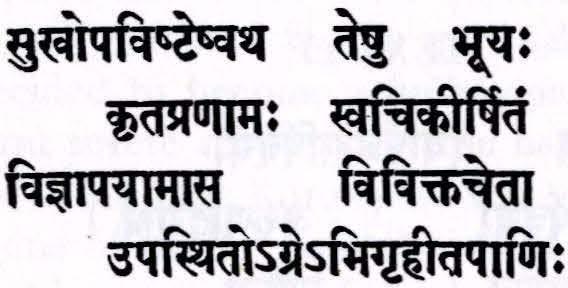
TEXT 12 �I ����II

sukhopav�te�v atha te�u bhiiyab, krta-pra!liimab, sva-cik"ir§itam yat vijiiiipayiimiisa viviktacetii upasthito ,gre ,bhi.grh1ta-pii!lifl
sukha-happily; upavi§te§u-all sitting down; atka-thereupon; te§uunto them (the visitors); bhu yafi.-again; k_rta-pra!liimafi.-having offered obeisances; sva-his own; cikirljitam-decision of fasting; yat-who; vijiiiipayiimiisa-submitted; vivikta-cetiifi.-one whosemindis detachedfrom worldly affairs; upasthitafi.-being present; agre-before them; abhigrhitapiirifi.-humbly with folded hands.
TRANSLATION
Mter all the �s and others had seated themselves comfortably, the King, humbly standing before them with folded hands, told them of his decision to fast until death.
PURPORT
Although the King had already decided to fast until death on the bank of the Ganges, still he humbly expressed his decision to elicit the opinions of the great authorities present there. Any decision, however important, should be confirmed by some authority. That makes the matter perfect. This means that the monarchs who ruled the earth in those days were not irresponsible dictators. They scrupulously followed the authoritative deci-
1000 Srimad-Bhagavatam [Canto 1, Ch. 19
sions of the saints and sages in terms of Vedic injunction. Maharaja Parik�it, as a perfect king, followed the principles by consulting the authorities, even up to the last days of his life.
TEXT

riijoviica
aho vayarh dhanyatamii nrpiirtiirh mahattamiinugrahartiya-filiifl riijiiiirh kularh briihmarta-piida-sauciid · diiriid visr§tarh bata garhya-karma
sn ro1a uvaca-the fortunate King said; aho-ah; vayam-we; dhanyatamafl-most thankful; nrpiirtam-of all the kings; mahattama-of the great souls; anugrahartiya-s'iliifl-trained to get favors; riijiiam- of the royal; kulam-orders; briihmarta-pada-feet of the brahma[tas; sauciit-refuse after cleaning; diirat-at a distance; visr§tam-always left out; bata-on account of; garhya-condemnable; karma- activities.
TRANSLATION

The fortunate King said: We are the most grateful of all the kings who are trained to get favors from the great souls. Generally you [sages] consider royalty as refuse to be rejected and left in a distant place.
PURPORT
According to religious principle, stool, urine, wash water, etc., must be left out at a long distance. Attached bath rooms, urinals, etc., may be very convenient amenities of modern civilization, but they are ordered to be situated at a distance from residential quarters. That very example is cited herein in relation to the kingly order for those who are progressively marching back to Godhead. Lord Sri Caitanya Mahaprabhu said that to be in intimate touch with dollars and cents men, or the kingly
Text 13] Appearance of Sukadeva Gosvami 1001
<(JIIEIRI"
cPi \IW4Ht+tl � +t('ij+tl�'uft4it€5U I • � �lfiiUiqli(it'EIIi{ {Ui{ f� iRf � ������
13
3fif
order, is worse than suicide for one who desires to go back to Godhead. In other words, the transcendentalists do. not generally associate with inen who are too enamored by the external beauty of God's creation. By advanced knowledge in spiritual realization, the transcendentalist knows that this beautiful material world is nothing but a shadowy reflection of the reality, the kingdom of God. They are not, therefore, very ·much captivated by royal opulence or anything like that. But in the case of Maharaja PanK.�it, the situation was different. Apparently the King was condemned to death by an inexperienced briihmal)a boy, but factually he was called by the Lord to return to Him. Othertranscendentalists, the great sages and mystics who assembled together because of Maharaja Parik�it's fasting untodeath, were quiteanxious to see him, for he was going back to Godhead. Maharaja Par1k�it also could understand that the great sages'who assembled there were all kind to his forefathers, the Pa��avas, because of their devotional service of the Lord. He felt, therefore, grateful to the sages for being present there at the last stage of his life, and he felt that it was all due to the greatness of his late forefathers or grandfathers. He felt proud, therefore, that he happened to be the descendant of such great devotees. Such pride for the devotees of the Lord is certainly not equal to the puffed up sense of vanity for material prosperity. The first is reality, whereas the other is false and vain.
tasyaiva me 'ghasya pariivareso

vyiisakta-cittasya grhe�v abhik�l)am nirveda-mulo dvija-siipa-riipo
yatra prasakto bhayam iisu dhatte
tasya-his; eva-certainly; me-mine; aghasya-of the sinful; parii-transcendental;avara-mundane;isa[l-controller,the Supreme Lord;vyiisaktaoverly attached; cittasya-of the mind; grhe� u-to family affairs; abhik§l)am-always; nirveda-mula[l-the.source of detachment; dvija-siipacursing by the briihmal)a; rupa[l- form of;yatra-whereupon; prasakta[l-

1002 Srimad-Bhigavatam [Canto 1, Ch. 19
mer � qo::t«il
•[�lkf+t'Wul( I f;r� �\Jjq�c{t � �
�11�\lll.
TEXT 14
Oi4R'hhR1�
¥141'411
one who is affected; bhayam-fearlessness; iisu-very soon; dhatte-take place.
TRANSLATION
The Supreme Personality of Godhead, the controller of both the transcendental and mundane worlds, has graciously overtaken me in the form of a brahmll!la's curse. Due to my being too much attached to family life, the Lord, in order to save me, has appeared before me in such away that out of fear only I will detach myself from the world.
PURPORT
Maharaja Pan"k�it, although born in a family of great devotees, the Pa�t}avas, and although securely trained in transcendental attachment for the association of the Lord, still found the allurement of mundane family life so strong that he had to be detached by a plan of the Lord. Such direct action is taken up by the Lord in the case of a special devotee.
Maharaja Parik�it could understand this by the presence of the topmost transcendentalists in the universe. The Lord resides with His devotees, and therefore the presence of the great saints indicated the presence of the Lord. The King therefore welcomed the presence of the great r�is as a mark of favor of the Supreme Lord.
TEXT 15

1111 � � t(1��4\� I
fi:IJ!lqqt: f(WijaJ4il Cfl
C::\l(qJ ilm fil�ll¥11: II �� II
tam mopayiitam pratiyantu viprii gangii ca devidhrta-cittam iSe dvijopasrfitafl. kuhakas tak§ako vii dasatv alam giiyata vi.§!lu-giithiifl.
tam-for that reason; mii-me; upayiitam-taken shelter of; pratiyantujust accept me; vipriifi,-0 briihma!J.as; gangii- mother Ganges; ca-also; deui-direct representative of the Lord; dhrta-taken into; cittam-heart; iSe-unto the Lord; dvija-upasntafl.-created by the briihma!J.a; kuhakafl-
Text 15] Appearance of Sukadeva Gosvimi 1003
� qN�Id sri'� f�
something magical;tak�k�-the snake-bird;vii-either; dasatu-let it bite; alam-without further delay;gayata-please go on singing; V�'(tu-gatha/:1narration of the deeds of Vi��;tu.
TRANSLATION
0 brahma!138, just accept me as a completely surrendered soul, and let mother Ganges, the representative of the Lord, also accept me in that way, for I have already taken the lotus feet of the Lord into my heart. Let the snake-bird-or whatever magical thing the brahm�a created-bite me at once. I onlydesire that you all continue singing the deeds of Lord Vi��;tu.
PURPORT
As soon as one is given upcompletely unto the lotus feet of the Supreme Lord,· he is not at all afraid of death. The atmosphere created by the presence of great devotees of the Lord on the bank of the Ganges and Maharaja Pan'"k�it's complete acceptance of the Lord's lotus feet were sufficient guarantee to the King for going back to Godhead. He thus became absolutely free from all fear of death.
TEXT 16

\�I'Ail!i4€4wt�
�m iPft r�: ����"
puna5 ca bhiiyad bhagavaty anante ratil;l prasangas ca tad-iisraye§u mahatsu yam yam upayami sr�tim maitry astu sarvatra namo dvijebhya/:1
punal)-again;ca-and;bhiiyat-let it be;bhagavati-unto Lord Sri Kp:IJ.a; anante-who has unlimited potency;ratil;l-attracting;prasang�-association; ca-also; tat-His; asraye�u-with those who are His devotees; mahatsu-within the material creation; yam yam-whichever; upayami-1 may take; sntim-my birth; maitri-friendly relation; astu-let it be; saroatra-everywhere; nam�-my obeisances; dvijebhya/:1-unto the brahma'(las.

1004 Srimad-Bhagavatam [Canto 1, Ch. 19
�
���q�alll �
SIQIT (tdJ��! I
�
Again, offering obeisances unto all you brahma�as, I pray that if I should again take my birth in the material world I will have complete attachment to the unlimited Lord ��a, association with His devotees and friendly relations with all living beings.
PURPORT
That a devotee of the Lord is the only perfect living being is explained herein by Mahariija Parik�it. A devotee of the Lord is no one's enemy, although there may be many enemies of a devotee. A devotee of the Lord does not like to associate with non-devotees, although he has no enmity with them. He desi�:es association with the devotees of the Lord. This is perfectly natural because birds of thesame feather mix together. And the most important function of a devotee is to have complete attachment for Lord Sri Kr��a, the father of all living beings. As a good son of the father behaves friendly with all his other brothers, so also the devotee of the Lord, being a good son of the supreme father, Lord Kfll�a, sees all other living beings in relation with the supreme father. He tries to bring back the upstart soilS of the father to a saner stage and to get them to accept the supreme fatherhood of God. Maharaja Parik�it wascertainly going back to Godhead, but even if he were not to go back, he prayed for a pattern of life which is the most perfect way in the material world. A pure devotee does not desire the company of a personality as great as Brahma, but he prefers the association of a petty living being, provided he is a devotee of the Lord.
iti sma riijiidhyavasaya-yuktafi. priicina-miile�u kuse�u dhirafi. udanmukho dak�i!la-kiila iiste samudra-patnyiifi. sva-suta-nyasta-bhiirafi.

Text 17) Appearance of Sukadeva Gosvami 1005
TRANSLATION
�
(liiiiQiq('llt('*': 311�"''��" m �:, :aa:•"'a(C(t �011� � ('lflJ\'4�1:
TEXT 17
�
((1Wf;q(ij¥U(:II�"II
iti-thus; sma-as in the past; raja-the King; adhyavasaya-perseverance; yukta�-being engaged; priicina-eastern; mule�u-with the root; kuse�uon a seat made of kusa straw; dhi"ra[l-self-controlled; udanmukha[l -facing the northern side; dak�irw-on the southern; kula-bank; aste-situated; samudra-the sea; patnya�-wife of (the Ganges); sva-own; suta-son ; nyasta-given over; bhiira�-the charge of administration.
TRANSLATION
In perfect self-control Maharaja Pan�it sat down on a seat of straw, with straw-roots facing the east, placed on the southern bank of the Ganges, and he himself faced the north. Just previously he had given charge of his kingdom over to his sons.
PURPORT
The River Ganges is celebrated as the wife of the sea. The seat of kusa straw is considered to be sanctified if the straw is taken out of the earth complete with root, and if the root is pointed towards the east it is considered to be auspicious. Facing the north is still more favorable for attaining spiritual success. Maharaja Pan"'k�it handed over the charge of administration to his son before leaving home. He was thus fully equipped for all favorable conditions.
TEXT 18

� lil 6M'il(�q(% su�q�� AA �qijft: 1 � ·� �1\Mwt�� Ql�tt �: II��II
evam ca tasmin nara-deva-deve priiyopavi§te divi deva-sanghii�
prasasya bhumau vyakiran prasunair muda muhur dundubhaya5ca nedu�
evam-thus; ca-and; tasmin-in that; nara-deva-deve-upon the King's; praya-upavi�te-being engaged in fasting to death; divi-in the sky; devademigods; sangha�-all of them; prasasya-having praised the action;
1006 Srimad-Bhagavatam [Canto 1, Ch. 19
bhiimau-on theearth; vyakiran-scattered; prasiin ai�-with flowers; mudiiin pleasure; muhuft-continually; dundubhayafl-celestial drums; ca-also; nedufl-beaten.


TRANSLATION
Thus the King, Maharaja Pan�it, sat to fast until death. All the demigods of the higher planets praised the King's actions and in pleasure continually scattered flowers over the earth and beat celestial drums.
PURPORT
Even up to the time of Maharaja Par�it there were interplanetary communications, and the news of Maharaja Pan"k�it's fasting unto deathto attain salvation reached the higherplanets in the sky wherethe intelligent demigods live. The demigods are more luxurious than human beings, but all of them are obedient to the orders of the Supreme Lord. There is no oneintheheavenlyplanets who is an atheist nonbeliever. Thus any devotee of the Lord on the surface of the earth is always praised by them, and in the case of Maharaja Par�it they were greatly delighted and thus gave tokens of honor by scattering flowers over the earth and by beating celestial drums. A demigod takes pleasure in seeing someone go back to Godhead. He is always pleased with a devotee of the Lord, so much so that by his adhidaivic powers he may help the devotees in all respects. And by their actions, the Lord is pleased with them. There is an invisible chain of complete cooperation between the Lord, the demigods and the devotee of the Lord on earth.
Text 19) Appearance of Sukadeva Gosvami 1007
TEXT 19 � l (1Jlql41ijl it � ���i('IIWIU I �: Sl�last«fi�ijl(l �� ����II mahar§ayo vai samupiigatii ye prasasya siidhv ity anumodamiiniifl iicufl prajiinugraha-slla-siirii yad uttama-sloka-gur.iibhiriipam
mahar§ ayaft-the great sages; vai-as a matter of course; samupiigatiiftassembled there; ye-;-those who; prasasya-by praising; .siidhu-quite all right; i ti-thus; anumodamiiniift-all approving; ucufl-said; prajiinugrahadoing good to the living being; s'ila-siiriifl-qualitatively powerful; yatbecause; uttama-sloka-one who is praised by selected poems; gur.aabhirupam-as beautiful as godly qualities.



TRANSLATION
All the great sages who were assembled there also praised the decision of Maharaja Pan�it and they expressed their approval by saying, "Very good." Naturally the sages are inclined to do good to common men, for they have all the qualitative powers of the Supreme Lord. Therefore they were very much pleased to see Maharaja P�it, a devotee of the Lord, andthey spoke as follows.
PURPORT
The natural beauty of a living being is enhanced by rising up to the platform of devotional service. Maharaja PanK.�it was absorbed in attachment for Lord Kr��a. Seeing this, the great sages assembled were very pleased, and they expressed their approval by saying, "Very good." Such sages are naturally inclined to do good to the common man, and when they see a personality like Maharaja Par"ik�it advance in devotional service, their pleasure knows no bound, and they offer all blessings in their power. Devotional service of the Lord is so auspicious that all demigods and sages, up to the Lord Himself, become pleased with the devotee, and therefore the devotee finds everything auspicious. All inauspicious matters are removed from the path of a progressive devotee.Meeting all the great sages at the time of death was certainly auspicious for Maharaja Parik�it, and thus he was blessed by the so-called curse of a briihmara ' s boy.
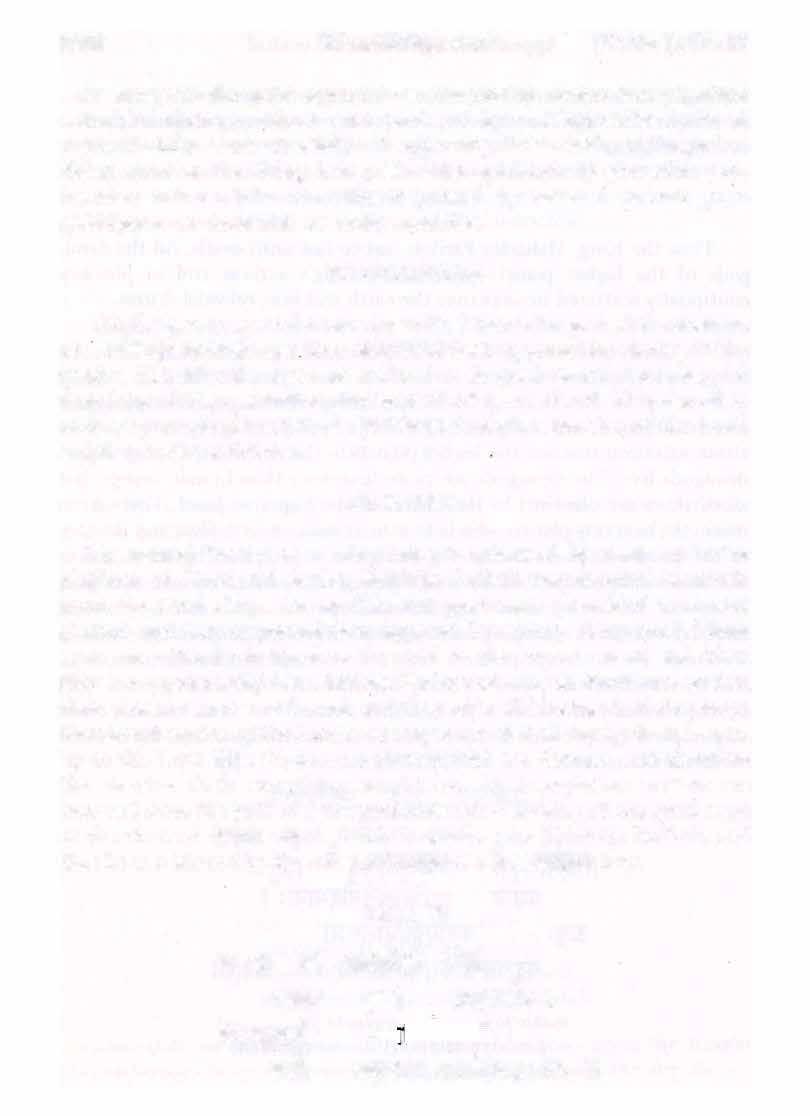
1008 Srimad-Bhigavatam [Canto 1,Ch.19
91 qJ � � itsU4Rt;f � TEXT 20 (11Jffif�4 � PJi (1¥4W*�! I �·�1'4�41�1•m IJ�oll
na vii idam riijar�i-varya citram
bhavatsu kr�f!am samanuvrate�u
ye 'dhyiisanam riija-kirita-ju�tam
sadyo jahur bhagavat-piirsva-kiimiib,
na-neither; vii-like this; idam-this; riijar§i-saintly king; varya-the chief; citram-astonishing; bhavatsu-unto you all; kf$1Jam-Lord Kp�Qa; samanuvrate$u-unto those who are strictly in the line of; ye-who; adhyiisanam-seated on the throne;raja-kinta-helmets of kings;ju$tamdecorated;sadyab,-immediately;jahub,-gave up;bhagavat-the Personality of Godhead;piirsva-kiimiib,-desiring to achieve association.

TRANSLATION
[The sages said:) 0 chief of all the saintly kings of the P��u dynasty who are strictly in the line of Lord Sri Kr�a! It is not at all astonishing that you give up your throne, which is decorated with the helmets of many kings, to achieve eternal association with the Personality of Godhead.
PURPORT
Foolish politicians who hold political administrative posts think that the temporary posts they occupy are the highest material gain of life, and therefore they stick to that post even up to the last moment of life without knowing that achievement of liberation as one of the associates of the Lord in His eternal abode is the highest gain of life. The human life is meant for achieving this end. The Lord has assured us in the Bhagavad-gitii many times that going back to Godhead, His eternal abode, is the highest achievement. PrahHida Maharaja, while praying to Lord Nrsimha, said, "0 my Lord, I am very much afraid of the materialistic way of life, and I am not the least afraid of Your present ghastly ferocious feature as Nrsirhhadeva. This materialistic way of life is something like a grinding stone, and we are being crushed by it. We have fallen into this horrible whirlpool of the tossing waves of life, and thus, my Lord, I pray at Your lotus feet to call me back to Your eternal abode as one of Your servitors. This is the summit liberation of this materialistic way of life. I have very bitter experience of the materialistic way of life. In whichever species of life I have taken birth, compelled by the force of my own activities, I have very painfully experienced two things, namely separation from my beloved and meeting with
Text 20)
Appearance of Sukadeva Gosvami
1009
what is not wanted. And to counteractthem, the remedies which I undertook were more dangerous than the disease itself. So I drift from one point to another birth after birth, and I pray to You therefore to give me a shelter at Your lotus feet." -
The Pap.�ava kings, who are more than many saints of the world, know the bitter results of the materialistic way of life. They are never captivated by the glare of the imperial throne they occupy, and they seek always the opportunity of being called by the Lord to associate with Him eternally. Maharaja Parik�it was the worthy grandson of Maharaja Yu�thira. Maharaja YudhiJ?thira gave up the imperial throne to his grandson, and similarly Maharaja Pan�it, the grandson of Maharaja Yudhi�thira, gave up theimperialthronetohis son ]anamejaya.That isthe way of all the kings in the dynastybecause they are all strictly in the line of Lord Kr�p.a. Thusthe devotees of the Lord are never enchanted by the glare of materialistic life, and they live impartially, unattached to the objects of the false illusory materialistic way of life.
TEXT 21

saroe vayam tiivad ihiismahe 'tha kalevaram yiivad asau vihiiya lokam param viraja.skam viSokam yiisyaty ayam bhiigavata-pradhiinafl
sarve-all; vayam-of us; tiivat-as long as; iha-at this place; asmaheshall stay; atka-hereafter; kalevaram-the body; yiivat-so long; asau-the King; vihiiya-giving up; lokam-the planet; param-the supreme; virajaskam-completely free from mundane contamination; visokamcompletely freed from all kinds of lamentation; yasyati-returns; ayamthis; bhiigavata-devotee; pradhiinafl-the foremost.
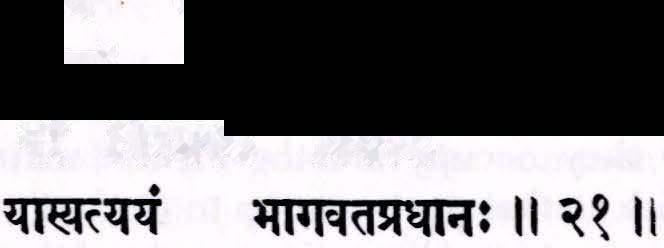
TRANSLATION
We shall all wait here until the foremost devotee of the Lord, Maharaja Pan�t, returns to the supreme planet, which is completely free from all mundane contamination and all kinds of lamentation.
1010 Srimad-Bhagavatam [Canto I, Ch. 19
� �
6N�(I41t� mt �·EI((ij, t«N 1 itct 1ft W(':f\<ft mnct
Beyond the limitation of the material creation, which is compared to the cloud in the sky, there is the Paravyoma, or the spiritual sky, full of planets called Vaiku!!thas. Such Vaiku!ltha planets are also differently known as the Puru�ottamaloka, Acyutaloka, Trivikramaloka, Hr�kesaloka, Kesavaloka, Aniruddhaloka, Madhavaloka, Pradyumnaloka, Sankar�aJ;�aloka, Sr!dharaloka, Vasudevaloka, Ayodhyaloka, Dvarakaloka, and many other millions of spiritual lokas wherein the Personality of Godhead predominates; and all the living entities there are liberated souls with spiritual bodies as good as that of the Lord.There is no material contamination; everything there is spiritual, and therefore there is nothing objectively lamentable. They are full of transcendental bliss, and are without birth, death, old age and disease. And amongst all the abovementioned Vaiku!lthalokas, there is one supreme loka called Goloka Vrndavana, which is the abode of the Lord Sri Kr�!la and His specific associates. Maharaja Par!k�it was destined to achieve this particular loka, and the great�is assembled therecould foresee this. All of them consulted amongst themselves about the great departure of the great King, and they wanted to see him up to the last moment because they would no more be able to see such a great devotee of the Lord. When a great devotee of the Lord passes away, there is nothing to be lamented because the devotee is destined to enter into the kingdom of God. But the sorry plight is that such great devotees leave our sight, and therefore there is every reason to be sorry. As the Lord is rarely to be seen by our present eyes, so also are the great devotees. The great �is, therefore, correctly decided to remain on the spot till the last moment.
ii.Srutya tad r�i-gar.a-vacafl. parik�it samam madhu-cyud guru cii.vyalikam
ii.bh(4atainii.n abhinandya yuktii.n susrii�amiir.a.S ca'ritiini v�r-ofl.
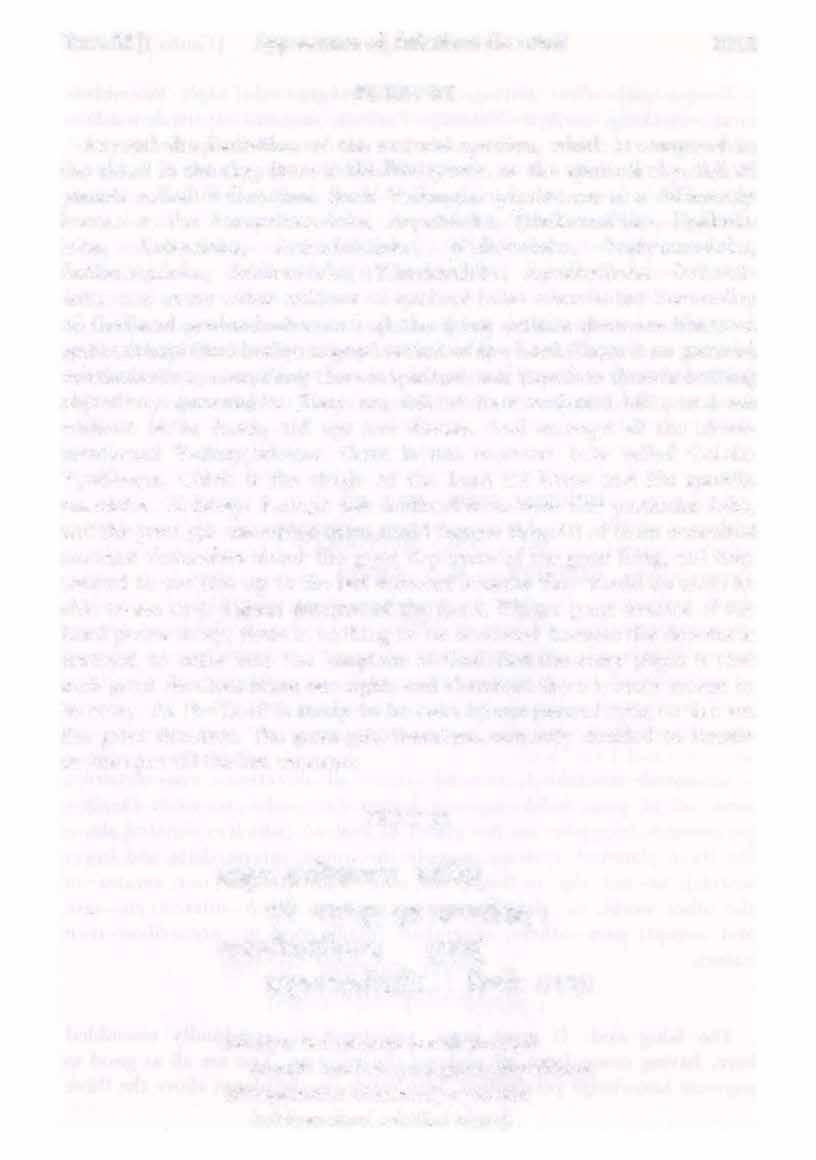
Text 22] Appearance of Sukadeva Gosvimi lOll
PURPORT
�6tA•toat�:q: tR\f�(l_ � ���"qlotl�litil( I 3[Tqjqa;nW1fliW1;:q �
f�: ������
TEXT22
��R6tM
asrutya-just after hearing; tat-that; !§i-ga(la-the sages assembled; vacafz-speaking; parik§it-Maharaja Parik�it; samam-impartial; madhucyut-sweet to hear; guru-grave; ca-also; avyalikam-perfectly true; abhii§ata-said; enan-all of them; abhinandya-congratulated; yuktiinappropriately presented; susrii§amii!lafz-being desirous;caritiini-activities of;vi§!lO!z-the Personality of Godhead.


TRANSLATION
All that was spoken by the great sages wru> very sweet to hear, full of meaning and appropriately presented as perfectly true. So after hearing them, Maharaja Pari�it, desiring to hear of the activities of Lord Sri K��a, the Personality of Godhead, congratulated the great sages.
TEXT 23


samagata!z sarvata eva sarve veda yatha murti-dharas tri-pr§the nehatha namutra ca kascanartha rte paranugraham atma-sllam
samiigata!z-assembled; sarvata!z-from all directions; eva-certainly; sarve-all of you; vediifz-supreme knowledge; yatha-as; miirti-dharii/lpersonified; tri-p!§the-on the · planet of Brahma (which is situated above the three planetary systems, namely the upper, intermediate and lower worlds); na-not; iha-in this world; atka-thereafter; na-nor; amutra-in the other world; ca-also; kascana-any other; artha/l-interest; rte-save and except; para-others; anugraham-doing good to; atma-sllam-own nature.
TRANSLATION
The King said: 0 great sages, you have all very kindly assembled here, having come from all parts of the universe. You are all as good as supreme knowledge personified, who resides in the planet above the three
1012 Srimad-Bhagavatam [Canto l, Ch. 19
� "�911Jl'SI �
�� «1 ��I � Cfi�
q(l�Q&¥11€¥4\n�'(II�� II
worlds [Satyaloka]. Consequentlyyou are naturally inclined to do good to others, and but for this you have no interest, either in this life or the next.
PURPORT
Six kinds of opulences, namely wealth, strength, fame, beauty, knowledge and renunciation, are all originally the different attributes pertaining to the Absolute Personality of Godhead_ The living beings, who are part andparcel entities of the Supreme Being, have all these attributes partially, up to the full strength of seventy-eight percent. In the materialworld these attributes (upto seventy-eight percent of the Lord's attributes) are covered by the material energy, as the sun is covered by a cloud. The covered strength of the sun is very dim, compared to the original glare, and similarly living beings with such attributes become almost extinct from their original color_ There are three planetary systems, namely the lower worlds, the intermediate worlds and the upper worlds_ The human beings on earth are situated at the beginning of the intermediate worlds, but living beings like Brahma and his contemporaries live in the upper worlds, of which the topmost is Satyaloka. In Satyaloka the inhabitants are fully cognizant of Vedic wisdom, and thus the mystic cloudof material energy is cleared, and therefore they are known as the Vedas personified. Such persons,beingfully aware of knowledgeboth mundane andtranscendental, have no interest in either the mundaneor transcendental worlds. They are practically desireless devotees. In the mundane world they have nothing to achieve, and in the transcendental world they are full in themselves_ Then why do they come to the mundane world? They descend on different planets as messiahs by the order of the Lord to deliver the fallen souls. On the earth they come down and do good to the people of the world in different circumstances under different climatic influences. They have nothing to do in this world save and except reclaim the fallen souls rotting in material existence, deluded by material energy.

Text 24] Appearance of Sukadeva Gosviimi 1013
TEXT 24 mllf �: 'l4'f4ill¥i � �finn (Rit�(lliUt( I (1€fktcwtl fJC44441�1f � � � (1'5114t�ijlfiJ�'ffil: 11�\l·ll
Srimad-Bhagavatam
tatas ca val} prcchyam imam viprcche viSrabhya viprii iti krtyatiiyiim
sarviitmanii mriyamiirwis ca krtyam suddham ca tatriimrsatiibhiyuktiil;l
tatal}-as such; ca-and; val;l-unto you; prcchyam-that which is to be asked; imam-this; viprcche-beg to ask you; viSrabhya-trustworthy; vipriil;l-briihmarws; iti-thus; krtyatiiyiim-out of all different duties; sarva-iitmanii-by every one; mriyamii!'lail;l-especially those who are just about to die; ca-and; krtyam-dutiful; suddham-perfectly correct; caand; tatra-therein; iimrsata-by complete deliberation; abhiyuktiil;l-just befitting.
TRANSLATION
0 trustworthy briihmaJ)as, I now ask you about my immediate duty. Please, after proper deliberation, tell me of the unalloyed duty of everyone in ail circumstances, and specifically of those who are just about to die.·
PURPORT
In this verse the King has placed two questions before the learned sages. The first question is what is the duty of everyone in all circumstances, and the second question is what is the specific duty of one who is to die very shortly. Out of the two, the question relating to the dying man is most important because everyone is a dying man, either very shortly or after one hundred years. The duration of life is immaterial, but the duty of a dying man is very important. Maharaja PanK.�it placed these two questions before Sukadeva Gosvami also on his arrival, and practically the whole of the Srimad-Bhiigavatam, beginning from the Second Canto up to the last Twelfth Canto, deals with these two questions. The conclusion arrived at thereof is that devotional service of the Lord Sri Kr�p.a, as it is confirmed by the Lord Himself in the last phases of the Bhagavad-gitii, is the last word in relation to everyone's permanent duty in life.
Maharaja Parik�it was already aware of this fact, but he wanted the great sages assembled there to unanimously give their verdict on his conviction so that he might be able to go on with his confirmed duty •without controversy. He has especially mentioned the word suddha, or perfectly correct. For transcendental realization or self-realization, many processes are recommended by various classes of philosophers. Some of them are first-class methods, and some of them are second- or third-class methods. The first-

1014
[Canto 1, Ch. 19
class method demands that one give up all other methods and surrender unto the lotus feet of the Lord and thus be saved from all sins and their reactions.
TEXT 25

tatriibhavad bhagaviin vyiisa-putro yadrcchayii giim atamiino 'napek�a� alak�ya-lingo nija-liibha-tu�to vrtasca biilair avadhiita-ve�aft
tatra-there;abhavat-appeared;bhagaviin-powerful;vyiisa-putra�-son of Vyasadeva;yadr-is as;icchayii-one desires;giim-the earth;atamiina�while traveling; anapek�a�-disinterested;alak�ya-unmanifested;linga�symptoms; nija-liibha-self-realized; tu�tafi--satisfied; vrta�-surrounded by; ca-and; biila*-by children; avadhiita-neglected by others; ve�a�dressed.
TRANSLATION
At that moment there appeared the powerful son of Vyasadeva who traveled over the earth disinterested and satisfied with himself. He did not manifest any symptoms of belonging to any social order or status of life. He was surrounded with women and children, and he dressed as if others had neglected him.
PURPORT
The word Bhagaviin is sometimes usedin relation withsome of the great devotees of the Lord, like Sukadeva Gosviimi. Such liberated souls are disinterested in the affairs of this material world because they are selfsatisfied by the great achievements of devotional service. As explained before, Sukadeva Gosvam'i never accepted any formal spiritual master, nor did he undergo any formal reformatory performances. His father, Vyasadeva, was his natural spiritual master because he heard SrimadBhiigavatam from him. After this, he became completely self-satisfied.
Text 25) Appearance of Sukadeva Gosvami 1015
� t«t"0)0l4i �� ��
Oiq((t�:s(t •n+ta+tr-il�: 1 f.t:jR1l+tgit ��: ���"'"
Thus he was not dependent on any formal process. The formal processes are necessary for those who are expected to reach the stage of complete liberation, but Sri Sukadeva Gosvam.i was already in that status by the grace of his father. As a young boyhe was expected to be properly dressed, but he went about naked and was disinterested in social customs. He was neglected by the general populace, and inquisitive boys and women surrounded him as if he were a madman. He thus appears on the scene while traveling on the eartn on his own accord. It appears that to the inquiry of Maharaja Pan�it, the great sages were not unanimous in their decision as to what was to be done. For spiritual salvation there were many prescriptions according to the different modes of different persons. But the ultimate aim of life is to attain the highest pedectional stage of devotional service of the Lord. As doctors differ, so also sages differ in their different prescriptions. While such things were going on, the great powerful son of Vyasadeva appeared on the scene.
TEXT 26

tam dvyf¥ta-var�am su-kumiira-piida
karoru-biihv-arhsa-kapoln-giitram
ciirv-iiyatiik�onnasa-tulya-karrwsubhrv-iinanam kambu-sujiita-ka!ltham
tam-him; duyf¥ta-sixteen; var�am-years; su-kumiira-delicate; piidalegs; kara-hands; urn-thighs; biihu-arms; arhsa-shou lders ; kapola-forehead; giitram-body ; ciiru-beautiful; iiyata-broad; ak�a-eyes; unnasahigh nose; tulya-similar; kaT'{la-ears; subhru-nice brows; iinanam-face; kambu-conchshell; sujiita-nicely built; ka!ltham-neck.


TRANSLATION
This son of Vyasadeva was only sixteen years old. His legs, hands, thighs, arms, shoulders, forehead and the other parts of his body were all
1016 Srlmad-Bhagavatam [Canto 1, Ch. 19
d (tt!i!44 M¥tl(qla;;m�-
delicately formed. His eyes were beautifully wide, and his nose and ears were highly raised. He had a very attractive face, and his neck was well formed and beautifullike a conchshell.
PURPORT
A respectable personality is described beginning with the legs, andthis honored system is observed here with Sukadeva Gosvami. He was only sixteenyears of age. A personishonoredforhisachievementsandnot for advanced age. A person can be older by experience and not by age. Sri Sukadeva Gosvami, who is described herein as the son of Vyasadeva, was by his knowledge more experienced than all the sages present there, although he was only sixteen years old.
TEXT27




II�\911
nigii{lha-jatrum prthu-tunga-vak§asam iivarta-niibhim vali-valgiidarani ca dig-ambaram vaktra-vikir'{la-kesam pralamba-biihum svamarottamiibham
nigii{iha-covered; jatrum-collarbone; prthu-broad; tunga-swollen; vak§asam-chest; iivarta-whirled; niibhim-navel; vali-valgu-striped; udaram-abdomen;ca-also;dik-ambaram-dressedbyalldirections(naked); vaktra-curled; vikir'{la-scattered; kesam-hair; pralamba-elongated; biihum-hands; su-amara-uttama-the best amongst the gods (Kr�qa); iibham-hue.


TRANSLATION
Hiscollarbone wasfleshy, his chest broad and thick, his navel deep and his abdomen beautifully striped. His arms were long, and curly hair was strewn over his beautiful face. He was naked, and the hue of his body reflected that of Lord Kr��a.
Text27] Appearance of �ukadeva Gosvami 1017
Pl•('liit! ���¥tlctd'11flf � I ��
PURPORT
His bodily features indicate himto be different from common men. All the signs described in connection with the bodily features of Sukadeva Gosvam1are uncommonsymptoms,typical ofgreatpersonalities, according to physiognomical calculations. His bodily hue resembled that of Lord Kr�J}.a, who is the Supreme amongst the gods, demigods, and all living beings.

TEXT28

syiimam sadiipivya-vayo 'nga-lak�myii strifUim mano-jnam rucira-smitena pratyutthitiis te munayafi. sviisanebhyas tal-lak�a!la-jna api gii!lha-varcasam
syiimam-blackish; sadii-always; apivya-excessively; vayafi, -age ; angasymptoms; lak§myii-by the opulence of; stri[iiim-of the fair sex;mana�jiiam- attractive; rucira-beautiful; smitena-smiling ; pratyutth itiifi.-stood up; te- all of them; munayafi.-the great sages ; sva- own; iisanebhyafl, - from the seats; tat-those; lak�arta-jiiiifi.-expert in the art of physiognomy; api-even;gii!lha-varcasam-covered glories.
TRANSLATION
He was dark and very beautiful due to his youth. Because of the glamor of his body and his attractive smiles, he was pleasing to women. Though he tried to cover his natural glories, the great sages present there were all expert in the art of physiognomy, and so they honored him by rising from their seats.
1018 Srimad-Bhigavatam [Canto l, Ch. 19
TEXT29 � H�OfflsfQ¥.A 311tRTR � � mms�ml
� �qf?t� tmr: ������
sa V�flU-riito •tithaya iigatiiya tasmai saparyiim sirasiijahiira tato nivrttii hy abudhii� striyo ·rbhakii mahiisane sopavivesa piijita�
sa�-he;vi,s!'u-riitaf!.-Maharaja Parik�it (who is always protected by Lord Vi�J;m); atithaye-to become a guest; iigatiiya-one who arrived there; tasmai-unto him; saparyiim-with the whole body; sirasii-with bowed head;iijahiira-offered obeisances;tata�-thereafter; nivrttiib- -- ceased; hicertainly;abudhii�-less intelligent;striyatL-women;arbhakiib--boys;�ahiiasan e- exalted seat; sa-he;upavivesa-sat down;piijita[l.-being respected.
TRANSLATION
Maharaja Parilq;it, who is also known as Vi��urata [one who is always protected by Vi��u], bowed his head to receive the chief guest, Sukadeva Gosvami. At that time all the ignorant women and boys ceased following Srila Sukadeva. Receiving respect from all, Sukadeva Gosvami took his exalted seat.
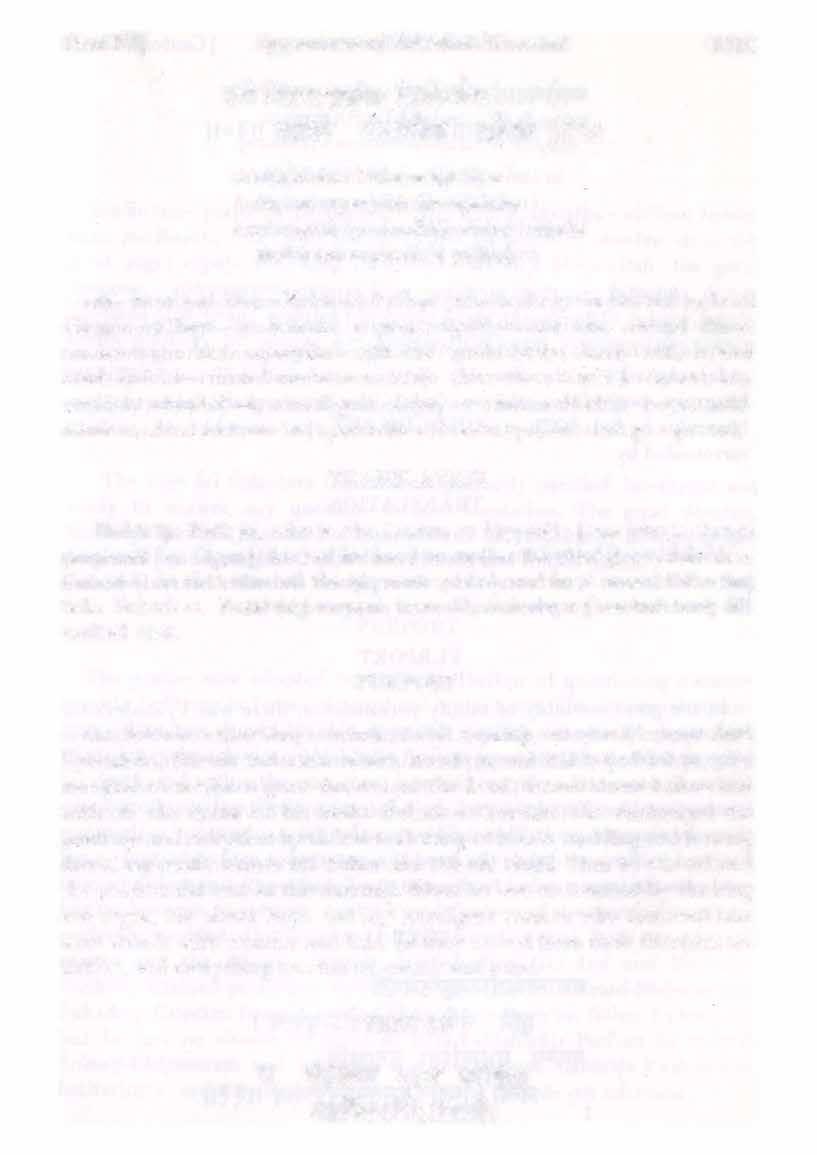
PURPORT
On Sukadeva Gosvami's arrival at the meeting, everyone, except Srila Vyasadeva, Nirada and a few others, stood up, and Maharaja Parilqit, who was glad to receive a great devotee of the Lord, bowed down before him with all the limbs of his body. Sukadeva Gosviimi also exchanged the greetings andreception byembrace, shaking of hand<;, nodding and bowing down, especially before his father and Narada Muni. Thus hewas offered the presidential seat at the meeting. When he was so received by the king and sages, the street boys and le�s intelligent women who followed him were struck with wonder and fear. So they retired from their frivolous activities, and everything was full of gravity and calm.
Text-30] Appearance of Sukadeva Gosvimi
m��:��
1019
TEXT 30 � 4\ij�..,, � +ttlttef 'ltRfifU<ji��:
sa sariwrtas tatra mahiin mah"iyasam brahmar§i-riijar§i-devar§i-sanghaifr. vyarocatiilam bhagaviin yathendur grahark�a-tarii-nikaraifr. par"itafr.



safr.-Sri Sukadeva Gosvami; samvrtafr.-surrounded by; tatra-there; mahan-great; mah"iyasiim-of the greatest; brahmar�i-saint among the briihmartas; riijarfii-saint among the kings; devar§i-saint among the demigods; sanghaifr.�by the assembly of; vyarocata-well deserved;alam-able; bhagaviin-powerful; yathii-as; indufr.-the moon; graha-planets; rk§aheavenly bodies; tiirii-stars; nikaraifr.- by the assembly of; pantafr.surroundedby.
TRANSLATION

Sukadeva Gosvami was then surrounded by saintly sages and demigods just as the moon is surrounded by stars, planets and other heavenly bodies. His presence was gorgeous, and he was respected by all.
PURPORT
In the great assembly of saintly personalities, there was Vyasadeva the brahmar�i, Narada the devarfii, Parasurama the great ruler of the k.satriya kings,etc.Some of them werepowerfulincarnations of the Lord. Sukadeva Gosvami was not known as brahmar_si, riijar§i or devar§� nor was he an incarnation like Narada, Vyasa or Para8urama, etc. And yet he excelled them in respects paid. This means that the devotee of the Lord is more honored in the world thanthe Lord Himself. Oneshould,therefore,never minimize the importance of adevotee like Sukadeva Gosvami.
1020 Srimad-Bhigavatam
[Canto 1, Ch. 19
TEXT 31 anr writ +tl•li!falS�q€4 I � �mr: �·§4�� fiRT 'l�4t���II��II
Appearance of Sukadeva Gosvami
pra5iintam iisinam aku!ltha-medhasam munim nrpo bhiigavato ,bhyupetya pra"{lamya miirdhniivahital) krtiinjalir natvii girii siinrtayiinvaprcchat
pra5iintam-perfectly pacified;iisinam-sitting; aku"{lfha-without hesitation; medhasam-one who has sufficient intelligence; munim-unto the great sage; nrpal)-the. King (Maharaja Parik�it); bhiigavatal)-the great · devotee; abhyupetya-approaching him; pra"{lamya- bowing down; miirdhnii-his head; avahital)-properly; krta-anjalil)-with folded hands; natvii-politely, by words; girii siinrtaya-in sweet voices; anvaprcchatinquired.
TRANSLATION


The sage Sri Sukadeva Gosvami sat perfectly pacified, intelligent and ready to answer any question without hesitation. The great devotee, Maharaja Pa�t, approached him, offered his respects by bowing before him, and politely inquired with sweet words and folded hands.
PURPORT
The gesture now adopted by Maharaja Parikl?it of questioning a master is quite befitting in terms of scriptural injunctions. The scriptural injunction is that one should humbly approach a spiritual master to understand the transcendentalscience.Maharaja P�it was now preparedfor meeting his death, and within the very short time of seven days he was to know the process of entering the kingdom of God. In such important cases, one is required to approach a spiritual master. There is no necessity of approaching a spiritual master unless one is in need of solving the problems of life. One who does not know how to put questions before the spiritual master has no business to see him. And the qualification of the spiritual master is perfectlymanifestedin the person of Sukadeva Gosvami. Both the spiritual master and the disciple, namely Sri Sukadeva Gosvaml and Maharaja Parik�it, attained perfection through the medium of Srimad-Bhiigavatam. Sukadeva Gosvamllearned Srimad-Bhiigavatam from his father Vyasadeva, but he had no chance to recite it. Before Maharaja Parikf}it he recited Srimad-Bhiigavatam and answered the questions of Maharaja Parik�it unhesitatingly, and thus both the master and the disciple got salvation.

31]
Text
1021
TEXT32

q�(\:tgillfl
� 3M qtf�(1J\ottH �: I tiQ�IRI��qul �: �: ������
panlc�id uviica aho adya vayam brahman sat-sevyiif!. k�atra-bandhavaf!. krpayiitithi-riiperta bhavadbhis tirthakiif!. krtiif!.
parik§it uva ca-the fortunate Maharaja Parik�it said; aho-ah; adyatoday; vayam-we; brahman-0 briihmartas; sat-sevyiif!.-eligible to serve the devotee; k�atra-the ruling class; bandhava�-friends;krpayii-by your mercy; atithi-rii.perta-in the manner of the great; bhavadbhif!.-by your good self; tirthakii�-qualified for being places of pilgrimage; krtiif!.-done by you.
TRANSLATION
The fortunate King Pa�it said: 0 brahma!la, by your mercy only you have sanctified us, making us like unto places of pilgrimage, all by your presence here as my guest. By your mercy, we, who are but unworthy royalty, become eligible to serve the devotee.
PURPORT
Saintly devotees like Sukadeva Gosvami generally do not approach worldly enjoyers, especially those in royal orders. Maharaja Prataparudra was a follower of Lord Caitanya, but when he wanted to see the Lord, the Lord refused to see him because he was a king. For a devotee who desires to goback toGodhead, two things are strictlyprohibited: worldly enjoyers and women. Therefore,devotees of the standard of Sukadeva Gosvamiare neve.r interestedin seeingkings. Maharaja Parlk�it was, ofcourse,a different case. He was a great devotee, although a king, and therefore Sukadeva Gosvami came to see him in hislast stage of life. Maharaja Parik�it, out of his devotional humility, felt himself an unworthy descendant of his great k§atriya forefathers, although he was as great as his predecessors. The unworthy sons of the royal orders are "Called k§atra-bandhavas, as the unworthy sons of the briihmartas are called dvija-bandhus or brahma-
1022 Srimad-Bhagavatam
[Canto I, Ch. 19
bandhus. Maharaja PanK�it was greatly encouraged by the presence of Sukadeva Gosvami He felt himself sanctified by the presence of the great saint whose presence turns any place into a place of pilgrimage.
TEXT33

ye§iirh sarhsmara[liit purhsiirh sadya(l suddhyanti vai grhii(l kim punar darsana-sparsapada-sauciisaniidibhi(l

ye§iim-of whom; sarhsmara[liit-by remembrance; purhsiim-of a person; sadya(l-instantly; suddhyanti-cleanses; vai-certainly; grhii(l-all houses; kim-what; puna(l-then; dadana- meeting; spada- touching; piida -the feet; sauca-washing; iisana-iidibhi(l-by offering a seat, etc.
TRANSLATION
Simply by remembering you our houses become instantly sanctified. And what to speak of seeing you, touching you, washing your holy feet and offering you a seat in our home?
PURPORT
The importance of holy places of pilgrimage is due to the presence of great sages and saints. It is said that sinful persons go to the holy places and leave their sins there to accumulate. But the presence of the great saints disinfects the accumulated sins, and thus the holy places continue to remain sanctified by the grace of the devotees and saints present there. If such saints appear in the homes of worldly people, certainly the accumulated sins of such worldly enjoyers become neutralized. Therefore, the holy saints actually have no self-interest with the householders. The only aim of such saints is to sanctify the houses of the householders, and the householders therefore should feel grateful when such saints and sages appear at their doors. A householder who dishonors such holy orders is a great offender. It is enj oined, therefore, that a householder who does not bow down before a saint at once must undergo fasting for the day in order to neutralize the great offense.
Text33] Appearance of Sukadeva Gosvami 1023
siinnidhyiit te mahii-yogin piitakiini mahiinty api sadyo nasyanti vai pumsiim vi§rwr iva suretarii[l
siinnidhyiit-on account of the presence; te-your; mahii-yogin-0 great mystic; piitakiini-sins; mahiinti-invulnerahle; api�in spite of; sadya[limmediately; nasyanti-vanquished; vai-certainly; pumsiim-of a person; vi§!Jo�-like the presence of the Personality of Godhead; iva- like; suraitarii�-other than the demigods.


TRANSLATION
Just as the atheist cannot remain in the presence of the Personality of Godhead, so also the invulnerable sins of a man are immediately vanquished in your presence, 0 saint! 0 great mystic!
PURPORT
There are two classes of human beings, namely the atheist and the devotee of the Lord. The devotee of the Lord, because.of manifesting godly qualities, is called a demigod, whereas the atheist is called a demon. Thedemon cannotstand thepresence of Viwu the Personality of Godhead. The demons are always busy in trying to vanquish the Personality of Godhead, but factually as soon as the Personality of Godhead appears, either by Histranscendental name, form, attributes,pastimes,paraphernalia or variegatedness, the demon is at once vanquished. It is said that a ghost cannot remain as soon as the holy name of the Lord is chanted. The great saints and devotees of the Lord a:re in the list of His paraphernalia, and thus as soon as a saintly devotee is present, the ghostly sins are at once vanquished. That is theverdictof all Vedicliteratures. One is recommended, therefore, to associate only with saintly devotees so that worldly demons and ghosts cannot exert their sinister influence.

1024 Srimad�Bhigavatam [Canto 1, 0.. 19
� � �
TEXT 34 (1ff-1Qtlit+ttliffil;:qld¥1f.l+t(l'*'lf'i I
Awnt« �: ���\/II
TEXT 35

3fftllt¥1•1!!41(sffif:pr:qiU<tfil�: I
�q:t::ce�!ft€4fl <�it��I'Ei'll"lil!i4: II��II
api me bhagaviin pntafl, krrQafl, piiru;lu-suta-priyafl, paitr-§vaseya-pnty-artharh tad-gotrasyiitta-biindhavafl,
api-definitely; me-unto me; bhagaviin-the Personality of Godhead; pnta�-pleased; kmw�-the Lord; piirtpu-suta-the sons of King Pat:tl;lu; priyafl,-dear; paitr-in relation with the father; svaseya-the sons of the sister;priti-satisfaction; artham-in the matter of;tat-their;gotrasya-of the descendent; iitta-accepted; biindhava�-as friend.
TRANSLATION
Lord K�a, the Personality of Godhead, who is very dear to the sons of King Pa��u, has accepted me as one of those relatives just to please His great cousins and brothers.
PURPORT
A pure andexclusive devotee of the Lord serves his family interest more dexterously than others who are attached to illusory family affairs. Generally people are attached to family matters, and the whole economic impetus of human society is moving under the influence of family affection_ Such deluded persons have no information that one can render better service to the family by becoming a devotee of the Lord. The Lord gives special protectionto thefamily members and descendants of adevotee,even though such members are themselves nondevotees! Maharaja Prahlada was a great devotee of the Lord, but his father Hirapyaka8ipu was a great atheist and declared enemy of the Lord. But despite all this, Hira�yakasipu was awarded salvation due to his being the father of Maharaja Prahlada. The Lord is so kind that he gives all protection to the family members of His devotee, and thus the devotee has no need to bother about his family members, even if such family members are left aside to discharge devotional service. Maharaja Yu�thira and his brothers were the sons of Kunti,"the paternal aunt of Lord K�pa, and Maharaja Par�it admits the patronage of Lord K�pa because of his being the only grandson of the great Pap�avas.
Text 35]
Appearance of Sukadeva Gosvami
1025
TEXT 36

� itsfA4�·•�(�W �: �� I f;mf flttt•uonW�f 4Riot� ct4\ttQ: ������
anyathii te 'vyakta-gater darsanam na� katham nrrtiim nitariim mriyamiirtiiniim samsiddhasya vaniyasa�
anyathii-otherwise; te-your; avyakta-gate[l.-of one whose movements are invisible;darsanam-meeting;na�-for us; katham-how; nrrtiim-of the people; nitariim-specifically; mriyamiirtiiniim-of those who are abou.t to die; samsiddhasya-of one who is all-perfect;vaniyasa�-voluntary appearance.
TRANSLATION
Otherwise [without being inspiredby Lord Kr��a] how is it that you have voluntarily appeared here, though you are moving incognito to the common man and are not visible to us who are on the verge of death.
PURPORT
The great sage Sukadeva Gosvami was certainly inspired by Lord Kr��a to appear voluntarily before Maharaja Parik�it, the great devotee of the Lord, just to give him the teachings of Srimad-Bhiigavatam. One can achieve the nucleus of devotional service of the Lord by the mercy of the spiritual master and the Personality of Godhead. The spiritual master is the manifested representative of the Lord to help one achieve ultimate success. One who is not authorized by the Lord cannot become a spiritual master. Srila Sukadeva Gosvami is an authorized spiritual master, and thus he was inspired by the Lord to appear before Maharaja Par�it and instruct him in the teachings of Srimad-Bhiigavatam. One can achieve the ultimate success of going back to Godhead if he is favored by the Lord's sending His true representative. As soon as a true representative of the Lord is met by a devotee of the Lord, the devotee.is assured a guarantee for going back to Godhead just after leaving the present body. This, however, depends on the sincerity of the devotee himself. The Lord is seated in the heart of all living beings, and thus he knows very well the movements of all individual persons. As soon as the Lord finds that a
1026 Srimad-Bhagavatam [Canto 1, Ch. 19
particular soul is very eager to go back to Godhead,the Lord at once sends His bona fide representative. The sincere devotee is thus assured by the Lord of going back to Godhead. The conclusion is that to get the assistance and help of a bona fide spiritual master means to receive the direct help of the Lord Himself.
TEXT 37

3RI: 'l�lfll�4tlf41wcfm� I ���' � m�¥(101� ri111n����
ata� prcchiimi samsiddhim . - . .
yogmam paramam gurum puru�asyeha yat kiiryam mriyamiirwsya sarvathii
ata�- therefore; prcchiimi-beg to inquire;samsiddhim-the way of perfection; yogin iim-of the saints; paramam-the Supreme; gu ru m-the spiritual master; puru�asya-of a person; iha-in this life; yat- whate ver; kiiryam-duty; mriyamiirwsya-of one who is going to die; sarvathii-in every way.
TRANSLATION
You are the spiritual master of great saints and devotees. I am therefore begging you to show the way of perfection for all persons, and especially for one who is about to die.
PURPORT
Unless one is perfectly anxious to inquire about the way of perfection, there is no necessity of approaching a spiritual master. A spiritual master is not a kind of decor?.:ion for a householder. Generally a fashionable materialist engages a so-called spiritual master without any profit. The psuedo-spiritual master flatters the so-called disciple, and thereby both the master and his ward go to hell without a doubt. Maharaja Parik�it is the right type of disciple because he puts forward questions vital to the interest of all men, particularly for the dying men. The question put forward by Maharaja Parik�it is the basic principle of the complete thesis of Srimad-Bhiigavatam. Now let us see how intelligently the great master replies.
Text 37] Appearance of Sukadeva Gosvimi 1027
TEXT38

�'Qil<��'lti1����:sm 1 �1NI4l4 � il,_ft: � Aq�t( ������
yac chrotavyam atho japyam yat kartavyam nrbhi� prabho smartavyam bhajaniyam vii briihi yadvii viparyayam
yat-whatever; srotavyam-worth hearing; atho-thereof; japyamchanted; yat-what also; kartavyam-executed; nrbhi�-by the people in general; prabho-0 master; smartavyam-that which is remembered; bhajanijam-worshipable; vii-either;briihi-please explain;yadvii-what it may be;viparyayam-against the principle.

TRANSLATION
Please let me know what a man should hear, chant, remember and worship, and also what he should not do. Please explain all this to me.
TEXT39

� II�Q..II
nunam bhagavato brahman
grhe�u grha-medhiniim na lak§yate hy avasthiinam
api go-dohanam kvacit
nunan-because; bhagavata�-of you, who are powerful; brahman-0 briihmarza; grhe�u-in the houses; grha-medhiniim-of the householders; na-not; lak�yate-are seen;hi-exactly; avasthiinan-staying in;api-even; go-dohanam-milking the cow;kvacit-rarely.
TRANSLATION
0 powerful brahma-!J.a, it is said that you hardly stay in the houses of men long enough to milk a cow.

PURPORT
Saints and sages in the renounced order of life go to the houses of the householders at the time they milk the cows, early in the morning, and
1028 Srimad-Bhagavatam [Canto 1, Ch. 19
;@
� iWo{ m 1 ;f � Uct(lllwt'lffl•n(lc;f
ask some quantity of milk for subsistence. A pound of milk fresh from the milk bag of a cow is sufficient to feed an adult with all vitamin values, and therefore saints and sages live only on milk. Even the poorest of the householders keep at least ten cows, each delivering twelve to twenty quarts of milk , and therefore no one hesitates to spare a few pounds of milk for the mendicants. It is the duty of householders to maintain the saints and sages, like the children. So a saint like Sukadeva Gosvami would hardly stay at the house of a householder for more than five minutes in the morning. In other words, such saints are very rarely seen in the houses of householders, and Maharaja Parik�it therefore prayed to him to instruct him as soon as possible. The householders also should be intelligentenough to get some transcendental information from visiting sages. The householder should not foolishly ask a saint to deliver what is available in the market. That should be the reciprocal relation between the saints and the householders.
suta uviica evam iibhii�ita� Pf§ta�
sa riijiiii slakrrwyii girii pratyabh�ata dharma-jiio bhagaviin biidariiyap,i�
suta� uviica-Sri Suta Gosvami said;evam-thus;iibhii�ita�-being spoken; pnt�-and asked for; s�-he; riijiiii-by the King; slak�flayii-by sweet; giro-language; pratyabh�ata-began to reply; dharma-jii�-one who knows the principles of religion; bhagaviin-the powerful personality; biidariiya"!li�-son of Vyasadeva.

TRANSLATION
Sri Siita Gosvimi said: The King thus spoke and questioned the sage, using sweet language. Then the great and powerful personality, the son of Vyasadeva, who knew the principles of religion, began his reply.
Thus end the Bhaktivedanta purports of the First Canto, Nineteenth Chapter of Srimad-Bhagavatam, ..Appearance ofSri Sukadeva Gosviimi."
END OF THE FIRST CANTO
Text40] Appearance of Sukadeva Gosvimi 1029
�� i(iilitl¥11�6:'l!: �{lqT 'tW'I.:&lflm I Slf441116 � � 'lli((lq�: 11\loll
TEXT40
References
The purports of Srimad-Bhiigavatam are all confirmed by standard Vedic authorities. The following authentic scriptural sources are specifically cited in the First Canto.
AmarakoSa. (Sanskrit Dictionary)

Bhagavad-g'itii
Brahma-sarhhitii
Bmhma-vaivarta Purii{la
Brhad-vai�{lava Tantra
Brhan-Niirad'iya Purii{la
Caitanya-bhiigavata
Caitanya-caritiimrta
Chiindogya Upani�ad
Hari-bhakti-sudhodaya
Hari-bhakti-viliisa
HarivarhSa.
lsopan�ad
Katha Upani�ad
Kaumadi (Dictionary)
Ke{la Upani�ad
Linga Purii!la
Mahiibhiimta
Manu-sarhhitii
Marka{lpeya Purii{la
Matsya Purii{la
Ncimda-bhakti-siitra
Ncirada-paiicariitra
Narasirhha Purii{la
Padma Purii{la
Riimiiya{la
SabdakoSa. (Sanskrit Dictionary)
Skanda Purii{la
Sr'imad-Bhiigavatam (Bhiigavata Purii{la)
1033
Srimad-Bhigavatam
Vtimana Pum!Jll
Vtiyaviya 1'antra
Vediinta-siitra
Vedas
V�{lu-dharmottara
V�!_lU fura.!Jll
ViSva-PrabiiSa (Sanskrit Dictionary)

1034
Glossary A

Acarya-an authorized teacher of a particular ctdt.
Adbhuta-the rasa of wonder.
Adi-ra�a-original pure sex psychology.
Ahankara- the meeting point of matter and spirit.
Ajita-Kr�Q.a, the unconquerable.
Akiiicanas-those who have no material assets.
Anarthas-unwanted habits.
Anna-prasana-ceremony or samskara of offering solid food to a teething child at the age of six to seven months.
Apad-dharma-duty in emergencies.
Apara-material inferiority.
Apauru,eya-not made by man (transcendental).
Apavarga-the perfect stage of liberation.
Apsaras-the society girls of heaven.
Area-a form of the Lord manifested through a material agency such as mind, metal, earth, paint, wood, stone, jewel or drawing. It is accepted as an incarnation of Godhead and worshiped according to regulations.
Archan-the procedures followed in connection with worshiping the area.
Artha-economic development.
Asrama-orders of life in connection with self-realization.
A!fa-siddhi-the eightfold mystic perfections.
Asura-one who is against the service of the Lord.
Asuto�a-Siva, who is easily pleased.
Asvamedha-yajiias-horse sacrifices.
Atma-maya-K{�I}a's internal potency.
Atmiirama-self-satisfied in spiritual values.
Atma-tattva-knowledge concerning liberation.
Atma-vidya-knowledge of Kr�Q.a.
Avatara-(lit., one who descends) an incarnation 'Of God.
Ave.sa-an incarnation of Godhead partially empowered.
Avidya-nescience.
A_yodhya-loka-the VaikuQ.tha planet of Lord Ramacandra.
1035
Bala-spiritual strength.
Bhagavata-in relation with the Personality of Godhead.
Bhiigavata-sangi-one who is always in Kr$Qa's association.
Bhakta-vatsala-Kl;�l}a, lover of His devotee.
Bhakti-activities of the purified senses.
Bhakti-vediintas-pure devotees who are followers of Vedanta.
Bhakti-yoga-direct attachment to Kr$Qa.
Bhava-the stage of transcendental ecstasy experienced after transcendental affection.
Bhayiinaka-the rasa of ghastliness.
Bhogf-a person who engages only in sense gratification.
Bhiitanatha-Siva, lord of the common people.
Brahmii-the first created being of a universe.
Brahma-bandhu-unqualified once-born sons of briihmaras.
Brahma-bhilta-self-satisfaction.
Brahmacarya-student life of celibacy and study of siistras under a spiritual master.

Brahman-the Absolute Truth.
Briihmarza-a person in the mode of goodness.
Brahma-sampradaya-the disciplic succession descending from Lord Brahma.
Brahmiistra-a nuclear weapon released by chanting certain hymns.
Brahma-sukham-absolute happiness.
Carzpiila-dog-eater.
Candratoka-the moon.
Carude�pa-a son of Kr�J}a and Rukmipi.
Cintiimarzi-dhiima-the abode of the Lord, Kr�J}aloka.
Diisya-the rasa of servitorship.
Dayii-the rasa of mercy.
Deva-a demigod or godly person.
Devaki-the mother of Lord Kr�J}a.
Devaki-nandana-l<f�J}a, the joy of Devaki.
Devata-a person obedient to the service of the Lord.
1036 Srimad-Bhagavatam
B
c
D
Dharma-the capacity to render service, which is the essential quality of a living being.
Dharmasya-glapifi.-misuse of human energy.
Dhenukasura-,a demon killed by Lord Baladeva.
Dhira-one who is undisturbed by the material energy.
Dhr�tadyumna-the son of Maharaja Drupada and brother of Draupadi.
Dhftara�tra-the father of the Kurus and brother of Vidura.
Draupadi-daughter of King Drupada and wife of the Pap�avas.
Dropiiciirya-the military teacher of Arjuna and commander-in-chief of the Kurus in the Battle of Kur�etra.
Durgii-sakti-the material energy.
Duryodhana-chief of the evil-minded sons of Dhftara�tra.
Dviirakii-a fortified city built by Kr�l,la within the sea.
Dviirapa-yuga-the third age of the cycle of a maha-yuga.
Dvija-twice-horn.
EkadaruJi-svami-an impersonalist in the renounced order.
Gandharvas-the celestial singers of the heavenly planets.
Ganges-the sacred river which runs throughout the entire universe.
Garbhadhana-samskiira-the seed-giving reformatory process.
Garbha-sthuti-hymns glorifying Garbhodakasayi Vi�pu.

Garbhodakasayi Vi�pu-the Vi�pu expansion who enters each universe to create diversity.
Gayii-Lord Buddha's birthplace.
Goloka-a name Qf the planet of Kr�J}a.
Gosviimi-master of the senses.
Govinda-a name of Kr�J}a, "one who gives pleasure to the land, the cows, and the senses."
Grhastha-the householder stage of life.
Grtsamada-the scholar entrusted by Vyiisadeva with the �g-veda.
Hiisya-the rasa of comedy.
Hirapmayena-patrepa-the veil of impersonal Brahman which covers the personal feature of the Absolute.
Hirapyakasipu-a great atheist killed by Lord Nrsimhadeva.
Glossary 1037
E
G
H
Hltidhini-the potency of the Supreme Personality of Godhead for spiritual bliss.
Hr�ikesa-a name of Krgta, "master of all senses."
IIndra-the King of the heavenly planets.
lndraloka-the planet where Lord lndra resides. Isvara-controller.
ltihiisas-Vedic histories.
JJagannatha Misra-the father of Lord Caitanya.
Jaimini-the scholar entrusted by Vyasadeva with the Siima-veda.
Jamadagni-the father of Lord Parasurama.
]atakiima-a purificatory process at birth.
]itendriyii-one who has full control over his senses.
]iva-the soul or atomic living entity.
]ivanmukta-a liberated person.
]niina-transcendental knowledge.
]niina-yoga-the empirical process of linking with the Supreme.
]niini--one engaged in the cultivation of knowledge.
Kala-eternal time.
KKali-yuga-the age in which quarrel is a common affair.
Kalki-an incarnation of the Lord who appears at the end of Kali-yuga.
Kalpa-millennium or material manifestation during the day of Brahma.
Kiima-Iust and desire.
Kamadeva-Cupid.
Kamsa-Krgta's uncle, who was always trying to kill Him.
Kartada-author of Vaise�ika philosophy.
Kan�thiidhi/;iiri-third-grade devotee.
Karartodakasayi Vi�rtu-the Vi�rtu expansion from whom all the material universes emanate.
Karatiilas-hand cymbals used by devotees.
Karca-authorized recorded notes.

Karma-material activities subject to reaction.
Kazi-a Muslim magistrate.
Kirtana-ehanting of the glories of Kr�rta.
Krpaearya-Maharaja Parik!jit's spiritual master.
Krpi-the mother of Asvatthama.
Kr�ra-hathii-narrations spoken by or about Kr§rta.
1038 Srimad-Bhigavatam
K�atriya-the martial caste, which is in the mode _ of passion. K�attra-bandhavas-unworthy sons of the royal order.
K�irodakasayi Vi�!lu-the Supersoul.
Kunti-the mother of Arjuna and aunt of Lord Kr�t}ll· Kuvera-the treasurer of the demigods.
Lak�mi-the goddess of fortune, eternal consort of the Supreme Personality of Godhead, Narayal)a.
Lak�mipriya-the first wife of Lord Caitanya. Lanka-the kingdom of the demon Rava!la. Lila-transcendental pastimes of the Lord.
Madana-Mohana-Kr�!la, who attracts the mind of Cupid.
Madhurya-conjugal love of God.
Madhusiidana-Kr��. killer of the Madhu demon.
Madhyaloka-the middle planets in the universe.
Madhyam-adhikari-second-grade devotee.
Mahiibhiirata-epic poem written by Vyasadeva.

Mahamantra-the great chant for deliverance, the Hare K!flfLU mantra.
Mahapauru�ikas-the inhabitants of the Vaiku!ltha planets.
Mahatmil-a devotee of the Lord constantly engaged in His service.
Mahat-tattva-the total material energy.
Mahhan-Cora-Kr�!la, the butter thief.
Manasa-putras-the mental sons of Brahma.
Mantras-transcendental sound or Vedic hymns.
Manu-the father of mankind.
Manu-samhita-the lawbook for mankind.
Mayapura-the birthplace of Lord Caitanya.
Mayavada-the system of philosophy propounded by the impersonalists.
Mrdahga-a particular type of drum specially made in Bengal.
Mukti-recovery from material existence and reinstatement in one's original form.
Muktipada-Lord Vi�!lu, whose lotus feet are worshiped by the liberated souls.
Mukunda-Kr�J]a, giver of liberation.
Muni-a sage or self-realized soul.
Nagas-celestial serpents.
Nakula-one of Arjuna's younger brothers.
Glossary
L 1039
M
N
Nanda Maharaja-Lord Kr�l]a's foster father.
Narayatta-the four·handed expansion of the Supreme Lord Kr�l]a.
Niiriiya[la-pariiya[la-a self-surrendered devotee of Kr�l]a.
Niiriiya[la-smrti-constant remembrance of Kr�l]a.
Narottama-a first-class human being.
Nimai Patt9it-a name of Lord Caitanya before His acceptance of the renounced order.
Niroii[la-cessation of material existence.
Nitya-baddha-eternally conditioned souls.
Nivrttas-liberated souls.
Nivrtti-miirga-the path of renunciation.
Nrsimha-half-man, half-lion incarnation of KrflQa.
Para-transcendental superiority.
Param brahma-the Supreme Brahman, the Personality of Godhead.
Paramatma-the Supersoul, or localized aspect of the Lord.
Paramparii-disciplic succession.
Param satyam-the Supreme Truth.
Parii-prakrti-the superior potency of the Lord.
Paravyoma-the kingdom of God.
Pasa[l�i-an offender to the Lord.
Patala-the lowest planetary system within the universe.
Pataiijali-the author of the Yoga-sutras.
Phalguni Piirpima-the full moon night in the month of Phalguni (Feb.-March).
Pitrloka-the planet of the departed forefathers.
Prabhupiida-a representative of the lotus feet of the Lord.
Prakrta-sahajiyii-pseudo-devotees of Kr�l]a.
Prakrti-energy or nature.
Prasiidam-mercy; divine remnants of foodstuffs offered to the Deity.
Pravrtti-miirga-the path of sense enjoyment.
Premii-spontaneous attraction of love.
Purii[las-supplements of the Vedas.

Puru�a-an incarnation of Godhead for material manifestation.
Riijar�i-a great saint ruling as king.
Rasa-a spiritual relationship through spiritual sense perception.
Ratha-yiitrii-a car festival in which the Jagannatha Deity is paraded.
Raudra-the rasa of ane:er.
1040 Srimad-Bhigavatam
p
R
Glossary

Ravapa-a powerful atheist killed by Lord Ramacandra.
Rohipi-the mother of Baladeva.
Rilpa Gosvami-chief of the six Gosvamis of Vrndavana.
-
sSac-cid..ananda vigraha-the eternal form of the Lord, full of bliss and knowledge.
Sacidevi-the mother of Lord Caitanya.
Siidhu-great sage.
Siikhya-the rasa of fraternity.
Samiidhi-trance, or absorption in the service of the Lord.
Samba-a son of Kr�l}a and Jambavati.
Sarit.skiiras-purificatory processes.
Samvit-the knowledge potency of the Lord.
Saniitana-dharrna-man's eternal engagement.
Sandhini-the eternal existence potency of the Lord.
Sandipani Muni-teacher of Kr�l}a and Baladeva.
Sannyiisa-the renounced order of life for spiritual culture.
Santa-the rasa of neutrality.
Siistras-revealed scriptures or Vedic literatures.
Sattva-the material mode of goodness.
Siitvatas-eternal devotees of the Lord.
Satyaloka-the topmost planetary system within the universe.
Satya-yuga-the first of the four ages of a rnahii-yuga.
Siiyujya-impersonal liberation.
Sik}�takam-the eight slokas of Lord Caitanya.
Simanta-nayanam-a sarit.skiira performed during pregnancy.
Siva-the predominating deity of the mode of ignorance.
Soma-rasa-a beverage drunk by demigods.
Sravarta-hearing.
S.nigiira-the rasa of conjugal love.
Spi.gi-the briihrna[la boy who cursed Maharaja Parik�it.
Sruti-direct Vedic injunctions.
Sudarsana-cakra-the wheel weapon used by Kr�pa.
Suddha-sattva-the purified state of the soul freed from matter.
Sudras-persons in the mode of ignorance, the laborer class.
Surabhi-the cows herded by Govinda.
Surasena-the father of Vasudeva and grandfather of Lord Kr�l]a.
Suryaloka-the sun.
Svargaloka-the heavenly planets.
Svarupa-original spiritual form.
1041
Svariipa Damodara Gosvami-Lord Caitanya's private secretary.
Svayamvara-a ceremony in which a girl selects a husband.
Syiimasundara-a name for the original form of K{�a.


Tamas-darkness or ignorance of the undeveloped mind.
Tamo-gupa-the ignorant mode of nature.
Tapasya-voluntary acceptance of some material trouble for progress in spiritual life.
Tiiriika-Briihman-transcendence that delivers the soul.
Tatasthii-$akti-the marginal potency of the Lord.
Tirtha-holy place, or a saint able to deliver fallen souls.
Treta-yuga-the second age in the cycle of a mahii-yuga.
Tridap{li gosviimi-a devotee of the Lord who is in the renounced order of life.
Upani]ads-the philosophical portions of the Vedas. They are 108 m number.
Urukrama-the Supreme Lord, whose activities are glorious.
Uttama-adhikari-an advanced devotee of the Lord.
Vaikm;ttha-the spiritual world, where there is no anxiety.
Vai�\}avas-devotees of the Lord.
Vaiiya-the mercantile caste, who are in the modes of passion and ignorance.
Varpas-castes or sections of society in terms of qualification and occupation.
Varpa-sankara-unwanted children.
Vasudeva-the father of Lord Kr�\la.
Vasudeva-Lord Kr�\la, the son of Vasudeva.
Vatsalya-the rasa of parenthood.
Vibhatsa-the rosa of shock.
VibhiUi-specific power deputed to a living being.
Vipras-graduates of Vedic knowledge.
Vim-the rasa of chivalry.
V�pu-jana-devotees of the Lord.
V�pu-miiyti-sense enjoyment.
Vi�\lupriya Devi-the second wife of Lord Caitanya. ·
1042 Siimad-Bhigavatam
T
u
v
Vi$t;mraUr-one who is always protected by Vi�I}U.
Vi�I}U·tattva-the status of Godhead.
ViSva-dharma-universal religion.
V{ndavana-the village where K�l}a lived as a child;the topmost transcen· dental abode of the Supreme Lord.
Vyasasana-the seat of Sri Vyasadeva or his genuine representative.
Yajiia-sacrifice.
Yajiie8vara-the Supreme Lord, who is the beneficiary of all sacrifices.
Yamaraja-the demigod who punishes sinful living entities after death.
Yasoda-Lord Kt:�IJ.a's foster mother.
Ya5oda-nandana-the child of Yasoda, Kr�l}a.

Yoga-that which links with the Supreme.
Yoga.nidra-mystic slumber.
Yogesvara.._the master of all mystic powers, the Supreme Lord, K�l}a.
Yudhi�tliii'a-the eldest of the five Pal}c;lava brothers.
Yuga>--one of the four ages of the universe.
Glosury
1043
y
Sanskrit Pronunciation Guide

Vowels (i �u �u �r stlr Q: ai an 0 al)au
.:. ril (anusviira) : 1;t (visarga)
Consonants
Gutturals: Cfi ka � kha ilga � gha �ria
Palatals: � ca � cha �ja "'jha 5{ ria
Cerebrals: eta ?;tha :g �a ��a tJT I}a
Dentals: a ta tJ tha � da �dha ;::rna
Labials: q pa q)pha i( ba l{bha �rna

Semivowels: Cf ya { ra � Ia q va
Sibilants: �Sa E(p �sa
Aspirate: � ha S = • (avagraha)- theapostrophe

1be vowels above should be pronounced as follows:
a - like the a inorganor the u.inbut
a - likethe ii infarbutheld twice as long as a.
i - like the i inpin.
I - like theiinpique butheld twice as long as i.
u - like the u inpush.
1045
u - likethe u in rule butheld twice as long as u.
r - likethe ri inRita (but morelike French ru).
r - same as ri butheld twice as long.
\ - like lree (lruu).
e - likethe e in they.
ai - like the ai inaisle.
o - like theoin go.
au- like theow in how.
ril (anusviira) - a resonantnasallikethe n in the Frenchword bon.
tt (visarga) - a final h-sound: atJ is pronouncedlike aha; iQ like ihi.


Theconsonants are pronounced as follows:


k -as in kite kh- as in Eckhart
g -as m gtve
ri -as in sing
ch- as instaunch-heart
jh -as in hedgehog
t - as in tub
Q -as rna(preparetosay
the r andsay na).
gh- as in dig-hard
c - as inchair
j - as injoy
ii -as in canyon
th- as inlight-heart
«;;ha- as inred-hot
I) - as indove
Cerebralsare pronounced with tongue toroof of mouth, butthe following dentals arepronounced with tongueagainstteeth:
t - as in tubbut with tongue against teeth.
th -as in light-heart buttongue against teeth.
d - asin dove buttongue againstteeth.
dh- as in red-hotbutwith tongueagainstteeth.
n - asin nut but withtongue in betweenteeth.
p -as m pme
b - as in bird
m -as in mother
r - as m run
v - asinvine.


ph- as in up-hill(notf)
bh- as inrub-hard
y - as inyes
I . - as inlight
s - asin sun
8 (palatal) -as inthe s in the German word sprechen
�(cerebral) - as theshinshine
h -as inhome
There is no strong accentuation of syllables in Sanskrit, only a flowing of shortandlong (twice as long as theshort)syllables.
1046
Index of Sanskrit Verses
Thi index constitutes a complete listing of the first and third lines of each of the Sanskrit verses of the First Canto of $rimad-Bhagavatam, arranged in English alphabetical order. In the first column the Sanskrit transliteration is given, and in the second and third columns respectively the chapter-verse references and page number for each verse are to be found. A

abbhak�a upasantatmii iibh�atainan abhinandya yuktiin abhidravati miim iSa abhimanyu-sutam sii.ta abhisangamya vidhivat
abhii.ta-pii.rva{l sahasa abhyacafitfinuriigiisrai{l abhyarthitas tadii tasmai abibhrad-aryamii da(ljlam abrohma(lyii nrpa-vyiija{l
adan me jiianam aiSvaryam adharmiimsais trayo bhagna[l adhijahur mudarit rojiiafl adhikramanty anghribhir iihrtam adhovadanam abbindii.n
adhvany urukrama-parigraham adhyagiin mahad iikhyiinam adrfitasruta-vastutviit
adyaiva rojyarit balam rddha-kosam agnir nisrflto dattas ca agrecaro mama
agre gunebhyo jagad-atmaniSvare ahaituky aprotihata aharit cadhyagamarit tatro aharit ca tad-brahma-kule· aham
mahatarit mahiyase aharit hi pnto 'ryama(lo bhavadbhifl aharit purotitabhave 'bhavam mune aha raja dharma-sutaft aha�ye siras tasya aharta4o 'svamedhlinam 13.53 19.22 8.10 4.9 13.5 18.29 9.11 17.38 13.15 17.27 5.39 17.24 12.6 14.38 14.23 15.20 7.11 3.32 19.3 13.24 15.15 10.21 2.6 3.44 6.8 6.25 18.23 5.23 8.47 7.38 12.25 ahartiismi bhujarit sak�at 17.15 893 ahastani sa-hastanam 13.47 716 722 aho adharma{l piiliinam 18.33 965 1011 alto adya vayam brahman 19.32 1022 383 199 aho alaritsliighyatamam yado{l 10.26 541 668 aho batiiritho mahad adya te 18.41 972 aho bata svar-yasasas tiraskari 10.27 542 961 aho deva�ir dhanyo 'yam 6.38 315 452 aho ka�tam aho 'nyiiyyam 9.12 453 918 679 aho mahiyasi janto{I 13.23 689 907 aho maya nicam aniirya-vat krtam 19.1 985 aho me pa§yatiijiiiinam 8.48 432 276 aho nrloke piyeta 16.8 844 904 aho saniitha bhavata sma ll.8 562 613 760 aho suriidin hrta-yajiia-bhiigiin 16.20 857 748 aho vayarit dhanyatamii nrpii(liim 19.13 1001 aho vayam janma-bhrto 'dya 18.18 948 796 iihii.ta iva me sighrom 6.33 309 333 ahii.to bhagavan rojiiii 12.35 659 172 987 iijahariisva-medhiirits trin 16.3 838 690 ajarit prajiitarit jagata{l siviiya tat 5.21 251 ajiinann api saritftaram 7.20 342 787 ajiinatam ivanyonyam 15.23 798 532 ajas tvam asya k�emiiya 8.33 413 90 187 ajata-satrav abhavan 10.6 519 286 ajata-satru[l krta-maitro hutagni[l 13.31 699 ajata-satru[l prtanam 10.32 549 301 ajata-satrurit protyii.ca 13.36 704 955 254 akaro� sacivarit dii.tam 9.20 462 431 iikhyahi vr�a bhadrarit va{l 17.13 891 357 akhyahy-anantacaritopapannam 18.17 947 645 iikhyatany apy adhitani 1.6 62 1047
vibho ratha
ca tasmai

1048
akrii.ras cograsenas ca 1l.l6 570 anye ca kiir�!li-pravarti� 14.31 752 alabdha-miino 'vajntita� 14.39 761 anye ca munaya� suta 1.7 63 alabdha-t.�a-bhumy-iidi� 18.28 960 anye ca munayo brahman 9.8 448 anye 'pi ctiham amunaiva 15.12 783 tilak§aye bhavatim antartidhim 16.19 856 anyonyam tisit sanjalpa� 10.20 531 alak1ya-lingo nija-ltibha-tu�ta� 19.25 1015 alak§yamiifle nara-deva-ntimni 18.43 974 apii[l{iavam idam kartum 8.11 384 alak�yam sarva-bhuttintim 8.18 391 tippanna� samsrtim ghortim 1.14 71 aptipe1u sva-bhrtye§u 18.47 979 alankrtam pii�·kumbha� 11.15 569 apare vasudevasya 8.33 413 tilokya vadanam sakhyu� 7.52 369 apasyan sahasottasthe 6.18 294 timantrya ctibhyanujntita� 10.8 521 timantrya pti[l{iu·putrtims ca 8.7 381 apasyatpuru�am pur[lam 7.4 319 timantrya vi[ltim ra!layan 6.37 314 iipiiyayati govinda 18.12 940 aptiyayat surtin anytin 3.17 154 timayo ywca bhUttintim 5.33 268 api devar�i[ltidiHa� 14.8 737 ambii ca hata-putrti 'rtti 13.33 701 apimayy akrta-prajne 13.33 701 ambti vti hata-putrtirtti 13.39 707 amuni panca sthtintini hi 17.40 922 api me bhagavtin prita� 19.35 1025 antiga�sv iha bhute�u 17.15 893 ap. na� suhplas tiita 13.11 675 apipalad dharma-raja� 12.4 610 antima rii.piitmani rii.pa 10.22 534 api smaranti kusalam 14.33 753 tinanda samplave !ina� 6.17 293 api. smaratha no yu�mat- 13.8 670 ananya puru§a inohi� 14.21 747 tinarttin bhtirgavopiigtic 10.35 551 api. svasty tisate sarve 14.33 753 tinartiin sa upaurajya 11.1 555 api.svit pary!l-bhunkthtis tvam 14.43 765 apivyadarianam sytimam 12.8 616 anarthopaiamam stik�tit 7.6 324 tiplutii hari-piidtibja- 8.2 376 anavek�amiiflO niragtit 15.43 824 apramii!la-vido bhartu� 11.39 604 andha� puraiva vadhira� 13.22 688 ailgu�!ha-miitram amalam 12.8 616 apramatta� pramatte�u 18.8 936 anta�-prav4ta tibhtiti 2.31 128 apratarkytid anirdesytit 17.20 899 aprcchad vividhtin dharmiin 9.25 468 anta�sthafr sarva-bhuttintim 8.14 387 tipuryamii!lafl pi.trbhi� 12.31 653 antar bahii ca loktims trin 6.31 307 apy adya nas tvam sva-krtehita 8.37 419 antarhitasya smarati visH!ti 16.23 863 antaro 'nantaro bhtiti 13.48 718 apy e�a vamsytin rtijar�in 12.18 629 anugrahtid bhagavatafl 18.1 929 tirabdha-karma·nirvti!lafl 6.28 304 arak§attim vyasanata� 13.34 702 anugraham manyamiinafl 6.10 287 arak§yamiiflti� striya urvi btiltin 16.21 860 anugrahtin mahti-vi�!lofl 6.31 307 arhaf1am upapeda ik1a!liya� 9.41 496 anuvartitti svid yaiasti 12.18 629 anvtidravad damsita ugra- 7.17 339 arjun� sahasti '}niiya 7.55 372 anvagacchan rathair vipriifr 9.2 440 iiruroha ratham kaiicit 10.8 521 asamJianna ivtibhiiti 4.30 217 anvavocan gami§yanta� 5.30 264 iisamsamiina� samalam 13.33 701 iinvik§ikim alarkiiya 3.11 148 anyiiS ca jtimayafl pii!lflo� 13.4 664 tisan sapatna-vijaya� 14.9 738 anyathii te vyakta-gatefl 19.36 1026 tisate kusalam kaccit 14.29 750 anye ca devar§i-brahmaf1i- 19.11 999 asau gu11amayair bhiivaifl 2.33 130
Srimad-Bhigavatam

Sanskrit Verse Index 1049 iisinii dirgha-satrepa 1.21 79 athopasprsya salilam 7.20 342 iisino 'pa u.pasp.riya 7.3 319 athopetya sva-sibiram 7.41 360 asirbhir yu.jyamiino 'nyaifl 11.23 580 atho vihiiyemam amu.m 19.5 990 a$raddadhiiniin ni�sattviin 4.17 207 atimartyiini bhagaviin 1.20 77 iitmii ca jarayii grastaft 13.21 687 iisraya� saroa-bhiitiiniim 12.23 640 iitmiinam ciinu.sociimi 16.31 871 asrg var�nti jalada� 14.16 744 asru.tya tad ni-gapa-vacaft 19.22 1011 iitmiinam ca paritriitam 16.14 851 a5rilyantiisi.§a� satyii� 10.19 530 iitmaniitmiinam iitmastham 16.15 291 iitmano'bhimu.khiin c!iptiin 8.12 385 a�tamemeru.devyiim tu. 3.13 150 iitmany iitmiinam iivesya 9.43 500 iiste 'dhu.nii sa raja�* 17.44 925 iitmiiriimam purra-kiimam 11.4 558 iiste sasnu.�a� k�emam 14.27 750 iiste yadu.-kultimbhodhtiu. 14.35 756 iitmiiriimiis ca munayaft 7.10 329 astra-gramas ca bhavatti 7.44 363 iitmii-riimiiya Siintiiya 8.27 403 iitma-tu.lya-balair guptiim 11.11 565 astram brahma-siro mene 7.19 341 iitmau.pamyena manujam 11.37 601 astrii{ly amogha-mahimiini 15.16 788 iitma-vairiipya-kartiiram 17.13 891 astra-tejaft sva-gadayii 12.10 618 asty eva me saroam idam 5.5 226 iitmesvaram acak§iirwl;t 13.35 703 iiSviisya ciisvapiikebhya� 11.22 579 ato vai kavayo nityam 2.22 114 atriinu.riipam riijar§e 17.20 899 a5vatthiimnopasr�tena 12.1 607 atrir vas�thas cyavanal;t 19.9 996 asyiinu.bhiivam bhagaviin 9.19 461 atyakriimad avijfriitaft 13.17 681 ata enam vadhi�yiimi 17.11 888 atal;t param yad avyaktam 3.32 172 autkar!hyiisru-kaliik�asya 6.16 292 atal;t prcchiimi samsiddhim 19.37 1027 au.ttareyapa dattiini 17.40 922 avajfriitam iviitmiinam 18.28 960 ala� pu.mbhir dvija-sre�thiil;t 1.13 101 aviipu.r du.raviipiim te 15.48 828 ataft siidho 'tra yat siiram 1.11 67 avatiirii hy asankhyeyiil;t 3.26 164 atha duriigatiin sau.ri{l 10.33 550 athaitiini na seveta 17.41 922 avatiire �o�aiame 3.20 156 athiijagiima bhagaviin 13.38 706 avek�ate mahii-bhiiga{l 4.8 198 avicyu.to'rthaft 5.22 252 athiikhyiihi harer dhlman 1.18 75 avidyayiitmani krte 3.33 173 athiipi yat-piidanakhiivasmam 18.21 952 atharviingirasiim iislt 4.22 211 avijfriita-gatir jahyiit 13.26 692 athiisau. yu.ga-sandhyiiyiim 3.25 163 avipakva-ka�yii(liim 6.21 297 atha tam su.kham iis1na{l 5.1 223 iivrtya rodas1 kham ca 7.30 350 atha te samparetiiniim 8.1 375 B athiivabhii�e bhagaviin 13.40 707 babandhiimar�a-tiimriik�a/1 7.33 353 athavii deva-miiyiiyiil;t 17.23 903 biihavo loka-piiliiniim 11.26 584 athaviisya padiim-bhoja 16.6 842 bahift sthita patim sadhvl/1 13.58 728 athiivisat sva-bhavanam 11.30 588 biila-dvija-su.hrn-mitra- 8.49 433 bhadriiSvam ketu.miilatn ca 16.12 849 atha viSve§a viSviitman 8.41 424 atheha dhanyii bhagavanta 3.39 180 bhagaviims tatra bandhuniim 11.21 578 athoc!iclm diSam yiitu 13.28 695 bhagaviin api govinda/1 14.34 755 atho mahii-bhiiga bhaviin 5.13 237 bhagaviin api vipra�e 9.3 440


1050
bhagaviin devaki-putra[l 7.50 368 brahma-kapatthitiid yas tu 18.2 930 bhagavati ratir astu me 9.39 493 brahma-nadyam sarasvatyam 7.2 318 bhagavat-sangi·sahgasya 18.13 941 brahmacwi[l k§atra-bandhur hi 18.34 967 brohma(lam praty abhild brahman 18.29 961 bhagavat-tattva-vijniinam 2.20 Ill brahma(lya[l satya sandhas ca 12.19 630 bhagavaty ILtlama-Slake 2.18 108 bhaktir utpadyate p1uhsa[l 7.7 325 brahma(ly atmanam iidhiire 13.55 725 bhakti-yaga·vidhiin.{irtham 8.20 394 brahma-teja vinirmuktai{1 8.17 390 brahmavartam kuruk�etram 10.34 551 bhakti-yagena manasi 7.4 319 brahmavarte yatra yajanti ajiiai[l 17.33 913 blwktyii nirmathitiise�a 15.29 805 brahmeti paramatmeti 2.11 98 bhaktyii "vesya mana yasmin 9.23 465 brhadasva bharadvaja{l 9.6 443 bharata-vyapadesena 4.29 216 bhariivatiira(layiinye 8.34 414 bruhi bhadraya bhiltanam l.ll 67 bruhi na{l sraddadhananam 1.17 74 bhartu{l priyam drau(lir iti 7.14 336 bruhi na{l sraddadhananam 12.3 609 bhartus ca vipriyam vira 7.39 358 bmhi yagesvare kr�'!e 1.23 81 bhautikiinam ca bhavanam 4.17 207 bmya{l snigdhasya s�yasya 1.8 64 bhavad-vidhii bluigavatii{l 13.10 673 buddha ntimnanjana-suta{l 3.24 160 bhavan hi veda tat sarvam 16.25 865 c bhava-sindhu-plava dnta/1 6.34 310 cacara duscaram brahma 3.6 144 bhavatamtdita·priiyam 5.8 229 cakara riijyam dharmef!a 9.49 508 blwvata 'dadanarh yarhi 8.38 421 cakre veda·tara{l siikha{l 3.21 157 bhavata dadanmh yat syat 8.25 400 cakm{l krpiim yadyapi tulya- 5.24 256 bhaviiya nas tvarh bhava visva- 11.7 561 canriiyatiik�annasa-tulya-kar!la 19.26 1016 bhiivayaty e�a sattvena 2.34 131 caturbhir vartase yena 16.25 865 bhave 'smin klisya-miinaniim 8.35 415 caturda5am narasimham 3.18 155 bhejire munaya 'thagre 2.25 119 catur-hatram karma suddham 4.19 209 bhidyate hrdaya-granthif! 2.21 113 ceta etair anaviddham 2.19 110 bhik�ubhir vipravasite 6.2 282 cetasa vacasas capi 17.23 903 bhik�ubhir vipravasite 6.5 284 chindanti kavidiis tasya 2.15 104 bhimiipavarjita�h pi(lflam 13.23 689 chittva sve§u sneha·piisiin 13.29 696 bhm§{a-sriya niriinandii{1 14.20 746 ciravasa nirahiirafi 15.43 824 bhratrbhir laka-piiliidhai{1 13.16 680 citra.dhatu vicitriidrin 6.12 289 bhrotur jye�thasya sreya�-krt 13.14 677 citra-dhvaja-patiikagrai/1 11.13 568 citra-svanai[l patrarathai{l 6.12 289 bhUbhara{l k§apita yena 15.35 814 bhuri(li bhuri-karmti(li l.ll 67 D bhuta-hatyiim tathaivaiktim 8.52 436 !ladara karajair urau 3.18 155 bhutale 'nupatanty asmi11 17.8 886 !ladarsa ghara-rUpii(li 14.2 732 bhute�u ciintarhita iil11141-tantra{l 3.36 177 dadarsa munim iisinam 18.25 956 !ladarsa puru�am kaiicit 12.7 615 bhute§u kalasya gatim · 8.4 377 bhutvatmapasamapelam 3.9 147 !ladhau mukundiinghrim 19.7 993 bhuya{l papraccha lath brahrnan 6.1 281 dadhmau daravararh te�am 11.1 555 brahma-bandhur na hanlavya{l 7.53 370 dadhmayamiina{lkara-kaiija- 11.2 556 brahma!laya ba{luti,ham L6.32 872 dadhre kamatha-mpeflU 3.16 154
Srimad-Bhagavatam

Sanskrit Verse Index 1051 dahatv abhadrasya punar na me 19.3 987 dhumrii disa� pa.ridhaya� 14.15 743 dahyamanii� prajii{L sarvii{t 7.31 351 dhundhury-iinaka-gha!ltiidyii� 10.15 526 dahyamiine'gnibhir dehe 13.58 728 dhvasta-miiyii-gu[!odarka� 13.56 726 dhyiiyatas cara[liimbhojam 6.16 292 daivam anye 'pare karma 17.19 898 didrk�ustad aharh bhuya� 6.19 295 daivatiini rudant!va. 14.20 746 daiveniipratighiitena 12.16 626 dig-iimbararh vaktra-vik!r[IU- 19.27 1017 dak�i[!ena himavata� 13.51 721 dig-desa-kiiliivyutpanna� 6.8 286 draupadica tadiijniiya 15.50 831 diina-dharmiin riija-dharmiin 9.27 472 dr�tii� srutii vii yadava� 13.11 675 da[!pa-hastarh ca vr�alam 17.1 879 dmvii nipatitarh bhumau 9.4 441 dank�yati sma kuliingiiram 18.37 970 darsana-spar5a-sarhliipa- 10.11 523 dr�tviinuyiintam r�im iitmajam 4.5 195 darsayann iitmano rupam 15.43 824 dr�tviistra-tejas tu tayo� 7.31 351 drsyate yatra dharmiidi/t 4.29 216 darsayan vartma dhlrii[liim 3.13 150 dugdhemiim o�adhlr viprii� 3.14 152 diiru[!iin sarhsato 'duriit 14.10 740 durbaliin balino riijan 15.25 800 diiturh sa kr�!lii gangiiyiim 8.1 375 dau�kulyam iidhirh vidhunoti 18.18 948 durbhagiirhS ca janiin vlk�ya 4.18 207 desa-kiiliirtha-yuktiini 15.27 802 dvaipiiyaniidibhir viprai� 8.7 381 dviipare samanupriipte 4.14 204 deva-dattiim imiirh vl[liim 6.32 308 dviiri dviiri grhii[!arh ca 11.15 569 devakyiirh vasudevasya 1.12 69 deviin pitfn-r�ln siidhun 16.31 871 dvijopas�!a� kuhakas tak�ako vii 19.15 1003 devar�i/t priiha viprar�im 5.1 223 dvitlyarh tu bhaviiyiisya 3.7 145 devar�ir niirada� siik�iit 9.19 461 dyutarh piinarh striya� sunii� 17.38 918 devlrh sarasvatlrh vyiisam 2.4 87 E dhanarh prahi[!Um iijahu� 12.33 654 ekadii dhanur udyamya 18.24 956 dhiinvantararh dviidasamam 3.17 154 ekadii nirgatiirh gehiit 6.9 286 dhanviniim agra(tlr e�a� 12.21 635 eka eviitiyiito'ham 6.13 289 dharma� padaikena caran 16.18 855 ekiinta-bhaktyii-bhagavaty 15.33 811 ekiinta-matir unnidra� 4.4 194 dharma/t projjhita-kaitavo'tra 1.2 51 dharma� svanu�thita/t purhsiim 2.8 94 ekiitmajii me jananl 6.6 285 dharmarh bravl.si dharma-jna 17.22 901 ekonavirhse virhsatime 3.23 159 dhannarh pravadatas tasya 9.29 476 efia diitii sara[lyas ca 12.20 633 dharma-piilo nara-patih 18.46 978 e�a hi brahmabandhuniim 7.57 373 efia hy asmin prajii-tantau 12.15 625 dharmiirtha-kiima-mok�iirhs ca 9.28 475 dharmasya hy iipavargyasya 2.9 95 e�a kim nibh�tasa- 18.31 963 dharmyarh nyiiyyarh sa-karu[!Um 7.49 367 efia riijniirh para dharma� 17.11 888 dhatte bhagarh satyam rtaln dayiim 10.25 538 efiU vai bhagaviin siik�iit 9.18 458 dhrtarii�tra� saha bhriitrii 13.51 721 etad-ilrtharh hi bhagaviin 16.8 844 etaddhyiitura-cittiiniim 6.34 310 dhrtariifitro yuyutsus ca 13.3 664 dhrta-ratha-cara[lo'bhyayiic 9.37 489 etad lsanam !Sasya 11.38 602 dhrta-vratena hi mayii 4.28 216 etad ruparh bhagavata� 3.30 170 dhrtyii bali-sama� krfi!le 12.25 645 etad va/t pii[!paveyiiniim 17.17 895 dhruvarh tato me krta-deva- ]0 2 986 etii� pararh strltvam 10.30 547
Srimad-Bhagavatam

1052
elan niiniivatiirii[liim 3.5 141 gayan miidyann idam tantryii 6.38 315 etat 51lmsucitam brahman 5.32 266 gayanti cottamasloka{l 11.20 577 etiivad uktvoparariima tan-mahat 6.25 301 ghiitayitoo51lto riijiia{l 8.5 378 etiivatiilam nanu siicitena 18.20 951 ghoram.pratibhayiikiiram 6.13 289 ete ciimsa-kalii{l pum51l{l 3.28 166 gitam bhagavatii jiiiinam 15.30 806 ete ciinye ca bhagavan 16.29 866 gopura-doora-miirge�u 11.13 568 evam iibh�ita{l pr�lafl 19.40 1029 gopy iidade tvayi krtiigasi diima 8.31 410 evath bali�!hair yadubhi� 15.26 800 govinda go-dvija- 8.43 427 evam cakiira bhagaviin 4.24 212 grham pravi§!o guru-vandaniiya 13.31 699 evath ca tasmin nara-deva-deve 19.18 1006 gr[lOnti gu[la-niimiini 5.36 272 evam cintayato ji�?o� 15.28 804 guf!a-karmiisrayii{l pumbhi{l 18.10 938 evam dharme pravadati 17.21 901 H evam drafi!ari d.nyatvam 3.31 171 hantiismiii janmani bhaviin 6.21 297 evam grhe1u saktiiniim 13.17 681 haranti smaratai cittam 15.27 802 evam janmiini karmii[li 3.35 176 harer gu[liikfiipta-mati{l 7.11 333 evam kr§f!a-mater brahman 6.27 303 harer udiiram caritam visuddham 18.15 944 hari-bhiivanayii dhvasta- 13.54 724 evam kr�f!a-sakha{l kr�flafl 15.1 769 evam niSamya bhagaoon 6.1 281 harmyii[ly iiruruhur vipra 11.24 581 evam nrf!iim kriyii-yoga{l 5.34 269 har�-soka-yutas tasmiit 13.59 729 evam nrpii[liim k�iti-bhiira-janmaniim 11.34 595 har�a-vihvalitiitmiina{l 11.29 588 evam par!k�tii dharmam 7.40 359 hatoo svariktha-sprdha iitatiiyina{l 10.1 511 evam prasanna-mana51li]. 2.20 Ill himiilayam nyasta-da[lt;la-prahar�m 13.30 698 evam pravrttasya sadii 4.26 215 hira[lyam giim mah!m griimiin 12.14 624 evam pravrttasya viSuddha-ceta51l{l 5.25 257 hitoovadyam imam lokam 6.23 299 evam riijii vidure[liinujena 13.29 696 hitvedam nrpa gangiiyiim 12.28 648 evam 51lmbhii§ya bhagaviin 6.37 314 hitvetariin priirthayato vibhiiti{l 18.20 951 evamvidhii gadant!niim 10.31 549 hrdi brahma param dhyiiyan 15.44 825 evam yatantam vijane 6.20 296 G hrdikafl 51lsuto 'kriira{l 14.28 750 gajiihvaye mahii-bhiiga{l 17.44 925 hrdi krtoo harim gehii.t 13.27 693 gambhira-rayo 'niruddha{l 14.30 752 hrdi-stham piijayiimii51l 9.10 451 gambh!ra-slak�f!ayii viicii 6.20 296 hrdy anta{l-stho hy abhadrii[li 2.17 107 hrtam k�etram dhanam yefiil.m 13.24 690 giimbh!ryam sthairyam ii.stikyam 16.28 866 hutii.ia iva durdhar�{l 12.21 635 giim ca dharma-dughiim dLnii.m 17.3 881 giim paryatams tu�tamanii gata- 6.26 302 I giindhiir!dhrtarii§lrai ca 10.9 522 icchayii kii{litu{l syiitiim 13.43 712 giindhiin draupadL brahman 13.4 664 idam bhiigavatam niima 3.40 181 g(indhiir'im putra-sokiirtii.m 8.3 376 idam hi pumsas tapasa{l srutasya vii 5.22 252 gandhiiryii vii mahii.-bii.ho 13.37 704 idam hi viivam bhagaviin ivetara{l 5.20 249 idam mamiicak� tavii.dhimularh 16.24 864 g(i[lt;Iiva-muktair viSikhair upiihare 7.16 338 gantum krtamatir brahman 8.8 382 idiinim dharma piidas te 17.25 905 gatii{l saptiidhunii miisii.{l 14.7 736 ihopahuto bhagavan 16.7 843 gata-sviirtham imam deham 13.26 692 imam svanigamam brahman 5.39 276 gava/ga[le kva nas tii.ta{l 13.32 701 ime jana-padii gnima{l 14.20 746

Sanskrit Verse Index 1053 ime jana-pada� svrddhii� 8.40 422 janmiidy asya yato 'nvayiid l.l 43 indriiri-vyiikulam lokam 3.28 166 janma guhyam bhagavata� 3.29 169 iiasya hivase loka� 6.7 285 janmaiSvarya-sruta-sr!bh� 8.26 402 itas tato vii5ana-piina-viisa� 16.22 861 iti bhiimtam iikhyiinam 4.25 213 janma karma ca visviitman 8.30 409 iti bhita� pmjii-drohiit 9.1 439 janma-karma-rahasyam me 6.36 313 jita{l pariisariid yogi 4.14 204 iti bruvii[lllm samstuya 4.1 191 jitaika-bhaktir govinde 13.2 662 iti cintayatas tasya 14.22 747 jitakam kiimyiimiisa 12.13 622 iti codlritii viica� 11.10 564 itidharmammahlmcaiva 17.28 908 jihmapriiyam vyavahrtam 14.4 734 itihiisa-purii[lllm ca 4.20 210 jijiiiisitam adh!tam ca 5.4 225 jijiiiisitam susampannam 5.3 224 itihiisa-puriiriiniim 4.22 2ll jijiiiisitiitma-yiithiirthya{l 12.28 648 iti langhita-maryiidam 18.37 970 jitiisano jitasviisa{l 13.54 724 iti matir upakalpitii vil[fi[lii 9.32 481 iti me na tu !Jodhiiya 8.50 434 fivanti niitmiirtham asau pariisroyam 4.12 202 iti milrty-{lbhidhiinena 5.38 275 fivasya tattva-jijiiiisii 2.10 96 jlvema te sundara-hiisa-sobhitam 1l.l0 564 iti priyiim valgu-vicitra-jalpa* 7.17 339 jlvitum niirhatha kli§tam 9.12 453 iti pu.tra-krta ghena 18.49 982 jiiiinam guhyatamam yat tat 5.30 264 iti riijnaupiidisya 12.29 649 iti samprasna-samhr�!a� 2.1 83 jiiiinam viraktir aiSvaryam 16.27 866 iti sma riijiidhyavasaya-yukta� 19.17 1005 jiiiinam yat tad adh!nam hi 5.35 270 jiiiinena vaiyiisaki-sabditena 18.16 945 ito'rviik priiya5a� kiila� 13.28 695 jiiiitum ca pu(lya-slokasya 14.1 731 ittham-bhiltiinubhiivo 'yam 17.45 926 jiiiitum ca pu(lya-slokasya 14.6 735 ittham 5arot-priivr�ikiiv rtil hare� 5.28 262 ity ukto dharma-riijena 13.12 676 jiiiitviigiidd hiistina-puram 13.1 661 ity uktvii ro�tiimriik§a� 18.36 969 jugupsitam dharma-krte'nuiiisata{l 5.15 240 jugupsitam ka"rma kiiicit 14.43 765 ity uktviithiiruhat svargam 13.60 729 K iyam ca bhilmir bhagavatii 17.26 907 J kaccid iinartapuryiim na{l 14.25 749 kaccid iiste sukham riima{l 14.29 750 kaccid bhadre 'niimayam iitmanas 16.19 856 jagrhe paurufiam riipam 3.1 135 kaccid riijii "huko jivati 14.28 750 jahy astra-teja unnaddham 7.28 349 kaccin niibhihato 'bhiivai{l 14.40 762 jajiie vamsa-dhara{lpii(l{io{l 12.12 620 jalii5ayam acakfiii(la{l 18.25 956 kaccit prefithatameniitha 14.44 766 jalii5ayiiiichiva-jaliin- 6.12 289 kaccit pure sudharmiiyiim 14.34 755 kaccit te 'niimayam tiita 14.39 761 jalaukasiim jale yadvat 15.25 800 kaccit tvam briihma(lam biilam 14.41 763 jambii.-dv!piidhipatyam ca 12.5 612 kaccit tvam niigamo 'gamyiim 14.42 764 jana{l sadyo viyujyeta 13.20 686 janame jayiidlms catura{l 16.2 837 kakfi"iviin gautamo 'tris ca 9.7 443 janayaty iisu vairiigyam 2.7 92 kiila{l priidurabhii.t kiile 6.27 303 kalii{l sarve harer eva 3.27 165 jane 'niigasy agham yuiijan 17.14 892 kiila-karma-gu(liidh!na{l 13.46 715 janitii vifi!lu-yasasa{l 3.25 163 kiila-karma-tamo-ruddham 15.30 806

1054
kiila.-rupo'vatlr(lo'syiim 13.49 719 kim k§atra-bandhun kalinopasrfitan 16.22 861 kiilasya ca gati1n raudriim 14.3 732 kim nu biilefiu iure(la 18.8 936 kalau nafita-driiim efia/t 3.43 186 kim prLI!ar dariana-sparia- 19.33 1023 kiilena vii te baliniim baliyasii 16.24 864 kaleva.ralit hiisyati svam 13.57 727 kimpurufiiidini varfiii[li 16.12 849 kim te kiitniift sura-sparhaft 12.6 613 kalim agatam iijiiiiya 1.21 79 kim vii bhagavata dharmiift 4.31 218 kali1h sattva-hara�n pumsii1n 1.22 80 klrtyatniinam yaso yasya 10.11 523 kaliniidharma mitre(la 15.45 826 ko nama trpyed rasavit kathayam 18.14 943 kalpiinta idam adiiya 6.29 305 kiimalit dahatu miim niitha 8.10 383 ko vii bhagavatas tasya 1.16 73 ko 'vrscattava piidams tnn 17.12 890 kiimamvavarfia parjanyaft 10.4 515 krcchre(la samstabhya sucaft 15.3 770 kiimiin amoghan sthira-jahgamiiniim 17.34 915 krl{lanti paramiinandam 14.36 756 kiimasya nendriya-pr'itift 2.10 96 krpayii sneha-vaiklavyat 13.35 703 kaiicit kiilam athaviitslt 13.14 677 ka!ltakam kaf1Jakeneva 15.34 812 krpayatithi-rupe(lU 19.32 1022 kr�!la evam bhagavati 9.43 500 karmabhir grhamedh'iyaift 8.51 435 krfi!la krfi!lU maha-baho 7.22 343 karma(ly asminn anasviise 18.12 940 krfi!lUm ca tat-prabhava-jiiaft 9.10 451 karma-sreyasi muphiinam 4.25 213. krfi!liihghri-seviim adhi�nanyamanaft 19.5 990 kar!la-dhiira iviipiire 13.40 707 kasmin yuge pravrtteyam 4.3 193 krfi!lasya niirado'bhyiigiit 4.32 219 krfi!laveie(lU tac-cittaft 15.49 829 kas tvam �nac-chara(le loke 17.5 883 krfi!laya viisudeviiya 8.21 395 kasya hetor nijagraha 16.5 840 kr�!le gate bhagavati 18.35 968 kasya vii brhatlm etam 7.9 328 krfi!le lasat-plta-pate catur-bhuje 9.30 477 katham alakfiitaft pauraift 4.6 196 katham anyams tu gopiiyet 13.46 715 kr�!le sva-dhiimopagate 3.43 186 ku!lo 'stn ga!lfiivam ciipam 9.15 455 katham bayam niitha ciro�ite tvayi 11.10 564 krta-�nanu-krta-vatya 9.40 495 kathiim bhiigavatlm pu(lyiim 4.2 192 krtaviin bhiiratam JWl tvam 5.3 224 katha1n cedam udasriikfilft 6.3 282 krtaviin kila karmii[li 1.20 77 kathaln sa v'iraft sriyam ahga 4.11 201 katham tvanathaft krpa!laft 13.45 714 kfiatajiikfiam gadii-pii!li� 12.9 617 k.slyante casya karmii!li 2.21 113 katham vii piif1paveyasya 4.7 197 kfiudriiyu,siim nrfliim ahga 16.7 843 kauravendra-pura-strl[liim 10.20 531 kfiut-trt-sra�na-yuto dinaft 18.46 978 karLsiky apa upasprsya 18.36 969 ku�natim aharad iit�na-vidya_yii yaft 9.36 488 kii vii saheta viraham 16.35 875 kayii vrttyii vartitam vaft 13.9 672 kuru-jiihgala-piiiicaliin 10.34 551 kuru pratiSrutam sat_yam 7.54 370 kecid iihur ajam jiitam 8.32 412 kurviiflii yatra karmiiri 5.36 272 kecid vikalpa-vasaniift 17.19 898 kurvanti sarviit�nakam iitma- 3.39 180 kena vii te 'pakrtam 18.40 972 kurvanty ahaituklm bhaktim 7.10 329 ke vayam niima-riipiibhyiim 8.38 421 khetakharvatavatli ca 6.11 288 kuialiiny iiiu siddhyanti 18.7 935 kutaft punaft saivad abhadram lsvan 5.12 236 ki�nanyair asad-iiliipaift 16.6 842 kutaft punar grrato nama tasya 18.19 950 kimidam svit kuto veti 7.26 347 kutaft saiicoditaft krfirafi 4.3 193
Srimad-Bhagavatam

Verse Index 1055 L mii roaul asya janan! 7.47 366 mii rorfir amba bhadram te 17.9 887 labdhiipacitaya{l sarve 12.29 649 maru-dhanvam atikramya 10.35 551 labdhii sabhii maya-krtiidbhuta- 15.8 775 lakfiaye tatra tatriipi 17.36 916 mii saurabheyiitra suca{l 17.9 887 lalit.a-gati-viliisa-valguhiisa- 9.40 495 matam ca viisudevasya 7.32 352 lasat-ku!l!iala-nirbhiita- 11.19 575 miitii S!iuniim nidhanarh sutiiniim 7.15 338 mathuriiyiith tathii vajram 15.39 819 Uliivatiiriinurato 2.34 131 matir mayi nibaddheyam 6.24 300 lWi vidadhata[l svairam 1.18 75 lina-prakrti-nairgu!lyiit 15.31 808 mat-kiima[l sanakai[l siidhu[l 6.22 298 lobhiidy-adharma-prakrtim 14.5 735 mattam pramattam unmattam 7.36 355 lobho 'nrtam cauryam aniiryam 17.32 912 miitula/1 siinuja[l kaccit 14.26 749 miitur garbha-gato vlra[l 12.7 615 lokii[l sapiilii yasyeme 13.41 708 mayii-gu[lair virocitam 3.30 170 lokarh pararh virajaskarh visokam 19.21 1010 lokas_yiijiinato vidviin 7.6 324 mayaivobhayam iimniitam 7.53 371 mayii-javanikiicchannam 8.19 39: M miiyiim vyudasya cicchaktyii 7.23 344 mii bhuvarhs tviidrsii rii�tre 17.12 890 miiyiinubhiivam avidam 5.31 265 madhu-bhoja-dasiirharha- 11.11 565 mayy iitmaje'nanya-gatau 6.6 285 madhu-bhoja-dasiirhiirha- 14.25 749 mahii-bhiiga na sandeha[l 12.17 627 medhiitithir devala iir.stifie{la[l 19.10 996 mahii-dhaniini viisiimsi 16.15 851 megha-gambhlrayii viicii 17.4 882 mi.§ato daiamiisasya 12.ll 619 maharfiayo vai samupiigatii ye 19.19 1007 mitho nighnanti bhutiini 15.24 799 mahatsu yiim yiim upayiimi srfitim 19.16 1004 mohayan miiyayii lokam 9.18 458 mahl-patis tv atha tat-karma 19.1 985 mainam piirthiirhasi triitum 7.35 354 mrdanga-iankha-bheryas ca 10.15 526 maitreya aurva[l kavafia{l 19.10 996 mrdhe mrdhe'neka-mahii- 8.24 399 mrgiin anugata[l sriinta[l 18.24 956 mii kaiicana suco riijan 13.41 708 12.22 639 mii mamsthii hy etad iiscaryam 8.16 389 mrgendra iva vikriinta[l 18.31 963 miim anga siirameyo 'yam 14.12 742 mrfiii-samiidhir iiho-svit mama nisita-sarair vibhidyamiina 9.34 484 mrtyiiv apiinam sotsargam 15.41 821 miim sriinta-viiham arayo rathinam 15.17 792 mrtyu-duta[l kapoto 'yam 14.14 743 manasii dhiirayiimiisu[l 15.46 827 mucyatiim mucyatiim efiafi 7.43 362 mandii{l sumanda-mataya{l 1.10 66 mukunda-sevayii yadvat 6.35 312 mandam jahiisa vaiku!ltha[l 8.44 428 mumucu{l prema-biifipaugham 13.6 669 mandasya manda-prajiiasya 16.9 845 mangaliiya ca lokiiniim 14.35 756 mumukfiavo ghora-rupiin 2.26 120 m1maya{l siidhu prfito'ham 2.5 89 ma[lim jahiira murdhanyam 7.55 372 muniga{la-nrpavarya-sankule'nta[l- 9.41 496 miinitii nirvyalikena 4.28 216 murcchayitvii hari-kathiim 6.32 308 miinudve§!i kalim samriit 18.7 935 N manya etair mahotpiitai{l 14.21 747 manye tviim kiilam liiinam 8.28 406 nabha{l patanty atmasamam 18.23 955 manye tviim vifiaye viiciim 4.13 203 na bhartur natmanas carthe· 7.51 369 mari:ci-miirii rfiaya{l 6.30 306 nabhi-hradiimbujiid iisit 3.2 137
Sanskrit

1056
na casya kascin nipurena dhatuft 3.37 178 na pibanti stanam vatsaft 14.19 745 na dattam uktam arthibhyaft 14.40 762 nara-devatvam apannaft 3.22 158 naradevo 'si ve§era 17.5 883 nadhayo vyadhayaft klesaft 10.6 519 narayara-kalaft santaft 2.26 120 nadyaft samudra girayaft 10.45 517 naroyaram namaskrtya 2.4 87 nadyo nadas ca k§ubhitaft 14.18 745 naham veda gatim pitroft 13.39 707 narmary udara-rucira-smita- 15.18 794 naham veda vyavasitam 13.37 704 narthasya dharmaikantasya 2.9 95 na sammumohorubhayat 18.2 930 na hy asya karhicid rajan 9.16 456 na sehire vimuhyantaft 10.10 522 na hy asyanyatamam kiiicit 7.28 349 na§[a-proye§v abhadre§U 2.18 108 na hy e§a vyavadhat kalaft 6.4 283 naicchadd hantum guru-sutam 7.40 359 na veda ka5cid bhagavams 8.29 407 naimi§e 'nimi§ak§etre 1.4 59 nasya tat pratikurvanti 18.48 981 nata.h sma te natha sadahghri 11.6 560 naino riijiia[t praja-bhartuft 8.50 434 nafa-nartaka-gandharoafi. 11.20 577 nai§karmyam apy acyuta-bhava- 5.12 236 na tathii viisudevasya 5.9 230 naiviirhat_y abhidhatum vai 8.26 402 naivasau veda samharam 7.27 348 na te gupakesa-ya5o-dhararam 17.31 9ll na jatu kauravendranam 17.8 886 natidilre kila5ca�yam 16.17 854 natiprasidadd hrdayaft 4.27 216 na jvalaty agnir ajyena 14.18 745 na va idam rojar§i-varya citram 19.20 1008 na karhicit kvapi ca duftsthita 5.14 239 na vai jano jatu kathancanavrajet 5.19 247 na kascin mriyate tavat 16.8 844 na/;ulafz sahadevas ca 7.50 368 na vai nrbhir nara-devam 18.42 974 na lak§yase milpha-dHa 8.19 392 na vartitavyam bhavata 17.31 911 na vartitavyam tad adharma- 17.33 913 na lak§yate hy avasthanam 19.39 1028 na vayam klesa-bijani 17.18 896 nala-veru saras-tanba- 6.13 289 navedayat sakaruraft 13.13 676 namaft pahkaja-nabhaya 8.22 396 namaft pahkaja-netroya 8.22 396 na vitrpyanti hi drsaft 11.25 582 namtini rilpari mano-vacobhift 3.37 178 navy aropya mahimayyam 3.15 153 na vyathanti na hr§yanti 18.50 983 namanti yat-pada-niketam 4.ll 201 na yad vacas citra-padam harer 5.10 231 namtiny anantasya hata-trapaft 6.26 302 na yasya kascid dayito 'sti 8.29 407 namtiny anantasya yaso 'nkitani 5.11 233 namasye puru§am tvadyam 8.18 391 nayati kasya va hetofi. 14.7 736 na me syan nirayan mok§a� 8.49 433 na yujyate sada "tma-sthaifi. 11.38 602 nehatha namutra ca kascanarthafi. 19.23 1012 namo 'kiiicana-vittaya 8.27 403 neyam sobhi§yate tatra 8.39 422 nanakhyanetihase§U 9.28 475 nidhanam ca yathaivasit 12.2 608 nanar§eya-pravaran sametan 19.ll 999 nana-sankaspadam rilpam 15.1 769 nidraya hriyate naktam 16.9 845 nanda-gopa-kumtiraya 8.21 395 nigama-kalpa-taror galitam 1.3 55 nigrahita kaler e§a/1 12.26 646 naneva bhati viSvatmti 2.32 129 nigilpha-jatrum prthu-tuhga- 19.27 1017 niintam guranam agurasya 18.14 943 nifi.sprhaft saroa-kamebhyafi. 12.4 610 nanurilpanurilpas ca 10.19 530 nanv apriyam duroi§aham 13.13 676 nifi.sreyasaya lokasya 3.40 181 nanyam tvad abhayam pasye 8.9 382 nijagrahaujasa viraft 16.4 839
Srimad-Bhigavatam

Sanskrit Verse Index 1057 nimittiiny atyari§¥Jni 14.5 735 paiicadawm viimanakam 3.19 155 nirgate niirode suta 7.1 317 paiicama{l kapilo nama 3.10 148 nirghiita5 ca mahiims tiita 14.15 743 piirflu-putriin upiisiniin 9.11 452 piipam krtam tad bhagaviin 1!!.47 979 ninK�areniibhinandan 10.31 549 piipiyasim nrram viirtiim 14.3 732 ninK�ya kHriipakrtam gurofl 7.42 361 nirjitya sankhye tridasiims tat 14.37 758 papraccha ratham iiriiflha{l 17.4 !l82 nirmamo nirohahkiira{l 15.40 820 pariidravat priira-paripsur uroyiim 7.1!l 340 niruddham apy iisravad ambu 11.32 592 paraity anicchato jirra{l 13.25 691 pariijito viitha bhaviin 14.42 764 niropito biilaka eva yoginiim 5.23 254 piirakyasyaiva dehasya !l.48 432 niroeda·mazo dvija siipa riipa{l 19.14 1002 niryiity agiiriin no 'bhadram 10.14 525 pariisaro giidhi-suto 'tha riima 19.9 996 niSamya bhagavan miirgam 15.32 810 piiriisarya mahii-bhiiga 5.2 224 niSamya bhima-gaditam 7.52 369 parasparam ghnanti sapanti 18.44 976 pariivara-jiia{l sa ni{l 4.16 206 niSamya bhi�moktam athiicyutoktam 10.3 513 pariivare brahmari dharmato vratai{l 5.7 22!l niSamya pre�tham iiyiintam 11.16 570 niwmya saptam atadarham 18.41 972 pariivareso �nasaiva vi,svam 5.6 227 niSamya viirtiim anatipriyiim tata/l 16.10 !l46 pariiyaram k�emam ihecchatiim 11.6 560 niSiitam iidade khangam 17.28 908 parebhya/l 5ailk ita/! snehiit 10.32 549 paribhromantam ulkiibhiim 12.9 617 ni�piiditam deva-krtyam 13.50 720 partk�in-niima-riijar�i{l 16.36 876 nitariim mriyamiiniiniim 19.36 1026 nityam ninK�amiiriiniim 11.25 582 parik§itaivam iidi§ta{l 17.35 916 nivartitakhiliihiira/l 13.56 726 parik§ito 'tha riijar§e/l 7.12 335 nivesayitvii nija-riijya isvara/l 10.2 512 parisriintendriyiitmiiham 6.14 290 paritu§yati siirtro/l 5.2 224 nivrtta-saroedriya-vrtti-vibhrama/l 9.31 479 parok§era samunnaddha- 15.3 770 notpiidayed yadi ratim 2.8 944 nottamasloka-viirtiiniim 18.4 932 para 'pi manute 'nartham 7.5 321 nunam bhagavato brahman 19.39 1028 piirtha prajiivitii siik§iit 12.19 630 nrdeva-cihna-drk sudraka/l 16.5 !l40 piirthiviid diiru[lo dhiima/l 2.24 117 parvato niirado dhaumya/l 9.6 443 nrpa-liilga-dharam sudram 16.4 839 pa5yanti bhaktyut-kalitiimaliitmanii 10.23 536 nrpam agrajam ity iiha 15.4 771 niinam vrata-sniina-hutiidinesvara/l 10.28 544 pasyanti nityam yad anugrahe§itam 10.27 542 nyarundhann udgalad bii�pam 10.14 525 pasyanty ado riipam adabhra- 3.4 140 nyavedayat tam priyiiyai 7.41 360 pasyanty iitmani ciitmiinam 2.12 99 0 pasyotpiitiin nara-vyiighra 14.10 740 patim prayiintam subalasya putri 13.30 698 om nama bhagavate viisudeviiya l.l 43 om nama bhagavato tubhyam 5.37 274 patitam piidayor vira/l 17.30 910 patnya/l patim pro§ya 11.31 589 p patnyiis taviidhimakha-kJpta-mahii- 15.10 779 piidair nyiinam socasi maikapiidam 16.20 857 phalanty O§adhya{l saroii/l 10.5 517 pada-trayam yacamiina/l 3.19 155 phalgiini tatra mahatiim 13.47 716 pade pade kiivirameta tat-padiit 11.33 593 piihi piihi mahii-yogin 8.9 382 pibanti yii/l sakhy-adhariimrtam 10.28 544 paitr-�vaseya-prity artham 19.35 1025 pibata bhiigavatam rosam iilayam 1.3 55

1058
pisanga-viisii vana-miila_yii babhau 11.27 586 pratikriyii na yasyeha 13.19 684 pitiimaha-sama!t siirnye 12.23 640 pratipiijya vacas te�iirn 2.1 83 pitiimahenopanyastarn 17.43 925 pratiruddhendriya-priirw- 18.26 958 pratisandadha iisviisya 17.42 924 pitaratn siintvayiirniisa 9.48 507 pratiSrutam ca bhavatii 7.38 357 pitaram sarva-suhrdam ll.5 558 pitaratn vik§ya du/tkhiirta[l 18.38 971 pratyabhii�ata dharma-jii.a[l 19.40 1029 pilary uparate pii[lpU 13.34 702 pratyudyayu{1 prajii{t sarvii{t 11.3 557 pitrii cl:munwto raJa 9.49 508 pratyujjagrnu{t prahar�e[la 13.5 668 pratyujjagmii rathair hHtii[l 11.18 574 pitr-bhriitr-suhrt-putrii[l 13.21 687 pratyuliikas ca kuhviinai[t 14.14 743 pitr-bhuta-prajesiicfin 2.27 121 pitr-rniitr-suhrd-bhriitr- 14.4 743 pratyutthiiyiibhivadyiiha 13.38 706 prabodhito 'pltihiisai[t 8.46 430 pratyutthitiis te munaya{t 19.28 1018 priidiit svannam ca viprebhya[t 12.14 624 pravarta-miinasya gu[lair aniitnwna[t 5.16 242 prav�tas tu grham pitro{t 11.28 587 pradyurnna[t sarva-V{fi[ltniim 14.30 752 prayii[liibhimukham krgwm 8.17 390 pradyumna-siimbiimba-sutiidayo' 10.29 546 pradyurnnas ciirudesnas ca 11.17 570 prayasa[t sadhavo loke 18.50 983 pradyumniiyiiniruddhiiya 5.37 274 priiyopavi§to gangiiyiirn 4.10 200 priigalbh_yam prasraya{t sllnm 16.28 866 priiye[laitadbhagavatalj. 15.24 799 praye[liilpiiyu§a[l sabhya 1.10 66 pragiiyata[t sva-vlryii[li 6.33 309 priiye[la tirthiibhigamiipadesai[l 19.8 995 prag'iyarnii[lam ca yasa[t 16.13 851 priihiirjunam prakupita[t 7.34 353 priiyopavi§tam gangiiyiim 3.42 184 praharfia-vegocchasita- 11.17 570 prayujyamiine mayi tarn 6.28 304 prahviibhiviidaniisle.sa- 11.22 579 prcchati srniisru-vadaniim 16.18 855 prcchati sma suhrn madhye 14.24 748 priijiipatyam nirnpye.s.tim 15.39 819 prema-smita-snigdha- 11.8 562 p;ajiisarga-nirodhe 'pi 6.24 300 prajopadravam iilak§ya 7.32 352 prerniitibhara-nirbhinna 6.17 293 prakhyiihi dufikhair muhur 5.40 278 pnty-utphulla-rnukhii{t procu[l ll.5 558 priik kalpa-vi§ayiim etiirn 6.4 283 priyii[t paranwhatnsiiniim 4.31 218 priikrteniitmanii viprii[t 8.47 priyam ca bhlnw-senasya 7.54 370 431 proviiciisuraye siinkhyarn 3.10 148 pra[larnya murdhniivahita[t 19.31 1020 prii[lii-padam abhiprek§ya 7.21 342 prthiipy anusrutya 15.33 8ll pra[Iemu/1 pii[l(iavii bh�snwm 9.4 441 prthayettham kalapadai/1 8.44 428 prapannam viratham bhltam 7.36 355 pujayiirniisa dharnw-Fia[t 9.9 450 prapatsyata upasrutya 12.27 647 pujayiimiisa vidhivat 4.33 220 priirthyii nwhattvam icchadbhi[l 16.29 866 pumsiim ekiintata[t sreya[l 1.9 65 prasabham abhisasiira mad- 9.38 491 punas ca bhuyiid bhagavaty anante 19.16 1004 priisiida-sikhariiruphii[l 10.16 527 priisiidii yatra patniniim 11.30 588 punas ca yiicarniiniiya 17.39 921 puniiti lokiin ubhayatra sesiin 19.6 992 prasanna-hiisaru[la-locanollasat 9.24 466 purufiam tam vijiinlnw/1 17.18 896 prasiintam iisinam aku[l[ha- 19.31 1020 puru§a-svabhiiva-vihitiin 9.26 469 prasasya bhiimau vyakiran prasiinai[l 19.18 1006 prasrayiivanato riijii 13.7 669 puru§asyeha yat kiiryam 19.37 1027 pratidrsam iva naikadhiirkam ekam 9.42 498 purvan drfitam anudhyiiyan 12.30 651
Srimad-Bhagavatam

Sanskrit Verse Index 1059 putra-sokiituriift sarve 7.58 374 sa eva jiva-lokasya 7.24 345 putreti tanmnyatayii tarav<�!t 2.2 83 sa eva prathamnm dew[t 3.6 144 R sa evedam sasarjiigre 2.30 127 riijii dharmn-suto riijnyiift 7.49 367 sa go-dohana-miitrarit hi 4.8 198 riijii labdha-dhano dadhyau 12.32 653 sahiinujaift pratyavaruddha- 10.1 511 riija-miirgam gate kr�!le 11.24 581 sahasra-mii.rdha-sravartiik§i-niisikam 3.4 140 riijams tvayiinupr§tiiniim 15.22 798 sahasra-yuga-paryante 6.30 306 riijan nirgamyatiim srghram 13.18 683 sa kadiicit sarasvatyiift 4.15 205 riijar§ayas ca tatriisan 9.5 442 siikiinna-si,ltam upayujya yatas tri- 15.11 780 riijar§"lniim janayitii 12.26 646 sa katham tad-grhe dviiftsthaft 18.34 967 rajas tamaft prakrtayaft 2.27 121 sakhyam mnitnm sauhrdam ca 15.4 771 riijii tam arhayiin cakre 13.6 669 sakhyuft sakheva pit_rvat tanayasya 15.19 795 riijniigham priipitam tiitam 18.32 965 sakrd yad darsitam rii.pam 6.22 298 riijnaft pratyiigamad brahmnn 14.22 . 747 siik§iin mnhii-bhiigavataft 18.46 978 riijniim. kulam briihmarta-piida-sauciit 19.13 1001 samiigatiift sarvata eva sarve 19.23 1012 riijrio hi paramo dharmaft 17.16 894 samiihitena mnnasii 17.21 901 riima-kr�!liiv iti bhuvaft 3.23 159 samnm carantam sarvatra 8.28 406 rantideva ivodiiraft 12.24 642 sambhii.tam §O{iasa-kalam 3.1 135 ratim udvahatiid addhii 8.42 425 samhatyiinyonyamubhayo[l 7.30 350 ratna-da{l{iam gu4iikeial} 10.17 528 samkirtyamiinam munibhir 5.28 262 riito vo'nugrahiirthiiya 12.16 626 sammiirjita�mnhiimiirga- 1Ll4 568 reme stri-ratna-kiitastho 11.35 597 sammuhya ciipam a]aflat 11.36 598 rg-yaju{t-siimiitharviikhyiift 4.20 210 samo damns tapaft siimyam 16.26 866 [§ayo mnnavo deviift 3.27 165 sampadaft kratavo lokiift 12.5 612 [§ibhir yiicito bheje 3.14 152 sampadyamiinam iijiiiiya 9.44 501 rudanty asru-mukhii giivaft 14.19 745 sampanna eveti viduft 3.34 175 ri.ipam bhagavato yat tat 6.18 294 samprasthite dvariikiiyiim 14.1 731 rii.pam sa jagrhe miitsyam 3.15 153 s sampre§ito dviirakiiyiim 14.6 735 samsiirirtiim karurtayiiha puriirta- 2.3 85 sa cintayann ittham athiisr!lol 19.4 988 samsthiim ca pii[l{iu-putriirtiim 7.12 335 sad-asad-rii.payii ciisau 2.30 127 samsthite 'tirathe pii[l{iau 9.13 454 sa deva-devo bhagaviin pratik§atiim 9.24 466 samudra-nigrahiidini 3.22 158 siidhayitviijiita-satroft 8.5 378 siidhii.niim bhadram eva syiit 17.14 892 samviidaftsamnbhii.t tiita 4.7 197 5amyiipriisa iti proktaft 7.2 318 sadyaft punanty upasputiift Ll5 7l saiijalpitiini nara-deva hrdi- 15.18 794 sadyo nasyanti vai pumsiim 19.34 1024 5ankha-tii.rya-niniidena 11.18 574 sa e§a bhagaviin drortaft 7.45 364 siinnidhyiit te mnhii-yogin 19.34 1024 sa e§a etarhy adhyiiste 17.43 925 sa e�a loke vikhyiitaft 12.30 651 sannivartya d[!lham snigdhiin 10.33 550 siintvayiimiisa munibhift 8.4 377 sa e�a nara loke 'smin 11.35 597 sapadi sakhi-vaco ni.Samya madhye 9.35 486 sa eva bhagaviin kala[! 13.19 684 sapiilo yad-vase lokaft 9.14 454 sa eva bhii.yo nija-v"lrya-coditiim 10.22 534 saptiiniim pntaye niimii 13.52 722

1060
saptasva-sarastat-patnya� 14_27 750 sat-sevayiidirghayiipi 6.23 299 saradvatamgurumkrtvii 16.3 838 sattvamrajas Lamaitiprakrtefr.gur11is 2.23 115 sa-rahasyodhanur-veda� 7.44 363 sattvamviSuddhamk�emtiya 2.25 119 sanija-putrovavrdhe 12.31 653 !araflopasrtamsattvam 14.41 763 satubrahma-neramse 18.30 962 satusamsriivayiimtisa 3.42 184 saraflJO niivadhic chlokyap 17.30 910 satyamsaucamdayiik¢nti� 16.26 866 sarathya-piira�ada-sevana-sakhya- 16.16 853 sauccakiisedhavalodarodarafl 11.2 556 sarpo 'dasatpadiispnta� 6_9 286 sauhiirdeniitigii{lhena 15.28 804 sarvamiitmanyajuhavit 15.42 822 sarvamkalakrtammanye 9.14 454 sauttarasyatanayiim 16.2 837 sautyevrta�kumatinii 'tmada 15.17 792 sarvamk§aflenatadabhii.dasat 15.21 797 savii adya-taniid nijan 13.57 727 sarvamtadidamiikhyiitam 6.36 313 saviiiingirasobrahman 18.39 971 sarvartu-sarva-vibhava 11.12 566 saviiayamsakhy-anugita-sat- 10.24 537 sarva-sad�a-miihiitmye 12.24 642 sarvathiinahisocyiiste 13.44 713 saviiayamyatpadamatrasii.raya� 10.23 536 savaibhaviinvedasamasta-guhyam 5.6 227 sarviitmakeniipiyadii 4.26 215 saviiidamviSvamamogha-lila� 3.36 177 sarviitmana�samadr!a� 9.21 463 savaikiliiyampuru��puriitana� 10.21 532 sarviitmaniimriyamiiflaiS ca 19_24 1013 savaimahii-bhiigavataflpan""k§it 18.16 945 sarvato-mukhamiiyiiti 7.26 347 sarva-varfliisramiifliimyat 4.18 207 savainivrtti-niratafl 7.9 328 savaipumsiimparo dharma/� 2.6 90 sarva-vedetihiisiiniim 3.41 183 saveda dhiitufl padavimparasya 3.38 179 sarvebabhii.vustetii.§flim 9.44 501 savi§flu-riito'tithayaiigatiiya 19.29 1018 sarvetamanunirjagmu� 15.45 826 sayiimiidyaifl sura-ga!laifl 3.12 149 sarvete 'nimi§airak§ai� 10.13 524 sarvevayamvayamtiivadihiismahe 19_21 1010 sayambhejedi!ampasctit 10.36 552 stiyampriitargrflUnbhaktyii 3.29 169 sasadhumenena cire!latak�akii- 19.4 988 !ayytisanti{ana-vikatthana- 15.19 795 sasamhitiimbhiigavatim 7.8 327 sendrtiflsrittiyad-anubhtivitam 15.13 785 sasamkulairbhii.ta-ga!lai� 14.17 744 seSampuntityanyatamomukundtit 18.21 952 sasamrti{kasyaviiheto� 4.10 200 sphltiiiijanapadiimstatra 6.11 288 !asamsu�siidhavoriijiiiim 9.45 503 sibirtiyanini§antam 7.34 353 sasamvrtastatramahanmahiyasiim 19.30 1019 sldantyiibhiiri-bhtire!la 8.34 414 sasamyunaktibhutiini 13.41 708 sikttimgandha-jalairupttim 11.14 568 !asiisagiimindraiviijittisraya� 10.3 513 siSayi§oranupriiflam 6.29 305 sasato 'nyiinyathii siistram 17.16 894 si§icufi smavrajiingiivafl 10.4 515 sasn?tsva-viisamaravinda-vanam 16.32 872 si§yailJ prasi§yais tac-chi§yaifl 4.23 211 Siutti/1kurvantimtimsavyam 14.13 si§yair upettitijagmu{l 9.8 448 742 sittitapatram jagrtiha 10.17 528 �a�thamatrerapatyatvam 3.11 148 sittitapatra-vyajanairupaskrtafl 11.27 586 sasvatantranakalpasit 6.7 285 satairvyarocatanrpa{l 9.3 440 sita-viSikha-hato visirfla-damsa[l 9.38 491 satkrtamsiltamtisinam 1.5 61 sivai§odyantamiidityam 14.12 742 siviiyalokasyabhaviiyabhii.taye 4.12 202 satramsvargiiyalokiiya 1.4 59 smaranmukundtinghry-upagiihanam 5.19 247 satsanganmukta-dufisanga{l 10.11 523 smartavyam bhajaniyam vti 19.38 1028
Srimad-Bhigavatam

Sanskrit Verse Index 1061 sntitvanusavanam tasmin 13.53 722 sukhopavilleftv atha Leftu bhiiya� 19.12 1000 sntitva pitva hrade nadyti/l 6.14 290 sunanda-nanda-iir�ar-yii� 14.32 753 sneham ca V[§l}i-ptirthtintim 16.14 851 siinyo 'smi rahito nityam 14.44 766 sneha-ptisam imam chindhi 8.41 424 snigdhe�u par-sfu�u jagat-prar-atim 16.16 853 suriisuriir.iim udadhim 3.16 154 siiro miitiimaha� kaccit 14.26 749 soctimi rahitam lokam 16.30 866 siiryam hata-prabham pasya 14.17 744 socaty asru-kalti siidhv"i 17.27 907 sufier-as ciirude�r-as ca 14.31 752 socyo'sy asocyiin rahasi 17.6 884 susrufiO� sraddadhiinasya 2.16 105 so 'ham nrpendra rahita/t 15.20 796 so 'ham va/t srtivayi�ytimi 3.44 187 siitajiiniisi bhadram te 1.12 69 siita jlva samii/t saumya 18.11 939 sokena su�yadvadana- 15.2 770 siita siita mahii-bhiiga 4.2 192 so 'yam adya maharaja 13.49 719 sva/t pathiiya matim cakre 15.32 810 spHtam vikirya padayo/t 15.10 779 svalankrtam syiima-turanga-yojitam 16.11 848 spntvapas tam parikramya 7.29 350 sraddadhtinasya btilasya 5.29 263 svamiiyayii"vrr-od garbham 8.14 387 sviiminy_agham yad diisiiniim 18.33 965 sravar-a-smarararhtiri 8.35 415 sviim kii�tiim adhunopete 1.23 81 sri-k[§I}U k[§I]U·Sakha V[�[l.i 8.43 427 sviiniim ciinanya-bhiiviiniim 7.25 346 srimad bhtigavate mahtimuni-krte 1.2 51 sviiniim mrtiiniim yat krtyam 7.58 374 srimadbhis tat-padanytisai/t 17.26 907 srimad-dirgha-catur-btihum 12.9 617 sva-nigamam apahiiya mat- 9.37 489 sva-nirmiLefiu nirvilta/t 2.33 130 sriyo nivaso yasyora/t 11.26 584 svanufithitasya dharmasya 2.13 101 srr-oty alam svastyayanam 15.51 832 sva-prii[l.iin ya/t parapriir-ai/t 7.37 356 srr-vano 'nugraham dutayti 11.10 564 svariit) pautram vinayinam 15.38 818 sr!lvanti gayanti gr!lanti 8.36 417 sr!lvattim sva-kathtim kni}U/t 2.17 107 sva-sukham upagate kvacit 9.32 481 sviitantryam kauslam kiinti/t 16.27 866 srotavya/l kirtitavyas ca 2.14 103 sviiyambhuva kayii vrttyii 6.3 282 srotobhi/t saptabhir yti vai 13.52 722 svayam ca gurubhir viprai/t 11.23 580 srutavams tad-abhipretam 7.1 317 svayam viprakrto riijiiii 18.49 982 srutva bhagavatti proktam 7.29 350 sthairya.m samtinam aharan madhu- 16.35 875 syiimam sadiip"ivya-vayo 'hga- 19.28 1018 syiin mahat-sevayii viprii/t 2.16 105 sthtina-traytit param prtiptam 18.26 958 syiit sambhramo 'nta-kiile 'pi 18.4 932 sthitavati para-sainiktiyur ak�[lti 9.35 486 T sthity-iidaye hari-viriiici-hareti 2.23 115 stri-dharman bhagavad-dharman 9.27 472 tac chraddadhiinii/t munaya/l 2.12 99 stri[ltim madd-hata-bandhiintim 8.51 435 tad abhipretam iilakfiya 12.33 654 tad adya na/l piipam upaity 18.44 976 str"i-siidra-dvijabandhiiniim 4.25 213 tadiihareviiprati-buddha-cetasiim 15.36 815 striyas ca sva-puram yiisyan 8.-�5 429 tadii hi cau ra-pracuro 18.43 974 subhadrii draupadL kunt"i 10.9 522 sudadanena sviistrer-a 8.13 386 tadaivehiinuvrtto 'siiu 18.6 934 suddhi-kiimo na sp.tuyiit 1.16 73 tadii rajas-tamo-bhiivii/t 2.19 110 tadiirudad vii�pa-kaliikuliik�"i 7.15 338 suhrdiim ca visokiiya 10.7 520 tadiirya-dharma/t praviuyate nmiim 18.45 977 sukam adhyiipayiimiisa 7.8 327 tad asau vadhyatiim piipa/t 7.39 358

1062
tad astu kiimUin hy agha- 19.2 986 tam menire 'balii mii.phii� 11.39 604 tadii sucas te pramrjiimi bhadre 7.16 338 tam mopayiitam pratiyantu 19.15 1003 tadii tad aham isasya 6.10 287 tam piidayor nipatitam 14.23 748 tadii te bhriitara� sarve 9.2 440 tad bhinna-setii.n adyiiham 18.35 968 tam ii.cur briihma[liiS tuHii� 12.15 625 tam udyatiisim iidhedam 17.35 916 tad dharmajiia mahii-bhiiga 7.46 365 tam upasrutya ninadam 11.3 557 tadd hi sva_yam veda 5.20 249 tan-mii.lam avyaktam agiidha- 5.1 226 tad-dhyiinod riktayii bhaktyii 15.47 828 tan na� param puf!yam 18.17 947 tadeva hy iimayarn dravyam 5.33 268 tad idam bhagaviin riijan 13.48 718 tan na� susrufiamii[liiniim 1.13 70 tan no bhaviin vai bhagavat 18.15 944 tad idarn griihayiimiisa 3.41 183 tiin sametiin mahii-bhiigiin 9.9 450 tad idarh srotum icchiima� 12.3 609 tantrarh siitvatam iicafi!a 3.8 146 tadopasamhrtya gira� sahasrari/t 9.30 477 tapa� saucam dayii satyam 17.24 904 tad-vadhas tasya hi sreya� 7.37 356 tad-viig-visargo janatiigha-viplava� 5.11 233 tarhy eviitha muni-srefitha 8.12 385 tasmiid ekena manasii 2.14 103 tadvai bhagavato rii.pam 3.3 139 tasmiid idam daiva-tantrarn 9.17 457 tad vai dhanus ta i§ava� sa ratha� 15.21 797 tasmiij jahy anga vaiklavyam 13.45 714 tad viiyasam tirtharn usanti miinasii� 5.10 231 tasman niimnii vifi[IU-riita� 12.17 627 tad vik�ya prcchati munau jagadus 4.5 195 tasmims tadii labdha-rucer mahii- 5.27 260 tad-yasa� piivanam dik§u 8.6 380 tasmin niiriiya[la-pade 15.47 828 ta edakii tu munaya� tasmin nirmanuje'ra[lye 6.15 291 1.5 61 tasmin nyasta dhiya� piirthii� 10.12 523 ta eta Hayo vedam 4.23 211 tasmin sva iisrame vyiisa� 7.3 319 ta eva pasyanty acire[la tiivakam 8.36 417 ta eviitma-viniiSiiya 5.34 269 tasyiiharn abja-kuliSiihkusa-ketu- 16.33 872 ta eva veda durmedha* 4.24 212 tasyaiva heto� prayateta kovidal! 5.18 245 tasyaiva me 'ghasya pariivaresa� 19.14 1002 tiil! putram ankam iirop_ya 11.29 588 tasyaivam khilam iitmiinam 4.32 219 tii{l sraddhayii me 'nupadam 5.26 259 tasyaivam me'nuraktasya 5.29 263 tak�akiid iitmano mrtyum 12.27 647 tal-labhyate duftkhavad anyataft 5.18 245 tasyaivam vartamiinasya 16.17 854 tam abhijiiiiya sahasii 4.33 220 tasya janma mahii-buddhe{l 12.2 608 tasya janma mahiiscaryam 4.9 199 tam iipatantam sa vilak�ya dii.riit 7.18 340 tasya karmii!l.Y udiirii(li 1.17 74 tamasas tu rajas tasmiit 2.24 117 tasya mattasya nasyanti 17.10 888 tam iitmajair dH(ibhir antariitmanii 11.32 592 tam ayam manyate loka� 11.37 601 tasya nirhara[liidini 9.46 504 tiim biipham ity upiimantrya 8.45 429 tasyiintariiyo rnaiviibhuft 13.56 726 tasyiinuvihito 'niithiift- 9.17 457 tarh bandhum iigatam d!§(vii 13.3 664 tasyiipi tava dehoyam 13.25 691 tam bhuktavantam visriintam 13.7 669 tasya pritamanii riijii 12.13 622 tam dvyaHa-var�am su-kumiira-piida- 19.26 1016 tam imam aham ajarh sarira-bhiijiim 9.42 498 tasya putro mahii-yogi 4.4 194 tam jighiimsum abhipretya 17.29 909 tasya putro 'ti teja.�v! 18.32 965 tasyiitmano 'rdham 7.45 364 tam jighrk�ty adharmo yam 17.25 905 lata iisiidya tarasii 7.33 353 tam me dharma-bhrtiim sre§{ha 17.37 917 lata� kalau sampravrtte 3.24 160
Srimad-Bhagavatam
tata/l par!k�it dvija-varya-sik�ayii
tata/l priidufikrtam teja�
tata/l sadyo vimucyeta
tata/l saptadase jiita/l
tata/l saptama iikii.tyiim
tata/l sarva-gurwdarke
tatas ca va� prcchyam imam
tatas te kmw-hrdayii/1
tathii "hrtam pasuvat piisa-baddham
tathaiviinucarii/l saure/l
tathii parama-hamsiiniim
tathiipi bata me daihya�
tathiipy ekiinta-bhakte�u
tathiiyam ciivatiiras te
tat kathyatiimmahii-bhiiga
tat-krtam mali va�amyam
tat kularh pradahaty iisu
tato 'bhyetyiisramam biila/1
tato nivrttii hy abudhii/1 striya�
tato 'nrtam madam kiimam
tato'nyathii kincana yad vivak�ata/t
tato riijniibhyanujniita/1
tato 'rtha-kiimiibhinivesitiitmaniim
tato vinasanam priigiit
tato yudhi�thiro gatvii
tat-piida-mulam sirasii
tatriibdako#·pratimaft k�arto bhavet
tatriibhavad bhagaviin vyiisa-putra/1
tatra brahmarfiayaft sarve
tatra dundubhayo nedu.fl
tatra go-mithunam riijii
tatriihiimar�ito bh!ma/l
tatraiva me viharato bhuja-dart!fa-
tatra k"irtayato viprii/l tatriinvaham
tatrarg-veda-dhara/1 pailaft
Sanskrit Verse Index

tat sarvam na� samiicak�va
tiivad yii.yam avek�adhvam
tiivat kalir na prabhavet
tayii vilasite�v es.u
tayor evam kathayato�
tebhya� parama-santu�ta�
tejasii martinii h!nam
tejo hrtam khalu mayiibhihatas ca tejo-viiri-mrdiim yathii vinimaya�
te mayy apetiikhila-ciipale'rbhake teniiham gurta-piitrerta teniihrtii� pranwtha-niitha-makhiiya
tena sambhrta-sambhiira/l
te nin!yodakam sarve
te siidhu-krta-sarviirthii/1
thiipi socasy iitmiinam
tiras-krtii vipralabdhii/t
tirthiini k�etra-mukhyiini tirth!kurvanti t!rthiinifi tiryan nf.s�u yiida�su titik�ur vasudheviisau tit vyavacchidya sa piirt!faveya/l
toyan"ivyii/l patim bhume/1 tri-bhuvana-kamanam tamiila-varrtam
tri/1-sapta-krtva/l kupita/l
tr!n aty aroca upalabhya tataft tritve hutvii ca pancatvam
trt"iyam rfii-sargam vai
tulayiima laveniipi
turye dharma-kalii-sarge tu�tuvur munayo hrfitii/l
tvam iidyaft puru�a/l siik�iit
tvam apy adabhrasruta visrutam
tvam atmanatmiinam avehy tvam duftstham unapadam
tvam parya{ann arka iva tri:Zokim tvam
krftrta-kathiift
tatra sanjayam iis!nam tatriis!nam kuru-patim tatra tatra ha tatratyair tatra tatriinjasii"yu�man
tatropajagmur
puniiniift tatropan!ta-balayaft
tatra tatropasmviinal}
bhuvanam
16.1 835 7.21 342 1.14 7l 3.21 157 3.12 149 12.12 620 19.24 1013 9.47 505 7.42 361 14.32 753 8.20 394 4.30 217 9.22 464 7.25 346 16.5 840 9.21 463 7.48 366 18.38 971 19.29 1018 17.39 921 5.14 239 12.36 660 18.45 977 9.1 439 9.48 507 17.29 909 11.9 563 19.25 1015 9.5 442 9.45 503 17.1 879 7.51 369 15.13 785 3.44 187 5.26 259 4.21 210 13.32 701 8.3 376 10.36 552 1.9 65 16.13 851 19.8 995 11.4 558
atmani
eko
tvam naft sandarsito dhatrii
tvam
dahya-mananam
ca tvam vii mrniila-dhavalaft
vartamiinam nara-deva-dehe�u tvat-padair ankita bhiiti 1063 4.13 203 13.50 720 18.5 933 2.31 128 16.36 876 16.15 851 7.56 372 15.7 774 l.l 43 5.24 256 16.30 866 15.9 777 12.34 656 8.2 376 15.46 827 5.4 225 18.48 981 13.9 672 13.10 673 8.30 409 12.22 639 19.7 993 15.38 818 9.33 482 3.20 156 16.33 872 15.42 822 3.8 146 18.13 941 3.9 147 9.47 505 7.23 344 5.40 278 5.21 251 16.34 874 7.22 343 1.22 80 5.7 288 11.7 561 17.7 885 17.32 912 8.39 422
sqd-gurur naft paramam
tviim

1064
tvayti khalu purtirfini 1.6 62 vantidri-nady-udanvanta[l 8.40 422 tvayi me 'nanya-vi§ayti 8.42 425 vancito 'ham mo.htirtija 15.5 772 tvajan kalevararh yogi 9.23 465 vapur alaka-kultivrtananabjam 9.33 482 tyaktvti sva-dharmo.rh cararttimbujam 5.17 244 u vapanarh dravirttidtinam 7.57 373 vtiramukhyti.s ca satasa[l 11.19 575 ucchi�ta-leptin anumodito 5.25 257 vtirartendrarh puraskrtya 11.18 574 ilcu� prajanugraha-sila-stirti[l 19.19 1007 varrtayanti smo. kavaya� 3.35 176 udanmukho dak§irta-killa tiste 19.17 1005 vartamtino vayasy adye 6.2 282 uddamo.-bhtiva-pisuntimo.la-valguhtisa- 11.36 598 uddhari§yann uptidatta 3.7 145 vartamtino vayasy adye 6.5 284 vtirurtirh mo.dirtirh pitvti 15.23 798 uddhava� stityakaiS caiva 10.18 529 vasi§tha indrapramo.da[l 9.7 443 udicirh pravivestistim 15.44 825 vtisudeva-kathopetam 18.9 937 udytinopavananimair 11.12 566 vtisudevtinghry anudhyana 15.29 805 ukthena rahito hy e§a� 15.6 773 unmo.tta-milka-jaflavat 4.6 196 vtisudeva-pararh jntinam 2.29 123 vtisudeva-parti veda� 2.28 123 unmilya sanakair netre 18.39 971 vtisudeva-parti.yoga� 2.28 123 upadharya vacas tasyti� 8.11 384 vtisudeva-paro dharma� 2.29 123 uptiharad vipriyam eva tasya 7.14 336 vtisudeve bhagavati 2.7 92 upalebhe'bhidhtivantim 8.8 382 upavarrtitam etad va[l 18.9 937 vtisudeve bhagavati 2.22 114 vtisudeve bhagavati 15.50 831 urukramasytikhila-bandha-muktaye 5.13 237 vavande sirasti sapta 11.28 587 ilrv-ak�i-bahavo mo.hyam 14.11 741 vavnu� kusumo.* knrtam 10.16 527 U§itvti htistinapure 10.7 520 vayarh tu na vitrpyamo. 1.19 76 uttamo.-sloka-caritam 3.40 181 uttartiyti hato garbha 12.1 607 vtiyur vtiti khara-sparsa� 14.16 744 vepamtinarh padaikena 17.2 880 uttasthur arlit sahasti"santis aytit 11.31 589 vepthus ctipi hrdaye 14.11 741 uts,rjya sarvata[l sangam 18.3 931 vettha tvarh saumya tat-sarvam 1.8 64 uvtica ctisahanty asya 7.43 362 vetthedam drorta-putrasya 7.27 348 uvtisa katicin mtistin 12.35 659 vibhtivya lobhanrta-jihmo.-hirhsantidi 15.37 816 v vibhurh tamevtinusmo.ran- 15.2 770 vticarh devirh brahmo.-kule 16.21 860 vicak�arto 'sytirhati veditum vibho[l 5.16 242 uticam juhtiva manasi 15.41 821 vidhamantam sannikar�e 12.10 618 vadanti tat tattva-vida[l 2.11 98 vidhatse svena virye[la 7.24 345 vtihtims ca puru�a-vyaghra 14.13 742 vidhtiya vairarh svasano yathtinalam 11.34 595 vairagya-rtigoptidhibhytim 9.26 469 vidhii.ta-kalma�ti-sthtinam 15.48 828 vidhii.ya tad ameyatmti 12.11 619 vaiSamptiyatta evaika� 4.21 210 viduras tad abhipretya 13.18 683 vai�rtavarh teja tistidya 8.15 388 viduras tirtha-ytitrtiyam 13.1 661 vaiyiisaker jahau s�ya[l 18.3 931 vtijimedhais tribhir bhita� 12.34 656 viduras tu tad tiscaryam 13.59 729 vtiktantytirh ntimabhir baddhti[l 13.42 710 viduro 'pi parityajya 15.49 829 vijaya-ratha-kutumba tittatotre 9.39 498 vaktram niniya bhaya-bhtivanayti 8.31 410 vijnantitmani sarhyojya 13.55 725 vamSam kuror vamsa-davtigni- 10.2 512 vijnapaytimiisa vivihtacetti� 19.12 1000
Srimad-Bhagavatam

Sanskrit Verse Index 1065 vikiryamiicwlt kusumai 10.18 529 yadii hy adharme(Ul tamo-dhiyo 10.25 538 vik�amiirw'pi niipasyam- 6.19 295 yadii mrdhe kaurava-sriijayiiniim 7.13 336 vik�anta[t sneha�ambaddhii[t 10.13 524 vilokyodvigna-hrdaya[t 14.24 748 yadii mukundo bhagaviin imiim 15.36 815 vimocitiiham ca sahiitmajii vibho 8.23 398 yad anudhyiisinii yuktii� 2.15 104 yadii parik�it kuru-jiingale 'vasal 16.10 846 vimucya rasaniibaddham 7.56 372 yadiisararam iitmiinam 7.19 341 vimrjyasrori piiribhyiim 13.36 704 yadiitmano'ngam iikri{lam 14.8 737 vinirgacchan dhan�kotyii 18.30 962 vipada[t santu tii[t sa5vat 8.25 400 yadatra kriyate karma 5.35 270 vipad-garad vi�iignyiide[t 13.8 670 yad biihu-dart{liibhyudayiinujivinaf! 14.38 760 yad biihu-dart!Ia-guptiiyiim 14.36 756 viprakirpa-ja(iicchannam 18.27 959 yad-dof!�u mii prartihitam guru- 15.16 788 vipra-siipa-vimu{lhiiniim 15.22 798 yad e�a pumsiim r�abhaf! sriyaf! 10.26 541 v4iin mahtigne[t puru�da-darsaniit 8.24 399 vi5e¥Jto dharma-swl{t 17.41 922 yadisvare bhagavati 5.32 266 viSircw danto mandiigni[t 13.22 688 yadof! priyasyiinvaviiye 8.32 412 yadun yadubhir anyonyam 15.26 800 viSoko brahma-sampattyii 15.31 808 yad-viikyato dharma ititara[t sthita{! 5:15 240 vis,rjya taii ca papraccha 18.40 972 yad-viimba te bhuri-bhariivatiira- 16.23 863 vis,rjya tatra tat sarvam 15.40 820 visuddhayii dhiiracwyii 9.31 479 yad vijijiiiisayii yuktii[t 9.16 456 vis�yat-tiilur udakam 18.27 959 yadyapy asau piiriva-gato raho-gata[t 11.33 593 yadyapy astram brahma-sira[t 8.15 388 vitarkayan vivikta-stha[t 4.27 216 yady e�oparatii devl 3.34 175 vivatsiims iiSru-vadaniim 17.3 881 ya eka !So jagad-iitma-lilayii 10.24 537 vivikta eka iisi'na[t 4.15 205 vrajanti tat piirama-hamsyam 18.22 954 ya[t sraddhayaitad bhagavat- 15.51 832 vrddha[t kula-pati[t siitam 4.1 191 ya[t svakiit parato veha 13.27 693 ya[t sviinubhiivam akhila-sruti-siiram 2.3 85 v,rjinam niirhati priiptum 7.46 365 ya idam miiyayii devyii 8.16 389 vrkodaras ca dhaumyas ca 10.10 522 yai[t kopitam brahma-kulam 7.48 366 vrkodariividdha-gadiibhimarsa- 7.13 336 vr�am m.rrziila-dhavalam 17.2 880 yajate yajiia-purufiam 5.38 275 vr1a-ropera kim ka5cit 17.7 885 yiijayitviisvamedhais tam 8.6 380 yak�yamiirto 'svamedhena 12.32 653 vr1asya n�fiims trin piidiin 17.42 924 yamiidibhir yoga-pathai[t 6.35 312 v.rto rathiisva-dvipapatti-yuktayii 16.11 848 yam manyase miituleyam 9.20 462 vyadadhiid yajiia-santatyai 4.19 209 vyarocatiilam bhagaviin yathendu[t 19.30 1019 yam pravrajantam anupetam apeta- 2.2 83 vyiisiidyair iSvarehtijiiai[t 8.46 430 yiini veda-vidiim sre�fha[t 1.7 63 yan manyasi dhruvam lokam 13.44 713 vyasanam vik�ya tat te�iim 8.13 386 yan me'sums tyajata{l siik.siit 9.22 464 vyatitii[t katicin miisii[t 14.2 732 yarhy ambujiik�pasasiira bho 11.9 563 vyavahita-Prtanii-mukham 9.36 488 y yiisiim grhiit pu�kara-locana/J pati!J 10.30 547 yasmiin na[t sampado riijyam 14.9 738 yac chrrvatiim rasa-jiiiiniim 1.19 76 yasmin harir bhagaviin ijyamiina[t 17.34 915 yac chrotavyam atho japyam 19.38 1028 yasminn ahani yarhy eva 18.6 934 yad adharma-krta{! sthiinam 17.22 901 yaso vitanitii sviiniim 12.20 633

1066
yas tvam kr�tte gate duram 17.6 884 yayiiham etat sad-<Isat sva-miiyayii 5.27 260 yas tvam iamsasi kr�ttasya 18.11 939 yayiiharad bhuvo bhiiram 15.34 812 yasya k�atta-viyogena 15.6 773 yii yiifi kathii bhagavatafi 18.10 938 yasyiimbhasi iayiinasya 3.2 137 yasyiimiiimiena srjyante 3.5 141 yayii sammohito jivafi 7.5 321 yayau dviiravatim brahman 12.36 660 yasyiim vai irii.yamattayam 7.7 325 ye 'dhyiisanam riija-kirita-ju�tam 19.20 1008 yasya piilayatafi k�auttim 17.45 926 yena caiviibhipanno 'yam 13.20 686 yasya rii�tre prajii{l sarviifi 17.10 888 yenaiviiham bhagavatafi 5.31 265 yasyiivatiiro bhutiiniim 1.13 70 yasyiivayava-samsthiinaifi 3.3 139 yenaiviisau na tu§yeta 5.8 229 yena me 'pahrtam teja/1 15.5 772 yathii dharmiidayas ciirthiifi 5.9 230 ye§iim gutta-ga ttai/1 knl}a{l 17.17 895 yathii giivo nasi protiifi 13.42 710 ye§iim na ciinyad bhavatafi 8.37 419 yathiiham mrta-vatsii "rtii 7.47 366 ye§iim samsmaranat pumsam 19.33 1023 yathii hi sutyiim abhijiita kovidiifi 16.1 835 yathii hr.sikesa khalena devaki 8.23 398 yo bhi§ma-kartta-guru-salya-camu�u 15.15 787 yo 'miiyayii santatayiinuvrttyii 3.38 179 yathii hy avahito vahnifi 2.32 129 yo 'nanta-saktir bhagaviin ananta[l 18.19 950 yathii kri{lopaskariittiim 13.43 712 yo no jugopa vana etya duranta- 15.11 780 yathii matsyiidi-rii.piitti 15.35 814 yo 'siivaniigasafi suptiin 7.35 354 yathii nabhasi meghaugha[l 3.31 171 yathiinubhutam kramaiafi 13.12 676 yo vai drau[ly-<Istra-viplu:�ta/1 18.1 929 yo vai mamiitibharam iisura-vamsa- 16.34 874 yathii pankena pankiimbha[l 8.52 436 yo yoginas chanda-mrtyo[l 9.29 476 yathiividiisina[l kulyii[l 3.26 164 yudhiHhira/l kiirayitvii 9.46 504 yathii-vidhy upasangamya 11.21 578 yudhi§thiras tad akarttya 9.25 468 yat krta[l kr�!la-sampraina[l 2.5 89 yat piida-samirayii[l suta 1.15 71 yudhi§thiras tat parisarpa[lam 15.37 816 yudhi§thiro labdha-riijya[l 13.16 680 yat-piida-susruftarw -·mu/;hya- 14.37 758 yudhi§thiro tiacas tasya 13.60 729 yatra dharma-suto riijii 9.15 455 yudhi turaga-rajo-vidhumra-vi§vak 9.34 484 yatraiva niyato vatsye 17.37 917 yuga-dharma-vyatikaram 4.16 206 yatra kva viibhadram abhud amuftya 5.17 244 yatra kva viitha vatsyiimi 17.36 916 yu§mat-krte bahun klesiin 9.13 454 yatriinuraktii[l sahasaiva dhirii[l 18.22 954 yatreme sad-asad-rii.pe 3.33 173 yat-samirayiid drupada-geham 15.7 774 ya.t-sannidhiiv aham ukhii[l{iavam 15.8 775 yat-tejasii durv�ahetta guptii[l 18.42 974 yat-tejasii nrpa-siro 'nghrim ahan 15.9 777 yat-tejasiitha bhagaviin yudhi sula- 15.12 783 yiivad dadhiira sudratvam 13.15 679 yiivad iSo mahan urvyiim 18.5 933 yii vai lasac-dhri-tulasi-vimisra- 19.6 992 yiivata[l krtaviin prasniin 13.2 662 yii virya-sulkena hrtii[l svayamvare 10.29 546
Srimad-Bhagavatam
General Index to
the First Canto
Numeral in boldface type indicate references to translations of the verses of $rimad-Bhagavatam. A


Absolute Truth
a Brahman, Paramatma, Bhagavan, 53, 98 a chief of all living personalities, 5-6,23, 45
a simultaneou ly one and different, 47
a upreme Person amongst relative perons 24
cannot be impersonal, 50 di tinguished from God,5 has no mundane hands or leg , 24·25 identified as Kr�f.la, 44 indicate summum bonum, 5 realized by devotional service, 100 realized by varrtiisrama sy tern, 102 ee also Kr�rya Aciiryas
assimilated e ence of siistras, 10, 63, 363 established temples, 398 give directions for people in general,65 one must have full confidence in, 191 one must not try to surpass, 191 their wor hip recommended in Gitii, 65 See also Devotees,Transcendentalist Activities
impetus for generated from self, 174 of Kr�!la attractive, 259 of K�!la mysterious to layman, 179 of Kr�!la spotless, 177 of soul adulterated with matter, 111 of the soul as devotional service, 111 Actor
Kmw compared to, 392 Adham.a
as contact of kfialriya with briihmarta woman, 765 Adharma
Kr�ra incarnates when rise in, 49
Administrators as lowest of sii.dras, 841 as symbols of anachronisms,585 bewildered by influence of Kali·yuga, 862 by dress and office only, 884 don't know how to banish corruption 926 living l.ike animal , 539 must be ready with sharp sword, 909 must be weU-ver ed in siistras, 470 quarrel every day, 630 should never pretend to be nonviolent,470 untrained become roguesandthieves,473 See also Government, Politicians
Adr�ta-pii.rvan subhagan sa dadarsa dhananjaya� verses quoted, 850

Adultery

women create havoc by,475
Advaita Prabhu
arranges meeting of Lord Caitanya and Sacidevi, 18
as chief cause of Caitanya's advent, 15 his house Caitanya's headquarters, 14 Affection as symptom of life, 426 Yudhi�thira deluded by, 432
Aggressor must be killed, 371 six kinds de cribed, 339
Agni
presented Sudar5ana to Kr�rya, 448 took shape of pigeon, 634
Agnihotra sacrifice ·
perform6d by Dhrtara�tra, 722 Agriculture same in every creation,288
Ahahkara
as knot of spirit and matter, 114 as sense of individuality, 136
1067
Ahimsa
Lord Buddha's cult, 162 nonsensical, 474
Ajamiljha
Dhrtarii?�ra scion of family of, 696
Ajamila
fell down by bad association, 862 saved by God at the end, 245
Akrura
attained success by offering prayers, 571 commander-in-chief of Vr?l)i dynasty, 571
Amarakosa
Sanskrit dictionary cited, 276
Anantadeva
as directly empowered incarnation, 144 can't estimate Kr�t�a's qualities, 866
Anger
as symptom of life, 426 Kr?l)a's the same as His pleasure, 354 object of Kr?l)a's blessed, 354
Animals
always anxious in Kali-yuga, 519 asuras be.come, 106 cannot hear properly, 130 concentrated selfishness of, 94 controlled by tamas mode, 118 eating of allowed in emergencies, 895 given no protection, 612 hiiVe right to live, 631 killer of punishable by death, 357, 885 Kr�t�a descends among, 409 most conditioned souls live as, 187 of a country are citizens also, 516 rejuvenated by yajiias, 436, 658 royal edition of in Kali-yuga, 187 sacrificed in name of yajiia, 241
Animal slaughter
as major vice of Kali-yuga, 62 as symptom of barbarian society, 471 Kali resides in slaughterhouses, 919
preached under garb of Vedas, 162 rampant in time of Buddha, 161

Aiijana as parent of Lord Buddha, 161
Annihilation
done by Vi�tJU, 627 siimvartaka fire at time of, 352
Anthropomorphism
not applicable to Kr�tJa, 78, 498
Anti-matter
as effect of Paramatma, 129
Anxiety
alleviated by remembering Km1a, 333 as fearfulness, 649 changed from material·to spiritual, 649 due to ignorance of self, 714 due to sense gratification, 311 due to too many engagements, 67 for maintaining status quo, 857 material world full of, 357
Arcanii for neophyte devotees, 298 to engage gross body, 261
Arca-vigraha as incarnation of Kr�tJa, 19 for women,sudras, etc., 397 made of wood, earth, etc., 397 to facilitate devotional service, 397, 582, 618
Arjuna Art
all the demigods pleased with, 783 always a conqueror, 483-484 arrested son of Gautaml, 353 as carrier of the Gat��iva bow, 885 as conqueror of sleep, 529 as typical fraternal pure devotee, 265, 771 bereaved by Kr�r;Ja's disappearance, 769771
defeated by cowherd men, 795 defeated by his son, 639 expert in military science, 349 fought valiantly for Kr91)a, 14,267 gained hand of Draupadi, 775 G!tii reinstructed to, 265 his emergency powers withdrawn, 773 his pursuit and punishment of Asvatthama, 340-374 killed Niratakavach demon, 785 Kr9t�a his friend and driver, 340 pacifies Draupadi, 338-339
Par�it as good a bowman as, 636 taught military science by DrotJ:Icarya, 364
in service of Kr�p.a, 254
Artha See Economic development
Aryama took charge of Yamaraja's office, 680
Aryans
those who are progressive in Vedic civilization, 977
1068 Srimad-Bhigavatam
Asita accepts Kr�!la as God, 393 describes Kr�l)a's creations, 74 instructed Yudhi��hira, 447
Association
children victims of bad, 862 liberation from material, 111 of Bhiigavatas miraculous, 109-110 of Lord Mukunda, 615 of pure devotees removes all obstacles, 258
value of a moment's with a devotee, 941 with gross materialists condemned, 67, 248,942 with Kr��1a through His name, pastimes, instructions, etc., 76, 105, 244, 273, 643
A�liihga-yoga practiced by Dhrtara&�ra, 722
A�tavakra l\tuni author of philosophical system, 64 believes Brahman is cause of all causes, 899
blessed fair denizens of heaven, 796
Astrology
as branch of Vedas, 650 for factual horoscope, 621 jataka-vipras expert in, 651
Asuras
as demons, 106 as lawbreakers, 709 as pinprick for Lord, 813 become animals, 106 can't recognize Lord's authority, 393 described in Gitii, 106 enjoy at cost of others' happiness, 873 hid earth in filthy place, 145 inhabit downward planetary systems, 138
make world hell for devotees, 720 pastimes in connection with, 418 rectifiedby mercy of devotees, 106 vanquished by Kr�l)a, 414 See also Atheists, Nondevotees
Asvatthama
as son of DroJ;Jacarya, 340, 385 beheaded Draupadi's sons, 317-318,377, 340
briihmarta acted like butcher, 339 his hair and jewel severed, 372 threw brahmiistra, 385
Atharva-veda entrusted to Sumantu i\luni Arigiras, 211 Athiito brahma-jijiiiisii cited by Lord Caitanya, 22

Atheists
baffled at every step, 60 Buddha emblem of theism to, 161, 162 don't perform sacrifices, 914 hate the very name of God, 279 like Raval)a or Hira!Jyakasipu, 49 none on higher planets, 1007 their theory of creation, 138 unaware of supreme controller, 45, 604 See also Asuras, Nondevotees
.iftmii
as self, distinquished from matter, 68, 329 scriptures meant to satisfy, 68 uttered by i\1ayavadis, 34
.iftmiiriimas
indifferent to material enjoyment, 329 Kr�l)a as all-perfect, 600 out of thousands of karmis, one may become, 329 self-satisfied, 321, 330, 405, 559 take shelter of internal energy, 321 See also Devotees, Transcendentalists ".iftmiiriima" sloka
explained nine ways by Bhattacarya, 27 explained sixty-four ways by Caitanya, 28,330-333
included in Bhiigavatam, 330
Atom
Kr�l)a becomes smaller than, 618
Paramatma resides within, 388
Attachment of friendly devotee, 332 to Kr�l)a is success, 399
Audience
bona fide at Naimi�araJ;Jya, 192
bona fide by service andsurrender, 114
Austerity
as corollary to bhakti, 93, 906 defined, 906
performed to know Kr�l)a, 124 spoiled by pride, 907 undergone by politicians, 125
Austerities
must be performed for knowledge, 126 performed by Kumaras, 144
Avarice
conquered by tolerance, 474
General Index 1069
Srimad-Bhagavatam
B
Balarama appeared as 'ityananda Prabhu,751 as counterpart of Sri KwJa,78
as mercy incarnation of K�r)a,751
as original spiritual master,573
as prakasa-vigraha of Kr�rya,751
as primeval Lord Anania,757
as Rohir;tinandana,572
as Sarikar�ar;ta,160,572

as twentieth incarnation,160 belongs to Vi�(lu-tattva, 115,572 born of wife of Vasudeva,78 exhibited Kf�l)a's beauty,168 expansions from,160 killed Dhenukasura,573 played like human being,77
Bali ·taharaja
as grandson of Prahlada,645
Parik�it like him in patience,645
Vamana begged land from,156

Battle of Kuruk�etra
all fighters achieved salvation,408,487 between family members,377 death toll in,431
fought by will of Kr�rya,436 fought in a sporting spirit,490
Kali-yuga ensued after,816
Bengal as Lord Caitanya's birthplace,7 false incarnations in,78
Nityananda deputed to preach there,18
Bhagavad-gita
as codes of Godhead,891
as Kr�rJ.a-katha spoken by Kr�r)a,337
as preliminary study of Bhagavatam, 187
as sound representation of Lord,302
as torch bearer for blind,187 commentaries on by self-motivated scholars,8
declares Kr�rya's orders,378 describes living beings as superior energy,25
describes Lord's inferior energies,26 describes vibhii.ti-mat sattvas, 5 describes vibhii.tis, 144 ever-fresh,77
five factors of knowledge in,803
Bhagavad-gita heard by people in general,419 instructs surrender to Sri Kr�r)a,8 Kr�rya promises protection in,634 misinterpreted even by great scholars,8 quoted, 30,49, 256, 392,478, 596,657, 705,737,772,807,815 recommends worship of acarya, 65 to be broadcasted by Indians,80 to be consulted in all critical times,802803
Bhagavan above Paramatma feature,53 above three modes,119 as controller of all opulences,69 as last word in Absolute Truth,98 as protector of devotees,98,103 served by all great sages,119
See also Kr�rya
Bhagavata Purorza See Srimad-Bhagavatam
Bhakti as topmost transcendental activity,92 considered low-grade by some,92 creeper described,39 easy for neophytes,93 for realization of positive form,93 independent of karma and jiiana, 105 sublime for pure devotees,92-93
See also Bhakti-yoga, Devotional service
Bhaktivinode Th�kur as Vai�ryava scholar,9 describes Kr�rya's creations,74
Bhakti-yoga as function of internal energy,321 as linking in devotional service,320 as remedy for cobralike kala, 716 independent ofjiiana and karma, 271 knowledge concomitant factor of,271 Kr�rya realized by,113,361,479 narrations of Unlimited full of,947
See also Bhakti, Devotional service
Bharata
brother of Lord Rama,635 Parik�it compared to 633-634
son of King J;l.�abha,635
son of Maharaja Du�yanta,635 ·
Bharatavar�a earth known as 635 Parik�it King o� 328,849
1070
Bhaumasura
benedicted by Lord Siva, 642 killed by Kr�l}a, 547
Bhlma
fought Hi�imba rak�asa, 400, 765 given poisoned cake, 400 his club a gift of Mayadanava, 777 killed Duryodhana and Dul)sasana, 337, 690 recommended killing Asvatthama, 369
Bhi�madeva
as best amongst eight Vasiis, 451, 501 as chief of descendants of King Bharata, 442
as perfect yo(si, 477 excelled Kr�Qa in knowledge, 431 fixes mind on wounded Kr�l}a, 486 his passing as subject of Chapter ine, 439-509
in chivalrous humor with Kr�Qa, 431,484 in relation of servitorship, 485 known all over universes, 503,504 merged in Supersoul, 500 Pal)�avas his grandchildren, 431 saw Kr&Qa at time of death, 479
Bhoja dynasty
as descendants of Vr&Qi, 566 emanated from Druhyu, 644
Bhrgu
Birth
as father of Saunaka, 615 propounded varruzsrama dharma, 997
according to previous work, 247 by parental conjugation, 884 in aristocratic family, 402 Krwa's like appearance of sun, 540 Kr�l)a's transcendental, 78, 170, 306 law of in specific bodies, 616 of Narada transcendental pastime, 306 of the Unborn, 413 second is spiritual initiation, 214, 884
Body
as center of concentrated selfishne s, 94 as gift of material energy, 480 as production of mind at death, 130, 822
as superfluous outer covering of soul, 95, 174,432
awarded according to our activities, 621, 631
change of called death, 304 deteriorates Like old garment, 691 developing finer tissues of human, 567 does not act in sleep, 173
duration of reduced in Kali-yuga, 208 enlivened by ecsta y, 293 every part controlled by stars, 621 for term of imprisonment, 690 gross and subtle as emanations from Kr?r_!a, 174, 261 gross to be engaged in temple worship, 261 human meant for cultivating knowledge, 693
. Kr&rJa's attracts everyone, 483 Kr&r)a's full of all auspiciousness, 562 Kr�l)a's is par excellence spiritual, 140 Kr�l)a's resembles tamala tree, 483 Kr&l}a's the source of everything, 583 living beings have original spiritual, 171 material afflicted with three inebrieties, 305
meant for service of others, 433 Parlk�it's a shelter for others, 202 perishable and temporary, 714 !§is appear from Vi�r_lU's, 307 senses active parts of, 537
spiritualized like iron in fire, 305, 504, 812
Bliss
conducted by htadhini potency, 25 Kr�l)a full of, 345 of Brahman realization, 332 satisfaction beginning of, 231 very little without glorification of Kr�r_1a, 230
Boar incarnation
lifted earth from nether regions, 145, 409
Boys
symbolical marks on Kr�l)a's, 397 to satisfy material desires, 631 transcendental described, 304-305

See also Material body
become brahmaciiri at age five, 257 their killing greatest of sins, 434
Brahma
alwaysjiva-tattva, 142

as author of Brahma-samhitii, 44
as deity of rajas, 116
as direct son of Narayar_1a, 415
General Index 1071
Brahma
as rngineer of material prison house, 47, 59, 117, 137, 943
as incarnation of Garbhodakasayi Vi�r;tu, 142
as prajiipati, grandfather of prajiis, 611 as qualitative incarnation, 75
as recipient and distributor of Vedic knowledge, 44, 114 attacked by Siva, 341 cannot enter Svetadvlpa, 563 described as the supreme god in Vedas, 5 enters Narayar;ta, 305
four Kumiiras his sons, 144 generated from rajo-gura, 142 has percentage of Kr�I)a's qualities, 169 he also struggles for existence, 7, 86 his life calculated, 143 known as Padmanabha, 415 Kr�l')a appeared because of his prayers, 415 manifest from lotus flower, 137 once allured by his daughter, 340-341 praises fortune of residents of Vraja, 24 self-born, 227 taught Narada, 220 worshiped by Hirar;tyakasipu, 121 worshiped by materialists, 117
worshiped by passionate, 121
Rrahmo.ciiri
at age of five, 257
attached and detached trained to be, 472 communities no longer maintained, 67 should perform sacrifices, 472
Brahmajyoti
as expansion of Kr�r:ta's personal glow, 499
as glowing effulgence transcendental, 389 monists merge with, 406
no sweet relations with Kr�l')a in, 500 spread unlimitedly, 503
Brahmaloka
as topmost planet, 246 one cannot satisfy his hunger on, 615
Brahman
as emanation from Kr�l')a, 321
as glowing effulgence, 98 as living force, 6
as partial manifestation of Krg•a's opulences, 136
as ultimate cause of all causes, 24
Bhagavatam
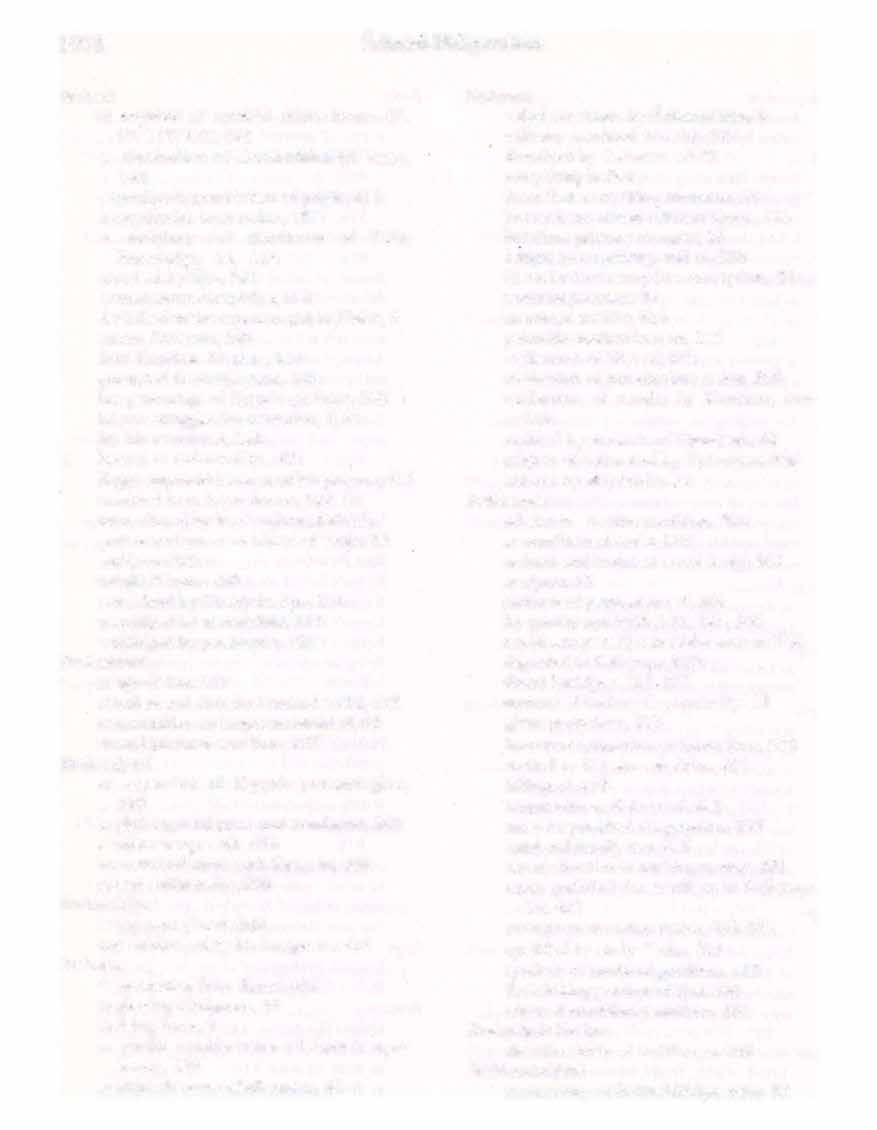
Brahman called substance by Sankaracarya, 6 celibacy practiced to enter, 479 described by Caitanya, 24-25 everything is, 269 from Him everything emanates, 24 has no locus standi without Kr�l')a, 744 has three primary energies, 25 hirarmo.yena piitrera veil of, 320 its realization a negative conception, 24 never impersonal, 25 one must act like, 824 palatable meditations on, 177 realization of bliss of, 332 realization of not absolute vision, 320 realization of taught by Kumaras, 144145
realized by students of Upani�ads, 98 subject of delineated by Vyasadeva, 226 uttered by 1\layavadls, 34
Briihmo.ras administer fruitive sacrifices, 204 as conditioned souls, 112 as head and brains of social body, 966 as vipras, 85 authorized professions of, 364 by quality not birth, 145, 341, 355 could accept vaiSya or sudro woman, 764 degraded in Kali-yuga, 609 direct k.satriyas, 157, 381 envious of Caitanya's popularity, 13 given protection, 379 have true estimation of themselves, 692 invited to Rajasiiya sacrifice, 497 killing of, 435 Kr�l')a relieves distress of, 428 must be punished if aggressors, 339 must cut family ties, 425 never attentive in banking money, 581 none qualified for sacrifices in Kali-yuga, 14, 437
preceptors for other castes, 364, 921 qualified to study Vedas, 213 symbols of mode of goodness, 112 their killing greatest of sins, 434 wives of considered mothers, 587
Brohmiirfla Puriira
describes birth of Dattiitreya, 149 Brahma-5amhitii as summary of
1072 Srimad-
32
$rimad-Rhiigavatam,
Brahma-samhitii
cited,141,165,305,396,533,594,617
excavated by Lord Caitanya, 32
Brahma-vaivarta Puriirw
cited,334,941
Breathing
'arada enters arayal)a through His,305 Vedas produced by Kr�11a's,301-302 Brhad-vai,srwva Tantra
cited, 814
Brhan-Niiradiya Purii!la
quoted,35

Buddha Bull
denied Vedas, deluded atheists, 23,161 foretold in Bhiigavatam, 161, 163 his cult of ahiritsii, 161, 162 made faithless faithful to him,161 paved path of theism, 163 supported by King Asoka,927
as Dharmn, discourses with cow,855-877 as Dharma, discourses with Parik�il, 891908
as emblem of moral principles,855 beaten by sudra, 840 even his stool is beneficial, 892 his legs restored by Parik�it,924-925 meant to produce grains,880
See also Cow, Cow killing,Cow protecting,Religion
Caitanya-bhiigavata
cited,18
Caitanya-caritiimrta
cited,19
teachings to Sanatana Gosvami in, 37
Caitanya l\lahaprabhu
accepts Jagai and l\1adhai,16 accepts sannyiisa, 17-18 accepts spiritual master, 232 as Bhagavan, as person Bhiigavatam, 6 as father of congregational chanting,7 as ideal sannyiisi, 17,32
banishes Junior Haridasa,32 chants holy names of gopis, 17 childhood pastimes,10-12
condemns interpretation of Vedas, 22-24 converts Prakasananda,34-37
defeats Kasmiri Pal)<;lit, 12-13
Caitanya Mahiiprabhu describes bhakti creeper, 39 discourses with Sarvabhauma BhaHaciirya, 20-21,22-28

essence of preaching of, 8-9 explains iitmiiriima sloka, 330 gave practical demonstration of Bhiigavatam, 6, 8, 80, 215
grantedaudience to King Prataparudra,3233
harder than thunderbolt,softer than rose, 32
His appearance described, 7,10
His civil disobedience against Kazi, 13-14
His eight prayers presented, 40-41
His life and teachings,7-41
His talks with Ramananda Raya, 29-31 instructs Rupa Gosvami,38-39 instructs Sanatana Gosvami,33, 37 in yellow color in Kali-yuga,143 is self-same Lord Sri Kr�l}a, 8 protested being called God,106 recommended spotless Pura[!a, 54 travels throughout lndia, 18-19, 31-32, 37-38
Ca[!piila as dog-eater, 196 can attain spiritual perfection, 10 Caste system by birthright not acknowledged by Caitanya,l6 by work and qualification, 102 Garbhiidana-sarhskiiram for higher ca tes, 622
perfection of,102 See also Var[liisrama-dharma
Celibacy
Kumaras situated in vow of, 144 practiced to enter Brahman, 479 Chiindogya Upani§ad cited, 209
Chanting
as principle of devotional service,416-417 forces Lord's presence,310 Kr�11a seen and heard by, 302 mitigates miseries,325 no bar for,277 of divine activities,95 revives spiritual senses,276 transcendental method of, 276
General Index 1073
c
Srimad-Bhagavatam
Chanting· with attention and reverence, 108 Charity
as corollary to blwkti, 93 householder give fifty percent of income as, 472 of Rantideva praised by Kr�r)a, 643 only briihmaras and sannyiisis authorized to accept, 364, 624 Parik�it compared to King Sibi in, 633634
Children
begotten in passion dviju-bandhus, 214 given protection, 379 grossly neglected in Kali-yuga, 861 in slaughterhouses of education, 81 more wanted by foolish, 122 unwanted called varra-sankaras, 380
Chivalry
as Bh:i�ma's relation to Kr�r:ra, 484 resides in Kr�l)a, 865

Cinema
as sense-gratificatory diversion, 67 material creation likened to, 74
Citizens
have no respect for siidhu, siistra, and guru, 881 immuned from effects of fighting, 489 their welfare is duty of king, 152, 609
Civilization
four principles of advanced, 904 godless cannot cleanse mind, 906 of polished cats and dogs, 379 perfection of human, 566
Cleanliness
as primary regulative observance, 906 for body and mind, 90Q resides in Kr�IJa, 865 spoiled by illicit sex, 907 Cloud
Kr�'la compared to, 586 mahat-tattva compared to, 136
Codes of Religion cited, 711
Common man
bewildered by KJ'ljl)a's activities, 410 his view of non-violence, 432 Kr�'la a puzzle for, 392
Yudhi��hira aggrieved like, 432
Conditioned souls
absorbed in matter, 195
Conditioned souls acceptmaterial nature as all in all, 250 bewilderment of, 808 disease of, 323 dream of spiritual engagements, 195 imprisoned life for, 241 most live Like animals, 187 reformed by externa! energy, 322 rotting in kingdom of material energy, 238, 266 their four llaws, 163 their present forms not factual, 171 Vedic literatures for their benefit, 252 See also Human beings, Men
Conjugal humor devotees in, 332 Visvanatha Cakravarti in, 486
Cooperation as principle of devotional service, 416-417 needed to broadcast Rhiigavatam, 235

Corruption pollutes atmosphere in Kali-yuga, 235 re ult of low-grade administrators, 630 Cosmos
as emanation of energy of Mukunda, 250 as shadow of spiritual world, 46-47 as Supreme Lord Himself, 249 becomes identical with Kr�IJa, 255 compared to objects made of gold, 47 created by will of Lord, 45 existing by Lord's will, 136, 264 results from interaction of material modes, 47
seen as form of Lord, 172 two types of dissolution of, 533
Cow
as emblem of peace and religion, 646 as representative of the earth, 855 beaten by sildra, 879-882 considered mother, 587 economic development centered about land and, 516 enlivened by Kr�IJa, 395 even her stool beneficial, 892 given protection, 379 gives less milk in Kali-yuga, 208 gives miraculous milk, 379, 880 Kr�'la relieves distress of,428 religious principles drawn from her, 881 Cow killing
discussed by Caitanya and Kazi, 14
1074
Cow killing ends human civilization, 199 not allowed by King Parik�it, 203 Cow protection feeds brahminical culture, 988 prosperity dependent on, 396
Creation beginning of, 127 by goodness of Vi�l)u, 116 mahat-tattva let loose at, 136 nothing lamentable in God's, 178 of sixteen principles of material action, 135 performed by living beings, 251
Cupid
conquered by Kr�l)a's wives, 599 invokes mundane lust, 599 Kr�l)a attracts mind of, 868
Oasaratha Maharaja as father of Lord Rama, 632 controlled arrows by sound, 364
Dattatreya
as Brahma, Vi�I)U and Siva, 149 exhibited Kr�l)a's knowledge, 168 instructed Alarka, Prahlada, Yadu, etc., 149

Death animal killer punishable by, 885 as change of body, 304 as lightning and illumination, 303 as trance for seven months, 616 bath in Ganges when it occurs, 375 Bhi�rna saw Kr�l)a at time of, 479 everyone's caused by Yamaraja, 845 foolish men forget, 990 imposed upon all by material nature, 7 inevitable due to duality, 383, 692 modern scientists try to avoid, 844 Narayal)a-paral)a not afraid of, 930 of a pure devotee, 304
one must remember arayal)a at, 185 Parik�it had seven days to prepare for, 609
remembering Kr�l)a at, 478-479 surest remedy for, 845
Deity approved by iit;iiryas, not idol, 19 as area incarnation of Kr�l)a, 19 identical with the Lord, 19 worshioed at horne, 475
Demigods

and asuras equal to Kr�l)a, 813 as assisting hands of Vasudeva, l 26 as branches of tree of Vi�I)U, 60 as parts of God's body, 54, 120 cannot award ·liberation, 117, 121,124 can't act without Kr�r)a's sanction, 122, 915
carry out affairs of cosmos, 47, 323 created by Brahrna, 943 created from portions of puru�a, 141 drink soma-rasa, 813 feared Hirar.1yaka ipu, 167 flesh-eaters sacrifice to, 242 Live on Svar planets, 503 more luxurious than human beings, 1007 Narada sage among, 146 not V�flU·tattva, 120 see to upkeep of prison house, 859 served by Lord Rama, 158 their ghastly forms rejected, 120 used to visit earth, 838-839 worship of recommended in Puriif!as, 240 worship of rejected, 54, 121 Yajnesvara at their sacrifices, 272 Democracy people never happy in, 975 surcharged with sudra qualities, 630 thieves and rogues of, 975
Demons
material scientists as, 776 Sukracarya spiritual master of, 449 Desires as diseased activity of soul, 11] as symptom of life, 426 body given to satisfy material, 631 difficult to get rid of, 108 living being never vacant of, 299 material are trash, 806 naked forms become manifest, 806 relief from, 312
Destiny
determined by constellations of stars at birth, 621 everyone creates his own, 407
Destruction by Lord Siva, 116-117 done by supreme will, 136
Detachment by culture of knowledge, 125 from worldliness by hearing, 314
General Index 1075
D
Detachment
not becoming inert, 93 results from devotional service, 92 Devaki
God appeared in her womb, 69 her sons killed by Kamsa, 399 Kr�IJa pleasure of, 395 underwent penances, 125 was Ppini in previous lifetime, 414 Devotees always desire to go back home, 991 always fearless, 344 arcan.ii for neophyte, 298 are all successful, 181 are submissive, 114 as briihma[las by action, 112 as confidential associates of God, 106, 336 as emblem of all knowledge, 181, 228 as favorable servitors of God, 60, 180 as friends to all, 60 as only perfect living beings, 1005 as property of Kr�IJa, 405 as rasa-graha, 248 as Vi§[IU-jan.a, 334 as wisest men in world, 646 attached to one another, 405 bring new order of life, 244 by nature peaceful and offenseless, 893 called akii'icanas, 405 cannot remain in darkness, 114 can see Kr�!Ja's universal form, 140 do not claim to be God, 106 do not like impersonalists, 334 enchanted by glories of Lord, 429 enter pastimes of Kr�IJa, 108, 406 feel pangs of separation, 297 four sects of worshipful, %3-954 have all good qualifications, 202 have never become impersonalists, 946 have secret treasure house, 404 hear, glorify, remember, 103 immune to material miseries, 181 in a forlorn position, 249 inject transcendental sound, 378 in list of Kr�l)<l's paraphernalia, 1024 in touch with all-great, 381 know how to respect demigods, 784 know no one but Kr�IJa, 387 Kr�IJa may carry out order of, 487
Bhagavatam

Devotees
Kr�r:ta protects family of, 1025 Kr�IJa's kinsmen and relations as, 347 l*e bees, 585 may fall down, 245 meditate on Kr�IJa's pastimes, 498 more honored than Kr�IJa, 1020 must be plain and gentle, 263 neophyte attracted by Deities, 100 neophyte may imitate karmis, 248 neophyte may _make show of hearing, 101 neophyte must serve pure devotee, 264 never counteract personal curses, 981 never find fault, 702 never same as fallen karmis, 248 never unkind to enemy, 363 never vanquished, 617 no bodily disqualification of, 548 not bewildered, 8 not mercantile community, 408 offer sacrifice to Vi�t.m, 60 persecuted, 540 personal experiences of, 327 play part of enemies, 490 protected by God, 69 put in dangers, 399 realize Bhagavan, 98 reformed by Lord's chastisement, 248 render loving service physically and mentally, 270 second-class see four principles, 100-101 sins of burnt in fire of repentance, 986 sometimes fall down, 248 strictly prohibited from sex indulgence, 6 surcharged with Kr�t)a's potency, 951 talks about are Kf§T}a-kathii, 336 their lives a symbol of sacrifice, 859 their lives in a nutshell, 302 three grades of, 628 tolerate all reverses, 902 unaffected by material qualities, 603 under direct care of Kr�IJa, 506 ungrudgingly accept tribulations, 458 value of a moment's association with, 941 See also Vai§[lavas, Pure Devotees, Spiritual master, Transcendentalists, Gosvamis, Liberated souls
Devotional service accumulates birth after birth, 301 acquiring a hankering for, 299
1076 Srimad-
Devotional service
Arjuna became a different person by, 426 as culmination of all knowledge, 29, 112, 325, 804 as dynamic activity, 244 as highest perfection of life, 29, 423,426 as most confidential knowledge, 265 as natural inclination, 262 as serving the Lord by purified senses, 39 as superior quality of occupation, 91 as unalloyed activity of the soul, Ill atmosphere surcharged with, 255 attracts liberated soul, 27 authorized codes in Pancariitrika system, 276
hegins with hearing, 108, 109, 326, 419 brings peace, 268 by association of Bhiigavatas, 110 Caitanya wants it birth after birth, 40 called highest perfection by Caitanya, 3 checks world of hypocrisy, 735 culminates in premii, 275,326 dear to perfect beings and the Lord, 219 destroys passion and ignorance, 110 enlivening to the self, 115 explained in The Nectar of Devotion, 39 extinguishes fire of illusion, 325 eyes anointed with tinge of,141 facilitated by arca-vigraha, 582 five stages of, 39 for material gain, 91 for postgraduate spiritual students, 215 for self-realization, 313 for show a disturbance, 101 freedom as main pivot of, 315 free from designations, 39 frees one from material encumbrances, 54 God realization by, 320 in exchange for material power, 248 is infectious, 258 is not inaction,111, 537 Kr�J;�a bestows boon of, 482 leads one to side of Lord, 141 liberation its by-product, 105,231 like flow of river, 262 like touchstone, 305 miseries mitigated by, 324 mixed described, 275, 313 Narada fixed in unbroken, 146, 307 no desire for self-aggrandizement in, 73
Devotional service not for less intelligent transcendentalist, 100
pastimes manifest by dint of, 239 perfect way of described, 105, 249 principles of, 416-417 qualities of material field, 331 rectifies our present senses, 140 rejuvenates man, Ill results in causeless knowledge and detachment, 92 reveals Lord, 141 satisfies soul, 95,312 sins eradicated in, 263 sometimes polluted, 91 spiritualizes present body, 812 spiritually relishable, 249 suggested by Ramananda Raya, 30 taught to Riipa Gosvami, 39 taught to Sanatana Gosvami,37 to enter Kr�va's mysteries, l70 to realize Absolute Truth, 100 transcendental to sin and virtue, 859 two categories of, 39 · unmotivated and uninterrupted, 90, 576 vanishes passion and ignorance, 262 See also Bhakti, Bhakti-yoga
Dharma
as hull,beaten by sii.dra, 879-881 as hull, discourses with Parik!lit, 885909
as �!)a's laws and orders, 378 as that which sustains,91 Kr�J)a incarnates when decline in, 49 meant for ultimate liberation, 96 not ultimate goal of life, 827
Dhaumya Muni

as learned priest of Piil)l;iavas, 440 protected the action of Jayadratha, 791
recited hymns at Panx�it's birth, 622
Dhftar�tra
addressed as scion of family of Ajami4ha, 696 advised to follow dhiras, 669 as attached householder; 690 his sons the Kurus, 388 one in every home now, 691 overwhelmed with grief,377 practiced �failga-yoga, 722
General Index 1077
Disciplic succession
aU Gosvamis, 61 bona fide speaker must be in, 70 distributes knowledge aU over world, 212 for serious student of rasa, 59 no change or disturbance in, 58 of Bhiigavata school, 58 See also Paramparii
Disease
avoided by regulated diets, 268, 474 cause and remedy may be same, 147 leaders disturbed by, 208 material .caused by hankering, 405 of conditioned souls, 323 of mind c_ured, 905
Distress includes so-called happiness, 147 remembering Kw.1a in, 333 under control of kiiln, 710
Doubt
clouds of cleared off, 114 from misconception of material body, 808 provoked by material energy, 903
Draupadl
attained same results as PaQ(iavas, 831 begs release of Asvatthama, 362-367 couldn't withdraw respect for briihmaf!a, 361-363
her hand won by Arjuna, 775 her sons beheaded, 337 insulted by vicious assembly, 380, 400 overwhelmed with grief, 377
Drinking as sense-gratificatory diversion, 67 Kali resides in places of, 919
DroQacarya
as father of ASvatthama, 385 as partial incarnation of Bl;haspati, 449 his good name respected, 358 Karl)a his student, 789
Duality
conception of due to ignorance, 499 everyone envious of others in, 383 material world full of, 383 mitigated by knowledge, 809 of matter and spirit, 383
Dul;lsasana
killed by Bhima, 690
Durgii Devi
Lord present in womb of, 620
Durga Devi manages material sky, 828
Durvasa Muni
accepted priesthood of King Svetaketu, 781
as incarnation of Lord Siva, 781 quarreled with King Ambari�, 781
Duryodhana
Duty
did well on throne, 430 displeased by ASvatthama, 337 under clutches of Gandharvas, 639 usurped kingdom of PaQ(iavas, 379 according to·conceptions of life, 94 executed by Kr�Qa, 419 foul and improper, 733 highest perfection to please Lord Hari, 102 innumerable for man, 245 Kr�l)a tested Arjuna's sense of, 360 may be useless labor, 94 of mental speculator, 94 perfection by following, 112 performed by thoughts, words, and deeds, 451 prescribed for everyone, 733 prescribed in all scriptures, 68 relinquished by devotional service, 245 soi. of Drol)a punished for negligence of, 349
to parents, family, society, etc., 245 to poets, scientists, etc., 245

Dvaraka
as ideal of human civilization, 567 as Kr�Qa's prosperous metropolis, 555 enhanced celebrity of earth, 543 filled with opulences of all seasons, 566 inhabitants all liberated souls, 557 inhabitants felt separation from Kr�l)a, 555-556
Kr�Qa's entrance there as subject of Chapter Eleven, 555-605 no mills, factories, or slaughterhouses in, 567
prostitutes in, 576 where pious men assemble, 756 Dvii suparf!ii sayija sakhiiyii samanam vrk�am par4asvajiite, verses quoted, 128
Dvija-bandhus
as friends of twice-born, 158 children begotten in passion are, 214
1078 Srimad-Bhigavatam
Dvija-bandhus

classified with women and 5ii.dras, 158, 215
Earth
as absolute property of Kr�pa, 539 as cow, discourses with bull, 855-877 as fragment of material world, 238 as middJe planet, 137-138 certified by Kr�pa as place of misery, 544 considered mother, 587 cultivated by Prthu, 152 demigods used to visit, 838-839 divided into nine var_sas, 849 known as Bhiiratavar�a, 635 known as Jambudvipa, 613 pacified by Parik�it, 909 Parik�it compared to, 640 represented by cow, 855 uninhabitable by the sane, 596 See also Cow
Economic Development becomes source of degradation, 988 centered about land and cows, 516 illusory and never successful, 642 included in fruitive works, 146 inferior to devotional service, 231 Niirada didn't waste time in, 288 needed for sense gratification, 52 regulated for karmis, 5-6
Ecstasy
annihilates formalities, 592 eight kinds of, 293
Niirada absorbed in ocean of, 293
Education and bad character go ill together, 861 bad system of, 67 geared to sense gratification, 81 Niirada did not have proper, 255 slaughterhouses of, 81
Enemy
devotee never unkind to, 363 devotee plays part of Kr�pa's, 492 everyone afraid of his supposed, 326 kinds not killed, 356
Energy acts according to Lord's omnipotency, 174
converted in Lord's service, 255 diversions of human, 241
duality of inferior and superior in material world, 99 everyone's borrowed from Kr�pa, 473 force of divine uncheckable, 714 human for developing finer senses, 567 human not for animal propensities, 474 human squeezed out by industries, 423, 518 influence of Kr�pa's, 265
K�l)a has manifold energies, 126, 345 Kr�tta's compared to electrical, 175 no loss of in devotional service, 941 nondifferent from energetic, 25-26, 53 of cause and effect, 127 of human spoiled, 405 of Lord in every sphere of life, 267 proper utilization of human, 255 purified from material inebrieties, 473 relative forms of, 53 spiritual foiled by material assets, 405 spoiled by watering leaves, 612 via medium manifests living beings, 266 Energy, external accepts thankless task, 322 as checking curtain of miiyii, 392 bewildering or enlightening, 176 can work only on living beings, 323 compared to darkness, 321 controlled by Vi�pu forms, 117 expansions are inferior forms, 126 has manifested cosmic world, 46 living being imprisoned by, 322 partially identical with Kr�pa, 250 pure devotee not engaged in, 93 relations of body and mind due to, 427 sins rectified through, 322, 620 subsides by God's will, 175 turned into internal by God's grace, 175
when manifested is temporary, 46 Energy, internal iitmiiriiTTUJ$ take shelter of, 3.21 compared to moonlight, 321 expansions of are superior forms, 126 human beings product of, 250-251 Kr�tta's abode manifestation of, 186 manifests Lord's eternal form, 46, 140 pastimes performed by, 75 when manifested is real, 46
General Index 1079
E
Enjoyer
of fruitive work hould be God, 237 supreme is K{�l)a, 273
Enjoyment
eradication of false, 346 in name of religion, 241
Envy
devotee is never envious, 303 encouraged by gold, 921 everyone in material world envious, 52 Kr�f.la has no object of, 407
Eternity conducted by sandhini potency, 25 subject covered by Vediinta-siltra, 226
Eyes
annointed with tinge of devotional service, 141 of devotees perfect, 140, 310
Faith in God by travelling alone, 290 in spiritual master and Kr�f.la, 277 resides in Kr$JJa, 865
Fallen souls
See Conditioned souls
Falsehood
as principle of irreligiosity, 919 encouraged by gold, 921
Family
affection cut by KrS.!Jl!-, 425
Asvatthama as burnt remnants of his, 358 cannot save us at time of death, 7 extended selfishness for, 94 left by Maharaja Parik�it, 185 maintained by Bhiigavata business, 184 of devotee liberated, 629 strong attachment to, 68 ties cut by pure devotee, 425
Fasting for spiritual realization, 906 value of compulsory fasting days, 920
Father Fear
as spiritual master, 588 Kr�t�a is everyone's, 90, 347 living being enters womb by semina of, 616
as greatest material problem, 558, 649 as illusion of slumbering living being, 761 avoided by prowess, 475
Fear called anxiety, 649 due to ignorance of next problem, 558 from identifying with body, 327 none on spiritual plane, 269 personified afraid of Kr$f.1a, 410 vanished by holy name, 558
Fearlessness
as independence from everything, 825 entrance into kingdom of, 649 instilled by Kr${1a, 343 shelter of is Kmta, 383
Fire
as soul of Vedic sacrifice, 118 compared to material existence, 344 kindled by spiritual master, 129 of lamentation, illusion, feafulness, 325 of mystic yoga, 728 of sacrifice must be worshiped, 217 Parlk�it irresistible as, 636 Supersoul compared to, 129
Flesh-eating discouraged by Vedas, 242 prohibited by Ik�vaku, 632

See al!o Cow killing, Slaughterhouses
Fools
after more wealth, wives, etc., 122 cannot know transcendence, 178 have no information of soul, 94 ungrateful to benefactors, 867 worship Siva, 117
Forefathers see newly born child, 625 worshiped by passionate and ignorant,122
Form of Kr�IJa
comprehends all tastes, 332 eternal relations with, 294 is not material, 171, 276 nonbeliever in, a faithless demon, 26 sought life after life, 294 without touch of mahat-tattva, 140
Freedom
as main pivot of devotional service, 315 as meeting the complete spirit, 95 desired by spirit soul, 95 from material encagement, 823 from passion and ignorance, 297 living being anxious for, 315 misuse of causes suffering, 407 of Narada unlimited, 315
1080 Srimad-Bhagavatam
F
Freedom
surrender to spiritual master is, 315 through devotional service, 315
Frieudship
as relation of Aijuna and Kr�•)a, 360 males attracted to Kr�l)a in humor of,332 Fruitive activities
as painful and transient, 236-237 cannot lead one to perfection, 237 compared to banyan tree, 270 for promotioi1 to better planets, 53, 246 made subservient to devotional service,237 Marlci authority on, 308 rewarded by Kr�l)a, 124 transcended by Bhiigavatam, 51 Fruitive workersas materialists, l79 compared to crows, 232 devotees sometimes imitate, 248 opposed to devotional service, l7 prone to degradation, 248 should not be discouraged, 242 take pleasure in wine and women, 232 See also Karmis
G
Gambling
as major vice of Kali-yuga, 62 destroys truthfulness, 920 Kali resides in places of, 919 of all description degrading, 920
Gandhari
followed Dhftara�tra to Himalayas, 698 ideal wife, mother, ascetic,507,698, 707 no less than Bhl(lmadeva, 507
Gru.1esa
worshiped by passionate, 121, 272 wrote down Mahiibhiirata, 445
Ganges
as wife of the sea, 1006 bathed in during lunar eclipse, 10 bath in when death occurs, 375 in seven branches at Saptasrota, 722 mixed with lotus dust and tulasi leaves,
376,992
Parlk(lit awaited death on its bank, 185 praised by Ke5ava Kasmiri, 12-13 purifies whole universe, 953 sanctified one hundred times called Yamuna, 993
Ganges sanctifies after prolonged use, 72 water used by Advaita to worship Kr�l)a, 15
Garbhodakasayi Vi(li)U
Brahma rests in body of, 306 enters each universe, 136, 137 glorified in Garbha-stuti, 142 K(llrodakasayi Vi(ll.JU His expansion, 138 lotus flower from His navel, 137
Giiyatri mantra

for spiritually advanced, 46 in first sloka of Bhiigavatam, 50 invoked by Vyasadeva, 46
Glorification
actual object is Kr�l)a, 104 as Hari-kirtana, 254 as real use of knowledge, 254 of an unqualified person, 104 of Kr�•!a perfection of life, 31, 103 of Lord, propaganda against, 234
Goddess of fortune
Kr�l!a's chest the abode of, 584 Kr�l!a served by, 428 restless and moving, 594
Gold
complete scarcity of, 658 encourages falsity, lust, envy, etc.,921 properly utilized, 924
Goloka Yrudavana
abode of Lord KT\\1)3, 169 shaped like whorl of lotus, 843 See also Spiritual sky
Goodness
Brahman realized by, 118 devotee becomes happy in mode of, 110 everyone in this mode in Satya-yu.ga, 213 full of knowledge and morality, 725 lack of causes impatience, 207-208 mode of now almost nil, 213 of Narada like the sun, 228 pure devotee in unalloyed mode of, Ill r�is situated in quality of, 442 to seek God in lonely forest, 298 Yudhi�hira personality of, 611
Gop� ·
as conjugal associates of KT\\1)3, 418 Bhi�ma aspired to remember, 496 dissatisfied with Brahma's work, 641 exhibit highest form of worship, 8
General Index 1081
Gopis imitated Kr�va's movements,495
Kr�•�a's pastimes with,168
relishing activities of,311 tested by Km�a,360
their holy names chanted by Caitanya,17 their mode of worship recommended by Caitanya,8-9,17
worship Syamasundara
Government duty of to kill bad social elements,889 machinery of polluted,47l monarchy superior form of,509 perfect if leader is perfect,515 protection of lives first duty of,886 shouldn't allow animal slaughter,890
See also Administrators,Politicians
Govinda
as pleasure of cows and senses,755 called on by Caitanya,41
cause of .Maha-Vi�pu,533
distributes Himself as Paramatmii,617 exclusive shelter of great living beings,943
herds surabhi cows,584 inclined to briihma_nas and cows, 396 materialists cannot address,403 recite His name at death,185
See also Kr�•�a
Grhamedhis
are envious of others,4 live for benefit of family members,4 pass night in sex,day in money,5 perform welfare work for material prosperity, 435
their subject matters for hearing,4
See Householder H
Hankering as cau e of material disease,405
a diseased activity of soul,111 as ymptom of life,426 due to interaction of material modes,405 for devotional service,299
Happiness
as ce sation of repetition of birth and death, 989 baffled by material nature,86,91,132 by changing subject matter, 311 by cooperation between man and God,520
Happiness by glorifying Kr�1.1a,104 by making cows and bulls happy,882 depends on religious principles,864 devotees live for others',202 everyone has his destined,247 hard struggle for,266 how to realize reality of,147 is miiya ' s illusion,266,316
Jaimini's theory of,898 mixed is feature of material life,247 obtained automatically,246 sought by every living being,151 spiritual feeling of,294 two pillars of,927 under control ofkaw,407,710
Harer niima harer nama harer niimaiva kevalam, verse quoted,35
Hari beyond range of material affection,603 highest perfection His pleasure, 102 incarnated to·unload earth's burden,863 pleased by Yudhi��hira,656 sacrifices performed to satisfy,657
See also Kr�1.1a

Hari-bhakti-sudhodaya cited,332
Hari-bhakti-vilasa cited,829

Haridasa Thakur
allured by miiya, 313 appeared in Mohammedan family,29,85 as acarya of holy name,85,949 incident with Jagai and Madhai,15
Hari-namiimrta-vyakarara grammar by ]iva Gosvami,12
Harivamsa scriptures cited,153
Hastinapura entered by Sukadeva Gosviimi,197 entrusted to Parik�it,926 established by King Hasti,197 king of was emperor of world,608,818 marked with lotus footprints,422 now Delhi,197
Hearing (about Kr�pa) affinity for gained by service,106 applicable for everyone,9 as most important devotional principle, 109,326,419,501
1082 Srimad-Bhigavatam
Hearing (about l<r�r;ta) as only remedial process, 267 as principle of devotional service, 416-417 as sacrifice, 79 called SraVUfiU, 63 clears all sins, 260 develops desire for service, 108 eagerness for is first qualification, 107 ends material bondage, 105, 107 for detachment from worldliness, 314 for pleasure of heart's desire, 57 for self-realization, 79, 80, 260, 678 for transcendental tastes, 58 from right sources, 189,418 from unauthorized sources, 101, 418 mind should he engaged in, 261 mitigates miseries, 8, 325 more important than reading, 63 Narada developed taste for, 259 narrations of His pastimes, 30,76, 95,103, 262
necessary for explaining, 63 necessary to assimilate scriptures, 63 one uplifted by, 70 patient and submissive, 56 recommended in Kali-:ruga, 216 Rukmil)l attracted by, 332 to learn spiritual art, 70 we have no taste for, 108
Heart knots of cut, 113
Kr�Qa appeared on lotus of Narada's, 292, 310
Kr�Qa present in everyone's, 499 loving service established in, no mirror of, 310 of devotee illuminated by Krwa;ll4 of suffering person penetrated, 344 perfection when one is satisfied at, 216 transcendental sound injected into, 378 Himalayas
ekadaflfli sviimis fond of, 699 famous for all richness, 640 Parik9it compared to, 640 peak of gold in, 655
Vyasadeva resides in, 206 Hirar;tyagarhhas
See Yogis Hirar;tyakasipu
bifurcated by Nrsiniha, 71, 155
Hirar;�yakasipu
Brahma his worshipful deity, 121 flouted authority of Lord, 49 underwent bodily torture, J 25
History
connected with Kr�r;�a's activities, Hl4 from time of Buddha, 183 of great devotees, 182 of universe repeats itself, 288 Purtif!aS and Mahiibhiirata as, 183
Holy names advented with advent of Caitanya, 10 all have same potency, 10,108 as common platform for realization, 10 as method for waking up, 60 as powerful as Lord Himself, 71 Caitanya regains consciousness hearing, 21 can free one immediately, 71 chanting of for self-realization, 10,79 described in Sik�a�takam, 40 feared by fear personified, 71, 558 Haridasa Thakur iiciirya of, 85 hundreds and millions, 10, 40 identical with Kr�r;ta, 872 make Caitanya laugh, cry and dance, 35 offenseless chanter of, 872 produce transcendental emotion, 35-36 uttered by helpless, 71,403 Householder as order of life, 102 distinguishes between male and female, 196 enlightened by mendicants, 199, 291 glamour of his worlilly possessions, 199 happy by sacrifice, 882 keeps cows and hulls, 882 Kr�r;ta marvelous as, 393 must feed old men and children first, 766 must offer food to Kr�l)a, 782 ordered to take viinaprastha, 990 Parlk�it as ideal, 202 practiced to different modes of life, 700 required to rise early, 700 rules not observed, 67 saints sanctify houses of, 1023 sometimes asks favors from Kr�Qa, 424 Sukadeva took milk from, 198 transcendental for realizing ultimate truth, 4
Vyasadeva played part of, 196,318

General Index 1083
Human beings
as products of internal energy, 250-251 bound by Vedic injunctions, 710 busy with questions and answers, 89 can hear properly, 130 cannot create ideology acceptable to everyone, SIS compatible foodstuffs for, 471 elder brothers of all living beings, 517 envious and obedient, 719 extended selfishness of, 94 finer instincts of destroyed by factories, 567

foolish bound by nomenclatures, 711 good qualities of destroyed by Kali-yuga, 80
Kmia plays like, 408 live on Bhur and Bhuvar planets, 503 pastimes of Kr��a to attract, 260 their only duty tapasya, 147
See also Living beings
Human civilization
basis of progressive, 988 Dviinikii-dhlima ideal of, 567 ended by cow killing, 199 highest goal of, 420
See also Civilization, Modern Civilization
Human life
as chance to get out of fruitive action, 8-9, 241
as combination of matter and spirit, 5 begins when religion begins, 52
brahminical stage highest, 112 destruction of noble aims of, 423 meant for dying like B�ma, 501 meant for self-realization, 4, 67, 80, 151, 242,329,378,4Q2,405,472,717,890
not for sense gratification, 97 not meant for economic development and sex indulgence, 6
perfection of by devotional service, 423 responsibility of, 112 should be regulated, 692 to inquire about Absolute Truth, 97
See also Life
Hunger
controlled by yoga, 475 for a spiritual atmosphere, 614
Husband
wife better half of, 364 wife's duty to follow, 507
Hypocrisy
as result of low-grade administrators, 630 as symptom of Kali-yuga, 208 I
Ignorance
acceptance of gross and subtle coverings in, 174, 261 Arjuna seemingly polluted by, 488 as cause of anomalies in human society
733
best means to get out of, 345 compared to darkness, 261 conception of dualitydue to, 499 destroyed by devotional service, 110 nondevotees always in, 179 relative truths hidden in, ll3-ll4 Siva as deity of, 116 those in worship forefathers, etc., 122 to think of Kr��a as ordinary man, 463 1mpersonalists
eschew meanings from Bhiigavatam, 193 fall down and get material forms, 494 have no idea of transcendental form, 265 Kr��a takes no personal interest in, 579 minimize Kr��a's omnipotency, 124 siiyiijya as liberation of, 496 think themselves Brahman, 824 unable to evaluate devotees, 334 worship Kr�ra's glowing effulgence, 791 See also Miiyiiviidis, Incarnations
Bhiigavatam as literary incarnation of Kr�ra, 182, 244 created by unscrupulous men, 78 display eternal blissful association, 75 each has specific function, 145 expand from K�irodakasayi V�r.u, 138 for creation, maintenance, destruction, 76 indirectly empowered called vibhii.tis, 144 in each and every species, 131 like innumerable rivulets, 144,164 listed, 165 of eachyuga a different color, 143 of the millennia, 143 of unlimited categories, 75 perform adventures, 74 pretenders accepted as, 106 reclaim those in pure goodness, 131 symptoms of taught to Saniitana Gosviimi, 37
1084 Srimad-Bhagavatam
Indians
deterioration of ideals of,990 have duty to broadcast Bhiigavatam and Gltii, 80,234 have failed in their duty,234 should understand KnTJ-a-kiitha, 377
Indra
as controller of rains,516 conquered by Arjuna,776 gave Sakti weapon to Karpa,789 his worship stopped by K.rwa,123 post taken by Yajna,150 subject to law of karma, 305 took shape of eagle,634
Yudhi��hira compared to,380
Initiation (spiritual) brings quick change in life,285 refraining from sinful activities after,16 sacred thread ceremony,214
Intelligence engaged in Kr�pa's devotion,300 firm and fixed in K{�!).a, 300 God beyond approach of mundane, 296
meager in Kali-yuga, 208 pacified in its true color,806 used to meditate on Supersoul,292
Intoxication
as major vice of Kali-yuga,62 as principle of irreligiosity,919 death penalty for,909 decrease degree of,403 encouraged by gold,921 spoils mercifulness,907
Yadus die in madness of,813
lrreligiosity
as barbarous condition,52
basic principles of,919 caused by personality of Kali,909 root causes of,905
lsopan�d
basic philosophy of,539 cited,889
J
Jesus Christ never angry at mischief mongers, 902
Jiva Gosvami
accepts K{�!).a as God,393 as V�!).ava scholar,9 author of K!fi[la-sandarbha, 44 cited,153,168,204,209,593,652,829, 866,868,898,919,964,992,993 wrote commentary on Bhagavatam, 50 wrote Sanskrit grammar using holy names, 12
Jivas
as expansions of Kr�pa,168 as living entities,117 possess percentage of Kr�l.la's qualities,169 require Kr�l.la's protection,754 sometimes controlled by matter,117 See also Living beings
]iiiina as researching problems of life,804 as theoretical knowledge of transcendence, 959 to know everything of Brahman,502
]iiiinis as dry mental speculators,75 prohibited from sex indulgence,6 Vediinta-sutra addressed to,87

Justice
none when there. is animal killing,162 Yudhi�\hira replaced on principle of,430
Kali,personality of became gold standardized,921 deliberately commits sins,909 driven away by constant chanting of holy names,934-935 flourishes by deceit,906 his royal dre_ss artificial,910 meant for mischief,917 saved by will of Providence,911 surrendered under pressure of fear,910 Kali-yuga
all sacrifices but sankirtana forbidden in, 14, 656
]anmiidy Cl$ya yata[l
sloka cited,104
verse begins Vediinta-sutra, 53
verse cited by Lord Caitanya,22
verse suggests K{�!).a is source of everything, 6
as age of quarrel on slight provocation, 234
as iron age of quarrel, 66 as most condemned age, 73 Caitanya in yellow color appeared in,145 chronology of,328,817
General Index 1085
K
Kali-yuga
clouded Buddrusm taught by Sarikaracarya in, 27
cows, women, etc., unprotected in, 379380 degradation of briihma!las in, 609 dense darkness of ignorance in, 186 destroys all good qualities of man, 80 ensued after Battle of Kuru�etra, 816 four major vices of, 62 full of ignorant men, 158
Hariniima-yajna recommended in, 437
Kalki appears at end of, 164
Life span in, 79
Lord Buddha appears in, 161
Mahiibhiirata more essential than Vedas in, 217
man addicted to wine, tea, etc., in, 905 many "isms" and cults spring up in, 881 means mismanagement and quarrel, 840 men have short lives in, 66 no expertbriihma!las in, 437 saturated with vicious habits, 73 surcharged with faithlessness, 67
Varl)iisroma-dharma exploited in, 102 Vyasadeva foresaw anomalies in, 207 women dressed too attractively in, 905
Kam�a killed by K{�J;la, 7l persecutes Devaki, 399
Kapila
as author of Sankhya philosophy, 897
Karma
can be changed by Kr�J;�a's will, 713 everyone subject to its law, 305 increases chain of material activities, 436 knots of cut by remembering Kr�J;�a, 104 plus devotional service is karma-yoga, 105 terminated, ll3
Karma-yoga
as doing everytfting for �J;la, 920 as karma plus devotional service, 105 bhakti not dependent on, 105 one's activity changed into, 270
Karmis
as foolish materialists, 87, 100 devoid of iitma-tattva knowledge, 6 few desire liberation, 87 inclined to economic development, 5 of thousands, one becomes iitmiiriima, 329
Karmis suffer results of their actions, 248 trained byNiirada-paiicariitro, 146 See. also Fruitive workers
KarJ;�a born of Kunti by sun-god, 789 enthroned in stat� of Aitga, 790
Katha Upan�ad cited, 525, 628
Kaumadi Dictionary cited, 327
Keqa Upani¥Jd cited, 323
'Ke8ava Bharati
King awarded Caitanya sannyiisa, 18
as · protector of helpless citizens, 609 as representative of Supreme Lord, 203 belongs in front Line of battle, 489 his duty to be pious, 152 his wife considered mother, 587 ideal has no personal ambition, 612 must cut family ties, 425 never to be condemned for any action, 973 no question of self-aggrandizement for, 840 people happy under pious, 413 protects all projiis, 631 represents all living beings, 611 should be fear personified for upstarts, 630 spoils kingdom if bad, 519 subdues sufferings, 888-889 unrestricted in sense control, 367
See also Monarchy Kingdom of God entered after many births, 136 entered by eagerness to hear about Kr�IJa, 107
eternal happiness iri, 132 for one cleared of all sins, 108 is delightful, 74 king guides subjects back to, 203 not for grossly illusioned, 403 secret of entering, 180 wanted without God consciousness, 926
See also Spiritual sky
Kirtaniid eva kn�Jasya mukta-sanga parom brojet, quoted, 658 ·

1086 Srimad-Bhagavatam
Knowledge
advancement of experimental, 420 as basis of devotional service, 804 as concomitant factor of bhakti, 271 as knowing everything of Brahman, 502 bhakti-vedantas impartial in distributing, 257
Blii�madeva excelled Kr�r)a in, 431 by association of Bhiigavatas, 110 conducted by samvit potency, 25 covered by illusion without KwJa, 564 culminates in descriptions of the Lord, 253 culture of brings detachment, 125 deductive called paramparii, 114 dependent on devotional service, 92,112, 325
devotee emblem of all, 181,228 distributed by disciplic successions, 212 eighteen items in culturing, 125 end of physical is sense gratification, 125 fragmental accumulation of, 267 introspective called prajna, 696 its five factors in Gila, 803 its goal is K{�qa, 213 its real use is glorification, 254 Kr�qa beyond range of experimental, 393 leads to perfection of life, 253 light of pure, 114 material means ignorance of self, 649 material related to body and mind, 227 more confidential is Paramatma,265 most confiderltial imparted to Brahma, Arjuna, etc., 265 must be goal of austerities, 126 none beyond Vedas, 212 not used for Kr�qa is nescience, 254 of Kr�qa fixed and unfathomable, 868 ordinary called jnanan, 265 perfect material and spiritual, 93 physical condemned as ajiiana, 125 plus devotional service is jiiana-yoga, 105 real is Vasudeva, 809 reception of through paramparii system, 185
resides in Kr�qa, 174,865
Vedic literature like milk ocean of, 184
Koran describes Bhiigavata-dharma and Kr�r:1a, 38

discussed by Caitanya and Kazi, 13
Kr�IJa accepted spiritual master, 252 addressed as Nanda-Nandana, 465 addressed as Piirtha-Sakhe, 465 addressed as Vijrlya-Sakhe, 465 addressed as Yasoda-Nandana, 465 advised .Yudhi�thira to lie, 705 appeared as four-armed Vi�I)U, 78 appeared on lotus of Narada's heart, 292 Arjuna fought for His cause, 267 as ajita, unconquerable, 492 as Almighty God, 428 as all-perfect iilmiiriima, 600 as all-pervading, 44,406 as asamaurdha, unparalleled, 540 as iitmiiriima, 405 as eternal master, 229 as eternal time, 406, 719 as everyone's father, 347 as factual Vedantist, 900 as Gadadhara, 422 as great wheel-carrier, 180,469 as hero in all circumstances, 418 as kaivalya, one alone, 582,738 as k�atriya, 381 as Lord of Madhu, 426,529 as Makhan-Cora, butter thief, 530 as nirgu[la, 603 as Paramatma, 107 asParame5vara Param Brahma, 952 asParam-Puru§a, 321,326 as shelter of Garuc;la, 946 as summum bonum, 168 as supreme cognizant, 603 as supreme independent, 601 as supreme Narayal)a, 829 as Vasudeva, 160 as vijayasakhe, friend of Arjuna, 484 as vital force and unborn, 408 attractive in His activities, 259 benefactor of truthful devotee, 107 boy of Nanda, 395 cent percent perfect, 389 central pivot of living beings, 91 chastised by Yasoda, 410-411 chief amongst all eternals, 525 compared to desire tree, 560 compared to puppet master, 286 compared to sun, 113,261,344-345,463• 478,564,810,866,867
General Index 1087
Km1a compared to tree, 250 compared with gold mine, 47 competent to instill fearlessness, 343 conquered by loving service, 430 contacted by bhakti, 93 cousin of the PaJ;J.�avas, 376 cynosure of neighboring eyes, 497 decorated with garlands, 397 defined in choice poetry, 76, 253 enjoyed wounds of Bh1�madeva, 486 enlivener of cows and senses, 395 equal to everyone, 347 equibalanced, 463 especially inclined to His devotees, 69 establishes glories of His devotee, 469 eternally irreproachable factor, 392 eternally the Supreme Lord, 410 explained by Caitanya in grammar read. ings, 12
famous as Govardhanadhani-Hari, 540 forever free from illusion, 44 fountainhead of all incarnations, 75 full of variegatedness, 345 genuine proprietor and enjoyer, 595 has manifold energies, 345, 409 has no false ego, 464 has no responsibility, 867 Himself is this cosmos, 249
His activities spotless, 177
His anger and pleasure the same, 354
His eyes red as the rising sun, 467
H1s four aides-de-camp, 274
His glance cool as a lotus, 397
His mercy equally distributed, 381
His principal attributes, 168
His qualities listed, 865-866
His smile, 428, 565
His sons and family members, 753
His wives, 590 husband of everyone, 600 in black color in Dvapara-yuga, 143 illuminates heart of devotee, 114 incessantly supplies others, 559 intimate friend of Arjuna, 483 invisible to aU, 391 is ad infinitum, 732
is all good at all times, 488 is full of bliss, 345
killed Putana witch, 393
Bhagavatam
Kr�J;J.a known as Madana-Mohana, 868 known as Parikajanabhi, 397 known as uttama-sloka, 429 known as yogesvara, 590 last word in the Transcendence, 115 left planet in selfsame form, 816 lifted Govardhana Hill, 393 like actor dressed as player, 392 like thunderbolt to Kamsa's wrestlers, 815 limitless and the source of all, 583 Lord of supreme mysticism, 388 master of all mystic powers, 81 miiyii is opposite of, 564 means all-attractive, 44 means Kr�l)a and His eternal devotees, 336, 852 more merciful than Lord Rama, 396 most gentle and master of monists, 404 mother, well-wisher, Lord, etc., 561 mysterious and infallible, 389 nephew of Kunfi, brother of Subhadra, 377 obeyed social customs, 382 of Kuruk�etra and Dvaraka the same, 558 only Lord known to Caitanya, 41 original person of Vi�J;J.U categories, 120 personified by sound, 301 played like human being, 77, 128 played part of boar, 145 playing like actor in drama,178 plays like a human, 408 pleasure of Devakl, 395 potent all-powerful with all energies, 345 primeval Lord, cause of all causes, 8, 44 property of devotees, 405 property of materially impoverished, 404 proprietor of transcendental abode, 428 purifying ingredient in all matters, 842 puzzle for the common man, 392 relishes reproaches of friends, etc:, 795 represented by monarchical regime, 975 reservoir of all beauty, 583 reservoir of all rasas, 56 root of complete tree, 240 seen by spiritual television, 310 seen eye to eye in suddha-sattva state, Ill self-satisfied, 404 son of Vasudeva, 44, 69, 395 soul of the universe, 408, 424

1088
Srimad-
I<{�I)a spiritual master within and without, 323 stomach of complete body, 240 stopped worship of Indra, 123 supreme authority on Vedas, 355 supreme goal of life, 124 supreme guide for devotees, 961supreme iSvara, 391 Supreme Unborn, 813
three names of Riima equal to one name of, 993 transcendental to all laws, 713 transcendental to three modes, 227 true to His word, 634 ultimate dependable object, 421 ultimate goal of knowledge, 213 ultimate sanctioning officer, 267 unaffected by modes of nature, 127 unknowable by greatest brain, 395 unrivalled, 390 vanquishes everything inauspicious, 332 See also Absolute Truth, Govinda, Hari, Mukunda, Bhagaviin, Supreme Lord, Caitanya Mahiiprabhu
K¥Jtriyas
as arms of social body, 966 bound to just fight, 432 cannot contact briihmara woman, 764 cannot tolerate insults, 490 could accept vaiiya or sii.dra woman, 764 directed by briihmaras, 157, 381 duty to give in charity, 763 expert in material peace, 927 invited to Rajasuya sacrifice, 497 jubilant at chance to fight, 847 killed twenty-one times by Bhrgupati, 157 Kr�IJa appeared among, 381 meant to rule, 908 not to accept charity, 470 proud to give protection, 634 real never surrender, 910 secured wives by kidnapping, 867 should be defeated by superiors, 765 sterness of, 431
worship Vi,s.nu-tattvas, 121

K�irodaka5iiyi Vi,s.nu
as collective Paramatm3, 116, 138
as expansion of Garbhodakaiiiyi Vi�!UJ, 138
incarnations expand from, 138
K�irogakasayi Vi9t:�u
Svetadvlpa His abode, 415
Kumaras
as directly empowered incarnation, 144 exhibited Kr�t:13's knowledge, 168 situated in vow of celibacy, 144 taught process of Brahman realization, 144-145
Kunti as helpless widow, 399 as mother of mahiitmiis, 420 as Sati, or chaste, 390 as sister of Vasudeva, 571 bore Arjuna by Indra, 636 destined to suffer by providence, 454 her prayers, 391-428 playing part of innocent woman, 395 puzzled about Kr�t:�a, 392 Vr�t:�ls her paternal family Ya§oda more exalted than, 412
Kuruskilled in battle, 337 Kr�t:l3 protects progeny of, 388 sons of Piit:�c.Ju and Dhrtar�fra, 388 their military strength like an ocean, 786 Yudhi�thira King of, 377
Kuvera gave weapon to Arjuna, 638 Guhyakas as companions of, 441 his sons fell in wrath of Narada,813
Lamentation
everyone full of, 326 none on spiritual plane, 269
Laws of nature
attempted independence from, 420 cannot be altered, 378 cannot be experienced grossly, 621 every action has reaction, 146 living beings bound by, 176, 621 penalize atheists, 49 work under direction of Kr�t:l3. 352, 798
Leaders change in heart required for, 234-235 deny existence of Lord, 73 disappoint voters, 97 must cut family ties, 425 opposed to glorifying Lord, 73 should hear Bhiigavatam, 234
General Index 1089
L
Leaders
unlucky, faithless, 208
Liberated souls
always on progressive path, 195 indifferent to matter, 195 see past and future, 206 without four flaws, 163 See also Devotees, Transcendentalists Liberation
as by-product of devotional service, 105 as freedom from reactionary work, 104 as goal of all dharmas, 96 as relief from anxieties, 649 by following sages, 119 by knowing mystery of Lord's incarnation, 170
by meditation on h>tus feet of Kr�J;13, 401, 994
child in womb prays for, 616 for sense satisfaction, 331 from material association, ll1 many fall from path of, 108 only from sattva platform, 118 perfection of, 694
simple knowledge of is material, 947 those serious about are nonenvious, 120 to renovate stage of svariipa,545
Life
aim of to end all miseries, 122 all calamities of are dreams, 402 bare necessities of, 122 benefit in by Vi�pu worship, 122 duration reduced in Kali-yuga, 207,208 energy of the Lord in every sphere of, 267 for a life just punishment, 356 goal is devotional service, 426
its perfection attained by renunciation, 242
its perfection is dependence on Kr�r;ta, 420 Lord proprietor in every sphere of, 272 molded to remember l<{�r;ta, 272
motto of, 122
of Brahma calculated, 143,306
permanent life of bliss and knowledge, 2:17 shortened by irregular habits, 66 symptoms of, 426

See also Human life
See Pastimes of Kr!!r;ta
Linga Purii{ia
cited, 309
Literature full of descriptions of the Lord, 233 in the modes of passion and ignorance, 232 mundane is decoration of dead body, 232 transcendental sometimes imperfectly composed, 233-234 worthless, 238 Living beings all represented by the king, 611 all sons of God, 130-131 anxious for full freedom, 315 as basis of bodily machinery, 6 as false enjoyers, 595 as prakrti, 326 as vibhinnarirJa parts of Kr�r;ta, 774 Bhtigavatam meant for all, 238 bound by laws of nature, 176,378,621 can also create, 251 can become godly, 169 cannot be nondevotees, 706 cannot be renouncers, 404 cannot remain silent, 311 compared to fruit-eating birds, 128 compared to sun rays, 565 compared to wooden dolls, 286 create chain of fruitive work, ll4 created from portions of puru§a, 141 created to serve God, 177,229,251,416, 421,614 develop sort of complexity, 326 devotees the only perfect, 1005 expanded by internal and external potencies, 126 feminine by nature, 594 four principles of malpractice of, 734 four types of, 100 godly called devas, 105 happy in absolute dependence, 464 have form beyond subtlety, 173 have no material names or forms, 535 have original spiritual bodies, 91,171 helpless in all respects, 130 identical with the Lord, 251 in meshes of birth and death, 71 in state of forgetfulness, 88 invited to live in saniitana existence, 804 Kr�r:ta never on level of, 590 Kr�r;ta the central pivot of, 91 �pa wants them back home, 132 limited by time and space, 619 livP. on 111'ains and ve11:etables, !J59
1090 Srimad-Bhagavatam
LiM
Living beings
manifested by via medium energy, 266 material world full of hungry, 614 material world not their home, 472 miseries superfluous to, 324 misunderstand themselves, 322 must have affection, 426 neither male nor female, 196 never vacant of desires, 299 no one can create, 357 no planet without, 352 not original or infallible, 391 one is food for another, 716 presence known by gross body, 172 seek happiness, 151 serving material energy, 266 situated in immortality, no, 176,263,615 situated in their own glory, 174 species of, 130
strewn within material world, 128 their miseries and mixed happiness, 247 their sustenance of existence, 88,91 think themselves inferior energy, 9.9 transcendental to modes of nature, 321 unable to enjoy, 346 war involves massacre of, 434 who catch the truth, 136
See also ]ivas, Liberated souls, Conditioned souls, Human beings, Men, Soul
Lotus feet of K.r��a
as most suitable boat, 401 as refuge of pure devotees, 584
Caitanya prays to be atom of, 41 favorable service unto, 180
Ganges mixed with dust of, 376 glorified by Riipa Gosvami, 585
Lak�mi engaged in service of, 871 liberation by meditation bn, 994 licking honey from, 842
nectar of distributed by Siita Gosvami, 940 articular marks on, 422
Sarikaraciirya recommended shelter of, 185 secret treasure house in, 404 surrendering to, 245 taste of remembered, 248
why thus named, 843
Love
actually lust in the material world, 524 as relation between living being and God, 326

of all beings follows love of God, 27 of God by devotional service, 326 of God transcendental to mukti, 36 primary manifestations of, 56 transcendental ecstatic invoked, 181
Lust
as diseased activity of soul, 111 Cupid invokes mundane, 599 destroyed by devotional service, no provokes accumulation of wealth, 725 relief from, 312 so-called society. friendship, love, 524 M
Madhvacarya accepts K.r��a as God, 393 describes Kr�I,la's creations, 74 Miidhyandina-sruti cited, 204
Mahiibhiigavata as first-grade devotee, 628 Maharaja Paiik�it as, 629 uncontaminated by honor or insult, etc., 603
See also Devotees, Transcendentalists
.Mahabhairava See Siva
Mahiibhiirata
as part of fifth Veda, 63,209 cited, 431,444,448,449,469,634,635, 643,672,850
compiled by Vyasadeva, 45 condemned by Narada, 241 describes pastimes of incarnations, 76 for women, iudras, and dvija-bandhus, 24, 194,214

histories of millions of planets in, 183 more essential than Vedas in Kali-yuga, 217
source for Vai�pava literatures, 9

Mahiijanas
as authorized agents of Lord, 119 duty to preach cult of devotion, 680 know principles of transcendental knowledge, 460
know purpose of religion, 119
Mahiipuriirw
See Srimad-Bhiigavatam, 184
Mahiitmiis
as servants of God, 106
General Index 1091
indirect
manifestation of. 56 Love
Mahiitmiis deliver supreme asset, 404 know Kr�1.1a to be the cause of all causes, 49
know Vasudeva is everything, 499 Pa�;��avas were all, 420 protected by internal potency, 126 See also Devotees, Transcendentalists
Mahat-tattva different from the Lord, 139 divided into sixteen parts, 136 encompassesl!verything created, sustained, and annihilated, 10 living beings merge into, 136 material manifestations products of, 823
Mahii-V�JIU
His glance impregnates material sky, 137 lies on Causal Ocean, 138
Manmanii bhava mad-bhakto madyiiji miim namaskuru, verses quoted, 807
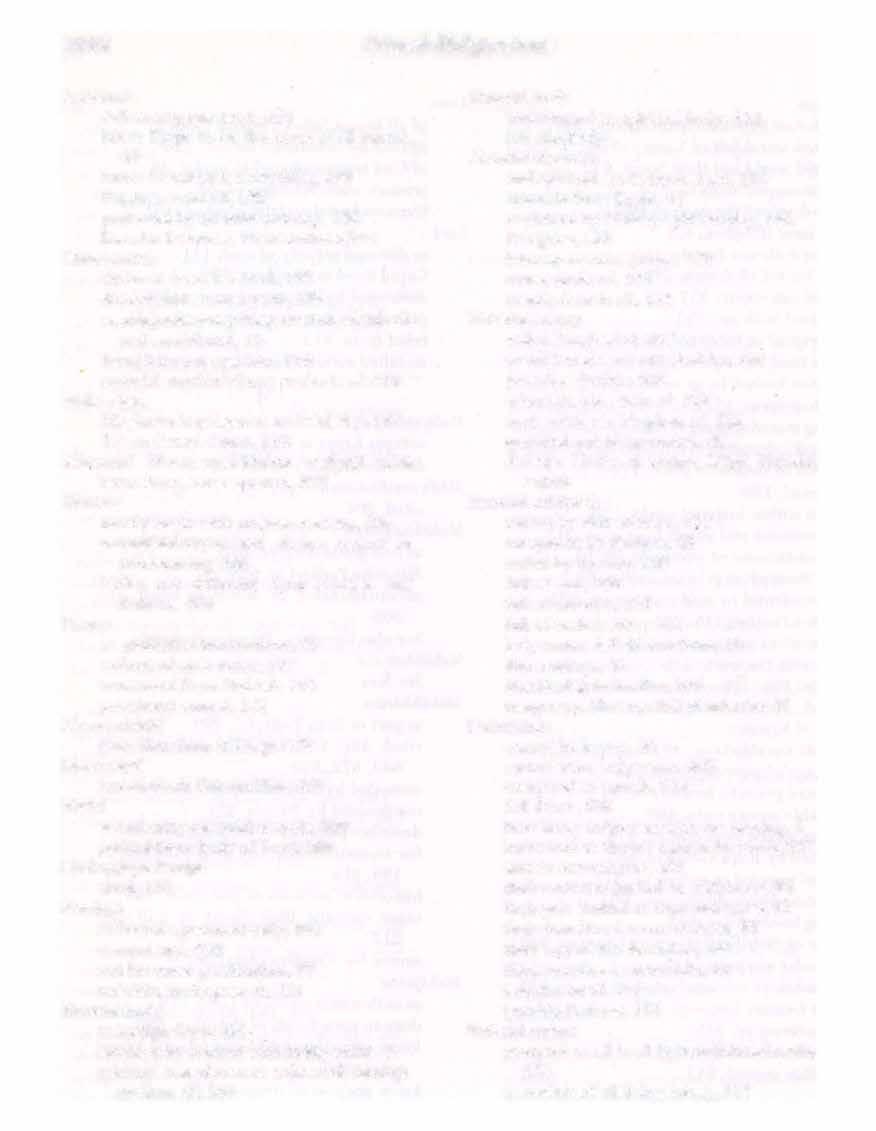
Mantras
mostly begin with praf1ava omkiira, 204 parivni.jakiiciiryas not always expert in pronouncing, 204 Vedic not different from Puni.f1as and Itahiisa, 204
Manus
as qualitative incarnations, 75 authors of civic codes, 357 incarnated from Brahma, 142 prominent named, 143
Manu-samhitii gives directions to kings, 473
Manu-smrti recommends fire sacrifice, 859
Marici
as authority on fruitive work, 308 created from body of Lord, 306
MarkaflfleyaPuriif1a
cited, 153
Marriage
as formal agreement only, 861 compulsory, 920 not for sense gratification, 97 samskiira undergone at, 215
Material body as foreign dress, 494 develops by contact with living entity, 6 spiritual consciousness expressed through medium of, 284
Material body transformed to spiritual body, 314
SeealsoBody
Material elements and spiritual spark create knot, 104 emanate from K{�qa, 47 explained by Sarikhya philosophy, 148 five gross, 136 have no creative power, 138 senses made of, 276 twenty-four in all, 148
Material energy called Durga-sakti, 502 conditioned souls attacked by, 346 provokes doubts, 903 scientists, etc., dolls of, 233 souls rotting in kingdom of, 266 sprouted out of ignorance, 25 Seealso Modes of nature, Miiyii, Material nature
Material existence caused by skin relation, 427 conquered by Puni.f1as, 88 ended by hearing, 105 full of fear, 558 full of miseries, 267 full of undesirables, 741 holy names deliver one from, 10 like a mirage, 46 like blazing forest fire, 344 temporary, illusory, full of miseries, 91 Materialists cannot be happy, 86 cannot utter holy name, 403 compared to camels, 86-87 fall down, 308 have many subject matters for hearing, 4 make foolish threats against devotees, 627 sure to commit sins, 435 their activities limited to selfishness, 94 their gain limited to time and space, 95 their own blood sweet to them, 87 their way of life described, 5-8 think creation is automatic, 48 two classes of, 179 worship Brahma, 117
Material nature
accepted as all in all by conditioned souls, 250
as mother of all living beings, 517
1092 Srimad-Bhagavatam
\laterial nature
as ocean tossing with waves of time, 7 baffles happiness, 86 doesn'tallowusindependence, 419 has enough foodstuff foreveryone, 517 its insurmountable intricacies, 73 living beings placed under guidance of, 534
no one survives struggle with, 7 whimsically exploited, 423
See also Material world, Miiyii, Modes of nature, Threefold miseries
Materialworld
as bodyofabsolutewhole, 48 as darkest region of creation, 86 as great illusion, 697 as interaction oftwoenergies, 47 as part ofwhole creation, 238 as prisonhouse, 116, 859 as shadowy reflection of reality, 1002 as world of death, 6 as world of duality, 383 can be turned into spiritual abode, 256 compared withforest fire, 513 connected to Kr�IJa superficially, 178 created at certainintervals, 136 created bythree modes of nature, 44 created to satisfy whims of nitya-baddha, 540
dependence sign ofmisfortune in, 419
Dhrtara��ra closed all accounts in, 709 earth a fragment of, 238 existsonly as a dream, 7 falsity and mis�ryof, 694 freedom from inhabiting, 300 fullof anxieties, 357 full of calamities, 401 fullof dangerin everystep, 852 full ofhungry livingbeings, 614 is fearfulness, 649 its forms notsatisfying, 294
Kr�IJa descends on, 259
Kr�IJa left viriiJa-riipa in, 738 like mirage, 44 likened to cinema, 74 living entitiesstrewnwithin, 128 manifestation of ingredients for, 135 Narada ignored formalities of, 302 no one independent in, 47 notliving beings'home, 472
Materialworld
so-ca!Jedhappinessand distress in, 7l7 toreclaim Living beings, 178
See also Material nature, Modesof nature, Threefold miseries
Matsya
advented during reign of Vaivasvata Manu, 632 as lila incarnation, 142 exhibited Kr�f.la'sknowledge, 168

Matsya Puni!Ul
asoldestPurii!Ul, 50 referstoBhagavatam, 50 Matter
adulteratessoul's activity, 111 as effect ofParamatma, 129 cannot create, 415 conditionedsouJ absorbed in, 195 impuresensesincollaborationwith, 480 inserviceofspirit, 269 isstatic, 77 liberated soulindifferentto, 195 reduced tooblivionbytime, 208 satisfaction ofheartbeyond, 216 transformed from one form to another, 714
Miiyii as checkingcurtain, 392 as deputedagent of Kr�IJ.a, 716, 903 asrelations of body and mind, 427 as sense gratification, 311 as thinking oneself thecreator, 47 both delusion and mercy, 429 compared to darkness, 345 deludingattraction of, 904 false representationscreatedlby, 378 happiness is her illusion, 316 her illusion dissipated by devotional service, 255 internal potency also ca!Jed, 321 literatures under influence of, 238 opposite of Kr�Q.a, 564 souls saved from clutches of, 324 tried toallure Haridisa Thakur, 313 Seealso Materialnature,Materialworld Mayavadaphilosophy advocatestheoryofillusion, 26 as clouded Buddhism, 27 imaginary explanation of VedlJ$, 27 is mundane, 77
General Index 1093
Mayavada philosophy

represented by Sankara sampradiiya, 26 Mayavadis
cannot utter holy name, 34 converted to bhakti cult, 36 designate themselves as NiiriiyaJ,la, 34 say Bhiigavatam written by Vopadeva, 50
See also Impersonalists
Men
addicted to fruitive work, 279 advanced in knowledge, 278 all are not equal, 88 all conducted by different modes, 88 as branches of tree of Vi�r;�u, 60 compared to butter, women to fire, 528 four classes of bad described, 279 four classes of good described, 278 good acknowledge God's authority, 278 have consciousness higher than animals, 45 in Kali-yuga, 66 in need of money, 278 inquisitive, 278 See also Human beings
Mendicant lives by gifts of nature, 291 must experience God's creation, 290
Mental speculation better than fruitive work, 179 hovering in mental spheres, 94 to understand Absolute, 179 unattractive without glorification of Kr�r;�a, 230
Mercy as miiyii, 429 as primary regulative observance. 906 bestowed by Caitanya, 417 death of Niirada's mother as, 287 devotee's more valuable than Kr�r;�a's, 776 full recipients of Kr�r;�a's, 408
Kr�r;�a descends out of, 395
Kr�'>a knowabl� by His, 395
Kr�r;�a's pastimes are His, 259 Kr�r;�a's relative to recipient, 408 love of God dependent on Kr�r;�a's, 325 maximum display of human, 924 natural-gifts dependent on K{��;ta's, 423 of Deilies in temple, 618 of great souls, 270 of K{�Qa equally distributed, 381,406 of Sukadeva Gosvami, 86
Mercy
one can hear Kr�IJa by His, 296 Par;�(lavas dependent on Kr�r;�a's, 419 prosperity depends on Kr�r;�a's, 739 spiritual master represents Kr�r;�a's, 344 spoiled by intoxication, 907
Military science
ArJuna expert in, 349 gross dependence on material weapons, 364 in Dhanur-veda, 364 taught by Dror;�acarya, 364
Milk Mind
as cause and cure of disease, 268-269 cow gives less in Kali-yuga, 208 great !§is live on only, 881 miraculous form of food, 379,840 required for sacrificial fire, 882 spoiled by serpent, 101,184 sufficient in Parik�it's kingdom, 202 activities of cannot be stopped, 822 agitated by mundane topics, 239 as basis of gross body, 130 as superfluous outercovering, 95 compared to a boat, 239 disease of cured, 108,905 face is index of, 857 Kr�r;�a beyond expression of, 178-179 Kr�r;�a's appearance within, 805 material color of changed, 822 not satisfied by material forms, 294 of pantheist diverted, 240 should be engaged in hearing, 261 spirit soul beyond its jurisdiction, 187 strengthened by travelling.alone, 290 worship of form within, 398
Miseries
alleviated by remembering Kr�Qa, 333 can be ended in human life, 67 devotee immune to, 181 due to bodily pains, celestial influences, earthly reactions, 740 everyone in flames of material, 247,343 material existence full of, 267 mitigated by devotional service, 267, 278, 324,325 obtained automatically, 246 offered by eternal lime, 407 relief from, 169
1094
S!imad-Bhagavatam
Miseries
superfluous to living entities, 324
�1odern civilization
as child's play only, 798 as decoration on a dead body, 798 as dungeon of demons, 567 based on sense gratification, 97 completely bewildered, 97 creates poverty and scarcity, 905 dependent on hearing and glorifying, 103 detached from Lord, 60 eating vital part of human energy, 238 like detached hand or leg, 250 not interested in religion, 52 sex Life focal point of, 50
See also Human civilization, Civilization
Modes of nature
balanced mode is goodness, 298 cannot affect Kr9va, 127 force one to fall down, 308
Kr9va aloof from, 404
Kr9va's pastimes transcendental to, 105 living being transcendental to, 321 Lord indirectly associated with, 116 produce material assets, 405
See also Material nature, Threefold mrseries, Material energy

�1ohini
incarnation exhibited l<r9va's beauty, 168 Siva mad after, 600 Monarchy
as superi6r form of government, 509 monarchs were not cowards, 489
Yudhi9thira an ideal monarch, 509
See also King Monist
has no access to Bhiigavata-dharm.a, 219 Kr9va master of, 404
merges with brahmajyoti, 406 not a paramaharhsa, 219
Sukadeva Gosvami as, 194 unscrupulous imagination of, 323 Moon
as heavenly planet, 784
devotee does not care for, 991 inhabitants drink soma-rasa, 246 Kr9va compared to, 321 Kr�va is light of, 737 Mother
Kr�va afraid of His, 410-411
Mother Kr�va's, 561 must protect child, 384 arada bound to his, 285 seven kinds listed, 587
Mukti See Liberation
Mukunda association of, 615 personal and impersonal conception of, 250 senses engaged in His service, 312 Yudhi9thira fixed in service o(682
See also Kr9va
Mystic powers
as weeds to devotional creeper, 39 devotee endowed with, 277 for sense satisfaction, 331 Kr�va's enchant conditioned souls, 429 Yoge8vara master of, 388, 603
Nagaras ca vanarh ca vii nadis ca vimalodaka� verses quoted, 850 Naimi�rar)ya as hub of universal wheel, 59-60 as meeting place of great sages, 59 Bhiigqvatam spoken at, 59 briihmaflaS prefer it, 60 thousand-year sacrifice at, 59 Yamaraja invited to sacrifice at, 844
Nai_sharmyam apy ac_yuta-bhiivava_yitam quoted, 271
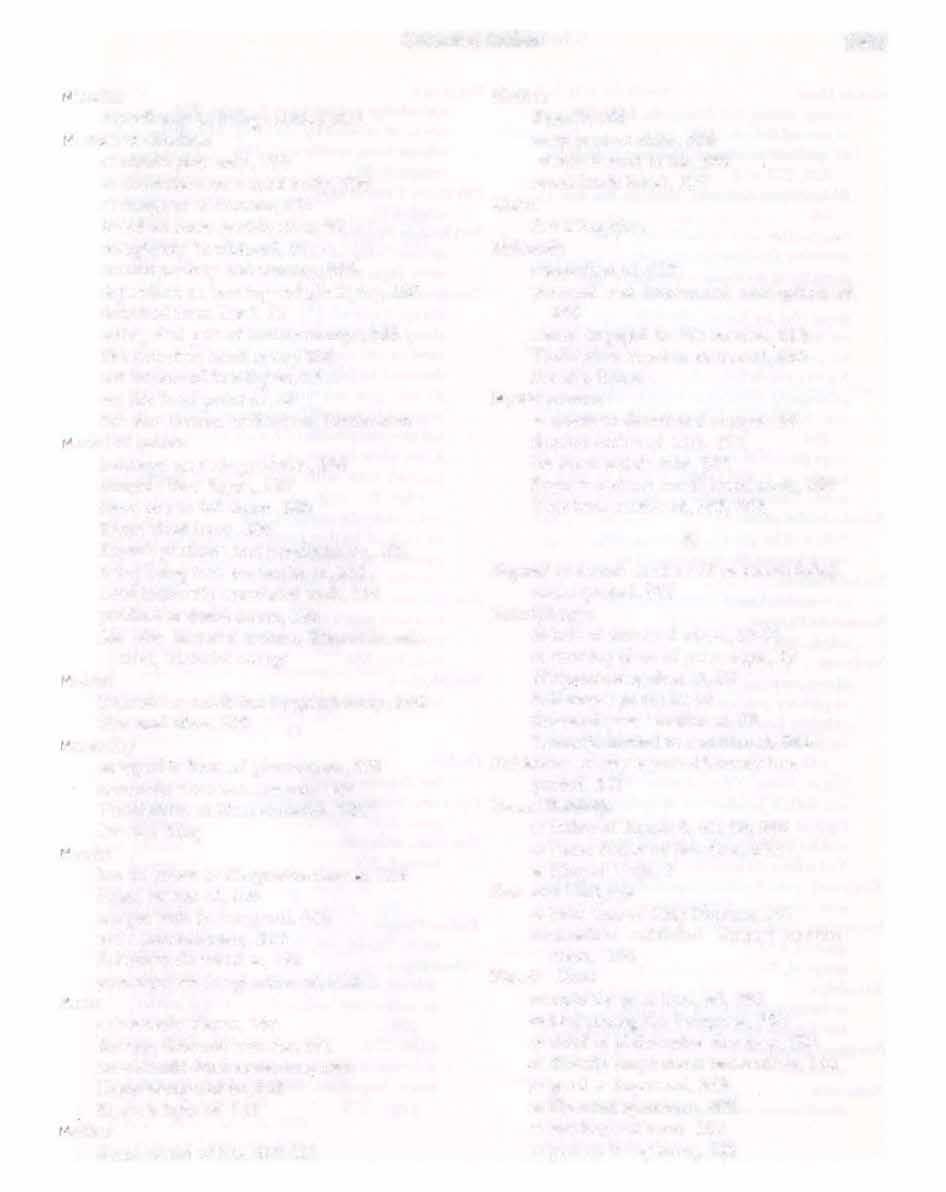
Nanda Maharaja
as father of Kr9va, 8, 41, 78, 395 as foster father of Baladeva, 572 as King of Vraja, 8
Nara and Narayava
as twin sons of King Dharma, 147 incarnation exhibited Kr9va's renunciation, 168
Narada Muni accepts Kr9va as God, 44, 393 as best among the Vai�vavas, 238 as chief of philosopher devotees, 708 as directly empowered incarnation, 144 as good as Supersoul, 228 as liberated spaceman, 308 as maidservant's son, 109 as perfect living being, 228
General Index 1095
N
arada Muni
as sage among the demigods, 146, 223 as second iiciirya, 220 as spiritual master of Vyasadeva, 45, 146, 220, 223-279
Bhiigavatam delivered through his mercy, 54 comparable with himself only, 444 describes God's creations, 74 everything mysterious known to him, 227 following in his footsteps, 266 given virui by Kr�l)a, 308-309 his life after initiation, 283-316 his previous life, 255-264
Kuvera's sons fell in his wrath, 813 propagates devotional service, 146 saw himself and Kr�l)a simultaneously, 294
sings glories of Lord, 74 taught by Brahma, 220 wrote Niirada-paiicariitra, 146
Niirada-bhahti-siitra
followed by great authorities, 308 trains karmis for liberation, 146
Narasimhadeva
as transcendental incarnation, 75
Narasimha Purii(la cited, 308
Narayar;ta
above material creation, 10, 87
as plenary portion of Kr�r;ta, liS exhibits four arms, 370
incarnation worshiped at Badarinarayar;ta, 148
lies on water of devastation, 305 not within jurisdiction of mahat-tattva, 10 Pari�it compared to, 641 resides in Vaikur;ttha planets, 370
Vyasadeva incarnation of, 54
Niiriiya[lll� paro'vyaktiit a[l$la-{lvyakta sambhavam, �erses quoted, 460

Narottama Dasa Thakur
quoted, 693
songs of, 531
Navadvipa
as birthplace of Lord Caitanya, 7 surcharged with sankirtana movement, 14
Nectar ofDevotion
cited, 39
Nescience
conditioned soul covered by, 322
Nescience knowledge not used for Kr��Ja is, 254 ocean of crossed by chanting, 311, 401 release from clutches of, 344 removed, 261
Niti-siistra (civic laws) cited, 677

Nityananda Prabhu as chief whip of Caitanya, 14 saves Jagai and Madhai, 15-16
Nondevotees always harmful, Ill always in ignorance, l79 careless and unintelligent, 937 deceived by jugglery of Kr�•Ja, 179 do not gain anything, 245 engaged in material wranglings, 398 fall prey to actions of Kali, 937 Kr�r:ta silent in case of, 482 mislead men with poor fund of knowledge, 8 not in sound condition, 706 on path of further entanglement, 577 opposed to devotional service, 17 See also Asuras, Atheists
Nonviolence common man's conception of, 432 means not to be envious, 955 so-called, 356
Nrsimhadeva bifurcated Hirar;tyakasipu, 155 0
Omkiira
See Praf!ava [om}
Om namo bhagavate viisudeviiya quoted, I
Om namo dhimahi quoted, 274
Padma Purii[lll cited, 27, 44, 50, 815, 897, 944
Pancariitra acts on siidra class, 623 as authorized codes of devotional service, 276 cited, 274 devotional service established on, 101 more important than Vediinta in Kaliyuga, 276
1096
Srimad-Bhagavatam
p
Paiicariitra
recommended for this age, 623 Piitu;lavas
all mahiitmiis, 420 as eternal companions of Kr�l)a, 376,494 as order carriers of Krl)Qa, 436 attained Krl)Qaloka in selfsame body, 829 cent percent dependent on Krl)Qa, 382, 387, 390, 419 entrusted to Krpiiciirya, 623 ideal family of devotees, 385 intimately associated with Kr!lt)a, 523 Krl)Qa's dealings with, 418 malleable to will of Krl)Qa, 854 not idle, 420 on same plane as Kr!ll)a, 336 their existence due to Sri K{�l)3 only, 421
Paramahariuas
as first-grade devotees, 44, 696
Bhiigavatam especially meant for, 328 in highest stage of sannyiisa, 151 in water of spiritual bliss, 557 literature enjoyed by them, 233 meditate on Sri Kr!lt)a, 44 monist not counted amongst, 219 perfectly nonenvious, 87, 955
See also Devotees, Transcendentalists
Paramiitmii
above impersonal feature, 53 as eternal time, 406 as guide and witness, 128 as K�1rodakasiiyi Vi�1_1u, 116 as localized aspect of Brahman, 24 as more confidential knowledge, 265 as partial manifestation of Kr!lpa's opulences, 136
as partial realization of Vasudeva, 124 destines all actions and reactions, 406 directs all psychological activities, 788 Govinda distributes Himself as, 618 has no locus standi without Krsna, 774 included within Krlll)a, 345 is Kr!lt)a, 107
living being has no status quo without, 774
our constant companion, 406 realized by yogis, 98 resides within atoms, 388 witnesses all actions, 406
See also Supersoul
Param dr§tvii nivartate quoted, 932

Paramparii
as bona fide reception of knowledge, 185 as deductive knowledge, 114 transcendental sound through, 277 See also Disciplic succession
Pariisara as father of Vyiisadeva, 157, 765 as the author of Dharma-siistras, 473 learned Vedas in womb of mother, 997 Parik�it Maharaja almost as good as Sr1 Kr�l)a, 643 as celebrated friendly servitor of K[�l)a, 896 as emperor of the world, 200, 851 as "examiner", 651 as heir apparent of Pap!lu, 620 as King of Bharatavar�a, 328 as saint amongst royalty, 978 born to be hero of Bhiigavatam, 621 chastised personality of Kali, 328 compared to Ik�viiku and Riima, 631 first victim of brahminical injustice, 965 garlanded r§i with snake, 960-963 got seven day notice of his death, 185, 990 heard Bhiigavatam from Sukadeva Gosvam'i, 57 his birth and activities wonderful, 199 his birth as subject of Chapter 12, 607-660 his capital Hastinapura, 993 his devotional service of remembrance, 652 his enemies bowed to him, 201 increased prestige of Pap!lu dynasty, 200 inherited kingdom from Yudhi�thira, 200 kind to poor, 911 meant to subdue mischiefmongers, 917 nothing undesirable in his life, 201 performed sankirtana-yajiia, 924 powerful like a tiger, 937 protected by Vi�pu, 609
Parivriijakiiciirya
as itinerant preachers, 204, as stage of sannyiisa, 151 may hear and chant scriptures, 290 not always expert in mantras, 204 travels alone through God's creation, 290
Passion better than ignorance, 118 Brahma deity of, 116 children begotten in, 214 civilized life of man in, 118
General Index 1097
Passion destroyed by devotional service, no in art, culture, morals, ethics, 118 lust, desire, hankerings in, 112 Pastimes of Kr_r_1a above all material conception, 945 apparently contradictory, 409 appear human, 407 as exchange of transcendental pleasures, 591 attractive and confidential, 57-58, 260, 538 can only be described by devotees, 239, 406 deathless nectar in form of, 845 displayed in all variegatedness, 331 have no material contamination, 408 heard at Naimi�ara!lya, 79-80 identical with Kj"�r_1a, 3, 261 in a routine spool, 738 in childhood most attractive, 396 manifested in day of Brahmaji, 115 manifest in every species, 131 misexplained byimpersonalists, 193 move like clock hand, 494 narrated in Bhiigavatam, 58 not newly accepted, 115 remembering is benedictory, 104, 302 Sukadeva Go vam'i attracted by, 332 supplemented by Yadus, 811 arada instructs Vyasa to de crihe, 252 performed by internal power , 75 sanctify Vrajabhumi, 396 to attract people in general, 411 Vyasadevacould think of, 237 with gopis, 168
Peace by advancement of brahminical culture, 988 by broadcasting Bhiigavatam, 234 by cooperation between man and God, 520 by curbing miscreants, 893 by devotional service, 251, 268 by glorifying the Lord, 73 by hearing Bhiigavatam, 327 by knowing Kr�f.la, 628 by protection of women, 379 by revival of relation with KHI)a, 525 by sacrifice to Vi�!JU, 60 by spreading brahminical culture, 856 by subduing upstarts, 646 cow emblem of, 646 destroyed if Kr�f.la ceased to work, 737 due to good population, 622
Peace due to good will of the Lord 267,800 foolish leaders fail to bring 73 impossible for godlesssociety, 31 k�atriyas expert in material, 927 not brought by l.iterary men, 238 of citizens depends on king, 609 sages anxious for, 60 sought by various illusory methods, 9 through sahkirtana, 33 when Kr�r_1a was on earth, 732
Perfection
by bhakti-yoga, 479 by dying like Bhi�ma, 501 by moment's association with pure devotee, 697 not attained by fruitive work, 237 of human civilization, 566 of irrevocable devotional service, Il l of life by hearing, 260 of life by renunciation, 242 of life is God realization, ll2, 253 sign of in devotional service, 249 when one is satisfied at heart, 216 Philanthropy for the le fortunate, 77 tint of sense gratification, 97 Philosophy as duty of mental speculator, 94 as seekingafter knowledge of one's self, 649 in service of Kr�r.1a, 254 should establish God as sentient, 254 to satisfy Lord's senses, 229 without self-realization dry speculation, 649 Pittloka
obtained by charitable work, 246 Yamaraja in charge of , 830


Planets
conditions on each different, 159 created fully equipped, 862 histories of, 183 innumerable in each universe, 131 in universal form, 171 in Vaikur;1tha self-illuminated, 307 no forceful entry into higher, 613 none without living beings, 352 reached by mechanical arrangements, 246 seven downward systems, 138 situated on body of puru�a, 139 three divisions named, 307


1098 Srimad-Bhagavatam
Planets
Vedic literatures on higher, 631 Yudhi�thira's fame known on higher, 613
Pleasure
everyone searching after, 329 from glorification of Kr�r_1a, 316 none for transcendentalists in mundane literature, 232 of fruitive workers gross, 232
Poetry
as duty of mental speculator, 94 Kr§r).a defined in, 253 of Bhiigavatam, 334 under influence of miiyii, 238 used to glorify Kr§r;ta, 254
Politicians
as dolls of material energy, 233 busy with questions and answers, 89 don't retire from active life, 691, 820 fight for sense gratification, 97 in illusion and fearfulness, 327 masses tools in their hands, 235 modern go by personal belief, 890 should take lessons from Yudhi§thira, 817 undergo severe austerities, 125 See also, Government, Administrators
Population hell due to unwanted, 622 in Kali-yuga of sii.dra quality, 622 peace due to good, 622
Pradyumna
as expansion on right of Sarlkar§at�a, ll5, 274
as great general of Vr§r:ti family, 751 as incarnation of Kamadeva, 573
Prahlada Maharaja afraid of materialistic life, 1009 brief history of, 789 cited, 652

disciple of Narada, 298 instructed by Dattlitreya, 149
Parik§it staunch devotee like, 645 perfect devotee of Kr§r;ta, 646 tested by Kr§r;ta, 360
Praf!ava (om)
as primeval hymn, 26 as basis of aU Vedic hymns, 26 identical with form of Lord, 26
Pride
as principle of irreligiosity, 919
Pride spoils austerity, 907
Proprietor
of all universes is Kr�r;ta, 181 in every sphere of life is Kr�r;ta, 272 Kr�r}a is supreme, 263
Prosperity
as disqualification for spiritual life, 403 depends on protection of cows and briihmaf!as, 396 flourishes by natural gifts, 423 follows spiritual well-being, 65 good wife, good home, etc., 402, 739 is intoxicating, 402-403 material fever of, 287 welfare work for material, 435
Prostitution as principle of irreligiosity, 919 encouraged by divorce act, 920 encouraged by gold, 921 Kali resides in places of, 919 prostitutes are uecessary citizens, 576 prostitutes as sincere devotees, 575
Protection done by Vi�r).u, 627 given to cows by men, 887 given to cows, women, etc., 379 given to surrendered soul, 918 king duty-bound to give, 6ll not for everyone in general, 866 Piil)�avas dependent on Kr�IJa's, 382, 387
Prthu
as directly empowered incarnation, 144 excavated produces from earth, 153 incarnation with executive function, 75, 165
Punishment life for a life isjust, 356 to reclaim conditioned souls, 323
Puriif!aS
as histories of millions of planets, 183 as part of fifth Veda, 24, 63, 209 as source for Vai�r_1ava literatures, 9 cited, 54 compiled by Vyasadeva, 45 conquer material existence, 88 entrusted to Romahar�ar_1a, 2ll for different types of men, 88 made easy for women, etc., 24 mention Hare. KniJa mantra, 10
General Index 1099
misunderstood as imaginary stor_ies, 578 purpose same as Vedas, 23 recommend demigod worship, 240 Siita Gosvami well-versed in, 62
See also Sastras, Vedas, $rimadRhagavatam, Vediinta-siitra
Pure devotees
acceptfrustrationas blessingof Kri}J.la, 961 act like Brahman, 824 always in spiritual sky, 726 always sound in body and mind, 468 cannot forget Krll'.la for a moment, 493 cleared of all sin, 258 commit no offense while chanting, 951 cut off family ties, 425 emblems of holy men, 697 faithful, learned, renounced, 708 feel no contact with material elements, 726
forget position of Krllf.la, 411 from crude men, 85have no desire for personal profit, 180 highest ambition of, 467 honored equally with Lord, 72 known as vice-lords, 72 material blessings automatically follow, 614
material pleasures like phantasmagoria to, 942
more liberal than Lord, 33 more.powerful than Ganges, 72 necessity of, 273 never ask undue favor of K[l}f}a, 424, 609 never fall down, 308 never offend another pure devotee, 33 nothing hut spiritual existence for, 618 qualifications described, 273 rectify polluted atmosphere, 675 shelter of their lotus feet, 72 tested by Krllf.la, 360 their assets not material, 942 their associationremovesallobstacles,258 their death described, 304 unattracted to materialactivities, 258 See also Devotees, Transcendentalists
Purification
as attainment of spiritual knowledge, 271 by prescribed Vedic activities, 218 of sound, 342
Questions about K[l}l}a original and perfect, 3 birds, beasts, men busy with, S9 of briihmaras please Siita Gosvami, 83 should not he challenging, 61 Siita Gosvam'i able to answer all, 204 that pertain to K[l}f}a, 89 to elicit clear meaning, 61 worthy in relation to Kr§J.la, 89 R
R.adhararl attracted by K[l}f}a, 868
Her feelings of separation beyond expression, 522-523 supermost beautiful creation, 868
Rajas See Passion
Ramacandra accepted spiritual master, 252 appeared in Treta-yuga, 632 controlled Indian Ocean, 158 cut tie of affection for wife, 425 exhibited Kf§t)3's fame, 168 exiled in forest, 633 killed Ravapa, 158 Krll'.la more merciful than, 396 Parikl}it compared to, 631 remained a king's son, 396 transcendental incarnation, 75, 142
Riimiiya[IU
as history of Lord Rama, 76, 159, 633 as part of Vedas, 63 cited, 364 source for Vail}pava literatures, 9 Rasa dance
misunderstood by foolish, 58 relished by liberated persons, 46 site of seen by Caitanya, 38 with spiritual cowherd damsels, 964
Riisa-lilii
See Rasa dance
Rasas (mellow relationships)
basic principles of all activities, 57 between Krll'.la and His servitor, 492 between members of same species, 56 different -transcendental variegatedness, 275

llOO §rimad-Bhigavatam
Q
God is reservoir of aU, 56 Kr�(la's form comprehends all, 332 of the material world, 57 one expert in relishing, 943 sensual pleasures, 56 sum total called love, 56 twelve varieties named, 56 Raval)a
built staircase to heaven, 159 flouted authority of Lord, 49 given lessons by Hanuman, 14 kidnapped Slta, 159 killed by Lord Rama, 71, 158 underwent bodily torture, 125
Religion
as extra function of human, 52 as real means to know God, 187 as rendering service to Kr�(la, 124 battles fought on principles of, 356 codes of enacted by Kr�r:Ja, 119,186,416 cow emblem of, 646 demigod worship a perversity of, 123 enjoyment in name of, 241 for matetial profit, 96 four primary subjects of, 52 four principles of, 906 inferior to devotional service, 231 manufactured, 67 path of seen through Mahiibharata, 217 prescribed codes of God, 81 principles of are not dogmas, 913 principles of spotlessly white, 880 purpose of k!1own by mahiijanas, 119 reestablished by Kr�(la, 416 to abide by the orders of Kr�(la, 378 truthfulness basic principle of, 923 sin in name of , 67 women more interested in, 395
Remembrance
as principle of devotional service, 416-417 comes from Kr�r:Ja, 174 cuts knots of karma, 104 devotee attains trance by, 493 Narada\ will continue always, 300 of Bhagavan, 103 of K�Qa alleviates miseries, 333 of Kr�Qa in distress, 333 of Naraya(la at death, 10,185, 478-479 of pastimes brings liberation, 104 of taste of lotus feet, 248
Remembrance
Parik�it performed devotional service of, 652
Renunciation
as detachment from material affection, 502 obstruction on path of, 91 perfect dependence on God is real, 955 perfection of life by, 242
Romahar�a(la entrusted with Purii[!as, 211 father of Suta Gosvami, 83 Rudra See Siva Rukmil)i attracted by hearing of Kr�r:Ja, 332 daughter of king of Vidarbha, 547 principal queen at Dvitraka, 573
Rupa Gosvami divided his wealth, 38 gave up worldly pomp, 404 his song quoted, 585 instructed by Caitanya, 38-39 wrote Bhakti-rasamrta-sindhu, 39
Sabda-ko5a Dictionary

cited, 331 Sacrifice
s acts performed to satisfy God, 914 by hearing, 79 corollary to bhakti, 93 counteracts accumulated sins, 859 devotee's life a symbol of, 859 fire the soul of Vedic, 118 for Kali-yuga is sankirtana-yajrw, 914 for supreme cause is superior, 91 householder happy by, 882 means to accept supremacy of God, 914 people's occupations purified by, 209 rain made to shower properly by, 859 scriptures sanction restricted animal, 357 success depends on priest in charge, 655 to please Kr�(la, 124, 657 See also Sankirtana-yajiia
Saints
broadcast holy·name, 235 compared to swans, 232 given milk freely by householders, 882 importance of association with, 697
General Index HOI
Saints meant to awaken blind persons, 690 pure devotee emblem of, 697 spiritual master in shape of, 323 Salvation by chanting holy names, 936 by conquering lust, anger, etc., 474 desire for, results from sense gratification, 52 for those who died at Kuruk�etra, 408 inferior to devotional service, 231 progressive path of, 255
Samiidhi
absorption in pleasing Hari, l01, 725 by remembering Kr�va, 493
Saniitana Gosviimi
his Hari-bhakti-viltisa cited, 829 Vai�vava scholar, 9
Sankariiciirya
admits Niiriiyava above material creation, 87, 393 cited, 603 didn't touch Srimad-Bhiigavatam, 87 his commentation spoils everything, 36 his followers ignorant of Vai$1).ava knowledge, 22 his followers known as Vediintists, 21-22 ordered to teach by God, 27 paved path of theism, 163 quoted, 460 recommended shelter of lotus feet of Kr$va, 185 wrote Siiriraka-bh�ya, 87
Saitkar.sapa
planet of, lOll
plenary portion of Baladeva, llS, 160, 274, 572

Siinkhya philosophy called metaphysics, 148 explains twenty-four elements, 148
Kapila author of, 897
Sahkirtana-yajiia
even for wild animals, 33 leaders should take advantage of, 33 performed by Parik$it, 924 recommended for all practical purposes, 14
sacrifice for Kali-yuga, 656, 914 sureand recognized path, 659
Sannyiisa
forbidden for ordinary men, 290 four stages named, 151 mustbeaccepted from another sannyiisi, 18 taken by Sukadeva Gosviimi, 84
Sannyiisi
Caitanya did not accept name of, 290 considered a dead man civilly, 699 duty-bound to take risks, 290 held in high estimation, 17,319 master of all varrws and iisramas, 18 so-called, 67 two types of, 699 Yudhi�\hira became, 820
Sarvam khalv idam brahma
quoted, 868
Siistras cited, 355, 359,403, 625 determine incarnations of God, 21 essence of assimilated by iiciirya, 363 give symptoms of incarnations, 37 many varieties of, 68 must be accepted in toto, 273 prescribe different methods, 68 prescribe duties of orders and castes, 979 recommend offenseless chanting of holy names, 10 sanction restricted animal sacrifice, 357 Sarvabhauma tests Caitanya's symptoms by, 20
spiritual master in shape of, 323 those who can see through eyes of, 208 Seealso B"hagavad-gltii, Srimad-Bhiigavatam, Upaniplds, Vedas
Sati rite became obnoxious criminal affair, 728 most perfect action for a woman, 728 voluntary death of widow, 364
Satisfaction
beginning of transcendental bliss, 231 by chanting glories of Lord, 311 from devotionai service, 312 from questions about Kr�J.la, 90 of heart beyond matter, 216 none from sensual activities, 311
Satyaki
Bhiirisrava killed ten sons of, 791 narrated activities of Samba, 573 sided with Yud�thira, 369
1102 Srimad-Bhigavatam
Satya-yuga
everyone in mode of goodness in, 213 four principles of religiosity in, 904 golden age, 79 hundred thousand year life span in, 79 Saunaka Muni
elderly leader of nis, 191 headed sages of Naimi�ra!lya, 59 his inquiries praised by Siita Gosvami, 181 son of B�gu, 615
Science
can't counteract threefold miseries, 740 ends with end of body, 596 to challenge the Lord, 159
Scientists
cannot conceive of highest planet, 991 cannot manufacture brain, 48 depend on imperfect senses, 393 modern demons, 776 not on level of Arjuna, 784 science of chanting hymns unknown to, 348
think ultimate source is sun, 48 try to avoid death, 844
Self-realization to see pure self and the Lord, 174 See also Yoga
Self-satisfaction resides in Kr�l)a, 865 transcendental to material existence, 110111
Self
as master, 113 beyond gross and subtle bodies, 94,174 body is superficial covering of, 174 enlivened by devotional service, 115 generates impetus for activities, 174 potent active principle, 94 satisfied by worthy questions, 89 scriptures meant to satisfy, 68 spiritual in constitution, 68
Selfishness
self-centered or self-extended, 94,203
Self-realization by hearing and chanting, 70,79,313,678 cause of cheerfulness, 224 indifference to needs of body, I 74
Kali-yuga men lazy in, 67 liberated soul alert in, 195 like eating food, 941 not hampered by any status of life, 31 obstructed by family affection, 693 per-fect under lotus feet of Kr�l)a, 174 purpose of human Life, 242, 329, 402, 405,472,717
realization of pure identity, 725
Sense gratification activities of ignorance, 31 as standard of civilization, 53, 67 compared tojaundice, 235 conditioned soul alert in, 195 demoniac principle of, 612 depends on economic development, 52 destined according to past or present life, 846 destroyed by devotional service, 93 dry speculative theories for, 254 enjoyed by dogs and hogs, 151 for those who are not self-controlled, 954955 increases duration of disease, 91 inferior to devotional service, 231 irresponsible life of, 257 literatures full of, 235 materially engrossed satisfied only by, 96, 614 material, mystic, liberation, 331 not ultimate goal of human l.ife, 846 only for bare necessities, 122 philosophical speculation as subtle, 955 saps human energy, 66 spiritual suicide for, 97 substitute for real happiness, 151 temporary and miserable, 253 un-der pretense of religiosity,_knowledge, etc. 187 various programs for, 246 worldly men engaged in, 328 Yudhi��hira free from, 611
Senses active parts of body, 537 amalgamated in the mind, 822 cannot be forcibly curbed, 955 cannot know transcendental identity, 35 controlled by better engagements, 537 control of is basis of morality, 470 created according to desire, 130 each searching for its food, 727

General Index 1103
Senses
ear most effective of,326
eleven,136
engaged in service of Mukunda,312
enlivened by J<r�r;ta,395
false pleasures of,754
Hr�ike5a proprietor of,239,399 imperfect,393 impure in collaboration with matter,480 J<r�r;ta not approached with material,172, 296,300
like venomous serpents,312 made of material elements, 276 not absolute by themselves,564 not for unrestricted enjoyment,97 of liberated person perfect,239 philosophy to satisfy the Lord's,229 rectified by devotional service,140,294 require certain satisfaction,97
restraint of by yoga system, 312
spiritual perceive presence of Lord,293
spiritual revived by chanting,276
useless without consciousness,421
Separation
feeling of leads to eight ecstasies,293 felt Like a thunderbolt,420 like fish from water,420
arada's feeling of mitigated,297
painful for devotee,297,805
Servants
demigods as,122
living beings constitutionally, 229,614 of God respected as God,106,255 of God risk everything,107 of senses like lust,anger,etc., 416,614
Service body meant for,433
direct is favorable,180
highest quality by briihma[tas, 624 indirect is unfavorable,180
material has satiation,299 of Krsno and Krsna identical,299 of L�rd and d���tees identical,225,426
427
perverted reflectionin material world,598 physically and mentally,270

spiritual has no satiation,299 to J<r�r;ta direcUy or indirectly,180 to perverted senses,524 total counted together,301 without reverential admiration,4ll
�niiga Sex
carried Baladeva from this world,573 directly empowered incarnation,144
Rhiigavatam not sex literature,54 Bhiigavatam recited to support,188 center of material enjoyment,416 householder life a license for,473 illicit spoils cleanliness,907 its reality in spiritual world,50 must be controlled,470 ordinary beings beget by,415 regulated for fruitive workers,5·6 Sukadevatranscendentalto,196 stricUy prohibitedfor transcendentalists,6 Visviimitra a victim of,537 whole creation moving under,50
Shelter of fearlessness is Kr�r)a,383
Parlk�it's body a shelter for others,202
Shyness
check to unrestricted mixing of man and woman,528

extra-natural beauty of fair sex, 527,528 powerful women controlled by,475
Silence
controls talkativeness,475 living being cannot maintain,311
Simultaneously one and different described in Bhagavatam, 53 Kpma and His energies,253 Sin Sltii
Lord and Living beings are,324,619,803, 804
the Lord and His devotees,306
cleared by hearing,260
counteracted by sacrifice,657,859 eradicated by devotional service,263 eradicated by sages' food,258
Kali great representative of,200 Kr�J;I3 protects surrendered soul from,918 materialist sure to commit,435 murderer purified of,357 of devotee burntin fire ofrepentance,986 product of desires,108
pure devotee cleared of all,258
rectified through external energy,620 unintentional committed daily,657
YudhiHhira laments for his,433
kidnapped by RavaJ.la,159,632
1104 Srimad-Bhigavatam
Sita
Siva mother of all opulence, 867
as qualitative form, 116 awards gifts to beggars, 641 born from Brahma, 142 compared to curd, 143 deity of ignorance, ll6 destroys material prison house, 117 devotee of Lord Caitanya, 12 drank an ocean of poison, 943 Durvasa Muni incarnation of, 781 fought with Arjuna, 638 his bow broken by Lord Rama, 632 his percentage of Kr�l)a's attributes, 168169
incarnation of Garhhodakasa:Yi Vi�r_Ju, 142 Jarasandha devotee of, 778 mad after Mohini incarnation, 600 marginal position of, 142 offended by Citraketu, 245 Parik�itmunificent like, 641 to appear as Sankaraciirya, 27 via medium between Lord and living entities, 953
victim of Kr�r;ta's wives, 599
worshiped by foolish, ll7
worshiped by passionate, 121
worshiped for good husbands, 12
Six Gosvaniis
chalked out ways for all classes, 105 cited, 305

cut off all family ties, 425 deputed to go to V�ndavana, 18 prefer Paricariitrika formulas, 623 richest of all, 603
Skanda Purtif1a
cited, 485
Slaughterhouses
ghastly places, 357 no necessity for, 423
none in Dvaraka, 567 not allowed by King Par1k�it, 203
See also Flesh eating, Cow killing
Sleep
Arjuna conqueror of, 529 conquered by spiritual culture, 474 diseased activity of soul, Ill gross body inactive during, 173 refused to be taken by Maharaja ParikJ!it, 200
Smrti stistras cited, 357
Society Soul
extended selfishness of, 94 in eight orders and statuses, 151 of foolish materialists, 244
above body and mind, 94 and matter create knot, 104 and Supersoul one and different, 113 beauty of, 528 beyond jurisdiction of mind, 187 body external dress of, 432 compared to sky, 172 desires complete freedom, 95 its diseased activities, Ill material forms false to, 494 never pierced, burnt, etc., 485 not seen by material senses, 172 satisfied by devotional service, 95 to soul relationship, 427 uncontaminated and indestructible, 485 See· also Living Beings
Spiritual master accepted by Lord Kr�r)a, Lord Rama, etc., 252 accepts only sincere inquirer, 85 approached with receptive ear, 130, 282 ardent hearing from, 610 Baladeva is original, 573 bona fide servant of Kr�l)a, 255 can elevate anyone, 118 entrusts specific service, 277 his direction purifying, 70 his wife considered mother, 587 his words penetrate the heart, 344 in shape of scriptures and saints, 323 instructs Vedas, 84-85 kindles spiritual fire, 129 knows art of glorification, 256 Kr�l)a is, 561 mercy representative of Kr�l)a, 344, 553 must be authorized by Kr�l)a, 1 026 must be satisfied, 64 must be worshiped, 217 not a decoration for householders, 1027 not for earning a livelihood, 719 obedience and submission to, 65 of all sages is Vyasadeva, 86 qualitatively one with Kr�l)a, 719 rejected if unworthy, 363
General Index nos
Spiritual Master
Supersoul becomes, 323
surrender to is freedom, 31 5
transparent via medium, 182, 255, 276, 315, 344
Seealso Devotees, Transcendentalists
Spiritual sky
Brahman spread all around in, 136 effulgence of Brahman, 757 enjoyment without inebriety in, 486 entered only by spiritual body, 314 everyone fully cognizant and blissful in, 36
no struggle for existence in, 801 pure devotee in, 726 nis cannot enter, 308
unlimited news from, 238
unlimited Vaikur.1tha planets, 307
Seealso Hari-dhama, Goloka-Vrndavana, Kingdom of God, Vaiku1_1tha
Srldhara Svaml
as original commentator on Bhiigavatam, 50, 74, 153
cited, 153, 233, 353, 370, 641,827, 850
Srik!§TJ.a govinda hare muriire, heniithaniiriiya[!aviisudeva
quoted, 870
Snmad-Bhagavatam
as powerful sun, 733 available for all sincere souls, 87 begins with surrender of devotee, 53 called $ulca-sarhhitii, 198 chosen by Caitanya at annaprasana ceremony, 11
cited, 27, 331, 416,460,646, 658, 705, 946,947,975
compiled by Vyasdeva, 45

confirms Brahma not independent, 5 cream of Vedic knowledge, 86, 183 described activities of Kr�1_13, 418 designates God as the paramsatyam, 5 essence of all histories, 184 ever-fresh, 77
foretold Lord Buddha, 163 from bogus h_ired reciter, 188 from lips of Sukadeva Gosvaml, 55 Gita preliminary study of, 187 history of Par;u;lava mahatmas, 420 hits on target of Absolute Truth, 5 its authority established, 50
Srimad-Bhiigavatam
KHTJ.a-kathii spoken about Kr�1.1a, 337 Kr�1_13's nature described in nine cantos, 78 literary incarnation of God, 182, 244 mature fruit of Vedic tree, 55 means of conquest, 88 meant to be heard from beginning, 54 narration of Lord's svariipa, 46 not an imaginary story, 198 Parlk�it born to be hero of, 621 penetrated through medium of Lord Caitanya's mercy, 6 postgraduate study, 329 purely transcendental urge of soul, 29 quoted, 462,995 quoted by Caitanya to Bhattacarya, 27 referred to in oldest Purii[!as, 50 science of Kr�1.1a, 7 spotless Purii[!a, 45, 336 summum bonum of life personified, 187, 323 to correct flaws of human society, 903 torch bearer for blind, 187, 891 transcendental torchlight, 87 twelve cantos, 18,000 slokas, 50 why it's called natural commentation, 64 written under order of Narada, 45 undertaken by greedy fellows, 649 SeealsoBhagavad-gita, Pura[!as, Vedantasiitra
$rutimantras anything sung in praise of Kr�1.1a, 531 cited, 57, 128, 211, 409, 533, 548, 589, 952 confirm Kr�1.1a all-perfect, 49 say birthless appears to take birth, 176 state Brahman the source of everything, 48 Students
as order of life, 102 busy with questions and answers, 89 opposed to devotional service, 17 Parlk�it ardent, 610 postgraduate in spiritual line, 112 seriously inquisitive, 100 Subhadra attained same results as Pa1_1«;lavas, 831 sister of Kr�l)3, 377 wife of Arjuna, 636, 637 $iidras
as dancers, singers, etc., 577
1106. Srimad-Bhigavatam
Siidras
as population in Kali-yuga, 16,622 cannot penetrate Vedas, 24 can practice ·devotional service,93 can take shelter of Lord,72 classified with women and dvija-bandhus, 158
Paiicariitrika system acts on, 623 should be maintained by higher castes,47l should never bank money,47l so-called briihm.attas counted amongst,659 unimportant elements in society, 497
Suffering by misuse of freedom,407 created by living being, 417 of a karmi and a devotee,248 root cause of pointed out,322 Sukadeva Gosvami
experienced by his knowledge,1017 had uncommon bodily features, 1018 heard Bhiigavatam from Vyasadeva,57 his bona fide representative, 58 liberated in womb of mother,57 makes Bhiigavatam more relishable, 55 spiritual master of all sages, 86 spoke Bhiigavatam to Maharaja Parik�it, 57 spoke Bhiigavatam to SiHa Gosvami,61 subsisted only on milk,881-882 transcendental to sex relations,195-196 was equibalanced monist,194 welcomed questions of Maharaja Parik�it, 2
Summum bonum
K[§l).a as one without a second,168 ultimate source of all energies, 5
Supersoul becomes spiritual master,323
Bhi�ma merged himself in,500 controller and savior from all miseries, 8 meditated on by Narada,292
Narada as good as, 228 pervades all things,129 protector of righteous,619 source of proton,neutron,etc.,129 stretches in all directions, 619 unlimited by time and space, 619 via medium of relation with,427
See also Paramatma
Supreme Lord cognizant of all minute details,47 dressed in the ten directions, 620 has inconceivable energies,45 is an individual,45 is omniscient, 50 is the total body,54 is unlimited,243 king is representative of,203 knows everything directly and indirectly, 5 nameless, inactive, formless to speculators, 179
no illusion for Him,50 reciprocates with devotees, 108 root of all categories, 53 to be obeyed in all respects, 49 ultimate sanction in His hands, 739
See also l<r§t;�a
Sun
Bhiigavatam compared to, 186,733
Brahma's power compared to,143
Kr§l).a compared to, 113, 261, 344-345, 413,463,564,805,810,866
Kr§l).a is light of,737
Kr�va luminous like,478
Kr�va's birth like appearance of,540
Narada's goodness compared to,228 not partial to anyone,408 perceived differently but is one,499
Supersoul absolute one without a second, 129 and soul one and different,ll3 awards all welfare to worshiper, 915
Surrender as principle of devotional service,416-417 as remedial measure,322 by influence of association, 322-323 difficult for impersonalists, 124 is not easy,904
to lotus feet of Lord,245
to spiritual master is freedom, 315
Siita Gosvami
congratufated by Saunaka Mun.i, 191 heard from Sukadeva Gosvanii,61 praised as free from all vice, 62 praises Saunaka's inquiries,181 questioned by sages,61 son of Romahar§3!Ja, 83
Svapiidamiilam bhajata/1 priyasya tyaktiinyabhiivasya harifi paresa/1 verses quoted,995

General Index ll07
Svetadvipa
abode of �rodakaSiyi Vi�qu,415 replica of Vaikupthaloka,563
Syamasi.mdara
See Kr�J;�a
Tamas See Ignorance
Tapasya
T
as voluntary acceptance of bodily pains, 125 only duty of human being, 147 sanctifies one's existence, 151
Taste of lotus feet remembered,248 of the Personality of Godhead, 261 transcendental destroys material, 258
Teachers
briihmaCtas should become, 364 may lecture from Vedas, 31 misguided, 67 rejected if unworthy, 363 should not drink or smoke, 470
TeachingsofLordCaitanyc: cited,9, 27,28,31,37
Temples established by iiciiryas, 398 for less intelligent,394 transcendental places,298
Threefold miseries continued by physical knowledge,125 described,53 freedom from,416 material science can't counteract,740 mitigated by spiritualized activities; 269 not desired for us by Kr�J;�a,271
pinch conditioned soul,717
See also Material nature, Modes of nature, Material world
Time
annihilates everything,283 cannot exert influence on Kr�J;�a,561 changes shape of everything,716 conquers the most powerful,862 controls action of air and other elements, 455
Kr�J;�a's is eternal,406
Kr�f.la not influence by,807
Nlirada's memory undisturbed by,283
Time no one should grudge being controlled by, 455 not to he wasted on flimsy things,247 offers happiness and miseries,407 reduces matter to oblivion,208 the subtle arrangement of,710 unmanifested forces of,208 unseen forces in course of,206 wasted by people in general,257
Tolerance
conquers avarice,474 resides in Kr�f.la,865
Transcendentalists first-class are devotees,100 know the Absolute Truth,98 non-envious,pure in heart,52 three clas8es of,694
worship Vi�pu,117
See also Aciiryas, Devotees,Atmliriimas, Mahatmas, Mahiibhiigavata, Paromahal'hsas

Tretii-yuga
silver age, 79 Sri Rama appeared in, 632 ten thousand year life span, 79
Truthfulness
basic principle of religion, 923 central point in pleasing God, 914 destroyed by gambling, 920 primary regulative observance, 906 resides in Kr�f.la, 865 spoiled by lying propaganda, 907 Vyasadeva situated in, 237
Tulasl
Kumliras attracted by flavor of,332 leaves mixed in Ganges,992 leaves used by Advaita to worship Kr�f.la, 15 u
Universes
all produced by Mahli-Vi�pu, 44, 137
arise from Kr�f.la,44 history of repeats itself,288 innumerable planets in each,131 Kf�I_la soul of,408,424 proprietor of is Kr�f.la,181 purified by Ganges,953
1108 �rimad-Bhipvatam
Upan4ads cited, 320
direct meanings summarized by Vyasadeva, 23 message of expressed in Vedanta-siltra, 36 source for Vai�p.ava literatures, 9 students of realize Brahman, 98
See also $astras, Vedas, Puraras, Vedantasiltra v
Vaikup.tha
devotees qualified to enter, 308
Narada can turn any place into, 298
Narayana resides in, 370 Svet�dJipa replica of , 563
unlimited planets in spiritual sky, 307
See also Spiritual sky
Vai�p.avas

always humble in their behavior, 467
Bhagavatam dear to, 651 by nature nonviolent, 14
fearless devotees of Lord, 14
iirada ��i best amongst, 238
never tolerate blasphemy, 14
transcendental to brahmaras, 112
See also Devotees, Trauscendentalists
Vaisyas
can practice devotional service, 93
degraded engaged in cow slaughter , 880 given cha rge of animal protection, 471
unimportant elements in society , 497

worship i�r. 1u , 121
iilmiki
author of Riimayara, 633
delineated Kr�r. 1 a ' s paslimes, 254 describes Kr�r:ra's creations, 74
Viimana
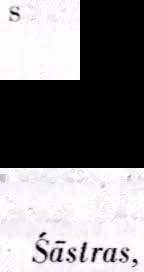
begged land from Bali Maharaja. 156
exhibill'd Kr�r:ra's beauty . 168
Hi history in Bhiigavatam, 645
transcendental incarnation, 75. 142
Vamana Purii!W
cited, 341
Varrasrama·dharma
based on ethics - 30
boys beconH' brahma diris under, 257
brohn by advancem�>nt of foolishncs ,870 described by Ramananda Riiya, 29 its four orders named_ 102

Varriisrama-dharma
itsinstitutionalfunction in human society, 102 natural for civilized life, 102 not necessary for Sukadeva Gosviimi, 85 prescribes many duties, 84 restricts association with women, 599 superficial only, 29 system impossible now, 68 turns crude man into pure devotee, 85 See also Caste system
Vasudeva as brother of Kunti, 571
as father of Kr�r:ra , 1 as son of King Surasena, 571
Vasudeva affinity for hearing His messages, 106 as all in all in everythin g, 420, 499 as full-fledged Absolute Truth, 100 as one who lives everywhere in full consciousness, 6
as plenary portion of Kr�r�a, 1 1 5 as son of asudeva and Devaki, 44 demigods Hi assi ling hands , 126 His name has powers of His Self, 7 l is Kmw, 160
Viisudeva{l sarvam iti quoted, 320 Viiyavlya ?"antra describes Lord Brahmii's creation of material universe, 59 Vediinta-siitm explained in text of $rimad-Bhiigavatam, 22
flowery interpretations of, 185 fools' ind ulgence in its study, 35 for spiritual graduates, 215 has no human deficiencies, 36
indirect interpretations condemned by Cailanya. 22 not monopoly tudy of Sarikara sampradiiya, 22
Pancariit.ra m ore important Lhan in Kaliyuga, 276 self-effulgent. sunlike , 23 studied by all bona fide sampradiiyas, 22 See also Vedas, iistras, Srimad-Bhrlgavalam
Vedas
also on higher planets, 631
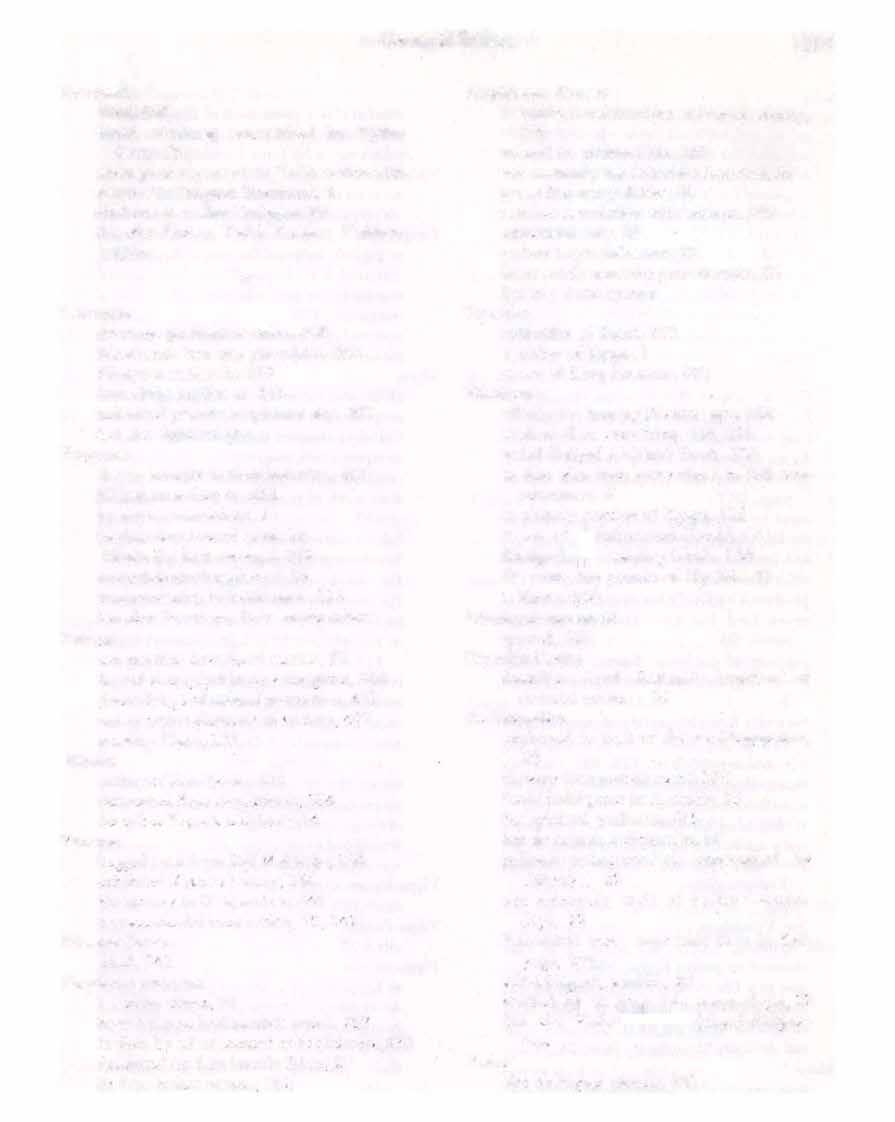
General Index 1109
Vedas

as desire tree, 56 as emanations from Kr�r;�a's breathing, 204 as guides for civilized man, 650 · as milk ocean of knowledge, 184 as source for Vai�r;�ava literatures, 9 authority unchallengeable, 23 cited, 14, 24, 52, 53, 296,391, 603,955 denied by Lord Buddha, 161 describe Brahma as supreme god, 5 directed at liberating spirit soul, 5 direct prescribed duties, 804 divided into four by Vyasadeva, 157, 209 efficacy of hymns of, 436-437 entrusted to different scholars, 211 fifth is Puriiras, Mahiibhtirata, etc., 209 for benefit of fallen souls, 252 four named, 158 K{�r_1a supreme authority on, 355 Mahiibhiirata more essential than in Kaliyuga, 217 must be worshiped, 217 no knowledge beyond, 212 not understood by women, sii.dras, etc., 24 offer allurement of material gain, 96 produced by God's breathing, 301-302 prove God has transcendental eyes and mind, 24
purpose of to know Kr�r;�a, 124, 184 received by Brahma from Supreme Person, 5
Sarasvati Ri�er intimately connected with, 318
sum and substance of, 124,126 three subject matters of, 256 unauthorized scholars of, 162 verdict of, 139,480 warn against darkness of ignorance, 904 See also Puriiras, Sastras, Upani§ads, Vediinta-sutra
Vedavyasa
See Vyasadeva
Vedic hymns chanted to please Kr�r:ra, 506 give new life to sacrificed animals, 14 heard from mental speculator, 933 to control weapons, 364 too difficult for ordinary man, 24
Vidura
as incarnation of Yamaraja, 680,830
careful about protection of Pa!l�avas, 671 enlighiened by Maitreya !{.�i, 679 following in his lotus footsteps, 695 Violence as weed to devotional creeper, 39 on religious principles, 356
Viriita-ropa as gigantic external feature of Kr�r:ra, 172 different from Kr�r:ra, 738 especially for impersonalist, 139 imaginary, 170 material conception of Kr�r:ra's form, 738 meant for neophyte, 139
Vi�!JU all-blissful forms of worshiped, 120 as qualitative form, ll6, 345 Caitanya chanted His name, 106 compared to a tree, 60 creation by His goodness, 116 does work of protection and annihilation, 627 has no material form, 276 has three primary energies, 25 His causeless mercy unparallelled, 308 His devotees offer sacrifices, 60 incarnates in every species, 131 in material world is K�irodakasayi Vi�pu, 116 lying on Svetadvipa, 563 maintains material prison house, 117 must be at all Vedic sacrifices, 272 one thousand of His names equal one name of Rama, 993 thumblike in womb of Uttara, 618 to act for His pleasure liberating, 60 ultimate benefit from, 116 worshipedby devotional service only, 117 worshiped by transcendentalists, 117
Vi§ru-dharrrwttara cited 153
Vi§ruPuriira cited, 25
Vi§ru-tattvas as Kr�r:ra and His plenary parts, 116 as worshipful objects of service, 120 comt from Supreme Brahman, 24 source of, 275 their possession of Kr�!la's attributes, 168
lllO Srimad-Bhigavatam
Visvanatha Cakravarti Thakur accepts Kr�r)a as God, 393 approved songs of Narottama Dasa
Thakur, 532 cited 64-65, 153, 276, 461, 592, 641, 796,813,828,832,964 deals with pure sex psychology, 50 describes Kr�r:r-a's creations, 74 in humor of conjugal love, 486 Vai�!'ava scholar, 9 wrote commentary on SrlmadBhiigavatam, 50

ViSva-Prakti5a Sanskrit Dictionary cited 330


ViSva-rilpa
See Virata-rilpa
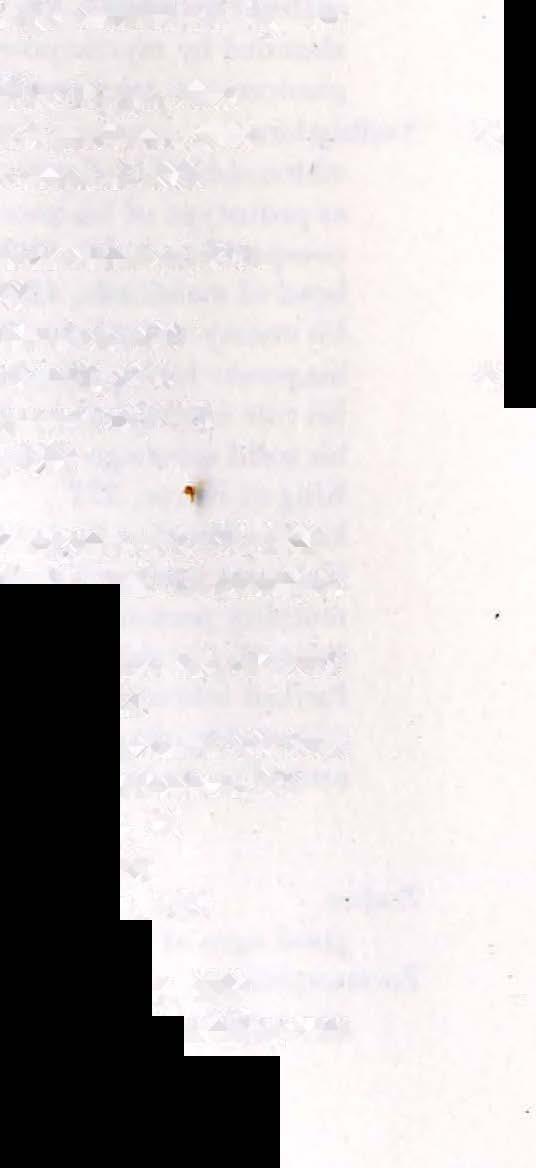
Vrndavana
as Lord Kr�r:�a's appearance place, 8 as worshipable as the Lord, 8 its importance disclosed by Caitanya, 18 nondifferent from the Lord, 8 places of pilgrimage excavated by six gosvtimi&, 18 residents protected by Kr�r:r-a, 393 sanctified by Kr�r:r-a's pastimes, 396 Vai�!'ava sannyasi& fond of, 699
Vmu dynasty
Akriira commander-in-ehief of, 571 descendants of, 566 Kr�r:r-a chief descendant of, 427 paternal family of Kunti, 424 Pradyumna great general of, 751 the Yadu dynasty, 160
Vyasadeva
as incarnation of Naraya!fa, 54,75,252 called to beget Pa!'�u and Dhrtara�p-a, -765
compiled all Vedic literature, 23,45,897 compromising spirit of, 242 confirms Kr�r)a is original_person, 44,393 delivered Bhagavatam to Sukadeva, 57 describes Kr�ra's creations, 74 disciple of Narada, 146,220 divided Veda into branches, 157 history of his birth, 205
his transcendental scholarship, 226 his Vedanta-siltra dazzling as midday sun, 23

his vision completely perfect, 237 instructed by Narada, 223-279
Vyasadeva
not followed by mechanical Vedanta student , 22 played part of householder, 196,318 resides in Himalayas, 206 T§i amongst the brahmarws, 223 spiritual preceptor for all men, 61 w
War
always involve massacre of innocent, 434 codes of religious, 356 due to animal slaughter, 357 hot and cold, 67
Wealth
as Lak�mi, 268 difficult problem for devotees, 108 distributed to brahmartas, 624 more wanted by foolish, 122 ,108 proper distribution of, 924
Welfare work Wife
devotees eager to render, 208 for material prosperity, 329,435 of Maharaja Parik�it, 203
as better half of husband, 364 duties of, 591 her duty to follow husband, 507 more wives wanted by fooli h, 122 of sannyas! a civil widow, 699
Women
cannot penetrate Vedas, 24 can practice-devotional service, 93 can take shelter of Lord, 72 classified with dvija-bandhus and sildras, 158
compared to fire, men to buller, 528 create havoc by adultery, 475 difficult problem for devotees, 108 dressed too attractively in Kali-yuga, 905 fruitive workers take pleasure in, 232 grossly neglected in Kali-yuga, 86 have no discriminatory power, 362 illicit connection with, 62 less intelligent, 394
_ mild nature of, 361-362 more powerful than men, 475 most beautiful in Keturnala, 850 not desired by Caitanya, 40 ?ffer obeisances without reservation, 395
General Index llll
Srlmad-Bhagavatam
Women
powerful controlled by shyness, 475 power of inspiration for men, 475 Sati rite most perfect action for, 728 their killing greatest of sins, 434 their material beauty an illusion, 528 unable to speculate, 395 unchaste when unprotected, 379, 380 varrtiisrama-dharma restricts . association with, 599
Work destruction of tree of, 269 only for the Lord, 272 transmigration according to nature of, 247, 270
Worship of demigods rejected, 121 of Srimad-Bhiigavatam, 182

y

Yadii yadii hi dharmasya g!iini/t quoted, 49
Yadu dynasty
confidential demigods in, 813 died in madness of intoxication, 813 instructed by Dattalreya, 149 Kr�•.1a's own dynasty, 160, 721 protected by the arms of the Lord, 757 supplemented Kr�•.1a's pastimes, 811
Yajiia See Sacrifice
Yajiiiirthii karma[IO 'nyatra karma-bandhana[1 quoted, 657
Yajiiavalkya
cited, 591
Yamariija
as Vidura, 830
cordial friend to devotees, 830 cursed by i\1a1_1�uka Muni, 680 does not spare life of scienlist, 844 father of Yudhi�!hira, 368 fear personified to nondevotees, 830 invited to Naimi�ara!1ya sacrifice, 844 one of twelve Mahiijanas, 680
Yasoda
bound baby Kgl)a, 410 her good fortune, 24 more exalted than Kunti, 412 mother of Kr�l)a, 78
Yena sarvam ida1h tatam quoted, 619
Yoga as cheap healing proces , 723 controls hunger, 475 factual realization of trance, 959 for realizing Kr�l)a, 124 how to establi h oneself in, 479 mechanical system, 723 restraint of senses by, 312 to get in touch with Supreme, 124 See also Self-realization, Yogamiiyii as Kr�•p's inconceivable potency, 738 fully displayed in pastimes, 604 sanctifies Kf�l)a's glories, 603
YogiS can expand tenfold, 590 engagedin ninefold devotional service, 466 leave body at o,..-n will, 477 modern manifest magical feats, 723 opposed to devotional service, 17 prohibited from sex indulgence, 6 realize Paramlitmli, 98 stranded by mystic powers, 124 unsuccessllll take good births, 124-125
Yudhi�thira
addressed as chief amongst the Purus, 626 as prototype of his ancestors, 630 compared to lndra, 380 head of mahiitmiis, 420 his enemy never born, 379, 700 his power loving affection, 430 his rule established by Kr�•)a, 385, 413 his solid sovereign power, 613 King of Kurus, 377 knew science of Kr�?a, 612 like inert mad urchin, 824 morality personified, 421 no mere tax collector, 508 Parik�it inherited kingdom from, 200 personality of goodness, 611 retired to set example, 817 z
Zodiac good signs at Parik�it's birth, 620 Zoomorjlhism not applicable to Kr�•)a, 78
1112
Srlmad-Bhagavatam
First Canto
<Part Tllree-Chapters 13-19>
with the original Sanskrit text, its Roman tran$literation, word-for-word synonyms, translation and elaborate purports by
His DMne Grace
A.C. Bhaktivedanta swami Prabhupada Founder-Acarya of the International Society for Krishna Consciousness
446pages 12 color illustrations
EXPLANATION OF THE COVER
1. The original spiritual planet, which resembles the whorl of a huge lotus flower, is called Goloka Vrndavana. It is the abode of Lord Kf�l)a, the original Personality of Godhead.
2. This original planet Goloka throws off a spiritual ray of effulgence called brahmajyoti which is the ultimate goal of the impersonalists.
3. Within this unlimited brahmajyoti there are unlimited numbers of spiritual planets, as there are innumerable materialplanetswithin the sun rays ofthe material universes. These spiritual planets are dominated by plenary expansions of Lord Kf�l)a, and the inhabitants there are ever liberated living beings. They are all four-handed. The Lord is known there as Narayal)a, and the planets are known asVaikufi!has.
4. Sometimes a spiritual cloud overtakes a corner of the spiritual sky of brahmajyoti, and the covered portion is called the mahat-tattva. The Lord then, by His portion as Maha-Vi�fiu, lies down in the water within the mahattattva. The water is called the Causal Ocean (kiiraf}a-jala).
5. As He sleeps within the Causal Ocean, innumerable universes are generated with His breathing. These floating universes are scattered all over the Causal Ocean. They stay during a breath of Maha-Vi�f!U.
6. In each and every universal globe the same Maha-Vi�ru enters again as Garbhodakasayl Vi�I)U and lies there on the Garbha Ocean on the serpentine Se�a incarnation. From His navel-abdomen sprouts a lotus stem, and on the lotus, Brahma, the lord of the universe, is born. Brahma creates all living beings of different shapes in terms of desire within the universe. He also creates the sun, moon and other demigods.
(continued on back flap)


7. The sun is situated almost in the center of each and every universe, and it distributes profuse light and heat all over the universe. There are millions and billions of suns in all the millions and billions of universes within the mahattattva. The suns and moons are required within the universes because they are dark by nature.The Vedas instruct us to go out of the dark universes and reach the glowing effulgence, the brahmajyoti.
8. The brahmajyoti is due to the illuminating Vaikur!ha planets, which need no sun or moon or power of electricity. Srlmad-Bhagavatam helps us reach the supreme planet, Goloka Vrndavana. The door is open for everyone. Human life is meant for this particular aim, for it is the highest perfection.
His Divine Grace A. C. Bhaktivedanta Swami Prabhupiida first met his spiritual master, Srila Bhaktisiddhanta Sarasvati GosvamiMaharaja,inCalcutta in 1922. Srila Bhaktisiddhanta liked this educated young man and injected in him the idea of preaching the message of Sr/mad-Bhagavatam all over the world. At Allahabad in 1933 Srila Prabhupada became his formally initiated disciple, and in 1937, just days before Srila Bhaktisiddhanta's departure from this mortal world, he was specifically ordered to spread Kr�r:ta consciousness tn the English language. Thus in 1944 Srila Prabhupada started Back .to Godhead magazine, which is now circulated in six different languages throughout the world, and he also published, in English, the first three volumes of his SrTmad· Bhagavatam.
In 1965, at the advanced age of 70, His Divine Grace sailed to the United States to fulfill his master's sacred mission, bringing with him only seven dollars, some books and a pair of hand cymbals. Shortly afterwards he began classes on Bhagavad-glta in a small storefront in New York City. Now, onl_y six years later, Srila Prabhupada's Inter· national Society for KrishnaConsciousness, with more than seventy centers in major cities throughout the world, has become an important institution ofspiritual knowledge and culture, and Srila Prabhupada's authoritative translations, commentaries and summary studies of Vedic literature have become standard textbooks of transcendental science.

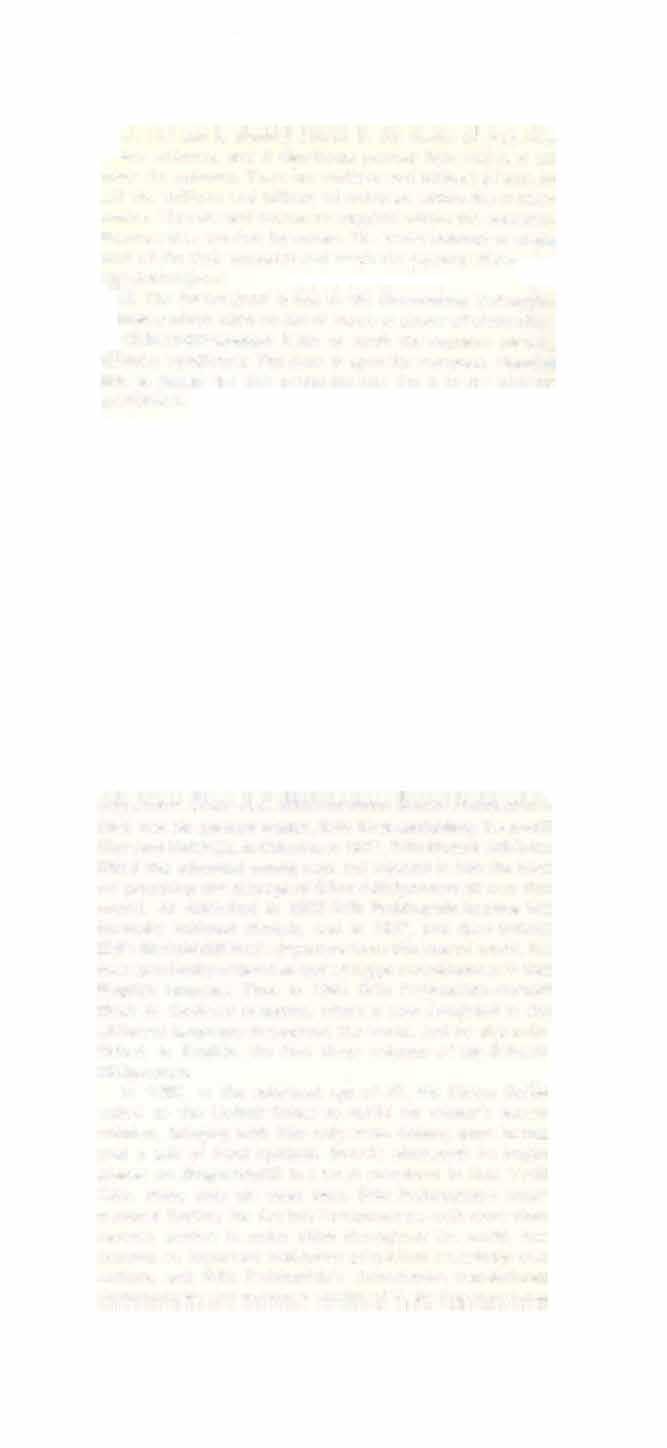
 His
Founder-Acarya of the International
His
Founder-Acarya of the International


 Plate 1 Just to protect the progeny of the Kuru dynasty, Sri Kr�Qa covered the embryo of Uttara by His personal energy. (p. 388)
Plate 1 Just to protect the progeny of the Kuru dynasty, Sri Kr�Qa covered the embryo of Uttara by His personal energy. (p. 388)

 Plate 1 Mahatma Vidura describing his personal experiences in the palace of the PaQc;!avas. (p. 676)
Plate 1 Mahatma Vidura describing his personal experiences in the palace of the PaQc;!avas. (p. 676)



 Plate 3 By Kl;�I)a's merciful strengtij only, Arjuna was
of Draupadl. (p. 774)
Plate 3 By Kl;�I)a's merciful strengtij only, Arjuna was
of Draupadl. (p. 774)
 Plate 4 By His grace only, Bhlmasena was able to kill the demon Jarasandha. (p. 777)
Plate 4 By His grace only, Bhlmasena was able to kill the demon Jarasandha. (p. 777)
 Plate 5 0 King! His jokings and frank talks which were pleasing and beautifully decorated with smiles are now remembered by me. (p. 794)
Plate 5 0 King! His jokings and frank talks which were pleasing and beautifully decorated with smiles are now remembered by me. (p. 794)
































































































































































































































































































































































































































































































































































































































































































































